


TriQuarterly
an international journal
TriQuarterly is
of writing, art and cultural inquiry published at Northwestern University

TriQuarterLI-ly
Editor
Susan Firestone Hahn
Associate Editor
Ian Morris
Operations Coordinator
Kirstie Felland
Cover Design
Gini Kondziolka
Editorial Assistants
Amy Levine
Elizabeth Cooperman
Assistant Editor
Joanne Diaz
TriQuarterly Fellow
Brent Mix
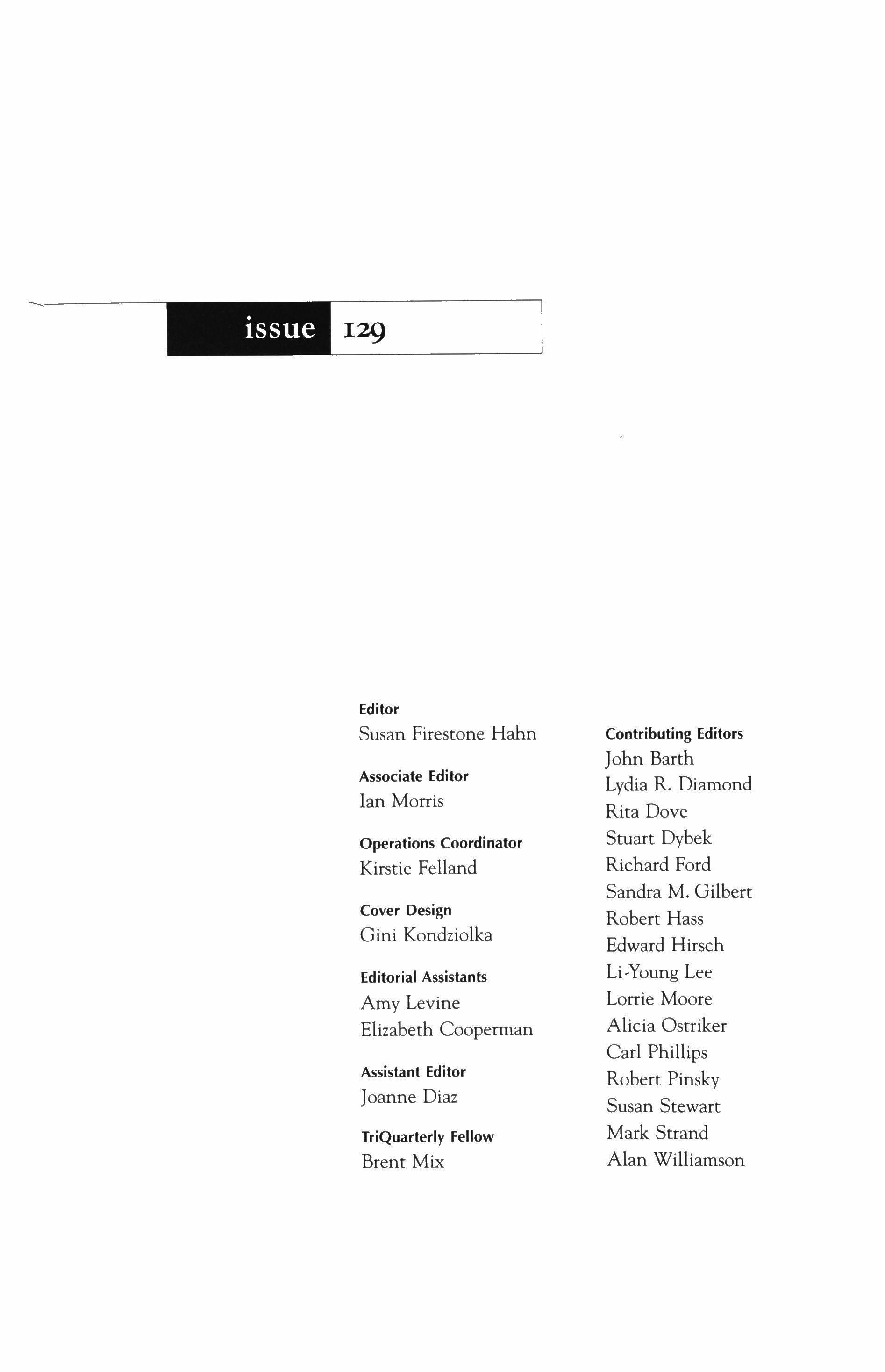
Contributing Editors
John Barth
Lydia R. Diamond
Rita Dove
Stuart Dybek
Richard Ford
Sandra M. Gilbert
Robert Hass
Edward Hirsch
Li-Young Lee
Lorrie Moore
Alicia Ostriker
Carl Phillips
Robert Pinsky
Susan Stewart
Mark Strand
Alan Williamson
129

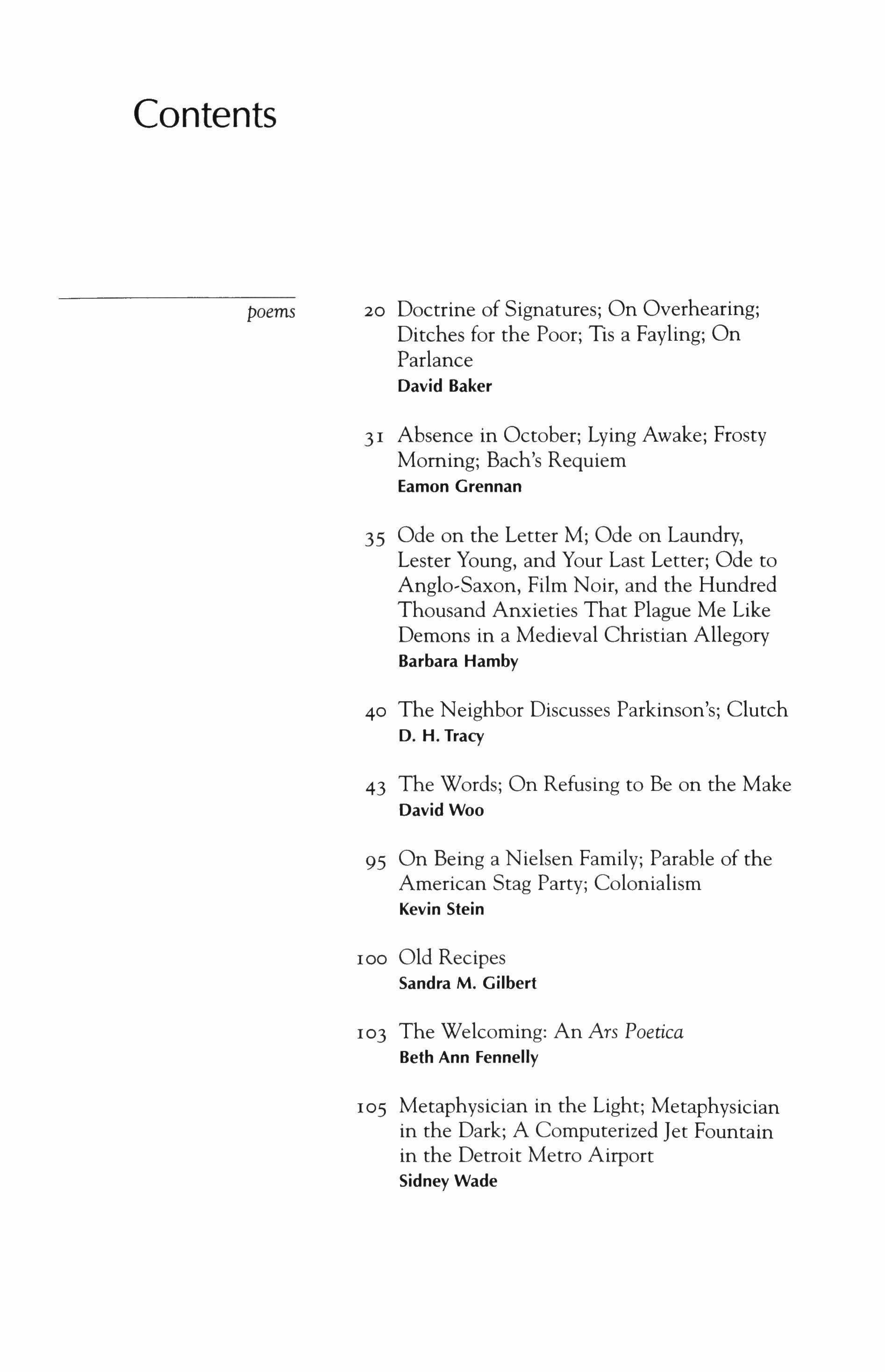
poems 20 Doctrine of Signatures; On Overhearing; Ditches for the Poor; Tis a Fayling; On Parlance
David Baker
31 Absence in October; Lying Awake; Frosty Morning; Bach's Requiem
Eamon Grennan
35 Ode on the Letter M; Ode on Laundry, Lester Young, and Your Last Letter; Ode to Anglo-Saxon, Film Noir, and the Hundred Thousand Anxieties That Plague Me Like Demons in a Medieval Christian Allegory
Barbara Hamby
40 The Neighbor Discusses Parkinson's; Clutch D. H. Tracy
43 The Words; On Refusing to Be on the Make
David Woo
95 On Being a Nielsen Family; Parable of the American Stag Party; Colonialism
Kevin Stein
100 Old Recipes
Sandra M. Gilbert
103 The Welcoming: An Ars Poetica
Beth Ann Fennelly
I05 Metaphysician in the Light; Metaphysician in the Dark; A Computerized Jet Fountain in the Detroit Metro Airport
Sidney Wade
Contents
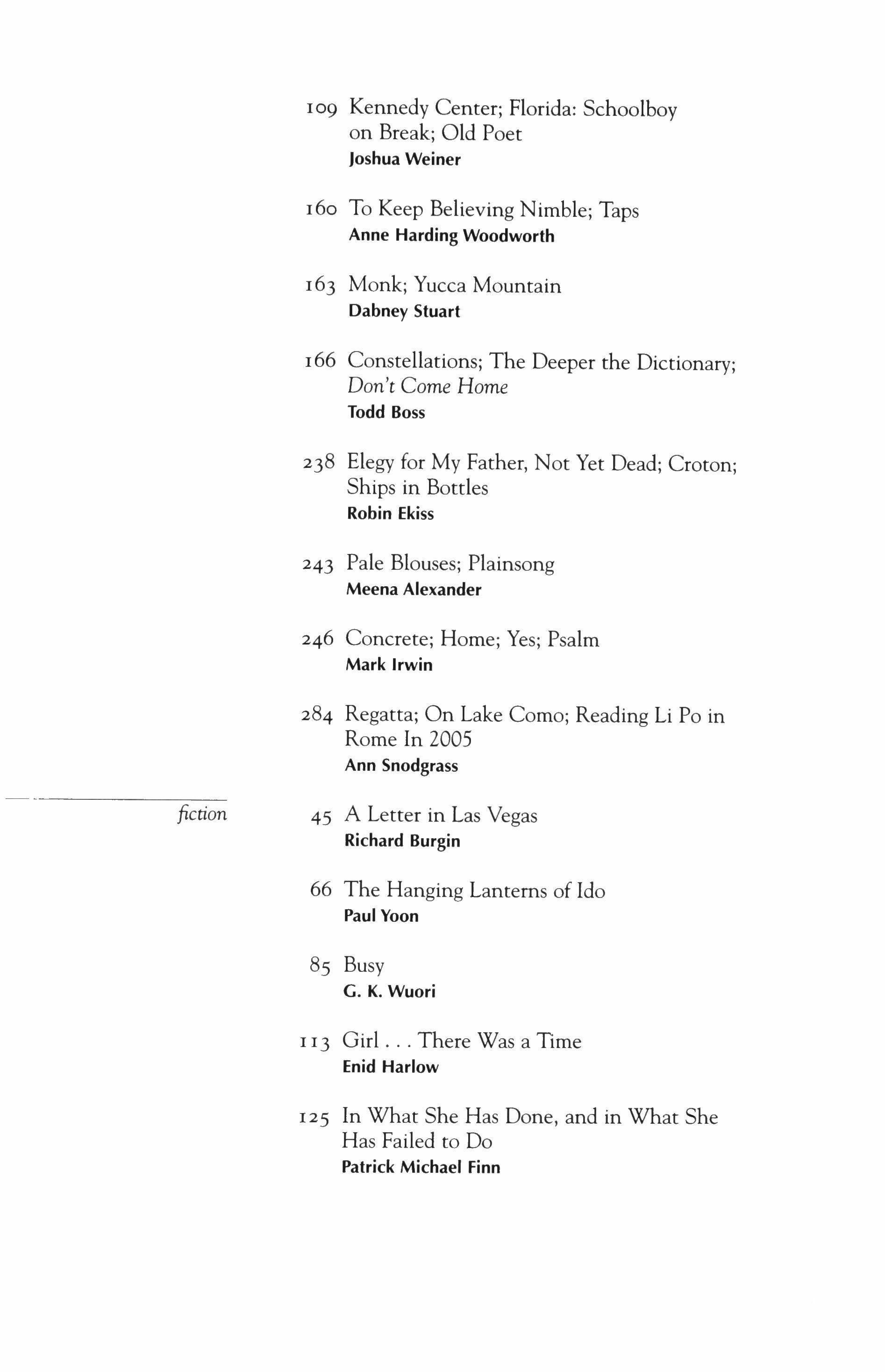
109 Kennedy Center; Florida: Schoolboy on Break; Old Poet
Joshua Weiner
160 To Keep Believing Nimble; Taps
Anne Harding Woodworth
163 Monk; Yucca Mountain
Dabney Stuart
166 Constellations; The Deeper the Dictionary; Don't Come Home
Todd Boss
238 Elegy for My Father, Not Yet Dead; Croton; Ships in Bottles
Robin Ekiss
243 Pale Blouses; Plainsong
Meena Alexander
246 Concrete; Home; Yes; Psalm
Mark Irwin
284 Regatta; On Lake Como; Reading Li Po in Rome In 2005
Ann Snodgrass
A Letter in Las Vegas
Richard Burgin
The Hanging Lanterns of Ido
G. K. Wuori 113 Girl There Was a Time
Enid Harlow
125 In What She Has Done, and in What She Has Failed to Do
Patrick Michael Finn
fiction 45
66
PaulYoon 85 Busy
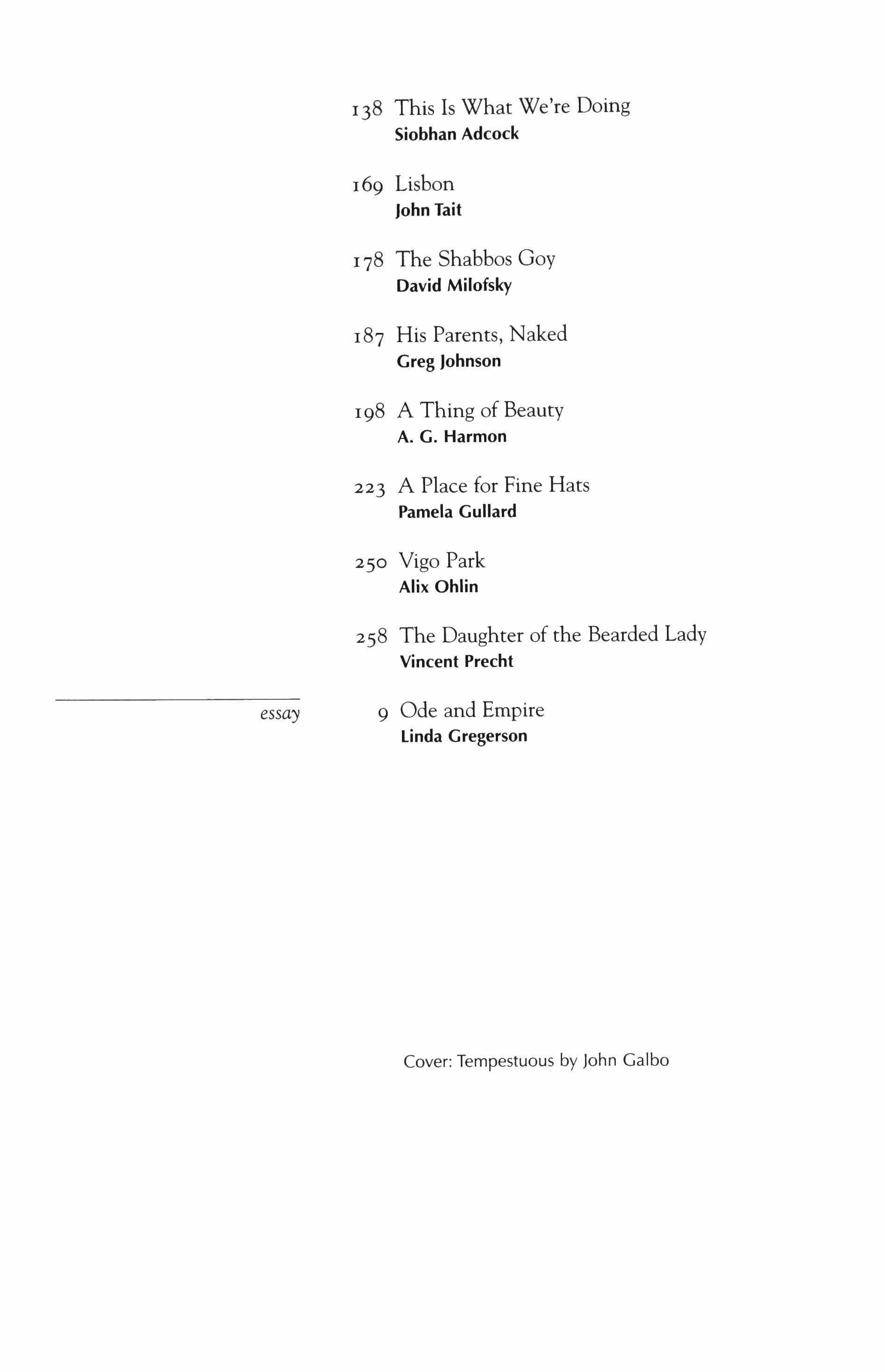
138 This Is What We're Doing
Siobhan Adcock
169 Lisbon
John Tait
178 The Shabbos Goy
David Milofsky
187 His Parents, Naked
Greg
Johnson
198 A Thing of Beauty
A. G. Harmon
223 A Place for Fine Hats
Pamela
Gullard
250 Vigo Park
Alix Ohlin
258 The Daughter of the Bearded Lady
Vincent Precht
essay 9 Ode and Empire linda Gregerson
Cover: Tempestuous by John Galbo

Linda Gregerson
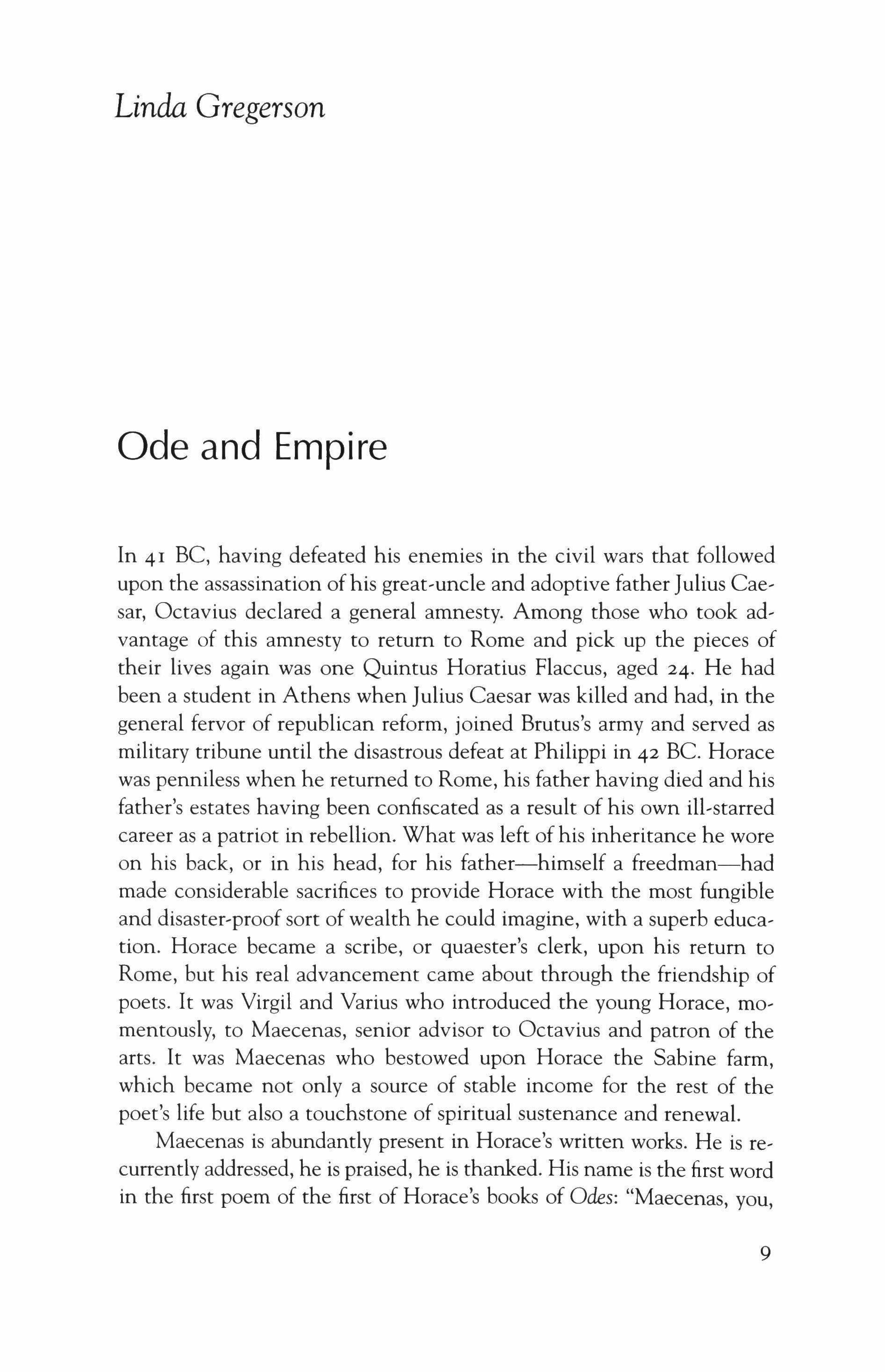
Ode and Empire
In 41 BC, having defeated his enemies in the civil wars that followed upon the assassination ofhis great-uncle and adoptive father Julius Caesar, Octavius declared a general amnesty. Among those who took advantage of this amnesty to return to Rome and pick up the pieces of their lives again was one Quintus Horatius Flaccus, aged 24. He had been a student in Athens when Julius Caesar was killed and had, in the general fervor of republican reform, joined Brutus's army and served as military tribune until the disastrous defeat at Philippi in 42 Be. Horace was penniless when he returned to Rome, his father having died and his father's estates having been confiscated as a result of his own ill-starred career as a patriot in rebellion. What was left of his inheritance he wore on his back, or in his head, for his father-himself a freedman-had made considerable sacrifices to provide Horace with the most fungible and disaster-proof sort of wealth he could imagine, with a superb education. Horace became a scribe, or quaester's clerk, upon his return to Rome, but his real advancement came about through the friendship of poets. It was Virgil and Varius who introduced the young Horace, momentously, to Maecenas, senior advisor to Octavius and patron of the arts. It was Maecenas who bestowed upon Horace the Sabine farm, which became not only a source of stable income for the rest of the poet's life but also a touchstone of spiritual sustenance and renewal.
Maecenas is abundantly present in Horace's written works. He is recurrently addressed, he is praised, he is thanked. His name is the first word in the first poem of the first of Horace's books of Odes: "Maecenas, you,
9

descended from many kings, /0 you who are my stay and my delight " This poem proceeds to inventory the varieties of human calling or estate-athlete, statesman, lord of vast acreage, humble farmer, merchant, idler, soldier, hunter-and to conclude with the poet's own vocation:
What links me to the gods is that I study
To wear the ivy wreath that poets wear.
The cool sequestered grove in which I play For nymphs and satyrs dancing to my music
Is where I am set apart from other men
Unless the muse Euterpe takes back the flute Or Polyhymnia untunes the lyre.
But if you say I am truly among the poets,
Then my exalted head will knock against the stars.
(Horace, Ode I. I, trans. David Ferry)
So the poet's place-not merely his means of sustenance and habitus, his villa in the Sabine Hills, nor even his claim to honor and attention, but his very "link to the gods"-is the abounding gift of patronage. The encomium so central to ode acknowledges tribute paid in varying coin: in acreage, in money, in public virtue, in eloquence and fame. The poet looks to his patron for recognition in material terms and also in judgment; he gives in exchange the ode. I name you Maecenas, and you name me poet.
The history of the ode is governed by two rhetorical poles: large-scale public address and intimate meditation. The thread I wish chiefly to examine here is that which links the ode, throughout its rhetorical spectrum, to the seats ofpublic power. In its origin, the ode is linked to those most public of public events, the civic drama and festivals of ancient Greece. Pindar (522-442 B.C.), who is generally credited with devising the form, wrote his odes to celebrate athletic victories, the three-part structure of the poem corresponding to three movements of the chorus by whom it was sung: a strophe, in which the chorus moved from left to right, an antistrophe, in which the chorus moved from right to left, and an epode, in which the chorus stood still. In subsequent centuries, the Pindaric ode came to be associated with other large-scale public observances: the unveiling of monuments, the formal accession of an emperor, the ceremony of state funerals. The Horatian ode is simpler in structure and often more modest in subject, a single repeated stanza
10

form that may function as a drinking song, an invitation to dinner, or a celebration of fleshly dalliance. In the course of two and a half millennia, the ode has assumed many formal incarnations-tripartite, homostrophic, and, in later periods, much looser and irregular. Its most enduring feature has been not form but occasion. The ode offers praise to a ruler, a patron, an athlete, a friend, to drink or childhood or a Grecian urn. It casts itself as the lyricist speaking-in-public. Coupling with occasion, it marks the boundaries of the self and the social.
And even in its earliest manifestations, the ode has accommodated tonalities and apprehensions that complicate the tautological circuits of patronage and praise. In the third ode of the first book, Horace calls down blessings upon the journey of his friend Virgil to Greece.
May Venus goddess of Cyprus and may the brothers Castor and Pollux, the shining stars, the calmers, Guard you, 0 ship, and be the light of guidance; May the father of the winds restrain all winds Except the gentle one that favors this journey. Bring Virgil, your charge, the other half of my heart, Safely to the place where he is going.
(Horace, Ode 1.3, trans. David Ferry)
But even as he praises the history of human navigation and the courage of men who venture upon the seas, the poet finds himself in darker, more ambivalent territory. He considers those who brave the elements and venture into forbidden realms-the "impious" sailor, "guileful Prometheus," "audacious Daedalus"-as tempting the gods. He modulates from benison to warning: "Is it any wonder, then, that Jupiter rages, / Hurling down lightning, shaking the sky with thunder!" It becomes the business of ode, even as it plays the chords of well-wishing and affiliation, to contemplate the limits of human ambition and to issue implicit counsel.
Moving further in this direction, odes may offer frank instruction to figures conspicuous in the public eye. Ben Jonson's "Ode to Sir William Sidney," written to celebrate the latter's twenty-first birthday in the year I6II, is an example in kind. William was son to Robert Sidney, Lord Lisle, grandson to Henry Sidney, sometime Lord Lieutenant of Ireland, and nephew to Sir Philip Sidney, who was still remembered, in the disillusioned second decade ofJacobean England, as the flower, the consummate poet-courtier-military hero, of the Elizabethan age. Twentyfive years after Philip Sidney's death, his family was still important as a
II

wellspring of literary patronage. But William, having inherited this luminous mantle and having recently attained his own majority, had to date led a conspicuously lackluster career.
Jonson begins by raising a congratulatory toast ("Give me my cup from the Thespian well") but quickly turns to cautionary advice:
This day says, then, the number of glad years Are justly summed, that make you man: Your vow
Must now
Strive all right ways it can
To outstrip your peers: Since he doth lack Of going back
Little, whose will
Doth urge him to run wrong, or to stand still.
'Twill be exacted of your name, whose son, Whose nephew, whose grandchild you are; And men Will then
Say you have followed far, When well begun; Which must be now: They teach you how. And he that stays To live until tomorrow hath lost two days.
(The Forest 14; published as part of the 1616 Folio ofJonson's Works)
Jonson was a master of the ruthless compliment. He had a keen sense of his own worth and of his dependence upon sources of sustenance-the public stage, the private masquing halls, the circuits of aristocratic praise-toward which he felt decidedly mixed emotions. He expected public stricture to be recognized as value,for,money.
American poets have generally been wary of "forcing the Muse" in the service of public occasion. We do not commemorate the Queen's birth, day; the patronage systems to which we subscribe (foundation grants
12

and universities rather than private purses) earn thanks on the acknowledgments page rather than in the body of our poems. However beset or driven by public intersections, the American lyric has largely grounded its authority in inwardness. Ralph Waldo Emerson's "Ode (Inscribed to W. H. Channing)" voices the national (and personal) ambivalence explicitly. First published in 1847, Emerson's "Ode" was dedicated to a clergyman and fellow abolitionist who had urged Emerson to become more active in the anti-slavery movement. The "Ode" begins with an ostensible demurral and apology:
Though loath to grieve
The evil time's sole patriot I cannot leave
My honied thought
For the priest's cant, Or statesman's rant.
If I refuse
My study for their politique, Which at the best is trick, The angry Muse
Puts confusion in my brain.
Emerson felt as keenly as did Channing that the times were evil, that slaveholding was the work of "jackals" and the current war with Mexico a naked act of aggression, that both slavery and the war were stains upon the country, its ideals, and its future:
Virtue palters; Right is hence;
Freedom praised, but hid;
Funeral eloquence
Rattles the coffin-lid.
But he differed with his friend on the deeper diagnosis and thus on the prospects of cure:
What boots thy zeal, o glowing friend, That would indignant rend
The northland from the south? Wherefore? To what good end?
Boston Bay and Bunker Hill
Would serve things still;-
13

Things are in the saddle And ride mankind.
In a world enslaved by "things," Emerson seems to argue, the poet has a more important role to play than that ofpolitical activist, however worthy the cause; his function as exemplar and public conscience exceeds the mere exigencies of topical engagement. "Every one to his chosen work," writes the poet: the "shopman," the "senator," and the servant of the Muse pursue distinct imperatives. But where does this leave the disposition of public affairs? And where does it leave historical perspective? Such transcendence as seems to be at work (the "over-god") "marries Right to Might exterminates / Races by stronger races, / Black by white faces " This does not bode well. And the Muse, who has seemed to scorn the public forum and its noisy methods, finds herself at the climax of Emerson's ode "astonished" by the force of collective uprising in a distant land:
The Cossack eats Poland, Like stolen fruit; Her last noble is ruined, Her last poet mute: Straight, into double band
The victors divide; Half for freedom strike and stand;The astonished Muse finds thousands at her side.
Emerson's sympathies are clear: he bitterly reproaches the nation, his nation, for failing to live up to its promise; he condemns the predations of private greed and expanding empire. But his critique is fraught with ironies and ever in motion: he writes a polemical poem that begins with the renunciation of public polemic; he adapts a public mode (the ode) to reconfigure skeptically the very foundations of public sphere.
Poets love to construe themselves as oppositional, at odds with public decorums and public affairs. But recent decades suggest that American poets are no longer convinced that civic scale and private consciousness, philosophical reach and local idiom, historical imagination and lyric authenticity, are inherently inimical to one another. Nor that public speaking must suppress an active and critical mind. Robert Hass's ode to the English language is keenly aware of the vested heritage in which
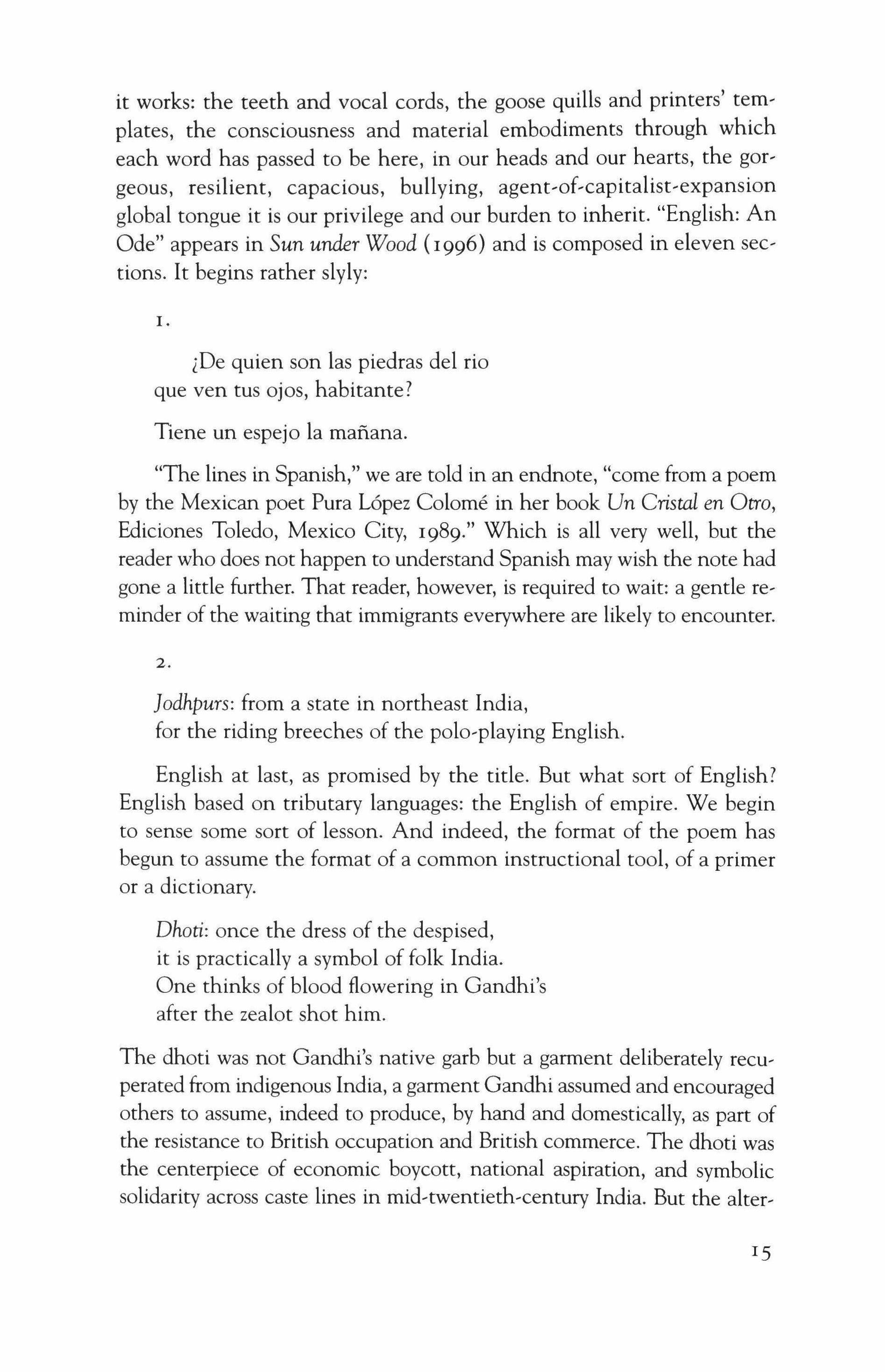
it works: the teeth and vocal cords, the goose quills and printers' templates, the consciousness and material embodiments through which each word has passed to be here, in our heads and our hearts, the gorgeous, resilient, capacious, bullying, agent-of-capitalist-expansion global tongue it is our privilege and our burden to inherit. "English: An Ode" appears in Sun under Wood (1996) and is composed in eleven sections. It begins rather slyly: I.
lDe quien son las piedras del rio que ven tus ojos, habitante?
Tiene un espejo la manana.
"The lines in Spanish," we are told in an endnote, "come from a poem by the Mexican poet Pura Lopez Colome in her book Un Cristal en Otro, Ediciones Toledo, Mexico City, 1989." Which is all very well, but the reader who does not happen to understand Spanish may wish the note had gone a little further. That reader, however, is required to wait: a gentle reminder of the waiting that immigrants everywhere are likely to encounter.
2.
Jodhpurs: from a state in northeast India, for the riding breeches of the polo-playing English.
English at last, as promised by the title. But what sort of English? English based on tributary languages: the English of empire. We begin to sense some sort of lesson. And indeed, the format of the poem has begun to assume the format of a common instructional tool, of a primer or a dictionary.
Dhoti: once the dress of the despised, it is practically a symbol of folk India. One thinks of blood flowering in Gandhi's after the zealot shot him.
The dhoti was not Gandhi's native garb but a garment deliberately recuperated from indigenous India, a garment Gandhi assumed and encouraged others to assume, indeed to produce, by hand and domestically, as part of the resistance to British occupation and British commerce. The dhoti was the centerpiece of economic boycott, national aspiration, and symbolic solidarity across caste lines in mid-twentieth-century India. But the alter-
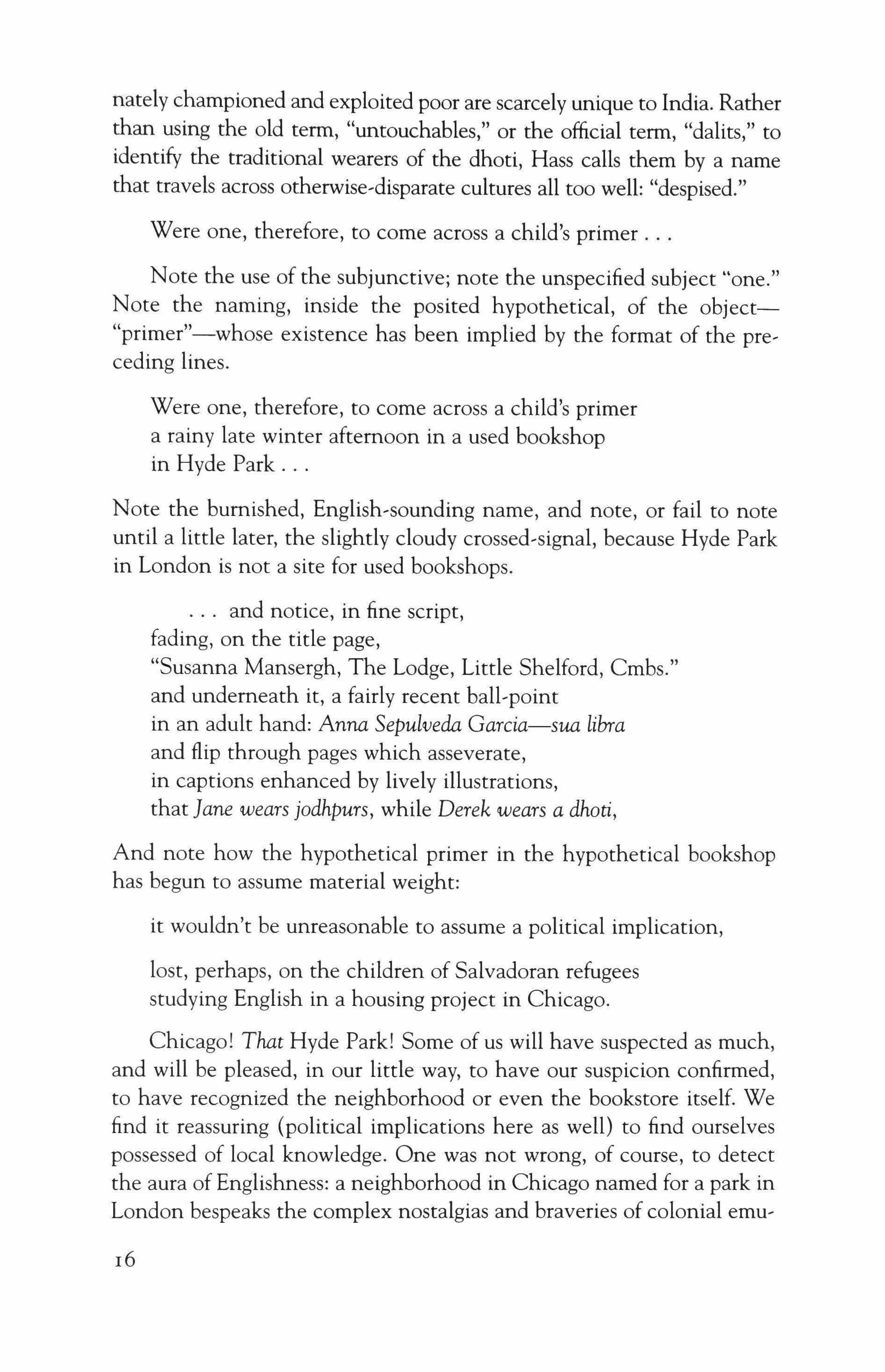
nately championed and exploited poor are scarcely unique to India. Rather than using the old term, "untouchables," or the official term, "dalits," to identify the traditional wearers of the dhoti, Hass calls them by a name that travels across otherwise-disparate cultures all too well: "despised."
Were one, therefore, to come across a child's primer
Note the use of the subjunctive; note the unspecified subject "one." Note the naming, inside the posited hypothetical, of the object"primer"-whose existence has been implied by the format of the preceding lines.
Were one, therefore, to come across a child's primer a rainy late winter afternoon in a used bookshop in Hyde Park
Note the burnished, English-sounding name, and note, or fail to note until a little later, the slightly cloudy crossed-signal, because Hyde Park in London is not a site for used bookshops. and notice, in fine script, fading, on the title page, "Susanna Mansergh, The Lodge, Little Shelford, Cmbs." and underneath it, a fairly recent ball-point in an adult hand: Anna Sepulveda Garcia-sua libra and flip through pages which asseverate, in captions enhanced by lively illustrations, that Jane wears jodhpurs, while Derek wears a dhoti,
And note how the hypothetical primer in the hypothetical bookshop has begun to assume material weight: it wouldn't be unreasonable to assume a political implication, lost, perhaps, on the children of Salvadoran refugees studying English in a housing project in Chicago. Chicago! That Hyde Park! Some of us will have suspected as much, and will be pleased, in our little way, to have our suspicion confirmed, to have recognized the neighborhood or even the bookstore itself. We find it reassuring (political implications here as well) to find ourselves possessed of local knowledge. One was not wrong, of course, to detect the aura of Englishness: a neighborhood in Chicago named for a park in London bespeaks the complex nostalgias and braveries of colonial emu-

lation. Old imperium: the English in India. Older imperium: the English in North America. Newer imperium: America in EI Salvador, and refugees in America. The movement of populations, and of language, follows the trajectories laid down by money and force.
The poem's next hypothetical is a "high school math teacher" irnagined as a way of filling in the outline of Anna Sepulveda Garcia, second owner of the primer
a former high school math teacher from San Salvador whose sister, a secretary in the diocesan office of the Christian Labor Movement, was found in an alley with her neck broken, and who therefore followed her elder brother to Chicago and, perhaps,
Note the "perhaps," the announced continuation of hypothesis
perhaps
bought a child's alphabet book in a used bookstore near the lake where it had languished for thirty years since the wife, perhaps, of an Irish professor of Commonwealth History at the university had sold it in 1959
Irish: Mansergh. A yet,earlier colonialism, which is why the Irish speak English today, and why an Irishman might find himself earning a living teaching Commonwealth History in a distinguished American university. The reader who does a little searching online may discover traces of the late Nicholas Mansergh, born in Tipperary to a family ofAnglo-Irish (i.e., Cromwellian) origins, honored denizen of Oxford and Cambridge, author of scholarly studies on The Commonwealth Experience, The Irish Question, and Constitutional Relations between Britain and India. (One may also read the political speeches of his son Martin Mansergh, Irish civil servant and diplomat, still very much alive today.) Empire leaves a convoluted aftermath.
-Math, as it turned out, when she looked up the etymology comes from an Anglo-Saxon word for mowing.
How shall the poet imagine an interlocking fate for Susannah Mansergh, first owner of the alphabet book, child of privilege from Little Shelford, Cambridgeshire, and Anna Sepulveda Garcia, who bought it second-hand? Privilege only extends so far: "maybe the child died / of

some childhood cancer-maybe she outgrew the primer" and her mother sold it and was later depressed. "Probably she hated Chicago anyway," the mother, that is, who hailed from Ireland or England or both,
And, browsing, embittered, among the volumes on American history
She somehow felt she should be reading, thought Wisconsin, Chicago: they killed them and took their language and then they used it to name the places that they've taken.
"There are those who think," writes the poet, "it's in fairly bad taste / to make habitual reference to social and political problems / in poems." In such an intellectual climate, the author of an ode must stay several steps ahead of earnestness. He may couch his observations in resourceful hvpotheticals. He may work a witty hybrid of fact and fabrication. He may distribute point-of-view: it is Anna who flees for safety; it is Susannah's mother who notes the ironies ofNew World naming. He may pull a narrative coup: observing "far less objection" when imaginative literature stages an "accidental death" than when it succumbs to "moral nagging," he may unceremoniously kill off a central character: "'Helen Mansergh was thinking about Rilke's pronouns / which may be why she never saw the taxi.' "
Etymology is a river, whose tributaries bind us to farflung daily habits and patterns of observation, all of them local, all of them borne from one locality, of time or place or affection, to another:
In one of Hardy's poems, a man named "Drummer Hodge," born in Lincolnshire where the country word for twilight was dimpsy two centuries ago, was a soldier buried in Afghanistan.
How is it that a boy from Lincolnshire (or Moscow or New Jersey) finds himself transplanted to Afghanistan?
Some war that had nothing to do with him.
Empire requires it. And the fallen were not, in earlier eras, brought home, as witness the roadside epitaphs of ancient Rome. As witness the humbler grave of a British drummer boy:
Face up according to the custom of his people so that Hardy could imagine him gazing forever
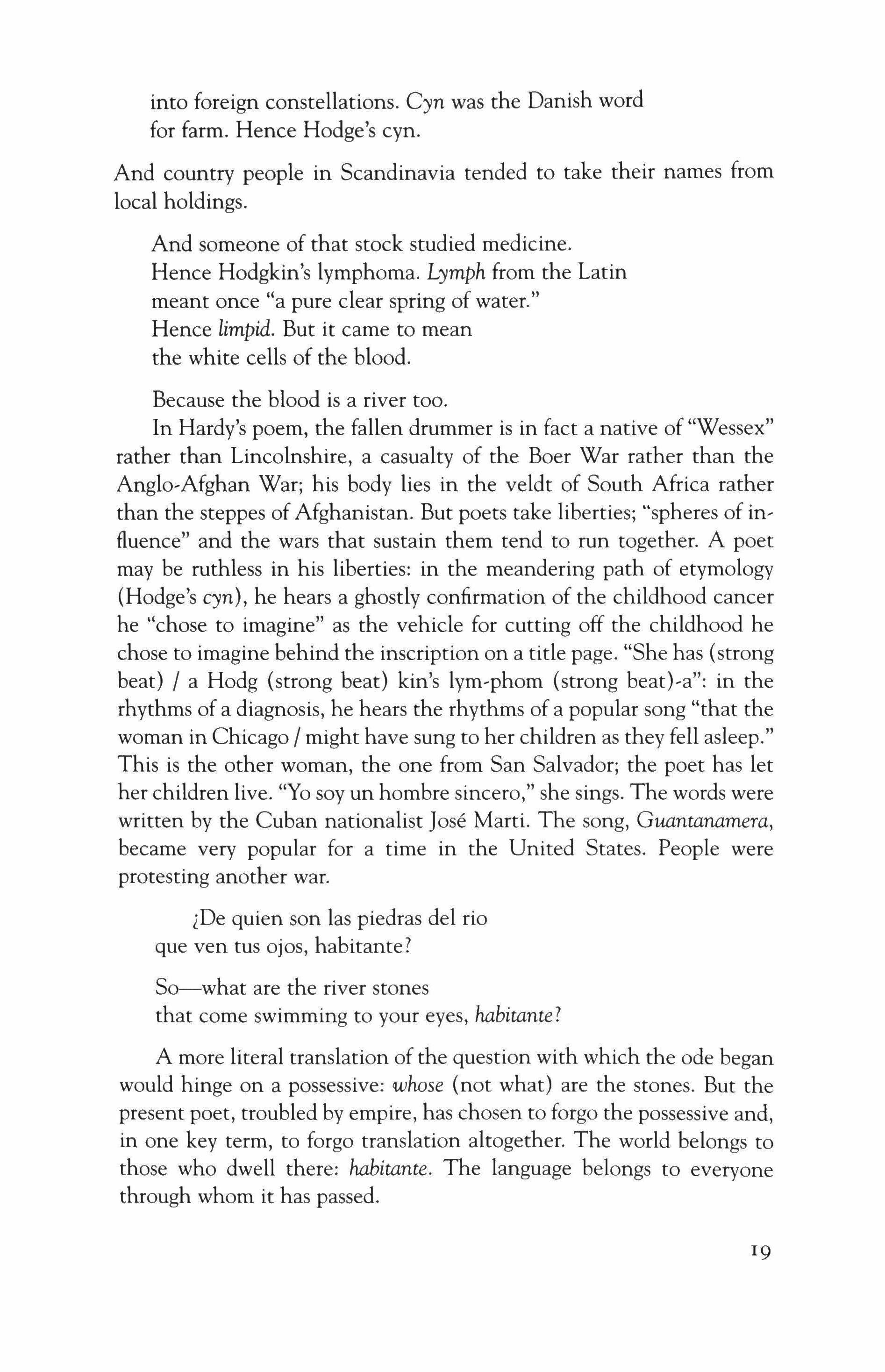
into foreign constellations. Cyn was the Danish word for farm. Hence Hodge's cyn.
And country people in Scandinavia tended to take their names from local holdings.
And someone of that stock studied medicine. Hence Hodgkin's lymphoma. Lymph from the Latin meant once "a pure clear spring of water." Hence limpid. But it came to mean the white cells of the blood.
Because the blood is a river too.
In Hardy's poem, the fallen drummer is in fact a native of "Wessex" rather than Lincolnshire, a casualty of the Boer War rather than the Anglo-Afghan War; his body lies in the veldt of South Africa rather than the steppes of Afghanistan. But poets take liberties; "spheres of in' fluence" and the wars that sustain them tend to run together. A poet may be ruthless in his liberties: in the meandering path of etymology (Hodge's cyn), he hears a ghostly confirmation of the childhood cancer he "chose to imagine" as the vehicle for cutting off the childhood he chose to imagine behind the inscription on a title page. "She has (strong beat) / a Hodg (strong beat) kin's lym-phorn (strong beatl-a": in the rhythms of a diagnosis, he hears the rhythms of a popular song "that the woman in Chicago / might have sung to her children as they fell asleep." This is the other woman, the one from San Salvador; the poet has let her children live. "Yo soy un hombre sincero," she sings. The words were written by the Cuban nationalist Jose Marti. The song, Guantanamera, became very popular for a time in the United States. People were protesting another war.
1De quien son las piedras del rio que ven tus ojos, habitante?
So-what are the river stones that come swimming to your eyes, habitante?
A more literal translation of the question with which the ode began would hinge on a possessive: whose (not what) are the stones. But the present poet, troubled by empire, has chosen to forgo the possessive and, in one key term, to forgo translation altogether. The world belongs to those who dwell there: habitante. The language belongs to everyone through whom it has passed.
19
David Baker

Doctrine of Signatures
Willow delights in a moist and wet soil -here being silex babylonica. So notes Edward Stone; then adds (to the Royal Society): where ague chiefly abounds. Consider the genius of the doctrine. When find ye a thing seek there its cure. Or, localize the lore. Across the bramble floodplain, ivy thickens with a talc of poisons, and beside it-root unto root-the pale gem jewelweed, taller, many-round-pronged ovate leaf and sallow bloom, so we've learned to snap the stalk, smear a drop of sap to cool and clear
20
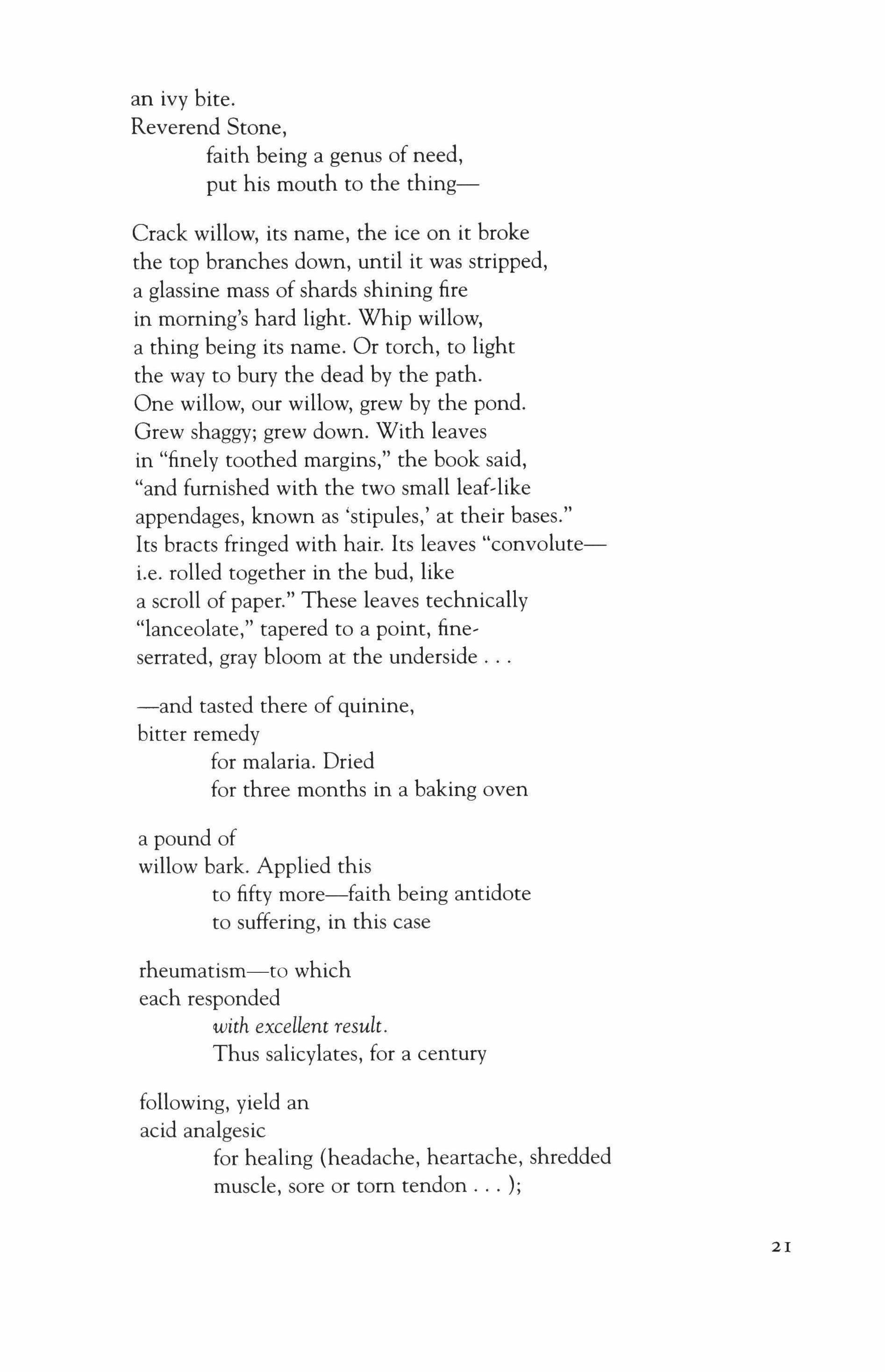
an ivy bite.
Reverend Stone, faith being a genus of need, put his mouth to the thing-
Crack willow, its name, the ice on it broke the top branches down, until it was stripped, a glassine mass of shards shining fire in morning's hard light. Whip willow, a thing being its name. Or torch, to light the way to bury the dead by the path. One willow, our willow, grew by the pond. Grew shaggy; grew down. With leaves in "finely toothed margins," the book said, "and furnished with the two small leaf-like appendages, known as 'stipules,' at their bases." Its bracts fringed with hair. Its leaves "convolutei.e. rolled together in the bud, like a scroll of paper." These leaves technically "lanceolate," tapered to a point, fine� serrated, gray bloom at the underside -and tasted there of quinine, bitter remedy for malaria. Dried for three months in a baking oven a pound of willow bark. Applied this to fifty more-faith being antidote to suffering, in this case
rheumatism-to which each responded with excellent result. Thus salicylates, for a century following, yield an acid analgesic for healing (headache, heartache, shredded muscle, sore or tom tendon );
21

and yield for Bayer Pharmaceutical, in 1899, a formula for "the most popular drug in the world."
Find ye what ye need among its other.
Other being, by the doctrine of signatures set forth by Philippus Aureolus
Theophrastus Bornbastus von Hohenheim-a.k.a.
Paracelsus-c. 1530, nature's way of making meaning, counterpoint, and
remedy to each poison, each disease, each bodily discomfiture. Nature being God's provident gift of usage. Thus lungwort, to cure pulmonary stains; thus gravelwort (urinary stones) and bloodroot for vomiting; maidenhair fern to mend baldness. Thus shaking palsy is overcome by poplar (as quaking aspen) leaves; and lily of the valley, writes William Cole, cureth apoplexy by Signature; for as that disease is caused by the dropping of humours into the principal ventricles of the brain: so the flowers of this Lily hanging on the plants as if they were drops, are of wonderful use herein. -Switch willow, our tree, or broom, for the wealth of downfall after wind, the implements we might make.
But this time: sleet, great snow, then gale, from which our willow shattered downward, ice-
22

toppled, explosive over deep drifts, and shone for days in the sun to follow. One willow.
For our gathering, as leaves to bum, limbs to sweep; as holding hands with our child, to sing there to a cat buried with his ball, a little food, and a willow-switch to dig his way out; as in to amass, understand, stand beneath, fold, as hands, as in harvest, as a storm will gather, or army will, or something wholly unforeseen but, now, in-
evitably broken on the white ground around us, and nothing to do but grieve. Thus weeping, for the shape of its branches, the shed leaf, a shudder of things in wind.
Weeping, as the story of our willow, and something else that grew, root unto root, beside us, beneath, within, instead. Suffering being antidote-. Thus petal of iris, a bruise polstice; and St. John's wort, writes John Gerard, with oile the color of blood, remedy for deep wounds. Once a willow grew beside a fine pond. Two shadows lived in its shadow. And raised a child. And watched a ruining storm, which -we hardly believed our eyes-was a sign of the life one comes to know as one's own.
23
On Overhearing

I can't tell what disaster is can you? Let's consider the question untethered from the usual anchors. Fifteen, afire (are you still here?), first out of the car, and still she doesn't run into the house but whirls, blue wild wind in a tank top. Her mother is redder by the time she slams her door, shaking the Sentra, and those two have at it, girl astraddle the curb, mom one wing grabbing for something, gnat in the air now can you?
As the big Canada geese bleat over, end of August, end of days. One after another wide tectonic sheet of them planing the slate sky. So the earth below slips by, no gasp. I can't tell what is shifting now the geese sky the earth keeping my feet can you yet? They flap, honk-that high automotive-and a feather in the leaves in the trees (something's happening somewhere bad I just know it), the leaves still on the trees but the color gone, tone of long-washed cloth, and the little sister is there listening at the picnic table, brushing their brandnew rescue dog Molly the drooler Molly mop. The infinite is at hand only (I read this somewhere, can't recall) with respect (can you?) to the finite. Meaning look out. As your heart wings toward its own calling disaster. Then they're done slam slam going in. It's the little one who does not go in no not for a long long while.
Ditches for the Poor
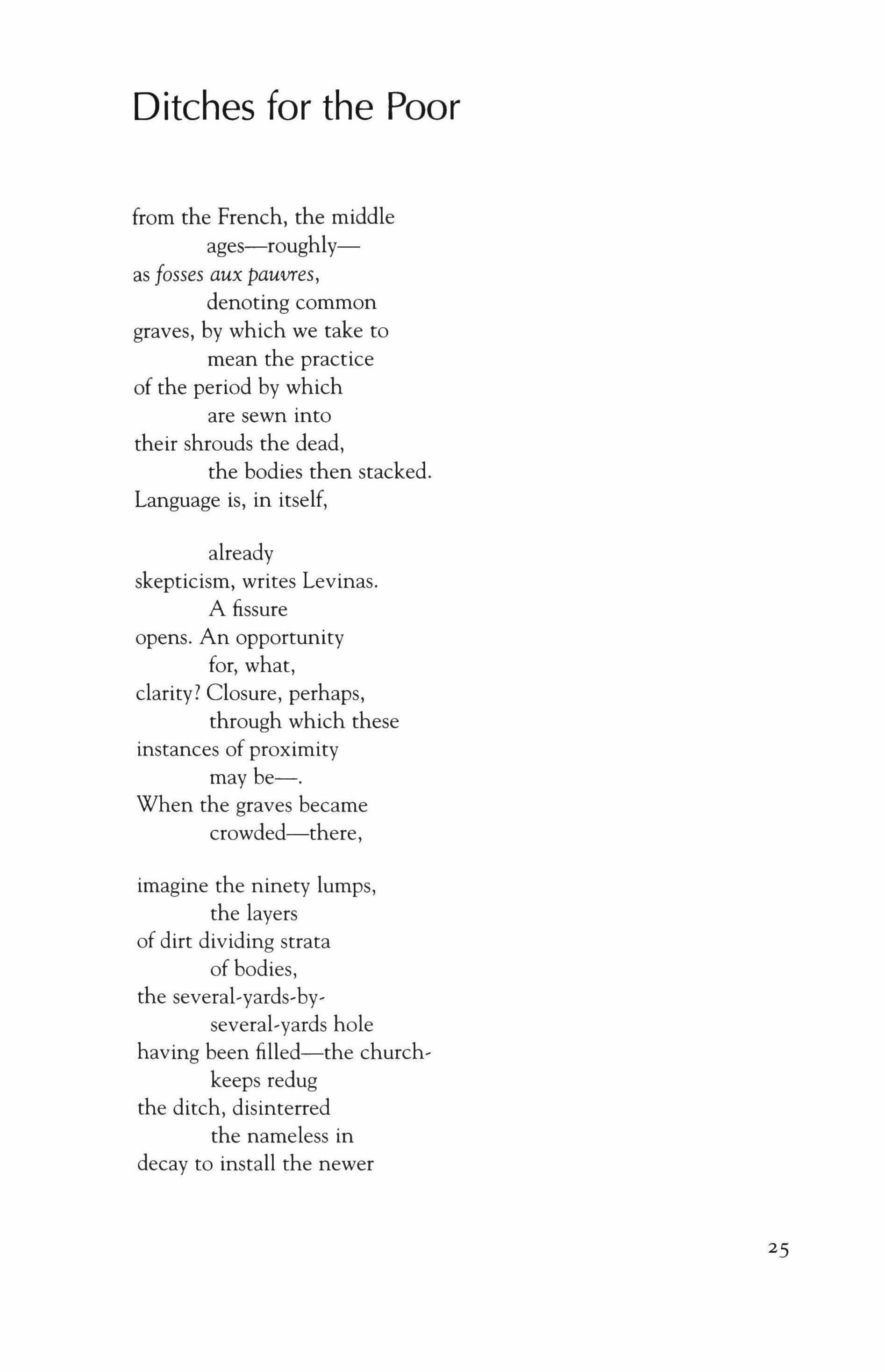
from the French, the middle ages-roughlyas fosses aux pauvres, denoting common graves, by which we take to mean the practice of the period by which are sewn into their shrouds the dead, the bodies then stacked.
Language is, in itself, already skepticism, writes Levinas. A fissure opens. An opportunity for, what, clarity? Closure, perhaps, through which these instances of proximity maybe-.
When the graves became crowded-there,
imagine the ninety lumps, the layers of dirt dividing strata of bodies, the several-yards-byseveral-yards hole having been filled-the churchkeeps redug the ditch, disinterred the nameless in decay to install the newer

dead. Old bones, to the charnel hall. There is no narrative to such anguish-as from the corpse no odor. As from a gathering loss mere ennui. Think so of the others -the grieving livingwaiting with their needles, to stitch anew.
Tis a Fayling

Thus, my guilt; of my shame, corresponding; and anguish, like blood on an egg, I have nothing more to say, for I am stretched up bare in a clover field under many mad stars; I am unfit wholly in the just eyes of the lord of stars, I am not (listen, you can hear this fayling sunder the smeared trees) with my breath, nor of it; or I am in a white bed not my own; or my own; liquid not dew bruising my face; I can lick it in my lip comer. (Tis a fayling of his expectation). As, who can endure to have their love despised? Among men who shall know? But of my part I shall no more speak, unless make worse this deficiency. From his fearful poetry, all tending to depress the Creator-for sure his Power shines forth in our Infirmity-thus his warning (which I do not heed) to prepare them for Necessity, End, and Usefulness of Afflictions. 1669. How prepare? Even Reverend Wigglesworth, "enduring the most dreary, unproductive, lonely period of his life becomes living proof of the necessity of afflictions." Thus Bunker his associate expires; his daughter Mercy so departs; and Esther dies "though the exact date is unknown"; and his voice lifts up as never stronger in fierce alarm. What means this Paradox? Afflictions are like Ballast i'th' Bottom of a Ship, yet every puff would quickly set us over, and sink us in the Ocean Sea no more for to Recover. I have nothing more to say,

yet am my body's own, of evidence. Of my shame (see the towers how they once again evaporate), I carry (see men flying, as if swallows wing-shot) (a boy in Baghdad coddling his mother's eye in his palm) blood on the egg (now of black-cps in a narrow valley, beneath the swept mountains of Caracas), I carry my lover's breath as a precious stone. And are these (yes they are) my fayling? Of my part I have no more words, for my breath is not with me, she is with me, constellation of winged things beneath the bamlight breathes over our skin here like a savored thing. It is a savored thing. And yet I find a heart, he moans, so dead, and I have found prevailing this week such a Spirit of whoardoms and departure, I am afraid of my owne Vile Heart that I shall one day fall. Thus fall. "After twenty years of 'widoehood' and almost constant distress, Wigglesworth scandalizes-," and Mather must renounce them both, Wigglesworth his former tutor, and she "your servant mayd of obscure parentage, & of no church I question whether the like hath bin known in the Christ, ian world." (Thus my mouth her tongue the waters ripe and rippling through our body of the world.) Everywhere; this breathing skin resounds. So I may not speak? Then Lord I must sing.
On Parlance

He was packed with gear, and in the parlance of the ever ready, he was good to go, thumbs up. He was halfway out the squad before it stopped. His partner, equally can-do and equipped, having left the truck at idle, dogged his heels across the neighbors' porch and slammed the screen. There we were at windows, worrying who'd died or taken ill, fallen through the night. Red lights raced the yard, the yard next door, to ours, to trace the artery of road and rural heart -this one's box farmhouse, this one's smoke-tree manorthe countryside less neighborhood than scattered arclights, cankered barns, and gutless cars.
What could it mean our neighbors' yard was junk, heady weeds and broken muddy glass, three dogs tethered by day like charms against civility-yet their garden a perfection: peas on strings, raised beds

of com, cutting flowers strictly rowed by color, height. You could see their working as a kind of play. I haven't mentioned the crisis that kept us up at night. When the driver came out, slow steps, and stowed their gear, the animal growl of the diesel idling, we couldn't tell what happened. Then the first one in, the last one out, who turned and slowly waved into the neighborhood, the night. What did it mean? It could mean all was well. It could mean goodbye.
Eamon Grennan
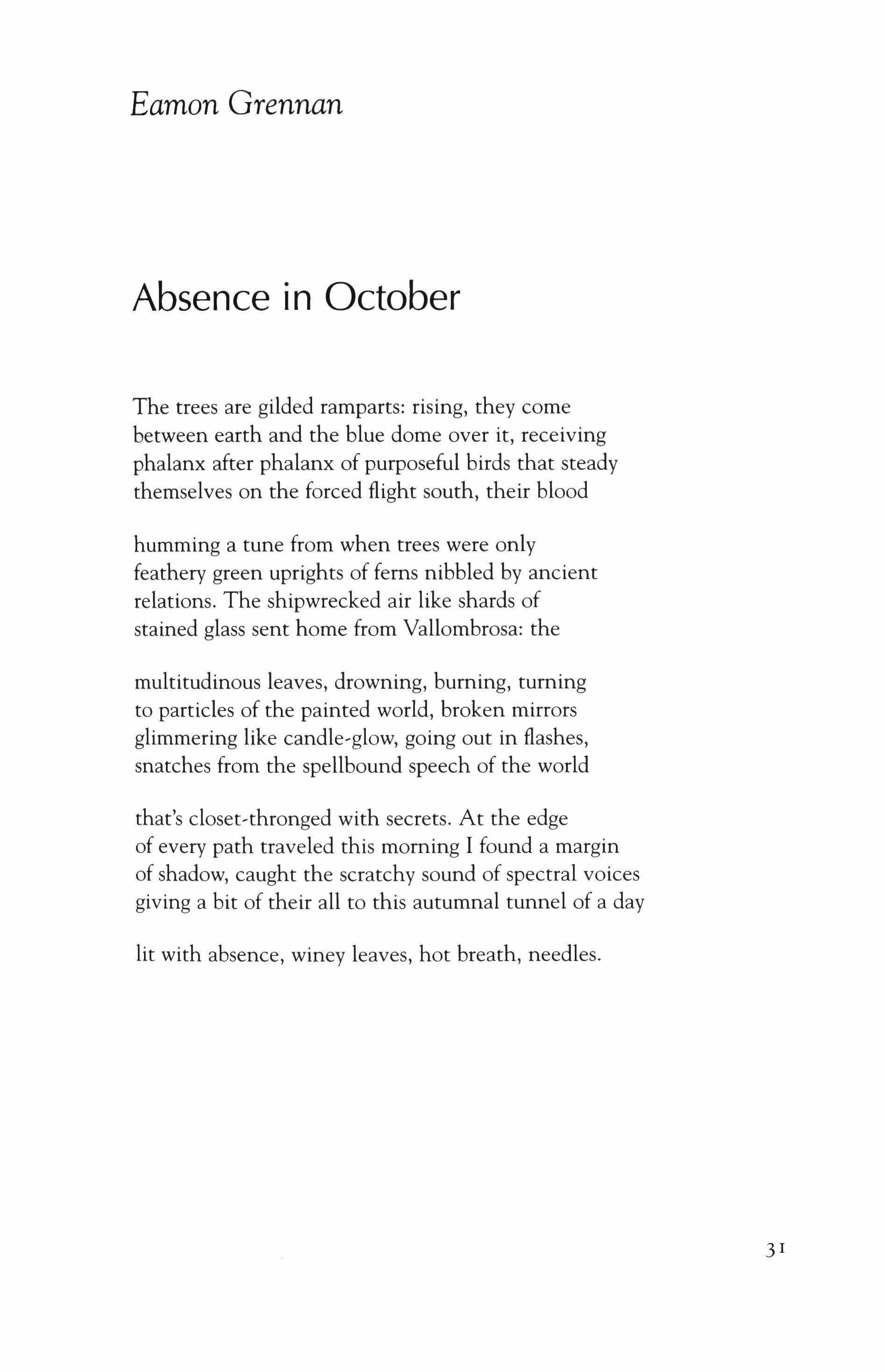
Absence in October
The trees are gilded ramparts: rising, they come between earth and the blue dome over it, receiving phalanx after phalanx of purposeful birds that steady themselves on the forced flight south, their blood
humming a tune from when trees were only feathery green uprights of ferns nibbled by ancient relations. The shipwrecked air like shards of stained glass sent home from Vallombrosa: the
multitudinous leaves, drowning, burning, turning to particles of the painted world, broken mirrors glimmering like candle-glow, going out in flashes, snatches from the spellbound speech of the world
that's closet-thronged with secrets. At the edge of every path traveled this morning I found a margin of shadow, caught the scratchy sound of spectral voices giving a bit of their all to this autumnal tunnel of a day
lit with absence, winey leaves, hot breath, needles.
31
Lying Awake

Night thoughts keep him pinned to glittershapes on the curtainsfallen leaves caught in their last incarnate colors. The fabric ghost white. At the slightest breath a slow, spectral motion. His dream a man' umental skeleton of metal: raw light crucifies a few spars of leftover scaffolding. Scattered at its foot are toys, kettle, bed, the kitchen dishes; chenille scarf, silver breast-brooch, amber necklace; the gold and lapis lazuli bracelet, its freckled deep blue hoarding light. He will hear the small birds on the feeder, or the hawk's high-up screaming. A broadwing blazon, ginger-tailed, on a cloud that winter has turned the color of weather-yellowed canvas.
32
Frosty Morning

The plume of steam from the tall chimney casts its own wavering black shadow on red brick, suddenly transparent and radiant with the sun streaming through it, molecular lift-off of light becoming a live lick of shade, a climbing vine of blackness, a design that won't stay still, then vanishes. My own shadow covers a goose feather fallen in the clabbered grass near water, the feather silver-trimmed and stiffened by the thinnest skin of frost. The soccer field's transfigured to a patch of Elysian dazzle, and the avenue is bright-lined with maples-leaves still green but falling in showers now frost has bitten twigs and sent this strict convulsion of chill into every limb, filling the air with quickness, spinning a hymn to descent, declension, each curling leaf a brief dialogue between light and shade, the body caught up in its own reversals. And out in the fiery glare against my window the bronze sheen of the finch's thick beak, rose glow of its head and chest, the shadow, the sunflower seed it's cracking, prints on the sill, its tiny sign and bottom-line signature final.
33
Bach's Requiem

When I sawall those voices-heard them hold together against death, pay no attention to traffic clamor in the city outside-when I saw so many differences could be brought to a single understanding like thatas a flock of starlings at no known signal will rise, hover for an instant so you can see each individual and the glint of each wing, then in a swoop will become one thing, tilted into a single tight formation and slowly spreading the net they've woven in air that shimmers between their solid, darkly iridescent bodies, and you see how the bodies and parceled air make one happen�fact you have no name for, although it has composed itself out of the accidental shape things take, the way the music is resolved, is resolute in its one winged body, part after part pushing it out of the jaws of the dragon, soaring (a net of birds) into lightthen I knew, though my own thoughts would not be light, that the dark had its own limits and would, in spite of bonechill, lift, be lifted.
34
Barbara Hamby

Ode on the Letter M
Midway through the alphabet, you are the tailored seam that ties Adam to zephyr, atom to uranium, sword that takes up a new God, little lamb, turns him into a flame spewing Visigoth, and Byzantium becomes Constantinople, the new Jerusalem, hallelujah, bombs away. Or are you the flim-flam man working small towns in Mississippi-Troy, Denham, Tishamingo, Yazoo City-hawking a serum that will cure everything-warts, impetigo, ringwormfade wrinkles, spark a wilting libido. Oh, yes, ma'am, dose your husband, and that rooster will crow again, thrum like a well-tuned violin. A masterful scam it was until the day that pretty little school marm purred like a pussy cat, locked you in her maximum security prison with gold rings, aluminum siding your new game, the highway nothing but a dream of freedom, because one letter can change a grin to grim, plug to plum, slut to slum, a few blankets and wampum can get you Manhattan, itself once New Amsterdam, because sometimes we seem to be a quorum of idiots on a plague ship in a sea of phlegm and fog, rumors of disease flying like crows in the scum of clouds heavy with hurricanes. Or the bride and groom in black and white, God bless their Viet Nam, here's hoping for years of pound cake and hymns. There's a charm in myopia, witness Monet's chrysanthemum, a blob of pink and blue, his lilies smears of thick cream on green. I take off my glasses when I can, though I'm as lost as anyone, searching for the perfect dim sum
35

restaurant, locked in my high gothic scriptorium, scratching for words as rats scratch for cheese-Muenster, Edam, Livarot-for there are worlds in worlds-Mozart's requiem the dark river Figaro sails on or The TIn Drum spawned by the SS. Who can guess the mysteries that cram our brains? Not I, said the little black cat. Fie, fie, foe, fum, I smell the blood of everyone. Like Robert Mitchum in Cape Fear, the ghouls are out, ripping the flesh off prom queens and popcorn girls, and as the storm clouds swarm like killer bees, I'll be searching for my Tiny Tim, om mani padme om, God bless us, every worm.
Ode on Laundry, Lester Young, and You r Last Letter
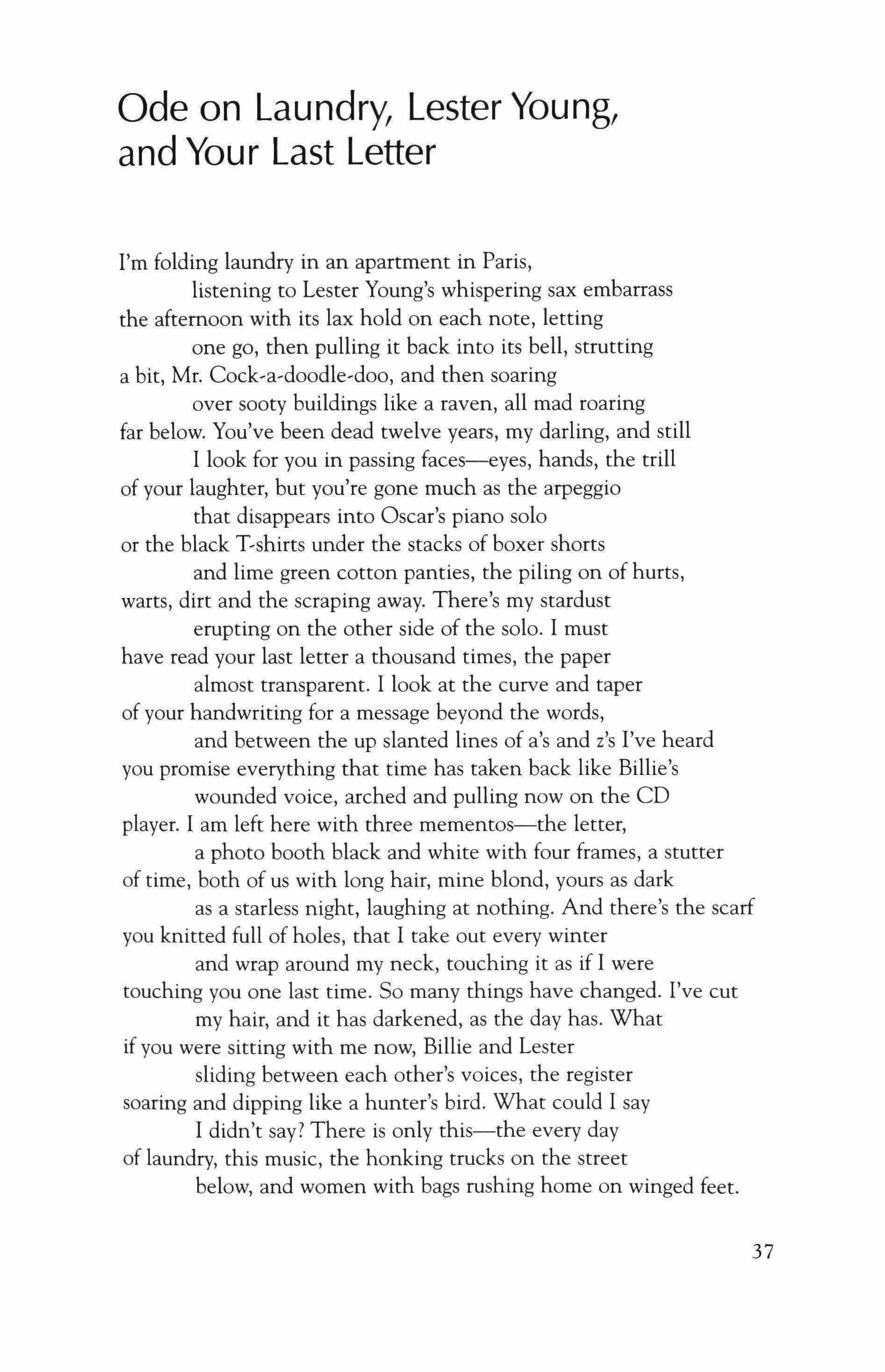
I'm folding laundry in an apartment in Paris, listening to Lester Young's whispering sax embarrass the afternoon with its lax hold on each note, letting one go, then pulling it back into its bell, strutting a bit, Mr. Cock-a-doodle-doc, and then soaring over sooty buildings like a raven, all mad roaring far below. You've been dead twelve years, my darling, and still I look for you in passing faces-eyes, hands, the trill of your laughter, but you're gone much as the arpeggio that disappears into Oscar's piano solo or the black 'Tshirts under the stacks of boxer shorts and lime green cotton panties, the piling on of hurts, warts, dirt and the scraping away. There's my stardust erupting on the other side of the solo. I must have read your last letter a thousand times, the paper almost transparent. I look at the curve and taper of your handwriting for a message beyond the words, and between the up slanted lines of a's and z's I've heard you promise everything that time has taken back like Billie's wounded voice, arched and pulling now on the CD player. I am left here with three mementos-the letter, a photo booth black and white with four frames, a stutter of time, both of us with long hair, mine blond, yours as dark as a starless night, laughing at nothing. And there's the scarf you knitted full of holes, that I take out every winter and wrap around my neck, touching it as if I were touching you one last time. So many things have changed. I've cut my hair, and it has darkened, as the day has. What if you were sitting with me now, Billie and Lester sliding between each other's voices, the register soaring and dipping like a hunter's bird. What could I say I didn't say? There is only this-the every day of laundry, this music, the honking trucks on the street below, and women with bags rushing home on winged feet.
37
Ode to Anglo Saxon, Film Noir, and the Hundred Thousand Anxieties
That Plague Me Like Demons in a Medieval Christian Allegory
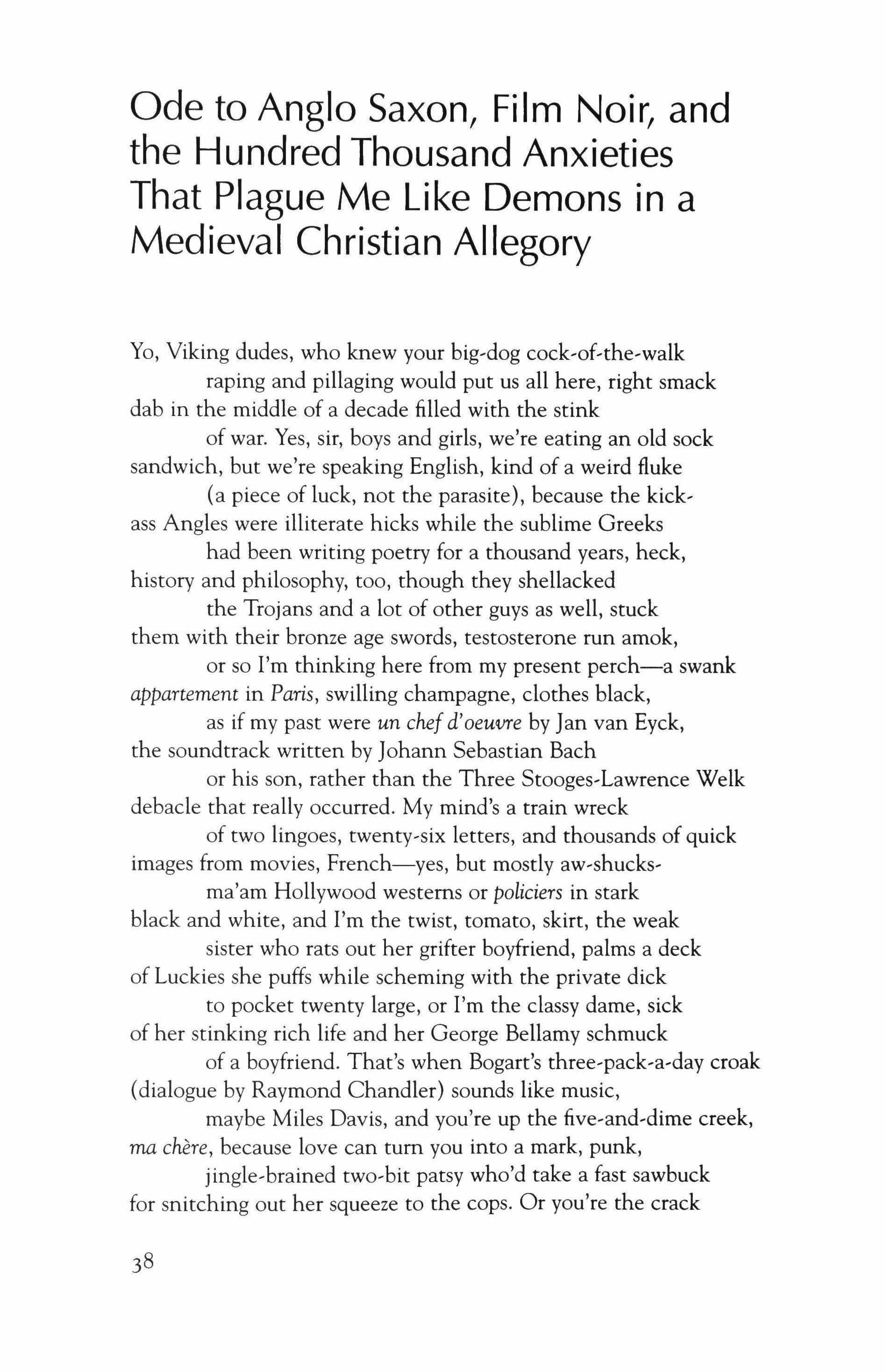
Yo, Viking dudes, who knew your big-dog cock-of-the-walk raping and pillaging would put us all here, right smack dab in the middle of a decade filled with the stink of war. Yes, sir, boys and girls, we're eating an old sock sandwich, but we're speaking English, kind of a weird fluke (a piece of luck, not the parasite), because the kick, ass Angles were illiterate hicks while the sublime Greeks had been writing poetry for a thousand years, heck, history and philosophy, too, though they shellacked the Trojans and a lot of other guys as well, stuck them with their bronze age swords, testosterone run amok, or so I'm thinking here from my present perch-a swank appartement in Paris, swilling champagne, clothes black, as if my past were un chef d'oeuvre by Jan van Eyck, the soundtrack written by Johann Sebastian Bach or his son, rather than the Three Stooges,Lawrence Welk debacle that really occurred. My mind's a train wreck of two lingoes, twenty,six letters, and thousands of quick images from movies, French-yes, but mostly aw-shucksma'am Hollywood westerns or policiers in stark black and white, and I'm the twist, tomato, skirt, the weak sister who rats out her grifter boyfriend, palms a deck of Luckies she puffs while scheming with the private dick to pocket twenty large, or I'm the classy dame, sick of her stinking rich life and her George Bellamy schmuck of a boyfriend. That's when Bogart's three-pack-a-day croak (dialogue by Raymond Chandler) sounds like music, maybe Miles Davis, and you're up the five-and-dime creek, rna chere, because love can tum you into a mark, punk, jingle-brained two-bit patsy who'd take a fast sawbuck for snitching out her squeeze to the cops. Or you're the crack

whore with an MBA standing on the corner in chic Versace rags, falling for the D.A., till the Czech drug lord plugs him. So who are you? Not the hippie chick of your early twenties or the Sears-and-Roebuck Christian drudge your mother became, though Satan still stalks
you on a regular basis. Is that guy a slick operator or what with his Brylcreemed hair and pock, marked face? There's still smallpox in Hell, so you push him back whenever you can, grow orchids and for dinner cook risotto alia Milanese, because knick, knack paddy whack, you're counting on something, not luck or rock and roll, though you've been there-at the HIC with Mick Jagger prancing around like a hopped-up jumping jack on speed. Non, rna petite Marcella Proust, this is the joke, when your mother prays for you, your miserable heart ticks a little more like a Swiss,made watch, and when you speak, does French come out? Nah, it's the echo of those shock-jock Vikings, hacking their way across Europe, red-haired, drunk on blood and blondes, and though your husband looks like the Duke of Cambridge, that's not what you love so much, ya dumb cluck, but his Henry [ames-Groucho Marx-Cajun shtick. Knock, knock. Who's there? It's Moe, Larry, and Curly, nyuk nyuk, nyuk.
39
D. H. Tracy
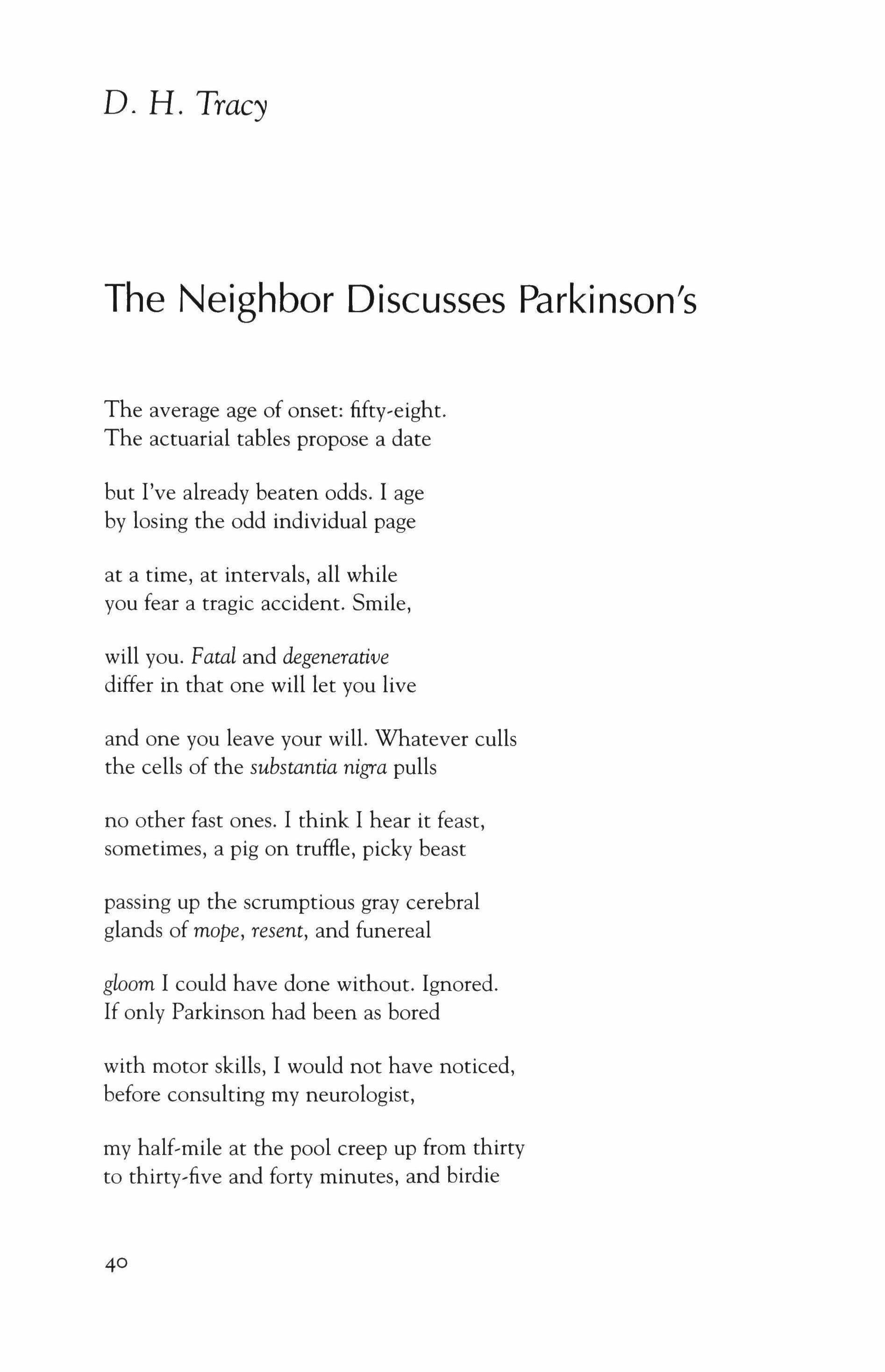
The Neighbor Discusses Parkinson's
The average age of onset: fifty-eight. The actuarial tables propose a date
but I've already beaten odds. I age by losing the odd individual page
at a time, at intervals, all while you fear a tragic accident. Smile, will you. Fatal and degenerative differ in that one will let you live and one you leave your will. Whatever culls the cells of the substantia nigra pulls
no other fast ones. I think I hear it feast, sometimes, a pig on truffle, picky beast
passing up the scrumptious gray cerebral glands of mope, resent, and funereal
gloom I could have done without. Ignored. If only Parkinson had been as bored
with motor skills, I would not have noticed, before consulting my neurologist,
my half-mile at the pool creep up from thirty to thirty-five and forty minutes, and birdie

tum to bogey. A stiffness in the back. She has me in her office read the plaque
and counts my two'beat blinks. To test my balance she jabs my shoulder. Parkinson's talents
are improving monthly. Swallowing takes concentration; my bowels, owing weeks of arrears, stage noisy filibusters. My larynx slackens, sulls, and hardly musters
a wheeze to justify the Think loud signs plastered everywhere like valentines.
Anne put one on the mirror. Nothing to lose. In about four years I will have to choose
a single victory over the medication: the paralytic fetus, number one,
or, two, the flailing, spastic dyskinesia. There you have it. Figures, facts, no drama,
my overt wish that you should sympathize, sit in my den and listen, subsidize
my hobby. In your heads live my travails. If and when, for me, the carrot fails,
I have a serviceable stick to lever my bony balking donkey forward. Whether far or not, farther. Longer in the saddle. You might exercise your choice of battle.
41
Clutch
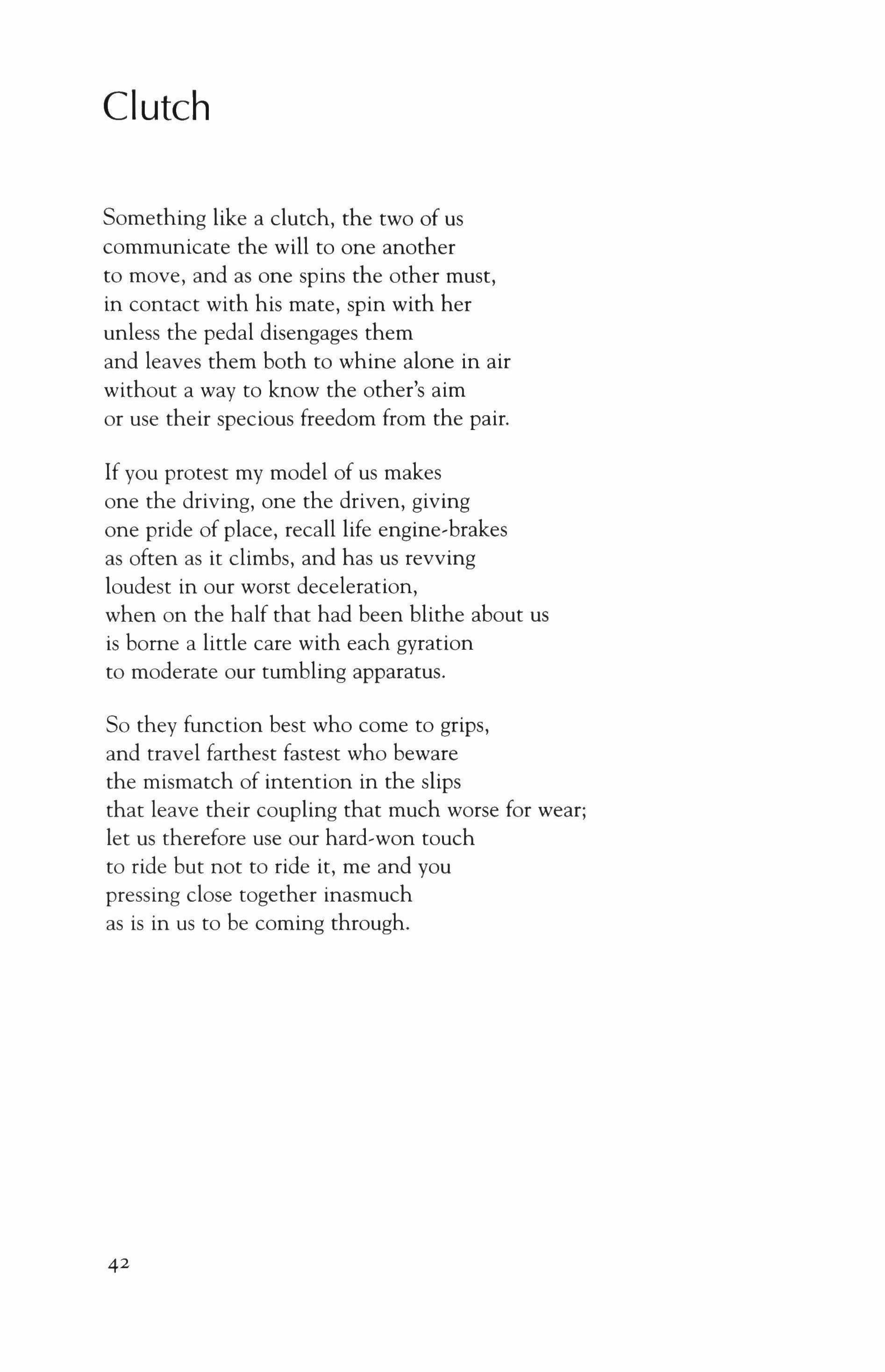
Something like a clutch, the two of us communicate the will to one another to move, and as one spins the other must, in contact with his mate, spin with her unless the pedal disengages them and leaves them both to whine alone in air without a way to know the other's aim or use their specious freedom from the pair.
If you protest my model of us makes one the driving, one the driven, giving one pride of place, recall life engine-brakes as often as it climbs, and has us revving loudest in our worst deceleration, when on the half that had been blithe about us is borne a little care with each gyration to moderate our tumbling apparatus.
So they function best who come to grips, and travel farthest fastest who beware the mismatch of intention in the slips that leave their coupling that much worse for wear; let us therefore use our hard,won touch to ride but not to ride it, me and you pressing close together inasmuch as is in us to be coming through.
David Woo
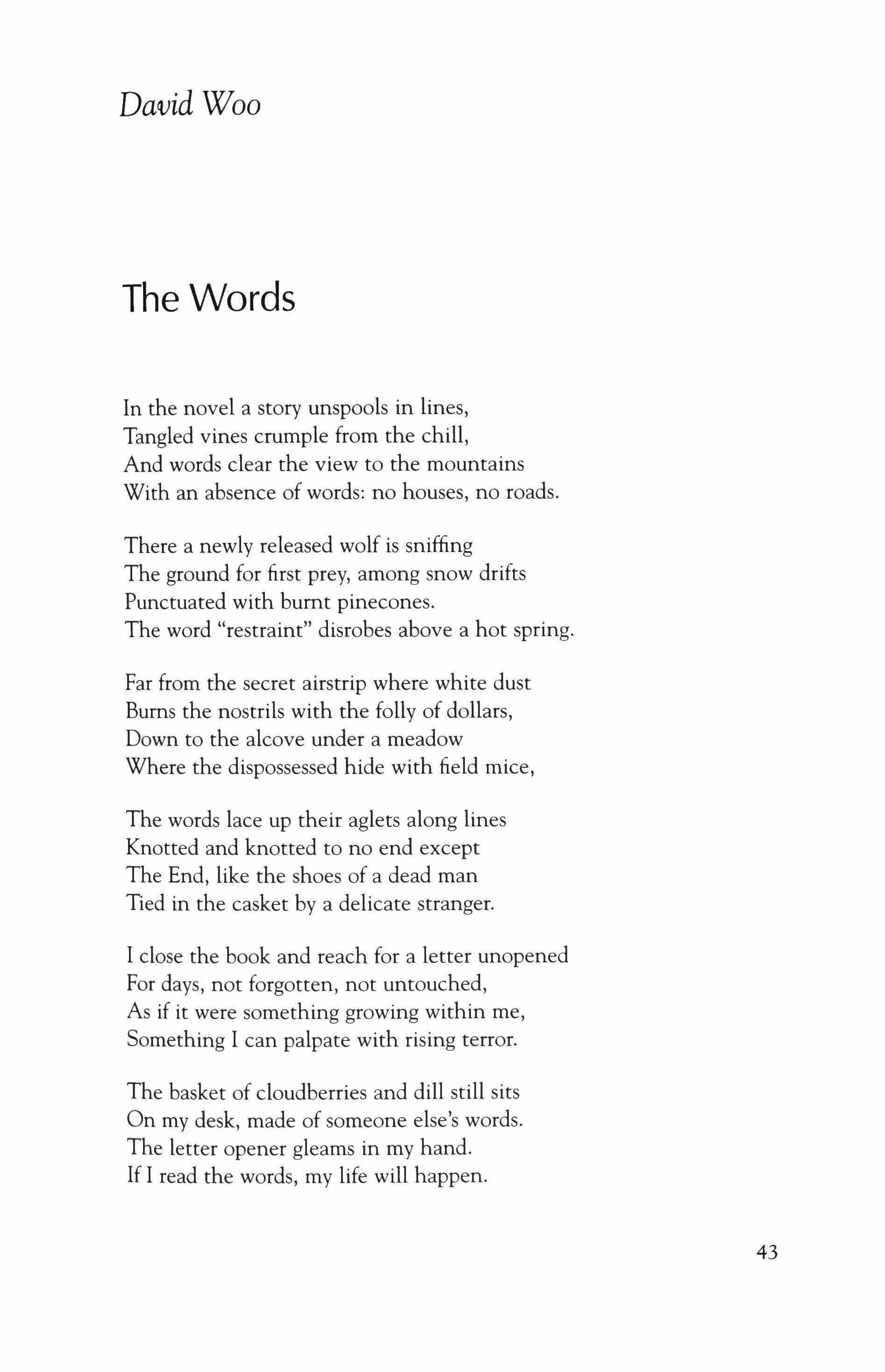
The Words
In the novel a story unspools in lines, Tangled vines crumple from the chill, And words clear the view to the mountains
With an absence of words: no houses, no roads.
There a newly released wolf is sniffing
The ground for first prey, among snow drifts
Punctuated with burnt pinecones.
The word "restraint" disrobes above a hot spring.
Far from the secret airstrip where white dust
Bums the nostrils with the folly of dollars, Down to the alcove under a meadow
Where the dispossessed hide with field mice,
The words lace up their aglets along lines
Knotted and knotted to no end except The End, like the shoes of a dead man
Tied in the casket by a delicate stranger.
I close the book and reach for a letter unopened For days, not forgotten, not untouched, As if it were something growing within me, Something I can palpate with rising terror.
The basket of cloudberries and dill still sits
On my desk, made of someone else's words.
The letter opener gleams in my hand.
If I read the words, my life will happen.
43
On Refusing to Be on the Make
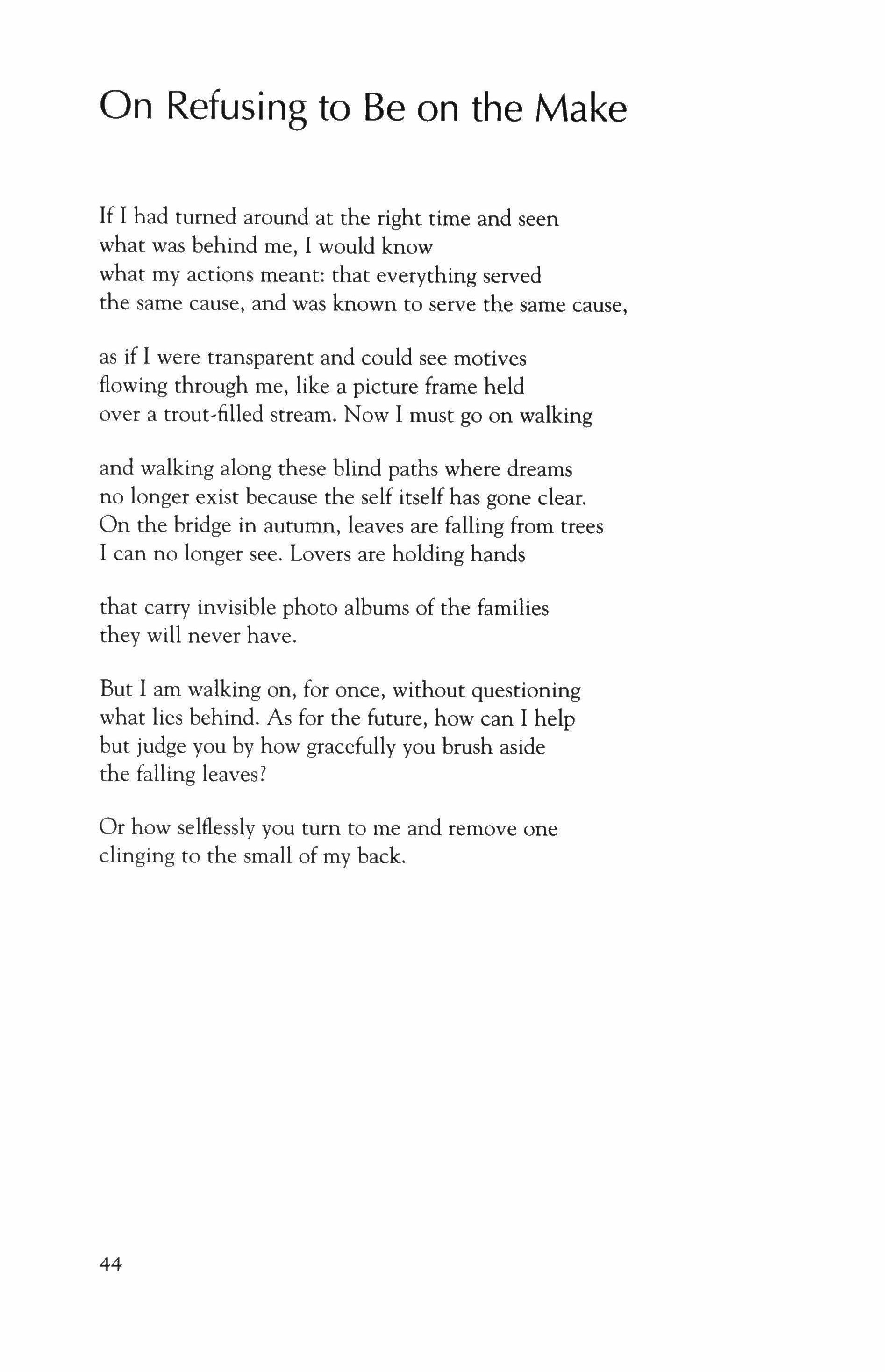
If I had turned around at the right time and seen what was behind me, I would know what my actions meant: that everything served the same cause, and was known to serve the same cause, as if I were transparent and could see motives flowing through me, like a picture frame held over a trout-filled stream. Now I must go on walking and walking along these blind paths where dreams no longer exist because the self itself has gone clear. On the bridge in autumn, leaves are falling from trees I can no longer see. Lovers are holding hands that carry invisible photo albums of the families they will never have.
But I am walking on, for once, without questioning what lies behind. As for the future, how can I help but judge you by how gracefully you brush aside the falling leaves?
Or how selflessly you tum to me and remove one clinging to the small of my back.
44
Richard Burgin

A Letter in Las Vegas
Because their words had forked no lightning.
Dylan Thomas
The letter he emailed to your hotel a few hours after your conversation lay on the bed beside you and just looking at the exclamation points that recurred fugue-like throughout it made you resist reading it again. But what other choice did you have? For nearly forty-eight hours the same hideous "horror movie" of two nights ago had been playing repeatedly in your mind, the "movie" that had made you call your brother and him write you in the first place. The only other option to escape it was the TV in your room but it had just three unwatchable channels working so it wasn't really an option at all. You knew that Sid, at the front desk, who you'd paid to misinform your brother, wouldn't fix it. He'd already promised to send someone up twice but no one had come.
You picked up the letter. It was odd-you avoided someone and then you found yourself scrutinizing their letter.
"Darren, I'm going to write you very candidly," it began. "There's no question of pride anymore as there often was between us-I'm far too scared for that! You need to come home now, you know that. If you don't, it would be the worst, most self-destructive thing you could do!
"You told me once that you sometimes think of me as the police you keep trying to outrun or outwit as if my goal is to arrest you rather than
45
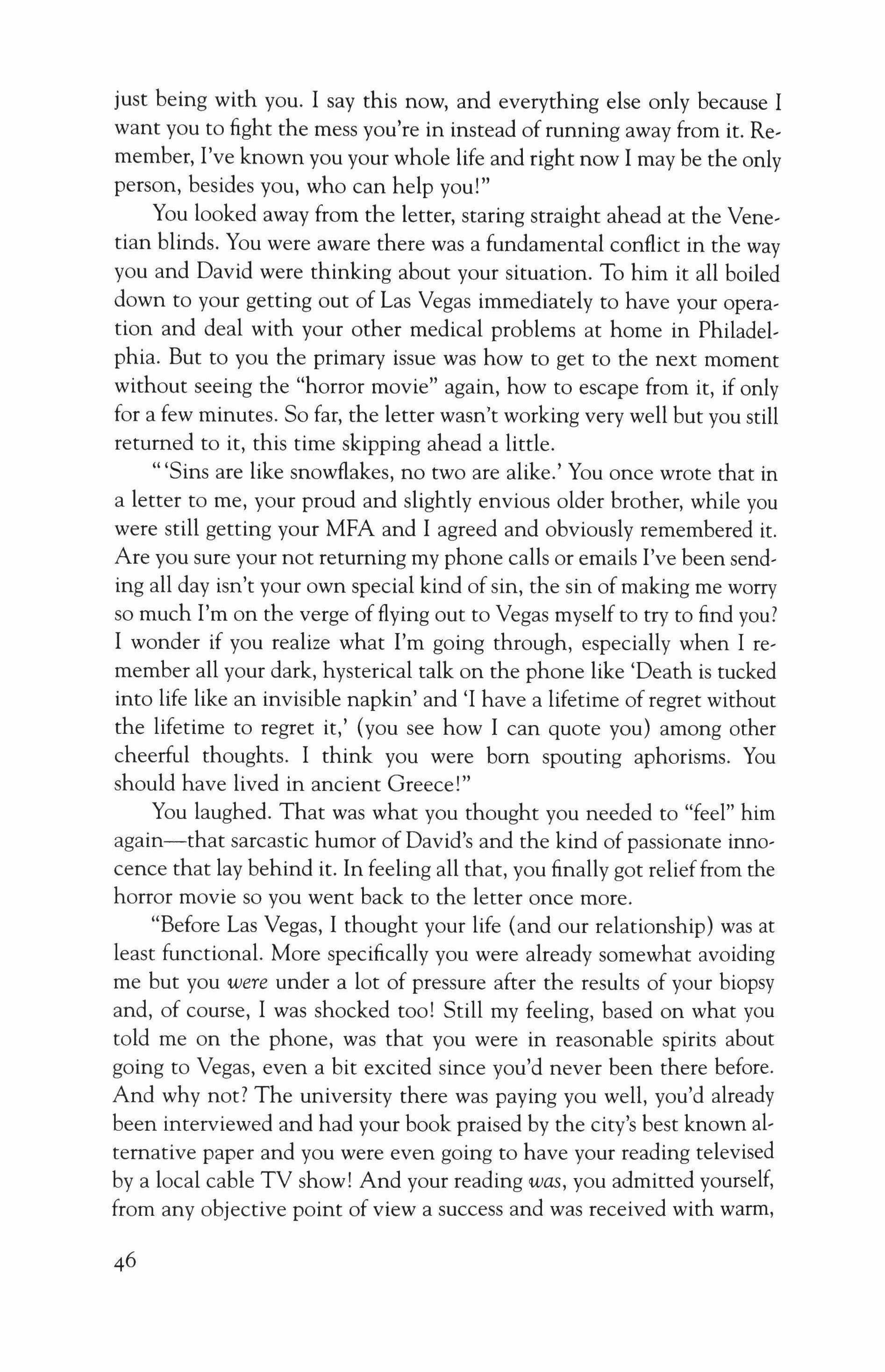
just being with you. I say this now, and everything else only because I want you to fight the mess you're in instead of running away from it. Remember, I've known you your whole life and right now I may be the only person, besides you, who can help you!"
You looked away from the letter, staring straight ahead at the Venetian blinds. You were aware there was a fundamental conflict in the way you and David were thinking about your situation. To him it all boiled down to your getting out of Las Vegas immediately to have your operation and deal with your other medical problems at horne in Philadelphia. But to you the primary issue was how to get to the next moment without seeing the "horror movie" again, how to escape from it, if only for a few minutes. So far, the letter wasn't working very well but you still returned to it, this time skipping ahead a little.
'''Sins are like snowflakes, no two are alike.' You once wrote that in a letter to me, your proud and slightly envious older brother, while you were still getting your MFA and I agreed and obviously remembered it. Are you sure your not returning my phone calls or emails I've been sending all day isn't your own special kind of sin, the sin of making me worry so much I'm on the verge of flying out to Vegas myself to try to find you? I wonder if you realize what I'm going through, especially when I remember all your dark, hysterical talk on the phone like 'Death is tucked into life like an invisible napkin' and 'I have a lifetime of regret without the lifetime to regret it,' (you see how I can quote you) among other cheerful thoughts. I think you were born spouting aphorisms. You should have lived in ancient Greece!"
You laughed. That was what you thought you needed to "feel" him again-that sarcastic humor of David's and the kind of passionate innocence that lay behind it. In feeling all that, you finally got relieffrom the horror movie so you went back to the letter once more.
"Before Las Vegas, I thought your life (and our relationship) was at least functional. More specifically you were already somewhat avoiding me but you were under a lot of pressure after the results of your biopsy and, of course, I was shocked too! Still my feeling, based on what you told me on the phone, was that you were in reasonable spirits about going to Vegas, even a bit excited since you'd never been there before. And why not? The university there was paying you well, you'd already been interviewed and had your book praised by the ciry's best known alternative paper and you were even going to have your reading televised by a local cable TV show! And your reading was, you admitted yourself, from any objective point of view a success and was received with warm,

spontaneous applause. It was a kind of grand slam-like winning all the literary slots. Also, you said, your host from the English department there couldn't have been nicer and more solicitous. You said you two had met at a convention the year before and immediately taken a liking to each other. You see how I remember everything you tell me! I even remember you said he looked like you with his mustache and hair still dark {one way or another}. Already, he'd gotten you a ticket to one of the Cirque de Soleil shows playing at the Strip for the night after your reading. At the airport, filled with slot machines and showgirls, he gave you a warm hug."
You could see and even feel that hug from Bennet again but with it the image of David suddenly faded to extinction and the horror movie came rushing back. You let the letter flutter to the floor then like a giant, indoor, Vegas snowflake. You felt betrayed because you'd hoped the letter would give you an escape by making you think of your brother. Instead, it only restimulated and intensified your Last Vegas memories. Moreover, you were too tired and overwhelmed to struggle against that now and had already surrendered to the idea of going over everything in the movie one more time in the hopes of finally exhausting it. You were still seeing and feeling the hug-whether you closed your eyes or notand hearing Bennet say once more during your drive into town, "I'm sorry we couldn't get you a better hotel, but at least it's within walking distance of the Strip."
You remember that you actually thought the hotel charming. With its low to the ground design, earth tone colors, palm trees, and outdoor swimming pool it reminded you of a California hotel. Your brother was right in a way-all things considered, you were in pretty good spirits when you arrived. David was a lawyer and was careful and often accurate, though in a limited sense, with his observations. For instance, from an "objective" point of view your reading was a success. There was a good-sized crowd {considering your books aren't commercial and you were reading from a short story collection}, "spontaneously warm applause" and then the added glamorous touch of those cable TV cameras focusing on you. All of this was heady stuff for you who were used to twenty or thirty people at most of your readings and naturally this gratified you. You even remembered wishing David were at this reading, as he had often been before in lieu of your professionally preoccupied parents. But it was also equally true, and this David would never understand, that on another level the "warm applause" tortured you, that what you wanted instead was a shocked explosion from the audience
47

because you wanted to change their lives, not just make them appreciate another "good" writer. Though you never felt this when you went to other writers' readings, that was no consolation at all. Because you didn't transform your audience in any way, you felt a kind of depression gnawing at you. Given your age and your cancer you probably never would, so you looked to women, once again, to give you an injection of the kind of excitement your work had once more failed to provide. You didn't have to wait too long.
After the reading, Bennet took you to dinner at a Thai restaurant with a group of university professor/writers and a couple of graduate students. One of the students was a part Thai, part American named Maya. She was quite pretty and energetic with a secretive side that appealed to you. You were attracted to her but she was young enough to be your daughter so you were careful not to let yourself get too encouraged. But soon she mentioned a quasi-famous poet/professor old enough to be your father, who had once taught both of you, albeit at different times and at different universities, and she said twice that the whole term she'd had a mad crush on him. From that moment on (as the song goes) you virtually ignored the other people at the table and focused on her.
Because of the fear you had after learning your biopsy results and the torturous decision you had to make about what kind of treatment to pursue for your prostate cancer, you were on a new medication for anxiety that gave you a kind of instant social courage. You also had two or three drinks. She was drinking, too, though less ardently than you, but seemed eager enough to answer all your questions. She said she was lonely and felt completely disconnected from Las Vegas. She didn't even know how to drive. She'd been living near Boston before, where driving a car wasn't that important. She went to the university at Las Vegas a year and a half ago because she'd won a fellowship there, which was now essentially what she was living off.
"That's why I didn't buy your book," she said, a little ruefully.
You told her that, of course, you would give her a copy of your book. You said, don't you have lots of friends, perhaps you also said "admirers" in an obvious allusion to how attractive she was (though she was definitely more attractive in a New England than a Vegas kind of way). She said she stayed home almost every night, and had never even seen much of the Strip. She'd had a hard enough time adjusting to Boston once she came to the States but the Vegas sensibility was still alien to her. Interesting to observe, she said, but impossible to feel at home in.
"But what will you do? You have to get out of here." (Come with
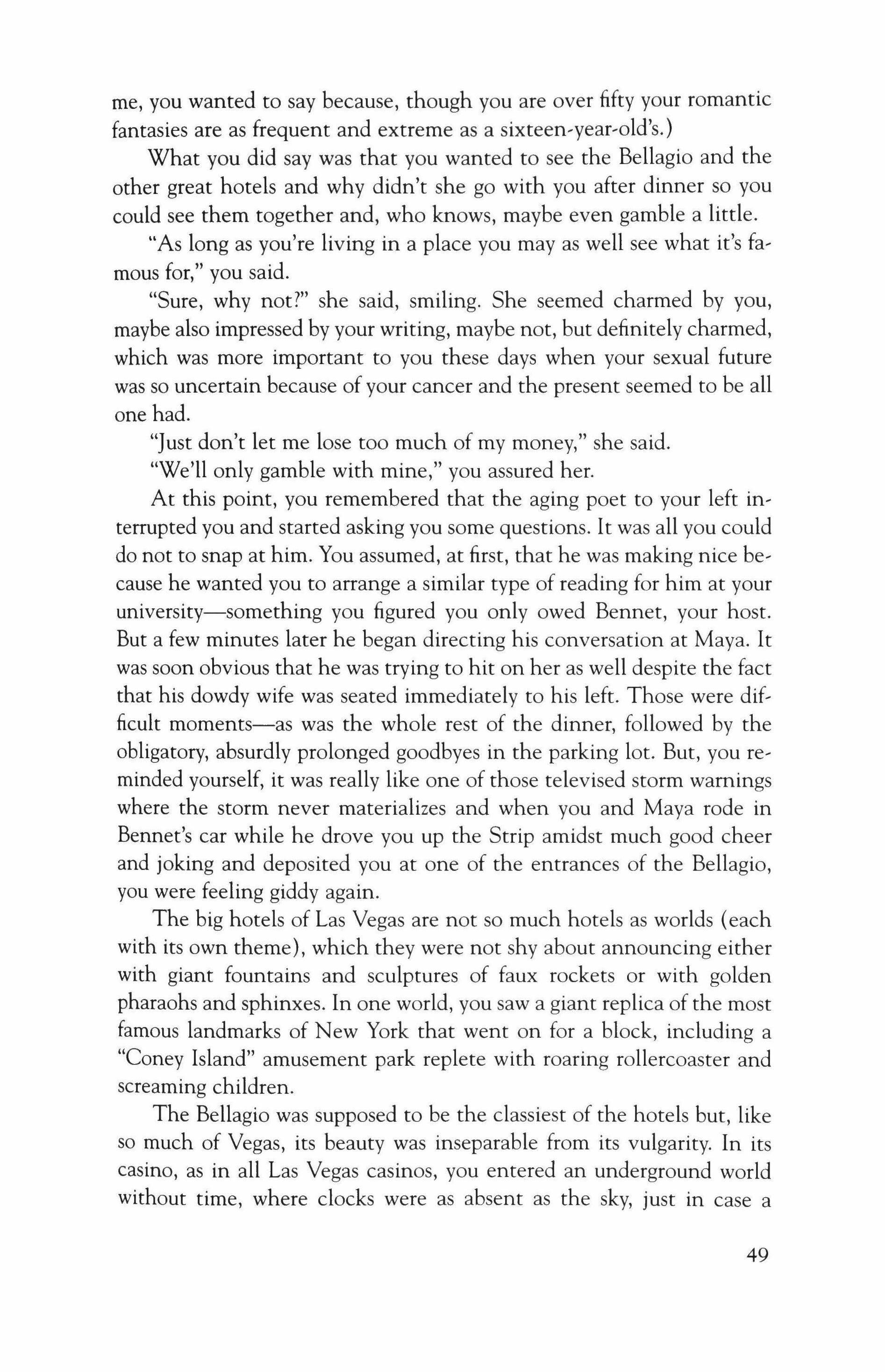
me, you wanted to say because, though you are over fifty your romantic fantasies are as frequent and extreme as a sixteen-vear-old's.)
What you did say was that you wanted to see the Bellagio and the other great hotels and why didn't she go with you after dinner so you could see them together and, who knows, maybe even gamble a little.
"As long as you're living in a place you may as well see what it's famous for," you said.
"Sure, why not?" she said, smiling. She seemed charmed by you, maybe also impressed by your writing, maybe not, but definitely charmed, which was more important to you these days when your sexual future was so uncertain because of your cancer and the present seemed to be all one had.
"Just don't let me lose too much of my money," she said.
"We'll only gamble with mine," you assured her.
At this point, you remembered that the aging poet to your left interrupted you and started asking you some questions. It was all you could do not to snap at him. You assumed, at first, that he was making nice because he wanted you to arrange a similar type of reading for him at your university-something you figured you only owed Bennet, your host. But a few minutes later he began directing his conversation at Maya. It was soon obvious that he was trying to hit on her as well despite the fact that his dowdy wife was seated immediately to his left. Those were difficult moments-as was the whole rest of the dinner, followed by the obligatory, absurdly prolonged goodbyes in the parking lot. But, you reminded yourself, it was really like one of those televised storm warnings where the storm never materializes and when you and Maya rode in Bennet's car while he drove you up the Strip amidst much good cheer and joking and deposited you at one of the entrances of the Bellagio, you were feeling giddy again.
The big hotels of Las Vegas are not so much hotels as worlds (each with its own theme), which they were not shy about announcing either with giant fountains and sculptures of faux rockets or with golden pharaohs and sphinxes. In one world, you saw a giant replica of the most famous landmarks of New York that went on for a block, including a "Coney Island" amusement park replete with roaring rollercoaster and screaming children.
The Bellagio was supposed to be the classiest of the hotels but, like so much of Vegas, its beauty was inseparable from its vulgarity. In its casino, as in all Las Vegas casinos, you entered an underground world without time, where clocks were as absent as the sky, just in case a
49

knowledge or even dim awareness of time might distract the gamblers from the steady stream of money they were pumping into the slots or black jack tables.
The two of you walked around this maze, alternately appalled and delighted. You walked almost a mile before settling at a little bar at a far end of the casino. It was clear by now that neither of you had an interest in gambling but you wanted to drink, and even more to have her drink.
"Well," you said, indicating the giant space around you, "bright lights, big city."
She laughed and, naturally, you liked that.
You finally persuaded her to drink a Manhattan. You joined her with another vodka tonic. Since there was so little alcohol in the drinks you knew it would take a while to loosen her up. You began to ask her questions, specifically about her childhood, then, later, after her second drink, about her past love life. Like most lonely people she was eager to talk and was soon describing life in a rural Thai village. You told yourself to listen closely, to really try to understand this person but it was difficult, like listening to someone explain how to do a puzzle without being able to quite understand where to put a few key pieces. It was not that her story was boring or without revelations. You could sense, for example, when she described her intensely ambivalent relationship with her American father who'd died of a heart attack a few years ago why she gravitated towards older men. You tried harder to concentrate as she described her few lovers, including the main one with whom she'd broken up and reconciled a number of times and who still called her. He was a foreigner-part Oriental, part Hispanic. She told you more than once where he was from, as well as his name, but you couldn't remember either no matter how angry it made you not to know. You thought ofhow Maya lived in a separate continent from you because ofher background and age. Then you started thinking about the invisible life of your cells and the way they'd turned against you in your prostate and tried to remember something David had written you about courage. That made you take another drink. You put your hand on her shoulder, briefly touched her hair. She didn't respond although she didn't say or do anything to stop you.
Finally, you paid for the drinks and said, "Let's take a walk." The bartender was starting to talk too much to Maya-as if he were the son of the professor/poet in the restaurant-and you were relieved when she said she wanted to walk too.
50
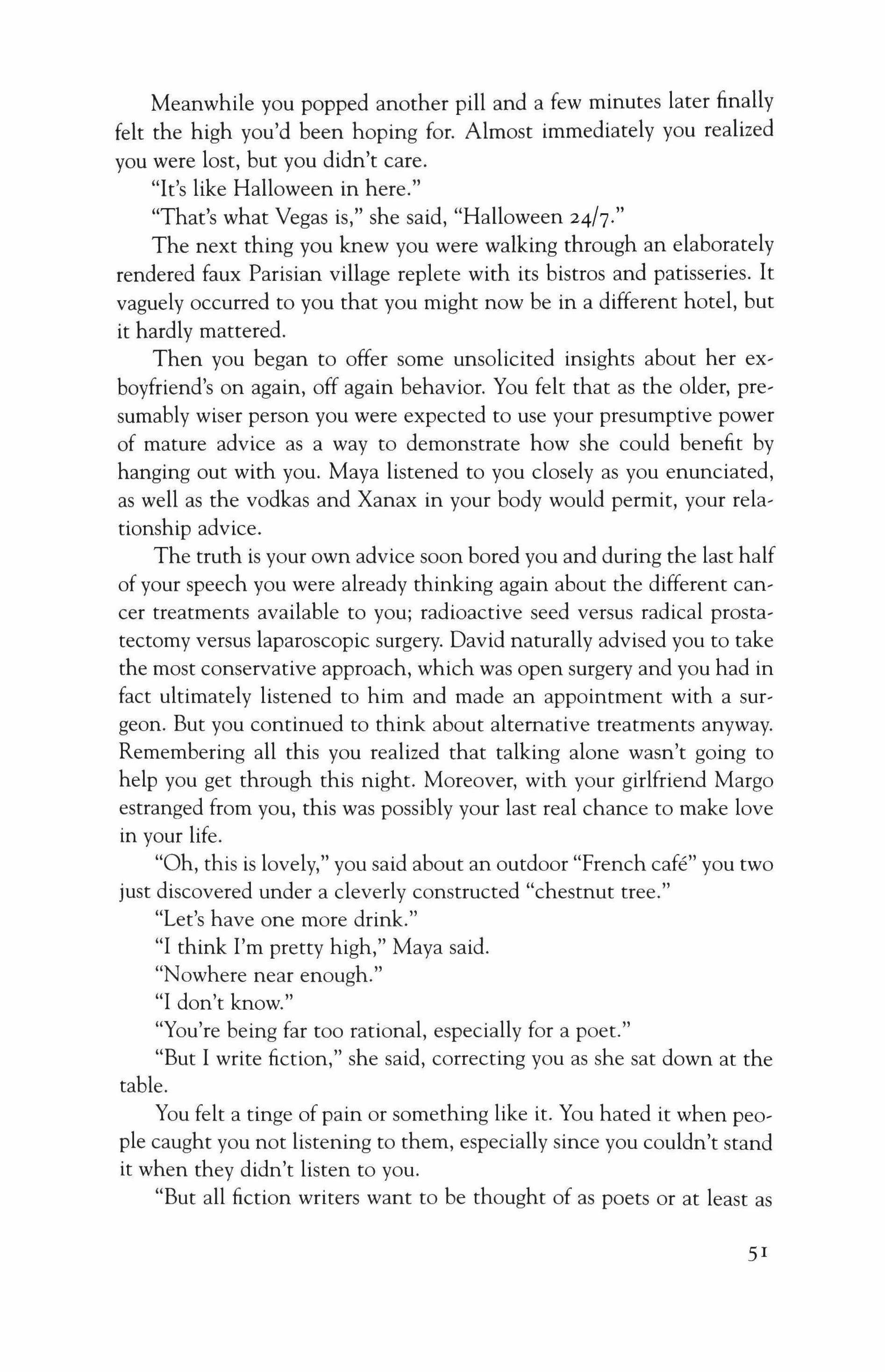
Meanwhile you popped another pill and a few minutes later finally felt the high you'd been hoping for. Almost immediately you realized you were lost, but you didn't care.
"It's like Halloween in here."
"That's what Vegas is," she said, "Halloween 2417."
The next thing you knew you were walking through an elaborately rendered faux Parisian village replete with its bistros and patisseries. It vaguely occurred to you that you might now be in a different hotel, but it hardly mattered.
Then you began to offer some unsolicited insights about her ex, boyfriend's on again, off again behavior. You felt that as the older, pre' sumably wiser person you were expected to use your presumptive power of mature advice as a way to demonstrate how she could benefit by hanging out with you. Maya listened to you closely as you enunciated, as well as the vodkas and Xanax in your body would permit, your relationship advice.
The truth is your own advice soon bored you and during the last half of your speech you were already thinking again about the different can, cer treatments available to you; radioactive seed versus radical prostatectomy versus laparoscopic surgery. David naturally advised you to take the most conservative approach, which was open surgery and you had in fact ultimately listened to him and made an appointment with a sur, geon. But you continued to think about alternative treatments anyway. Remembering all this you realized that talking alone wasn't going to help you get through this night. Moreover, with your girlfriend Margo estranged from you, this was possibly your last real chance to make love in your life.
"Oh, this is lovely," you said about an outdoor "French cafe" you two just discovered under a cleverly constructed "chestnut tree."
"Let's have one more drink."
"I think I'm pretty high," Maya said.
"Nowhere near enough."
"I don't know."
"You're being far too rational, especially for a poet."
"But I write fiction," she said, correcting you as she sat down at the table.
You felt a tinge of pain or something like it. You hated it when people caught you not listening to them, especially since you couldn't stand it when they didn't listen to you.
"But all fiction writers want to be thought of as poets or at least as
51

being poetic," you said, trying to recover. "Wasn't it Faulkner who said 'every novelist is a failed poet'?"
She laughed. "That's a good saying. Did you used to write poetry too?"
"Oh sure. Wrote it, failed at it, abysmally, then gave it up permanently for fiction at which I also failed, though less spectacularly."
She laughed. She was on your side again and soon agreed to have a drink. You realized now that you not only were attracted to her but liked her too and you reached across the table and touched her hair. She let you, at least for a few seconds, then the waitress appeared, with half her tits showing, took your order for drinks, and everything seemed right for a moment.
But nothing ever stayed the same in Vegas for very long, as if each roll of the dice revealed how time changed every moment. It was like cancer that way, too, although cancer changed much more slowly, at least in the beginning.
You waited till you were both through with your next drinksensing that at last she was high-before you touched her hair again and part of her face. She didn't respond as you hoped but she let you do it. You pictured your hotel room with its pathetic television and you knew you needed her there with you-could already picture what you'd do in bed together.
"I really like you," you said. "Do you think you like me?"
She hesitated-and you decided not to let her answer.
"As soon as we started talking in the restaurant I sensed a connection between us, didn't you?" you said, appalled by how trite you sounded.
She half nodded and finished her drink.
"It's so rare that that happens so I think you have to act upon it when it does. It's just crazy and tragic really when people don't. I mean we're all gonna die in such a short time-yet people hold back out of fear and pride-that's the insanity of it."
You were aware that you were rambling and still sounded like an old hippie but in a way you thought that might help win her over-to show her that inside, once she got past your aging face and body you were young and in certain ways even younger than her.
"Don't you feel that way about me too? Tell me the truth."
"I feel a connection
"Good, me too," you said, touching her just above her knee.
"Can I ask you something?" she said.

"Sure."
"How old are you?"
It was, of course, the worst question she could have asked. You wanted to yell at her, There's no time here so why are you asking me that?
"Oh God, let's see, I think I'm 2006," you said, making her laugh. "Hey, it's getting really hot in here, have you noticed? Let's take a walk, okay? Let's take a walk together."
So after you both finished your drinks and you paid up you two started walking again through the remains of the French village. But walking wasn't really what you wanted to do and soon you began putting your hands on her and telling her how much you liked her again.
"I think that's your drink talking," she said, slipping away from you. "I think you're just very high."
"No," you protested. "Just very attracted to you."
She was walking ahead of you and you struggled to catch up.
"I have to get home now," she said, avoiding your eyes. "It's getting late."
You saw then that it was hopeless and told her you'd get her a cab. Then you asked a couple of people how to get out of the hotel and set about trying to follow their directions.
It's amazing how quickly people disappear-first from your sight, then from your mind (which takes a little"longer) and then from the earth itself.
You were outside the Bellagio waiting for a cab. The strange beauty of the Strip flared up at you-the lights and trees and fountains.
You both commented on it before you got in the taxi.
You wouldn't touch her again, you wouldn't put either of you through that. Instead you sat a polite distance apart and asked a few more questions about her school and thought about your cancer and when it was time for her to get out you actually shook hands with her before getting back in the cab and telling the driver to take you to your hotel, which was a relatively short distance away.
But once you were back inside your room you immediately began to panic. It was so small and forlorn like your own personal section of hell and it only had those three idiotic channels. With nothing to distract you, you began thinking about your different prostate options. If you chose brachytherapy and had the radioactive seeds implanted you might have minimal side effects and if you were one of
53
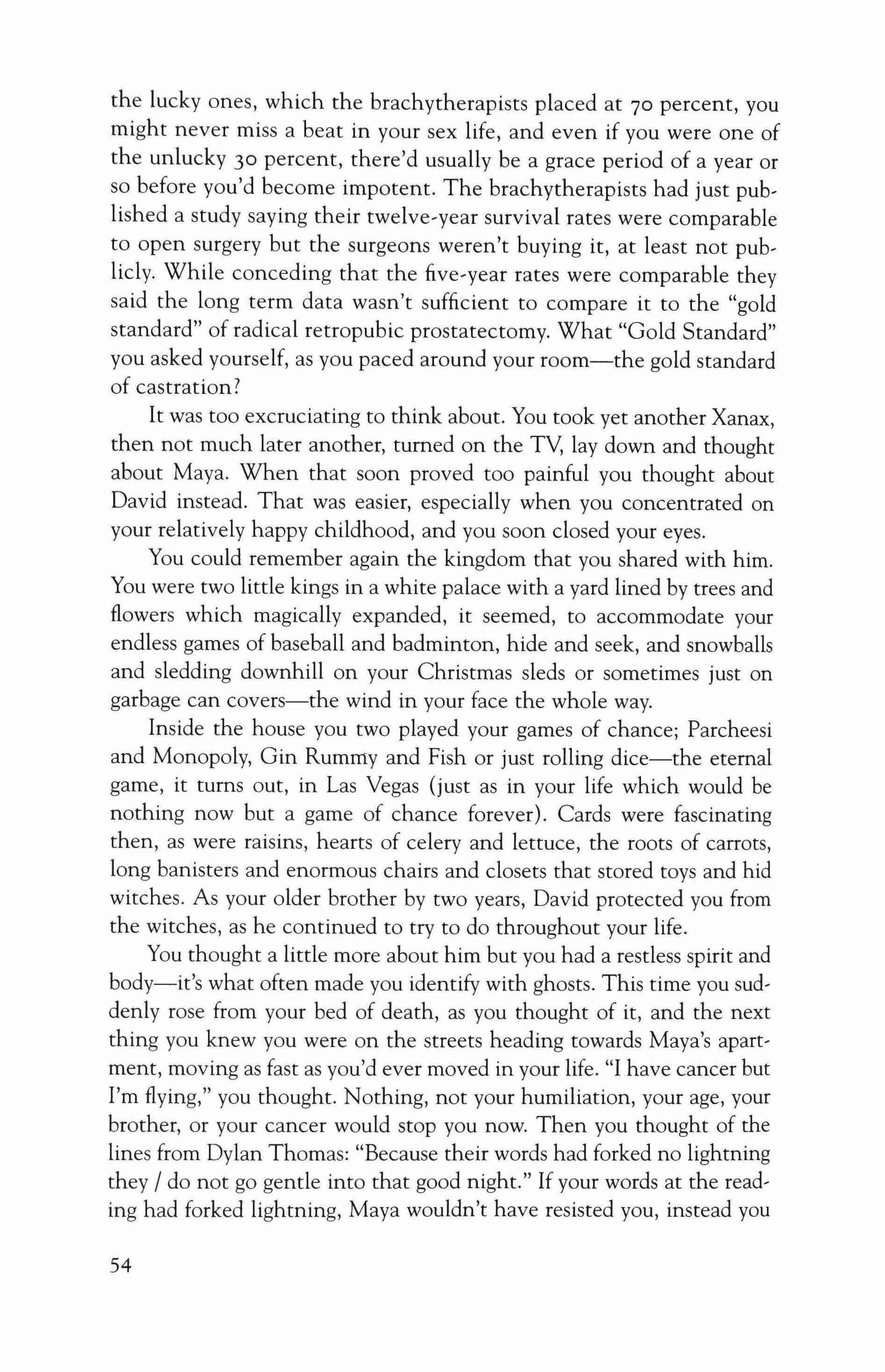
the lucky ones, which the brachytherapists placed at 70 percent, you might never miss a beat in your sex life, and even if you were one of the unlucky 30 percent, there'd usually be a grace period of a year or so before you'd become impotent. The brachytherapists had just published a study saying their twelve-year survival rates were comparable to open surgery but the surgeons weren't buying it, at least not publicly. While conceding that the five-year rates were comparable they said the long term data wasn't sufficient to compare it to the "gold standard" of radical retropubic prostatectomy. What "Gold Standard" you asked yourself, as you paced around your room-the gold standard of castration?
It was too excruciating to think about. You took yet another Xanax, then not much later another, turned on the TV, lay down and thought about Maya. When that soon proved too painful you thought about David instead. That was easier, especially when you concentrated on your relatively happy childhood, and you soon closed your eyes.
You could remember again the kingdom that you shared with him. You were two little kings in a white palace with a yard lined by trees and flowers which magically expanded, it seemed, to accommodate your endless games of baseball and badminton, hide and seek, and snowballs and sledding downhill on your Christmas sleds or sometimes just on garbage can covers-the wind in your face the whole way.
Inside the house you two played your games of chance; Parcheesi and Monopoly, Gin Rummy and Fish or just rolling dice-the eternal game, it turns out, in Las Vegas (just as in your life which would be nothing now but a game of chance forever). Cards were fascinating then, as were raisins, hearts of celery and lettuce, the roots of carrots, long banisters and enormous chairs and closets that stored toys and hid witches. As your older brother by two years, David protected you from the witches, as he continued to try to do throughout your life.
You thought a little more about him but you had a restless spirit and body-it's what often made you identify with ghosts. This time you suddenly rose from your bed of death, as you thought of it, and the next thing you knew you were on the streets heading towards Maya's apartment, moving as fast as you'd ever moved in your life. "I have cancer but I'm flying," you thought. Nothing, not your humiliation, your age, your brother, or your cancer would stop you now. Then you thought of the lines from Dylan Thomas: "Because their words had forked no lightning they / do not go gentle into that good night." If your words at the reading had forked lightning, Maya wouldn't have resisted you, instead you
54
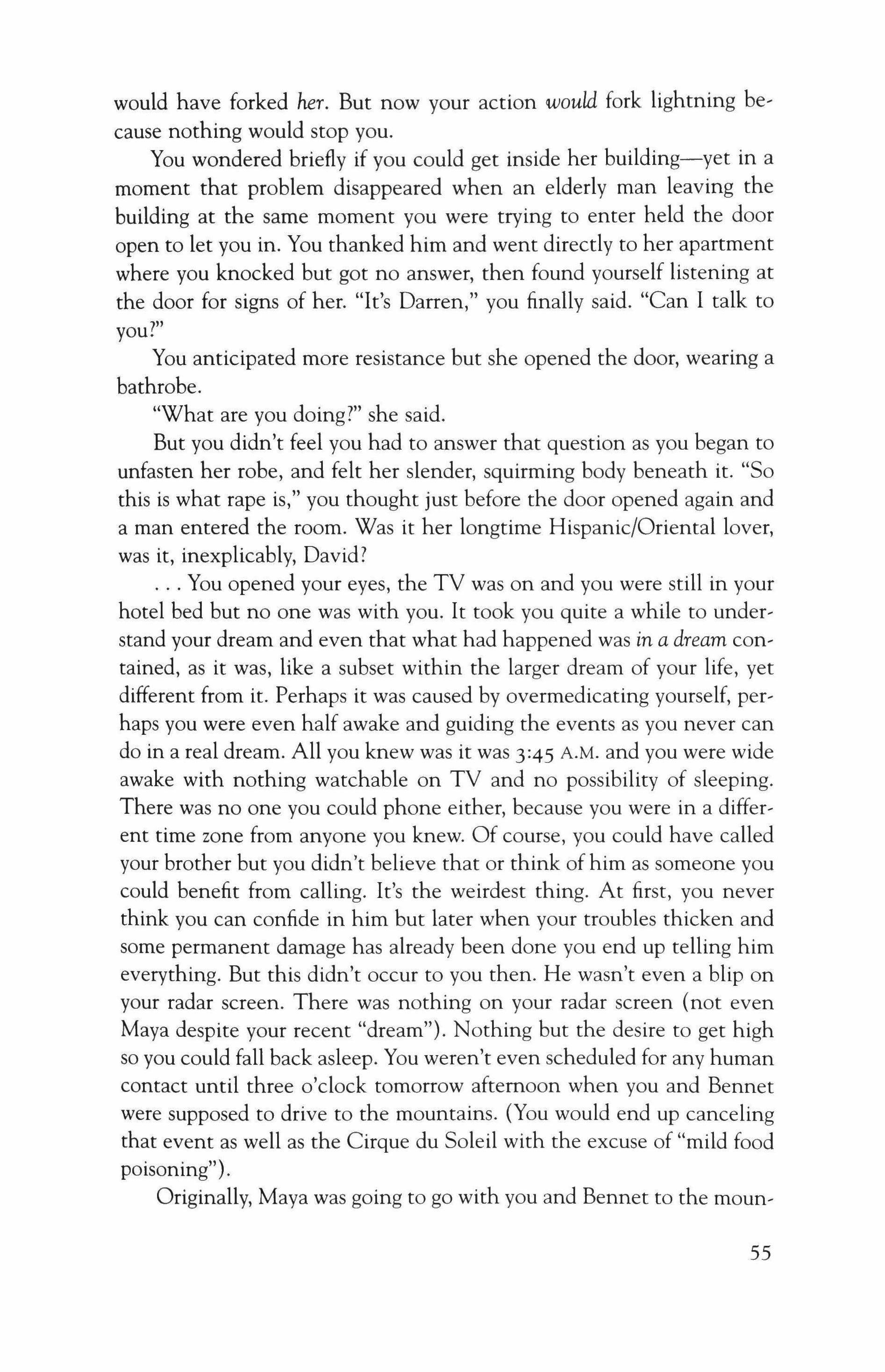
would have forked her. But now your action would fork lightning because nothing would stop you.
You wondered briefly if you could get inside her building-yet in a moment that problem disappeared when an elderly man leaving the building at the same moment you were trying to enter held the door open to let you in. You thanked him and went directly to her apartment where you knocked but got no answer, then found yourself listening at the door for signs of her. "It's Darren," you finally said. "Can I talk to you?"
You anticipated more resistance but she opened the door, wearing a bathrobe.
"What are you doing?" she said.
But you didn't feel you had to answer that question as you began to unfasten her robe, and felt her slender, squirming body beneath it. "So this is what rape is," you thought just before the door opened again and a man entered the room. Was it her longtime Hispanic/Oriental lover, was it, inexplicably, David?
You opened your eyes, the TV was on and you were still in your hotel bed but no one was with you. It took you quite a while to understand your dream and even that what had happened was in a dream contained, as it was, like a subset within the larger dream of your life, yet different from it. Perhaps it was caused by overmedicating yourself, perhaps you were even half awake and guiding the events as you never can do in a real dream. All you knew was it was 3:45 A.M. and you were wide awake with nothing watchable on TV and no possibility of sleeping. There was no one you could phone either, because you were in a different time zone from anyone you knew. Of course, you could have called your brother but you didn't believe that or think of him as someone you could benefit from calling. It's the weirdest thing. At first, you never think you can confide in him but later when your troubles thicken and some permanent damage has already been done you end up telling him everything. But this didn't occur to you then. He wasn't even a blip on your radar screen. There was nothing on your radar screen (not even Maya despite your recent "dream"). Nothing but the desire to get high so you could fall back asleep. You weren't even scheduled for any human contact until three o'clock tomorrow afternoon when you and Bennet were supposed to drive to the mountains. (You would end up canceling that event as well as the Cirque du Soleil with the excuse of "mild food poisoning").
Originally, Maya was going to go with you and Bennet to the moun-
55

tains but there was little chance of that now. Sizing everything up, you put your clothes on, including your new brown leather jacket because it made you feel tough and confident, rinsed your mouth, swallowed a Viagra and hit the streets.
When you were first dropped off at your hotel and had a few hours to kill before your reading you'd walked around your neighborhood and noticed three things: all the free sex flyers in the newspaper stands with photos of various girls who would "dance" for you in your room (you collected quite a number of those), a couple of hookers walking the street who looked like crack whores, and a twenty-four-hour convenience store where they sold alcohol. You cursed yourself for not thinking ahead and buying something to drink earlier-although the refrigerator in your room wasn't working so whatever you drank would be warm.
You bought a couple of large cans of beer and started walking back to your room when you saw a hooker. She was black and a little chunky and the two of you walked up to each other simultaneously. She said her name was Pandora. Her blouse was low cut and her belly button was sticking out but otherwise there was nothing whorish about her. She was overweight and not much more than average looking, though of course she was young enough to be your daughter and therefore attractive for that reason alone.
"I got a room at a hotel a couple blocks from here," you said. When she asked you what you wanted to do you said you just wanted to spend some time with her.
"I cost a hundred an hour."
"OK. You got some weed? I need to get high to get back to sleep."
"I got something."
"Great," you said. "My name is Darren."
"That's a nice jacket," she said, rubbing her fingers up and down one of your arms. You were doubly glad now that you wore it.
"Follow a little behind me till we get to my hotel, okay?"
"No problem."
While you were walking you wondered if you were doing anything wrong about Margo-your probably ex-girlfriend-and decided that given all the fights and things you'd said to each other, especially since your cancer, the relationship was definitely broken forever just like your penis would soon be broken no matter what treatment you chose. David, of course, had lived very differently than you-getting married and spending so many years with the same woman but he'd wound up divorced, alone, and childless like you so what was the difference? At
56

any rate, you thought of a form of sex not involving intercourse where Pandora wouldn't even have to touch your penis. You thought of it in a general way and by the time you got to your room through a side entrance to the hotel-a gate that your key could open-you had essentially finalized the details.
"You wanna pay me a hundred up front?"
If you paid her thinking you would get right to the sex idea you had that would protect you and conceivably Margo, in the unlikely event you ever saw her again, but Pandora noticed the book you'd read from at the university on the floor. Your picture, from a number of years ago, was on the back cover.
"You write this book?" she said.
"I plead guilty."
"That your picture there?"
"From a younger, happier time. This way my readers will think I'm younger. You see, in my books I never age."
"That's smart. You make some money from it?"
"Not very much. It's gotten some good reviews though," you couldn't resist mentioning.
"Read me something from the book," she'd said. "I don't read too good."
You read a few pages and just as you were beginning to get into it you could see that she was losing interest.
"So, you get the general idea," you said, closing the book.
She nodded sullenly. She didn't seem impressed.
"So you got some pot or "Right here, mister," she said, handing you a crudely made pipe with tin foil or something like it around the opening.
"What is this? Is this crack?" you said, as you inhaled. You'd never smoked crack, at least not knowingly, but you were desperate to get high.
She shrugged sullenly again as if it were too much trouble to answer your question.
"You ain't smoking it right, mister. You not inhaling it right. You're wasting it," she said angrily, as if you'd committed a crime. "Here," she said, taking the pipe from you, "like this."
You tried to imitate her but she still seemed to disapprove. Nevertheless you felt something good, though it went away after a minute.
You told her about your sex idea and she agreed to it and told you the price. She did it for a little while-but you weren't able to come, not
57

even close. You were thinking about the crack that filled you with such a rich feeling for a minute.
"Let's smoke some more," you said.
According to her, you did it wrong again but you felt a blissful high for a few minutes during which you not only became affectionate but started talking to her in your seriously earnest, old hippie way about "throwing away our masks" and "getting to the essence" of each other. But just as you felt your two souls merging your high began to wear off.
"Let's smoke some more," you said.
"We all out mister. I don't got no more."
"Shit," you said. You stood up and paced.
She gave you a funny look then said, "I can get some more. I'll call someone on my cell, the girl I live with, and she'll bring it to the store where I met you."
"Why can't she bring it here?"
"She won't go to no hotel, that's my job. Just give me some money and I'll bring it back to you," Pandora said.
"No, no," you said, still pacing. "I'll go with you. When I see her I'll give you the money."
"Don't you trust me?"
"I just want to do it this way," you said, convinced you were making the only reasonable decision.
She made her phone call and the two of you got dressed. You kept feeling for the fifties in your pocket to be sure they were still there.
When you got outside she said, "I'm cold. Let me wear your jacket."
You took it off and gave it to her. She was a woman, after all, and you'd always been polite to women and always tried to please them your whole life long, even more than you tried to get them to please you. If David saw you do it, he would approve.
You were walking through the outdoor gardens of the hotel. The leaves blown by the wind made you think of radioactive seeds. You thought you were walking fast but she was walking ahead of you and you had to constantly increase your speed to keep up with her.
You felt a little cold without your jacket but were glad you'd given it to her-especially considering how skimpily she was dressed.
When you reached the convenience store you pulled up next to her.
"When will she be here?" you said.
"She in the store already. You stay outside. You'll make her nervous.
"Why? Why can't I go in the store?"
58

"I told you, that ain't the deal. Don't worry, I'll be back in a minute."
You let her go then or, more probably, she simply walked ahead of you into the store and you paced around and waited on the sidewalk in front of the door. Time slowed down then like music suddenly getting slower or maybe it was just that you started thinking about your cancer again. A moment later you walked into the store and saw Pandora talking with a fatter, Hispanic looking woman in a big white sweater.
As soon as Pandora saw you, she started walking towards the door, her friend walking just ahead of her. Pandora gave you a dirty look, while the friend ignored you.
"Did you get it?" you said, but Pandora said nothing until you got out on the street.
"You wait here, it's in her car."
You stood still, confused for a second. On the one hand it made sense that her roommate didn't want to deal with you-a stranger-in anything to do with drugs, so for a while you did as you were told and waited. Then you thought about your three-hundred-dollar jacket that Pandora was still wearing and you started walking after them, then running. You saw them get into a white station wagon, caught a glimpse of the Hispanic woman who looked at you through the window with a kind of serenely sad expression before they sped away up the street.
You were alone again, without your jacket. You were too dazed to be angry but soon you were angry. You remember thinking that you couldn't end the night that way getting ripped off like that, losing the jacket that you'd bought to wear in Vegas because, in spite of your cancer, it made you feel important in some vague way.
A few minutes went by. You realized you were walking to your hotel as if the whores might still meet you there, then walking back to the store as if they might come back to you in the station wagon. It took that long before you realized you really had been robbed.
Then you remembered the other crack whore you saw during your walk (before your reading) in the afternoon. Thin and almost demented looking like a zombie-yet she'd smiled at you and you were surprised to discover that she had all her teeth.
You found yourself going back to the spot where you remembered seeing her because you knew prostitutes were very territorial so you circled around her spot a couple of times and in a few minutes you saw her again in front of the convenience store with her big, bug-out eyes, birdlike nose and ghost-thin body. She said her name was Robin but she
59

looked more like a sandpiper. She was the homeliest prostitute you'd ever seen yet you were attracted to her in a way simply because she was another resident from the distant continent of youth, young enough to be your daughter again and therefore innocent in a way and sympathetic when she talked. You soon found yourself telling her you'd just been robbed.
"You're not gonna do that to me, are you?" you said.
"No, no, I'm a good person," Robin said.
The negotiations went quickly. As far as you knew, you were sticking to your safe sex plan.
When you were inside the room she saw your book and acted impressed but it now had a bitter memory connected to it because of Pandora, so you quickly changed the subject.
You'd already told her what you wanted her to do and for a hundred dollars she'd agreed to do it. Then, for a while she did do it, but it didn't work. You were on the bed, still a little high, realizing that what you'd instructed her to do wasn't going to give you enough stimulation to come, and that what you really needed to bury this night of escalating failures was to smoke some more till you'd be able to come or at least pass out.
"You got some pot or something else we can smoke?" you said, turning to face her in bed.
"I'll make it up," she said, referring to her pipe, which she suddenly produced like a magician. This in itself didn't surprise you since no one was able to hide more things or make them suddenly appear than hookers-they were all like magicians that way.
You were glad it was crack. You'd never had it before Pandora and the memory of the feeling was still there. You and Robin sat on the bed sharing her hastily improvised crack pipe. She was more patient than Pandora but you were still inept-probably because you were too eager to inhale and also because you had to inhale it differently than marijuana and weren't used to it.
"Wait," she said. "Let me get it first, then you inhale it from my mouth."
This immediately struck you as dangerous--open mouth contact like that-but you couldn't resist getting high from the crack and so your mouths did the transfer three or four times and you did get high. It felt like your first success of the night. It seemed unbelievable to you as you quickly thought of your long history with women and all the times you'd gotten high with them that you'd never taken a really dangerous
60
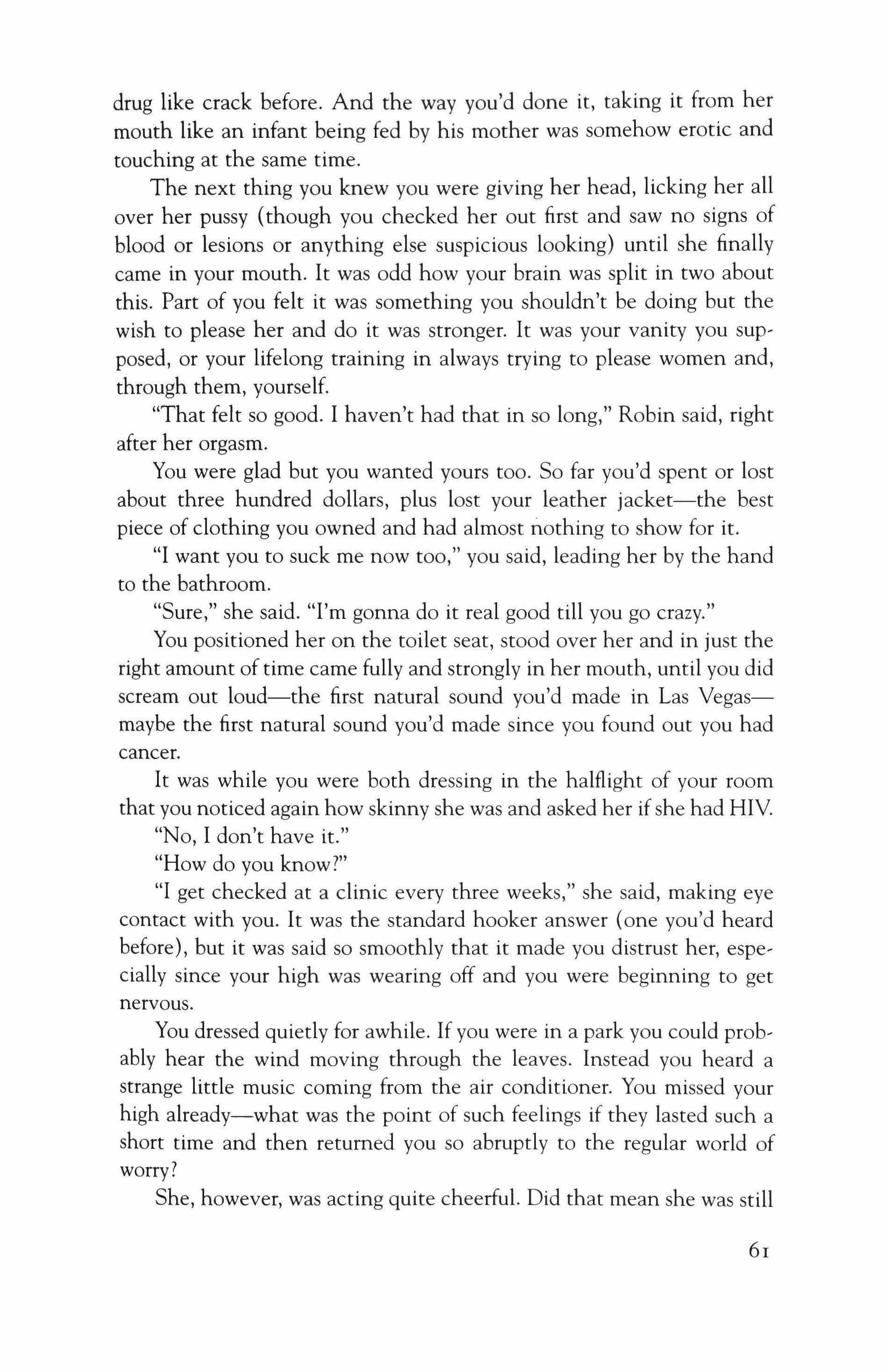
drug like crack before. And the way you'd done it, taking it from her mouth like an infant being fed by his mother was somehow erotic and touching at the same time.
The next thing you knew you were giving her head, licking her all over her pussy (though you checked her out first and saw no signs of blood or lesions or anything else suspicious looking) until she finally came in your mouth. It was odd how your brain was split in two about this. Part of you felt it was something you shouldn't be doing but the wish to please her and do it was stronger. It was your vanity you supposed, or your lifelong training in always trying to please women and, through them, yourself.
"That felt so good. I haven't had that in so long," Robin said, right after her orgasm.
You were glad but you wanted yours too. So far you'd spent or lost about three hundred dollars, plus lost your leather jacket-the best piece of clothing you owned and had almost nothing to show for it.
"I want you to suck me now too," you said, leading her by the hand to the bathroom.
"Sure," she said. "I'm gonna do it real good till you go crazy."
You positioned her on the toilet seat, stood over her and in just the right amount of time came fully and strongly in her mouth, until you did scream out loud-the first natural sound you'd made in Las Vegasmaybe the first natural sound you'd made since you found out you had cancer.
It was while you were both dressing in the halflight of your room that you noticed again how skinny she was and asked her if she had HIY.
"No, I don't have it."
"How do you know?"
"I get checked at a clinic every three weeks," she said, making eye contact with you. It was the standard hooker answer {one you'd heard before}, but it was said so smoothly that it made you distrust her, especially since your high was wearing off and you were beginning to get nervous.
You dressed quietly for awhile. If you were in a park you could probably hear the wind moving through the leaves. Instead you heard a strange little music coming from the air conditioner. You missed your high already-what was the point of such feelings if they lasted such a short time and then returned you so abruptly to the regular world of worry?
She, however, was acting quite cheerful. Did that mean she was still
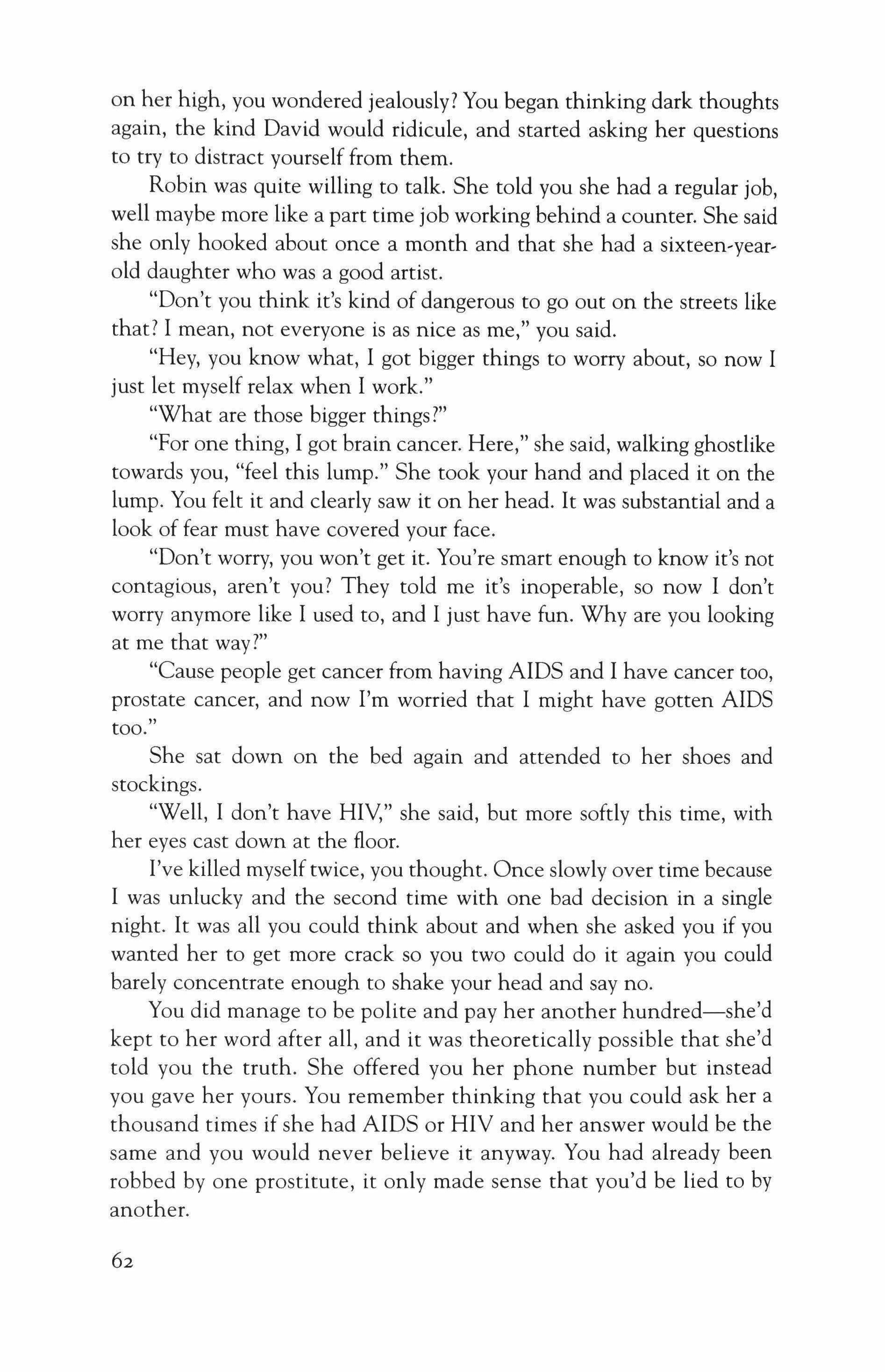
on her high, you wondered jealously? You began thinking dark thoughts again, the kind David would ridicule, and started asking her questions to try to distract yourself from them.
Robin was quite willing to talk. She told you she had a regular job, well maybe more like a part time job working behind a counter. She said she only hooked about once a month and that she had a sixteen-yearold daughter who was a good artist.
"Don't you think it's kind of dangerous to go out on the streets like that? I mean, not everyone is as nice as me," you said.
"Hey, you know what, I got bigger things to worry about, so now I just let myself relax when I work."
"What are those bigger things?"
"For one thing, I got brain cancer. Here," she said, walking ghostlike towards you, "feel this lump." She took your hand and placed it on the lump. You felt it and clearly saw it on her head. It was substantial and a look of fear must have covered your face.
"Don't worry, you won't get it. You're smart enough to know it's not contagious, aren't you? They told me it's inoperable, so now I don't worry anymore like I used to, and I just have fun. Why are you looking at me that way?"
"Cause people get cancer from having AIDS and I have cancer too, prostate cancer, and now I'm worried that I might have gotten AIDS too."
She sat down on the bed again and attended to her shoes and stockings.
"Well, I don't have HIV," she said, but more softly this time, with her eyes cast down at the floor.
I've killed myselftwice, you thought. Once slowly over time because I was unlucky and the second time with one bad decision in a single night. It was all you could think about and when she asked you if you wanted her to get more crack so you two could do it again you could barely concentrate enough to shake your head and say no.
You did manage to be polite and pay her another hundred-she'd kept to her word after all, and it was theoretically possible that she'd told you the truth. She offered you her phone number but instead you gave her yours. You remember thinking that you could ask her a thousand times if she had AIDS or HIV and her answer would be the same and you would never believe it anyway. You had already been robbed by one prostitute, it only made sense that you'd be lied to by another.

Then Robin left your room, but like a true ghost didn't completely vanish. Immediately you began reviewing everything you two did, checking it for exposure to HIY, as if going over and over a videotape. It was then you began to panic and called your brother and told him what happened in one mad rush of speech.
When you got off the phone with David you were perspiring heavily through your shirt. You had called him out of reflex perhaps, but you'd still hoped for some relief. Yet you didn't feel better and immediately regretted that you'd told him so much. What if he did come looking for you? The thought of David in Las Vegas was essentially unthinkable but so was having your surgery in Philadelphia, so was being tested for HIY. That's when you visited Sid at the registration desk and paid him the money to tell your brother you weren't in, came back to the room and began watching the forty-eight hour horror movie, only leaving to eat at the nearest fast food places you could find in the opposite direction from where the whores were
Now, still in your room, with David's letter on the floor, you were once more seeing images of Robin's and Pandora's faces flickering on and off in front of you like giant fireflies. This made you pace faster as if you thought that by increasing the speed of your steps you could somehow outrun them. But you couldn't outrun them or the thoughts attached to them that seemed fastened to their firefly wings. You tried to conjure up your "girlfriend" Margo but you couldn't do that either, and when you could retrieve a kind of blurry image for a few moments it made you feel worse.
You took a drink of warm beer and another pill. You couldn't decide-drink or pill, pill or drink-so you did both. Then by sheer force of will you were able to "see" Maya's face and for some reason immediately you felt some relief.
Of course you had probably ruined things with her by coming on to her so soon but maybe not. She'd already been through a number of things for a woman her age and maybe she could forgive you. In fact, it suddenly seemed possible that she already had and was perhaps regretting running away from you so soon two nights ago. Maybe that's why you "dreamed" of her in the way you did. But how could you know? You couldn't unless you spoke to her, or better still, saw her. But did you even remember where she lived-you were not after all the world's greatest when it came to directions, that was David's department. You closed your eyes unusually tight to concentrate on where the cab had dropped her off and eventually decided that you would know how to get there.
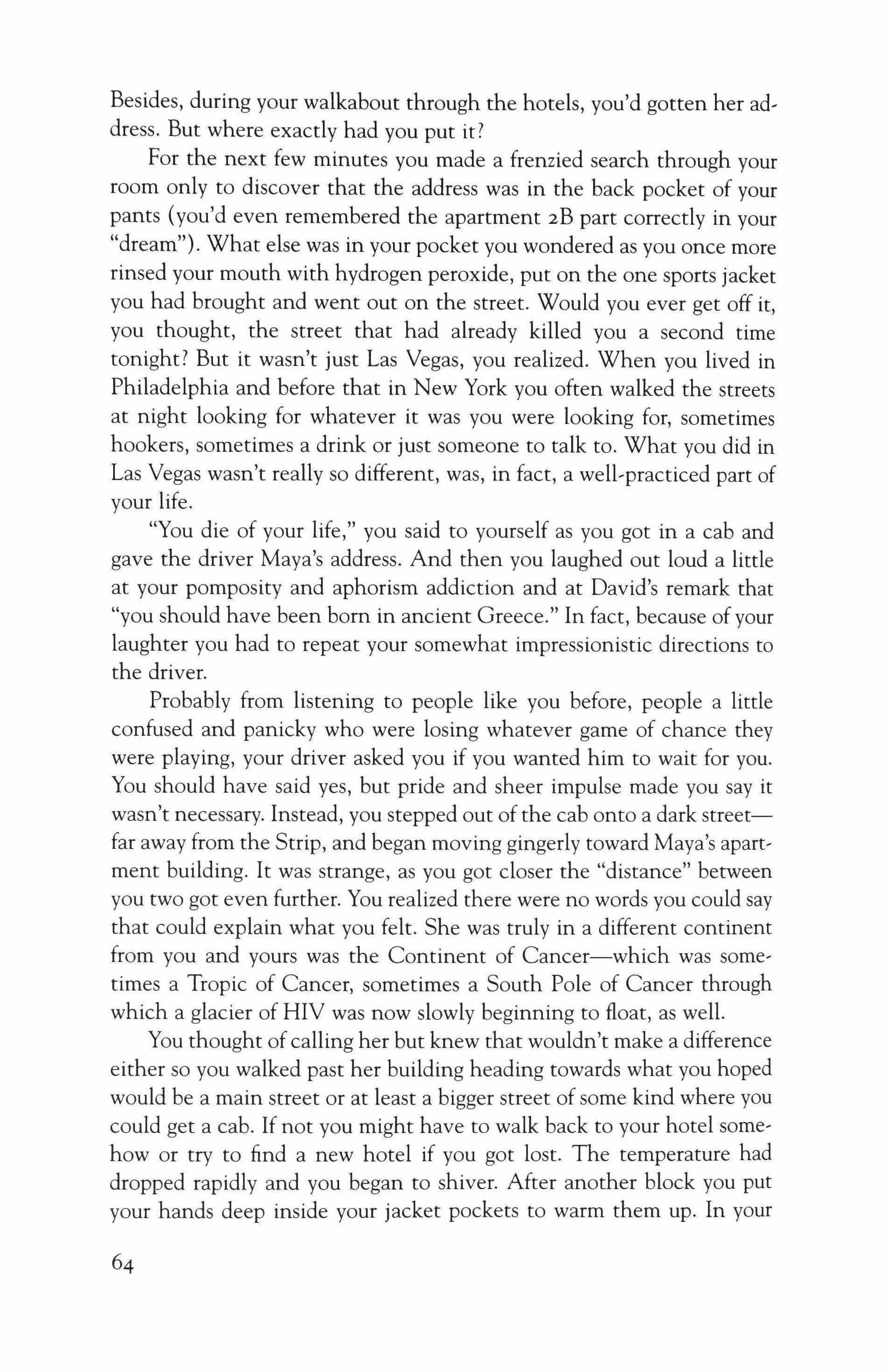
Besides, during your walkabout through the hotels, you'd gotten her address. But where exactly had you put it?
For the next few minutes you made a frenzied search through your room only to discover that the address was in the back pocket of your pants (you'd even remembered the apartment 2B part correctly in your "dream"). What else was in your pocket you wondered as you once more rinsed your mouth with hydrogen peroxide, put on the one sports jacket you had brought and went out on the street. Would you ever get off it, you thought, the street that had already killed you a second time tonight? But it wasn't just Las Vegas, you realized. When you lived in Philadelphia and before that in New York you often walked the streets at night looking for whatever it was you were looking for, sometimes hookers, sometimes a drink or just someone to talk to. What you did in Las Vegas wasn't really so different, was, in fact, a well-practiced part of your life.
"You die of your life," you said to yourself as you got in a cab and gave the driver Maya's address. And then you laughed out loud a little at your pomposity and aphorism addiction and at David's remark that "you should have been born in ancient Greece." In fact, because of your laughter you had to repeat your somewhat impressionistic directions to the driver.
Probably from listening to people like you before, people a little confused and panicky who were losing whatever game of chance they were playing, your driver asked you if you wanted him to wait for you. You should have said yes, but pride and sheer impulse made you say it wasn't necessary. Instead, you stepped out of the cab onto a dark streetfar away from the Strip, and began moving gingerly toward Maya's apartment building. It was strange, as you got closer the "distance" between you two got even further. You realized there were no words you could say that could explain what you felt. She was truly in a different continent from you and yours was the Continent of Cancer-which was sometimes a Tropic of Cancer, sometimes a South Pole of Cancer through which a glacier of HIV was now slowly beginning to float, as well.
You thought of calling her but knew that wouldn't make a difference either so you walked past her building heading towards what you hoped would be a main street or at least a bigger street of some kind where you could get a cab. If not you might have to walk back to your hotel somehow or try to find a new hotel if you got lost. The temperature had dropped rapidly and you began to shiver. After another block you put your hands deep inside your jacket pockets to warm them up. In your

right pocket you felt something you immediately withdrew, though you had to walk to a rare street lamp before you could see it. It was the long letter from David, which unwittingly you'd taken with you.
This time you read the whole letter from beginning to end, wondering why you'd avoided doing that for nearly two days and had instead read it before in a fragmentary, almost cubistic way. The letter was overwrought and sentimental, earnest and didactic-it was many things you decided. Reading it carefully you found the line about courage you'd tried to remember earlier. "Courage, in the end, is all we have, Darren, it's even more important than our identity!"
What did this mean? Did it mean anything? Was the lawyer simply trying to be poetic? Did he really just want to help you? You didn't know, but reading it (and the whole letter) seemed to make your hands warmer. You had shivered and now you'd stopped shivering. You were alone in the dark but you didn't feel too alone-and that was because of your brother. Then you walked back as quickly as you could to the hotel.
At the registration desk, Sid looked up from his racing form when you walked into the deserted lobby. "This place is evil," you muttered almost loud enough for him to hear. Because you'd once paid him off to misinform your brother, you now had enough value for him to look up and talk to you.
"Can I help you my friend?" he said.
You stared at him thinking of all the hookers, all the death in short skirts he'd let walk by him into the hotel and you tried to bum your eyes into his being.
"I'm checking out, going home," you said, surprised that you even bothered to explain anything to him. But, of course, he was a man and required some kind of explanation.
"Very good, sir," he said, forcing a smile.
"Yes, it's all very good," you added, unable to resist the irony because you are a writer and always thought of yourself as an irony connoisseur.
65
The Hanging Lanterns of Ida
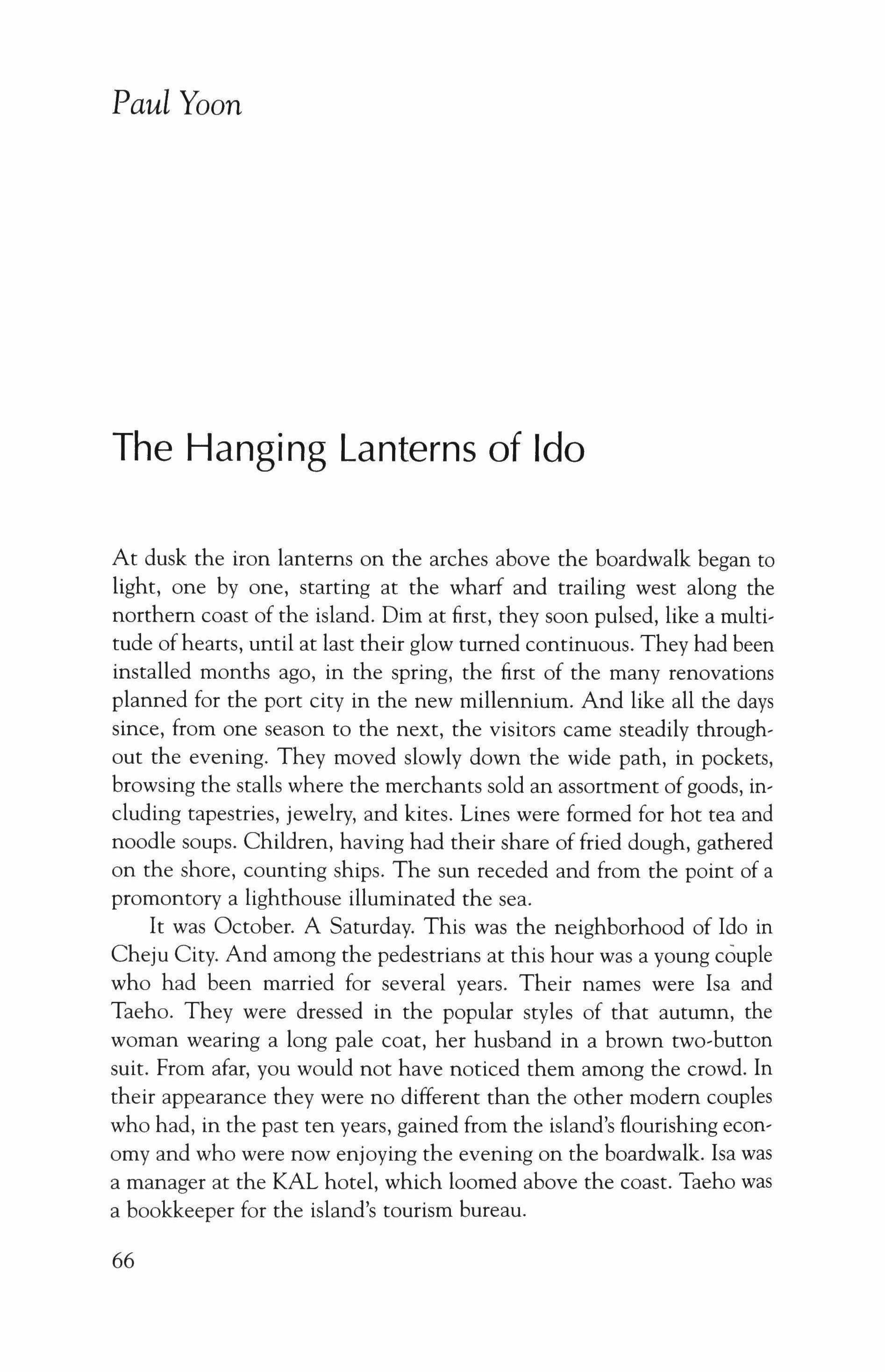
At dusk the iron lanterns on the arches above the boardwalk began to light, one by one, starting at the wharf and trailing west along the northern coast of the island. Dim at first, they soon pulsed, like a multitude ofhearts, until at last their glow turned continuous. They had been installed months ago, in the spring, the first of the many renovations planned for the port city in the new millennium. And like all the days since, from one season to the next, the visitors came steadily throughout the evening. They moved slowly down the wide path, in pockets, browsing the stalls where the merchants sold an assortment ofgoods, including tapestries, jewelry, and kites. Lines were formed for hot tea and noodle soups. Children, having had their share of fried dough, gathered on the shore, counting ships. The sun receded and from the point of a promontory a lighthouse illuminated the sea.
It was October. A Saturday. This was the neighborhood of Ido in Cheju City. And among the pedestrians at this hour was a young couple who had been married for several years. Their names were Isa and Taeho. They were dressed in the popular styles of that autumn, the woman wearing a long pale coat, her husband in a brown two-button suit. From afar, you would not have noticed them among the crowd. In their appearance they were no different than the other modem couples who had, in the past ten years, gained from the island's flourishing economy and who were now enjoying the evening on the boardwalk. Isa was a manager at the KAL hotel, which loomed above the coast. Taeho was a bookkeeper for the island's tourism bureau.
Paul Yoon
66

Every so often they paused beside the stalls, where miniature domes of steam hovered over the vendors as they cooked and placed their food on warm plates for display. A man wearing plastic gloves cupped a dumpling shell in his palm and scooped two fingers full of ground pork and vegetables into the shell's middle. He then lined the edges with egg yolk and folded the dumpling, pinching the halves together until it was formed. He repeated the process, creating a dozen with speed and assurance, and then dropped them into a pot of boiling water.
"Do you wish I could do that?" Isa leaned towards Taeho's ear. She asked this whenever they came here, referring to her limits in the kitchen. "Admit it," she said. "A part of you wishes I could."
"Every evening," he said, and she poked him in his ribs with her finger.
"You're awful," she said. "An awful, awful man."
They continued their walk heading west, unhurried, Taeho with his hands clasped behind his back. Isa slipped an arm around his. The sky had finished its transition, revealing stars. The night colors arrived: office lights and streetlamps, the fluorescence of blinking storefront signs. There was a wind but they did not mind it. The walk was a habit they had grown accustomed to on the weekends, a routine that marked their times of leisure. They were now deciding on where to have dinner, whether to stop at a stall or return to the boulevard in the city center. Passing under the lanterns their faces brightened then shadowed and brightened again. It was, so far, an ordinary Saturday.
In the end they decided on a Thai restaurant not far from their apartment, one they dined at often since their marriage. The faces of the bowing waitresses were familiar. The comer booth, in their fantasies, theirs. Out of formality they opened their menus although they already knew what they wanted. When the waitress approached them they pretended to consider the daily specials, printed on an extra sheet of paper.
And it was only when they heard the voice, "Could I get you something to drink?" that they raised their eyes, politely smiling, and Isa said, "Iced tea, please," and Taeho realized, as Isa spoke, that the girl was new. Their eyes met and he smiled and she hesitated. "The same," he said. "Please." The girl did not reply. She stood there looking at Taeho and he continued to smile, amused, admitting that she was pretty with her small nose and dark eyes, her hair resting against her thin shoulders. He repeated himself in case she had not heard and was waiting for him to order a drink. He spoke a third time and then a sadness fell across the

girl's face, the way her lips pressed together and her eyes seemed to bare themselves and grow moist.
"I'm sorry," Taeho said. "Is everything all right?" He glanced at Isa, who had returned to reading the menu and only now brought her attention upon the situation.
The girl continued to stare at him. After a moment, she said, "It's you."
"It's you," she repeated and lifted her hand to cover her mouth as if she had spoken when she shouldn't have or that she herself was surprised at what came forth, this loosening of her tongue, the unexpected forming of words, released, and within them a recognition.
In some ways it was a simple case of mistaken identity. Taeho resembled a man whom she once knew. Just like him, the girl said. But he was no longer here. That was how she described it. He had been on a motorbike. A delivery truck was ill-prepared for the coastal roads. This was in Phuket, in Thailand. Two years ago.
As Taeho listened, his chest went hollow. She spoke all this in haste, as if it were an afterthought. And then she stopped and said nothing further about the man. Instead she wrote their orders down on a small pad of paper and left. "Poor girl," Isa said, when they were alone. "She thought you were a ghost." She took his hand in hers and squeezed. She shook her head, saying, "That's terrible. What an awful thing," and he said, "Yes. Awful," and they were silent.
Above them hung a framed photograph of an aerial view of the Phuket coast. Taeho studied it for some time, the translucent water that was emerald in some portions, the color of the sky in others. The sand was pale, somewhat curved like a giant finger, and speckled by the tiny shapes that he guessed were sunbathers. They had thought of spending their honeymoon in Phuket, when it seemed everyone was going there. But they had changed their minds and remained in Cheju, driving to the southern coast, visiting the waterfalls, the caves, and the hill town where they browsed the crafts stores and toured the watchtower at its crest. It seemed so long ago, right then, staring at the photograph on the wall. He could no longer recall why they had decided against it.
"I hope we haven't put her in an awkward position," Isa said. "I'd hate that. Do you think she'll work the other tables instead?"
"I think she'll be fine," he said.
"Yes, I suppose so. And then we'll leave and by tomorrow she'll forget it ever happened."
68
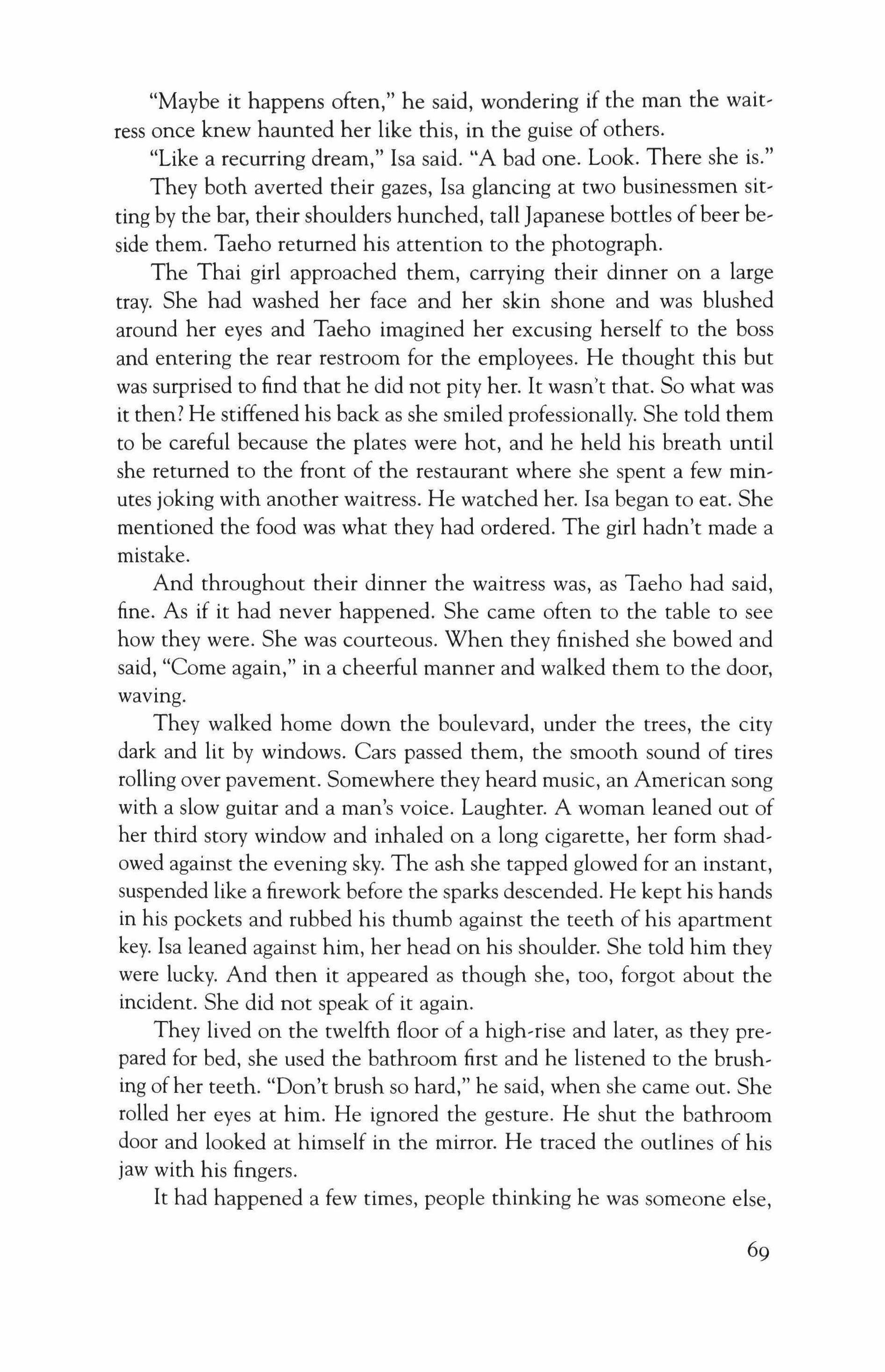
"Maybe it happens often," he said, wondering if the man the waitress once knew haunted her like this, in the guise of others.
"Like a recurring dream," Isa said. "A bad one. Look. There she is."
They both averted their gazes, Isa glancing at two businessmen sitting by the bar, their shoulders hunched, tall Japanese bottles ofbeer beside them. Taeho returned his attention to the photograph.
The Thai girl approached them, carrying their dinner on a large tray. She had washed her face and her skin shone and was blushed around her eyes and Taeho imagined her excusing herself to the boss and entering the rear restroom for the employees. He thought this but was surprised to find that he did not pity her. It wasn't that. So what was it then? He stiffened his back as she smiled professionally. She told them to be careful because the plates were hot, and he held his breath until she returned to the front of the restaurant where she spent a few minutes joking with another waitress. He watched her. Isa began to eat. She mentioned the food was what they had ordered. The girl hadn't made a mistake.
And throughout their dinner the waitress was, as Taeho had said, fine. As if it had never happened. She came often to the table to see how they were. She was courteous. When they finished she bowed and said, "Come again," in a cheerful manner and walked them to the door, waving.
They walked home down the boulevard, under the trees, the city dark and lit by windows. Cars passed them, the smooth sound of tires rolling over pavement. Somewhere they heard music, an American song with a slow guitar and a man's voice. Laughter. A woman leaned out of her third story window and inhaled on a long cigarette, her form shadowed against the evening sky. The ash she tapped glowed for an instant, suspended like a firework before the sparks descended. He kept his hands in his pockets and rubbed his thumb against the teeth of his apartment key. Isa leaned against him, her head on his shoulder. She told him they were lucky. And then it appeared as though she, too, forgot about the incident. She did not speak of it again.
They lived on the twelfth floor of a high-rise and later, as they prepared for bed, she used the bathroom first and he listened to the brushing ofher teeth. "Don't brush so hard," he said, when she came out. She rolled her eyes at him. He ignored the gesture. He shut the bathroom door and looked at himself in the mirror. He traced the outlines of his jaw with his fingers.
It had happened a few times, people thinking he was someone else,

a person tapping him on the shoulder. It happened to everyone, he assumed. It was, usually, a cause for a brief moment of embarrassment. But afterwards he didn't think anymore about the incident and he was quite sure the person who had approached him didn't think anymore about it either. But this was different, although he wasn't sure how or why. Perhaps because the man whom he resembled was dead. Or perhaps it wasn't that at all. Perhaps it was the girl herself. The phrase, "It's you," and the expression of her face that spoke of the possibility that perhaps she had been wrong, that he had been alive all this time. He felt those words and her conviction, which lasted only for an instant but nonetheless remained with him like an extra layer of skin.
When he joined Isa in bed she shut off the bedside lamp. She fell asleep quickly. He smelled the mint of her breath. He shut his eyes. He thought perhaps that all that luck meant was that you weighed your own life against someone else's and yours turned out to be better. And where was the good in that? And what would his wife have done? he then wondered. Ifhe was the one who was now gone? Would she find a man who resembled him? And what would happen then?
He watched the minutes pass on his bedside clock. He had a sudden urge to talk to Isa but chose not to wake her. He wanted to tell her, as if she hadn't heard, that he resembled a man a world away and two years dead. He wanted to tell her that he had never ridden a motorbike. Not even a scooter or a moped, though there were many on the island. He wanted to ask her whether his life would be different if he had done so. He tried to picture this man. It should have been easy-it was his face, after all-but the harder he concentrated the more he felt it slipping. As a child, he would try to grip the mist that clouded the harbor. He thought you could. He moved his hand into it and made a fist and what lay in his palm felt like feathers.
At the tourism bureau the following week all the employees were discussing the provincial government. In the coming month, it was re� ported, they would announce a proposal for turning the island into a visa-free territory. This would allow foreign investors unrestricted access to the buying of property, including tourist venues such as casinos and hotels, and even the establishment of schools. It had been a plan that had, at first, seemed bold and ambitious to Taeho. But now he was no longer sure of its intentions and the more his colleagues discussed the profit of such a venture the less interested he became in its details.
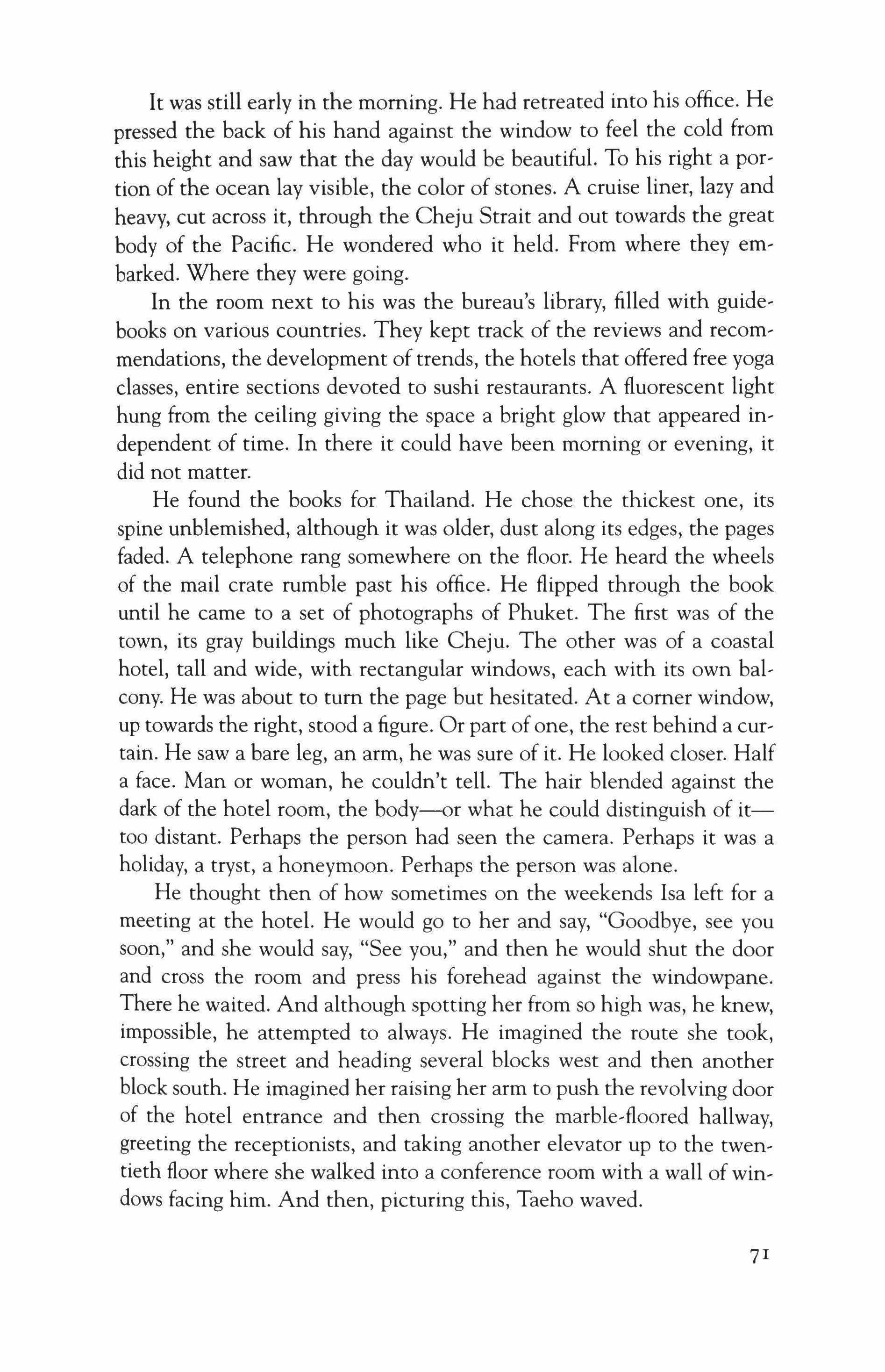
It was still early in the morning. He had retreated into his office. He pressed the back of his hand against the window to feel the cold from this height and saw that the day would be beautiful. To his right a portion of the ocean lay visible, the color of stones. A cruise liner, lazy and heavy, cut across it, through the Cheju Strait and out towards the great body of the Pacific. He wondered who it held. From where they embarked. Where they were going.
In the room next to his was the bureau's library, filled with guidebooks on various countries. They kept track of the reviews and recommendations, the development of trends, the hotels that offered free yoga classes, entire sections devoted to sushi restaurants. A fluorescent light hung from the ceiling giving the space a bright glow that appeared independent of time. In there it could have been morning or evening, it did not matter.
He found the books for Thailand. He chose the thickest one, its spine unblemished, although it was older, dust along its edges, the pages faded. A telephone rang somewhere on the floor. He heard the wheels of the mail crate rumble past his office. He flipped through the book until he came to a set of photographs of Phuket. The first was of the town, its gray buildings much like Cheju. The other was of a coastal hotel, tall and wide, with rectangular windows, each with its own balcony. He was about to tum the page but hesitated. At a comer window, up towards the right, stood a figure. Or part of one, the rest behind a curtain. He saw a bare leg, an arm, he was sure of it. He looked closer. Half a face. Man or woman, he couldn't tell. The hair blended against the dark of the hotel room, the body-or what he could distinguish of ittoo distant. Perhaps the person had seen the camera. Perhaps it was a holiday, a tryst, a honeymoon. Perhaps the person was alone.
He thought then of how sometimes on the weekends Isa left for a meeting at the hotel. He would go to her and say, "Goodbye, see you soon," and she would say, "See you," and then he would shut the door and cross the room and press his forehead against the windowpane. There he waited. And although spotting her from so high was, he knew, impossible, he attempted to always. He imagined the route she took, crossing the street and heading several blocks west and then another block south. He imagined her raising her arm to push the revolving door of the hotel entrance and then crossing the marble-floored hallway, greeting the receptionists, and taking another elevator up to the twentieth floor where she walked into a conference room with a wall of windows facing him. And then, picturing this, Taeho waved.
7I

Their years had been constant and steady. He used to think they always would be.
In their early days they were shy. They undressed in the dark. He would close his eyes in that dark and press his palms against her chest, her hand guiding his. He wanted to concentrate on her skin, to know how she felt before he saw her image. He would touch her and imagine what she looked like. The first time he saw her in the light, she stood framed within their bedroom door. She had flicked the switch on impulse. He covered himself then changed his mind. She said to him, "Well, now you know all there is to know." She placed a hand on her hip and her finger pointed to a mole above her right pelvis as ifthat were her secret. He had never noticed it before.
He remembered a sense ofsadness coming to him then. Not because of her or her body but the fact that his hands hadn't discovered this raised dark circle, like a small coin. He had not touched her completely. He had tried. Yet there were still places he missed. Then she approached him and lay down on top of the red duvet and took his hand. She kissed him and the sadness lifted and he loved her and she said, "Here," and, "There," and her skin was warm and trembling.
In the afternoon they met on the boardwalk. She couldn't stay long, she told him. From a sea woman she chose a platter of abalone with lemon and salt. Taeho, from the neighboring stall, ordered Udon noodles, served in a large ceramic bowl. Many of the benches were already occupied by tourists and the businessmen who worked nearby. Some even stood by the stalls, eating and talking to one another. The day was clear and bright and the winds were calm. At the wharf, men were loading and unloading cargo from the ships. Two men in suits left a bench and Taeho, balancing the noodle bowl in his hands, rushed to take it.
They sat facing the city, the ocean behind them. Behind the brick row houses, scattered amidst the three-story buildings, stood the towering panels of the KAL hotel, their apartment complex, and a few others not yet finished, the bright cranes beside them lifting steel. It was said in Cheju you could judge a building's age by its height. The modem ones were no shorter than ten stories. Spaces were bought. Buildings were demolished, new ones were built. It was a city at once shrinking and growing. It was most evident during the day, when the colors of the architecture defined themselves against a pale sky. At night, the colors were of lights, a great ocean of them, and where one building ended and another began was not as distinct.

Isa, between bites of her abalone, pointed her chin at a man sitting a few benches away, facing the sea. "He's new," she said. "Started a few days ago. I feel old when I see him." The man wore a pinstriped suit and a gold tie. With his jacket unbuttoned he hunched forward, eating a sandwich. He was handsome, Taeho admitted, and wondered if that was what Isa had meant. A group of women passed the man and he raised his eyes for a brief instant but then returned his gaze to a fixed point somewhere far behind Taeho and Isa. "Shall we have him over for dinner sometime?" she asked. "He just moved here. From Seoul. I think he's lost." She smiled, brushing her hands together then standing. She always felt obliged to host a dinner for the new employees. They did so often.
"All right," Taeho said, looking up at her. He handed her his empty bowl, the chopsticks placed inside. "Return this, too?"
She carried their dishes to the vendors, handing hers over to the sea woman and then the bowl to the noodle maker. She then crossed the boardwalk and approached the young man, who, upon seeing her, quickly stood, bits of his sandwich falling from his shirt as he wiped his mouth with the back ofhis hand and bowed. Isa, whenever she laughed, brought her hands together as though in prayer and Taeho watched her do this now, thinking that standing beside the man she did in fact seem older. Perhaps it was the way she stood, her posture, not as straight as it once was. She had gained weight in the hips. He watched her lips move. She was too far away for him to be able to discern what she was saying, although it was easy to guess. She was formal and courteous. She pointed at Taeho and the man nodded with eagerness.
It was a good match, both of their parents had said, during their courtship. They-the parents-had been referring to their children's careers and a sense of stability that they themselves had struggled for during the war and the years after. And throughout the ceremony, he caught their looks of approval and relief and felt the pride of a son and began to see a life unfolding in the way he had promised them. He imagined a future when he would be someone others looked towards and envied.
She went on talking, or the young man did, but Taeho's attention was diverted to the stalls where the sea woman raised her voice at the noodle maker. He couldn't hear exactly their words, something about the trawlers and their nets and the noodle maker laughed and responded and she frowned and fell silent. She draped a towel around her hand and placed a fresh oyster on it. With her other hand she picked up a small
73
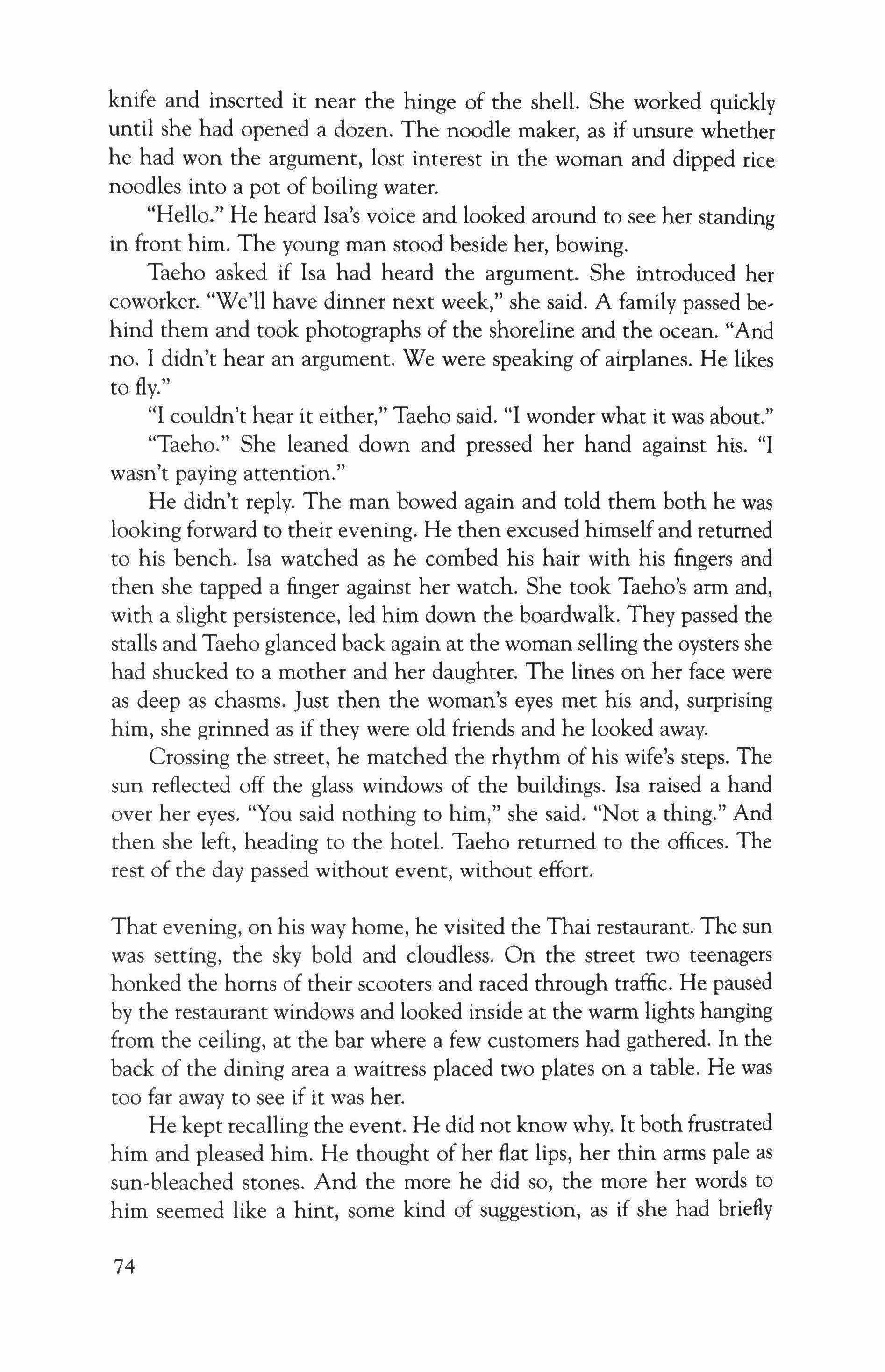
knife and inserted it near the hinge of the shell. She worked quickly until she had opened a dozen. The noodle maker, as if unsure whether he had won the argument, lost interest in the woman and dipped rice noodles into a pot of boiling water.
"Hello." He heard Isa's voice and looked around to see her standing in front him. The young man stood beside her, bowing.
Taeho asked if Isa had heard the argument. She introduced her coworker. "We'll have dinner next week," she said. A family passed behind them and took photographs of the shoreline and the ocean. "And no. I didn't hear an argument. We were speaking of airplanes. He likes to fly."
"I couldn't hear it either," Taeho said. "I wonder what it was about."
"Taeho." She leaned down and pressed her hand against his. "I wasn't paying attention."
He didn't reply. The man bowed again and told them both he was looking forward to their evening. He then excused himself and returned to his bench. Isa watched as he combed his hair with his fingers and then she tapped a finger against her watch. She took Taeho's arm and, with a slight persistence, led him down the boardwalk. They passed the stalls and Taeho glanced back again at the woman selling the oysters she had shucked to a mother and her daughter. The lines on her face were as deep as chasms. Just then the woman's eyes met his and, surprising him, she grinned as if they were old friends and he looked away.
Crossing the street, he matched the rhythm of his wife's steps. The sun reflected off the glass windows of the buildings. Isa raised a hand over her eyes. "You said nothing to him," she said. "Not a thing." And then she left, heading to the hotel. Taeho returned to the offices. The rest of the day passed without event, without effort.
That evening, on his way home, he visited the Thai restaurant. The sun was setting, the sky bold and cloudless. On the street two teenagers honked the horns of their scooters and raced through traffic. He paused by the restaurant windows and looked inside at the warm lights hanging from the ceiling, at the bar where a few customers had gathered. In the back of the dining area a waitress placed two plates on a table. He was too far away to see if it was her.
He kept recalling the event. He did not know why. It both frustrated him and pleased him. He thought of her flat lips, her thin arms pale as sun-bleached stones. And the more he did so, the more her words to him seemed like a hint, some kind of suggestion, as if she had briefly
74
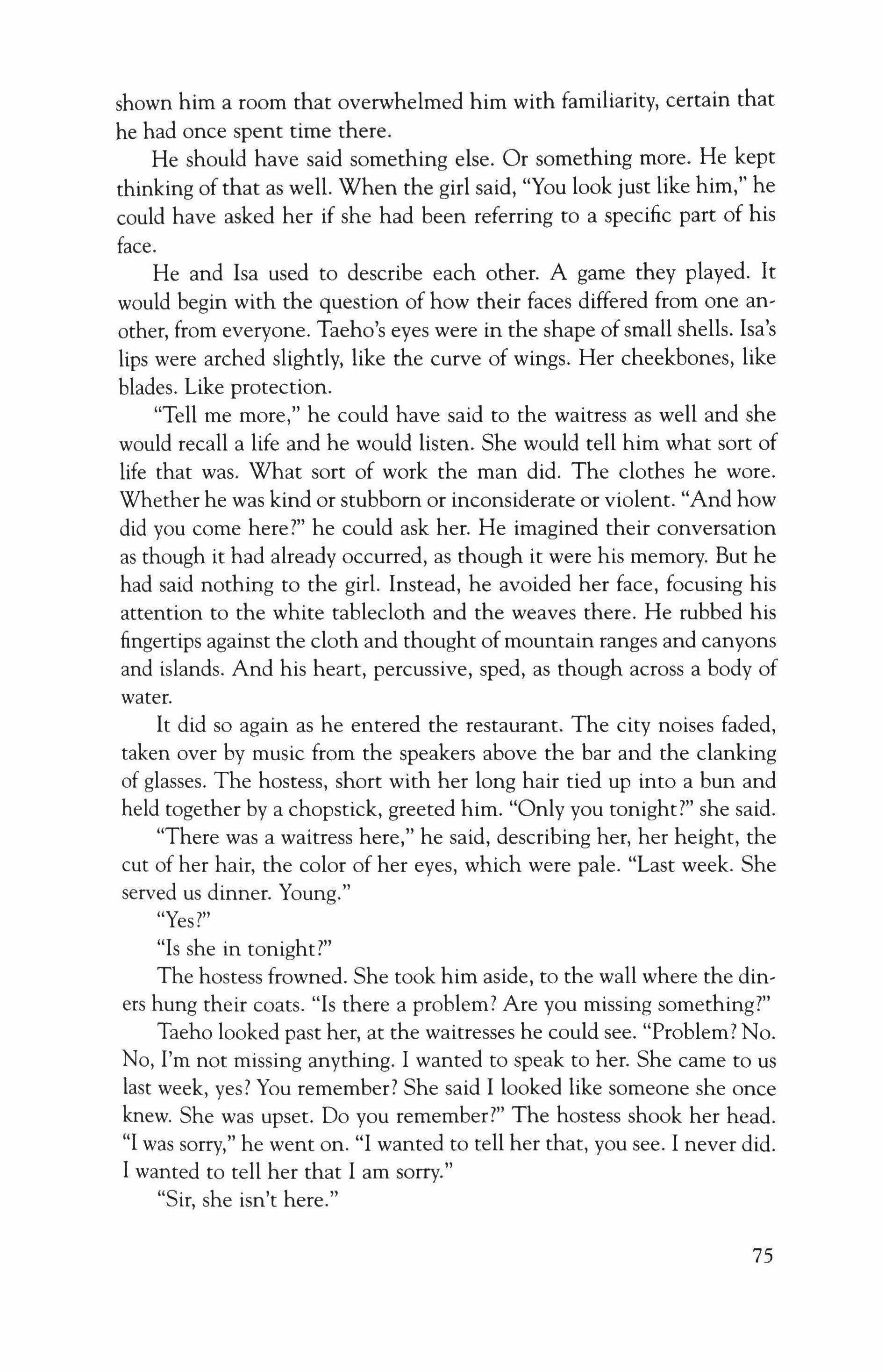
shown him a room that overwhelmed him with familiarity, certain that he had once spent time there.
He should have said something else. Or something more. He kept thinking of that as well. When the girl said, "You look just like him," he could have asked her if she had been referring to a specific part of his face.
He and Isa used to describe each other. A game they played. It would begin with the question of how their faces differed from one another, from everyone. Taeho's eyes were in the shape ofsmall shells. Isa's lips were arched slightly, like the curve of wings. Her cheekbones, like blades. Like protection.
"Tell me more," he could have said to the waitress as well and she would recall a life and he would listen. She would tell him what sort of life that was. What sort of work the man did. The clothes he wore. Whether he was kind or stubborn or inconsiderate or violent. "And how did you come here?" he could ask her. He imagined their conversation as though it had already occurred, as though it were his memory. But he had said nothing to the girl. Instead, he avoided her face, focusing his attention to the white tablecloth and the weaves there. He rubbed his fingertips against the cloth and thought of mountain ranges and canyons and islands. And his heart, percussive, sped, as though across a body of water.
It did so again as he entered the restaurant. The city noises faded, taken over by music from the speakers above the bar and the clanking of glasses. The hostess, short with her long hair tied up into a bun and held together by a chopstick, greeted him. "Only you tonight?" she said.
"There was a waitress here," he said, describing her, her height, the cut of her hair, the color of her eyes, which were pale. "Last week. She served us dinner. Young."
"Yes?"
"Is she in tonight?"
The hostess frowned. She took him aside, to the wall where the diners hung their coats. "Is there a problem? Are you missing something?"
Taeho looked past her, at the waitresses he could see. "Problem? No. No, I'm not missing anything. I wanted to speak to her. She came to us last week, yes? You remember? She said I looked like someone she once knew. She was upset. Do you remember?" The hostess shook her head. "I was sorry," he went on. "I wanted to tell her that, you see. I never did. I wanted to tell her that I am sorry."
"Sir, she isn't here."
75
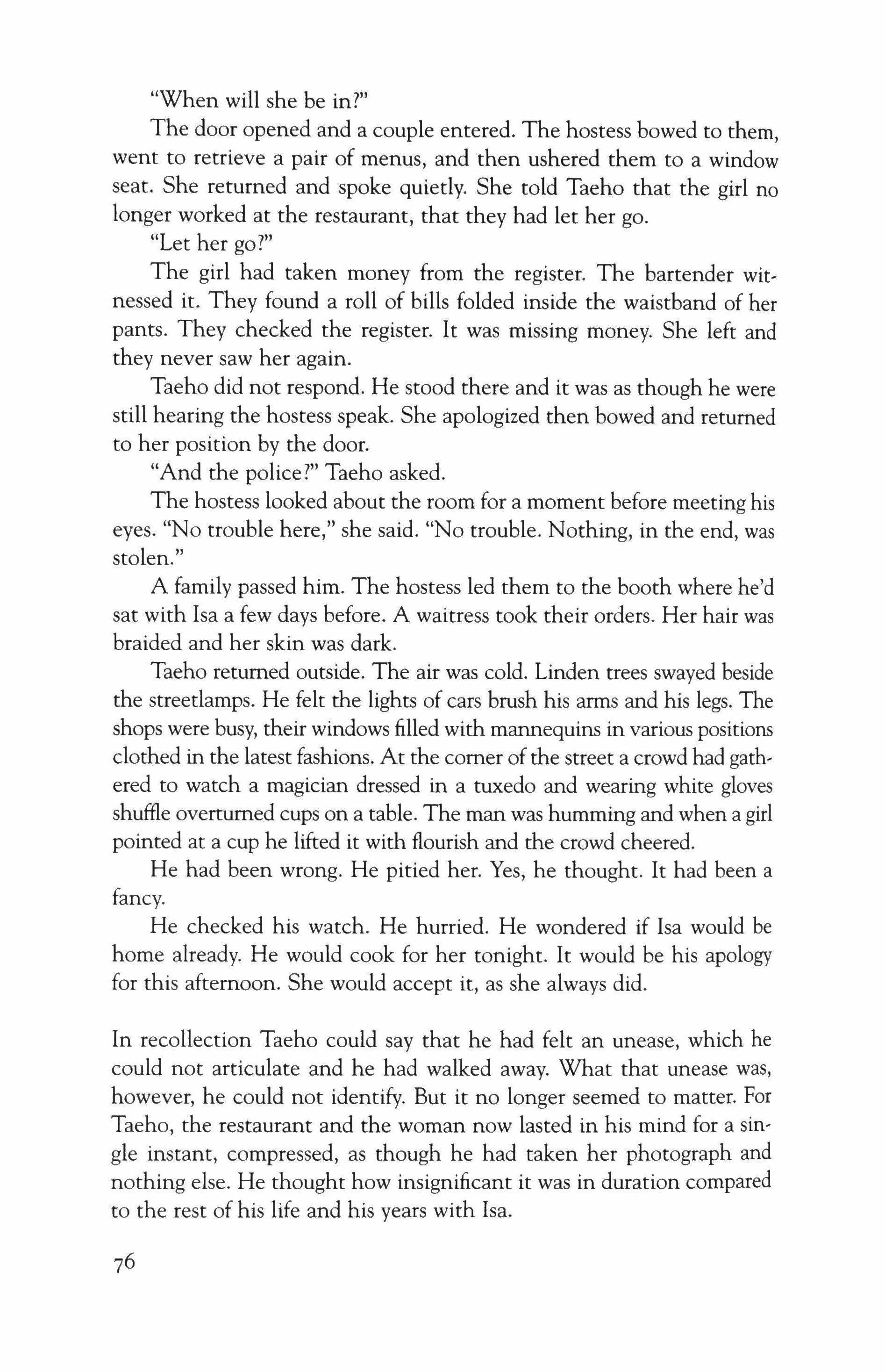
"When will she be in!"
The door opened and a couple entered. The hostess bowed to them, went to retrieve a pair of menus, and then ushered them to a window seat. She returned and spoke quietly. She told Taeho that the girl no longer worked at the restaurant, that they had let her go.
"Let her go!"
The girl had taken money from the register. The bartender witnessed it. They found a roll of bills folded inside the waistband of her pants. They checked the register. It was missing money. She left and they never saw her again.
Taeho did not respond. He stood there and it was as though he were still hearing the hostess speak. She apologized then bowed and returned to her position by the door.
"And the police!" Taeho asked.
The hostess looked about the room for a moment before meeting his eyes. "No trouble here," she said. "No trouble. Nothing, in the end, was stolen."
A family passed him. The hostess led them to the booth where he'd sat with lsa a few days before. A waitress took their orders. Her hair was braided and her skin was dark.
Taeho returned outside. The air was cold. Linden trees swayed beside the streetlamps. He felt the lights of cars brush his arms and his legs. The shops were busy, their windows filled with mannequins in various positions clothed in the latest fashions. At the comer ofthe street a crowd had gathered to watch a magician dressed in a tuxedo and wearing white gloves shuffle overturned cups on a table. The man was humming and when a girl pointed at a cup he lifted it with flourish and the crowd cheered.
He had been wrong. He pitied her. Yes, he thought. It had been a fancy.
He checked his watch. He hurried. He wondered if Isa would be home already. He would cook for her tonight. It would be his apology for this afternoon. She would accept it, as she always did.
In recollection Taeho could say that he had felt an unease, which he could not articulate and he had walked away. What that unease was, however, he could not identify. But it no longer seemed to matter. For Taeho, the restaurant and the woman now lasted in his mind for a single instant, compressed, as though he had taken her photograph and nothing else. He thought how insignificant it was in duration compared to the rest of his life and his years with lsa.

They took their routine walks. The weather grew colder but they grew accustomed to it. They invited guests to their apartment and hosted dinner parties for their coworkers. They went to the movies and the restaurants. They attended gallery openings and university lectures. They read aloud to each other the newspaper headlines that covered the shift to a visa-free international city, a lost fishing boat, territorial disputes with the Japanese, and updates from the mainland. In this way every morning, beside the window of their apartment that looked out on the city of Cheju, they felt aware of this island and its place in the Pacific and even farther, towards the continent of Europe and the coasts of America.
On some days, however, it was as if they spoke of these things out of a forced will. To say something. There was a pretense there, a lack of comfort, as ifthey knew not what they spoke of, their words drifting. But this observation never grew into a concern and he dismissed it quickly. All was as it had always been.
The months passed into winter. Taeho celebrated a birthday, his thirty-fifth. They took a weeklong holiday and went to the southern coast, to a hotel that faced the East China Sea. It was where they had gone on their honeymoon and they had not returned since. They spent their days being tourists, as they had done before. They went to the caves and hiked the trails. They visited waterfalls. It was a reminder of who they were and who they had become and what they had earned and gained and all the time in between.
He was happy, he said to himself many times during their trip. He said it to her as well and took her hand but what he felt surprised him. It was the feeling of dreams, the ones he used to have before they married. He would find himself someplace, anyplace, his childhood home, a department store, the beach, and he would have a sudden desire to run. But he never could. As though something were pushing against him. "I can never run in dreams," he once told her and she looked at him with patience.
One afternoon they went to the old watchtower at the crest of the hill town. The day was cold but the clouds parted on occasion, revealing the sun that reflected off the tiled rooftops of the houses along the slope. He recalled the tower's history from their first visit, the failed revolt against the Japanese sentinels during the occupation, and later, the Allied bombings that nearly destroyed the outpost. It was a museum now and had been renovated years ago to resemble how it once was. The walls were made ofpale stones and on the peak ofthe wooden roofstood
77

a copper weathervane. A small lamp hung in the gallery. Seabirds perched on the railings, clustered around a pair of binoculars that Taeho did not remember from before.
Some distance away from the tower, across the ridge, was the barracks. It was made of the same stones, half of which was a replica of where the watchmen lived, the other half having been converted into a gift shop. Inside, a young woman sat behind a counter with a hand under her chin, reading. On occasion she spun a rack of postcards beside her.
When Isa began to walk into the shop, Taeho told her his stomach was bothering him. He would wait, he said, and she paused, then shrugged and after purchasing a ticket from the woman she crossed the hillcrest and entered the tower, the birds swiftly departing.
Taeho approached the barracks and looked through a window. It was a single long room, divided by rope, and on the other side of the shop he could see tatami mats, pads of paper, tin cups, a spyglass, and a bucket. On the far wall there was a gray uniform on a hook. Below that a pair of boots and a rifle. He moved to another window and his shadow fell on the young woman and she stood up, startled, placing a hand over her heart. Then she laughed. She had long straight hair and wore a dress that was slightly large for her. Her bracelets had slipped to her elbows. Taeho raised a hand in apology and stepped away.
Over the ridge the tiled rooftops of the town descended gradually to the coast. The wind moved with a heaviness and he flipped up the collar of his coat. He watched his breath leave him. Clouds coursed overhead and he imagined the men who once lived here in these confines and he saw that they were boys and he saw them rise from their beds and carry the paraffin every evening at sundown, a long line of them, walking the ridgeline. He saw them ascend the tower, their spyglasses swiveling over a sea that resembled a wide field of ash, waiting for ships.
Minutes later he spotted Isa above, circling the gallery, her body as small as a star. She waved and he returned it. The sun reflected between her fingers, a small point, and he saw her slip a coin into the binoculars. Leaning forward, her hair caught in the wind like some old flag, she swiveled the lens over the hill town, at all the stores they had browsed through when they had been married for less than forty-eight hours, at the same body of water they walked beside every day, and it all seemed to him then so purposeless.
How long she was up there he didn't know. It seemed to last for hours and yet when she returned it seemed she had just left. She asked

whether he was feeling better and he said, "Yes, better," and they drove back through the town. She questioned how far the lamp of the tower could be seen in those days. "Not far," he said.
"Even so, it is beautiful," she said, and he responded, "Yes, we saw it before," and she paused and tilted her head, studying him. "We did," she said. "Just as beautiful as then. That's what I meant."
That evening, he and Isa fought. They had decided to remain in the hotel room for the evening rather than go to a restaurant. They would rest, eat in. On the dresser was a celadon vase Isa had bought that afternoon from a potter in the town. It was slim, with a long neck, and it was incised with images of egrets in flight. "To match the other one," she said, reminding him oftheir first purchase together those years ago when they first came here. He smiled in response. She turned on the television and they lay in bed watching a show about movie stars. But soon Taeho's attention drifted and he stood and approached the window. His image and Isa's on the bed was transposed onto the glass, which gave way to a view of the sea and the veranda below where the tourists were dining. And for the first time in many months he recalled the Thai waitress and what she had shared. He thought of the dead, of yearning. He thought of a photograph, the glimpse of a body beside a hotel window, of coastal roads and motorbikes, of watchmen along a high ridge, and the images came to him all at once with a sense of inevitability.
"You're fidgeting," Isa called.
"It isn't very interesting," he said.
"Neither are you," she said.
He looked at her, stunned. She was sitting with her back against the headboard. She brought a pillow towards her chest and hugged it, facing the television. She had meant it as a joke, she said. She rolled her eyes. He stared at her face and saw the age there, the weathering, what time did and what it had left to do. And then he, as though from a great distance, watched his body approach her and he heard his voice say, "Look at me." He slammed his open palm against the mattress and he watched her jump and stand, retreating towards the wall. She clutched the pillow. He cursed her. Cursed her and her body and her work and how dull she was and how it was all her fault and the more he spoke the more her face seemed to return to him, as if it had faded, and he recognized the woman he had known and it was then he fell silent.
He left her there and walked through a field that led to the woods and the coastal mountains, the hotel receding behind him. As he walked farther, he heard the constant push of water approaching land.
79
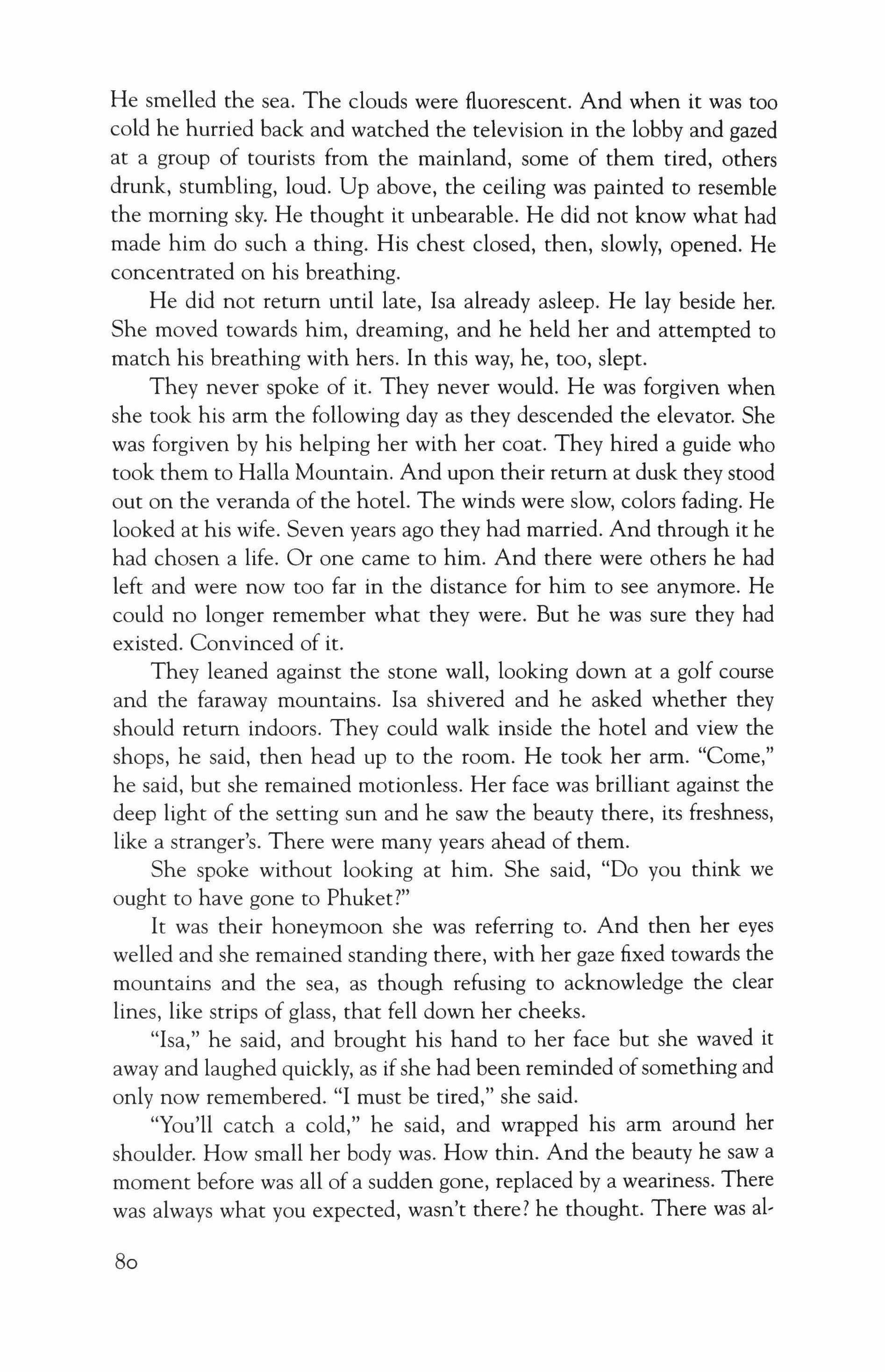
He smelled the sea. The clouds were fluorescent. And when it was too cold he hurried back and watched the television in the lobby and gazed at a group of tourists from the mainland, some of them tired, others drunk, stumbling, loud. Up above, the ceiling was painted to resemble the morning sky. He thought it unbearable. He did not know what had made him do such a thing. His chest closed, then, slowly, opened. He concentrated on his breathing.
He did not return until late, Isa already asleep. He lay beside her. She moved towards him, dreaming, and he held her and attempted to match his breathing with hers. In this way, he, too, slept.
They never spoke of it. They never would. He was forgiven when she took his arm the following day as they descended the elevator. She was forgiven by his helping her with her coat. They hired a guide who took them to Halla Mountain. And upon their return at dusk they stood out on the veranda of the hotel. The winds were slow, colors fading. He looked at his wife. Seven years ago they had married. And through it he had chosen a life. Or one carne to him. And there were others he had left and were now too far in the distance for him to see anymore. He could no longer remember what they were. But he was sure they had existed. Convinced of it.
They leaned against the stone wall, looking down at a golf course and the faraway mountains. Isa shivered and he asked whether they should return indoors. They could walk inside the hotel and view the shops, he said, then head up to the room. He took her arm. "Come," he said, but she remained motionless. Her face was brilliant against the deep light of the setting sun and he saw the beauty there, its freshness, like a stranger's. There were many years ahead of them.
She spoke without looking at him. She said, "Do you think we ought to have gone to Phuket?"
It was their honeymoon she was referring to. And then her eyes welled and she remained standing there, with her gaze fixed towards the mountains and the sea, as though refusing to acknowledge the clear lines, like strips of glass, that fell down her cheeks.
"Isa," he said, and brought his hand to her face but she waved it away and laughed quickly, as if she had been reminded ofsomething and only now remembered. "I must be tired," she said.
"You'll catch a cold," he said, and wrapped his arm around her shoulder. How small her body was. How thin. And the beauty he saw a moment before was all of a sudden gone, replaced by a weariness. There was always what you expected, wasn't there? he thought. There was al-
80
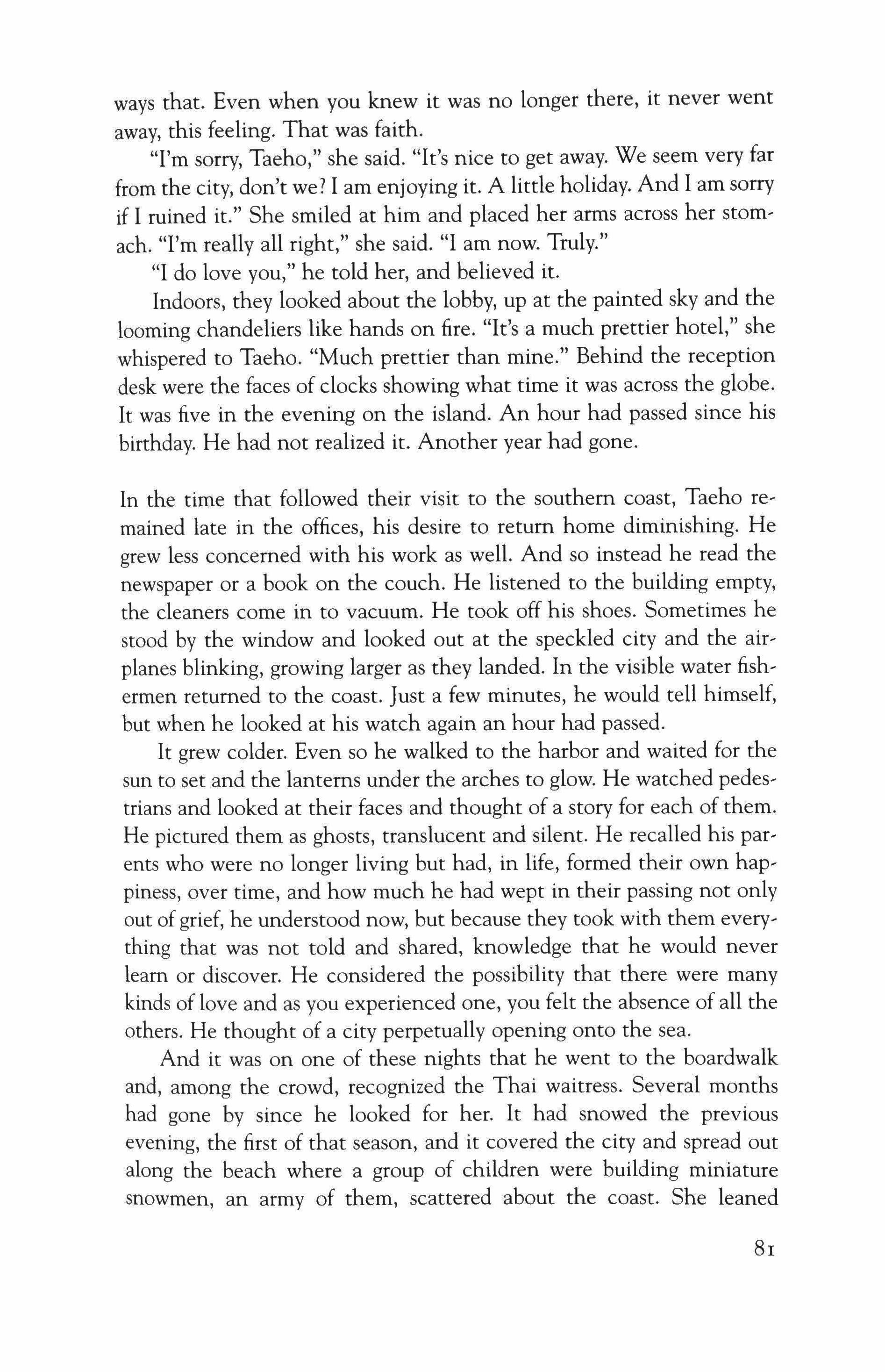
ways that. Even when you knew it was no longer there, it never went away, this feeling. That was faith.
"I'm sorry, Taeho," she said. "It's nice to get away. We seem very far from the city, don't we? I am enjoying it. A little holiday. And I am sorry if I ruined it." She smiled at him and placed her arms across her stomach. "I'm really all right," she said. "I am now. Truly."
"I do love you," he told her, and believed it.
Indoors, they looked about the lobby, up at the painted sky and the looming chandeliers like hands on fire. "It's a much prettier hotel," she whispered to Taeho. "Much prettier than mine." Behind the reception desk were the faces of clocks showing what time it was across the globe. It was five in the evening on the island. An hour had passed since his birthday. He had not realized it. Another year had gone.
In the time that followed their visit to the southern coast, Taeho remained late in the offices, his desire to return home diminishing. He grew less concerned with his work as well. And so instead he read the newspaper or a book on the couch. He listened to the building empty, the cleaners come in to vacuum. He took off his shoes. Sometimes he stood by the window and looked out at the speckled city and the airplanes blinking, growing larger as they landed. In the visible water fishermen returned to the coast. Just a few minutes, he would tell himself, but when he looked at his watch again an hour had passed.
It grew colder. Even so he walked to the harbor and waited for the sun to set and the lanterns under the arches to glow. He watched pedestrians and looked at their faces and thought of a story for each of them. He pictured them as ghosts, translucent and silent. He recalled his parents who were no longer living but had, in life, formed their own happiness, over time, and how much he had wept in their passing not only out of grief, he understood now, but because they took with them everything that was not told and shared, knowledge that he would never learn or discover. He considered the possibility that there were many kinds of love and as you experienced one, you felt the absence of all the others. He thought of a city perpetually opening onto the sea.
And it was on one of these nights that he went to the boardwalk and, among the crowd, recognized the Thai waitress. Several months had gone by since he looked for her. It had snowed the previous evening, the first of that season, and it covered the city and spread out along the beach where a group of children were building miniature snowmen, an army of them, scattered about the coast. She leaned
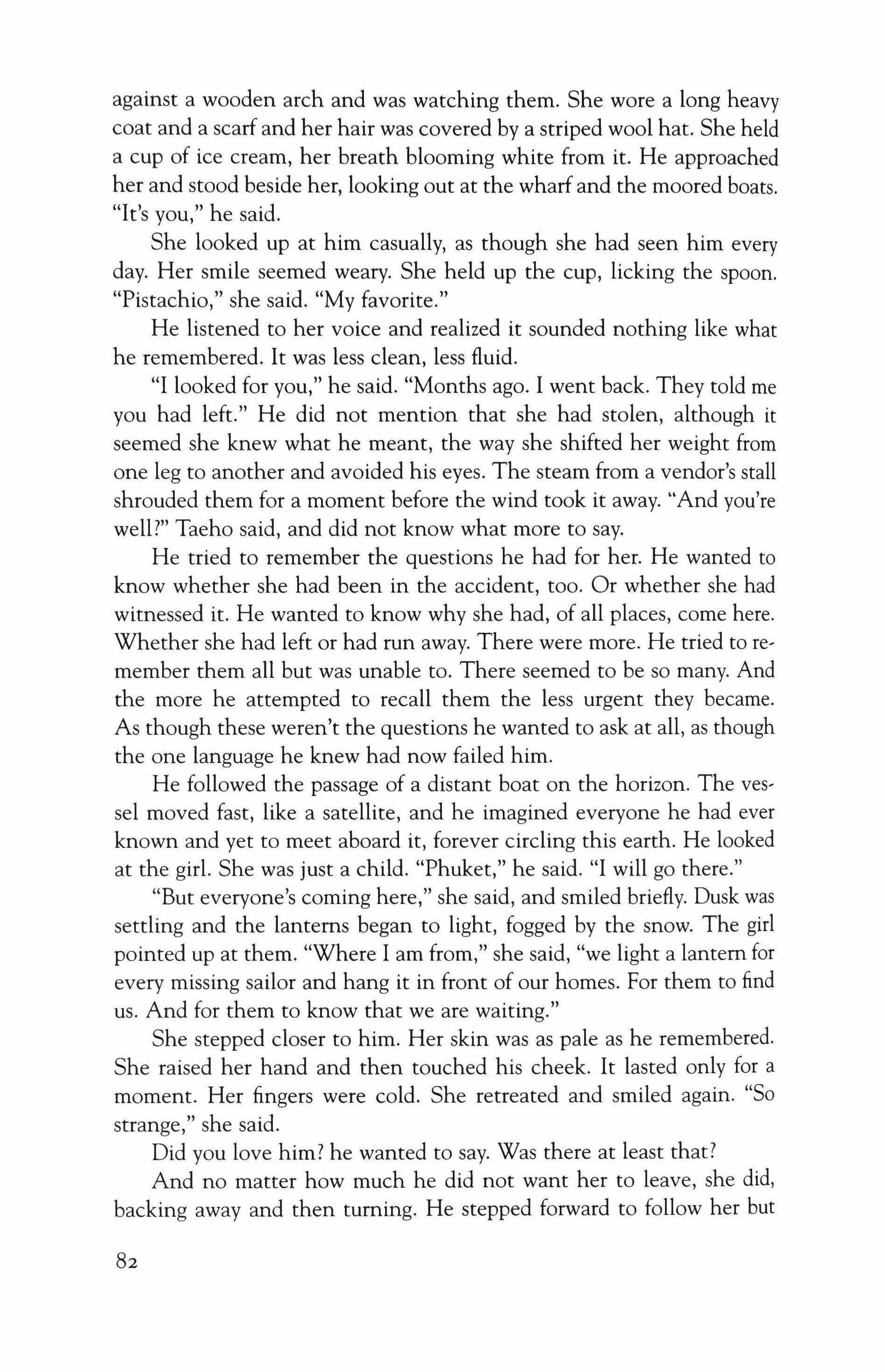
against a wooden arch and was watching them. She wore a long heavy coat and a scarf and her hair was covered by a striped wool hat. She held a cup of ice cream, her breath blooming white from it. He approached her and stood beside her, looking out at the wharf and the moored boats. "It's you," he said.
She looked up at him casually, as though she had seen him every day. Her smile seemed weary. She held up the cup, licking the spoon. "Pistachio," she said. "My favorite."
He listened to her voice and realized it sounded nothing like what he remembered. It was less clean, less fluid.
"I looked for you," he said. "Months ago. I went back. They told me you had left." He did not mention that she had stolen, although it seemed she knew what he meant, the way she shifted her weight from one leg to another and avoided his eyes. The steam from a vendor's stall shrouded them for a moment before the wind took it away. "And you're well?" Taeho said, and did not know what more to say.
He tried to remember the questions he had for her. He wanted to know whether she had been in the accident, too. Or whether she had witnessed it. He wanted to know why she had, of all places, come here. Whether she had left or had run away. There were more. He tried to remember them all but was unable to. There seemed to be so many. And the more he attempted to recall them the less urgent they became. As though these weren't the questions he wanted to ask at all, as though the one language he knew had now failed him.
He followed the passage of a distant boat on the horizon. The vessel moved fast, like a satellite, and he imagined everyone he had ever known and yet to meet aboard it, forever circling this earth. He looked at the girl. She was just a child. "Phuket," he said. "I will go there."
"But everyone's coming here," she said, and smiled briefly. Dusk was settling and the lanterns began to light, fogged by the snow. The girl pointed up at them. "Where I am from," she said, "we light a lantern for every missing sailor and hang it in front of our homes. For them to find us. And for them to know that we are waiting."
She stepped closer to him. Her skin was as pale as he remembered. She raised her hand and then touched his cheek. It lasted only for a moment. Her fingers were cold. She retreated and smiled again. "So strange," she said.
Did you love him? he wanted to say. Was there at least that?
And no matter how much he did not want her to leave, she did, backing away and then turning. He stepped forward to follow her but
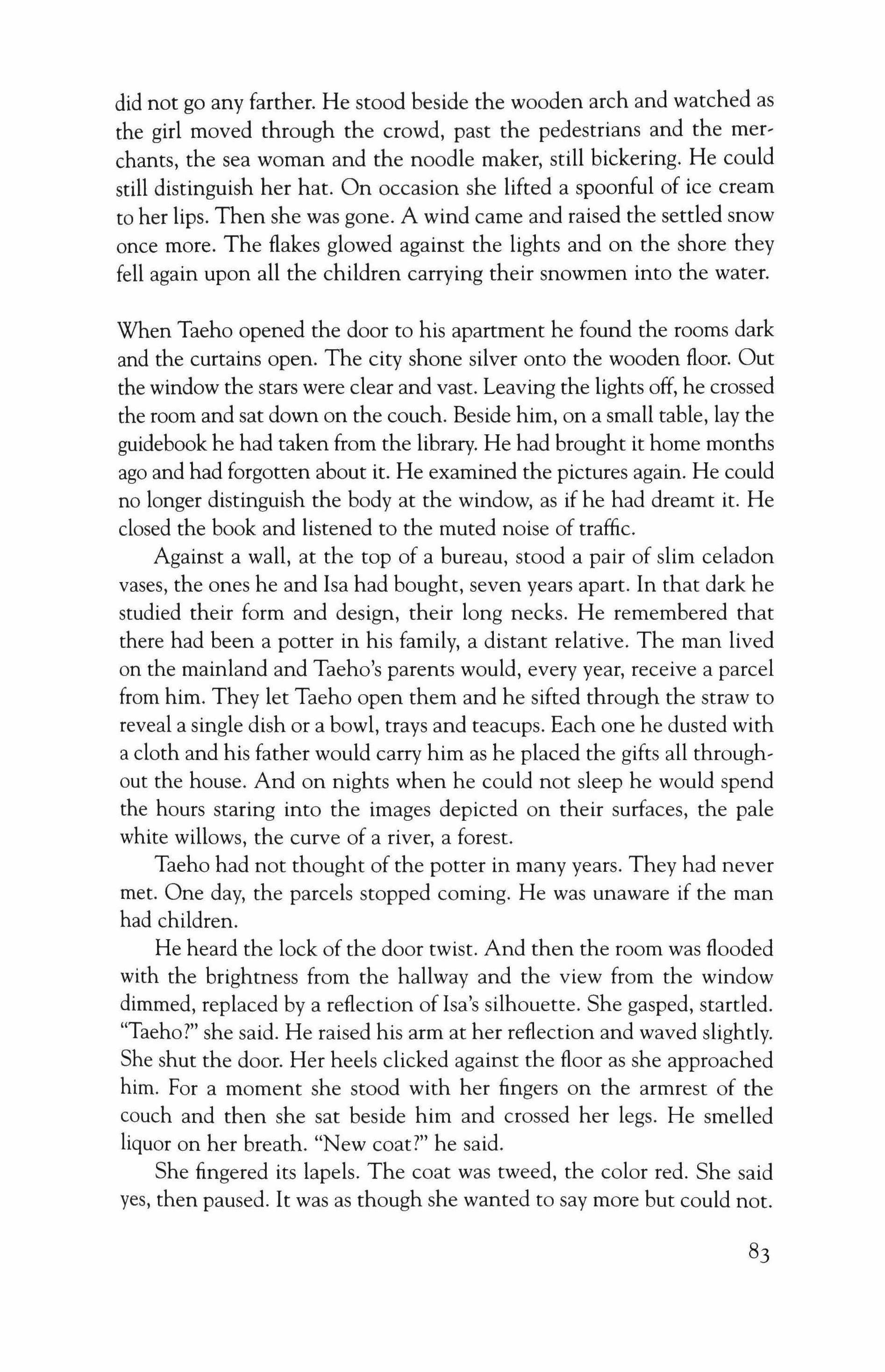
did not go any farther. He stood beside the wooden arch and watched as the girl moved through the crowd, past the pedestrians and the merchants, the sea woman and the noodle maker, still bickering. He could still distinguish her hat. On occasion she lifted a spoonful of ice cream to her lips. Then she was gone. A wind came and raised the settled snow once more. The flakes glowed against the lights and on the shore they fell again upon all the children carrying their snowmen into the water.
When Taeho opened the door to his apartment he found the rooms dark and the curtains open. The city shone silver onto the wooden floor. Out the window the stars were clear and vast. Leaving the lights off, he crossed the room and sat down on the couch. Beside him, on a small table, lay the guidebook he had taken from the library. He had brought it home months ago and had forgotten about it. He examined the pictures again. He could no longer distinguish the body at the window, as if he had dreamt it. He closed the book and listened to the muted noise of traffic.
Against a wall, at the top of a bureau, stood a pair of slim celadon vases, the ones he and Isa had bought, seven years apart. In that dark he studied their form and design, their long necks. He remembered that there had been a potter in his family, a distant relative. The man lived on the mainland and Taeho's parents would, every year, receive a parcel from him. They let Taeho open them and he sifted through the straw to reveal a single dish or a bowl, trays and teacups. Each one he dusted with a cloth and his father would carry him as he placed the gifts all throughout the house. And on nights when he could not sleep he would spend the hours staring into the images depicted on their surfaces, the pale white willows, the curve of a river, a forest.
Taeho had not thought of the potter in many years. They had never met. One day, the parcels stopped coming. He was unaware if the man had children.
He heard the lock of the door twist. And then the room was flooded with the brightness from the hallway and the view from the window dimmed, replaced by a reflection of Isa's silhouette. She gasped, startled. "Taeho?" she said. He raised his arm at her reflection and waved slightly. She shut the door. Her heels clicked against the floor as she approached him. For a moment she stood with her fingers on the armrest of the couch and then she sat beside him and crossed her legs. He smelled liquor on her breath. "New coat?" he said.
She fingered its lapels. The coat was tweed, the color red. She said yes, then paused. It was as though she wanted to say more but could not.
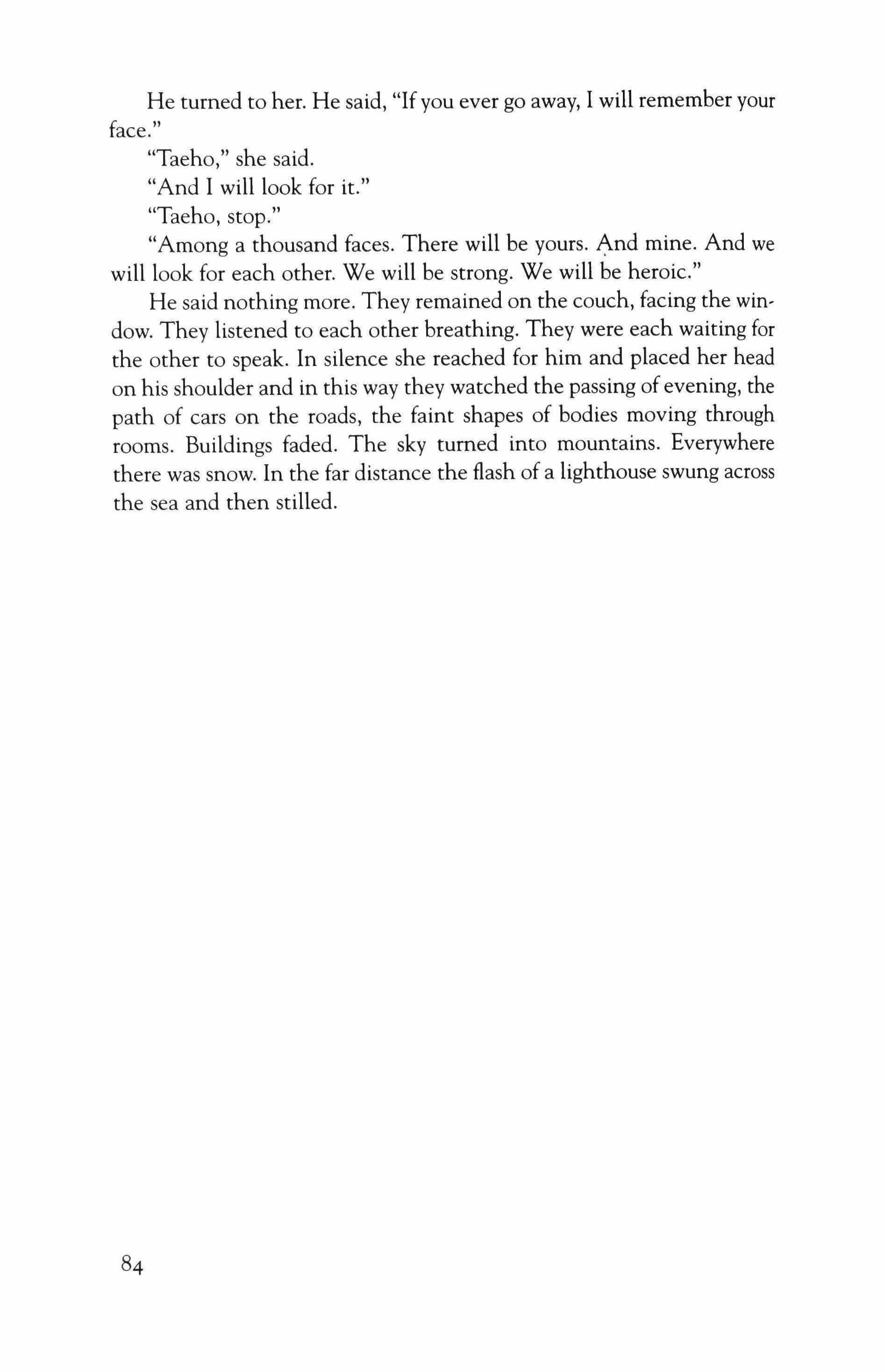
He turned to her. He said, "If you ever go away, I will remember your face."
"Taeho," she said.
"And I will look for it."
"Taeho, stop."
"Among a thousand faces. There will be yours. And mine. And we will look for each other. We will be strong. We will be heroic."
He said nothing more. They remained on the couch, facing the window. They listened to each other breathing. They were each waiting for the other to speak. In silence she reached for him and placed her head on his shoulder and in this way they watched the passing of evening, the path of cars on the roads, the faint shapes of bodies moving through rooms. Buildings faded. The sky turned into mountains. Everywhere there was snow. In the far distance the flash of a lighthouse swung across the sea and then stilled.
O. K. Wuori
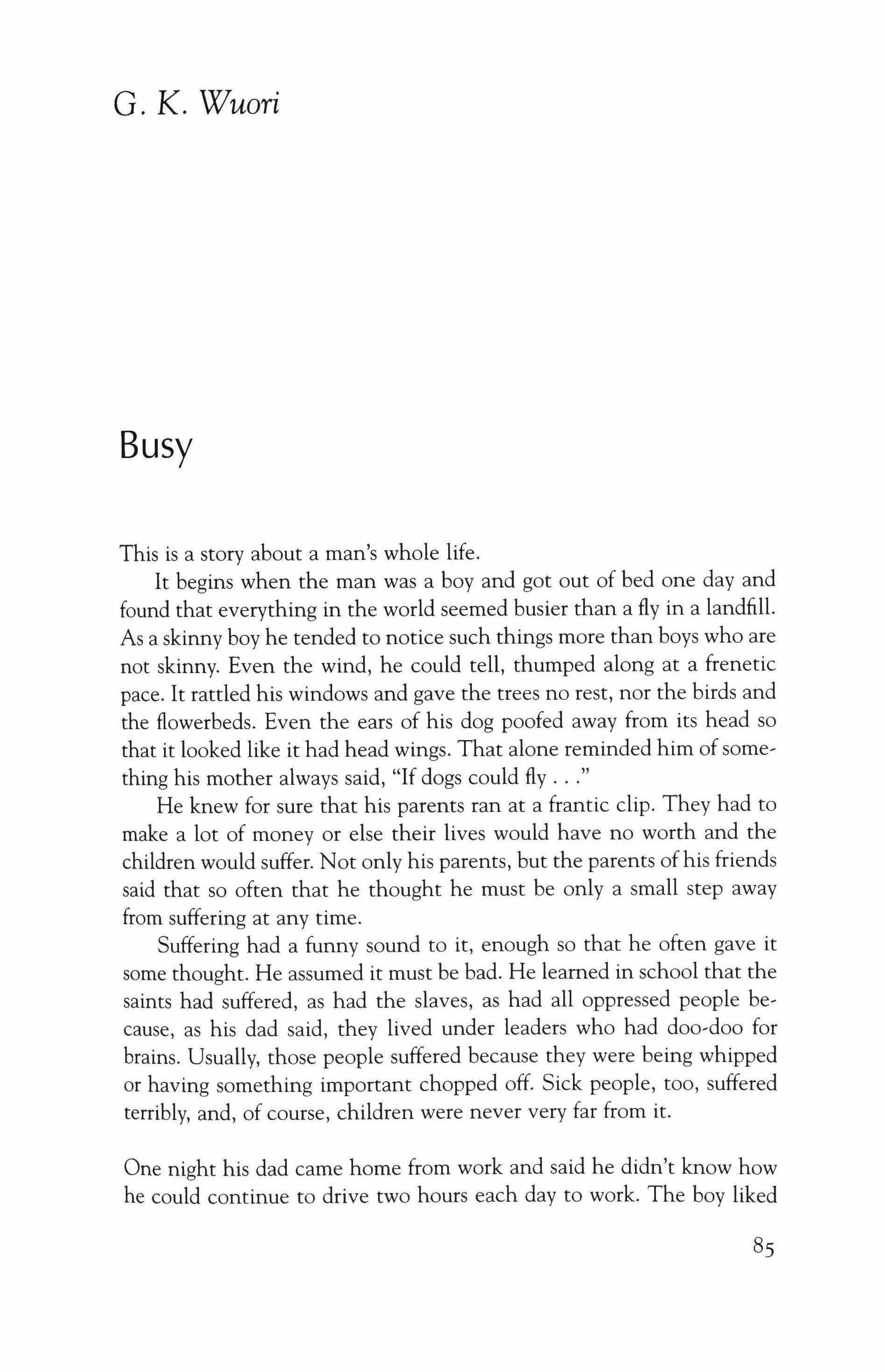
Busy
This is a story about a man's whole life.
It begins when the man was a boy and got out of bed one day and found that everything in the world seemed busier than a fly in a landfill. As a skinny boy he tended to notice such things more than boys who are not skinny. Even the wind, he could tell, thumped along at a frenetic pace. It rattled his windows and gave the trees no rest, nor the birds and the flowerbeds. Even the ears of his dog poofed away from its head so that it looked like it had head wings. That alone reminded him of something his mother always said, "If dogs could fly
He knew for sure that his parents ran at a frantic clip. They had to make a lot of money or else their lives would have no worth and the children would suffer. Not only his parents, but the parents ofhis friends said that so often that he thought he must be only a small step away from suffering at any time.
Suffering had a funny sound to it, enough so that he often gave it some thought. He assumed it must be bad. He learned in school that the saints had suffered, as had the slaves, as had all oppressed people because, as his dad said, they lived under leaders who had doo-doo for brains. Usually, those people suffered because they were being whipped or having something important chopped off. Sick people, too, suffered terribly, and, of course, children were never very far from it.
One night his dad came home from work and said he didn't know how he could continue to drive two hours each day to work. The boy liked
85

his father, a young man who lifted weights and drank beer at night. His mother, too, a union organizer, said she couldn't remember the last time she'd slept enough.
"What can you do?" they both said, pointing to the boy and his sister, and then adding, "We don't want them to suffer."
The young boy had lots of time, however, since his older sister avoided him as much as she could. She was active, too, rounding herself out (as she put it). She talked all the time about boys and algebra and ballet and perfecting her triple jump so that Mrs. Pettypump, the track coach, would think good thoughts about her.
Everyone thought it was important that people think good thoughts about you, and the boy wondered what contribution he could make so that people would think good thoughts about him. He thought he could become busy, but everybody was so busy they didn't notice anyone else who was busy-which was everyone.
So he decided, as a young boy might, to try something else. He'd seen a war memorial one time, a big stone general, and people said good things about the general and even had celebrations near him several times a year. The general, however, never moved, never sighed, never mopped his brow and confessed that he didn't know how he could go on, and no one thought that was bad.
One morning, then, the boy, whose name was Perkins, got on his bicycle and rode downtown to a park near the One Dollar Store. There were other stores downtown, but most of them were empty. Perkins thought they were empty because they had been so busy for years and years that they'd worn themselves out. Even his mother would say things like that sometimes. "I'm bushed," she'd say, "just empty. Worn out. Nobody home."
Perkins parked his bike on a small lot between two buildings. A fire one time had burned up the building on that lot, a nasty fire, but it left behind grass and space so he didn't think it had been all bad. The downtown had a certain empty, gray pallor to it so even that small patch of green seemed uplifting.
He arrived there at five o'clock in the morning since everyone always said you had to get up at the crack of dawn in order to make it in this world. His parents, of course, dashing around and getting ready for work as they did every day, didn't know he'd left the house. His mother yelled at Perkins's door, "See you tonight, honey. I love you," and his father said something similar.
86
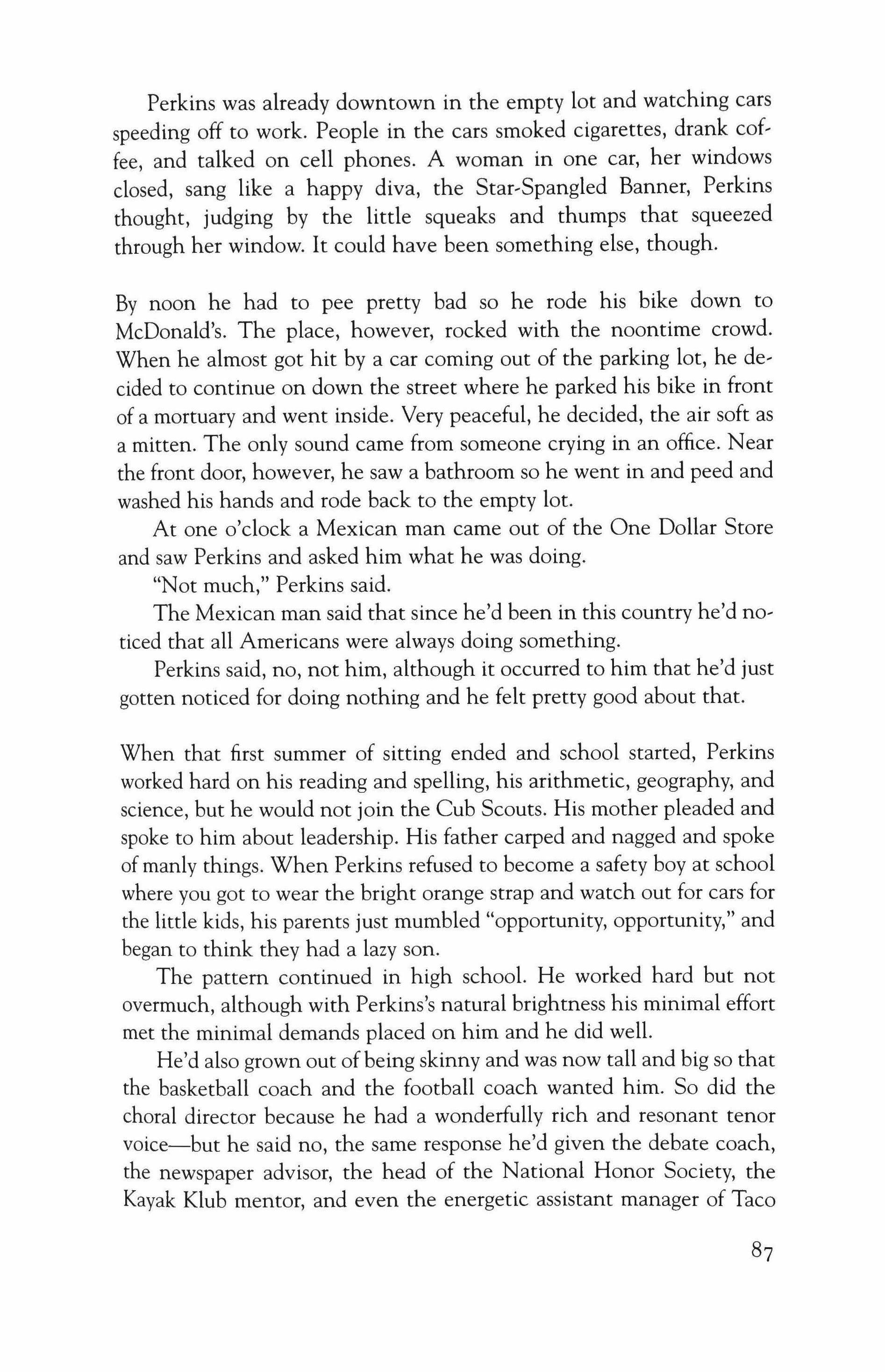
Perkins was already downtown in the empty lot and watching cars speeding off to work. People in the cars smoked cigarettes, drank coffee, and talked on cell phones. A woman in one car, her windows closed, sang like a happy diva, the Star-Spangled Banner, Perkins thought, judging by the little squeaks and thumps that squeezed through her window. It could have been something else, though.
By noon he had to pee pretty bad so he rode his bike down to McDonald's. The place, however, rocked with the noontime crowd. When he almost got hit by a car coming out of the parking lot, he decided to continue on down the street where he parked his bike in front of a mortuary and went inside. Very peaceful, he decided, the air soft as a mitten. The only sound came from someone crying in an office. Near the front door, however, he saw a bathroom so he went in and peed and washed his hands and rode back to the empty lot.
At one o'clock a Mexican man came out of the One Dollar Store and saw Perkins and asked him what he was doing.
"Not much," Perkins said.
The Mexican man said that since he'd been in this country he'd noticed that all Americans were always doing something.
Perkins said, no, not him, although it occurred to him that he'd just gotten noticed for doing nothing and he felt pretty good about that.
When that first summer of sitting ended and school started, Perkins worked hard on his reading and spelling, his arithmetic, geography, and science, but he would not join the Cub Scouts. His mother pleaded and spoke to him about leadership. His father carped and nagged and spoke of manly things. When Perkins refused to become a safety boy at school where you got to wear the bright orange strap and watch out for cars for the little kids, his parents just mumbled "opportunity, opportunity," and began to think they had a lazy son.
The pattern continued in high school. He worked hard but not overmuch, although with Perkins's natural brightness his minimal effort met the minimal demands placed on him and he did well.
He'd also grown out ofbeing skinny and was now tall and big so that the basketball coach and the football coach wanted him. So did the choral director because he had a wonderfully rich and resonant tenor voice-but he said no, the same response he'd given the debate coach, the newspaper advisor, the head of the National Honor Society, the Kayak Klub mentor, and even the energetic assistant manager of Taco

Bell (who was sleeping with Perkins's sister) who said Perkins had a job and all he could eat at Taco Bell anytime he wanted it.
By this time, the world had grown even busier. Most parents had at least two, sometimes three jobs. Because many people shopped on their computers twenty-four hours a day, lots and lots of stores stayed open twenty-four hours a day, staffed by parents whose babysitters were themselves on their second or third job of the day. One time, Perkins's mother looked at him and said, "The hurrier I go, the behinder I get," a saying Perkins had seen hanging up in his barber's shop. After saying it, though, his mother broke down into tears. She cried off and on like that for three months until one day she looked Perkins in the eye and said, "When the going gets tough, the tough get going."
Perkins observed that some people used little sayings like the way that other people used little pills. He thought the sayings didn't actually say much, but if they comforted someone like his mother then at least they probably didn't do anyone any harm.
Perkins continued to observe this spritzv-ditzy world (as he thought of it) from the car he often parked in that same little empty lot downtown. The Mexican man still came by but not as often. He'd become the head teller at the branch bank in town of a big bank not in town, and he was an acolyte in his church. On weekends and his days off he drove to some factories near Chicago where he sold work shoes to workers at a good profit.
Still, he managed to tell Perkins from time to time that he, Perkins, had the right idea. He even gave Perkins money because he said such a good idea needed financing and public support. Perkins had known and liked the Mexican man for a long time now, but he thought the man might be turning into a bit of a goof.
Perkins used the money to start the Institute For Things Slower Than You Can Usually Imagine, Sole Prop.: Perkins. He knew you could start an institute with little more than a piece of handmade letterhead stationery or a business card made out at Office Max. Actually, he knew you could start one with even less than that. Sometimes people started them by doing nothing more than saying that the institute-nowexisted. He knew celebrities often came to be celebrities in a similar fashion, and he told his mother the small book club she belonged to with six other women could be called an institute.
"It would be bigger than some of them," Perkins said.
88

"Really?" his mother said.
"You could call it the Institute Of Books We Talk About," he said.
"Oh, honey, we don't have time to think about such things. We hardly have time to read the books we talk about."
Nevertheless, someone must have thought the Institute For Things Slower Than You Can Usually Imagine was an idea the world really needed because they gave Perkins something called a "genius grant" so that he could continue with his idea. The grant was for four,hundred and seventy'five thousand dollars.
Perkins tried to return the money.
"I am no bubbling cauldron of ideas," he told the genius managers over the phone, "no suppurating sump of original insights."
The genius managers laughed at him (in a kindly way) and said that's what the great ones always said.
Stuck with the grant then, and still no less fond of his idea, he used the money to rent an empty store downtown for his institute. The store was right next to the grassy lot he'd been sitting in for years.
He bought an old desk and a chair and a lamp, as well as a print for the wall of the old Munch drawing that showed a man (as Perkins liked to joke) going in for a root canal. He washed and cleaned everything, even the dirty front window with the Mand in. Chin e Cuisi that caused him a lot of scraping with a razor blade.
He placed his furniture near the front window of his storefront in what seemed a reasonably pleasant arrangement. Sometimes Perkins sat at his desk with the green,shaded banker's lamp lit and read large books like Joyce's Ulysses or The Illustrated History of Baseball because he thought it important for people to know that such things went on and they couldn't be hurried. Other times, and for the same reason, he would sit there and play chess with himself.
One day a woman walked into Perkins's Institute and asked if he had anything for sale, particularly men's things since her husband was turn, ing forty and had about as much perk as a November garden in New England.
The woman was curvaceous and appealing and, with the day hot and steamy, dressed in comfortably thin, if slightly revealing, clothes. Perkins told her he, himself, had recently turned forty and hadn't no, ticed any change at all. Now and then, he said, he still had thoughts he'd first thought as a boy.

Perkins had never been in a hurry (naturally) to get married, but he saw in the woman's sweet skin and generous body a slow ride on a soft machine. He wondered if she'd ever played croquet.
"I don't sell anything," he finally told the woman.
"You don't?" she said, a look of disappointment on her face, although she thought the idea of someone being out in the world and having nothing at all to sell highly intriguing. She wondered if such a person might hold the key to a fine life. She also noticed a persistent itching in her left breast, not altogether unpleasant.
"No," Perkins said. "I have often recommended that the number of time zones in the world be tripled in order to slow things down. But I don't sell it. How could you sell such a thing?"
He stopped then and the woman said, "Oh."
"That's what I've recommended. Would you like to go have lunch?"
Visibly scratching her itchy breast, the woman said, "Do you have time?"
"It's the only thing we're given that we don't have to pay back," Perkins said.
"Wow," the woman responded.
"What's wrong?" Perkins asked as she reached into her dress and her bra and scratched furiously.
"I don't know," she said, "but it's not particularly bad."
They went to a Mexican restaurant down the street and lunched on burritos and fajitas and beer until four, when they went back to the Institute and made love on Perkins's bare floor. By the time the woman left for home the only light in the place came from the streetlight outside.
Perkins felt enchanted by the encounter, by a certain swiftness that had not seemed so bad. He was disturbed, too, although not by the lovemaking, good stuff that, slow and imaginative. The woman even ended up with a Phoenix Heating embossed (backwards) on her butt because they'd spent a long time on top of one ofthe floor heating vents, the furnace, of course, not running on such a hot day.
Nor was he disturbed because they'd said hello and tumbled just like that. Perkins did live in the real world and the real world sometimes put the goose to you and said, "Move, buster." Lightning storms came to mind, as did driving on the interstate highway near town.
What disturbed him most was that he hadn't gotten her name, neither the real one that might have been attached to her wedding ring, or even a nice one she might have made up. Their meeting required the

sort of loping reflection that could last for years, but Perkins didn't know how he could manage such reflection with only a "that girl" or "that woman" or even "that whopping piece of foxy ass" to hang the experience on.
"Whoops, gotta go," she'd said at about the time Perkins was thinking they should go over to the empty lot next to the Two Dollar Store and sleep under the stars. He thought that in such a place and with the whole night ahead of them he could explain star time to her, an idea he'd had to stretch things out so that people would calm down.
"For example," he could say, "from the time you get out of work on Friday to the time you go to work on Monday, you have, what, sixty hours or so to play with, including sleep time. Once we adjust the clocks, it'll be a thousand years. Think of the weekend!"
She would have laughed, he knew, and maybe her left breast would have started itching again because many of his ideas tended to infect people with a kind of scratchy truth. Unfortunately, other truths occasionally intruded, like the truth of a husband, she'd said in parting, and of chops she had to fry before he got home from work at ten.
Periodically, Perkins received a note from the genius people asking about his activities and if he was keeping busy and what was he doing. When he wrote back and told them, "Yes I am, thank you," and "Not much," he saw success in his words, though he assumed the managers of the geniuses didn't. One time, he took some ofhis money and published The Thousand-Year Weekend and sent them a copy. The genius people didn't get back to him about the booklet, but he thought they must have circulated it somewhere because he did receive a nasty letter signed by the presidents of the Teamsters Union, AFSCME, and the International Brotherhood of Electrical Workers.
Perkins decided, after that, not to put his words into print. The closest he came to publishing anything else occurred when he put the twelve clocks in his window that showed the twelve time zones of the continental U.S. People walking by the Institute scratched their head when they saw Calais, Maine reading noon with Seattle at midnight. Most people saw it as a marketing scheme launched by McDonald's or Amoco and they didn't like it, but since the time right there in Perkins's town was always about what people thought it should be, they didn't get too riled up about it. In fact, some people even said it made the country feel more spread out, a little less crowded in both people and deeds.
91

One woman told Perkins she no longer felt obligated to think about California, and her life, as a result, had improved a lot.
At the age of sixty, Perkins decided-with great irony-that he needed to slow down. He'd been true to his principles but, still, time had whirred by like a gizmo. He was handsome as always, even distinguished with his full head of gray hair, and tall as ever-unstooped due to long hours spent lying on his hardwood floor reading things like Trollope, Kant, and the Reader's Digest.
He sold his house and took a small apartment above a beauty shop just down the street from the Institute and furnished it with good things from a resale store. Now and then some noises came up to him from the beauty shop, but they were comforting noises-female laughter, sprightly conversations-and it didn't seem so bad to have a taste of the sounds of commerce in his life from time to time.
The owner of the building and manager of the beauty shop was a woman by the name of Tan Linda (as Perkins called her). A short woman with long hair and a great deal of respect for Perkins, Tan Linda knew of Perkins's genius and accomplishments (Major League Baseball right on the verge of adopting the "slow ball," a Perkinsian notion) and always responded to life's little setbacks with a resolute, "When things get tough, I put my faith in the man upstairs."
Perkins had fixed some plumbing for her shortly after he moved in, and he always paid his rent on time. Although Tan Linda reminded Perkins of a hamster trying to spin both ways on a wheel, he enjoyed talking with her when she cut his hair. She told him he had hair like pampas grass and that he ought to let it grow down to his waist.
Tan Linda and Perkins slept together, too, when she had a slow afternoon or evening, usually in his apartment, sometimes in his office, and occasionally using one of the twirly chairs in her shop.
One time, Perkins got a little worried when he began seeing a number of women around town wearing Tshirts that read, I Got Mine At Phoenix Heating, but then he realized it was only a promotional stunt by Phoenix Heating. He felt relieved and decided to get a small throw rug to put on top of that heating register. Then he decided not to. Perkins had a slow way of being funny.
His only worry upon retirement had to do with his genius money. Unfortunately, living slower than nearly anyone else could imagine had

never been expensive. He'd had a small house payment for his small house, his office lease, his modest "salary," some utilities, and that was it.
When his mutual fund statement first hit seven figures he flew off to a conference in Chapel Hill devoted to a study of the southern drawl, but the experience had been so hectic it felt like he'd got his necktie caught in the radiator fan of a car. He'd written an apology for his transgression to the genius people and fined himself a thousand dollars.
He'd given that money to a single mother of two who'd opened up a pickle store next to his office. She had pickled figs, pickled apples, pickled sausages, pickled flowers, and, of course, lots of pickled cucumbers-sweet, dill, sour, Polish, sliced, whole, and chunked. She also had a lot of time on her hands since hardly anyone bought pickles, and a near-permanent Phoenix Heating on her butt since she was as generous to Perkins with her body as he was with his money. Perkins had long before learned that a man who seems to have nothing to do exerts a powerful attraction on certain women.
When the account became large enough that he could have bought a small town, Perkins stopped looking at his statements. Instead, once a month he'd go and sit in the empty lot next to the Three Dollar Store and think about the money. He came to some interesting conclusions that he occasionally wrote down:
Good people wanted the money. Bad people wanted the money.
He'd been given the money in the first place, so he ought to give it away in the last place.
Wouldn't it be fun to give someone seven million dollars in pennies?
Could you declare bankruptcy if you weren't broke?
Doesn't thinking about money lead you down some pretty dumb pathways?
He wrote to the genius people and told them that, since he'd been given the money because he was a genius, could he now return it as he was getting old and kind of stupid?
They wrote back and asked him to stop writing nutty letters.
Fully retired, Perkins began doing needlepoint. A matter of roots, he told the women in the beauty shop, a matter of long experience. The work was slow-going but he worked steadily and often, his fingers seeming to draw him into transporting reveries where easy thoughts tumbled into his mind like sweet melons and just as easily tumbled out again.
93

Perkins designed his own needlepoint patterns and very often worked in Tan Linda's shop so that he could chat with the women as they had their hair and toenails and fingernails done.
They all thought Perkins a cute old man with whom you could easily trade sexy jokes. They told him they'd never seen anyone as skilled with a needle nor as patient, a compliment Perkins took with generosity and a grain of salt, since hardly any women knew how to sew anymore. Still, they had enough sensitivity to detect fine craft and the occasional foray into revealed art and he gave them that.
He also gave Tan Linda the pillows he made. She put them in the bay window at the front of her shop and sold them. No, Perkins told her again and again, he didn't want the money. He had plenty of money but he wanted her to have the pillows as a cushion-literally, he saidagainst the slow times, something that these good women could buy for maybe ten or twenty dollars. Affordable luxury, he told her-you could hardly find that around these days.
Besides, he said, he enjoyed her company and the peppy cheer ofthe shop and the women, and especially the way they sometimes revealed themselves under the intimacy of her care. He didn't want anything to change, he told her, until long after he'd become dust and meal and part of something that bloomed on a foggy August morning.
Pillows, too, he thought-no better gift to give a fast-paced world. A man's genius stitched in color into a sturdy fabric imported from a textile mill in northern Vermont; the back of his pillows a tough denim or corduroy or muslin or combed burlap, the whole thing wrapped around a thick and comfortable foam envelope-what more could a man want to give the world?
That's Perkins, he told himself, the man and his mark, each pillow encouraging rest and relaxation, long naps and the meditative succor of easy dreams, good dreams, each pillow, too (as he wrote to the genius people, his last letter ever to them since they were getting snippier and snippier), stuffed with hundred-dollar bills.
That's what you do with your money, Perkins concluded. You give it up in such a way that it brings only comfort, kind of like having a Phoenix Heating embossed on your butt.
94
Kevin Stein

On Being a Nielsen Family
We pocket five ones when we agree, fingered cash our soul's ransom. And a Family Viewership Record Book for each TV, of which we've three. We are the Postmodem Descartes, pledging, "I watch, therefore I am." We're the grand experiment that was America, both scientist and the mouse with a human ear stitched to it pink back, checking the appropriate idiot-box boxes.
We're our own Peeping Tom, peering in. On stage, we're culture's disguise, the way a bickering couple makes nice once the bell ding-dongs neighbors in for cocktails and unsalted Cheese Nips.
Though it's Oprah, we circle BBC News. Though Jerry Springer, we mark Charlie Rose. No no no. Not South Park, not Cops, not World's Funniest Animal Tricks, but History Channel and Discovery.
NASA Live, Nightline, and Devotionals, the Food Network's Thanksgiving Day Vegan Special. We are watched watching, watching ourselves watched. We are never enough, and the lie is as we wish to be.
95
Parable of the American Stag Party

Google Candy Barr and you'll get snickers, but not caramel, peanuts and milk chocolate. At 16, Candy blushed as her dress peeled off,
demure in Smart Alec, the fab fifties' stag filmdoor knock, small talk, then lucky Alec forgetting to yank his black socks off.
Marx claims the body's a model of commodity reification. Women use it to make a buck, undressing for a fee while dancing to the band's boom-boom.
Men use it to make a point, strapping a svelte bomb belt around the Palestinian girl's belly, another lethal boom. Let us pray: the body's the devil's
weapon of choice. Ask the Reverend Samson after his televised fall from grace. Ask the woman who's darkly veiled. Ask the man who veiled her.
Candy Barr made the news and thus a living, shooting the drunk-beat-her-up husband just a little, bad press good for sales. Busted toking weed
she pending-appeal-seduced mobster Mickey Cohen, then wept for dead JFK and blubbered for lover Jack Ruby when he whacked Oswald among
the assembled white hats, the crescendo a weekend fling with the pre-Viagra Hefner-hers a rogue's symphony of modem American malehood.
In her honor, the Sexy Action News Team delivers horror perfectly coiffed, ties and rouge blood-red, diagnosing us in need of ethical push-ups.

Though I never saw her naked or nearly so, nearly the illusion men come for, dollars in their fist of teeth, fantasy rides me into our long night.
Never mind she wasn't my wife or daughter, never mind the coarsening of digital culture. He without sin casts the first censor.
97
Colonialism
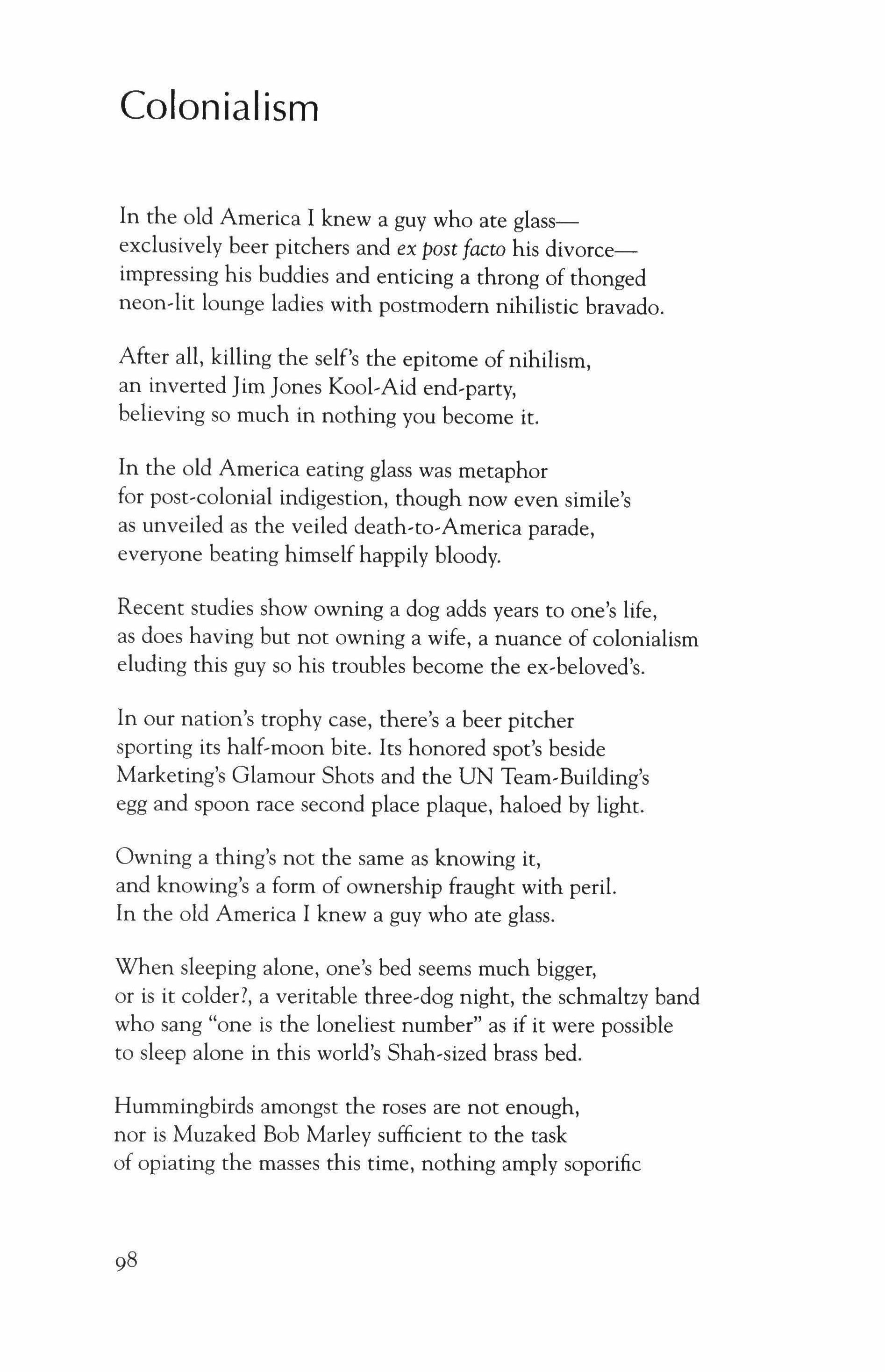
In the old America I knew a guy who ate glassexclusively beer pitchers and ex post facto his divorceimpressing his buddies and enticing a throng of thonged neon-lit lounge ladies with postmodern nihilistic bravado.
After all, killing the self's the epitome of nihilism, an inverted Jim Jones Kool-Aid end-party, believing so much in nothing you become it.
In the old America eating glass was metaphor for post-colonial indigestion, though now even simile's as unveiled as the veiled death-to-America parade, everyone beating himself happily bloody.
Recent studies show owning a dog adds years to one's life, as does having but not owning a wife, a nuance of colonialism eluding this guy so his troubles become the ex-beloved's.
In our nation's trophy case, there's a beer pitcher sporting its half-moon bite. Its honored spot's beside Marketing's Glamour Shots and the UN Team-Building's egg and spoon race second place plaque, haloed by light.
Owning a thing's not the same as knowing it, and knowing's a form of ownership fraught with peril. In the old America I knew a guy who ate glass.
When sleeping alone, one's bed seems much bigger, or is it colder?, a veritable three-dog night, the schmaltzy band who sang "one is the loneliest number" as if it were possible to sleep alone in this world's Shah-sized brass bed.
Hummingbirds amongst the roses are not enough, nor is Muzaked Bob Marley sufficient to the task of opiating the masses this time, nothing amply soporific

to forestall the terrible angel on wing. Americans no longer consider men with beards to be wise. Look behind us. History's bicep bulges blue, flexing its fresh tattoo. See, it's Benjamin's angel of history and one star-struck horse shucking debris in want of keeping up. Some days we're the horse, most days debris. Detritus has "us" in it, and that ink's no cartoon joke.
99
Sandra M. Gilbert

Old Recipes
1
o where are the long,gone picnic,perfect days
when we reeled a sunny woozy loop from house to house, broad Effie, red,faced Bob, with bowls of eggplant soup, grilled crepinettes, wild rice, Moneera with vine leaves, Myrna with garlic snailsthen down to the clammy beach, where Bob & Doug snuggled under a cliff & cavorting kids kicked sand while my mom, throned on a splintery log, lamented loneliness & passed out Band-Aids.
Once "Uncle Fred" led our children over the bluff & down to----whereI-while I clutched their daddy's wrist in terror-then they marched back looking tough (& unapologetic Fred came last)-
o those were Fellini days of dolce vita, when the glass was full, the margaritas sweeter!
100

2.
Where's southern Bob, who turned a wicked phrase
while stirring negronis that were stronger, sweeter, than what you could drink at Harry's Bar in Venice?
Where are his steaming pots of rebollito, his lazy days on the sofa watching tennis?
Where's Doug, who stole Bob's heart & then his house?
And what of Moneera, who was stout & stem till cancer gobbled Bob's esophagus
so she couldn't eat or sleep, her pounds were gone
Now Doug is sunk under the water table, Moneera stumbles & trips across her cane, Bob's seersuckers have gone to the Good Will, and we'll never eat his Hopping John again,
But the bygone days were lucky with casseroles, charades & lyrical imbroglios.
3.
Where are the kids who tumbled through my house, their sidewalk hopscotch, teen imbroglios, the kitchen glasses crashing ("it just broke"), the lunchbox Ding Dongs, the Spaghettios, the candles flaring on the birthday cake?
And where's their dad, who once, when left alone, roasted & stuffed a turkey for himself, and boiled the carcass, strained the leavings finewhere's his broth, his bark, his bite, his laugh?
Driving past flocks on the greening hills, he joked "Little lamb who made thee," then replied, "Brillat-Savarin made me!" Born to be cooked, the snowy babies innocently baaed.
They didn't know they'd be chopped up & browned, or end (like him) in an oven underground.
101

4.
Where are the Hallowe' ens & Christmases, those special days on cosy sacred ground? Like ninepins lined along the festal board, grandma, grandpa, mom, dad, kiddies, dinedlobster salad, eggplant caviar!with tricky treats heaped high on the buffet or a tinselly tree aglow in the living room. Sometimes we'd been to midnight mass to pray, but still the ninepins toppled one by one.
Then came the priests with holy bread & wine, and magic oil to seal God's pact with us: their purple swallowed grandma & her cane, grandpa et al. all fell into their chalice, and now the long-gone children's holidays glimmer & fade in ghostly videos.
5.
Where's What, who boiled up this starry absence,
this ache of dread that haunts the videos and tightens like one nerve along the food chain? Suppose it's all just tooth & claw, suppose zero times zero roasts in the toasty oven?
Blue saints & pasty abbesses once planned al fresco luncheon dates in paradise, and Hindu fakirs sat on nails & thinned while Buddha gained weight awaiting emptiness.
What sweets for the sweaty, though, the fleshy mob hungering for picnics in the grass?
Spread out the blanket, love, unpack your bib, wipe that scowl away & raise a glass
to the yeasty nothing that makes the cupcakes rise, and the nothing that fattens the picnic-perfect days.
102
Beth Ann Fennelly

The Welcoming: An Ars Poetica
Distance was the house from which I welcomed you.
Time, time was the house, and to welcome you I strung garlands of eggshells and rubies.
Thirsty, I welcomed you, you the salt sucked from the tips of braids after running from the ocean of someone else's childhood.
I turned the skeleton key. I welcomed you from the narthex of invisible churches.
There at the marble bar at the Folies,Bergere I welcomed you in the mirror, waving my chartreuse tumbler, wearing my velvet choker, wafting my nocturnal perfume.
On the subway of extranjeros I patted the empty seat beside me.
I foraged for you in welcome. Like a bottlenose dolphin, I tore sponge from the sea floor covered my beautiful nose with it and dug between barnacled rocks. Yes I welcomed you with my efficient body.
I welcomed you from the house of memory, where I am lonely.
Again I vow not to think about whether you arrived, or in what state.
103

Just that I was there, welcoming with a singed collar, with a bee balmed in amber, with an oyster cracker, a seashell full of champagne.
I welcomed you from a house of needles. I welcomed you from the fists of babies. Standing on the doormat of my black shadow, with a beginner's brow, with a hoop of angels, with the ache of unlit candles, I welcome you.
104
Sidney Wade
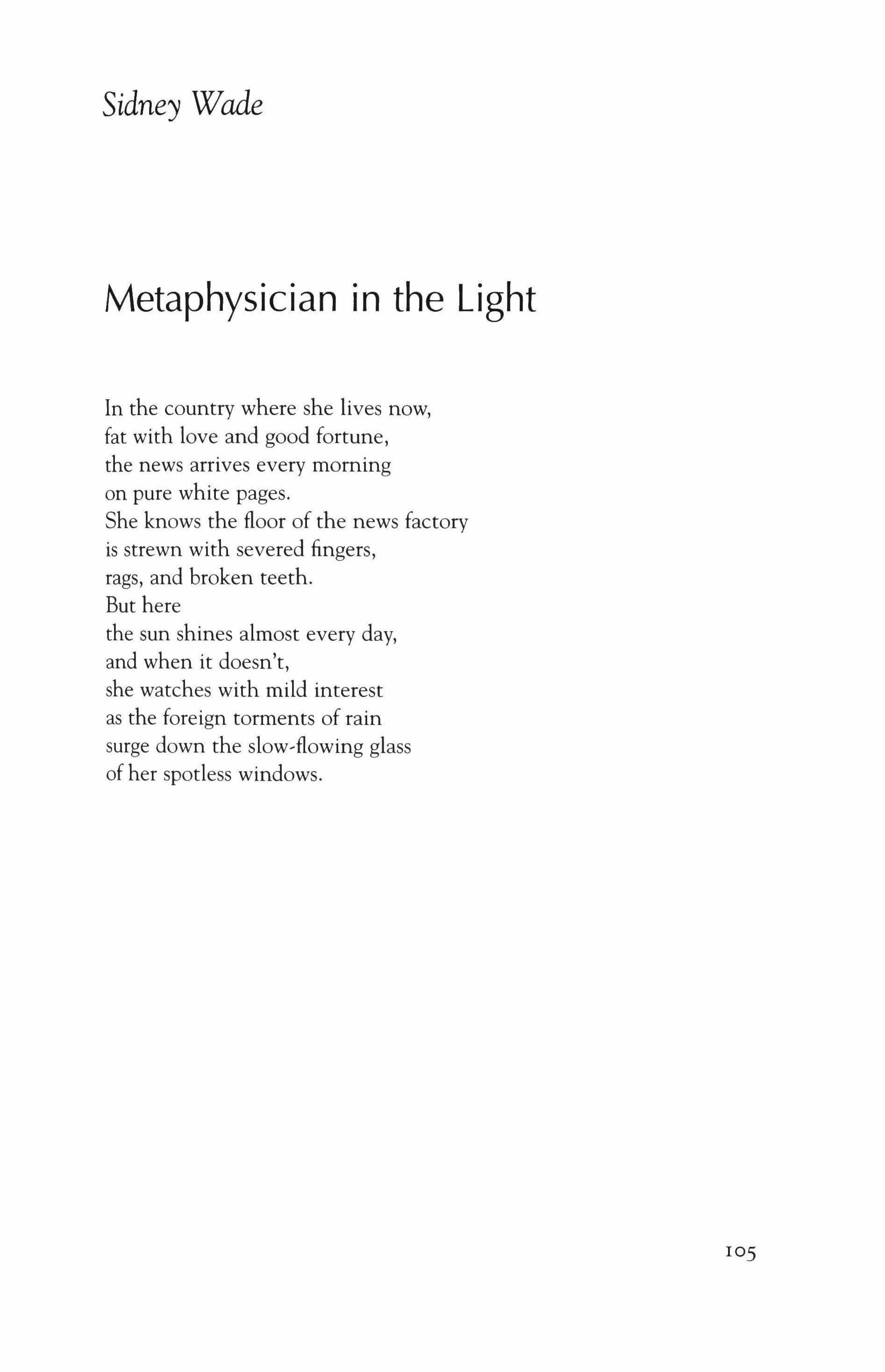
Metaphysician in the Light
In the country where she lives now, fat with love and good fortune, the news arrives every morning on pure white pages. She knows the floor of the news factory is strewn with severed fingers, rags, and broken teeth. But here the sun shines almost every day, and when it doesn't, she watches with mild interest as the foreign torments of rain surge down the slow-flowing glass of her spotless windows.
105
Metaphysician in the Dark
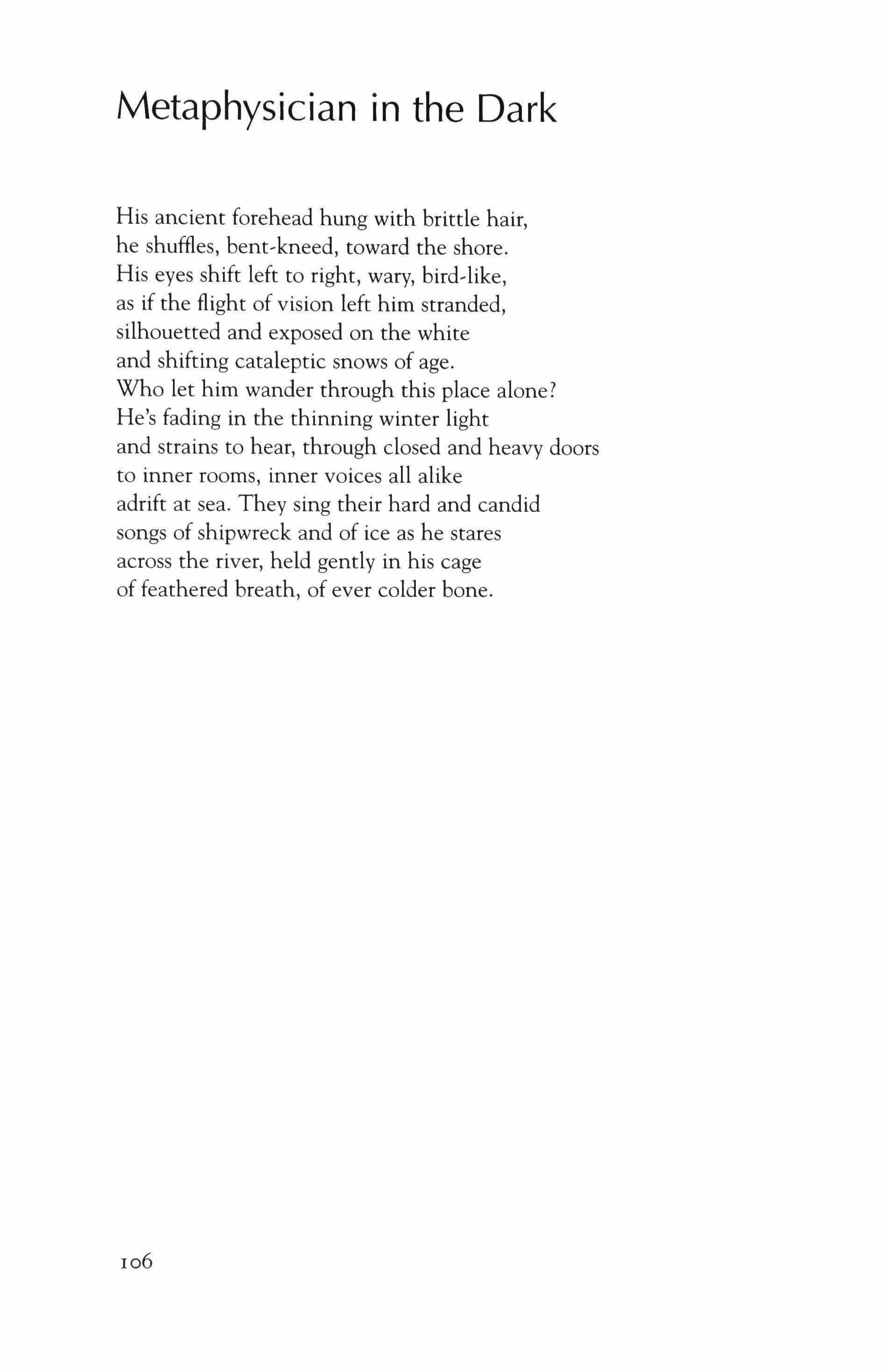
His ancient forehead hung with brittle hair, he shuffles, bent-kneed, toward the shore. His eyes shift left to right, wary, bird-like, as if the flight of vision left him stranded, silhouetted and exposed on the white and shifting cataleptic snows of age. Who let him wander through this place alone? He's fading in the thinning winter light and strains to hear, through closed and heavy doors to inner rooms, inner voices all alike adrift at sea. They sing their hard and candid songs of shipwreck and of ice as he stares across the river, held gently in his cage of feathered breath, of ever colder bone.
106
A Computerized Jet Fountain in the Detroit Metro Airport
To Richard Wilbur
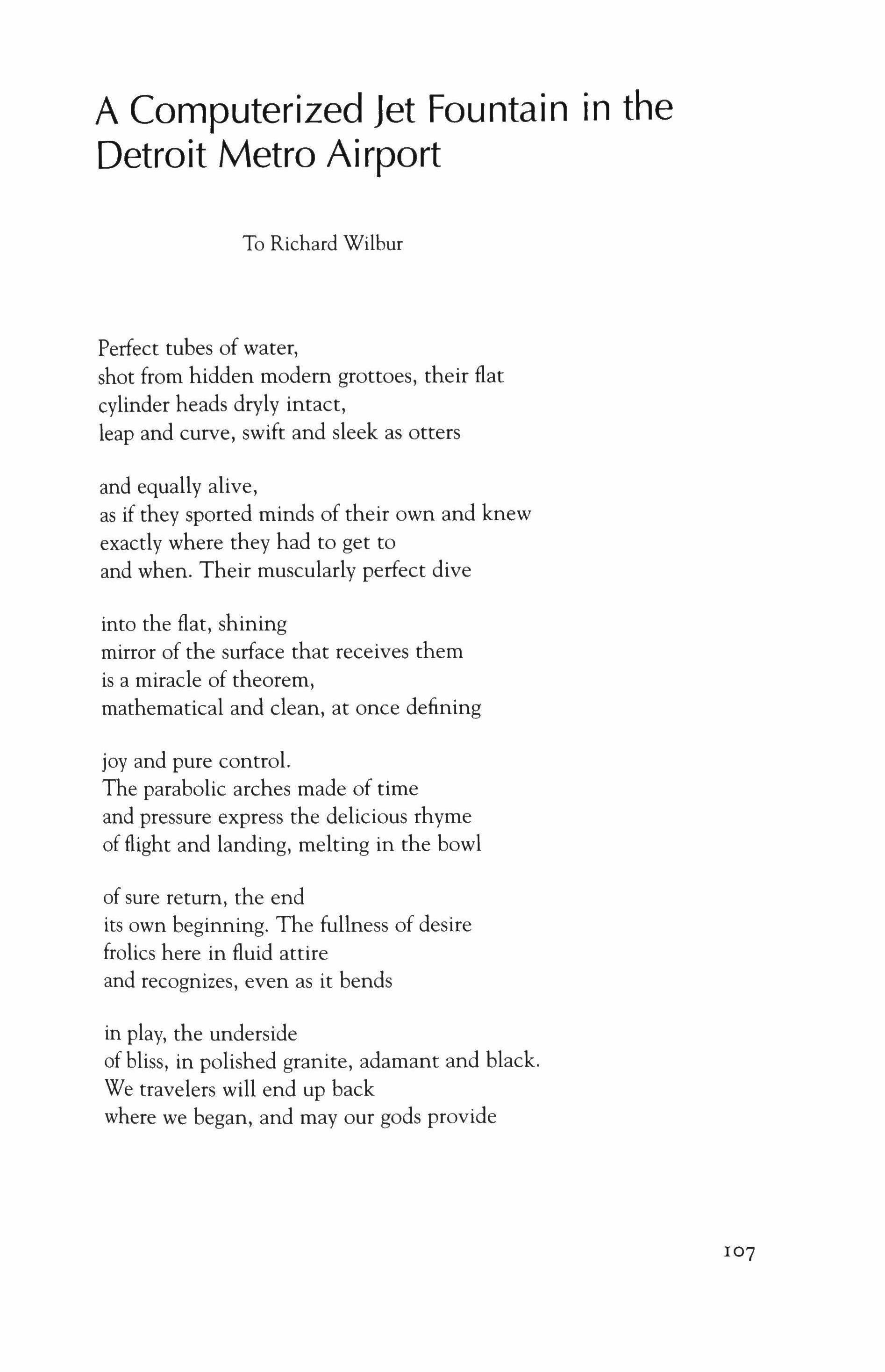
Perfect tubes of water, shot from hidden modem grottoes, their flat cylinder heads dryly intact, leap and curve, swift and sleek as otters and equally alive, as if they sported minds of their own and knew exactly where they had to get to and when. Their muscularly perfect dive into the flat, shining mirror of the surface that receives them is a miracle of theorem, mathematical and clean, at once defining joy and pure control. The parabolic arches made of time and pressure express the delicious rhyme of flight and landing, melting in the bowl of sure return, the end its own beginning. The fullness of desire frolics here in fluid attire and recognizes, even as it bends in play, the underside of bliss, in polished granite, adamant and black. We travelers will end up back where we began, and may our gods provide
107

us all with equal grace and fluent spirit on our way, even if our paths won't chart the heaven towards which all hungers leap, all pleasures race.
108
Joshua Weiner
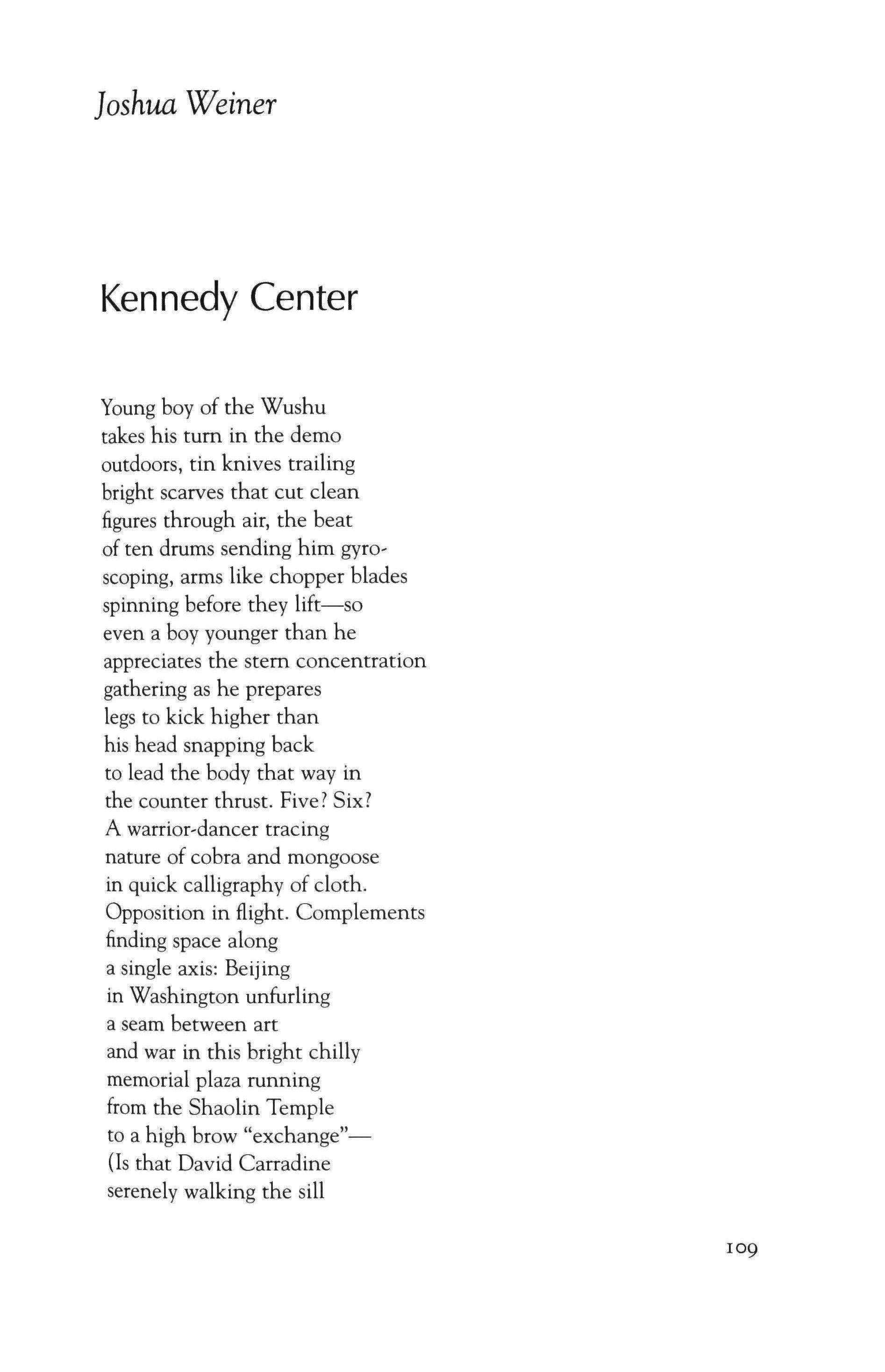
Kennedy Center
Young boy of the Wushu takes his tum in the demo outdoors, tin knives trailing bright scarves that cut clean figures through air, the beat of ten drums sending him gyroscoping, arms like chopper blades spinning before they lift-so even a boy younger than he appreciates the stem concentration gathering as he prepares legs to kick higher than his head snapping back to lead the body that way in the counter thrust. Five? Six? A warrior-dancer tracing nature of cobra and mongoose in quick calligraphy of cloth. Opposition in flight. Complements finding space along a single axis: Beijing in Washington unfurling a seam between art and war in this bright chilly memorial plaza running from the Shaolin Temple to a high brow "exchange"(Is that David Carradine serenely walking the sill
109

above Rock Creek Parkway?) Thus, Grasshopper, hold in the mind the life-size terra-cotta warriors of First Emperor Qin, two of eight thousand upstairs encased in glass ready to meet the enemy on the eternal march to Heaven; but it's not Heaven, only two levels higher than street that the army copters serving as v.P.-escort angle along the river, open doors framing the soldiers, goggles and guns looking back at us eye to eye, calculating the shot between us, only one instant in the new migration. And our house too has its new hero of his story, who wakes from dream and gathers light-saber, pirate knife, and jeweled rapier to make the journey from mountain peak to peaceful valley where he lays his weapons at the foot of our bed before burrowing between us, first light thin as a transparent seam between here and there, us and them; while the great metal bird, having heard the call, touches ground behind concrete ramparts that nest permanently now on the busy downtown streets in the evitable yet already opened next theater of operations. 110
Florida: Schoolboy on Break
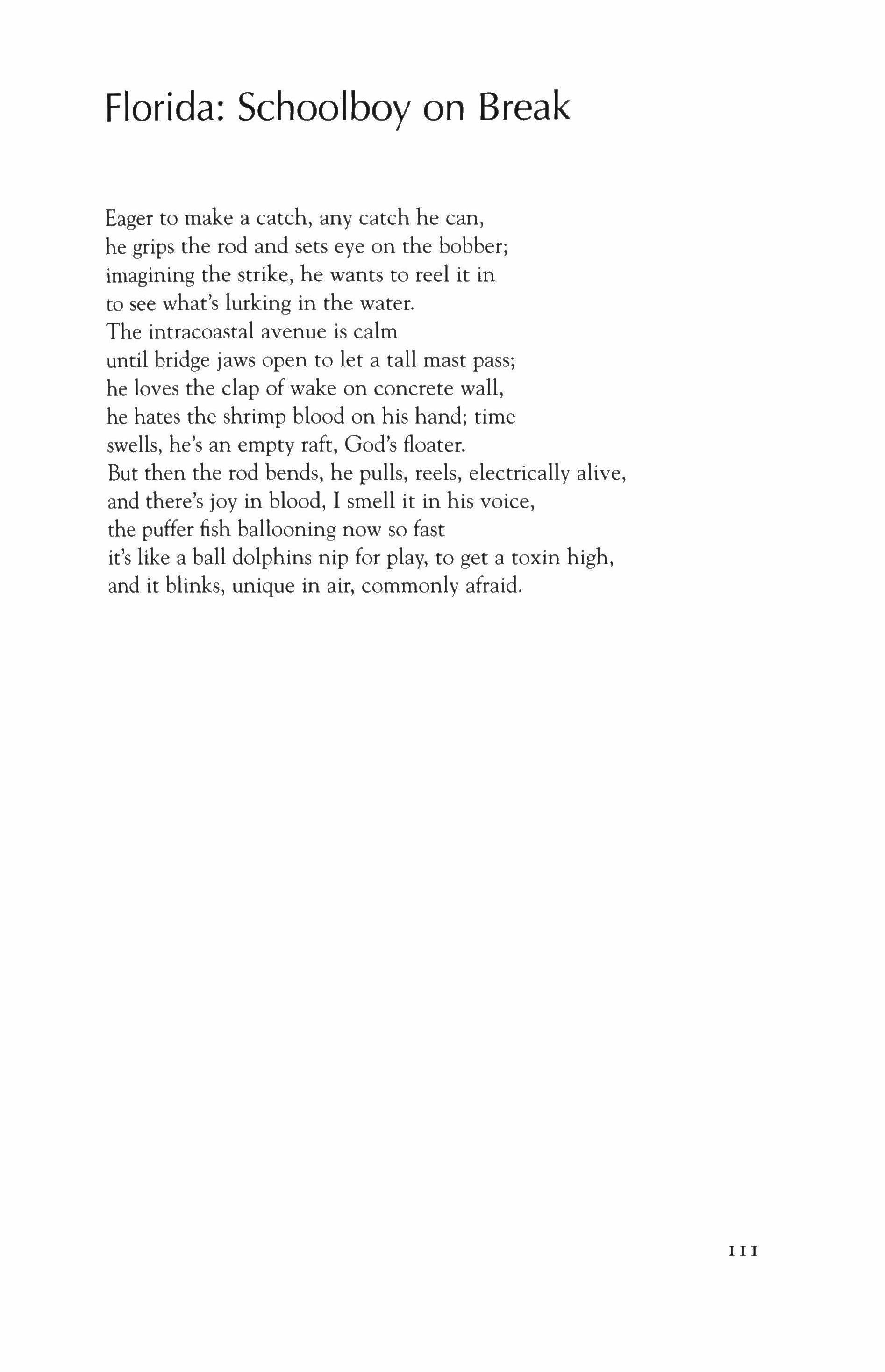
Eager to make a catch, any catch he can, he grips the rod and sets eye on the bobber; imagining the strike, he wants to reel it in to see what's lurking in the water. The intracoastal avenue is calm until bridge jaws open to let a tall mast pass; he loves the clap of wake on concrete wall, he hates the shrimp blood on his hand; time swells, he's an empty raft, God's floater. But then the rod bends, he pulls, reels, electrically alive, and there's joy in blood, I smell it in his voice, the puffer fish ballooning now so fast it's like a ball dolphins nip for play, to get a toxin high, and it blinks, unique in air, commonly afraid.
III
Old Poet

Vatic austerity impaired now by a broken brain sprouting thin silver, feted one who can't make sentence without a stumble lost in the floating synapse, he forces lips to fashion a loose word-string cinching his audience, do they still love him with their well-meaning unease and sentiment? How he dominates through his frailty, perched at the podium, his pride like an astringent mist coating the ear. Pure will without uprising, he kicks up dust from parched earth, his dream of rain-spill and girls draped in gold scarf a kind of final grope, a selfstyled Odysseus, shipwrecked and naked on the beach, horny motherfucker shooting blanks at the maidens of Nausikaa.
112
Enid Harlow
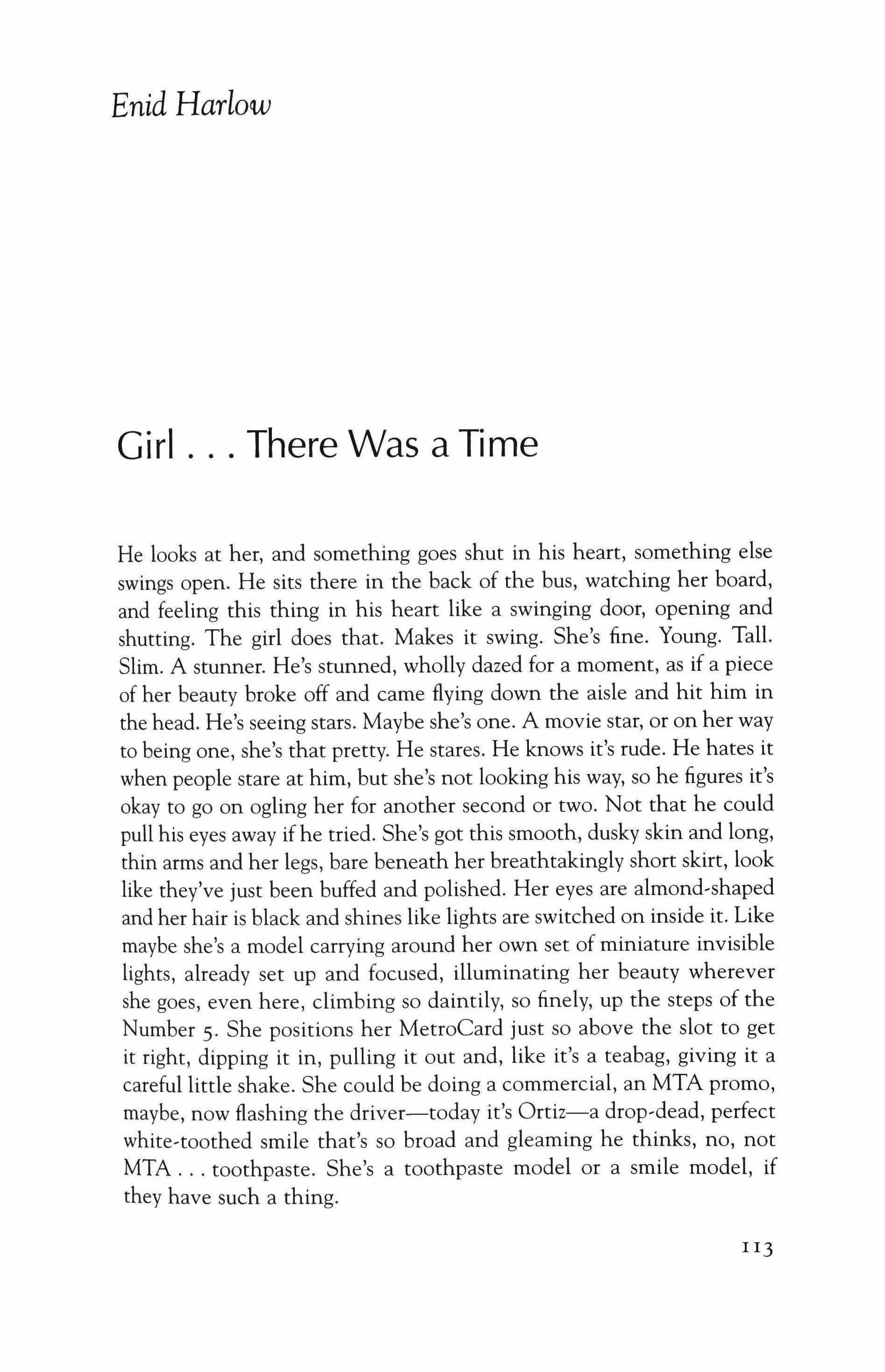
Girl There Was a Time
He looks at her, and something goes shut in his heart, something else swings open. He sits there in the back of the bus, watching her board, and feeling this thing in his heart like a swinging door, opening and shutting. The girl does that. Makes it swing. She's fine. Young. Tall. Slim. A stunner. He's stunned, wholly dazed for a moment, as if a piece of her beauty broke off and came flying down the aisle and hit him in the head. He's seeing stars. Maybe she's one. A movie star, or on her way to being one, she's that pretty. He stares. He knows it's rude. He hates it when people stare at him, but she's not looking his way, so he figures it's okay to go on ogling her for another second or two. Not that he could pull his eyes away ifhe tried. She's got this smooth, dusky skin and long, thin arms and her legs, bare beneath her breathtakingly short skirt, look like they've just been buffed and polished. Her eyes are almond-shaped and her hair is black and shines like lights are switched on inside it. Like maybe she's a model carrying around her own set of miniature invisible lights, already set up and focused, illuminating her beauty wherever she goes, even here, climbing so daintily, so finely, up the steps of the Number s. She positions her MetroCard just so above the slot to get it right, dipping it in, pulling it out and, like it's a teabag, giving it a careful little shake. She could be doing a commercial, an MTA promo, maybe, now flashing the driver-today it's Ortiz-a drop-dead, perfect white-toothed smile that's so broad and gleaming he thinks, no, not MTA toothpaste. She's a toothpaste model or a smile model, if they have such a thing.
II3
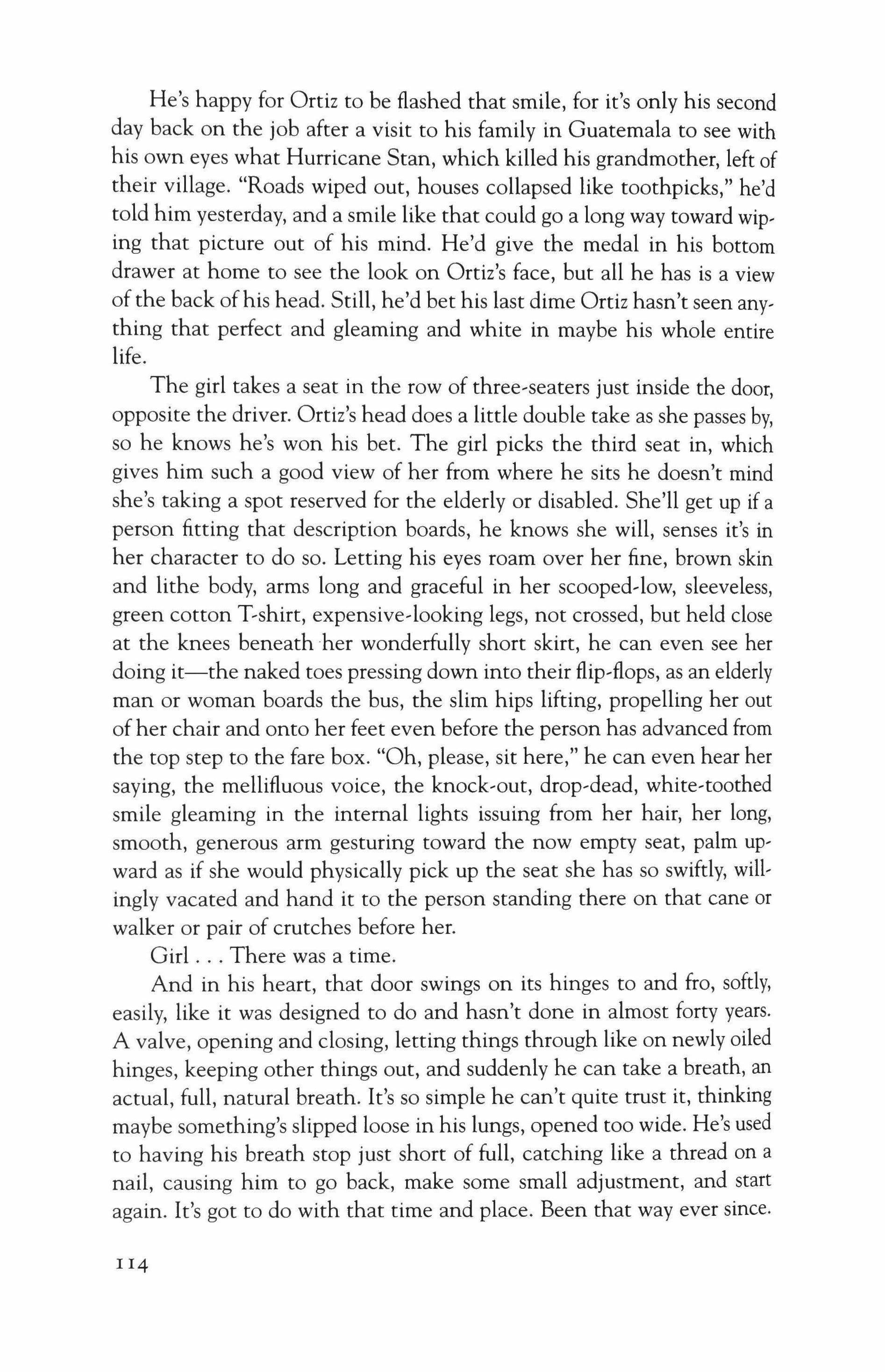
He's happy for Ortiz to be flashed that smile, for it's only his second day back on the job after a visit to his family in Guatemala to see with his own eyes what Hurricane Stan, which killed his grandmother, left of their village. "Roads wiped out, houses collapsed like toothpicks," he'd told him yesterday, and a smile like that could go a long way toward wiping that picture out of his mind. He'd give the medal in his bottom drawer at home to see the look on Ortiz's face, but all he has is a view of the back ofhis head. Still, he'd bet his last dime Ortiz hasn't seen anything that perfect and gleaming and white in maybe his whole entire life.
The girl takes a seat in the row of three-seaters just inside the door, opposite the driver. Ortiz's head does a little double take as she passes by, so he knows he's won his bet. The girl picks the third seat in, which gives him such a good view of her from where he sits he doesn't mind she's taking a spot reserved for the elderly or disabled. She'll get up if a person fitting that description boards, he knows she will, senses it's in her character to do so. Letting his eyes roam over her fine, brown skin and lithe body, arms long and graceful in her scooped-low, sleeveless, green cotton T-shirt, expensive-looking legs, not crossed, but held close at the knees beneath her wonderfully short skirt, he can even see her doing it-the naked toes pressing down into their flip-flops, as an elderly man or woman boards the bus, the slim hips lifting, propelling her out ofher chair and onto her feet even before the person has advanced from the top step to the fare box. "Oh, please, sit here," he can even hear her saying, the mellifluous voice, the knock-out, drop-dead, white-toothed smile gleaming in the internal lights issuing from her hair, her long, smooth, generous arm gesturing toward the now empty seat, palm upward as if she would physically pick up the seat she has so swiftly, willingly vacated and hand it to the person standing there on that cane or walker or pair of crutches before her.
Girl There was a time.
And in his heart, that door swings on its hinges to and fro, softly, easily, like it was designed to do and hasn't done in almost forty years. A valve, opening and closing, letting things through like on newly oiled hinges, keeping other things out, and suddenly he can take a breath, an actual, full, natural breath. It's so simple he can't quite trust it, thinking maybe something's slipped loose in his lungs, opened too wide. He's used to having his breath stop just short of full, catching like a thread on a nail, causing him to go back, make some small adjustment, and start again. It's got to do with that time and place. Been that way ever since.
II4

But he won't think of that now, won't let it play the way it plays at night, like a perpetually repeating movie on the back of his eyelids. She can't be more than nineteen. Their average age back then. An age that seems impossible now, and another war raging. Her jaw is sharp, an educated jaw, he'd say. She's probably in college, second year, not even thinking about what to major in, just having a ball sampling the options at her disposal. Her upper lip is full and soft. No lipstick, but shiny. Lip gloss, must be. He can see her rooting around for it in her bag, uncapping the tube, applying the gloss in quick, little up and down motions, starting at that delicious bow in front, moving out to a comer, back to center again, quick, up and down strokes, over to the other comer, then rounding the bottom lip and traveling the circle of them both, completing the circuit two or three times over so as not to leave a single centimeter untouched, unshined. How he'd like to be that tube of gloss going round and round those knockout lips.
He thinks it would've been nice to serve his country with the support of his country. Those guys over there have that today. Support for them, not the war. 'Course they volunteered, while his batch was drafted, and that makes a difference. Later on, in his time, the demonstrators tried to fix that, saying, hold on, that's not what we meant, sure, we support the troops, just not what they were sent to do, but the atmosphere had already been poisoned. Not that he'd go along with that slogan they were chanting in '68: "If your heart's not in the USA, get your ass out now." He'd never go that far, but what exactly were they thinking back then, that's what he'd like to know. His kid sister, for instance, writing to tell him she'd laid down on the sidewalk that day in front of some bank pretending to be a dead Vietnamese child. Now what the fuck do you make of that, girl? Her writing to tell me that? She saying we killed kids?
Could he even be looking her in the face if that were true? But there he is, looking at her, though she's not looking back, and breathing now like normal, taking in air and letting it out. Full, round, complete revolutions. No constriction like there'd been since that time. No pulling of some thread caught on a nail, dragging the breath back, making him start over. He wasn't much older then than the girl is now, and he'd had trouble breathing all those years since. But today she boards his busOrtiz's Number 5-and he can breathe easy again. He thinks he'd better not count on it, maybe after she gets off it'll revert to the way it was, and he'll feel the panic again, like something tearing inside, with pain
115
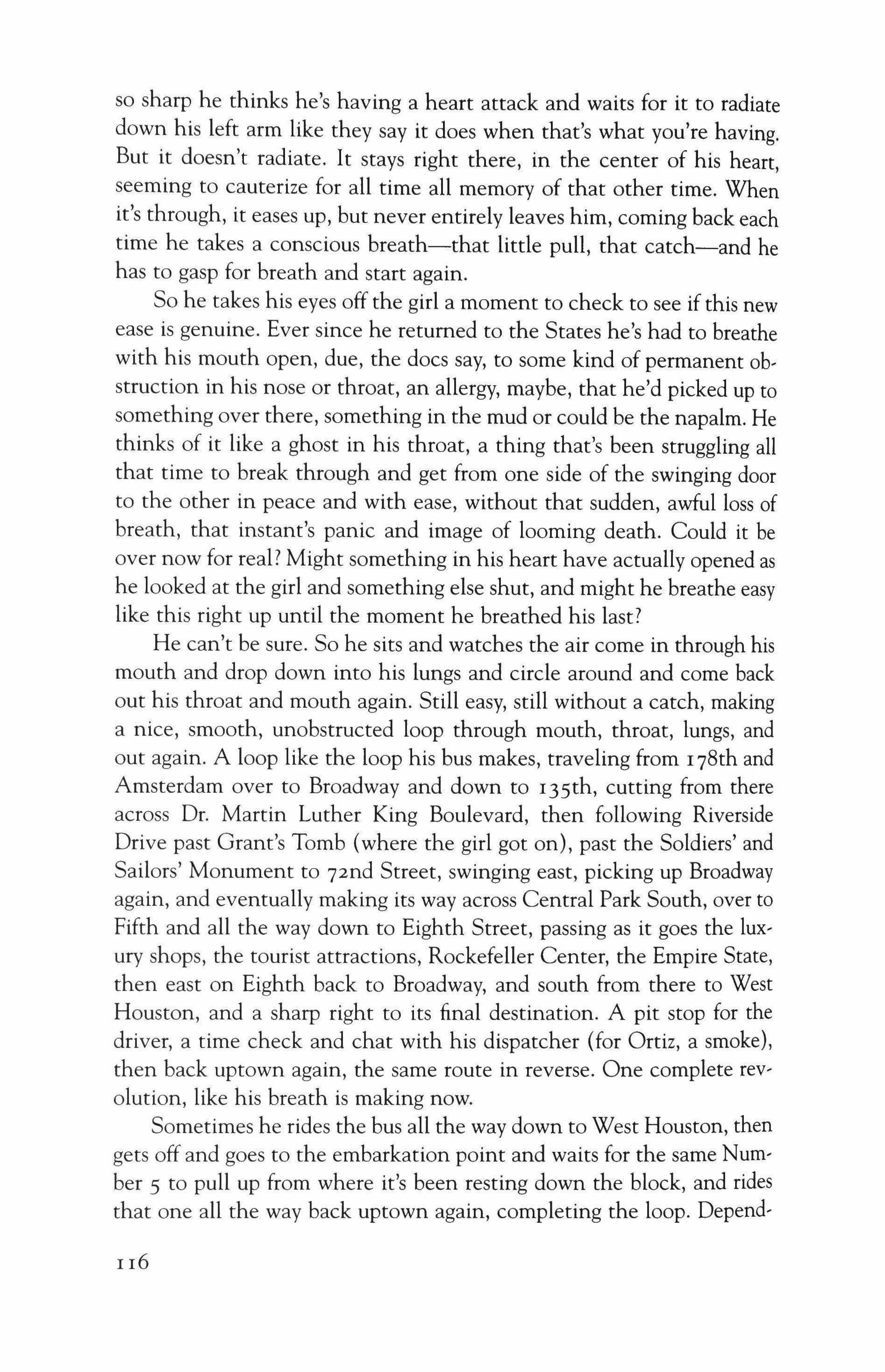
so sharp he thinks he's having a heart attack and waits for it to radiate down his left arm like they say it does when that's what you're having. But it doesn't radiate. It stays right there, in the center of his heart, seeming to cauterize for all time all memory of that other time. When it's through, it eases up, but never entirely leaves him, coming back each time he takes a conscious breath-that little pull, that catch-and he has to gasp for breath and start again.
So he takes his eyes off the girl a moment to check to see if this new ease is genuine. Ever since he returned to the States he's had to breathe with his mouth open, due, the docs say, to some kind of permanent obstruction in his nose or throat, an allergy, maybe, that he'd picked up to something over there, something in the mud or could be the napalm. He thinks of it like a ghost in his throat, a thing that's been struggling all that time to break through and get from one side of the swinging door to the other in peace and with ease, without that sudden, awful loss of breath, that instant's panic and image of looming death. Could it be over now for real? Might something in his heart have actually opened as he looked at the girl and something else shut, and might he breathe easy like this right up until the moment he breathed his last?
He can't be sure. So he sits and watches the air come in through his mouth and drop down into his lungs and circle around and come back out his throat and mouth again. Still easy, still without a catch, making a nice, smooth, unobstructed loop through mouth, throat, lungs, and out again. A loop like the loop his bus makes, traveling from 178th and Amsterdam over to Broadway and down to 135th, cutting from there across Dr. Martin Luther King Boulevard, then following Riverside Drive past Grant's Tomb (where the girl got on), past the Soldiers' and Sailors' Monument to 72nd Street, swinging east, picking up Broadway again, and eventually making its way across Central Park South, over to Fifth and all the way down to Eighth Street, passing as it goes the luxury shops, the tourist attractions, Rockefeller Center, the Empire State, then east on Eighth back to Broadway, and south from there to West Houston, and a sharp right to its final destination. A pit stop for the driver, a time check and chat with his dispatcher (for Ortiz, a smoke), then back uptown again, the same route in reverse. One complete revolution, like his breath is making now.
Sometimes he rides the bus all the way down to West Houston, then gets off and goes to the embarkation point and waits for the same Number 5 to pull up from where it's been resting down the block, and rides that one all the way back uptown again, completing the loop. Depend-
II6
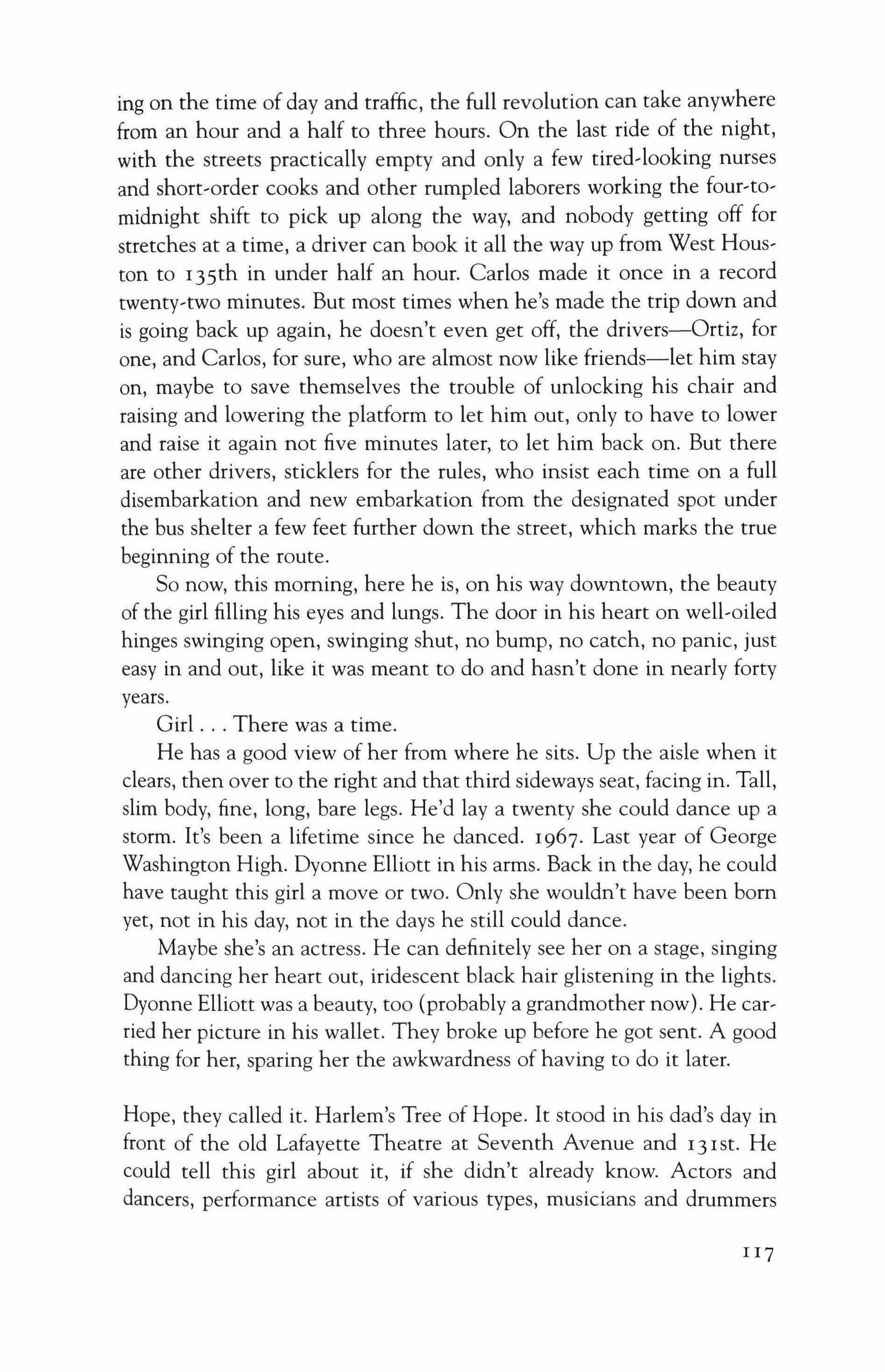
ing on the time of day and traffic, the full revolution can take anywhere from an hour and a half to three hours. On the last ride of the night, with the streets practically empty and only a few tired-looking nurses and short-order cooks and other rumpled laborers working the four-tomidnight shift to pick up along the way, and nobody getting off for stretches at a time, a driver can book it all the way up from West Houston to I35th in under half an hour. Carlos made it once in a record twenty-two minutes. But most times when he's made the trip down and is going back up again, he doesn't even get off, the drivers-Ortiz, for one, and Carlos, for sure, who are almost now like friends-let him stay on, maybe to save themselves the trouble of unlocking his chair and raising and lowering the platform to let him out, only to have to lower and raise it again not five minutes later, to let him back on. But there are other drivers, sticklers for the rules, who insist each time on a full disembarkation and new embarkation from the designated spot under the bus shelter a few feet further down the street, which marks the true beginning of the route.
So now, this morning, here he is, on his way downtown, the beauty of the girl filling his eyes and lungs. The door in his heart on well-oiled hinges swinging open, swinging shut, no bump, no catch, no panic, just easy in and out, like it was meant to do and hasn't done in nearly forty years.
Girl There was a time.
He has a good view of her from where he sits. Up the aisle when it clears, then over to the right and that third sideways seat, facing in. Tall, slim body, fine, long, bare legs. He'd lay a twenty she could dance up a storm. It's been a lifetime since he danced. 1967. Last year of George Washington High. Dyonne Elliott in his arms. Back in the day, he could have taught this girl a move or two. Only she wouldn't have been born yet, not in his day, not in the days he still could dance.
Maybe she's an actress. He can definitely see her on a stage, singing and dancing her heart out, iridescent black hair glistening in the lights. Dyonne Elliott was a beauty, too {probably a grandmother now}. He carried her picture in his wallet. They broke up before he got sent. A good thing for her, sparing her the awkwardness of having to do it later.
Hope, they called it. Harlem's Tree of Hope. It stood in his dad's day in front of the old Lafayette Theatre at Seventh Avenue and I3Ist. He could tell this girl about it, if she didn't already know. Actors and dancers, performance artists of various types, musicians and drummers II?

like his dad standing beneath that elm, wishing on it to find them work. And sometimes the tree obliged. It was good to his dad, locating an ongoing gig for him with King Curtis' band right there on that stretch of Seventh known as the Boulevard of Dreams. But in the summer of '34, the Park Department cut it down, needing the space to widen the avenue. So the Tree of Hope was felled, its mammoth stump left on the street, eventually to be slathered with preservatives and become something little kids with big dreams, like his dad was once, rubbed for luck. Some time later, a piece of that tree was installed in the lobby of the Apollo Theatre. She must know about that. Maybe had even seen it, tried out for Amateur Night, and rubbed her hand across it, like everybody did before going onstage.
He remembered rice paddies and green fog and steady, soft rain. He remembered villages with sweet names and wells dug deep into their centers like hearts. He remembered dogs and chickens and wide, muddy rivers. He remembered crossing rivers at dawn and marching into mountains and wondering if he'd ever come out. He remembered his dad telling him in 1949 he could get a haircut and shave up in his neighborhood for thirty cents, and that was the year he was born, so on that day in April his dad went out and got himself a thirty-cent celebratory trim. He remembered digging foxholes and shooting dogs and chickens. He remembered the names of the men, although he would not say the names of the dead, even to himself, here on this bus in this public place. Only later, at night, most nights, alone in bed, would he recite them, one by one and in the order in which they had died right up to Pete, the last of the deaths of which he had any personal knowledge and every time he would feel the weight in his stomach like a stone he carried for the terrible, secret shame of having survived. He remembered the fear that squeezed his gut and only loosened up a little when they were in some space they'd just cleared of the enemy and were sitting around smoking dope and telling jokes, but that never entirely let go. He remembered that fear and what it cost each of them not to show it. A lot of it he chose not to remember. But he remembered them saying it wasn't his fault about Pete, saying over and over there was nothing he could have done. Just the breaks, man. No one to blame.
Girl There was a time.
It's a good hour still before the morning rush begins in earnest, and the aisle clears quickly. People climb aboard, pay their fare, move on. Seats for everyone. He watches how the people on the aisle on the right
II8

(right from his perspective, left as you're coming in) watch that row of singles on the left. Glancing over quickly, covetously, then glancing away, as if they're afraid to be caught looking, like it might hand the idea to somebody else, and returning their eyes to whatever they'd been looking at before-the books in their laps, their watches, the view out the window, the passing city-then glancing back a moment later to reassess the situation, see if a chance might be opening up for them to make their move. Funny how when they'd first put in that row of singles nobody wanted to go near them. Too new. Too strange. Too lonely. Normal thing on a bus was two seats to a row. You had a partner, a seatmate, somebody when you were on the inside with your stop coming up you had to crawl over with your backpacks and shopping bags and briefcases and cell phones and wet umbrellas and whatever other junk you had with you that day. Somebody to shake your head about and maybe get up in the person's face over when that person was in the aisle seat and wouldn't slide in to the empty inside one, making you crawl over her or him with your bags and briefcases and wet shit dripping. Or maybe you'd think twice about getting up in the person's face-he'd seen that, too, watching from his vantage point in the back, that second thought, that reconsideration flickering across the face of the person having to do the climbing and crawling over the other one-'cause maybe the reason she if it was a she wouldn't slide in and just sat there, ignoring you, dead eyes dead ahead, and not even turned as far out as she might into the aisle to let you by, was that her stop was coming up, and if she did slide over, she'd just have to climb over you at the next stop with all her shopping bags and wet umbrellas and whatever else she had with her banging into your knees. Or maybe, if it was a guy, he was just plain crazy and would pull a knife and stick you with it if you asked him to move, for this was still New York, you know, lower crime stats or not.
But that's the way buses used to be on both sides of the aisle: two seats to a row. Then they put in this string of singles on the one side, and for a while, people steered clear. He watched them back then, eyeing those singles as they got on, keeping their distance, like maybe they were some kind of vicious new breed of animal that would jump out and bite them if they got too close. And then they caught on. Hottest seat in town. Exclusivity was in. Even guys getting on with their wives wanted one. He'd seen that, too, the husband glancing over longingly at an empty single, the wife walking ahead, chatting away down the aisle, carrying on this conversation meant for him that he doesn't give two hoots about that passengers to her right and left can pick up pieces of as
II9

she passes by. "I don't know why you wore that shirt, Simon. What kind of a color is beige? Washes you out. And it doesn't fit either. Never did. I told you that first time you wore it. Let me give it to Good Will. How often have I said that? But do you listen?" And the guy thinking-he can tell from the look of total boredom in his eyes-let her go ahead, find a seat in the back, I'll just take this empty single here. Then the boredom turns to regret as the husband passes by and knows he's lost his chance, knows, ifhe's honest, he never had a chance, for what would his fellow passengers think-even the ones, and there are a couple, who, having heard snatches of his wife's chatter, throw him looks of sympathy as he passes-if he should actually make that audacious move and plunk himself down into that empty single?
He watches them watching. He's good at watching. A skill acquired during his time on guard at night. Back then he mostly saw a fog so thick and green it moved through the blackness like something alive. He watched that fog like he was ordered to do, watched and waited for it to come alive.
Now he watches how those on the right watch those single seats on the left and wait for them to open up. Sometimes a guy is so anxious he makes a premature leap, moving out into the aisle before the present occupant has fully risen from the seat. Then he has to execute a quick retreat, hoping no one has noticed, but knowing that's hardly likely, with him now exposed in the aisle and bent over in that awkward, halfcrouched position, his newspaper clutched up against his genitals like with a sudden need for privacy. Others-women were especially good at this-would spot the signs of imminent evacuation-a passenger glancing up from her paperback, turning toward the window to catch the number on the street sign going by, closing the book, raising a hand to press the bell-and would time it so exactly she'd have left her seat and arrived at the coveted single at the precise moment its current occupant was rising from it. Then the exchange went smoothly as a dance. One body rising, the other descending. But sometimes two guys with their eye on the same prize would make a move for it at once. The faster or more aggressive one moving panther-like through open territory down the aisle and positioning himself in such a way as to lay definitive claim to his objective, forcing his opponent to back off before even getting close. The law of the jungle in play.
Moving through that other jungle long ago, Pete ahead, him behind, he watches how Pete proceeds with caution, taking almost dainty steps
120

through the foul, green mist. And he thinks how funny that is, for a guy so big to be taking such mincing steps. Funny or not, he follows in line, stepping where Pete stepped. Then Pete shoots up an arm and freezes. He half turns toward him. His face in moonlight looks sick, whites of eyeballs greenish, mouth slack, expression sheepish, like he's caught in the act of something and wants to apologize. Pete can't correct. Whichever way he steps, he's wrong. From where he stands behind, he stares at Pete and silently acknowledges the situation. Not more than three feet separate them. He knows he should go for it, grab him, pull him back, try at least. But he can't move. He stays where he is, feeling nothing in his legs, no connection or possibility of movement, and he thinks now it was like his body had a premonition, his legs saying what you feel now, this disconnection, this impossibility of movement, is what you're going to feel forever. And then the explosion. The blast of light. The sound. It's over in a second. Pete is dead. His legs are gone. The war's over for them both. And later, his friends' faces, close to his, insanely large and blurry. Mayo and Toby and Delroy, their earnest voices in his ear-"Couldn't have done nothing, man." "Wasn't your fault." "Hang in, you'll be okay"-as they're loading him and Pete on the same chopper out of there.
Watching now from where he watches in the back of the bus opposite the exit door, he sees the dance ofthe single seat actually performed. He glances at the girl, sees she sees it, too. A woman in a black and red striped turban, seated in one of the single seats, pulls her compact from her bag, opens it, and glances at her face. (The operation itself he cannot actually see, the woman having her back to him, but he takes note of the small turnings of her head and the slight circular motions of her arm and shoulder, like she's going for her best side.) She powders her nose, drops the compact back in her bag. That's all it takes. Heads tum, eyes zero in. Then the turbaned woman lifts an arm, applies her fingers to the yellow strip of tape above her head, and even before the bell has sounded and the red notice lighted up, alerting Ortiz to the fact that a passenger wants off, a man across from and one row behind the disernbarking woman juts his knees out into the aisle and angles his torso forward. At the same moment, a woman in jeans, who's been standing in front of the fine young woman with the dusky skin and lovely long legs, turns, sees the hand lifted to the yellow tape, and makes her move, stealthy and quick, across the aisle and down. The woman in the turban rises from her seat, the man swoops in from behind, but the woman in jeans, loping in from the front, has the clear advantage. She grabs the
121

bar above her head, giving the rising woman just enough room to duck beneath her arm and tum toward the exit, coming, as she does so, face to face with the man, now preparing to swing himself forward and into her seat. No contest. The exiting woman turns into the man, allowing the woman in jeans to slide into her seat from behind her, and forcing the man, now blocking her path, to step aside, thereby forfeiting his chance at the seat in contention.
He watches from where he sits in the back as the man, disgruntled to be so publicly out-played, dumps himself back into his former seat, which he's lucky to find still vacant. The fine young woman watches from where she sits in the front. She smiles, but not at him. It's a private, sweet smile, acknowledging an amusing human interaction. The comers of her shiny lips tum up, move into the slopes of her cheeks. Had that smile been directed at him, no telling what he might have done.
Girl There was a time.
For sure he would have taken her dancing. And to concerts. He liked the Mills Brothers and the Ink Spots. He worshipped [imi Hendrix. She'd probably be more into Mariah Carey and The Who, though he'd lay odds she would've worshipped Hendrix, too.
Then the bus made its left at 72nd, turning away from the river and the Henry Hudson Parkway, and he caught a glimpse of Eleanor Roosevelt, bronzed by the slivers of light breaking through the leaves of her three protective oaks, and leaning in thought against her great granite rock. Wife of another president who took the nation into war. A war with cause, a president with brains. A man who also lacked the use of his legs.
Across to Broadway, a right there, and down the block to its stop in front of the glassed-in Indian restaurant on the comer. The doors open and now the girl is standing up, just as he'd known she would, as a white-haired woman, back so hunched she can only follow the floor of the bus as she moves, climbs aboard. Quickly, gracefully, the girl extends one long arm to grasp the woman, who can't even raise her head high enough to look her in the face, by an elbow and help her into her seat.
Now the girl is coming his way. Approaching like something out of his imagination. With each step she takes down the aisle, she grows larger, more distinct, more desirable. Her eyes, he sees now, are not almond-shaped as they had appeared in the distance, but larger and nearly round, their dark, shining centers bright against their clear, white backgrounds, the thick brows neatly plucked into carefully rising and falling
122
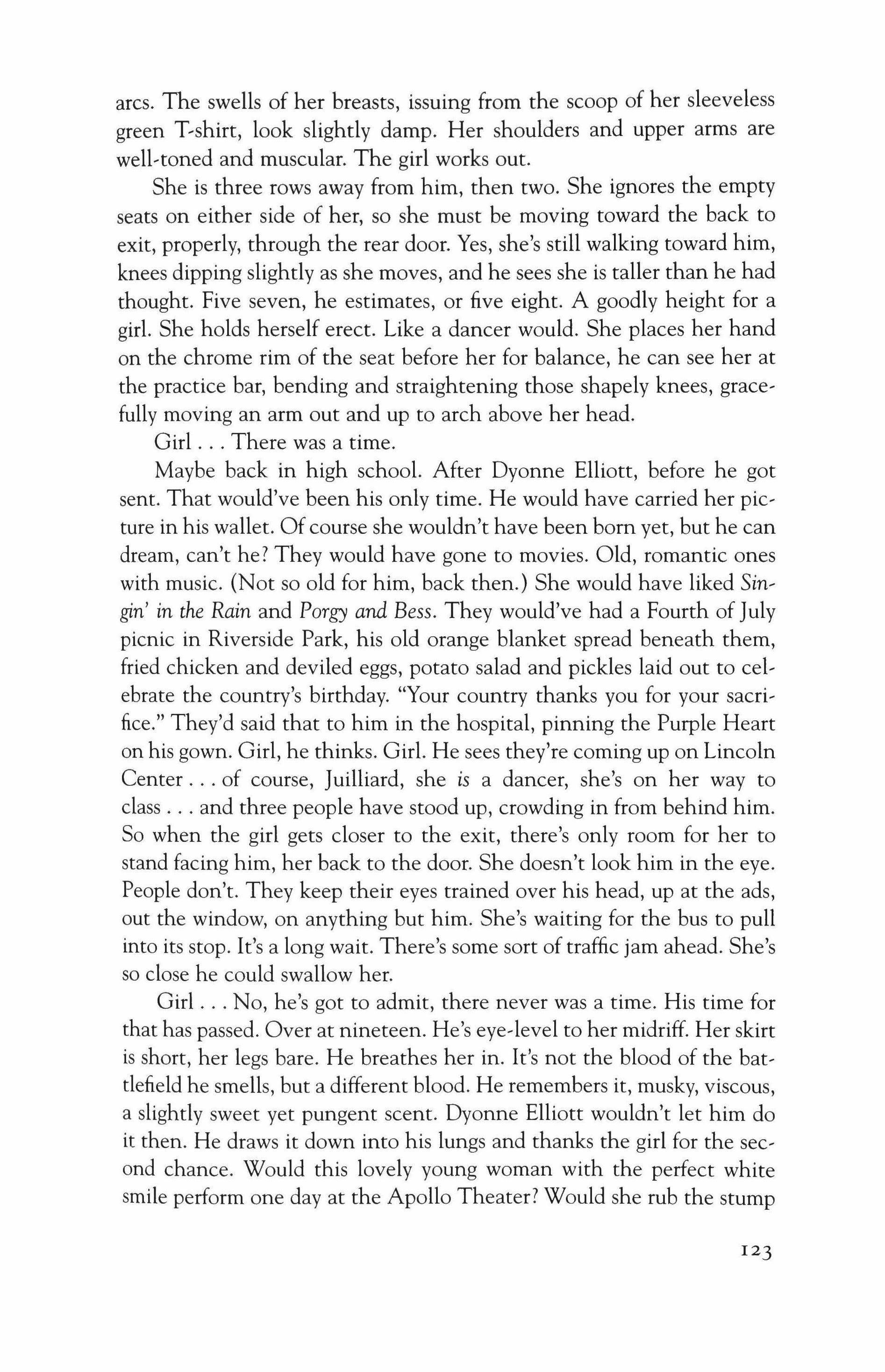
arcs. The swells of her breasts, issuing from the scoop of her sleeveless green T,shirt, look slightly damp. Her shoulders and upper arms are well,toned and muscular. The girl works out.
She is three rows away from him, then two. She ignores the empty seats on either side of her, so she must be moving toward the back to exit, properly, through the rear door. Yes, she's still walking toward him, knees dipping slightly as she moves, and he sees she is taller than he had thought. Five seven, he estimates, or five eight. A goodly height for a girl. She holds herself erect. Like a dancer would. She places her hand on the chrome rim of the seat before her for balance, he can see her at the practice bar, bending and straightening those shapely knees, grace, fully moving an arm out and up to arch above her head.
Girl There was a time.
Maybe back in high school. After Dyonne Elliott, before he got sent. That would've been his only time. He would have carried her pic, ture in his wallet. Of course she wouldn't have been born yet, but he can dream, can't he? They would have gone to movies. Old, romantic ones with music. (Not so old for him, back then.) She would have liked Sin, gin' in the Rain and Porgy and Bess. They would've had a Fourth of july picnic in Riverside Park, his old orange blanket spread beneath them, fried chicken and deviled eggs, potato salad and pickles laid out to eelebrate the country's birthday. "Your country thanks you for your sacrifice." They'd said that to him in the hospital, pinning the Purple Heart on his gown. Girl, he thinks. Girl. He sees they're coming up on Lincoln Center of course, [uilliard, she is a dancer, she's on her way to class and three people have stood up, crowding in from behind him. So when the girl gets closer to the exit, there's only room for her to stand facing him, her back to the door. She doesn't look him in the eye. People don't. They keep their eyes trained over his head, up at the ads, out the window, on anything but him. She's waiting for the bus to pull into its stop. It's a long wait. There's some sort of traffic jam ahead. She's so close he could swallow her.
Girl No, he's got to admit, there never was a time. His time for that has passed. Over at nineteen. He's eye-level to her midriff. Her skirt is short, her legs bare. He breathes her in. It's not the blood of the bat, tlefield he smells, but a different blood. He remembers it, musky, viscous, a slightly sweet yet pungent scent. Dyonne Elliott wouldn't let him do it then. He draws it down into his lungs and thanks the girl for the sec, ond chance. Would this lovely young woman with the perfect white smile perform one day at the Apollo Theater? Would she rub the stump
123

of the Tree of Hope before going on stage? Would she reach out now and rub his stumps and thank him, as she passes by, for his sacrifice?
The traffic jam clears. Ortiz maneuvers his vehicle into its stop. The rear door swings open, becoming two doors, or one split down the middle, both halves swinging freely, easily, like the valve on its hinges in his heart. A shaft of light floods the back of the bus. The passengers in front of her disembark, leaving room for the girl to tum from him toward the door, and as she swings around, a gust of air stirs up and sends all the perfumes of her body into his face. The physical aroma of her being wraps around him like layers of mist. Layer after layer of pungent, musky scents, each giving way to the next as she takes a step and then another, moving past him and closer to the door. And in the light that pours now through the parting in that wide-open door dance particles of life, molecules of living organisms, sloughing off from her body and settling onto his.
He surveys her long, straight back as she descends into the stairwell. Stepping down onto the curb, the girl turns and holds the door, as he knew she would, for the person behind. He sees her face one last time, then her back again, and she merges with the city.
He sits and waits for the bus to start up again. He thinks today he'll ride it all the way down to West Houston, then get off there and wait awhile before taking another Number 5 back uptown. He knows Ortiz wouldn't make him get off. Ortiz would let him stay where he was, would even come back and chat with him a while telling him stories about his village and making the sign of the cross as he does in remembrance of his grandmother before getting off himself for a smoke and a chat with his dispatcher, then getting back on, switching the routing sign overhead, revving up his engine, and moving his bus down to its official embarkation point a few feet further down the block. No, today he decides it would be good to actually get off and take in the air, still breathing easy as he was, and wheel himself down to the bus stop under the shelter those few feet further on, and wait there-surprising Ortiz by signaling him to pass him by-no matter how long it took (and with this particular bus it's bound to take a while) for another Number 5 to come along, then board that one and ride it all the way back uptown, completing the loop in reverse.
124
Patrick Michael Finn
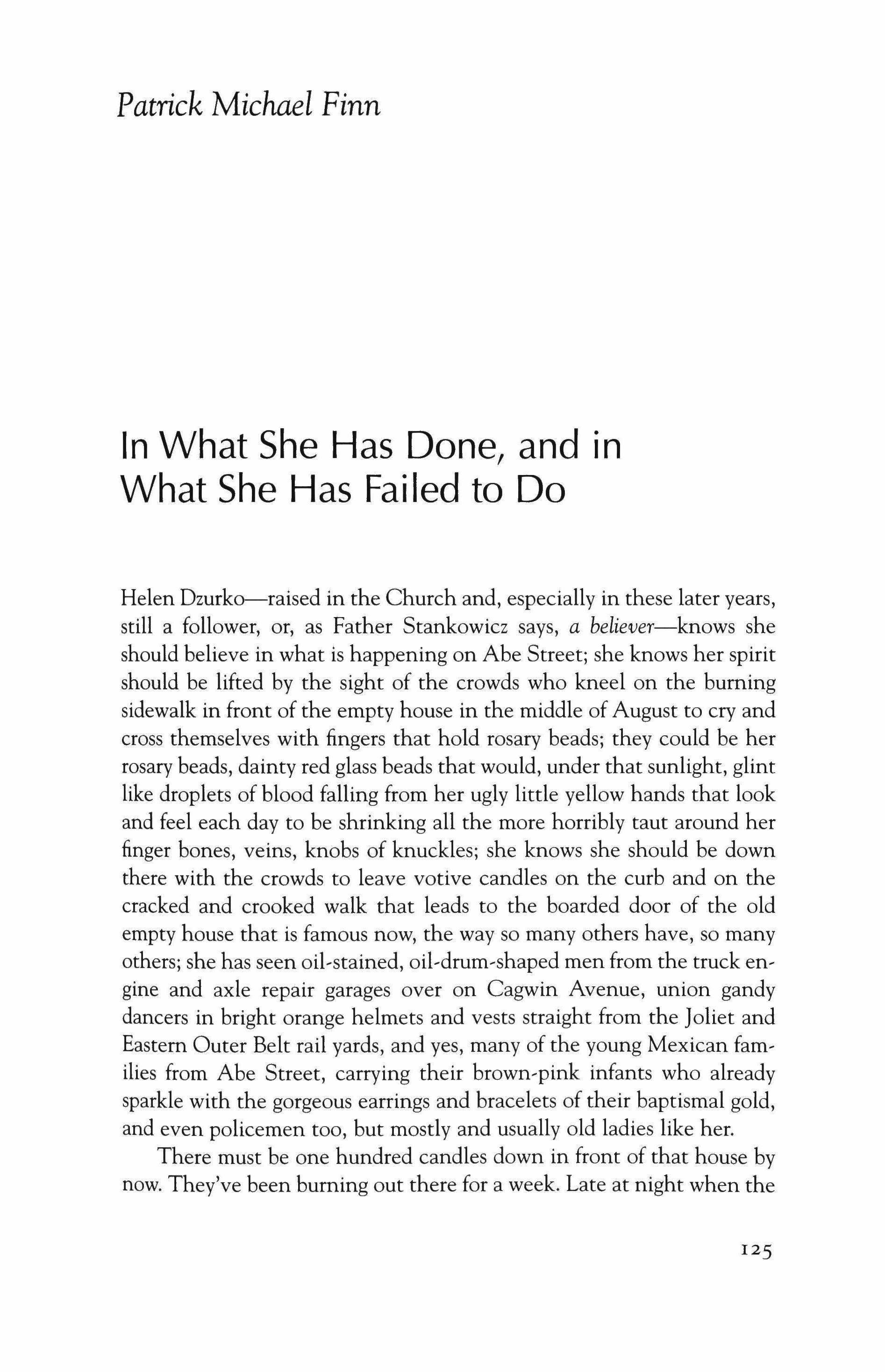
In What She Has Done, and In What She Has Failed to Do
Helen Dzurko-raised in the Church and, especially in these later years, still a follower, or, as Father Stankowicz says, a believer-knows she should believe in what is happening on Abe Street; she knows her spirit should be lifted by the sight of the crowds who kneel on the burning sidewalk in front of the empty house in the middle of August to cry and cross themselves with fingers that hold rosary beads; they could be her rosary beads, dainty red glass beads that would, under that sunlight, glint like droplets of blood falling from her ugly little yellow hands that look and feel each day to be shrinking all the more horribly taut around her finger bones, veins, knobs of knuckles; she knows she should be down there with the crowds to leave votive candles on the curb and on the cracked and crooked walk that leads to the boarded door of the old empty house that is famous now, the way so many others have, so many others; she has seen oil-stained, oil-drum-shaped men from the truck engine and axle repair garages over on Cagwin Avenue, union gandy dancers in bright orange helmets and vests straight from the Joliet and Eastern Outer Belt rail yards, and yes, many of the young Mexican families from Abe Street, carrying their brown-pink infants who already sparkle with the gorgeous earrings and bracelets of their baptismal gold, and even policemen too, but mostly and usually old ladies like her.
There must be one hundred candles down in front of that house by now. They've been burning out there for a week. Late at night when the
I25
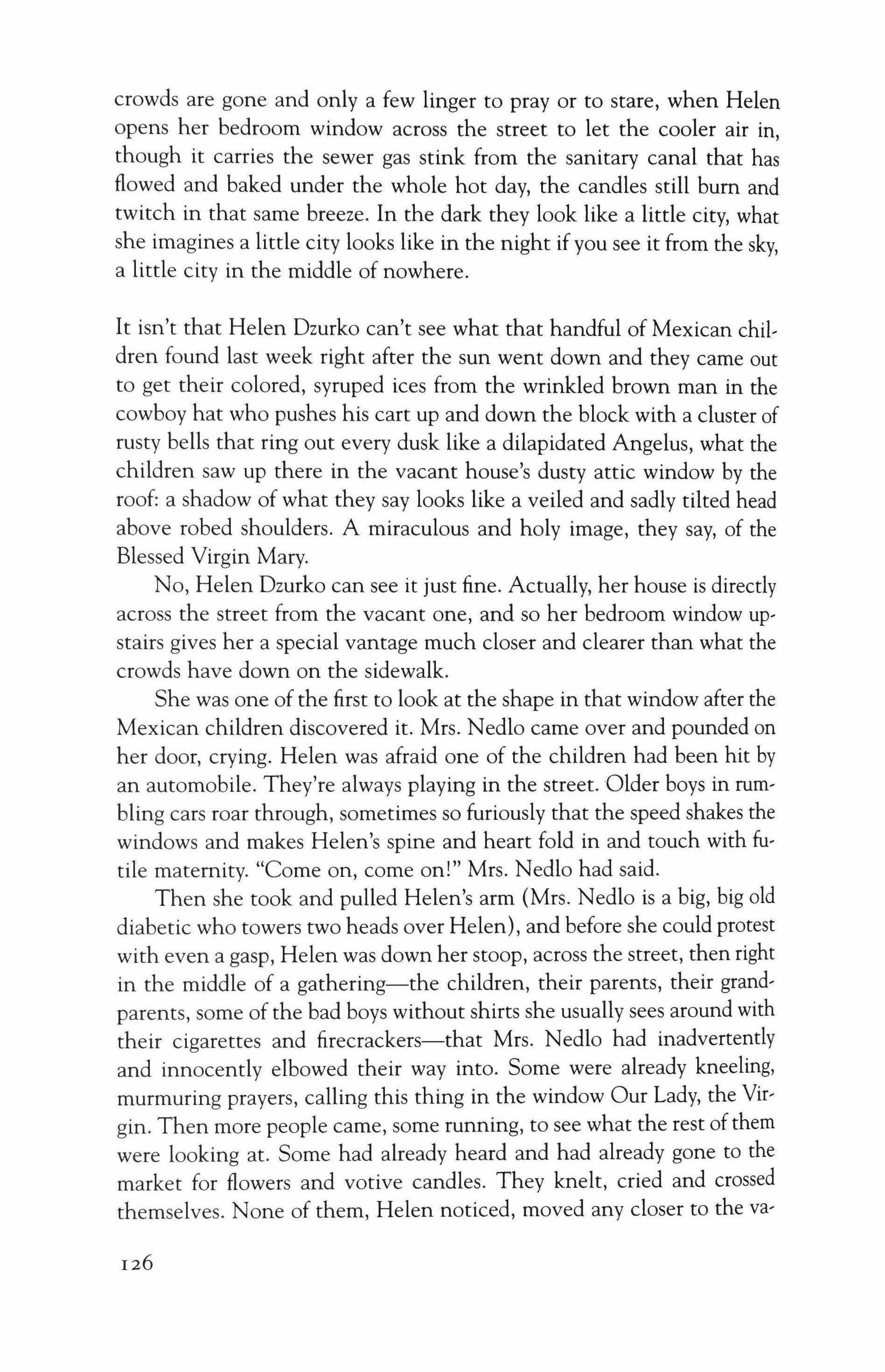
crowds are gone and only a few linger to pray or to stare, when Helen opens her bedroom window across the street to let the cooler air in, though it carries the sewer gas stink from the sanitary canal that has flowed and baked under the whole hot day, the candles still bum and twitch in that same breeze. In the dark they look like a little city, what she imagines a little city looks like in the night if you see it from the sky, a little city in the middle of nowhere.
It isn't that Helen Dzurko can't see what that handful of Mexican children found last week right after the sun went down and they came out to get their colored, syruped ices from the wrinkled brown man in the cowboy hat who pushes his cart up and down the block with a cluster of rusty bells that ring out every dusk like a dilapidated Angelus, what the children saw up there in the vacant house's dusty attic window by the roof: a shadow of what they say looks like a veiled and sadly tilted head above robed shoulders. A miraculous and holy image, they say, of the Blessed Virgin Mary.
No, Helen Dzurko can see it just fine. Actually, her house is directly across the street from the vacant one, and so her bedroom window upstairs gives her a special vantage much closer and clearer than what the crowds have down on the sidewalk.
She was one of the first to look at the shape in that window after the Mexican children discovered it. Mrs. Nedlo came over and pounded on her door, crying. Helen was afraid one of the children had been hit by an automobile. They're always playing in the street. Older boys in rumbling cars roar through, sometimes so furiously that the speed shakes the windows and makes Helen's spine and heart fold in and touch with futile maternity. "Come on, come on!" Mrs. Nedlo had said.
Then she took and pulled Helen's arm (Mrs. Nedlo is a big, big old diabetic who towers two heads over Helen), and before she could protest with even a gasp, Helen was down her stoop, across the street, then right in the middle of a gathering-the children, their parents, their grandparents, some of the bad boys without shirts she usually sees around with their cigarettes and firecrackers-that Mrs. Nedlo had inadvertently and innocently elbowed their way into. Some were already kneeling, murmuring prayers, calling this thing in the window Our Lady, the Virgin. Then more people came, some running, to see what the rest ofthem were looking at. Some had already heard and had already gone to the market for flowers and votive candles. They knelt, cried and crossed themselves. None of them, Helen noticed, moved any closer to the va-
126
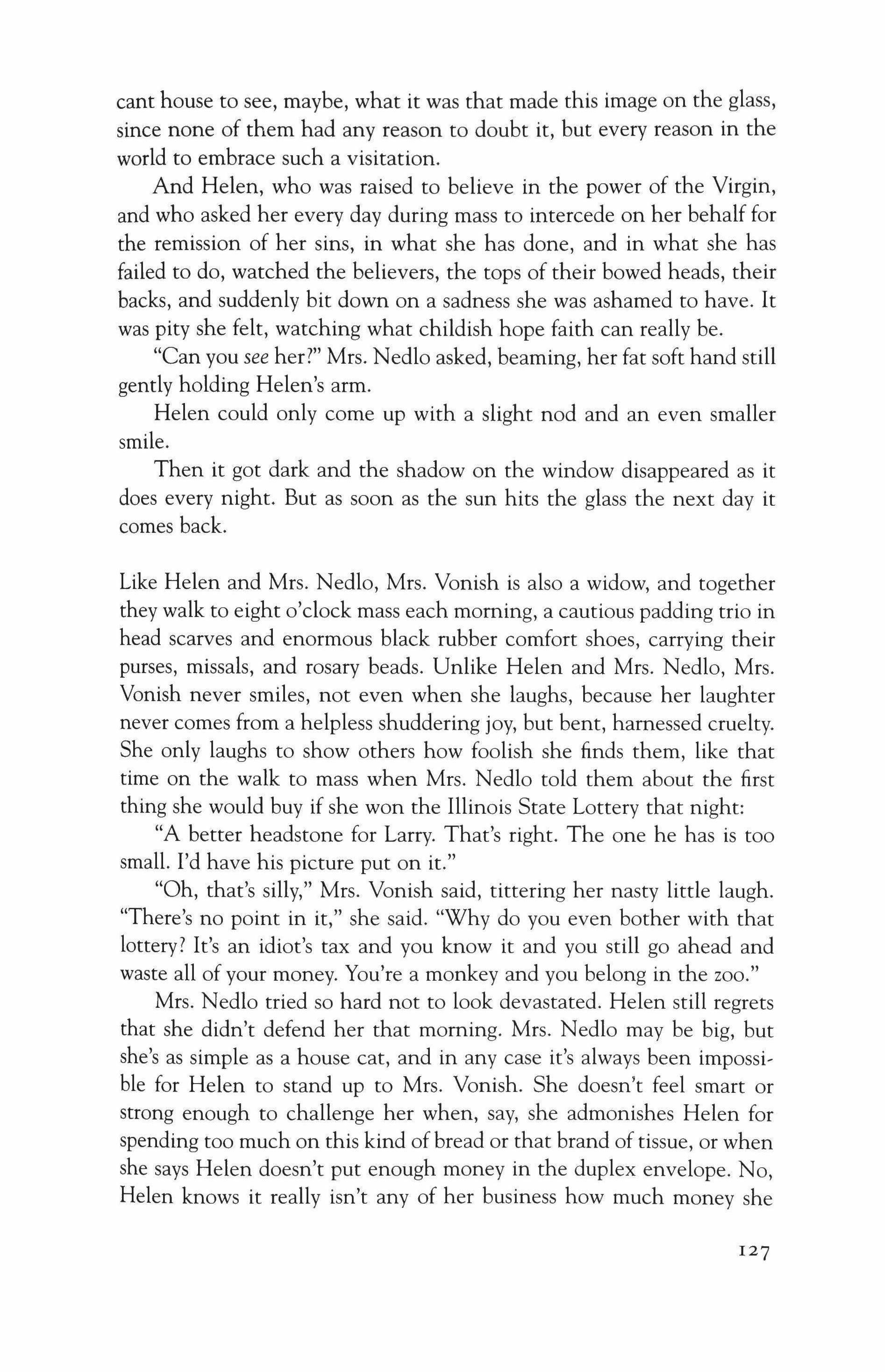
cant house to see, maybe, what it was that made this image on the glass, since none of them had any reason to doubt it, but every reason in the world to embrace such a visitation.
And Helen, who was raised to believe in the power of the Virgin, and who asked her every day during mass to intercede on her behalf for the remission of her sins, in what she has done, and in what she has failed to do, watched the believers, the tops of their bowed heads, their backs, and suddenly bit down on a sadness she was ashamed to have. It was pity she felt, watching what childish hope faith can really be.
"Can you see her?" Mrs. Nedlo asked, beaming, her fat soft hand still gently holding Helen's arm.
Helen could only come up with a slight nod and an even smaller smile.
Then it got dark and the shadow on the window disappeared as it does every night. But as soon as the sun hits the glass the next day it comes back.
Like Helen and Mrs. Nedlo, Mrs. Vonish is also a widow, and together they walk to eight o'clock mass each morning, a cautious padding trio in head scarves and enormous black rubber comfort shoes, carrying their purses, missals, and rosary beads. Unlike Helen and Mrs. Nedlo, Mrs. Vonish never smiles, not even when she laughs, because her laughter never comes from a helpless shuddering joy, but bent, harnessed cruelty. She only laughs to show others how foolish she finds them, like that time on the walk to mass when Mrs. Nedlo told them about the first thing she would buy if she won the Illinois State Lottery that night:
"A better headstone for Larry. That's right. The one he has is too small. I'd have his picture put on it."
"Oh, that's silly," Mrs. Vonish said, tittering her nasty little laugh. "There's no point in it," she said. "Why do you even bother with that lottery? It's an idiot's tax and you know it and you still go ahead and waste all of your money. You're a monkey and you belong in the zoo."
Mrs. Nedlo tried so hard not to look devastated. Helen still regrets that she didn't defend her that morning. Mrs. Nedlo may be big, but she's as simple as a house cat, and in any case it's always been impossible for Helen to stand up to Mrs. Vonish. She doesn't feel smart or strong enough to challenge her when, say, she admonishes Helen for spending too much on this kind of bread or that brand of tissue, or when she says Helen doesn't put enough money in the duplex envelope. No, Helen knows it really isn't any of her business how much money she
127

gives to the Church, but part of her just freezes whenever Mrs. Vonish scolds her. Most of all, Helen is afraid that if she does stand up to her, Mrs. Vonish will stop speaking to her entirely, and then she'll easily manipulate Mrs. Nedlo into siding with her in an official abandonment. This is terrifying to Helen.
On Sundays Mrs. Vonish insists on walking to church an hour before mass begins so they can get the pew closest to the altar, and so she doesn't have to sit next to Mexicans. Then she guards the end of the pew with her attentive, plaster church posture, studying her missal, licking her thumb, turning the thin pages, marking the next week's masses with the colored ribbons that are stitched into the binding.
The morning after the shape appeared in the window was Sunday, and Helen had been watching the crowds growing in tens across the street when Mrs. Vonish and Mrs. Nedlo came to get her for church. As they carefully stepped down Helen's porch and made their way to the sidewalk, Helen said, "It's really something, isn't it."
"Oh, it's something all right," Mrs. Vonish said. "It's something the Blessed Mother took so long to get here."
They stood watching the assembly across the street. Most were dressed up for mass in black and white, and they had brought bundles of bright flowers to leave on the brown, overgrown lawn. Mrs. Vanish pushed her sun-tinted eyeglasses up her nose, then crossed her arms in a highly mannered gesture of scrutiny. "You know why she came here of all places, don't you?"
"No," Mrs. Nedlo said, her head cocked and her eyes widened in curious surprise. "Why? Why did she come here?"
Mrs. Vonish lowered her voice. "To tell these people to stop living like animals. To stop having children they can't afford to raise." Mrs. Nedlo nodded fiercely with astonished agreement. Then Mrs. Vanish said, "And to learn how to speak English, for heaven's sakes!"
Helen wanted to slap her-to slap her right across her mouth, an urge she had never felt in her entire life. Mrs. Vonish's parents had never learned to speak English. Nor had Mrs. Nedlo's. Nor had her own. No, none of them had been Mexicans-greasers as Mrs. Vonish often called them. They'd been Bohunks, Crohunks, Polacks, and Ukies. Mrs. Vanish breathed deeply, satisfied and pleased with herself for judging the poor crowd who prayed only for love and protection, and her pleasure in this verdict made Helen furiously brave enough to finally challenge her. But she could only say, "You live here too."
"Well what on earth do you mean by that?" Mrs. Vanish asked with
128

a crack in her voice that scared Helen. She couldn't see the woman's eyes through her tinted glasses, but she knew they were narrowed and aimed at her. "I was born here," she said. "But they came here. They came here to ruin the street where I raised my five boys."
Helen couldn't think of anything else to say. Her mind emptied. She was trembling.
Mrs. Nedlo had also been frightened by the exchange, and was suddenly occupying herself by watching the vacant house, squinting, a swollen hand shading her eyes. "Oh, now I can't see her," she quietly whined.
Mrs. Vonish shook her head and grabbed Mrs. Nedlo's shoulders, shifting her vast frame a foot to the right, locking her in place, then pointing, pointing vigorously across the street until Mrs. Nedlo's face opened up with a great beam of childish smile. "She's so beautiful," she said.
"Oh, come on," Mrs. Vonish told her, turning and walking in the direction of the parish. "We're going to be late."
Helen caught up with them quickly. She didn't want to be yelled at again.
A reporter from the Chicago paper knocked on Helen Dzurko's door Monday morning to ask her what she thought about the shape in the window across the street. She could tell that her answer surprised him. He looked up from the pad he was scribbling in and regarded Helen for a moment before he looked back down and said, "Then you don't really believe the Virgin Mary is visiting Joliet?"
"I didn't say that," Helen told him. "I said I just don't know what it is."
The reporter then asked Helen if she was religious, and she said she didn't think that was any of his business. He thanked her for her time, and Helen closed the door. Inside, she watched the vacant house from her front room, trying to think of a better answer to the question the young man had asked, though only to answer herself, and not any newspaper story that would show the world how adorably faithful all the widows and Mexicans are down in Joliet. The shape in the window hadn't changed. It hadn't grown bigger or darker or anything, and standing in her front room, Helen decided the image was just that-an image, a shadow on the glass, some strange mistake of dust and light, nothing she could nor really needed to figure out. What more, she decided, did she need to tell herself? What more can you say to someone, show someone, who has buried her husband and her only two sons?
But Helen has other answers, and this is what she does know:
129
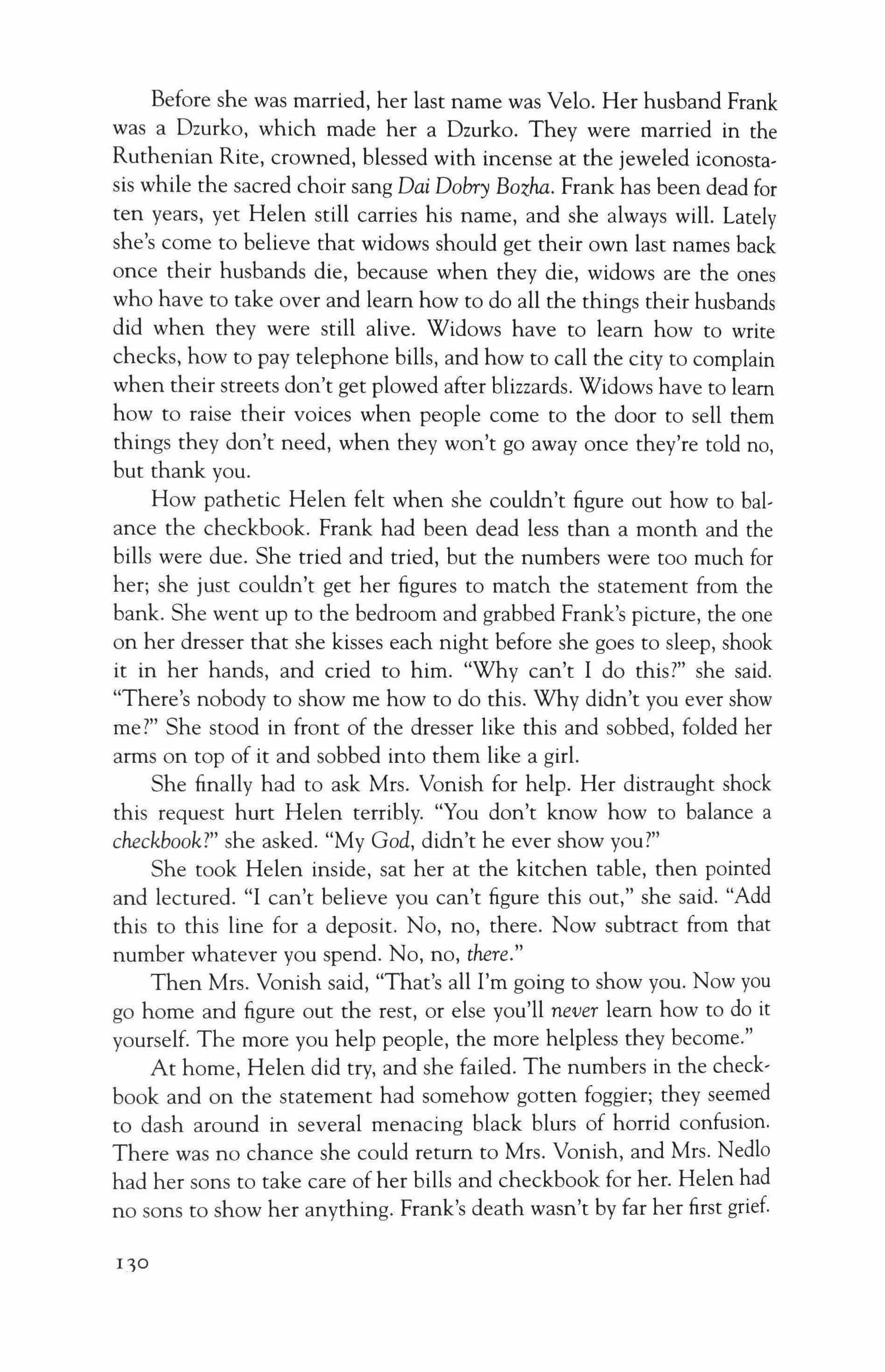
Before she was married, her last name was Velo. Her husband Frank was a Dzurko, which made her a Dzurko. They were married in the Ruthenian Rite, crowned, blessed with incense at the jeweled iconostasis while the sacred choir sang Dai Dobry Bozha. Frank has been dead for ten years, yet Helen still carries his name, and she always will. Lately she's come to believe that widows should get their own last names back once their husbands die, because when they die, widows are the ones who have to take over and learn how to do all the things their husbands did when they were still alive. Widows have to learn how to write checks, how to pay telephone bills, and how to call the city to complain when their streets don't get plowed after blizzards. Widows have to learn how to raise their voices when people come to the door to sell them things they don't need, when they won't go away once they're told no, but thank you.
How pathetic Helen felt when she couldn't figure out how to balance the checkbook. Frank had been dead less than a month and the bills were due. She tried and tried, but the numbers were too much for her; she just couldn't get her figures to match the statement from the bank. She went up to the bedroom and grabbed Frank's picture, the one on her dresser that she kisses each night before she goes to sleep, shook it in her hands, and cried to him. "Why can't I do this?" she said. "There's nobody to show me how to do this. Why didn't you ever show me?" She stood in front of the dresser like this and sobbed, folded her arms on top of it and sobbed into them like a girl.
She finally had to ask Mrs. Vonish for help. Her distraught shock this request hurt Helen terribly. "You don't know how to balance a checkbook?" she asked. "My God, didn't he ever show you?"
She took Helen inside, sat her at the kitchen table, then pointed and lectured. "I can't believe you can't figure this out," she said. "Add this to this line for a deposit. No, no, there. Now subtract from that number whatever you spend. No, no, there."
Then Mrs. Vonish said, "That's all I'm going to show you. Now you go home and figure out the rest, or else you'll never learn how to do it yourself. The more you help people, the more helpless they become."
At home, Helen did try, and she failed. The numbers in the checkbook and on the statement had somehow gotten foggier; they seemed to dash around in several menacing black blurs of horrid confusion. There was no chance she could return to Mrs. Vanish, and Mrs. Nedlo had her sons to take care of her bills and checkbook for her. Helen had no sons to show her anything. Frank's death wasn't by far her first grief.
110
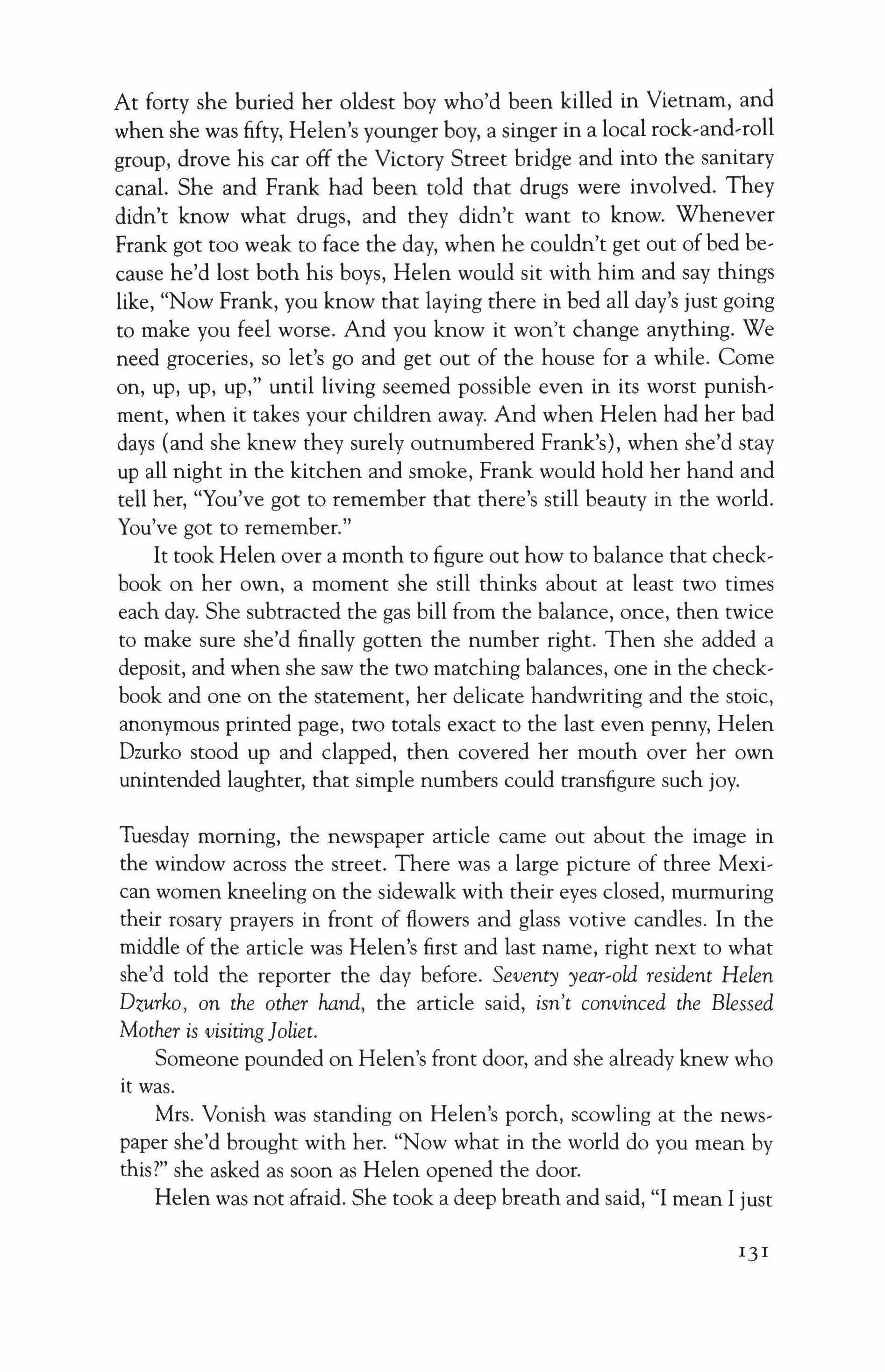
At forty she buried her oldest boy who'd been killed in Vietnam, and when she was fifty, Helen's younger boy, a singer in a local rock-and-roll group, drove his car off the Victory Street bridge and into the sanitary canal. She and Frank had been told that drugs were involved. They didn't know what drugs, and they didn't want to know. Whenever Frank got too weak to face the day, when he couldn't get out of bed because he'd lost both his boys, Helen would sit with him and say things like, "Now Frank, you know that laying there in bed all day's just going to make you feel worse. And you know it won't change anything. We need groceries, so let's go and get out of the house for a while. Corne on, up, up, up," until living seemed possible even in its worst punishment, when it takes your children away. And when Helen had her bad days (and she knew they surely outnumbered Frank's), when she'd stay up all night in the kitchen and smoke, Frank would hold her hand and tell her, "You've got to remember that there's still beauty in the world. You've got to remember."
It took Helen over a month to figure out how to balance that checkbook on her own, a moment she still thinks about at least two times each day. She subtracted the gas bill from the balance, once, then twice to make sure she'd finally gotten the number right. Then she added a deposit, and when she saw the two matching balances, one in the checkbook and one on the statement, her delicate handwriting and the stoic, anonymous printed page, two totals exact to the last even penny, Helen Dzurko stood up and clapped, then covered her mouth over her own unintended laughter, that simple numbers could transfigure such joy.
Tuesday morning, the newspaper article carne out about the image in the window across the street. There was a large picture of three Mexican women kneeling on the sidewalk with their eyes closed, murmuring their rosary prayers in front of flowers and glass votive candles. In the middle of the article was Helen's first and last name, right next to what she'd told the reporter the day before. Seventy year-old resident Helen Dzurko, on the other hand, the article said, isn't convinced the Blessed Mother is visiting]oliet.
Someone pounded on Helen's front door, and she already knew who it was.
Mrs. Vonish was standing on Helen's porch, scowling at the newspaper she'd brought with her. "Now what in the world do you mean by this?" she asked as soon as Helen opened the door.
Helen was not afraid. She took a deep breath and said, "I mean I just
131

don't know, that's all. I don't know for sure what that is over there, and I'm not going to lie and pretend that I do."
"Lie?" Mrs. Vonish said. "This has nothing to do with lying. I thought you were faithful."
"I am faithful."
"Then why don't you believe this is really the Blessed Mother?"
Mrs. Nedlo was spending the day with one of her sons; Helen knew that Mrs. Vonish was aching to tell Mrs. Nedlo about her, the heathen next door, how the heathen didn't believe in the miracle or the message the visitation was supposed to carry. Now Helen was frightened. An official abandonment was inevitable. She regretted what she'd said to the reporter.
"I am faithful," she said to Mrs. Vonish, nearly pleadingly.
"Well I don't know what to make of you one way or the other," Mrs. Vonish told her. She shook her head, then turned to watch the crowd across the street, searching, Helen was certain, for someone else to show the newspaper to.
Helen imagined the way Mrs. Nedlo's face would look when she heard the news: her round mouth letting go of the word Oh below eyes narrowed and emptied of their usually foolish joy.
A trio of the shirtless bad boys darted into the street, which was so clogged with crawling traffic that Helen didn't flinch from fear that they'd be hit. They ran between the cars, stopped, lit a packet of firecrackers, then scuttled away with their hands over their ears as the packet erupted in a attack of fast, sharp cracks that rang in Helen's ears long after they had popped and the cloud of white smoke had disappeared over the badly startled visitors below. Mrs. Vonish had screamed, had dropped her copy of the newspaper, had called into her cupped hands, "You can't do that! I'm calling the police! I'm calling the police!" though the bad boys had already vanished behind another house halfway down the block. She remained furious as she stooped to gather her paper, her hard evidence against Helen.
Helen bent as well and helped her collect what she had dropped. She wasn't thanked. "I really didn't mean it," Helen said. "You've got to believe me."
Mrs. Vonish was already watching her feet as she carefully stepped down the porch. "You don't have to convince me," she announced. "That's between you and the Lord."
For some reason, none of what had just happened made Helen as upset as what she learned when she sat back down to her kitchen table to finish reading her own copy of the article: the Church's official te-
132

sponse to what was happening on her street. They even have rules for what makes a real miracle, and since the one across the street wasn't three-dimensional and hadn't spoken, the Church said it probably wasn't real. Though, the article said, Diocese representatives report that they are pleased whenever hearts of the faithful are touched and uplifted.
After Helen read this, she couldn't finish the rest. She threw the whole newspaper in the garbage. She closed her eyes and, her hands resting on the counter near the sink, wondered what kind of church would tell its followers, day after day, to wait and pray and watch for miracles, just to tell those followers that the miracles they finally find aren't real? Wait and pray, wait and pray. Helen decided that her Church's instruction simply wasn't enough for her anymore. She couldn't count how many priests had told her the same thing when it came to her dead sons and husband. Just wait and pray, they said to her, for the glorious day she'd see her family again in Paradise.
Helen doesn't want to wait any longer. She doesn't think that she or anyone else should have to. She's alive now, living now, and she wants her family, all of them, to be with her now, in the life the Church always tells her to be so thankful for.
But how, Helen wonders, can she be thankful for all she's lost?
Everything changed on Wednesday.
The ladies did come to get Helen for mass after all, but since she had already settled and accepted their official abandonment for herself by deciding to quietly abandon them, without fuss, fight, or fanfare of any kind, no worry was relieved when they knocked on her door.
Mass was to begin in fifteen minutes, yet Helen hadn't even brushed her teeth.
"What is it, are you sick?" Mrs. Vonish asked when she saw that Helen was still in her bathrobe.
"No, I'm not sick," Helen said. "1 just don't feel like going."
"What's happening to you?" Mrs. Nedlo demanded. "And why don't you believe in the miracle?"
"She doesn't believe in anything anymore," Mrs. Vonish told her. "She feels sorry for herself and so she's lost her faith. She probably won't go to mass ever again."
"Why don't you believe in the miracle?" Mrs. Nedlo repeated. "Our Church doesn't believe in it either," Helen reminded them. "Both of you saw the article."
"Of course the Church says it's not real," Mrs. Vonish snapped.
I33

"They have to say that. Otherwise there will be chaos on this street. Strangers will come from Lord knows where and make this ungodly street even worse than it already is. Thank God the Church says it isn't real. They're protecting us."
"Yes," Mrs. Nedlo added. "Protecting us!"
"Oh, come on," Mrs. Vonish said. "Let the sad sack mope."
Helen had decided to give the women up in the midst of the previous night's anxious insomnia. She had been pacing the kitchen at an awful lonely hour, fretting about the solitude she was destined to face once her only two friends finally abandoned her. Then she had glanced up and caught her own reflection in the kitchen window: hunched forward in her robe, a snarl of misery pulling her face as though a weight were hanging from her chin, one little hand pursed tightly inside the other.
"Good God," she had said to herself, so sickened by the way she could make herself look. And for what? For a bitter old bitch and a mewling fool.
But watching them leave her porch that morning was more difficult to take than Helen had imagined. She couldn't bring herself to close the door, which would certainly be her final gesture ofresignation to the confines of television, crossword puzzles, and cheap magazines from the market about movie stars, their gowns, and their mansions on the beach-a whole industry built upon the diversion and fantasy of the old and alone.
"Wait, wait," she said, but Mrs. Vonish and Mrs. Nedlo were already down to the sidewalk. Helen looked at her watch; there was still time to dress and catch up with them. She was about to do just that when she saw Mrs. Nedlo halt on the sidewalk, tum, and lumber into the front yard next door. She dropped her purse. Mrs. Vonish finally discovered that Mrs. Nedlo was no longer next to her. She too stopped, and when she saw where Mrs. Nedlo had wandered off to, she called, "Where in the hell are you going?" Helen could see that Mrs. Nedlo's face was sunken into a bizarre vacancy; she let the door slam behind her and gripped the railing and walked as fast as she could to the yard next door, where Mrs. Nedlo had collapsed in a diabetic seizure.
"Oh Lord, Lord!" Mrs. Vonish yelled, now also in the yard, her hands clutching both sides of her head. "Help! Help!"
Helen knelt over the fallen woman and moved her wild hair away from her whitened eyes. She knew it was all she could do.
By Thursday, thanks to the newspaper article and no matter what the Church's official verdict on the matter was, thousands of strangers from
134

Lord knows where descended on Abe Street to pray before the image in the window. Police officers were called in to direct the traffic that packed both sides of the narrow street, and to keep some kind of order among the hundreds who traipsed across lawns and knelt wherever there was room to, rocking in spasms of glory and fervor. Automobile horns broke through the drone of rosary chants, and by the time the television news crews showed up, Helen, watching again from behind the safety of her front room window, couldn't make out a single patch of front yard grass anywhere, nor an inch of asphalt or sidewalk. Bundles of flowers wrapped in green paper and hundreds of glass votive candles cluttered the walk to the vacant house, and almost everyone who showed up brought more, so that within a few more hours the flowers were bunched in a pile growing maniacally on the old, warped porch.
Mrs. Nedlo is blind, and she will stay blind for the rest of whatever life she has left. Her sons spent two short afternoons emptying her house, which was up for sale by the following Monday morning.
That night, Helen saw her street on the ten o'clock news. For a moment, as the camera panned over the crowds and the traffic, she could see her own house, her front window, where she'd been inside watching this mess that even made the beauty of flowers a sick spectacle of want.
Friday afternoon, the piles of flowers wilted and dried in the summer's worst heat, yet the crowds still flooded the lawns and sidewalks up and down Abe Street. Their singing sounded like noise from a nightmare, the same hymns over and over until Helen finally had to turn the television up before she lost her mind.
There were vendors with ice cream and grilled corn on the cob dipped in mayonnaise. The police finally closed the street to all automobile traffic, since ambulances were called in when people started dropping from heatstroke. One of the votive candles in front of the empty house got kicked over and the dead grass started to burn. A Mexican boy ran over with a bucket of water and put the fire out.
If only Mrs. Vonish hadn't taken the time to walk up her steps and knock on her door, what she had to say that afternoon, Helen is certain, wouldn't have pushed her to the limits of her character. "We can't even get out of our damned houses!" was what Mrs. Vonish had to say. "Now do you believe what I said? These people need to be taught a hard lesson, but since half of them don't speak English, I doubt they'll ever learn."
If only she had said this in passing, on the street or at the market, I35
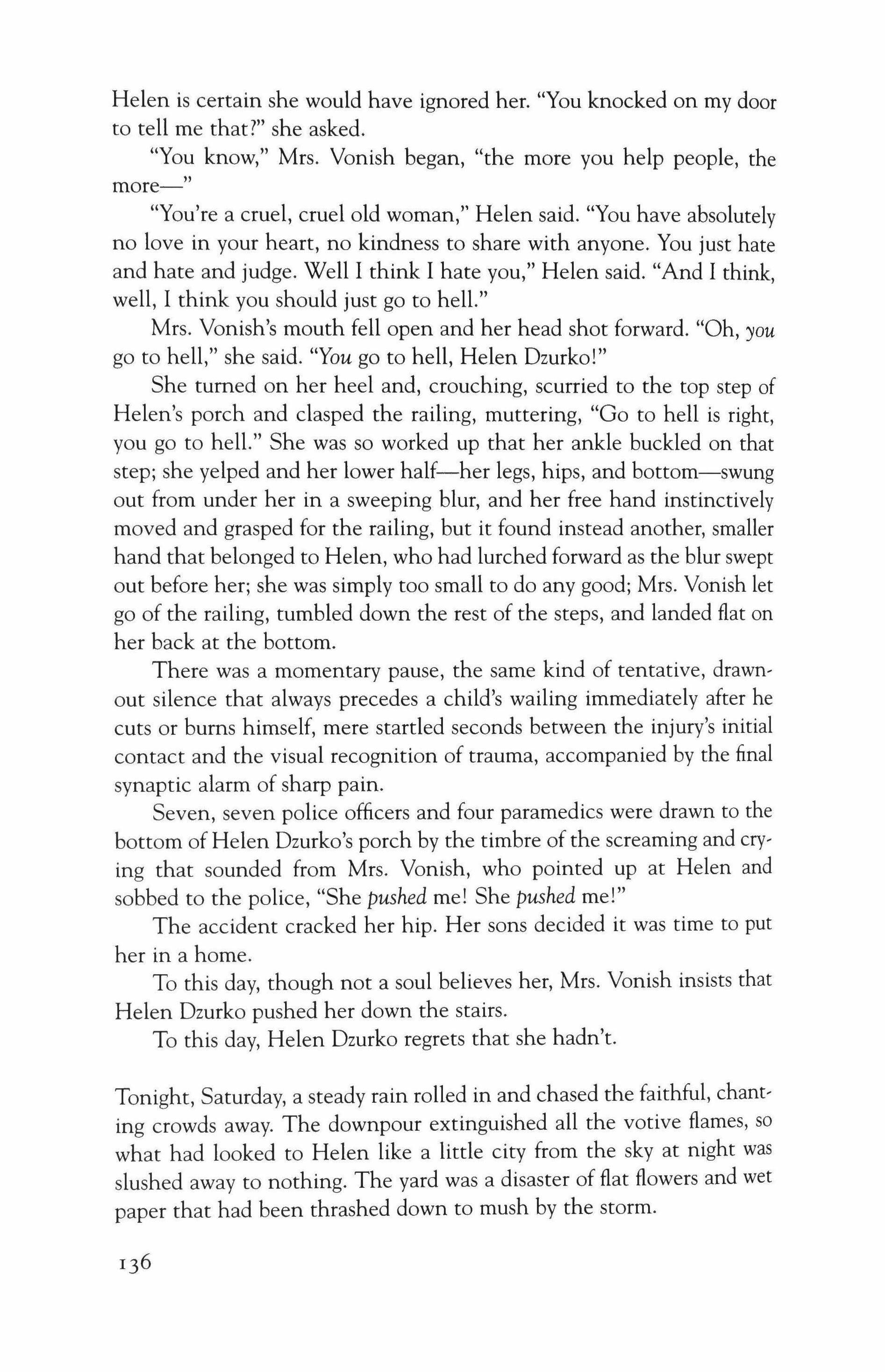
Helen is certain she would have ignored her. "You knocked on my door to tell me that?" she asked.
"You know," Mrs. Vonish began, "the more you help people, the more-"
"You're a cruel, cruel old woman," Helen said. "You have absolutely no love in your heart, no kindness to share with anyone. You just hate and hate and judge. Welll think I hate you," Helen said. "And I think, well, I think you should just go to hell."
Mrs. Vonish's mouth fell open and her head shot forward. "Oh, you go to hell," she said. "You go to hell, Helen Dzurko!"
She turned on her heel and, crouching, scurried to the top step of Helen's porch and clasped the railing, muttering, "Go to hell is right, you go to hell." She was so worked up that her ankle buckled on that step; she yelped and her lower half-her legs, hips, and bottom-swung out from under her in a sweeping blur, and her free hand instinctively moved and grasped for the railing, but it found instead another, smaller hand that belonged to Helen, who had lurched forward as the blur swept out before her; she was simply too small to do any good; Mrs. Vonish let go of the railing, tumbled down the rest of the steps, and landed flat on her back at the bottom.
There was a momentary pause, the same kind of tentative, drawnout silence that always precedes a child's wailing immediately after he cuts or bums himself, mere startled seconds between the injury's initial contact and the visual recognition of trauma, accompanied by the final synaptic alarm of sharp pain.
Seven, seven police officers and four paramedics were drawn to the bottom of Helen Dzurko's porch by the timbre of the screaming and crying that sounded from Mrs. Vonish, who pointed up at Helen and sobbed to the police, "She pushed me! She pushed me!"
The accident cracked her hip. Her sons decided it was time to put her in a home.
To this day, though not a soul believes her, Mrs. Vonish insists that Helen Dzurko pushed her down the stairs.
To this day, Helen Dzurko regrets that she hadn't.
Tonight, Saturday, a steady rain rolled in and chased the faithful, chanting crowds away. The downpour extinguished all the votive flames, so what had looked to Helen like a little city from the sky at night was slushed away to nothing. The yard was a disaster of flat flowers and wet paper that had been thrashed down to mush by the storm.

This is how Helen found the yard in front of the vacant house when she woke up in the middle of the night, when the sound of broken glass pulled her from her sleep.
Maybe one of the bad boys did it. Or maybe someone like Helen. Someone who was just tired of it all.
She went downstairs and opened her front door. The storm had passed and the street was slick and puddled. Someone had thrown a rock through the window, smashed it away so that the image was gone for, ever. There's nothing there now but an empty square, nothing anyone needs to look at or doubt.
It took Helen almost three hours to clean that yard. She dressed, dragged a trash bin across the street, then another, then filled them both with dead flowers and votive candles.
She's far, far beyond exhaustion now, and the sun will be up in an hour. But she knows that this morning her sleep will be sound, and when she wakes up, rested and strong, she will walk up and down this street that will soon be largely forgotten.
137
Siobhan Adcock
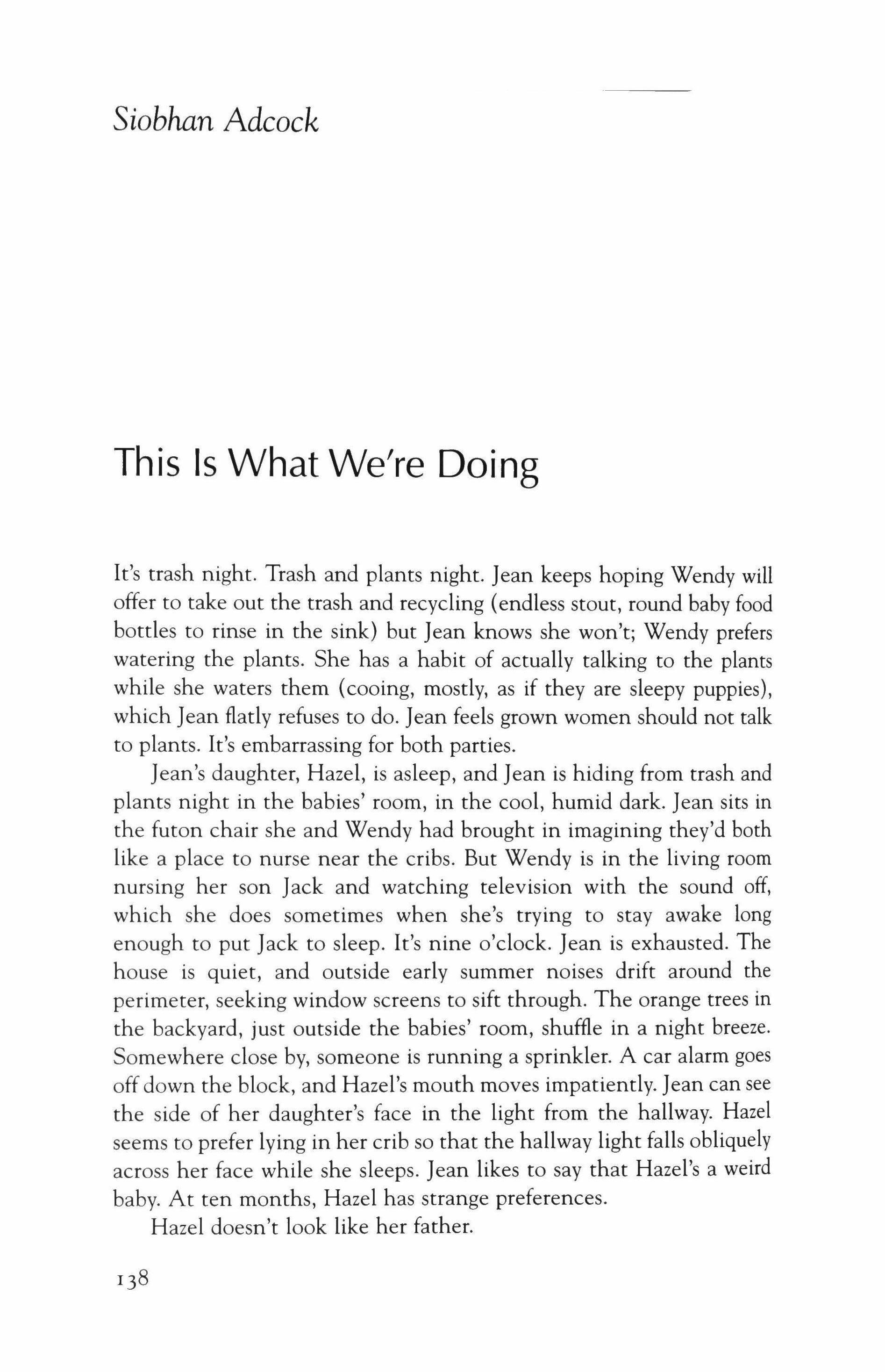
This Is What We're Doing
It's trash night. Trash and plants night. Jean keeps hoping Wendy will offer to take out the trash and recycling (endless stout, round baby food bottles to rinse in the sink) but Jean knows she won't; Wendy prefers watering the plants. She has a habit of actually talking to the plants while she waters them (cooing, mostly, as if they are sleepy puppies), which Jean flatly refuses to do. Jean feels grown women should not talk to plants. It's embarrassing for both parties.
Jean's daughter, Hazel, is asleep, and Jean is hiding from trash and plants night in the babies' room, in the cool, humid dark. Jean sits in the futon chair she and Wendy had brought in imagining they'd both like a place to nurse near the cribs. But Wendy is in the living room nursing her son Jack and watching television with the sound off, which she does sometimes when she's trying to stay awake long enough to put Jack to sleep. It's nine o'clock. Jean is exhausted. The house is quiet, and outside early summer noises drift around the perimeter, seeking window screens to sift through. The orange trees in the backyard, just outside the babies' room, shuffle in a night breeze. Somewhere close by, someone is running a sprinkler. A car alarm goes off down the block, and Hazel's mouth moves impatiently. Jean can see the side of her daughter's face in the light from the hallway. Hazel seems to prefer lying in her crib so that the hallway light falls obliquely across her face while she sleeps. Jean likes to say that Hazel's a weird baby. At ten months, Hazel has strange preferences. Hazel doesn't look like her father.
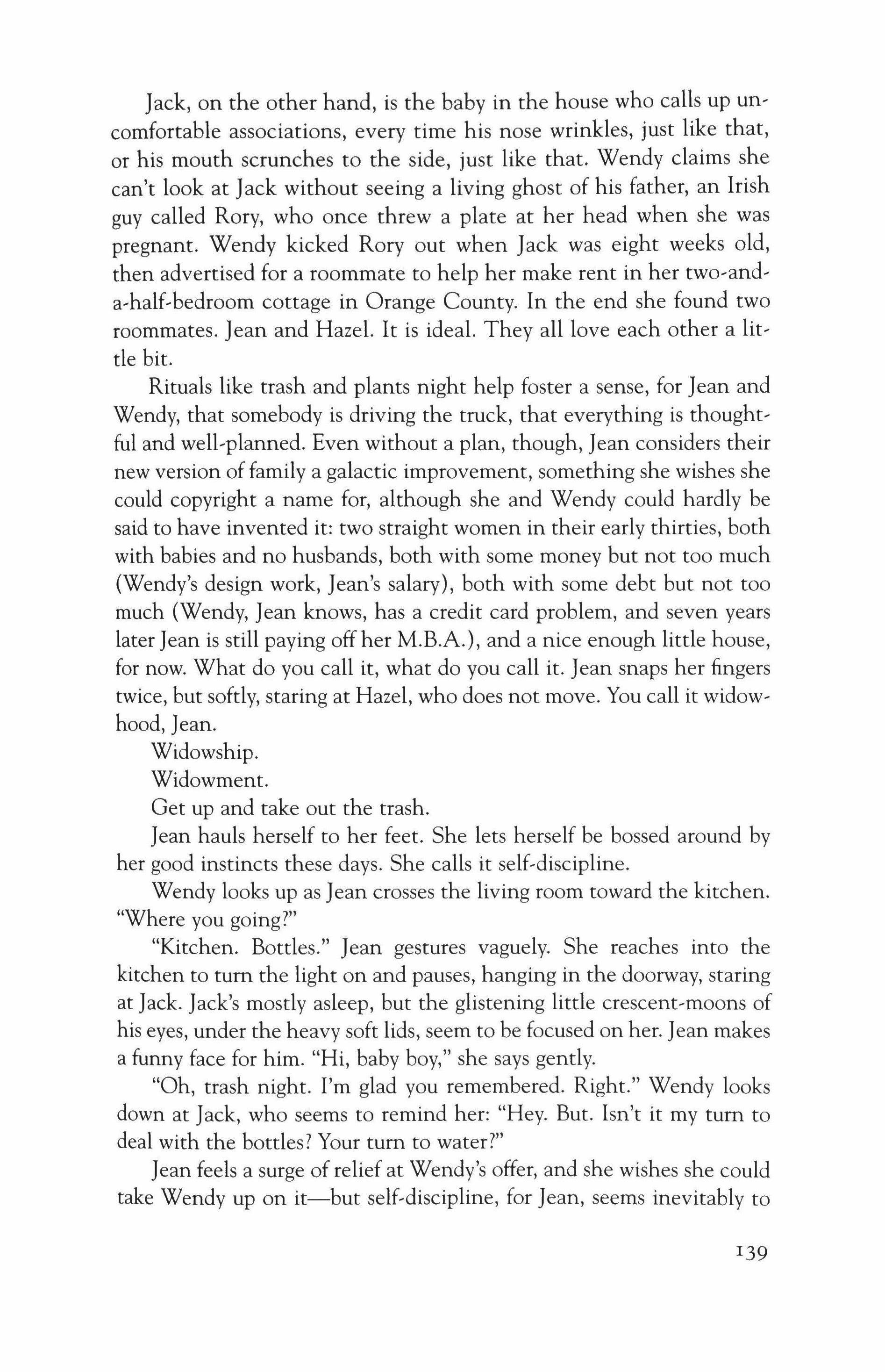
Jack, on the other hand, is the baby in the house who calls up uncomfortable associations, every time his nose wrinkles, just like that, or his mouth scrunches to the side, just like that. Wendy claims she can't look at Jack without seeing a living ghost of his father, an Irish guy called Rory, who once threw a plate at her head when she was pregnant. Wendy kicked Rory out when Jack was eight weeks old, then advertised for a roommate to help her make rent in her two-anda-half-bedroom cottage in Orange County. In the end she found two roommates. Jean and Hazel. It is ideal. They all love each other a little bit.
Rituals like trash and plants night help foster a sense, for Jean and Wendy, that somebody is driving the truck, that everything is thoughtful and well-planned. Even without a plan, though, Jean considers their new version of family a galactic improvement, something she wishes she could copyright a name for, although she and Wendy could hardly be said to have invented it: two straight women in their early thirties, both with babies and no husbands, both with some money but not too much (Wendy's design work, Jean's salary), both with some debt but not too much (Wendy, Jean knows, has a credit card problem, and seven years later Jean is still paying off her M.B.A.), and a nice enough little house, for now. What do you call it, what do you call it. Jean snaps her fingers twice, but softly, staring at Hazel, who does not move. You call it widowhood, Jean.
Widowship. Widowment.
Get up and take out the trash.
Jean hauls herself to her feet. She lets herself be bossed around by her good instincts these days. She calls it self-discipline.
Wendy looks up as Jean crosses the living room toward the kitchen. "Where you going?"
"Kitchen. Bottles." Jean gestures vaguely. She reaches into the kitchen to tum the light on and pauses, hanging in the doorway, staring at Jack. Jack's mostly asleep, but the glistening little crescent-moons of his eyes, under the heavy soft lids, seem to be focused on her. Jean makes a funny face for him. "Hi, baby boy," she says gently.
"Oh, trash night. I'm glad you remembered. Right." Wendy looks down at Jack, who seems to remind her: "Hey. But. Isn't it my tum to deal with the bottles? Your tum to water?"
Jean feels a surge of relief at Wendy's offer, and she wishes she could take Wendy up on it-but self-discipline, for Jean, seems inevitably to
139
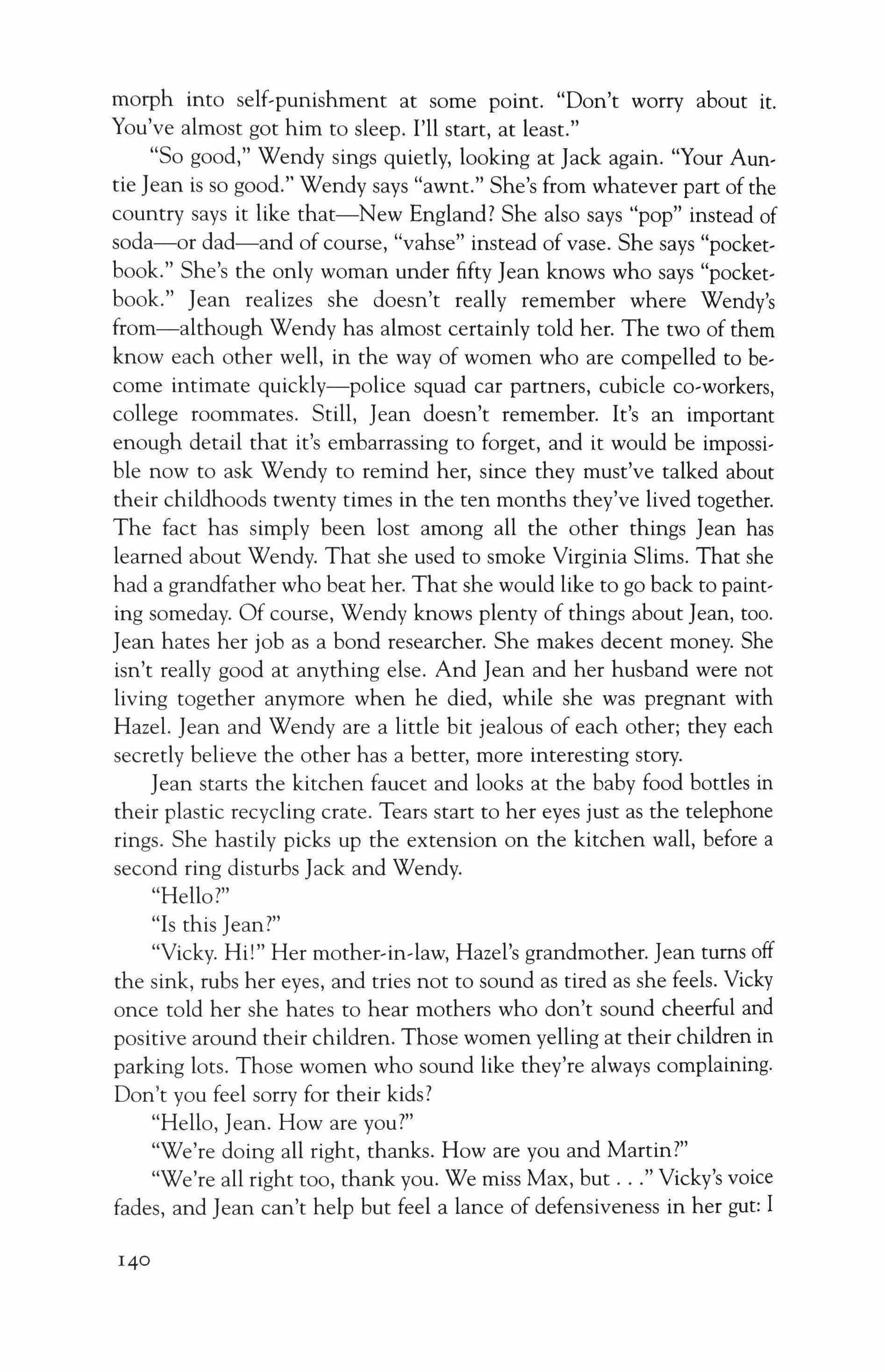
morph into self-punishment at some point. "Don't worry about it. You've almost got him to sleep. I'll start, at least."
"So good," Wendy sings quietly, looking at Jack again. "Your Auntie Jean is so good." Wendy says "awnt." She's from whatever part of the country says it like that-New England? She also says "pop" instead of soda-or dad-and of course, "vahse" instead of vase. She says "pocketbook." She's the only woman under fifty Jean knows who says "pocketbook." Jean realizes she doesn't really remember where Wendy's from-although Wendy has almost certainly told her. The two of them know each other well, in the way of women who are compelled to become intimate quickly-police squad car partners, cubicle co-workers, college roommates. Still, Jean doesn't remember. It's an important enough detail that it's embarrassing to forget, and it would be impossible now to ask Wendy to remind her, since they must've talked about their childhoods twenty times in the ten months they've lived together. The fact has simply been lost among all the other things Jean has learned about Wendy. That she used to smoke Virginia Slims. That she had a grandfather who beat her. That she would like to go back to painting someday. Of course, Wendy knows plenty of things about Jean, too. Jean hates her job as a bond researcher. She makes decent money. She isn't really good at anything else. And Jean and her husband were not living together anymore when he died, while she was pregnant with Hazel. Jean and Wendy are a little bit jealous of each other; they each secretly believe the other has a better, more interesting story.
Jean starts the kitchen faucet and looks at the baby food bottles in their plastic recycling crate. Tears start to her eyes just as the telephone rings. She hastily picks up the extension on the kitchen wall, before a second ring disturbs Jack and Wendy.
"Hello?"
"Is this Jean?"
"Vicky. Hi!" Her mother-in-law, Hazel's grandmother. Jean turns off the sink, rubs her eyes, and tries not to sound as tired as she feels. Vicky once told her she hates to hear mothers who don't sound cheerful and positive around their children. Those women yelling at their children in parking lots. Those women who sound like they're always complaining. Don't you feel sorry for their kids?
"Hello, Jean. How are you?"
"We're doing all right, thanks. How are you and Martin?"
"We're all right too, thank you. We miss Max, but " Vicky's voice fades, and Jean can't help but feel a lance of defensiveness in her gut: I
140

know we were separated, but I'm allowed to miss him sometimes, too. Or, I'm allowed to miss him anyway. "We get through each day as best we can. How's my granddaughter, is she in bed yet?"
Again, Jean fights back indignation. "She sure is." Of course my girl is in bed at nine o'clock, what kind ofmother do you take me for? "Sorry you missed her. I know she likes to talk to you."
"Well, I'm sorry to call so late, Jean, but I just had a lovely thought, and I had to ask you. That's more or less what I'm calling about--other than just to chat, of course. We Martin and I we wanted to in' vite you and Hazel up for the holiday weekend."
"Oh. Oh, that does sound lovely." Jean's in'laws live in Carmel. Martin and Vicky are convinced that Jean and Max would have worked things out, for Hazel's sake. If Max hadn't died.
Vicky keeps selling it. "She could splash in the pool, we could do some hiking or shopping we would really love to see you both. Do you have Memorial Day free?"
"Of course. We-ah. We'd love to come. Thank you. That's very thoughtful."
"Jean, sweetheart, you know we'll always think of you as family. And Hazel is such a joy to us, you can't imagine." Vicky's voice breaks, and she clears her throat.
"I can, Vicky. Imagine. I can." Jean rubs her eyes again. "I know what she means to you."
"And I hope you know what you mean to us, too, Jean."
"I do. Thank you. Really." Jean can't help but find these conversations with Vicky excruciating and somewhat maudlin-they have never normalized their relationship. Vicky, Jean thinks, likes to imagine her granddaughter and daughter-in-law as tragic heroines-her brave, lonely soldiers-and their living situation as a sort of quirky, grief-related hiccup. Vicky likes Jean's independence, has told her so many times. She has nevertheless expressed her deepest wish, in the most wistful voice imaginable, that when her lease with Wendy is up, Jean and Hazel should move to Carmel, "or at least Monterey," to be near the girl's only other living relatives. The fact that Jean's job is in Los Angeles apparently never enters into it.
"So we'll see you Friday, then?"
"Sure. I may actually start up early Saturday morning I have to work Friday." Jean finds herself clenching her teeth. Stop it.
"Oh. Of course. How's work?" Vicky hasn't worked since the late sixties, when she was a flight attendant.

"It's great, thank you."
"WelL That's fine, now."
Jean gets off the telephone as fast as is decent. "Hazel and I may be going to Carmel this weekend." Ah, Jean. May be?
"Really?" From the couch. There's a funny tone to Wendy's voice. Jean and Wendy share a household and some responsibility for each other's children, but they have made a verbal agreement not to assume anyone in their home is running a free day care center. They are under no mutual obligations except to pay rent and be friendly and keep the house up, and of course to help out when an extra pair of hands is needed-when diapers are low, when formula needs buying, when the errand is easier run without a baby in tow. This is why, as Jean and Wendy have often gleefully theorized, all single mothers should move in together. Hazel goes to real day care, out of the house, and Jack will go there too when he gets to be her age. Which is just fine, usually-Jean never has to arrange with Wendy to change any part ofher routine with HazeL A weekend upstate shouldn't impact Wendy's life at all. Where do these blind, accelerating streaks of insecurity and worry and guilt come from, Jean can't help but wonder. "Well, that should be nice."
"Eh." Jean turns off the kitchen faucet again and stands at the sink a moment, thinking. Then she pokes her head around the kitchen doorway. "Something wrong?"
Wendy blinks up at her.
"You just sounded upset."
Wendy smiles at Jean. She's tickled. "You. Okay. Actually, yes, I was going to ask you a favor this weekend." She shakes her head and laughs down at Jack. "Sometimes living with you is like having one of those freaky phone psychics for a roommate."
"Mother hormones. Standard package. Didn't they tell you at orientation?" Jean turns off the kitchen light and comes to flop into one of the living room armchairs, the one with the ottoman. She puts her feet up, and it feels great.
"I must have missed that," Wendy says wistfully.
"I love this goddamn ottoman," Jean squeezes the upholstery in a sudden fury of delight. "So, what's the favor?"
Wendy looks at Jean from under her bangs. "Well." Her glance falls on Jack again. "This isn't exactly going to be the easiest thing I've ever asked you."
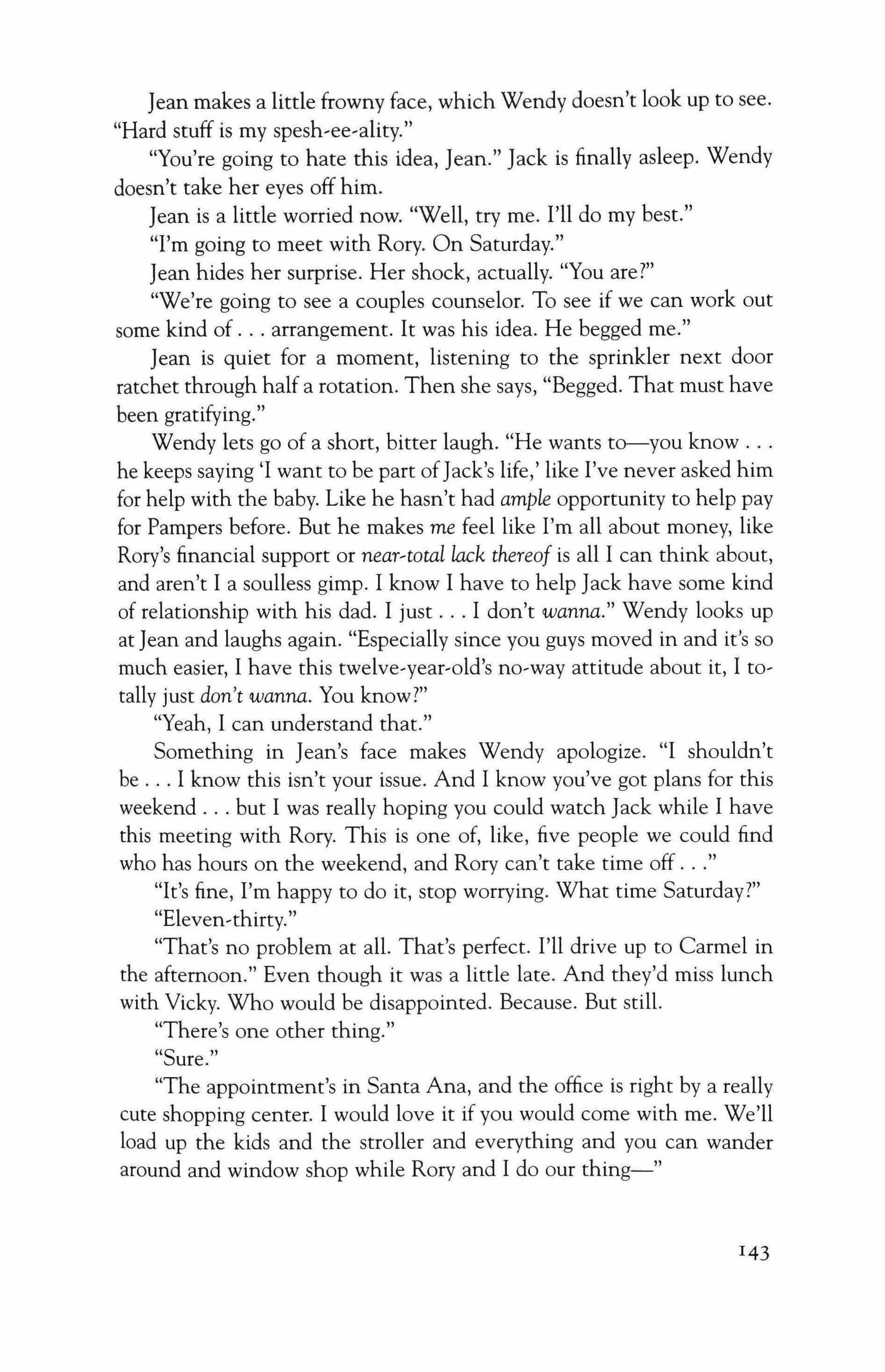
Jean makes a little frowny face, which Wendy doesn't look up to see. "Hard stuff is my spesh-ee-ality."
"You're going to hate this idea, Jean." Jack is finally asleep. Wendy doesn't take her eyes off him.
Jean is a little worried now. "Well, try me. I'll do my best."
"I'm going to meet with Rory. On Saturday."
Jean hides her surprise. Her shock, actually. "You are?"
"We're going to see a couples counselor. To see if we can work out some kind of arrangement. It was his idea. He begged me."
Jean is quiet for a moment, listening to the sprinkler next door ratchet through half a rotation. Then she says, "Begged. That must have been gratifying."
Wendy lets go of a short, bitter laugh. "He wants to-you know he keeps saying 'I want to be part ofJack's life,' like I've never asked him for help with the baby. Like he hasn't had ample opportunity to help pay for Pampers before. But he makes me feel like I'm all about money, like Rory's financial support or near-total lack thereof is all I can think about, and aren't I a soulless gimp. I know 1 have to help Jack have some kind of relationship with his dad. I just 1 don't wanna." Wendy looks up at Jean and laughs again. "Especially since you guys moved in and it's so much easier, I have this twelve-year-old's no-way attitude about it, I totally just don't wanna. You know?"
"Yeah, I can understand that."
Something in Jean's face makes Wendy apologize. "I shouldn't be I know this isn't your issue. And 1 know you've got plans for this weekend but I was really hoping you could watch Jack while I have this meeting with Rory. This is one of, like, five people we could find who has hours on the weekend, and Rory can't take time off
"It's fine, I'm happy to do it, stop worrying. What time Saturday?"
"Eleven-thirty.
"That's no problem at all. That's perfect. I'll drive up to Carmel in the afternoon." Even though it was a little late. And they'd miss lunch with Vicky. Who would be disappointed. Because. But still.
"There's one other thing."
"Sure."
"The appointment's in Santa Ana, and the office is right by a really cute shopping center. I would love it if you would come with me. We'll load up the kids and the stroller and everything and you can wander around and window shop while Rory and I do our thing-"
143

"Wow." It pops out before Jean can stop herself. Then she shakes her head. "Couldn't 1-"
"Rory wants to see Jack before the appointment," Wendy explains hastily. "But we can't bring the baby. The counselor asked us not to. Which makes sense since we'll probably be screaming at each other."
Jean laughs soundlessly through her nose, sort of a "nnph."
"I wouldn't ask you to do this if 1 didn't think that maybe letting Rory just see Jack before this appointment and the screaming and the inevitable, you know, whatever-if Rory just got to see him he'd be, like, better."
"In the conversation with the-guy."
"Woman. Exactly." Wendy nods. "One of my conditions for doing this was that we see a woman."
Jean smiles humorlessly with a comer ofher mouth. "Nice." She can imagine Wendy negotiating conditions. It's the kind of thing she would do-while Wendy is flaky about her houseplants, she is calmly ferocious, almost scary, about Jack.
Then Jean envisions herself choosing among various uninterestingbut-air-conditioned shops in the blazing white concrete of a mini-mall, Jack in the Baby Bjorn on her chest and Hazel in the stroller. Places like that don't have bathrooms. They don't have places to sit down. This is an awkward, ridiculous thing to do just so some shithead will behave himself in therapy. Rory should be dangled from an overpass, Rory should be covered in honey and left for the ants, Rory should be driven out into the desert and left for the coyotes. Rory should not be the recipient of one tiny atom of Wendy's or my consideration or generosity, Jean thinks. He is a plate-thrower. A deadbeat. An unreliable source of child support. Her chest swells with outrage. Jean, it is your responsibility to tell your friend when she's being pushed over! You'd rather buy her a carton of Capris (menthol!) than see her do this! She's too good, it's her greatest flaw! She's easily fooled!
Your own husband, of course, was wildly, hopelessly, comically unfaithful while you were pregnant with his little girl.
His mother will be waiting for you in Carmel, with salmon tartare.
"Okay. That's fine. No problem. Santa Ana on Saturday." "Really?" Wendy's face lights up. "I rove rou, Rean!" She play-barks happily, grinning.
"Oh, Scoob. You're a goob." Jean rolls her eyes, stands slowly. "I'm going to wash out the damn jars."
144

"No, no, no, I'll do it-" Wendy sits up slower than she speaks, watching Jack in her arms to make sure she doesn't wake him. "Stop. I'll do it." Jean disappears.
Jean waits until Friday. After lunch, she leaves a message for Vicky. "Hi, Vicky, it's Jean. Hazel and I are looking forward to coming up this weekend, but we have to do a favor for a friend and we'll be getting off to a later start than I'd thought. Originally. We'll probably get there at around three. Okay? So, I'll see you and Martin tomorrow." This is where another woman, with a different life, would say Love you. "Bye."
Afternoons, Jean knows, Vicky is often shopping or at the club, so she won't get the message until later. In some ways, Jean likes Vicky, likes her graciously old-fashioned lifestyle: Vicky and Martin still have cocktails every day at six, and they hike the foothills on the weekends. They frequently golf or play tennis with friends they've known almost thirty years, whose children call them "ma'am" and "sir," and buy each other engagement rings you can see from outer space, and never ever trash the beach house. Max's parents enjoy life and genuinely like other people in their circle; they drink, they have parties, they gossip but they don't moralize. They live like wealthy people from the 1950S. SO they have "luncheons," is that a good reason to despise them, really?
Max and Vicky loved playing tennis together. They loved drinking scotch after dinner and banging out show tunes on the baby grand in the Carmel house, while Jean and Martin fidgeted on the sectional couch and rolled their eyes at each other gamely. Those two. Irrepressible Max. It was Vicky's fault, wasn't it? He could do no wrong in his mother's eyes, what could he possibly do that any other woman wouldn't be able to forgive? Lovely, tender-eyed, adrnin-screwing Max. Jean forgives him, of course. Sure. Why not. It's easier to do now. She's alive, she made it, and she has her girL
After leaving her message for Vicky and willing herself not to fret pointlessly about it, Jean calls in her own admin, Henry, to make herself feel better, or at least more loveable. Henry is a stylish, bespectacled young gay man in his early twenties, efficient and discreet, and cheerfully indispensable in managing Jean's privacy back when she pumped milk for Hazel at the office. She would send him a one-letter instant message ("P") and a fortress of solitude would spring instantly up around her-locked door, silent phone, forwarded email messages, no disturbance. Now that Hazel's starting formula, she misses it.
"Hey, Henry. Do you have a minute? Come sit." Henry sits down
145

opposite her desk and crosses his legs, smiling at her. They get along. "What are you up to this weekend?"
"Some parties, little bit of puttering. Somebody's having a barbecue, but it's supposed to be hotter than a bear's ass on Saturday. What are you and Madame Hazel doing?"
"Hazel's grandmother," Jean says dryly, "has requested the pleasure of our company in Carmel."
"Delightful." Henry raises an arch eyebrow. Jean hasn't told Henry anything about Max's family, of course, but Henry tends to have a comical way with anything family-related. Somehow it's exactly what Jean wants to hear at this moment. Right now Jean wants a world in which there are no families and no familiars, only farces. She wants no obligations but to be with her girl. I will brook no arguments, she says to herself firmly, enjoying the antique sound of it, an expression from Vicky's era, perhaps.
"Oh, and guess what? I'm babysitting Saturday morning at a strip mall!"
"Oh-rny-God-your-life-is-so-fun." Henry says, deadpan.
Jean tries not to spoil it by giggling. "And then later, I might do some valet parking and some pizza delivery!" Henry snorts. Then Jean feels guilty. "Actually, no, it's not that bad. It's just a favor I'm doing for Wendy."
"Oh-I just love how you two are always there for each other." Henry's sarcasm melts instantly. He's what Wendy calls a puddin. "I love your set-up. You know that. I told my mom about it, in fact."
"My set-up is enviable, I know," Jean says. She blinks at her desktop, at her framed picture of Hazel in the backyard under the orange tree, with Jack's fuzzy truck. "Goddammit, Henry. Now I can't bag out of it, if it helps me impress you."
Henry laughs warmly, rises to return to his desk. "You're a pushover, Jean."
She's startled but hides it easily. "Well, it's not like I'm really parking Wendy's car."
"Oh, I know. I'm kidding. You know that. Who could respect a boss who didn't have a spine of steel?"
"Oh, oh. Everything's easy for Henry. Including his tossed-off exit lines."
Jean leaves the office promptly at five-thirty every day, to the disgruntlement of her co-workers, to pick up Hazel at day care. She can't wait. She drives fast. She loves the moment when Hazel looks up and
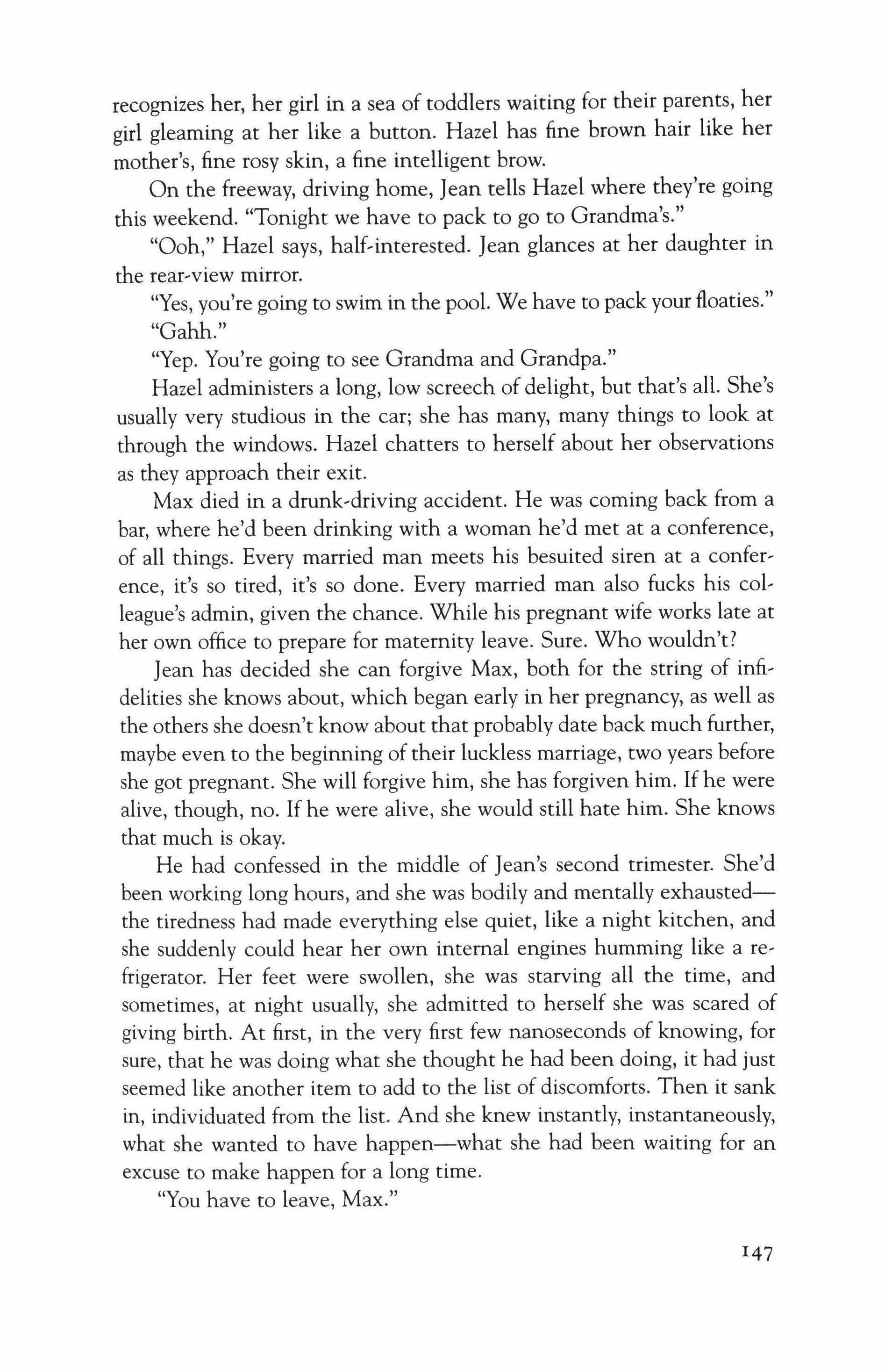
recognizes her, her girl in a sea of toddlers waiting for their parents, her girl gleaming at her like a button. Hazel has fine brown hair like her mother's, fine rosy skin, a fine intelligent brow.
On the freeway, driving home, Jean tells Hazel where they're going this weekend. "Tonight we have to pack to go to Grandma's."
"Ooh," Hazel says, half-Interested. Jean glances at her daughter in the rear-view mirror.
"Yes, you're going to swim in the pool. We have to pack your floaties." "Gahh."
"Yep. You're going to see Grandma and Grandpa."
Hazel administers a long, low screech of delight, but that's all. She's usually very studious in the car; she has many, many things to look at through the windows. Hazel chatters to herself about her observations as they approach their exit.
Max died in a drunk-driving accident. He was coming back from a bar, where he'd been drinking with a woman he'd met at a conference, of all things. Every married man meets his besuited siren at a conference, it's so tired, it's so done. Every married man also fucks his colleague's admin, given the chance. While his pregnant wife works late at her own office to prepare for maternity leave. Sure. Who wouldn't?
Jean has decided she can forgive Max, both for the string of infidelities she knows about, which began early in her pregnancy, as well as the others she doesn't know about that probably date back much further, maybe even to the beginning of their luckless marriage, two years before she got pregnant. She will forgive him, she has forgiven him. If he were alive, though, no. If he were alive, she would still hate him. She knows that much is okay.
He had confessed in the middle of Jean's second trimester. She'd been working long hours, and she was bodily and mentally exhaustedthe tiredness had made everything else quiet, like a night kitchen, and she suddenly could hear her own internal engines humming like a refrigerator. Her feet were swollen, she was starving all the time, and sometimes, at night usually, she admitted to herself she was scared of giving birth. At first, in the very first few nanoseconds of knowing, for sure, that he was doing what she thought he had been doing, it had just seemed like another item to add to the list of discomforts. Then it sank in, individuated from the list. And she knew instantly, instantaneously, what she wanted to have happen-what she had been waiting for an excuse to make happen for a long time.
"You have to leave, Max."
147
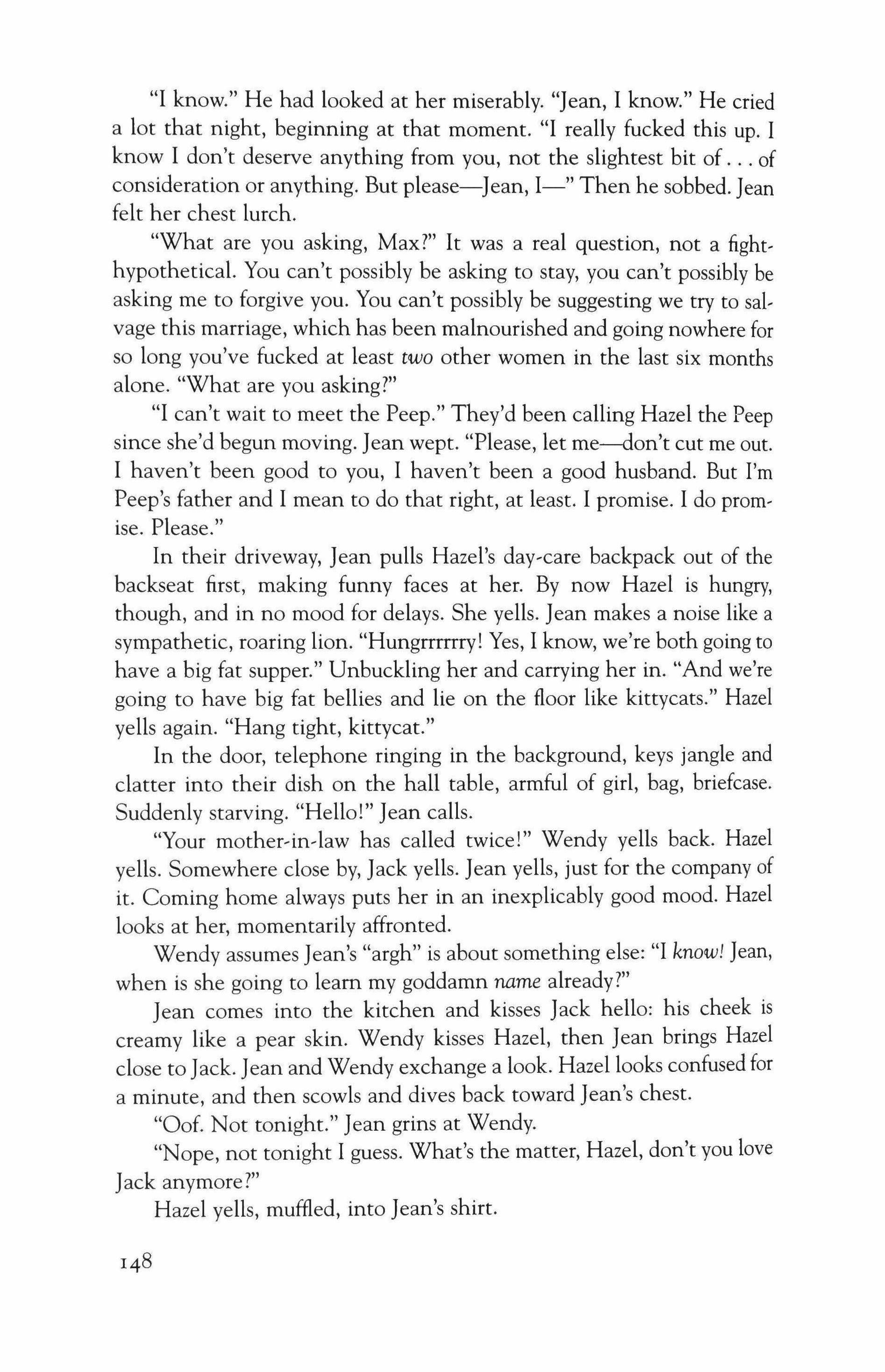
"I know." He had looked at her miserably. "Jean, I know." He cried a lot that night, beginning at that moment. "I really fucked this up. I know I don't deserve anything from you, not the slightest bit of of consideration or anything. But please-Jean, 1-" Then he sobbed. Jean felt her chest lurch.
"What are you asking, Max?" It was a real question, not a fighthypothetical. You can't possibly be asking to stay, you can't possibly be asking me to forgive you. You can't possibly be suggesting we try to salvage this marriage, which has been malnourished and going nowhere for so long you've fucked at least two other women in the last six months alone. "What are you asking?"
"I can't wait to meet the Peep." They'd been calling Hazel the Peep since she'd begun moving. Jean wept. "Please, let me-don't cut me out. I haven't been good to you, I haven't been a good husband. But I'm Peep's father and I mean to do that right, at least. I promise. I do promise. Please."
In their driveway, Jean pulls Hazel's day-care backpack out of the backseat first, making funny faces at her. By now Hazel is hungry, though, and in no mood for delays. She yells. Jean makes a noise like a sympathetic, roaring lion. "Hungrrrrrry! Yes, I know, we're both going to have a big fat supper." Unbuckling her and carrying her in. "And we're going to have big fat bellies and lie on the floor like kittycats." Hazel yells again. "Hang tight, kittycat."
In the door, telephone ringing in the background, keys jangle and clatter into their dish on the hall table, armful of girl, bag, briefcase. Suddenly starving. "Hello!" Jean calls.
"Your mother-in-law has called twice!" Wendy yells back. Hazel yells. Somewhere close by, Jack yells. Jean yells, just for the company of it. Coming home always puts her in an inexplicably good mood. Hazel looks at her, momentarily affronted.
Wendy assumes Jean's "argh" is about something else: "I know! Jean, when is she going to learn my goddamn name already?"
Jean comes into the kitchen and kisses Jack hello: his cheek is creamy like a pear skin. Wendy kisses Hazel, then Jean brings Hazel close to Jack. Jean and Wendy exchange a look. Hazel looks confused for a minute, and then scowls and dives back toward Jean's chest.
"Oof. Not tonight." Jean grins at Wendy.
"Nope, not tonight I guess. What's the matter, Hazel, don't you love Jack anymore?"
Hazel yells, muffled, into Jean's shirt.
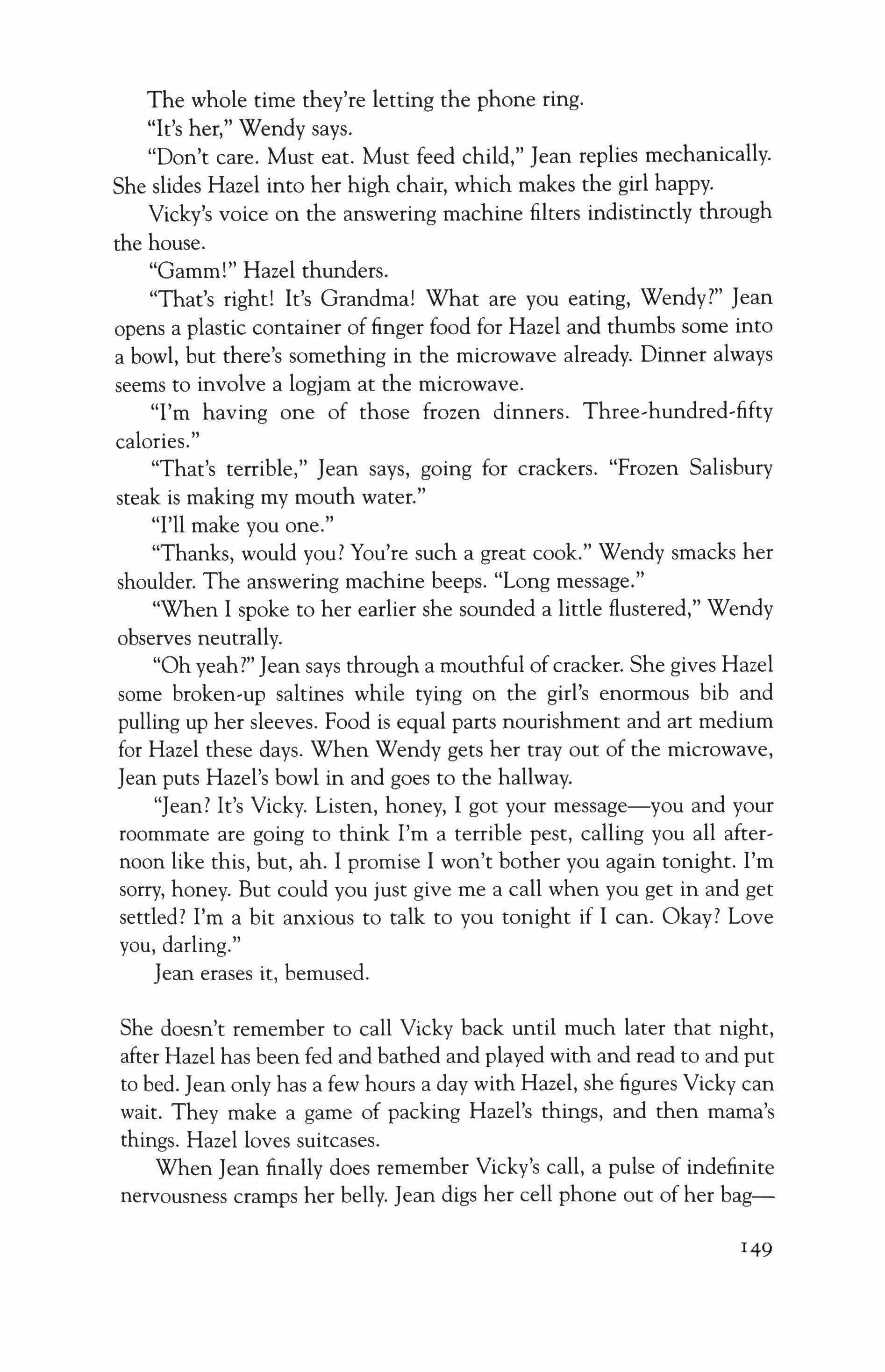
The whole time they're letting the phone ring.
"It's her," Wendy says.
"Don't care. Must eat. Must feed child," Jean replies mechanically. She slides Hazel into her high chair, which makes the girl happy.
Vicky's voice on the answering machine filters indistinctly through the house.
"Gamm!" Hazel thunders.
"That's right! It's Grandma! What are you eating, Wendy?" Jean opens a plastic container of finger food for Hazel and thumbs some into a bowl, but there's something in the microwave already. Dinner always seems to involve a logjam at the microwave.
"I'm having one of those frozen dinners. Three-hundred-fifty calories."
"That's terrible," Jean says, going for crackers. "Frozen Salisbury steak is making my mouth water."
"I'll make you one."
"Thanks, would you? You're such a great cook." Wendy smacks her shoulder. The answering machine beeps. "Long message."
"When I spoke to her earlier she sounded a little flustered," Wendy observes neutrally.
"Oh yeah?" Jean says through a mouthful ofcracker. She gives Hazel some broken-up saltines while tying on the girl's enormous bib and pulling up her sleeves. Food is equal parts nourishment and art medium for Hazel these days. When Wendy gets her tray out of the microwave, Jean puts Hazel's bowl in and goes to the hallway.
"Jean? It's Vicky. Listen, honey, I got your message-you and your roommate are going to think I'm a terrible pest, calling you all afternoon like this, but, ah. I promise I won't bother you again tonight. I'm sorry, honey. But could you just give me a call when you get in and get settled? I'm a bit anxious to talk to you tonight if I can. Okay? Love you, darling."
Jean erases it, bemused.
She doesn't remember to call Vicky back until much later that night, after Hazel has been fed and bathed and played with and read to and put to bed. Jean only has a few hours a day with Hazel, she figures Vicky can wait. They make a game of packing Hazel's things, and then mama's things. Hazel loves suitcases.
When Jean finally does remember Vicky's call, a pulse of indefinite nervousness cramps her belly. Jean digs her cell phone out of her bag-
149

it has been silenced since she left work, since she refuses to talk while she's driving her daughter. Two missed calls, both Vicky. One from a half-hour ago. No message.
It's a fine, warm night, and Jean goes out to the back patio with her cell phone, sinking into one of their expensive deck chairs. She brings a cool drink of water with her, and watches in the light from the house as liquid begins to condense on her glass. Then she watches the trees wag at her like the tails of enormous friendly dogs, digging up subterranean bones in her yard. Then she listens to her neighbor's television. Then she dials Vicky's number. It rings six times. She gets the machine. They're in bed, must be-it's after ten, they're almost sixty. Of course, she's only thirty-three and she likes to be in bed by ten herself "Hi Vicky. It's Jean-I'm just calling you back. Sorry it's so late-"
Her mother-in-law picks up, sounding breathless and excited. "Jean! I didn't recognize your number on the caller-H). Are you on your cell?"
"Yes-I'm sorry it's-"
"Why on earth are you on your cell phone?"
Jean isn't sure how to answer that. "Urn. Well, I'm sorry it's so late." She has said this how many times now? "Are you all right? Your message sounded a little urgent."
"Well, precisely!" Vicky laughs. "I had hoped to talk to you before now, but I suppose you're busy. Are you at home?"
"I'm in my backyard." Jean tries not to yawn, but she's suddenly exhausted again. Hazel wakes up by six A.M.
"How nice! I didn't know you even had a yard!"
Again, Jean isn't quite sure what is required of her. She opens and closes her mouth a few times quietly, searching her mental database for a Vicky-pleasing response.
"I suppose you must think I'm an absolute nut, calling you so many times tonight. But-Jean, I wonder
"I don't think you're a nutcase," Jean says. What is wrong with my brain? Why isn't it hooked up to my mouth?
"Well then, I'll just come out and say it. I had hoped you and Hazel would be here for lunch tomorrow. I had something planned. I had invited somebody that I wanted you to talk to."
Impulsively Jean holds the phone away from her head and looks at it. Could the strangeness of this conversation be the phone's fault somehow? The buttons glow at her.
"Somebody for-" she brings the phone back to her ear. "Wait, somebody for me to talk to or Hazel?"

"Well, all of us, really. Our, ah-our financial planner. Bob Hendricks. He's a good friend of Martin's. We've been with him for years and he's never steered us wrong. We golf with him sometimes you know, Jean, a professional friend. One who could do you some good, I'm hoping."
Jean feels her eyes go wide and her head nod, as if she's being televised at a difficult moment and doesn't want to look stupid or uncompassionate.
"Jean, I don't want you to take this the wrong way But I wanted you to have somebody to consult about the the estate. I know Max left everything to you and Hazel, and, well, Martin and I have of course made plans for you and Hazel to be remembered when when we pass. Not as if that's happening any time soon," Vicky laughs nervously.
"Vicky, I'm not quite sure I understand what you're talking about," Jean confesses, and then she starts laughing. It sounds strained even to her. "What the hell are you talking about? What's going on? I mean, what are we even talking about?"
Vicky is flustered. "Well, I know Max left you a sum of money, Jean, and there was his life insurance policy, and I just I wanted you to be able to talk to somebody about investing it or you know, using it to improve your situation."
Jean is silent.
Vicky sniffs.
"This isn't easy for me to talk about, darling."
Jean manages to say something at last: "Vicky, I'm a bond researcher."
"Yes, I know. I know-you must have some kind of knowledge of how to invest properly-so many women don't. I know I never did!" Vicky laughs again, but then she makes a strange sort of choked noise. "This isn't easy for me, Jean. I know it's not really my business but in another way it is, don't you see?"
Jean tries to imagine how she could possibly respond to Vicky's question. She had immediately socked every dollar proceeding from Max's death into Hazel's college fund and her (outrageously expensive) day care tuition. It was a good amount of money-enough to keep her daughter in her extortionate day care center until she was ready for preschool, with some left over to grow a few years at Stanford. Beyond that Jean's own salary is more than adequate to handle. Vicky cannot be suggesting that Jean would want to day trade with her dead, cheating husband's life insurance benefit, or that she would want
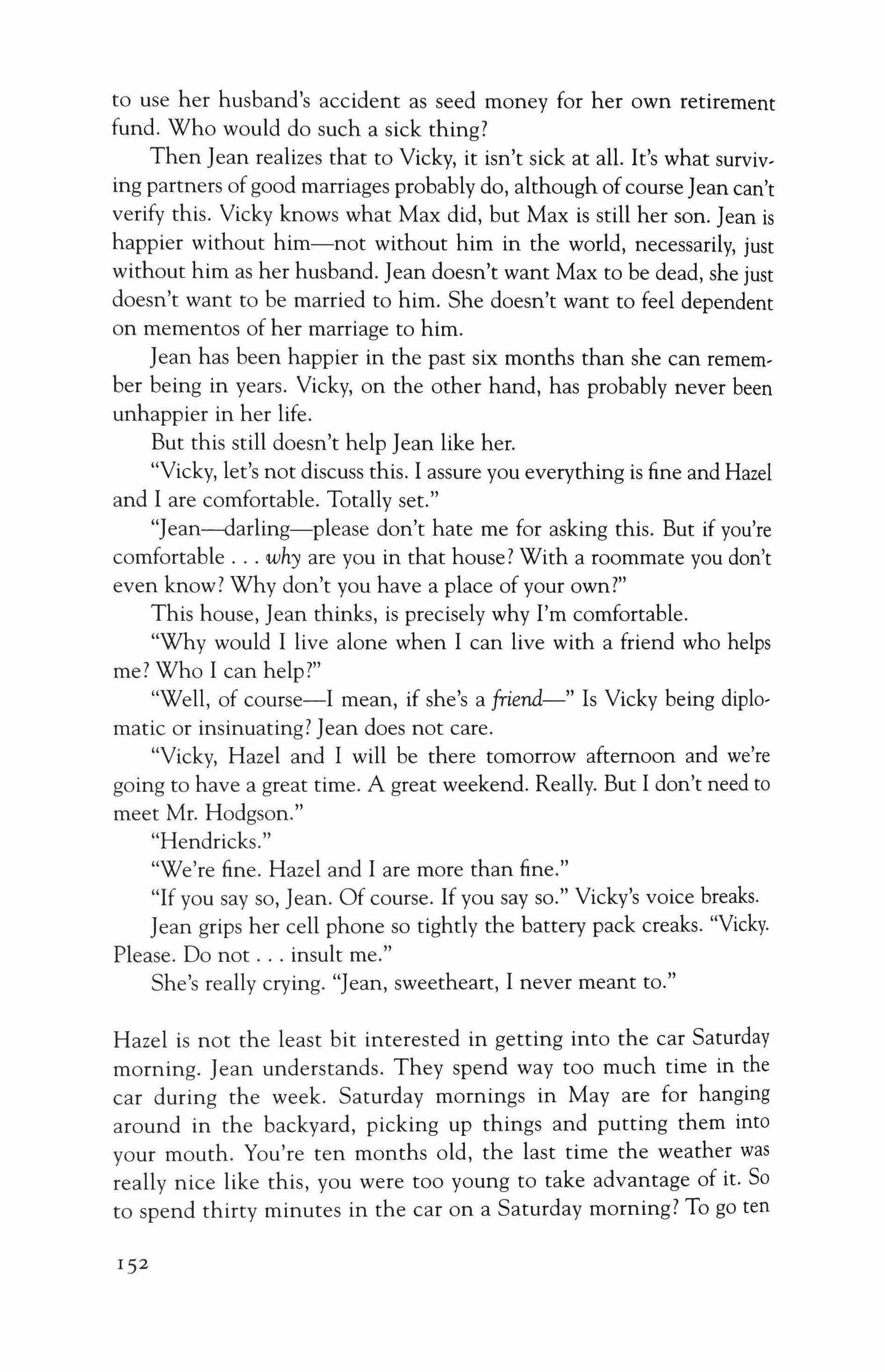
to use her husband's accident as seed money for her own retirement fund. Who would do such a sick thing?
Then Jean realizes that to Vicky, it isn't sick at all. It's what surviving partners of good marriages probably do, although of course Jean can't verify this. Vicky knows what Max did, but Max is still her son. Jean is happier without him-not without him in the world, necessarily, just without him as her husband. Jean doesn't want Max to be dead, she just doesn't want to be married to him. She doesn't want to feel dependent on mementos of her marriage to him.
Jean has been happier in the past six months than she can remember being in years. Vicky, on the other hand, has probably never been unhappier in her life.
But this still doesn't help Jean like her.
"Vicky, let's not discuss this. I assure you everything is fine and Hazel and I are comfortable. Totally set."
"Jean--darling-please don't hate me for asking this. But if you're comfortable why are you in that house? With a roommate you don't even know? Why don't you have a place of your own?"
This house, Jean thinks, is precisely why I'm comfortable.
"Why would I live alone when I can live with a friend who helps me? Who I can help?"
"Well, of course-I mean, if she's a friend-" Is Vicky being diplomatic or insinuating? Jean does not care.
"Vicky, Hazel and I will be there tomorrow afternoon and we're going to have a great time. A great weekend. Really. But I don't need to meet Mr. Hodgson."
"Hendricks."
"We're fine. Hazel and I are more than fine."
"If you say so, Jean. Of course. If you say so." Vicky's voice breaks. Jean grips her cell phone so tightly the battery pack creaks. "Vicky. Please. Do not insult me."
She's really crying. "Jean, sweetheart, I never meant to."
Hazel is not the least bit interested in getting into the car Saturday morning. Jean understands. They spend way too much time in the car during the week. Saturday mornings in May are for hanging around in the backyard, picking up things and putting them into your mouth. You're ten months old, the last time the weather was really nice like this, you were too young to take advantage of it. So to spend thirty minutes in the car on a Saturday morning? To go ten

miles? To spend the day at a strip mall? Ridiculous! Yes, Jean understands.
She doesn't say anything about this out loud, though. Out loud, she says, "Where's my good girl? Where's my girl who loves the car? Come on, Hazel, you love the car!"
Today Hazel does not love the car. Not Wendy's car, at least.
In the end, Jean and Wendy give up on comforting or bribing her, and try to talk over Hazel's wails in the backseat. "I packed Jack's favorite toy. If he gets fussy-and I don't think he will, but if he does there's a bottle of breastmilk in there too."
"Shit. Really? I put a bottle offormula in for Hazel."
"That same bag?"
"Well, I thought we were only bringing one."
"You can tell the difference, though, by looking."
"You can?" Jean thinks about it. "I guess I can."
"The appointment's only an hour. He won't get hungry."
"Thank God they're the same diaper size." Jean winds around in her seat. Hazel is getting red in the face. "Baby, it's okay. We're just going on a trip. It's no big deal." Jean notices Jack's brow is furrowed, and he's looking at Hazel in utter consternation. Jean laughs, which just makes Hazel howl louder. "Jack's getting confused."
"Oh yeah?" Wendy, Jean can tell, wants to tum around and look.
"Yeah. His little mouth is all scrinched. You tell her, Jack. Tell her there's no reason to be so mad." Jack actually looks as if he's about to begin crying too. Jean reaches into the bag between her knees hastily, groping for a distraction. "Yes! Scary clown!"
"Oh, yes! They love scary clown!"
Scary clown is a gift from somebody or other. He rattles. Jean whips back around with scary clown in hand. "Thank God for scary clown. Hey look!" Jean's back is wrenched and beginning to hurt. She's practically in the back seat. "Look ooh, scary!" Hazel stops crying in little decelerating hitches. The babies are mesmerized. Jean's scary clown impression even gets a laugh, but only from Jack.
"Jean's the best mama, Jean's the best mama," Wendy sings.
"Jean's the mama who looks the most like scary clown."
When they pull into the parking lot of the building cornplex-e-lowslung and terrarium-bound-where Wendy's therapist has her office, Jean cranes her neck around. "We're here?"
"Yup."
"Where's the strip mall?"
153

Wendy looks at Jean oddly. "Strip mall? Who said anything about a strip mall?"
Jean experiences a moment of stomach-dropping panic. "You did. Isn't that where we'll be while you're meeting with Rory?"
"I never said anything about a strip mall." Wendy snorts. "Do you really think I'm that much of a monster, that I'd, like, set the three of you loose on a strip mall while I hang out in the air conditioning? Is that what you thought?"
"Wendy, where else am I going to go? Look around you!" Jean gestures wildly. Identical office complexes as far as the eye can see. Brown plate glass. Green plate glass. Molded concrete. Sadistically-pruned hedges.
"Jesus, don't get your panties in an uproar! It's a shopping center. It's right across the parking lot." Wendy points. Jean sees a building complex that looks exactly like an office complex, only with more shrubbery, and more cars parked outside. "Santa Anita Center. It's new."
Jean sees the lettering now, in a discreet and posh font, curved over the door. She is chastened. "Oh."
"Strip mall." Wendy cannot believe it. There is a moment of quiet. She pulls up outside the therapist's office building and shifts into park. "I believe," Jean says at last, deadpan, "the expression is 'panties in a bunch,' or 'bowels in an uproar.'"
Wendy looks at her, then snorts. "Bowel this." She's about to laugh for real, but then her face changes. She's looking past Jean at the walkway extending from the car to the building doors.
Jean doesn't have to look. "I'll get Jack out of the car seat?"
"No, leave him," Wendy says brusquely, getting out of the car.
Jean watches Wendy cross the windshield, a stem expression on her face. A loud knock at Jean's ear makes her jump, with a little shriek. She puts a hand to her heart, eyes closed, and hears laughter outside her window. "Scared you? I'm sorry! It's Jean, isn't it?"
Weakly, heart still thudding, Jean turns her head to look at Rory, who's leaning down on the other side of the glass, peering in. He's a big guy, built like a football player, although Wendy says he's more into soccer. Blond hair. Square face. Jean can see no resemblance to Jack. Rory smiles, to all appearances harmless, and then Wendy reaches his side. Wendy glances down at Jean inside the car, but doesn't seem to see her. She's all business now.
"Wendy. Hi."
"Hi, Rory."
154

"Don't I get to hold my son?" Rory sounds dumber, muffled through the glass, than he probably is. Jean resists the temptation to roll down her window. She looks at her hands. Then she turns around and watches the kids in the backseat, so that she's turned completely away from Wendy and Rory. Hazel stares at her. Jean stares back, face blank and friendly.
"I don't think we'd better bother him. He's been cranky all day," Wendy says coolly.
"You're not even going to let me touch him?"
"Jean?"
Jean winds back around and rolls down her window. Wendy is squinting in at her.
"Would you roll down Jack's window so Rory can say hello?"
"Um, sure."
The car is still on, and controls for all four windows are on the driver's door. Jean does yet more reaching around the interior of the car. Because Jack's seat is behind hers, Rory bumps into her headrest as he reaches in to rub Jack's tiny shoulder.
"Hey, fella!"
Rory puts as much of his body as possible through the window. Jean unobtrusively opens her door and glides out of the car. Wendy looks at her, but again, it's as if she doesn't know her-Wendy has climbed out of the trenches and is deep in some other territory now. She looks at Jean as if she doesn't care what Jean thinks, and then looks down at Rory's back, writhing atop the backseat window, which only rolls down halfway, for child-safety reasons, Jean has always thought. Jean is a little afraid of Wendy and walks, perambulates really, around to the other side of the car so that she can look in at Hazel.
The babies in the backseat are obviously bewildered and fascinated by Rory's behavior. Jean watches her daughter watch him. Rory tickles and rubs Jack, then looks up at Hazel, with some difficulty, as he is bent in half over the window and his head is already touching the roof of the car. "Hi there, little lady!" Hazel furrows at him. They have no idea, Jean thinks, where to file this.
Then Hazel turns her head and sees Jean, standing outside her window. Hazel reaches her hand out. Mama. Jean's eyes water. Hazel looks as if she's in a fishbowl, on the other side of the glass. Jean feels a moment of panic. No one can separate me from you, she thinks. You are me. You are mine. I belong to you. She refuses to think about the glass, what could happen inside that glass. You're safe, she thinks at Hazel. Don't worry. I gotcha.
155
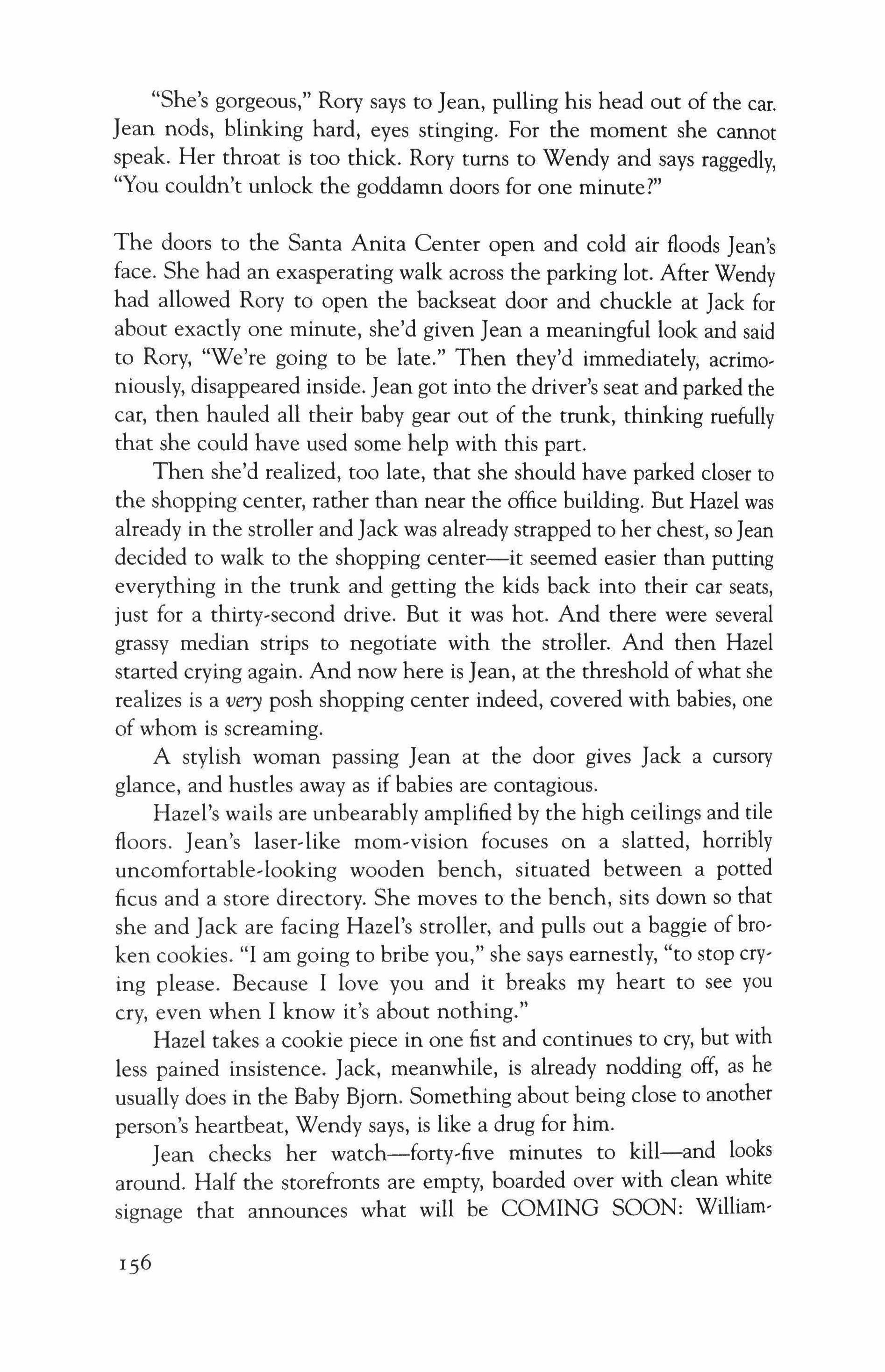
"She's gorgeous," Rory says to Jean, pulling his head out of the car. Jean nods, blinking hard, eyes stinging. For the moment she cannot speak. Her throat is too thick. Rory turns to Wendy and says raggedly, "You couldn't unlock the goddamn doors for one minute?"
The doors to the Santa Anita Center open and cold air floods Jean's face. She had an exasperating walk across the parking lot. After Wendy had allowed Rory to open the backseat door and chuckle at Jack for about exactly one minute, she'd given Jean a meaningful look and said to Rory, "We're going to be late." Then they'd immediately, acrimoniously, disappeared inside. Jean got into the driver's seat and parked the car, then hauled all their baby gear out of the trunk, thinking ruefully that she could have used some help with this part.
Then she'd realized, too late, that she should have parked closer to the shopping center, rather than near the office building. But Hazel was already in the stroller and Jack was already strapped to her chest, so Jean decided to walk to the shopping center-it seemed easier than putting everything in the trunk and getting the kids back into their car seats, just for a thirty-second drive. But it was hot. And there were several grassy median strips to negotiate with the stroller. And then Hazel started crying again. And now here is Jean, at the threshold of what she realizes is a very posh shopping center indeed, covered with babies, one of whom is screaming.
A stylish woman passing Jean at the door gives Jack a cursory glance, and hustles away as if babies are contagious.
Hazel's wails are unbearably amplified by the high ceilings and tile floors. Jean's laser-like mom-vision focuses on a slatted, horribly uncomfortable-looking wooden bench, situated between a potted ficus and a store directory. She moves to the bench, sits down so that she and Jack are facing Hazel's stroller, and pulls out a baggie of broken cookies. "I am going to bribe you," she says earnestly, "to stop crying please. Because I love you and it breaks my heart to see you cry, even when I know it's about nothing."
Hazel takes a cookie piece in one fist and continues to cry, but with less pained insistence. Jack, meanwhile, is already nodding off, as he usually does in the Baby Bjorn. Something about being close to another person's heartbeat, Wendy says, is like a drug for him.
Jean checks her watch-forty-five minutes to kill-and looks around. Half the storefronts are empty, boarded over with clean white signage that announces what will be COMING SOON: William-
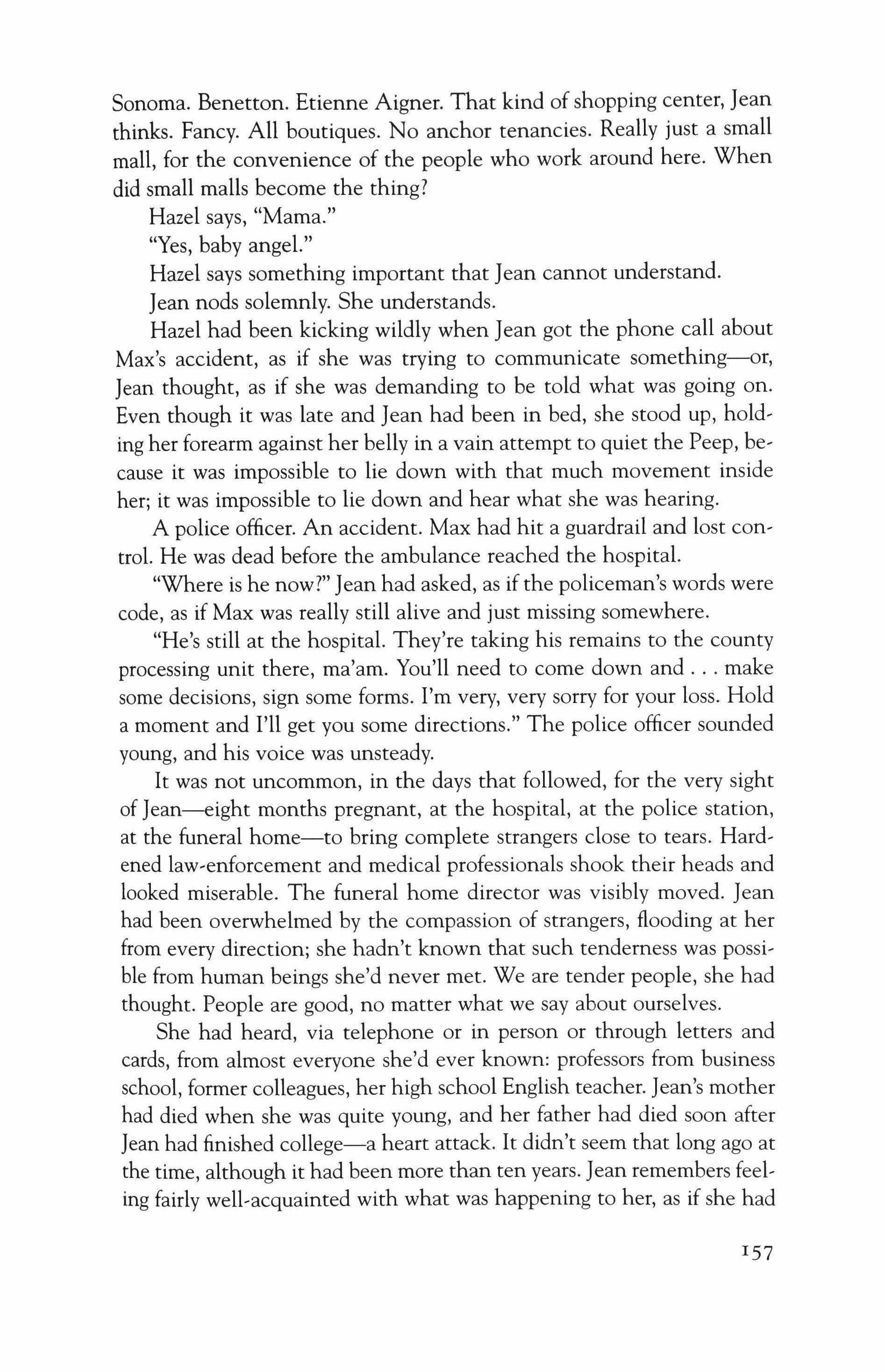
Sonoma. Benetton. Etienne Aigner. That kind of shopping center, Jean thinks. Fancy. All boutiques. No anchor tenancies. Really just a small mall, for the convenience of the people who work around here. When did small malls become the thing?
Hazel says, "Mama."
"Yes, baby angel."
Hazel says something important that Jean cannot understand.
Jean nods solemnly. She understands.
Hazel had been kicking wildly when Jean got the phone call about Max's accident, as if she was trying to communicate something-or, Jean thought, as if she was demanding to be told what was going on. Even though it was late and Jean had been in bed, she stood up, holding her forearm against her belly in a vain attempt to quiet the Peep, because it was impossible to lie down with that much movement inside her; it was impossible to lie down and hear what she was hearing.
A police officer. An accident. Max had hit a guardrail and lost control. He was dead before the ambulance reached the hospital.
"Where is he now?" Jean had asked, as if the policeman's words were code, as if Max was really still alive and just missing somewhere.
"He's still at the hospital. They're taking his remains to the county processing unit there, ma'am. You'll need to come down and make some decisions, sign some forms. I'm very, very sorry for your loss. Hold a moment and I'll get you some directions." The police officer sounded young, and his voice was unsteady.
It was not uncommon, in the days that followed, for the very sight of Jean-eight months pregnant, at the hospital, at the police station, at the funeral home-to bring complete strangers close to tears. Hardened law-enforcement and medical professionals shook their heads and looked miserable. The funeral home director was visibly moved. Jean had been overwhelmed by the compassion of strangers, flooding at her from every direction; she hadn't known that such tenderness was possible from human beings she'd never met. We are tender people, she had thought. People are good, no matter what we say about ourselves.
She had heard, via telephone or in person or through letters and cards, from almost everyone she'd ever known: professors from business school, former colleagues, her high school English teacher. Jean's mother had died when she was quite young, and her father had died soon after Jean had finished college-a heart attack. It didn't seem that long ago at the time, although it had been more than ten years. Jean remembers feeling fairly well-acquainted with what was happening to her, as if she had
157
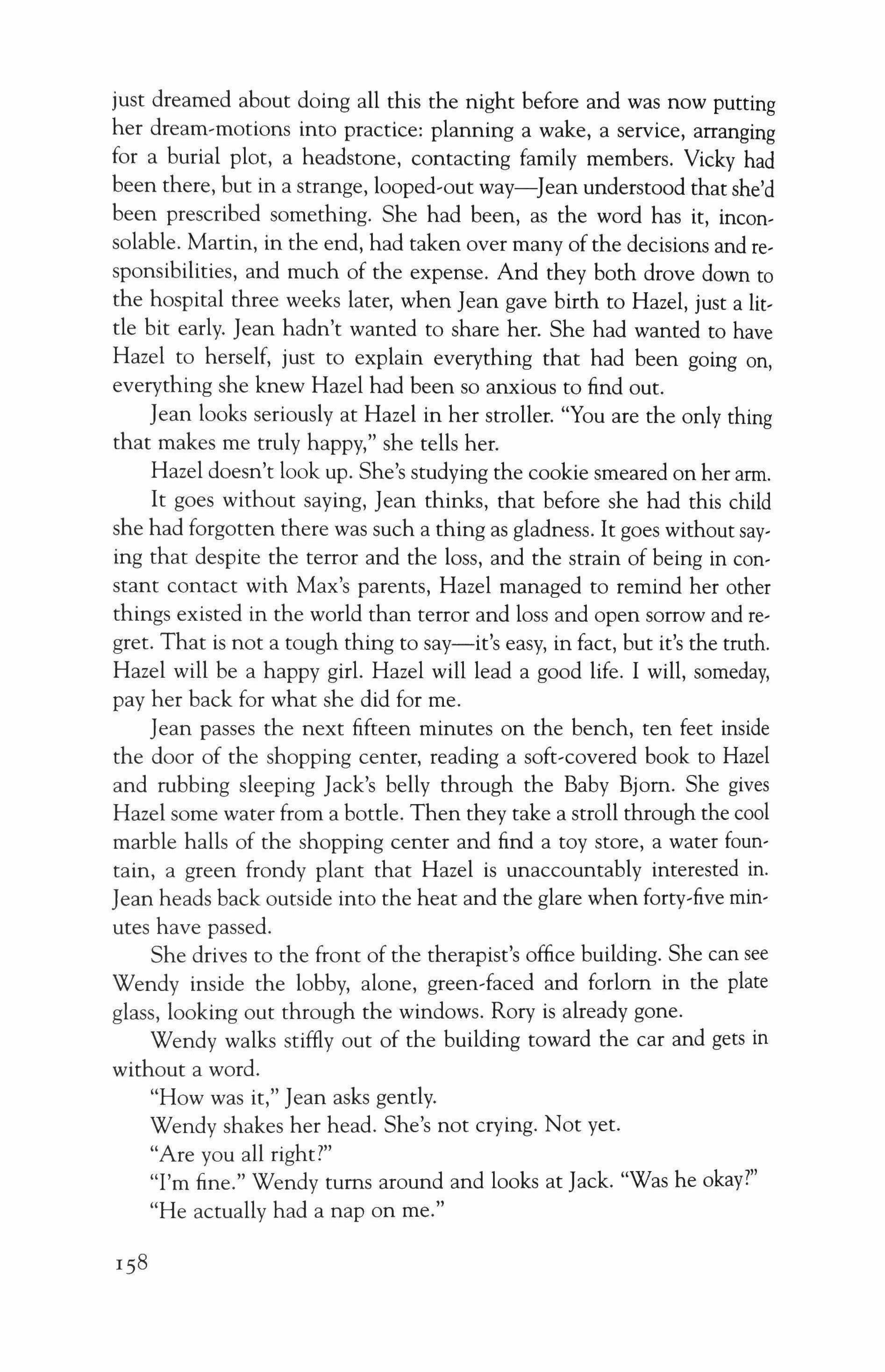
just dreamed about doing all this the night before and was now putting her dream-motions into practice: planning a wake, a service, arranging for a burial plot, a headstone, contacting family members. Vicky had been there, but in a strange, looped-out way-Jean understood that she'd been prescribed something. She had been, as the word has it, inconsolable. Martin, in the end, had taken over many of the decisions and responsibilities, and much of the expense. And they both drove down to the hospital three weeks later, when Jean gave birth to Hazel, just a little bit early. Jean hadn't wanted to share her. She had wanted to have Hazel to herself, just to explain everything that had been going on, everything she knew Hazel had been so anxious to find out.
Jean looks seriously at Hazel in her stroller. "You are the only thing that makes me truly happy," she tells her.
Hazel doesn't look up. She's studying the cookie smeared on her arm.
It goes without saying, Jean thinks, that before she had this child she had forgotten there was such a thing as gladness. It goes without saying that despite the terror and the loss, and the strain of being in constant contact with Max's parents, Hazel managed to remind her other things existed in the world than terror and loss and open sorrow and regret. That is not a tough thing to say-it's easy, in fact, but it's the truth. Hazel will be a happy girl. Hazel will lead a good life. I will, someday, pay her back for what she did for me.
Jean passes the next fifteen minutes on the bench, ten feet inside the door of the shopping center, reading a soft-covered book to Hazel and rubbing sleeping Jack's belly through the Baby Bjorn. She gives Hazel some water from a bottle. Then they take a stroll through the cool marble halls of the shopping center and find a toy store, a water fountain, a green frondy plant that Hazel is unaccountably interested in. Jean heads back outside into the heat and the glare when forty-five minutes have passed.
She drives to the front of the therapist's office building. She can see Wendy inside the lobby, alone, green-faced and forlorn in the plate glass, looking out through the windows. Rory is already gone.
Wendy walks stiffly out of the building toward the car and gets in without a word.
"How was it," Jean asks gently.
Wendy shakes her head. She's not crying. Not yet.
"Are you all right?"
"I'm fine." Wendy turns around and looks at Jack. "Was he okay?"
"He actually had a nap on me."
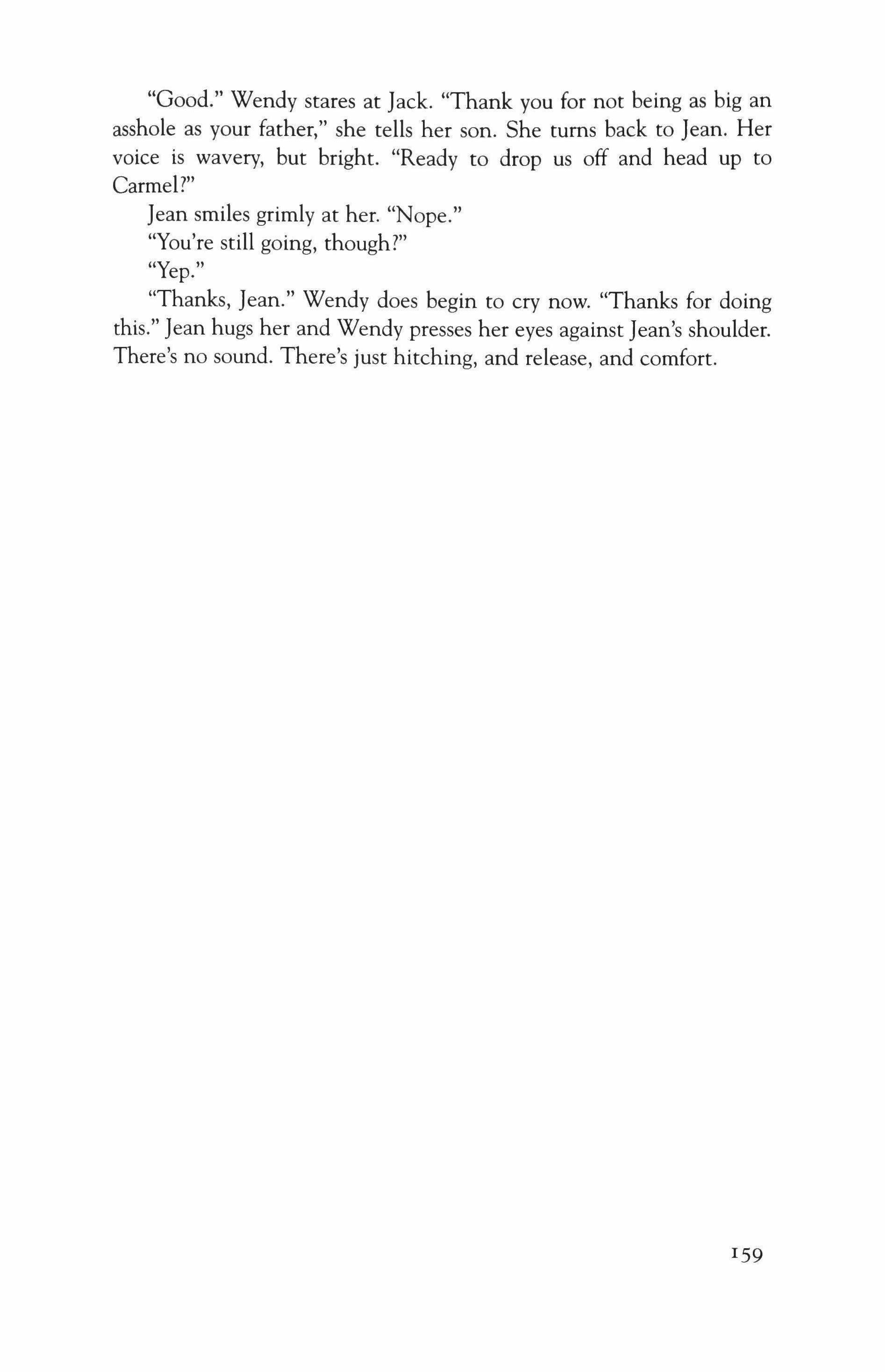
"Good." Wendy stares at Jack. "Thank you for not being as big an asshole as your father," she tells her son. She turns back to Jean. Her voice is wavery, but bright. "Ready to drop us off and head up to Carmel?"
Jean smiles grimly at her. "Nope."
"You're still going, though?" "Yep."
"Thanks, Jean." Wendy does begin to cry now. "Thanks for doing this." Jean hugs her and Wendy presses her eyes against Jean's shoulder. There's no sound. There's just hitching, and release, and comfort.
159
Anne Harding Woodworth
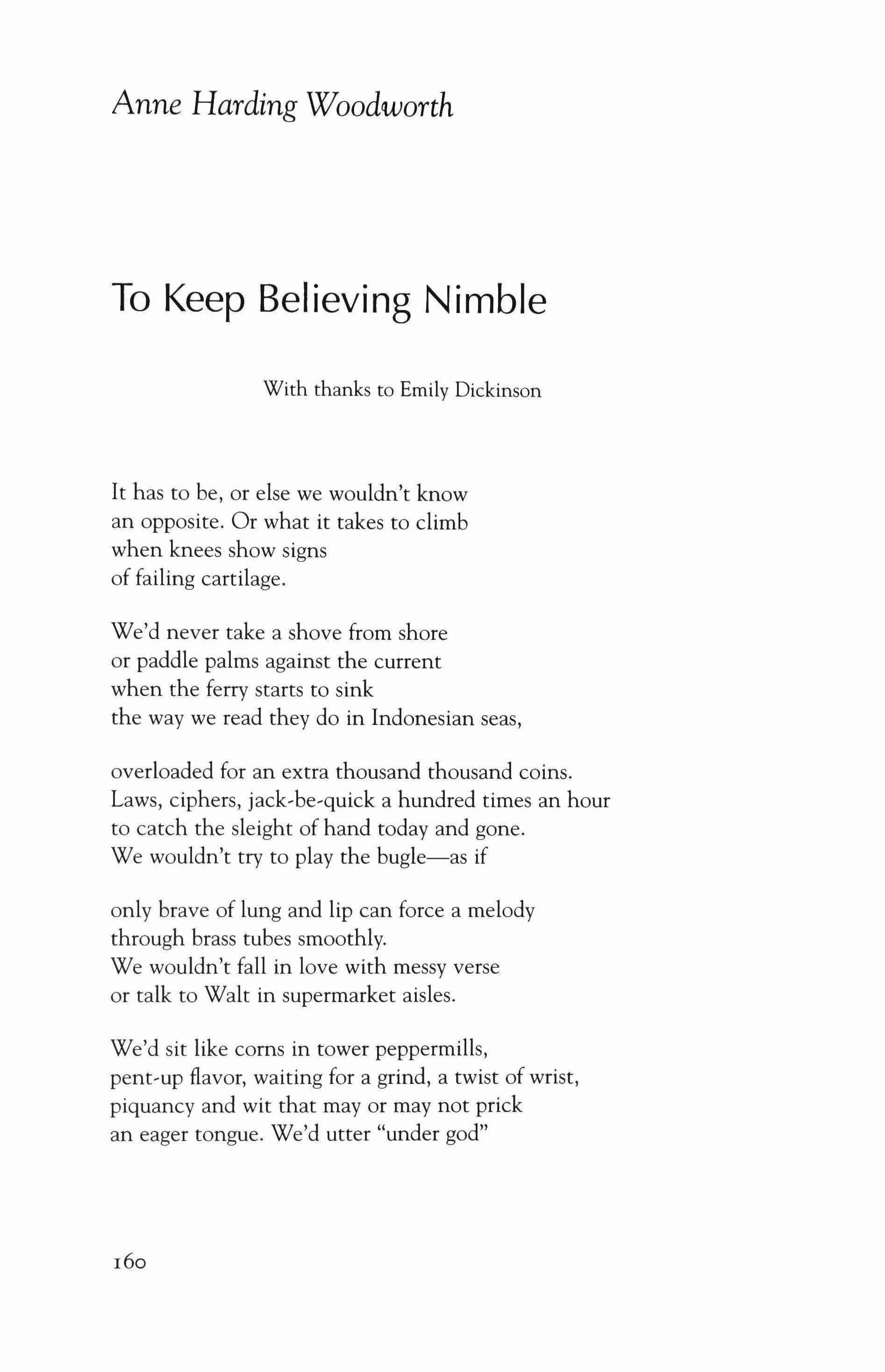
To Keep Believing Nimble
With thanks to Emily Dickinson
It has to be, or else we wouldn't know an opposite. Or what it takes to climb when knees show signs of failing cartilage.
We'd never take a shove from shore or paddle palms against the current when the ferry starts to sink the way we read they do in Indonesian seas,
overloaded for an extra thousand thousand coins. Laws, ciphers, jack-be-quick a hundred times an hour to catch the sleight of hand today and gone. We wouldn't try to play the bugle-as if only brave of lung and lip can force a melody through brass tubes smoothly. We wouldn't fall in love with messy verse or talk to Walt in supermarket aisles.
We'd sit like corns in tower peppermills, pent-up flavor, waiting for a grind, a twist of wrist, piquancy and wit that mayor may not prick an eager tongue. We'd utter "under god"
160

by rote and not retain a word of it. It has to be, or we would not believe our disbeliefs twelve hundred times a day and back, and do some calisthenics, three beats against a fourth, to count, to lift our heels and touch our toes.
Taps
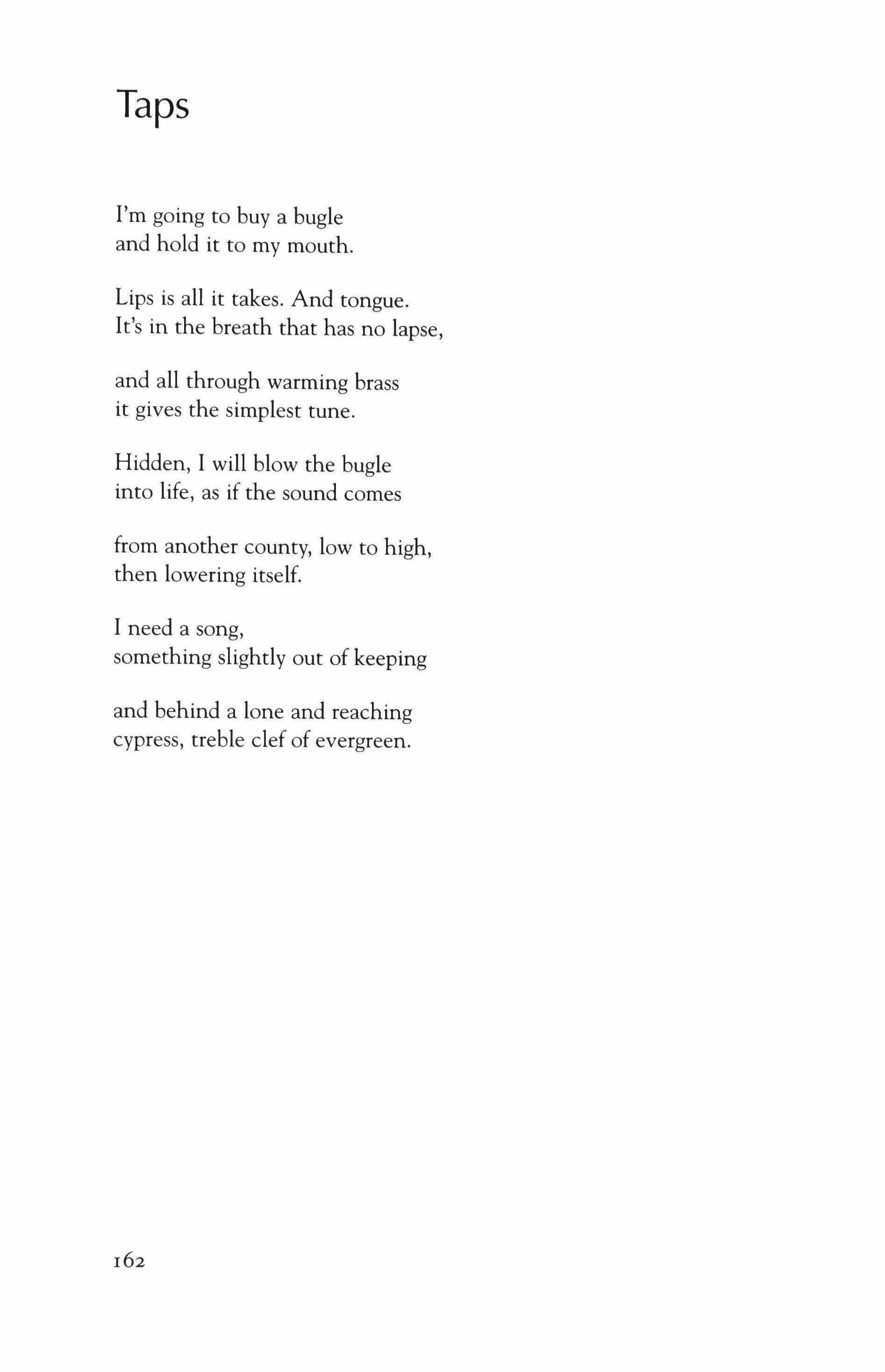
I'm going to buy a bugle and hold it to my mouth.
Lips is all it takes. And tongue. It's in the breath that has no lapse, and all through warming brass it gives the simplest tune.
Hidden, I will blow the bugle into life, as if the sound comes from another county, low to high, then lowering itself.
I need a song, something slightly out of keeping and behind a lone and reaching cypress, treble clef of evergreen.
Dabney Stuart Monk

He bends to the manuscript emerging under his pen, amorphous roseate
haze lifting from the gesture his fingers make, smoke from a magic lamp even older than the gnosis he is moved by, moves from, inditing, word by illuminate word, the truth hidden forever in the letters he so diligently sets down.
He's not transcribing belief, or the modes of belief. He's loosing their air into the air we breathe, trembling with the wonder incipient in an eyelid or the rind of a lime. He feels the fire and dolor in his golden capitals, his pen releasing blossoms, the flameless flowers of Edothe darker ages become a bursting ground, craters of mindfire, the running crowns of thought, essences rising above the water where the names bum.
Yucca Mountain

Give the plant itself a roothold and it will undo a mountain. Grows down, grows down. Spreads its excursions everywhere like thousand-thumbed chains. Is no respecter of stone. Shuns picks, deflects shovels, is immune to moles. Leaves no surface sign of its campaigns. A self-rhymed rummaging in the earth, a fastening, a deliberation.
You'd never guess, in summer when its white bells cluster on roadside cuts, rendering the air delicate above the spearedged spines of its leaves, how subversive, how replete its boring, how little water it needs to thrive, how immune it is.
Over the Ghost Dance Fault the mountain rises, a puny black spine hardly more than a dune among the ridges time has rifted up in the desert around it. The borer-another of Adam's needlestook only two years to tunnel through it, an old mole working in th'earth so fast and then the vertical shafts to the vaults for the spent stuff, giving go down a new meaning-yea, verily, giving deep meaning a new meaning, making the yucca's tubers seem mere whims in the sand.
Lovers of the wind dancing above, keeping the planet's time-a slipping of stone slow as a star's fade--carried all these years the image of one fault, their ceremonies tracing it into the air, releasing its crooked intuition into their own rhythmic webs,
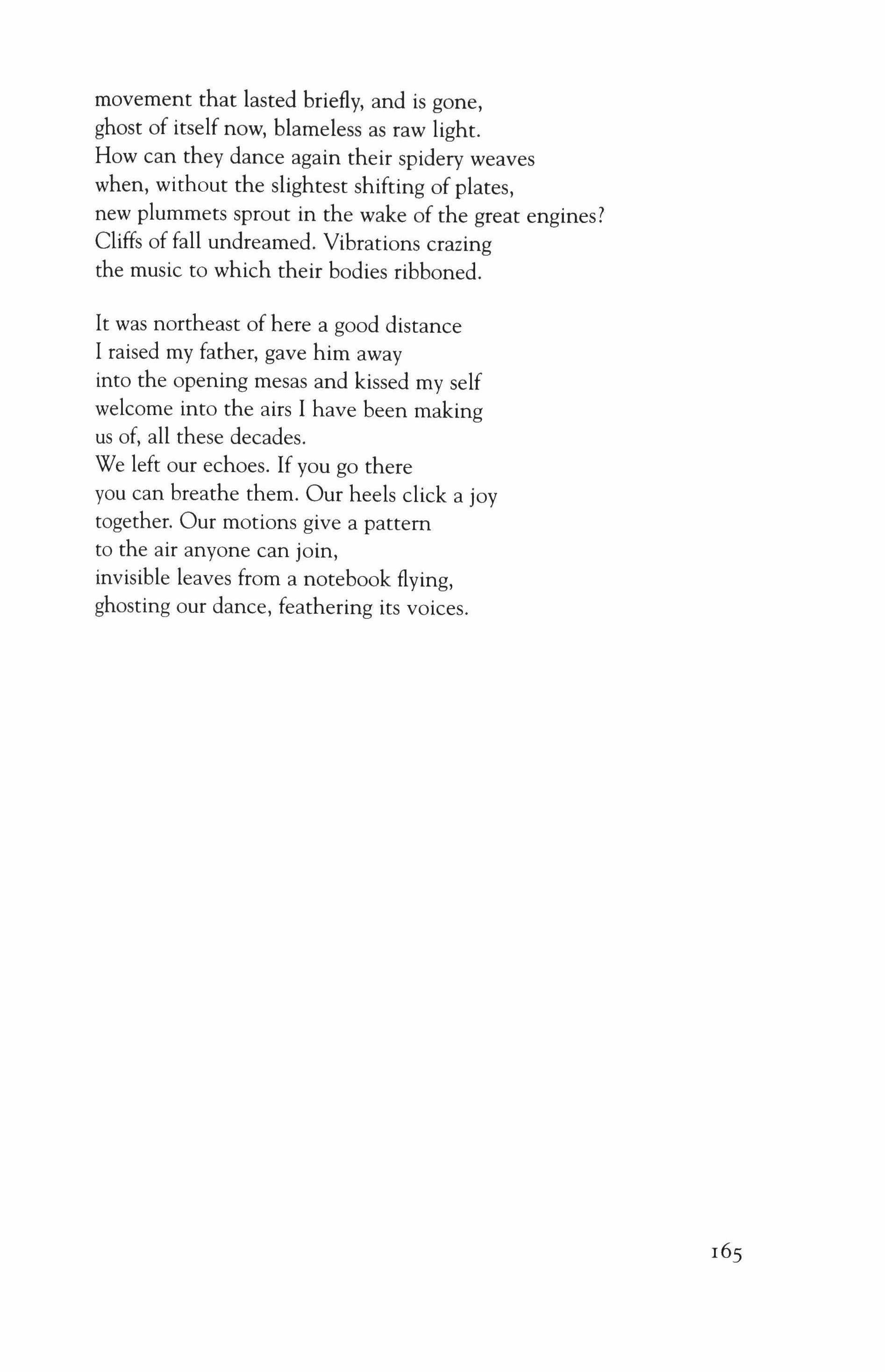
movement that lasted briefly, and is gone, ghost of itself now, blameless as raw light. How can they dance again their spidery weaves when, without the slightest shifting of plates, new plummets sprout in the wake of the great engines? Cliffs of fall undreamed. Vibrations crazing the music to which their bodies ribboned.
It was northeast of here a good distance I raised my father, gave him away into the opening mesas and kissed my self welcome into the airs I have been making us of, all these decades. We left our echoes. If you go there you can breathe them. Our heels click a joy together. Our motions give a pattern to the air anyone can join, invisible leaves from a notebook flying, ghosting our dance, feathering its voices.
Todd Boss

Constellations
You rare! You shooting star!
You comet! How can I connect my love to you, elusive dot-to-dot, reclusive rocket? All I do is chase you, even when we're face to face.
Loving you, I'm trying to tracein daylightconstellations.
166
The Deeper the Dictionary

the more complex the lexicon.
Take you and me. The sheets like pages, pulled on and tom off in a rage!
The long-dead languages! Ahbut the core of our love is six thousand sheets down!
And here we are, shamming counterpanes, when the mattress, the box-spring, coil with origins.
Don't Come Home

ranks first among the worst things someone you love can say. Not even the common I hate you does the damage Don't come home will do. You can live with I hate you, same as you live with the past. You abide it. I hate you in fact can be worth coming home to, like anything built to last. I hate you may be the mythical two in the bush the bird in the hand is worth, while Don't come home, by contrast, is that first bird, caught bird, scared to sing its song, percussive wings held fist-fast just so long.
168
John Tait
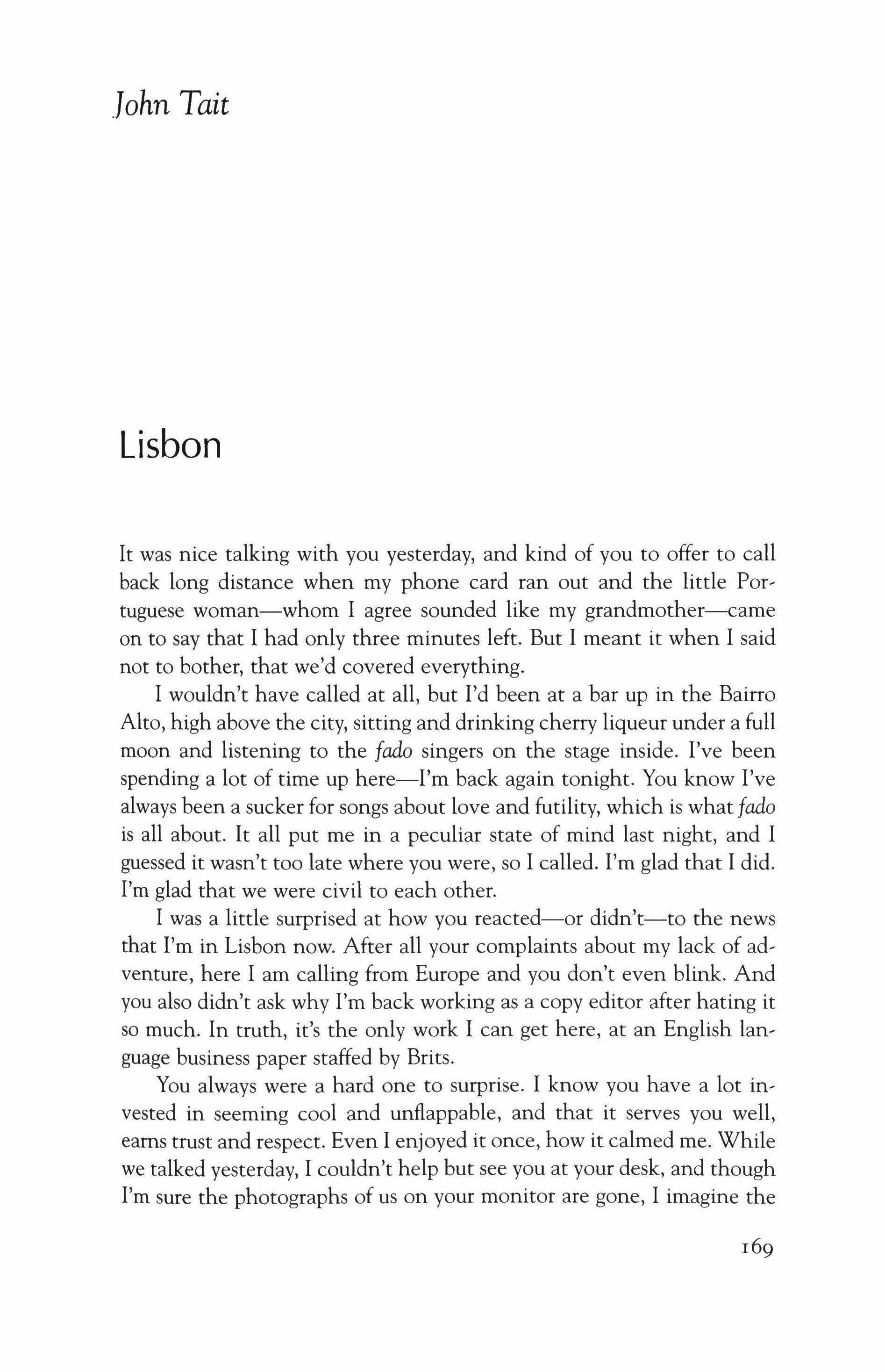
Lisbon
It was nice talking with you yesterday, and kind of you to offer to call back long distance when my phone card ran out and the little Portuguese woman-whom I agree sounded like my grandmother-came on to say that I had only three minutes left. But I meant it when I said not to bother, that we'd covered everything.
I wouldn't have called at all, but I'd been at a bar up in the Bairro Alto, high above the city, sitting and drinking cherry liqueur under a full moon and listening to the fado singers on the stage inside. I've been spending a lot of time up here-I'm back again tonight. You know I've always been a sucker for songs about love and futility, which is what fado is all about. It all put me in a peculiar state of mind last night, and I guessed it wasn't too late where you were, so I called. I'm glad that I did. I'm glad that we were civil to each other.
I was a little surprised at how you reacted-or didn't-to the news that I'm in Lisbon now. After all your complaints about my lack of adventure, here I am calling from Europe and you don't even blink. And you also didn't ask why I'm back working as a copy editor after hating it so much. In truth, it's the only work I can get here, at an English language business paper staffed by Brits.
You always were a hard one to surprise. I know you have a lot invested in seeming cool and unflappable, and that it serves you well, earns trust and respect. Even I enjoyed it once, how it calmed me. While we talked yesterday, I couldn't help but see you at your desk, and though I'm sure the photographs of us on your monitor are gone, I imagine the

rest is the same, the terraced stacks of notes, the driftwood paperweights on tidal charts and aerial photographs, your battered chair where you sit with your glasses up on your brow and your hair mussed, wearing that imperturbable expression, as if a rifle could go off and you'd barely notice.
You certainly took my new guy in stride yesterday. When I first alluded to him, I wasn't trying to be coy-I really didn't know how to broach the subject. But when I mentioned the weekend trip that "we" took to Sintra last month, you didn't ask who "we" was. And then I said how my birthday call from my mother wasn't as torturous this year because at least she can't complain anymore that I don't date Portuguese men, and you didn't even ask what that meant. When you finally said, "So, any new fellas on the scene?" and I said "yes" and acted surprised you'd asked (sorry), and you said, "I'm glad you've found something to make you happy, Janine," I apologize if I seemed cross. I wasn't sure if there was something backhanded in your response. But I'll give you the benefit of the doubt that your good wishes were sincere.
And I wish you the same luck finding someone new yourself. I only assume you haven't because if you had-face it-you would have found some way to mention her and to hint how much younger / prettier / less moody / more fun she was. And that only annoys me because I would never subject you to nauseating allusions about how wonderful my new guy is. Though he is wonderful.
I'm sure you'll find someone in time. I wasn't surprised to hear Claire Hendricks has been sniffing around, offering a shoulder to cry on, though you were careful to state what a "great friend" she's been. I know she's put in her time waiting, lurking. I remember that last oceanography department barbecue where she trailed in your wake like some dinghy you were towing, where she couldn't meet my gaze with those big, limpid eyes of hers.
Claire's problem is she's not your type. Maybe I wasn't either. Before me it was always those haughty, indifferent girls, the ones who carry their admirers, past and present, around like a string of pelts. I remember how quickly you were out the door when one of your exes summoned you to carry a dresser or fix a leak. I've always secretly wished-as I'm sure poor Claire has-that I could be a like those girls, cool and imperious. It seems so fun.
Still, maybe Claire will get her chance. And I wonder how being unconditionally adored will suit you. I imagine she'll fawn over you, bring coffee on a tray while you work, rub your shoulders and kiss the
170

back of your neck and all those things I know annoy you, until you start to realize that you were better off with someone a little less devoted. I hope for her sake she doesn't go any further, like I did early on, before I understood the sanctity of your work, that terrible afternoon I crept in your office wearing nothing but those thigh high leather boots I'd bought on the internet and waited until you came back from the toilet, drying your hands and looking at me with quiet chagrin. And I can tell you now that we're friends how that is perhaps the last expression a woman wants to see while standing in nothing but thigh high leather boots. A friendly tip.
Though my new guy Atilio isn't much like you, he is also a hard worker. He's back at my apartment now, studying for exams, and yes, I'm embarrassed to have a boyfriend still in school, though at least he's a grad student. I'd be with him now, but he likes heat when he studies and won't even tum on a fan, says he needs to bake facts into his brain. And so I'm out here instead.
I purposefully didn't tell you much about him last night, even wondered about telling you his name, because I knew you would (and did, in seconds) call him "Atilio the hun" and think that was hilarious. And I knew that the more I told you, the more snide jokes you'd make, cornmending me for following the middle-aged divorcee's playbook and dating some young European stud, asking if he has his green card application in yet. I can imagine the fun you'd have, if I'd let you. I'm not sure you realize, but despite your politics and your travels, you've always been a bit of a xenophobe, always had something cutting to say when I talked about my heritage-that time in the Portuguese Historical Center in San Diego when I started crying at the old photos, and I could see you hide a smirk when I pointed to that farmer who reminded me of my grandpa. I know you found it pretentious. Maybe it was, though I wonder how little it would have cost you to indulge me.
I'm sure you would have had lots to say about how Atilio and I first met, how, at the University bulletin board, he stopped me and asked in halting English if I was American and if I knew an English tutor. And because of how earnest and sweet he looked with his windbreaker and brush cut and small, round glasses, even though I was hunting for cheap furniture, I lied and said I'd been looking for help with Portuguese. Men here hit on American women automatically, out of some continental duty, but Atilio was different. We met for coffee, began our language exchange sessions in English, though the Portuguese half was the more
qI

fun, or at least we laughed more, because the little I know comes from my grandmother, and Atilio tells me I say things that sound old-Iadyish or odd. Grandma's Portuguese must have drifted into the idiosyncratic over the years, her own, private dialect with Grandpa. I remember the two of them huddled in the kitchen, the liquid sound of their whispering that always sounded like spitting. It used to annoy me, though these days it almost makes me jealous.
As things developed between Atilio and me, I mostly enjoyed how I never had to chase him the way I had to chase you, watching him hesitate, cogitate, squirm, like I was offering terms of some awful surrender. A few weeks ago we were sitting in a restaurant where the most debonair thirteen-year-old waiter was bringing us custard tarts, and I put my hand on Atilio's, and he said, "I really like you, Janine." And I told him I really liked him too. And it was that easy. And afterward we lay in a park for hours with his head in my lap, and though it made my leg fall asleep, I didn't care. And I laughed whenever I compared that to our torturous first weeks where you would act passionate then aloof, call me up then stand me up, sleep with me then tell me the next morning it was a mistake, that we'd overstepped our friendship, and then just watch me cry.
I paused for a moment only because my favorite fadista just sang inside and I wanted to hear. Her name is Elisabete, and she comes in off the street, wanders from club to club-they call that fado de ues. I love her: how she holds her black shawl across her shoulders, how straight she stands, and how in the final chorus of her final song her eyebrows arch and her eyes close then open again as if she's woken, as if she's been sleepwalking, amazed to find herself on stage singing about her broken heart. And I love how she bows then, collects her tips and heads out into the night.
I chose not to say much about the physical side of my new relationship yesterday for obvious reasons, though I would have had much to say if I'd wanted. It's quite active. Atilio is relentless, though not in the way I used to complain you were-when you were-with that aggrieved, hangdog persistence of yours. With Atilio it's joyful and exuberant, and there have been days we hardly leave bed, including a morning recently when he made me call in sick. I laughed, imagining how shocked I would have been ifyou'd ever done that, taking a whole day offwith me, insisting that I stay in bed, stripping me as fast as I could dress, hiding my curling iron and keys until I finally relented. I felt guilty at work the

next day as people brought me tea and asked if I was feeling better, and only I knew the reason I looked worn out, my eyes dark circled, was the workout Atilio had given me.
Don't worry. I'm not trying to make you jealous or to remind you of what you've lost. If you had expressed any curiosity about Atilio at all last night, I would have told you a few negative things too, so you knew I wasn't just bragging. I would have begun with how young he is, or seems, though it's only an eight-year difference. I would have complained how serious he is about certain subjects, politics and sports, and how like most Portuguese men he's stubborn; just like my father he gets this sour expression and says "nao" in that clipped way, jerking his head to the side. And there's that young man's vanity, how he preens like a sorority girl in the bathroom every morning and how even in bed there is occasionally something impersonal and self-concerned, how even when he's tender he seems to be watching himself, enjoying his own performance.
And there was last week, when I dragged him to a fado club, which he finds quaint and dull. Towards the end of the evening, a group of Spanish tourists hijacked the stage show and began singing. I felt so jealous of their shared songs, how they know the words and harmonies and the complicated syncopations to clap. Then one of the Spanish men got on stage with their young, blonde tour guide and danced a pas a doble, winding and spinning, standing poised, clashing then retreating. The man was in his fifties, balding, thin but with a little belly, completely nondescript. But he was probably the best dancer I've ever seen. His plump wife clapped with the rest, looking proud and bored, and she would rise and shout something admonishing when the dancing got too intense, and we would all laugh. The blond tour guide was young and cute and danced well, too. After the song ended, as the man kissed her cheek and headed back to his table, she was flushed and breathless, and her gaze lingered on him, and she looked almost startled.
I read an article recently about how women can determine a man's genetic suitability just by watching him dance, and so I didn't doubt, watching the young tour guide's expression, that she was just understanding that, given the chance, she would sleep with this man, twenty years her senior, in a heartbeat. That amused me until something else happened. An hour later, when Atilio and I were about to leave, the same Spanish man passed our table, probably on his way to the restrooms, and let his hand trail so that it brushed very softly down the length of my bare arm, and his eyes trailed too, just for a moment, and I was as startled as the guide. If I was a different woman, I would have
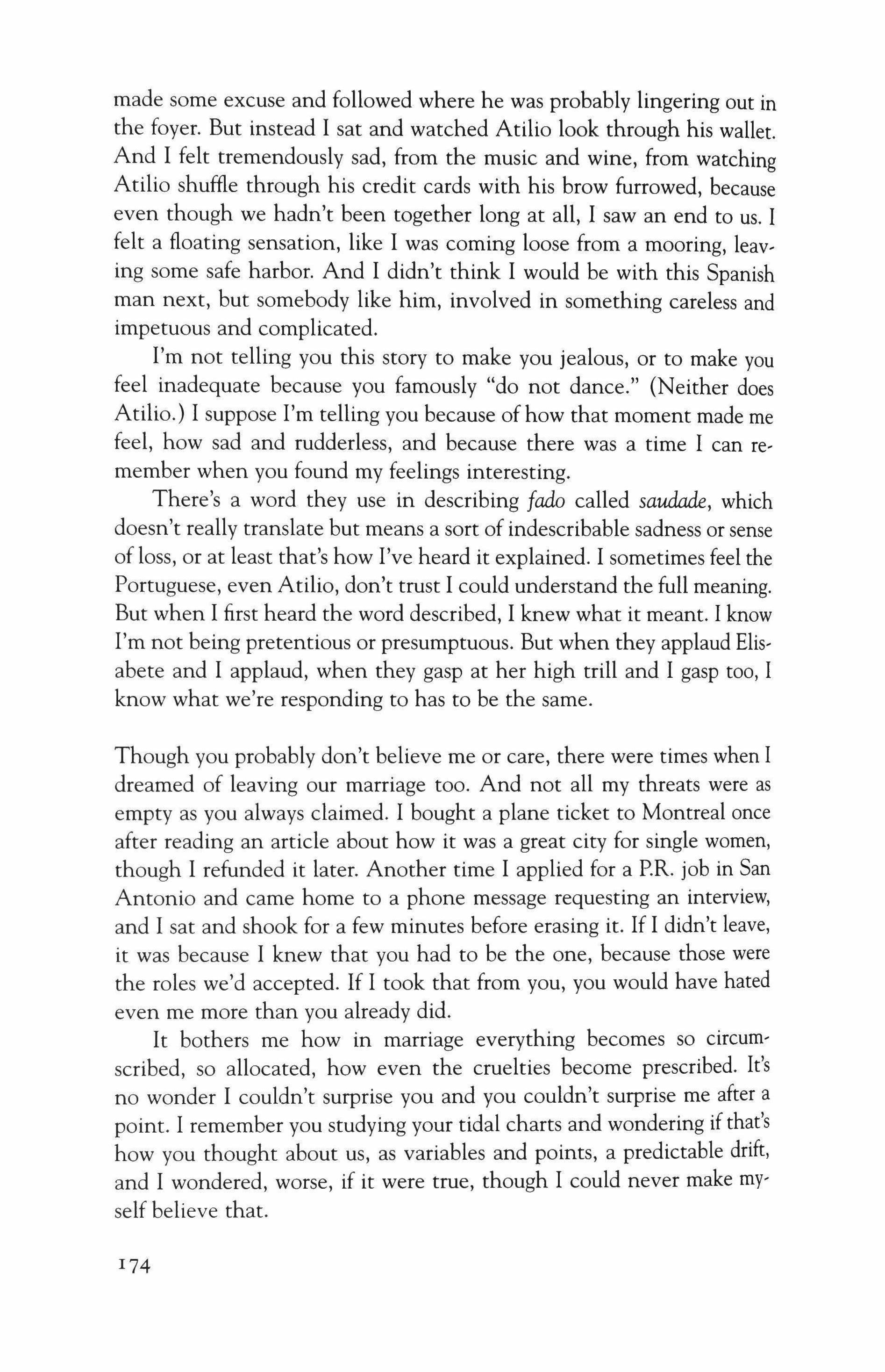
made some excuse and followed where he was probably lingering out in the foyer. But instead I sat and watched Atilio look through his wallet. And I felt tremendously sad, from the music and wine, from watching Atilio shuffle through his credit cards with his brow furrowed, because even though we hadn't been together long at all, I saw an end to us. I felt a floating sensation, like I was coming loose from a mooring, leaving some safe harbor. And I didn't think I would be with this Spanish man next, but somebody like him, involved in something careless and impetuous and complicated.
I'm not telling you this story to make you jealous, or to make you feel inadequate because you famously "do not dance." (Neither does Atilio.) I suppose I'm telling you because of how that moment made me feel, how sad and rudderless, and because there was a time I can remember when you found my feelings interesting.
There's a word they use in describing fado called saudade, which doesn't really translate but means a sort of indescribable sadness or sense of loss, or at least that's how I've heard it explained. I sometimes feel the Portuguese, even Atilio, don't trust I could understand the full meaning. But when I first heard the word described, I knew what it meant. I know I'm not being pretentious or presumptuous. But when they applaud Elisabete and I applaud, when they gasp at her high trill and I gasp too, I know what we're responding to has to be the same.
Though you probably don't believe me or care, there were times when I dreamed of leaving our marriage too. And not all my threats were as empty as you always claimed. I bought a plane ticket to Montreal once after reading an article about how it was a great city for single women, though I refunded it later. Another time I applied for a P.R. job in San Antonio and came home to a phone message requesting an interview, and I sat and shook for a few minutes before erasing it. If I didn't leave, it was because I knew that you had to be the one, because those were the roles we'd accepted. If I took that from you, you would have hated even me more than you already did.
It bothers me how in marriage everything becomes so circumscribed, so allocated, how even the cruelties become prescribed. It's no wonder I couldn't surprise you and you couldn't surprise me after a point. I remember you studying your tidal charts and wondering if that's how you thought about us, as variables and points, a predictable drift, and I wondered, worse, if it were true, though I could never make myself believe that.
174
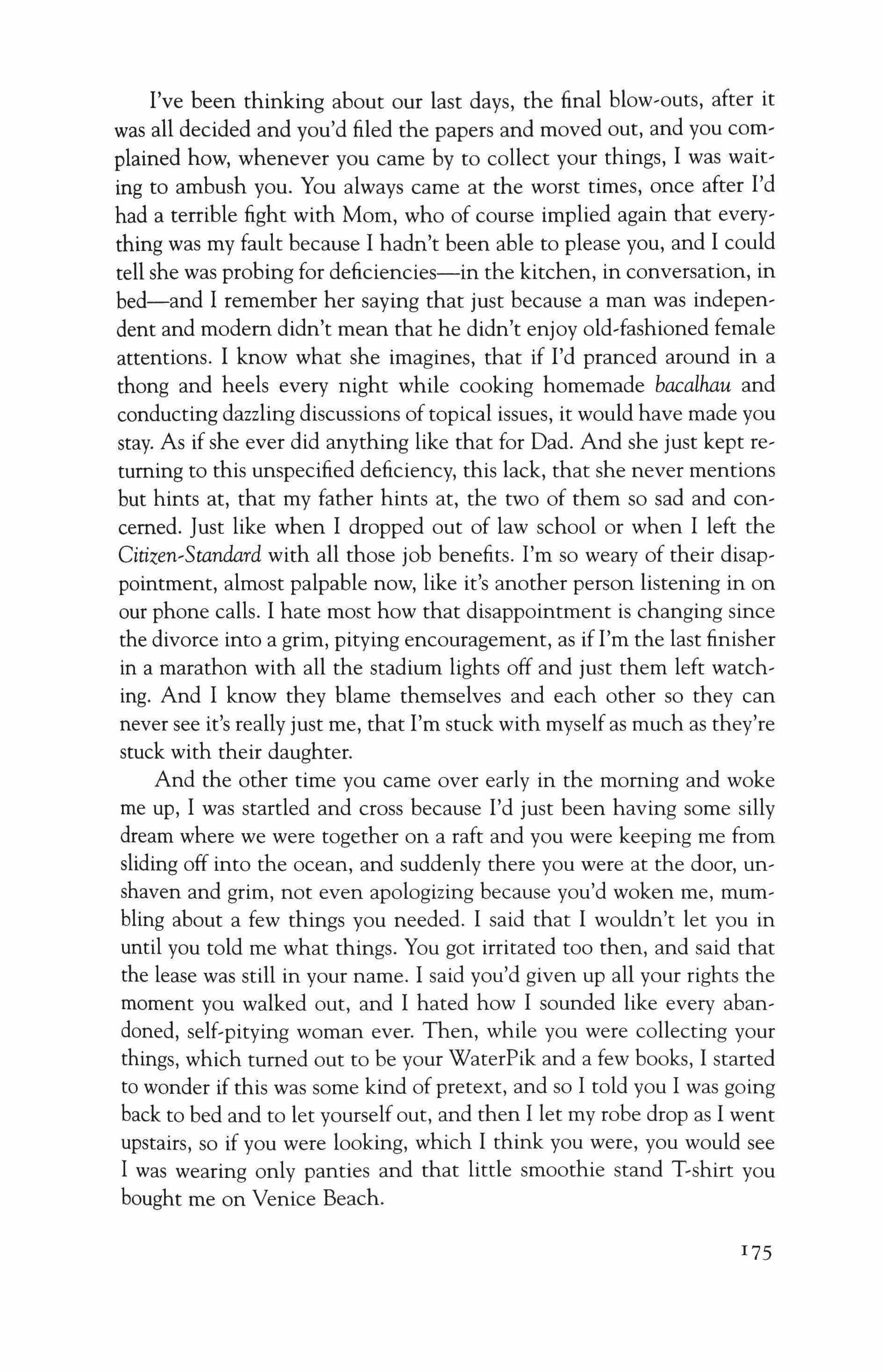
I've been thinking about our last days, the final blow-outs, after it was all decided and you'd filed the papers and moved out, and you complained how, whenever you came by to collect your things, I was waiting to ambush you. You always came at the worst times, once after I'd had a terrible fight with Mom, who of course implied again that everything was my fault because I hadn't been able to please you, and I could tell she was probing for deficiencies-in the kitchen, in conversation, in bed-and I remember her saying that just because a man was independent and modem didn't mean that he didn't enjoy old-fashioned female attentions. I know what she imagines, that if I'd pranced around in a thong and heels every night while cooking homemade bacalhau and conducting dazzling discussions oftopical issues, it would have made you stay. As if she ever did anything like that for Dad. And she just kept returning to this unspecified deficiency, this lack, that she never mentions but hints at, that my father hints at, the two of them so sad and concerned. Just like when I dropped out of law school or when I left the Citizen�Standard with all those job benefits. I'm so weary of their disappointment, almost palpable now, like it's another person listening in on our phone calls. I hate most how that disappointment is changing since the divorce into a grim, pitying encouragement, as if I'm the last finisher in a marathon with all the stadium lights off and just them left watching. And I know they blame themselves and each other so they can never see it's really just me, that I'm stuck with myself as much as they're stuck with their daughter.
And the other time you came over early in the morning and woke me up, I was startled and cross because I'd just been having some silly dream where we were together on a raft and you were keeping me from sliding off into the ocean, and suddenly there you were at the door, unshaven and grim, not even apologizing because you'd woken me, mumbling about a few things you needed. I said that I wouldn't let you in until you told me what things. You got irritated too then, and said that the lease was still in your name. I said you'd given up all your rights the moment you walked out, and I hated how I sounded like every abandoned, self-pitying woman ever. Then, while you were collecting your things, which turned out to be your WaterPik and a few books, I started to wonder if this was some kind of pretext, and so I told you I was going back to bed and to let yourself out, and then I let my robe drop as I went upstairs, so if you were looking, which I think you were, you would see I was wearing only panties and that little smoothie stand Tehirt you bought me on Venice Beach.
175
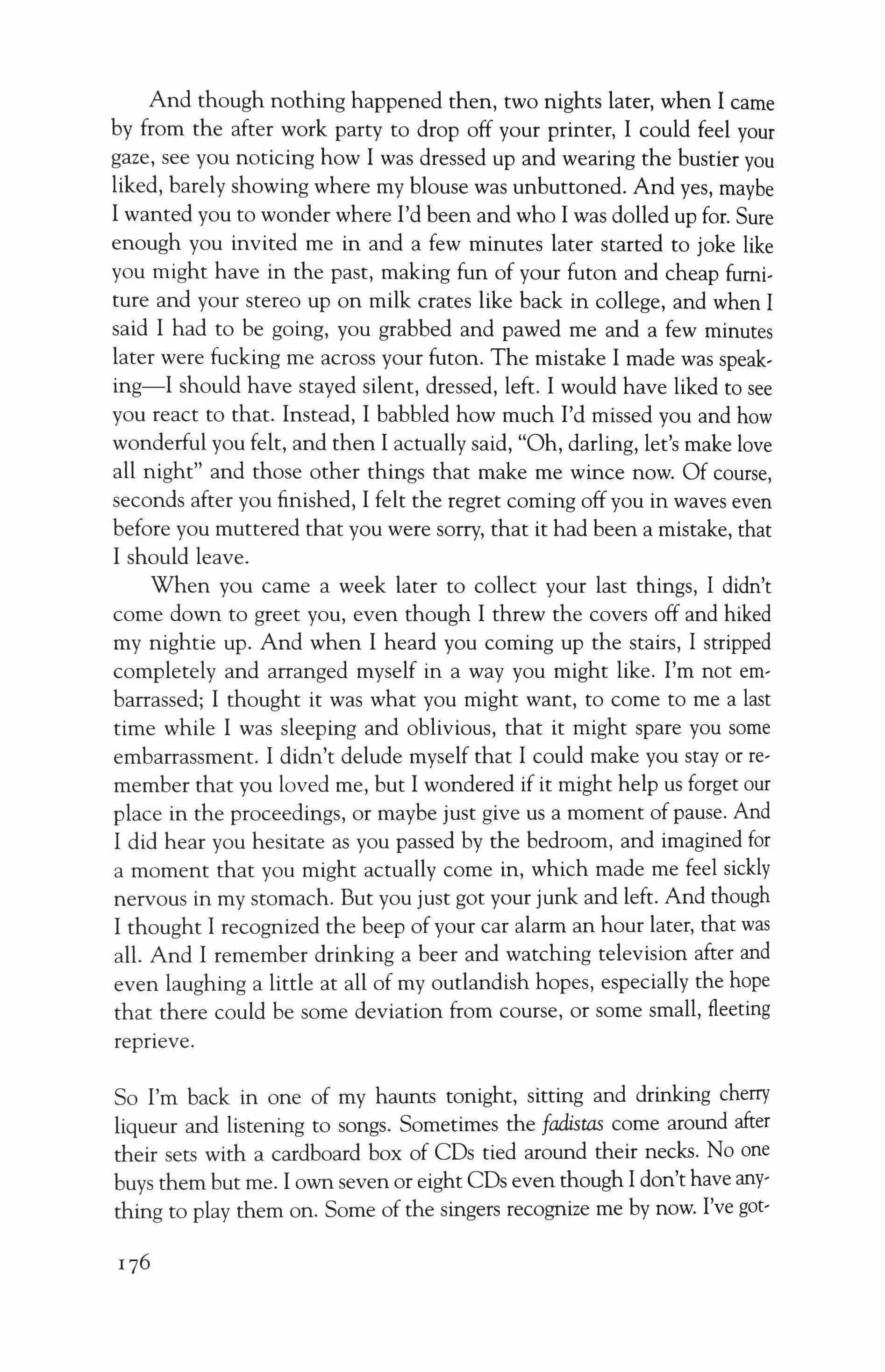
And though nothing happened then, two nights later, when I came by from the after work party to drop off your printer, I could feel your gaze, see you noticing how I was dressed up and wearing the bustier you liked, barely showing where my blouse was unbuttoned. And yes, maybe I wanted you to wonder where I'd been and who I was dolled up for. Sure enough you invited me in and a few minutes later started to joke like you might have in the past, making fun of your futon and cheap furniture and your stereo up on milk crates like back in college, and when I said I had to be going, you grabbed and pawed me and a few minutes later were fucking me across your futon. The mistake I made was speaking-I should have stayed silent, dressed, left. I would have liked to see you react to that. Instead, I babbled how much I'd missed you and how wonderful you felt, and then I actually said, "Oh, darling, let's make love all night" and those other things that make me wince now. Of course, seconds after you finished, I felt the regret coming off you in waves even before you muttered that you were sorry, that it had been a mistake, that I should leave.
When you came a week later to collect your last things, I didn't come down to greet you, even though I threw the covers off and hiked my nightie up. And when I heard you coming up the stairs, I stripped completely and arranged myself in a way you might like. I'm not embarrassed; I thought it was what you might want, to come to me a last time while I was sleeping and oblivious, that it might spare you some embarrassment. I didn't delude myself that I could make you stay or remember that you loved me, but I wondered if it might help us forget our place in the proceedings, or maybe just give us a moment of pause. And I did hear you hesitate as you passed by the bedroom, and imagined for a moment that you might actually come in, which made me feel sickly nervous in my stomach. But you just got your junk and left. And though I thought I recognized the beep of your car alarm an hour later, that was all. And I remember drinking a beer and watching television after and even laughing a little at all of my outlandish hopes, especially the hope that there could be some deviation from course, or some small, fleeting reprieve.
So I'm back in one of my haunts tonight, sitting and drinking cherry liqueur and listening to songs. Sometimes the fadistas come around after their sets with a cardboard box of CDs tied around their necks. No one buys them but me. I own seven or eight CDs even though I don't have anything to play them on. Some of the singers recognize me by now. I've got-
176
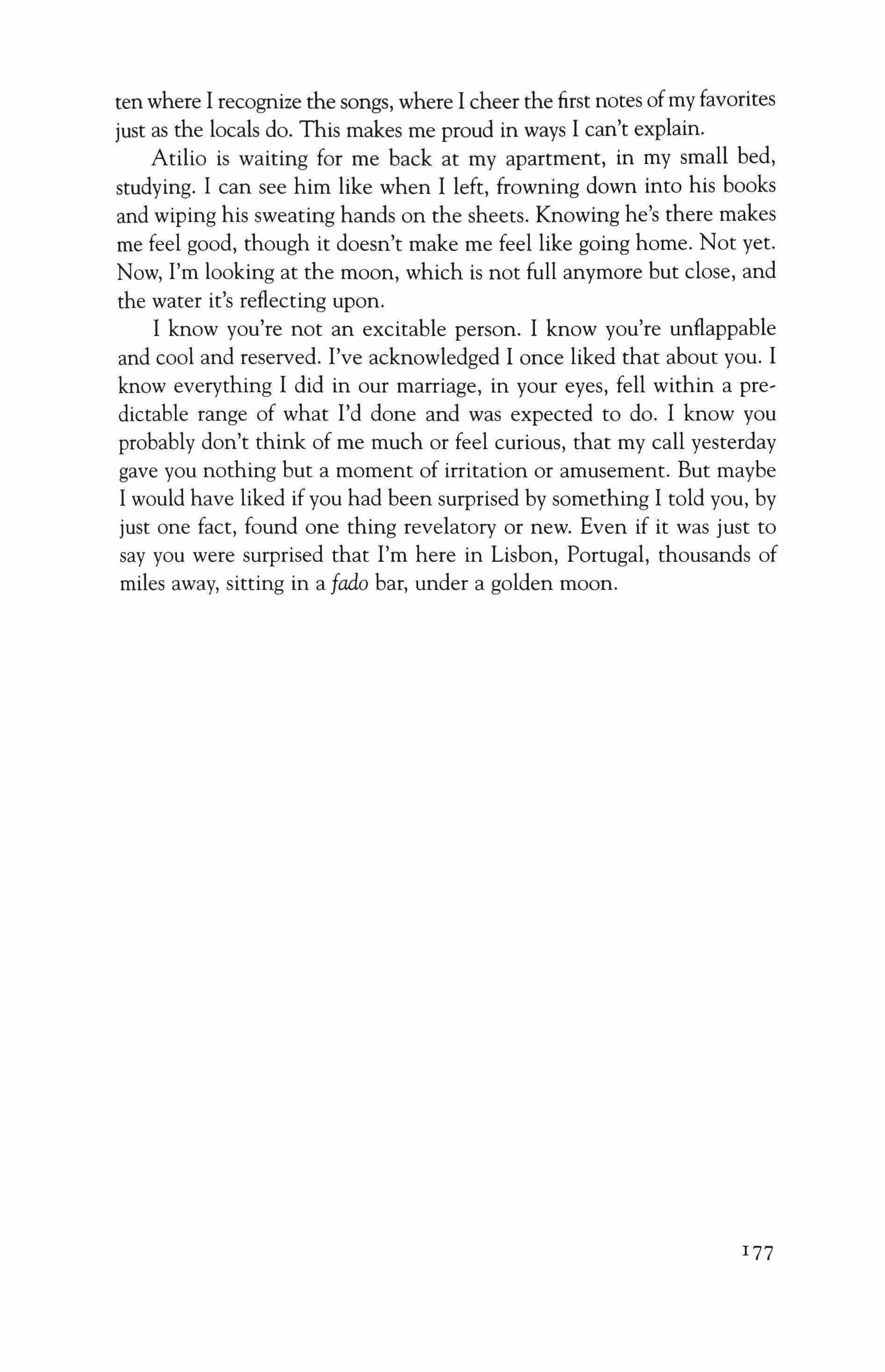
ten where I recognize the songs, where I cheer the first notes ofmy favorites just as the locals do. This makes me proud in ways I can't explain.
Atilio is waiting for me back at my apartment, in my small bed, studying. I can see him like when I left, frowning down into his books and wiping his sweating hands on the sheets. Knowing he's there makes me feel good, though it doesn't make me feel like going home. Not yet. Now, I'm looking at the moon, which is not full anymore but close, and the water it's reflecting upon.
I know you're not an excitable person. I know you're unflappable and cool and reserved. I've acknowledged I once liked that about you. I know everything I did in our marriage, in your eyes, fell within a pre, dictable range of what I'd done and was expected to do. I know you probably don't think of me much or feel curious, that my call yesterday gave you nothing but a moment of irritation or amusement. But maybe I would have liked if you had been surprised by something I told you, by just one fact, found one thing revelatory or new. Even if it was just to say you were surprised that I'm here in Lisbon, Portugal, thousands of miles away, sitting in a fado bar, under a golden moon.
David Milofsky
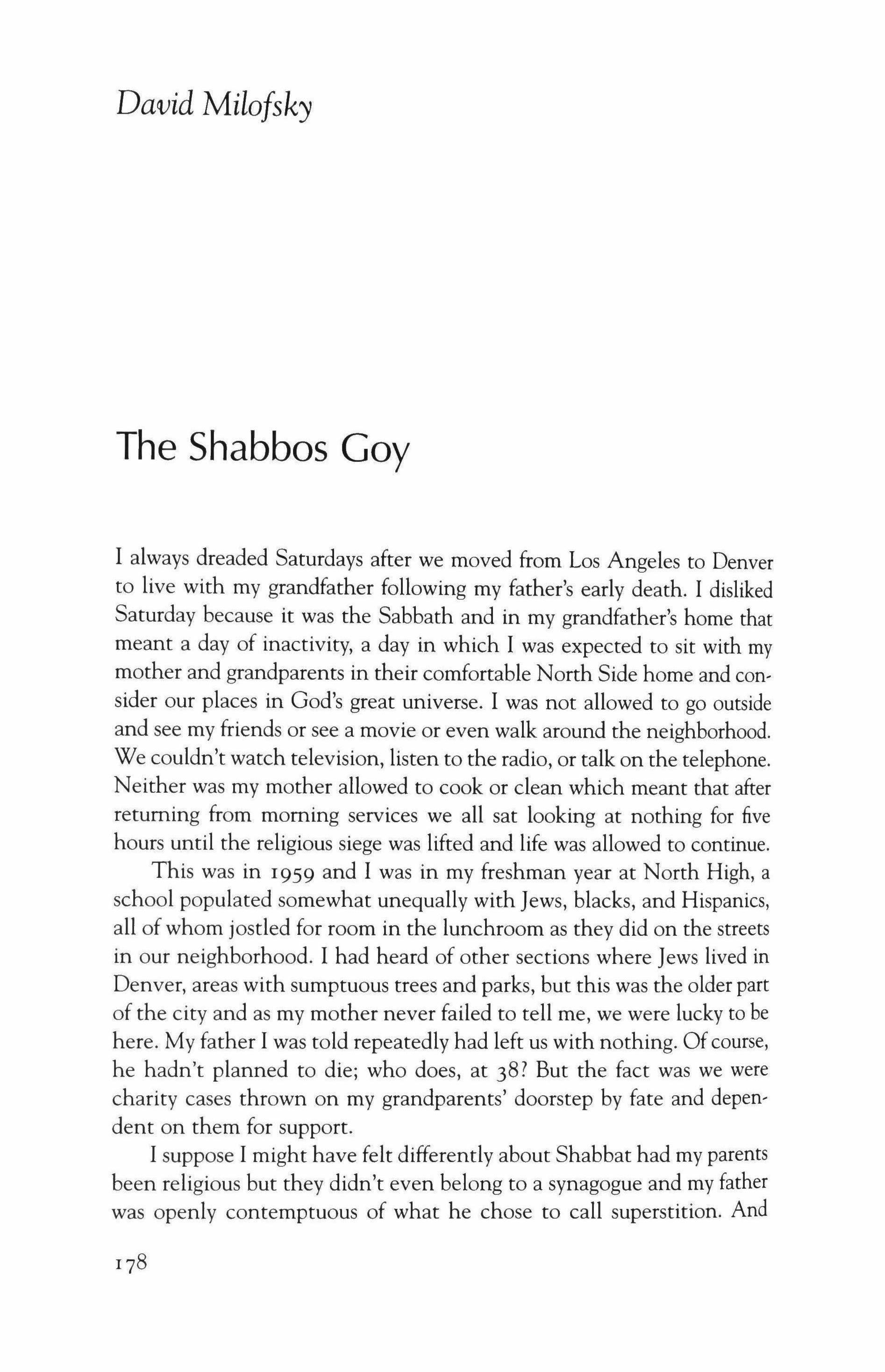
The Shabbos Goy
I always dreaded Saturdays after we moved from Los Angeles to Denver to live with my grandfather following my father's early death. I disliked Saturday because it was the Sabbath and in my grandfather's home that meant a day of inactivity, a day in which I was expected to sit with my mother and grandparents in their comfortable North Side home and consider our places in God's great universe. I was not allowed to go outside and see my friends or see a movie or even walk around the neighborhood. We couldn't watch television, listen to the radio, or talk on the telephone. Neither was my mother allowed to cook or clean which meant that after returning from morning services we all sat looking at nothing for five hours until the religious siege was lifted and life was allowed to continue.
This was in I959 and I was in my freshman year at North High, a school populated somewhat unequally with Jews, blacks, and Hispanics, all of whom jostled for room in the lunchroom as they did on the streets in our neighborhood. I had heard of other sections where Jews lived in Denver, areas with sumptuous trees and parks, but this was the older part of the city and as my mother never failed to tell me, we were lucky to be here. My father I was told repeatedly had left us with nothing. Of course, he hadn't planned to die; who does, at 38? But the fact was we were charity cases thrown on my grandparents' doorstep by fate and dependent on them for support.
I suppose I might have felt differently about Shabbat had my parents been religious but they didn't even belong to a synagogue and my father was openly contemptuous of what he chose to call superstition. And
178

while no one ever said anything about it directly, the idea that his illness and eventual death were somehow related to his lack of belief wasn't denied either. It was just out there, a possibility. I didn't know what I believed but having been through a major dislocation it struck me as stupid at the least to actually deny God's existence, so I trod the path of my maternal grandparents without complaint. I went to school, studied as hard as I needed to, and suffered Saturdays silently. Things could have been worse. I knew that now.
And yet, all this was about to change in dramatic ways and in the process alter the way I saw the world forever. Because no one in our house was allowed to function on the Sabbath and since in my grandfather's world this extended to ordinary household tasks such as turning on the oven or switching the lights on and off, an elderly man had been employed at the rate of $.50 an hour to come into our home and perform these chores. Such shabbas gays were not unheard of in the larger Jewish community but they were unusual in our neighborhood, so when Herman Kleinschmidt dropped dead of a heart attack, there was some concern about finding someone to take his place.
I was only vaguely aware of this at the time, though I remember hearing whispered conversations between my mother and her parents, which included the word "polska." This was explained the next Saturday when the door opened and a small blond girl of about my age entered our home. She bowed to my grandfather and then apparently as a result of a prior agreement, turned on the stove and adjusted the thermostat. Before leaving, she looked shyly in my direction, though whether her look expressed good humor or pity I couldn't say. It didn't matter. I was in love.
The girl was not unknown to me, though we'd never spoken. I even knew her name-Sonia Michulka. Nor was she really Polish, or at least I didn't think she was. She and her brother Peter had been introduced as new students at an assembly in school where the principal referred obliquely to the "recent troubles in Europe."
No one in our school knew about Hungarian freedom fighters, though the Jewish kids had been drilled to exhaustion in details of the Holocaust. Hungary was a different matter. If we thought at all about what was then called "The Iron Curtain," it was in a concrete way, as in a limitless extension of steel starting somewhere south of Finland and stretching down over Europe from the Baltic to Trieste. But these were just names and had little to do with the vision who now stood before us.
179
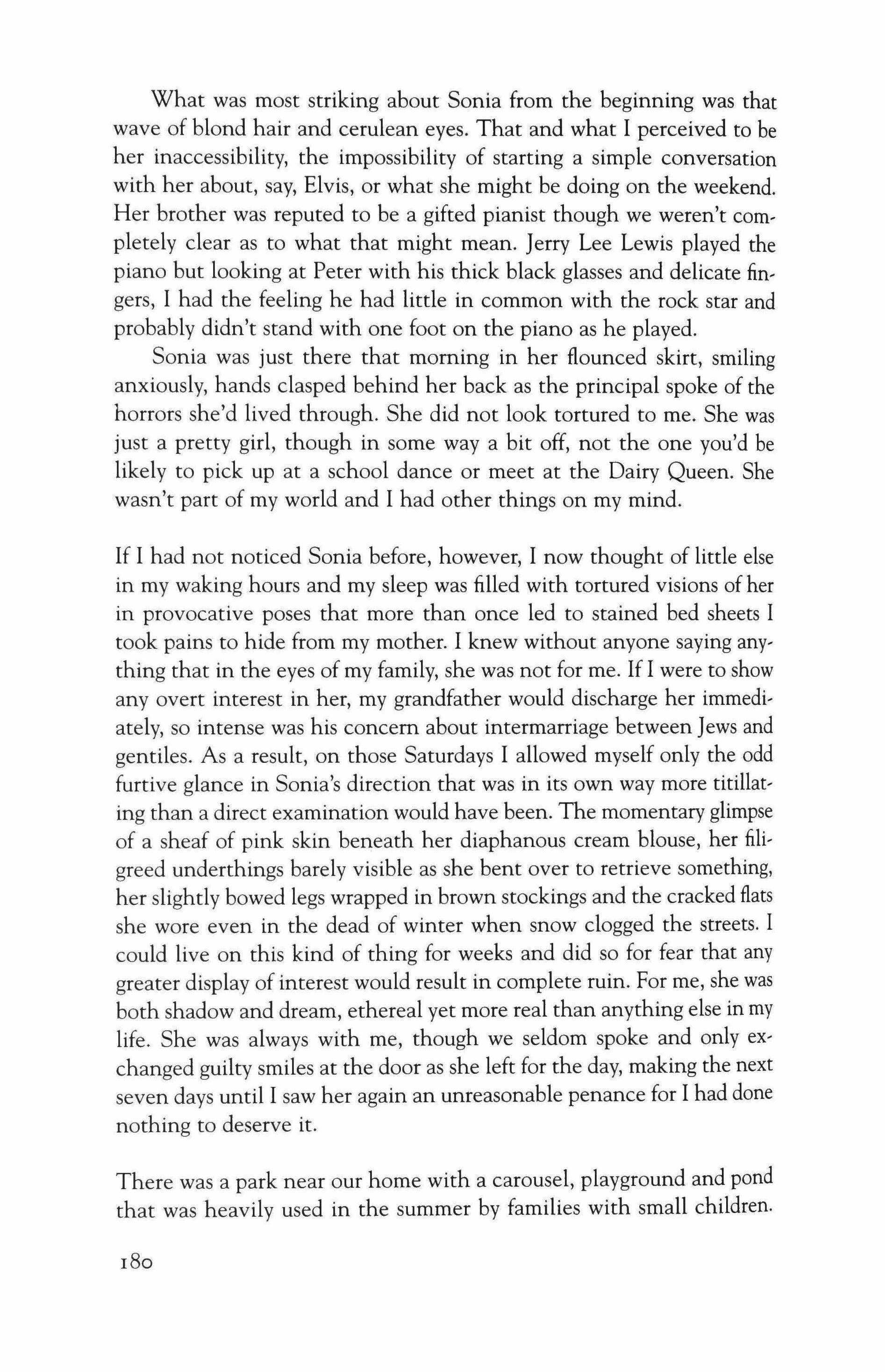
What was most striking about Sonia from the beginning was that wave of blond hair and cerulean eyes. That and what I perceived to be her inaccessibility, the impossibility of starting a simple conversation with her about, say, Elvis, or what she might be doing on the weekend. Her brother was reputed to be a gifted pianist though we weren't completely clear as to what that might mean. Jerry Lee Lewis played the piano but looking at Peter with his thick black glasses and delicate fingers, I had the feeling he had little in common with the rock star and probably didn't stand with one foot on the piano as he played.
Sonia was just there that morning in her flounced skirt, smiling anxiously, hands clasped behind her back as the principal spoke of the horrors she'd lived through. She did not look tortured to me. She was just a pretty girl, though in some way a bit off, not the one you'd be likely to pick up at a school dance or meet at the Dairy Queen. She wasn't part of my world and I had other things on my mind.
If I had not noticed Sonia before, however, I now thought of little else in my waking hours and my sleep was filled with tortured visions of her in provocative poses that more than once led to stained bed sheets I took pains to hide from my mother. I knew without anyone saying anything that in the eyes of my family, she was not for me. If I were to show any overt interest in her, my grandfather would discharge her immediately, so intense was his concern about intermarriage between Jews and gentiles. As a result, on those Saturdays I allowed myself only the odd furtive glance in Sonia's direction that was in its own way more titillating than a direct examination would have been. The momentary glimpse of a sheaf of pink skin beneath her diaphanous cream blouse, her filigreed underthings barely visible as she bent over to retrieve something, her slightly bowed legs wrapped in brown stockings and the cracked flats she wore even in the dead of winter when snow clogged the streets. I could live on this kind of thing for weeks and did so for fear that any greater display of interest would result in complete ruin. For me, she was both shadow and dream, ethereal yet more real than anything else in my life. She was always with me, though we seldom spoke and only exchanged guilty smiles at the door as she left for the day, making the next seven days untill saw her again an unreasonable penance for I had done nothing to deserve it.
There was a park near our home with a carousel, playground and pond that was heavily used in the summer by families with small children.
180

In the winter the carousel was deserted with only a lonely sign imploring children to "Be Nice" hanging over its entrance, which someone had forgotten to take down. The pond had become a skating rink with one side reserved for the organized brawling of hockey and the other open to skaters of all descriptions. Some turned pirouettes on the ice while others circled the pond serenely, bent over their skates as if they were studying their toes, with arms crossed behind their backs.
Having grown up in Southern California, winter sports were both foreign and exotic to me, so when the few friends I had left on skiing excursions, I would sometimes retreat to the park where I bought hot chocolate at the warming booth and watched the skaters. It was on one of these visits that I saw Sonia, face encircled by a pink ruff with matching mittens, tracing school figures one afternoon near dusk.
She didn't see me at first, occupied as she was in some complicated maneuver that involved backing and spinning in the air, but eventually she noticed me watching and skated over. We had never actually spoken before, but now she was smiling broadly and took me by both hands and shook them. "Well, Dan," she said. Then again, "Mr. Dan, a skater you are too?"
I was going to protest that I had never been on skates in my life and came only for the chocolate but seeing her there in short skirt and tights, the pink ruff accentuating her full red cheeks, I changed my mind. "I'm learning," I said quickly, though the process had yet to begin. "I'm going to take some lessons."
"Ach," she said, and looked me up and down critically. "I'll teach then."
And so it started. I took skating lessons at the pond from Sonia two or three times a week and though I mentioned the identity of my teacher to no one, my enthusiasm was obvious and my family approved. "You've got some color," my grandfather said when I returned one night. And the next week I found a new pair of skates in my room without my having asked for them.
Often in the afternoon, rather than going home after school, I would trail down Federal Boulevard past the s&Dime, the newsstand and grocery store, to stop in at my grandfather's clothing store where I'd stay until closing time, playing checkers in the back room or talking to the few customers who came in. Then we'd walk back home together, perhaps stopping on the way to buy some licorice.

Given the paucity of his clientele, it was always a mystery to me how my grandfather provided for all of us, but if he felt any anxiety on this account he never mentioned it. He had originally found work as a custom tailor before the war, but there wasn't much call for tailored clothing in North Denver, so while he had the odd small job, altering a man's pants or letting out a seam in a woman's dress, he had slowly become a haberdasher, selling lines of clothes vastly inferior to those he had once made himself for young Jewish men who worked downtown in the big buildings on Seventeenth Street in the financial district.
"Schmatte," he would say disdainfully, fingering the lapels of a jacket hanging in his store. A rag. "But who cares anymore? Still, a man has to live Daniel."
It was obvious my grandfather regretted the decline in values, but he didn't feel humiliated by the state of things because he'd done nothing to create them, just as he'd had nothing to do with the influx of Mexicans in Denver or the subsequent rise in crime in our neighborhood. He was neither bitter nor angry. He saw things as they were without feeling personally affronted by them. If his business wasn't what it had once been, it was nevertheless enough to provide for his family and that was all that mattered. The store was warm and comfortable on those long winter afternoons and there was a phonograph in the backroom along with a stack of ancient Ring magazines. My grandfather who wouldn't swat a troublesome fly had an unlikely fascination with boxing and an encyclopedic knowledge of the sport.
"Stanley Ketchell," he'd say. "Now there was a fighter, Daniel. None of these boys today could get in the ring with him. Or Gentleman Jim Corbett. Never see a fighter like that again."
And I, never having heard of Ketchell or Corbett or Jack Johnson or any of the other fighters he mentioned, listened entranced as the air outside turned blue and the streetlights came on in the city. On one or two magic nights we ventured further into Denver, visiting the Auditorium to see local fighters compete, but my grandfather seemed to actually prefer talking about the long-ago artists he remembered from his youth to seeing anyone who might actually be competing today.
What I'm trying to suggest here is that my grandfather was a hamish guy, comfortable with the way his life had gone, not big on regrets, and accepting of others and the world in general. I came to feel this was a gift, something worth learning about life, though I was never very successful at doing so myself. * * *

I was never going to be much of a skater. I had weak ankles and tended to lean so far forward out of fear of falling that I could never work up much momentum on the ice. Double axles and camels were out of the question; staying on my feet was my goal. Sonia must have known this but she was wonderfully patient and my lessons allowed me to be near her, which made this otherwise frustrating experience something to look forward to.
The pond was long and thin and lit around the warming shack, but at the other end of the ice there was less illumination and as a result fewer skaters. It became my goal to lure Sonia down there, especially since I had noticed there was another much smaller equipment shack that I wanted to investigate. Sonia was more cautious, however. "What if someone sees us?" she asked.
"Then they will," I responded with more bravado than I really felt. "What's wrong with exploring?"
"Oh, Dan, you are so brave," Sonia said, laughing.
But she followed, skating circles around me as I made my dogged way down the ice. The equipment shack was unlocked and though there were some boards and signs inside, there was room for us to slip in as well and I was surprised and pleased by Sonia's willingness to do so. In the close darkness of that little room we held each other for the first time, trembling from excitement and the cold as my hands tentatively explored her body, first her breasts, then her hips and legs. All the while she laughed softly in my ear, and I imagined it was out of pleasure.
When we kissed, I was again surprised both by her eagerness and skill as her tongue explored my mouth expertly, bringing me alive in ways I hadn't known before. My previous experience consisted of kissing games like "Post Office" and "Seven Minutes in Heaven" and there had been few enough of those. But fortunately sophistication didn't seem to be called for, at least on my part.
"Oh, Dan," Sonia said, and reached down to take me out of my pants. "You are strong. Very strong." I had never heard an erection spoken of in this way before but it filled me with an unreasonable pride even though under her prodding the moment was almost instantly over leaving in its wake a disconsolate feeling of failure. Sonia patted my crotch and kissed me lightly on the cheek and then she was gone, out the door and skating back toward the lighted area as I labored to put myself back together.
That was what the winter was like that year. We would meet once or twice a week, skate for a while and then visit the equipment house where we would fondle each other, more for my satisfaction than hers, though I became more skilled as time went on. Other than that, we
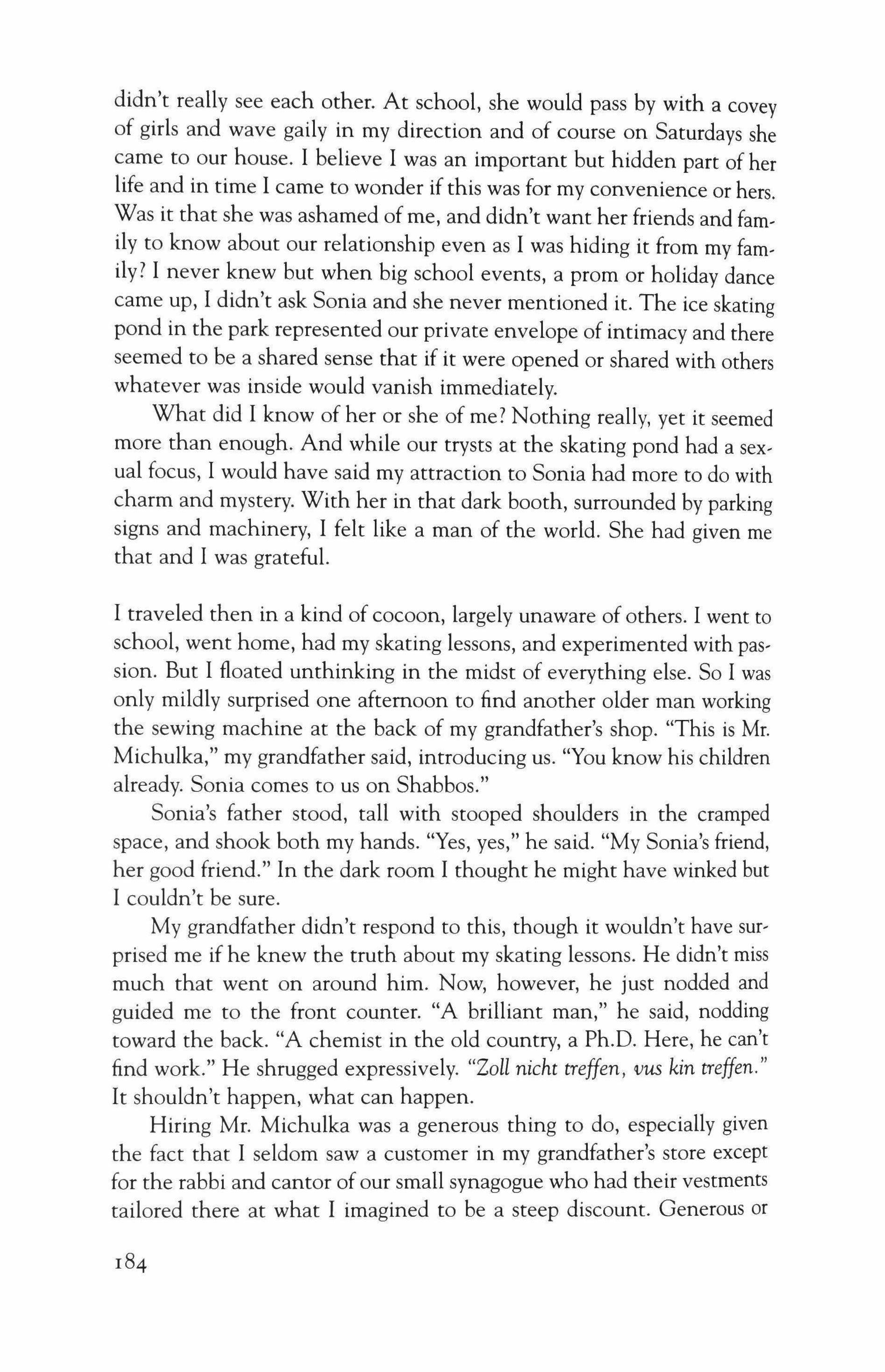
didn't really see each other. At school, she would pass by with a covey of girls and wave gaily in my direction and of course on Saturdays she came to our house. I believe I was an important but hidden part of her life and in time I came to wonder if this was for my convenience or hers. Was it that she was ashamed of me, and didn't want her friends and family to know about our relationship even as I was hiding it from my family? I never knew but when big school events, a prom or holiday dance came up, I didn't ask Sonia and she never mentioned it. The ice skating pond in the park represented our private envelope of intimacy and there seemed to be a shared sense that if it were opened or shared with others whatever was inside would vanish immediately.
What did I know of her or she of me? Nothing really, yet it seemed more than enough. And while our trysts at the skating pond had a sexual focus, I would have said my attraction to Sonia had more to do with charm and mystery. With her in that dark booth, surrounded by parking signs and machinery, I felt like a man of the world. She had given me that and I was grateful.
I traveled then in a kind of cocoon, largely unaware of others. I went to school, went home, had my skating lessons, and experimented with passion. But I floated unthinking in the midst of everything else. So I was only mildly surprised one afternoon to find another older man working the sewing machine at the back of my grandfather's shop. "This is Mr. Michulka," my grandfather said, introducing us. "You know his children already. Sonia comes to us on Shabbos."
Sonia's father stood, tall with stooped shoulders in the cramped space, and shook both my hands. "Yes, yes," he said. "My Sonia's friend, her good friend." In the dark room I thought he might have winked but I couldn't be sure.
My grandfather didn't respond to this, though it wouldn't have surprised me if he knew the truth about my skating lessons. He didn't miss much that went on around him. Now, however, he just nodded and guided me to the front counter. "A brilliant man," he said, nodding toward the back. "A chemist in the old country, a Ph.D. Here, he can't find work." He shrugged expressively. "Zoll nicht treffen, vus kin treffen." It shouldn't happen, what can happen.
Hiring Mr. Michulka was a generous thing to do, especially given the fact that I seldom saw a customer in my grandfather's store except for the rabbi and cantor of our small synagogue who had their vestments tailored there at what I imagined to be a steep discount. Generous or

not, however, it seemed the world was closing in ominously around me. My girlfriend was our shabbos goy and her father was working in my grandfather's shop. What had previously felt like a private obsession was close to becoming an open secret. Accepting as my grandfather was of most things, I knew there would be no genial allowance for that.
Sonia seemed to share none of my anxiety as we sat close to each other in the warming booth the next afternoon, hot chocolate in our gloved hands and the smell of wet wool in the air. Her lips were red and round and asked to be kissed. Her blue eyes wrinkled in mischievous amusement at my discomfort. Had I been more experienced I might have understood that her family had been through worse in their escape from Hungary, that she had experienced real terror in her life. But in that place, at that time, it seemed that nothing could be more disastrous than having our secret love revealed. "Your Papa not like me?" Sonia asked now, smiling again.
She called my grandfather Papa, not caring for the distinctions between generations, and it seemed apt since I had no father. I shifted in my seat uncomfortable with the truth. For my grandfather, the most gracious and generous of men, knew everyone in our small neighborhood without having one gentile friend. Did he like or dislike them? For him, I suspected, gentiles did not even exist on that axis. "It's not that," I said.
Sonia nodded. Her blond ponytail was bound in a small red kerchief. I thought she was inexpressively lovely and on the spot began plotting our escape together. "Then what ?"
It was an entirely reasonable question since we had done nothing wrong, save for a few kisses, some transient touching, the casual hug before parting. I knew, of course, this would be more than enough for my family. They would say things always started in such a way and as far as that went they would be right. Without anyone saying so directly, an ancient fear that voicing something made it more likely to occur, what they worried about where I was concerned was intermarriage and as a result the destruction of the race. In their minds this was what had taken my mother away in the first place and probably led to my father's early death and consequent abandonment of us. God works in mysterious ways, the rabbi intoned from the bima, though it seemed to me that the punishment should fit the crime. "Nothing, I said now. "Forget it."
Sonia's eyes crossed briefly in puzzlement or irritation. Then she said, "Okay." And as far as I know she did forget it. We went out on the ice again and then to the far reaches of the lagoon, where neither lights nor the other skaters could reach us. She let me lean her against a tree
185

and then run my hands beneath her sweater and cup her breasts. "Oh, Danny," she giggled. "Your hands are cold."
"But my heart is warm," I replied, emboldened by lust.
She laughed and then she surprised me by reaching down to my crotch and palpating my groin. "Not just heart," she said and then she laughed again.
Things happened quickly after that, as if by passing over an imaginary sexual boundary, I had set off some kind of interracial signal that could not be ignored.
The next Monday I was summoned to the rabbi's study for a talk. He was an old man with an accent so thick I had trouble understanding him. He radiated solemnity and the legend was that he had spent time in a concentration camp, though he could have avoided it because he had chances to leave Galicia. He insisted on waiting until all ofhis flock had left and in the end it turned out he waited too long.
My grandfather sat silently in the comer as the rabbi spoke softly about the evils of interfaith dating. No one mentioned Sonia but when my grandfather and I walked home afterwards there was no stop at the candy store for licorice.
On the following Saturday, it was not Sonia but her father who appeared at our house to adjust the range and thermostat and when I went to the park with my skates, she never appeared, though I waited and scanned the horizon hopefully with each new arrival.
We never spoke again. If I saw her in the hall at school, she would wiggle her fingers in greeting and then tum to giggle with her friends. I can't say I was broken-hearted, however. The truth was I was grateful to Sonia for having, if only briefly, raised the shroud in which I had been living, for allowing me to breathe and laugh again. I couldn't really say that she had been my girlfriend that we had had what in the future I would call a relationship. But we had known each other intimately and intimacy was always valuable. Over time, however, she came to seem less real and more ephemeral, especially once high school was over and we went different ways. In fact, in years to come I wondered fancifully if she could have been a dybbuk, an apparition, though one with no evil intentions, and that I had actually imagined everything, from her blond presence in our home, to the fleeting touch of her lips and the round warmth of her breasts in a dark place on a cold winter night.
186
GregJohnson
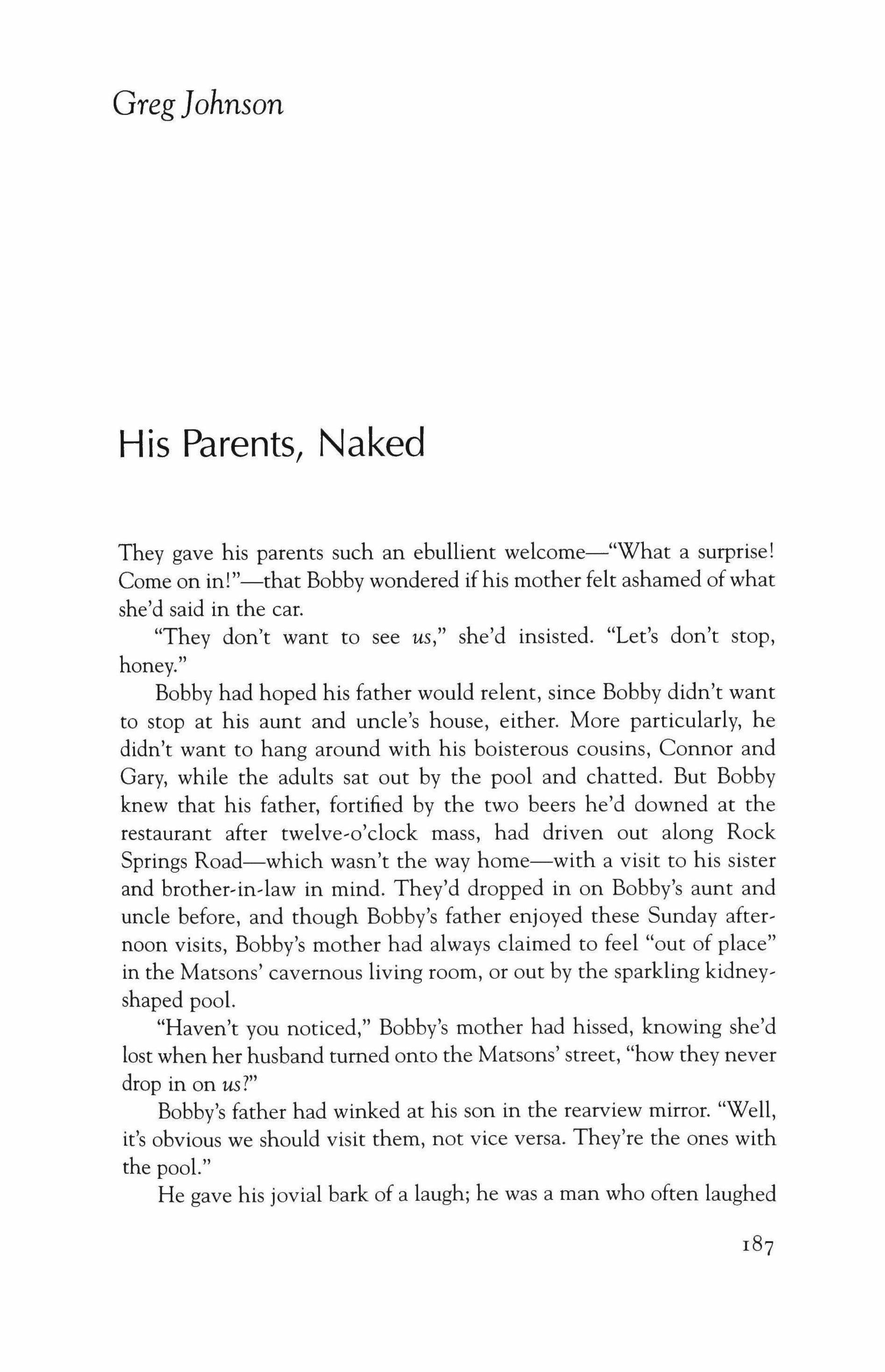
His Parents, Naked
They gave his parents such an ebullient welcome-"What a surprise! Come on in! "-that Bobby wondered if his mother felt ashamed ofwhat she'd said in the car.
"They don't want to see us," she'd insisted. "Let's don't stop, honey."
Bobby had hoped his father would relent, since Bobby didn't want to stop at his aunt and uncle's house, either. More particularly, he didn't want to hang around with his boisterous cousins, Connor and Gary, while the adults sat out by the pool and chatted. But Bobby knew that his father, fortified by the two beers he'd downed at the restaurant after twelve-o'clock mass, had driven out along Rock Springs Road-which wasn't the way home-with a visit to his sister and brother-in-law in mind. They'd dropped in on Bobby's aunt and uncle before, and though Bobby's father enjoyed these Sunday afternoon visits, Bobby's mother had always claimed to feel "out of place" in the Matsons' cavernous living room, or out by the sparkling kidneyshaped pool.
"Haven't you noticed," Bobby's mother had hissed, knowing she'd lost when her husband turned onto the Matsons' street, "how they never drop in on us?"
Bobby's father had winked at his son in the rearview mirror. "Well, it's obvious we should visit them, not vice versa. They're the ones with the pool."
He gave his jovial bark of a laugh; he was a man who often laughed

after he spoke, whether his words were funny or not. Even from the backseat, Bobby could smell the beery fumes of his father's breath.
It had taken a while for his aunt and uncle to answer the door, and of course they were wearing swimsuits.
"Bill and Myrna! Bobby! I told Jack I heard the doorbell," his aunt Rhonda said. "Lucky thing, we'd just come into the kitchen to fix a batch of daiquiris. You're just in time!"
Rhonda was a buxom woman in her late thirties whose breasts and hips overflowed her bathing suit. Her mid-length blond hair with its dark inch-long roots was wet and stringy from the pool. After greeting Bobby's parents and hugging his father-"Hey, big brother," she said in her husky, playful voice-she bent to embrace Bobby, the bare and fragrant tops of her breasts pressing against him. "Hey, sweetie," Rhonda said. Bobby could only respond "Hey" in a quiet, choking voice. His senses were reeling.
Jack Matson was a fleshy, solid man with a sizable paunch hanging above his baggy bright-yellow swim trunks. He was a couple of decades older than his wife but, as even Bobby's mother once admitted, he was still a handsome man. He had a sharp, imposing profile and a full head of silver-gray hair. Smiling broadly, he shook his brother-in-law's hand, nodded to Bobby's mother, then put both hands on Bobby's shoulders and squeezed.
He repeated how glad he was to see them.
Silently Bobby and his parents followed Rhonda and Jack out to the kitchen, where Jack crossed to the blender and the two icy-looking drinks he'd been pouring. Rhonda told him to get down two extra glasses.
"Oh, none for me, thanks," Bobby's mother said. She'd stayed in the doorway, looking abashed and uneasy, whereas Bobby and his father had come into the kitchen and leaned back casually against the counter. His father made a playful grimace, tilting his head back toward his wife.
"She's a stick in the mud," he said. "Never a drop before five o'clock."
Rhonda nodded as though she agreed in spirit with Myrna. "I know, and it's not even two o'clock. We really ought to be ashamed, but these are so good"-her husband was handing her one of the foaming glasses-"on hot days like this."
"Can't argue with that!" Bobby's father said, accepting the glass from his sister.
188

Rhonda said, again bending down, "What'll you have, Bobby? A Coke or some iced tea?"
"A Coke's fine," Bobby said. He wondered where Connor and Gary were. Maybe they weren't even home?
"You can just give him the can," Bobby's mother said quickly. "Don't bother with a glass and ice, we really can't stay very-"
"Is this a new refrigerator?" Bobby's father asked, running his free hand along the silver-toned door. "One of those-now what do you call it?"
"Sub-zero," Jack said. "Yeah, just got it last month. We've been grilling out so much, we sort of outgrew the other one."
"It's huge," Rhonda said, "but would you believe we've already filled all the extra space? We're right back where we started."
"It's-it's a lovely refrigerator," Bobby's mother murmured.
'Thanks," Rhonda said, handing Bobby his Coke. "Hey, Bobby, your two big, bad cousins are in the pool, want to join them? There's a pile of extra swimsuits in the cabana."
Jack nodded, smiling as he took a sip of his daiquiri. "We should have suits to fit all of you, for that matter. Come on out and join us."
Bobby's mother began, "Oh, we can't-"
"Sure thing!" Bobby's father said. He'd already downed his daiquiri; Jack took back the empty glass and reached to pour another. "It's too hot to sit outside in our church clothes, that's for sure." Already he was pulling at his tie.
"Honey, I don't think we should," Bobby's mother said. "We shouldn't impose."
"Don't be silly," Rhonda said. "You sure I can't pour you a drink, Myrna? No? Well come on outside, then. We'll find suits for all of you. That's no problem at all."
"We really shouldn't stay," Bobby's mother repeated, a hint of reproach in her voice.
"Of course we can stay!" Bobby's father said. He was already following Jack and Rhonda out to the brick-floored den where glass doors opened onto the patio and pool.
It wasn't that Bobby disliked swimming; it wasn't even that he disliked his cousins, exactly. At thirteen, Connor was two years older than Bobby, while Gary was two years younger. Both were lean, athletic boys, their limbs tanned from many months-this was late in July-of swimming in the pool. Connor already had a teenager's aggressive
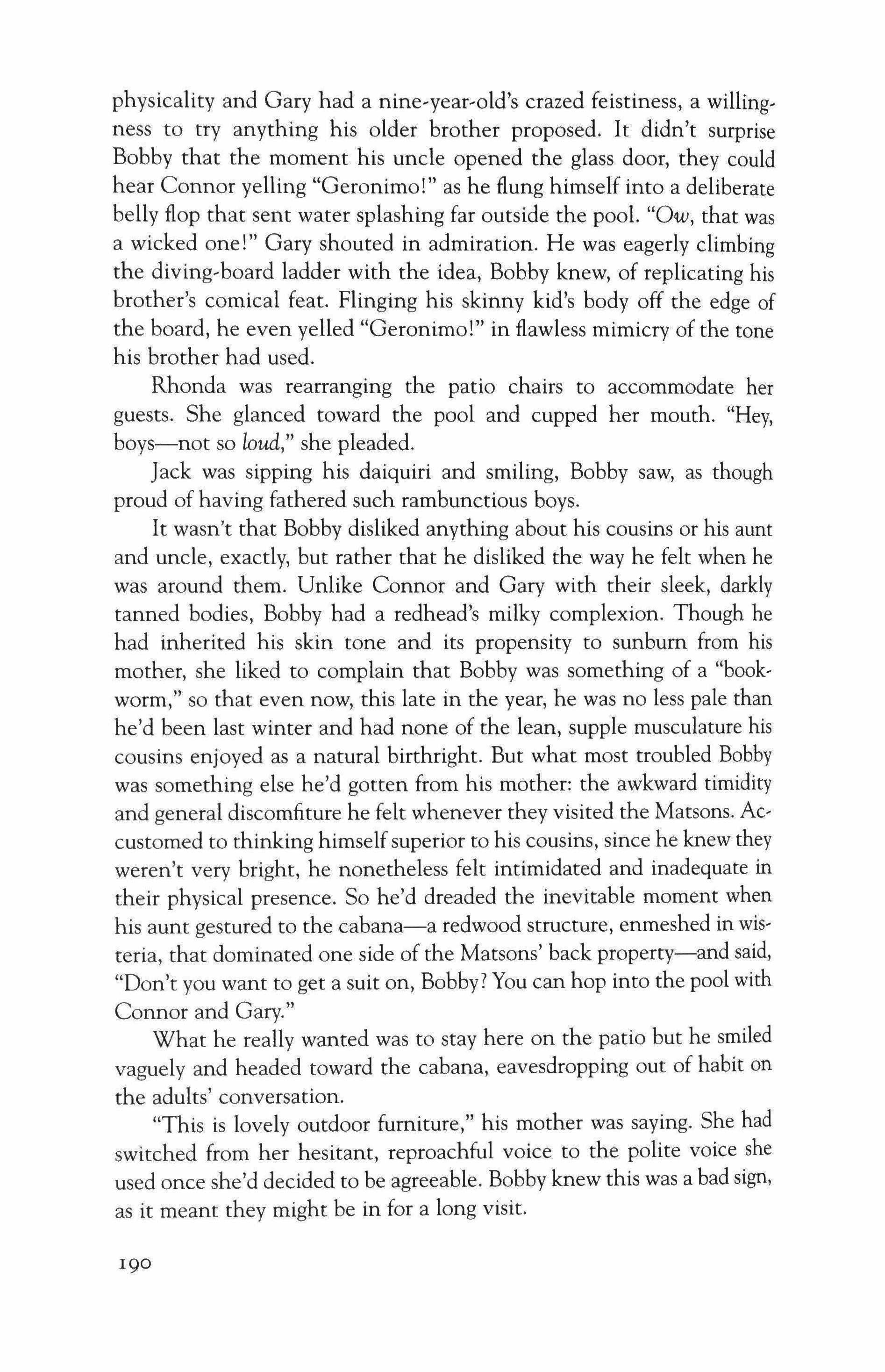
physicality and Gary had a nine-year-old's crazed feistiness, a willingness to try anything his older brother proposed. It didn't surprise Bobby that the moment his uncle opened the glass door, they could hear Connor yelling "Geronimo!" as he flung himself into a deliberate belly flop that sent water splashing far outside the pool. "Ow, that was a wicked one!" Gary shouted in admiration. He was eagerly climbing the diving-board ladder with the idea, Bobby knew, of replicating his brother's comical feat. Flinging his skinny kid's body off the edge of the board, he even yelled "Geronimo!" in flawless mimicry of the tone his brother had used.
Rhonda was rearranging the patio chairs to accommodate her guests. She glanced toward the pool and cupped her mouth. "Hey, boys-not so loud," she pleaded.
Jack was sipping his daiquiri and smiling, Bobby saw, as though proud of having fathered such rambunctious boys.
It wasn't that Bobby disliked anything about his cousins or his aunt and uncle, exactly, but rather that he disliked the way he felt when he was around them. Unlike Connor and Gary with their sleek, darkly tanned bodies, Bobby had a redhead's milky complexion. Though he had inherited his skin tone and its propensity to sunburn from his mother, she liked to complain that Bobby was something of a "bookworm," so that even now, this late in the year, he was no less pale than he'd been last winter and had none of the lean, supple musculature his cousins enjoyed as a natural birthright. But what most troubled Bobby was something else he'd gotten from his mother: the awkward timidity and general discomfiture he felt whenever they visited the Matsons. Accustomed to thinking himselfsuperior to his cousins, since he knew they weren't very bright, he nonetheless felt intimidated and inadequate in their physical presence. So he'd dreaded the inevitable moment when his aunt gestured to the cabana-a redwood structure, enmeshed in wisteria, that dominated one side of the Matsons' back property-and said, "Don't you want to get a suit on, Bobby? You can hop into the pool with Connor and Gary."
What he really wanted was to stay here on the patio but he smiled vaguely and headed toward the cabana, eavesdropping out of habit on the adults' conversation.
"This is lovely outdoor furniture," his mother was saying. She had switched from her hesitant, reproachful voice to the polite voice she used once she'd decided to be agreeable. Bobby knew this was a bad sign, as it meant they might be in for a long visit.

"Thanks for noticing," Rhonda said. "We ordered it from Ethan Allen and it finally came in last month."
"Ethan Allen!" Bobby's mother said, admiringly.
"Their stuff's damn expensive," Bobby's father said. Without turning around, Bobby could see the approving look his father would be giving Jack, the kind of automatic obeisance one man gives to another, much richer man.
"We figure it's worth it," Jack said.
"Oh, I'm sure it is-it's beautiful!" Bobby's mother said.
Bobby was relieved to shut the cabana door and get rid of the adults' sing-songy voices. Inside, however, the close, dank smell of the cabana depressed him further. The single room, with a small bathroom off in one comer, had a warped floor covered in dirty greenish linoleum; Bobby's aunt and uncle had a full-time housekeeper but, the boy thought disapprovingly, it was obvious the woman never came in here. The cabana had one window with open Venetian blinds above an old rusted air-conditioning unit that looked as though it wouldn't work. Overhead a lone fly buzzed around the room like a demented thought. The air in here was not only smelly but overpoweringly hot. People dashed in to change clothes or use the bathroom and then hurried back out. Bobby went to an old chest of drawers placed next to the window and in the weak light he rummaged through an old assortment of swimsuits, looking for a faded-red pair of trunks he'd worn the last time he and his parents had visited, on Memorial Day weekend. He found the trunks, shot a glance at the doorknob to make sure he'd locked it-it would be just like his cousins to come barging in, whooping-and quickly took off his clothes and wiggled into the suit. He came outside with a sense of relief: out here the air was hot but fresh and sweetsmelling after the hellish stale heat inside the cabana.
At first, when he shyly stepped onto the skirt of concrete surrounding the pool, his heart leaped with pleasure, for his parents were standing as if about to leave. But, as it turned out, Rhonda and Jack had talked them into donning swimsuits and they were only on their way to the cabana. "Look, here's Bobby!" his aunt Rhonda said, gesturing vaguely toward Connor and Jack who were both floating on air mattresses in the deep end of the pool. Rhonda was applying suntan lotion to her shoulders in a dreamy, circular motion. "Why don't you boys play some kind of game or other?"
Connor glanced over at Bobby, lazily. "Want to play Marco Polo?" he said.

"C'mon, we already played that," Gary complained. Bobby said quickly, "That's okay," and crossed to the shallow end and sat in one corner, above the stair steps down into the pool, with his feet in the water. "I'll just sit here for a while."
"Connor and Gary have been in that pool all day long," Rhonda told Bobby. "They're getting dark as Indians. Here, honey, do you want some of this cream? Your chest is so white-I'm afraid you'll get burned."
"No, that's okay," Bobby said. "I don't think we're staying all that long."
"Sure you are!" Jack boomed, from the pool. He sat looking kingly in a webbed chair that floated close to his sons. "We've got the whole afternoon in front of us."
Fortunately for Bobby, this didn't turn out to be true.
He stayed in his corner of the pool, idly kicking his feet as he waited for his parents to return from the cabana. When they did, he felt a bit crestfallen-and yes, ashamed-by the way they looked. His paleskinned father was slim at the waist, and his suit, obviously one ofJack's cast-offs, looked as if it might slip down to his ankles at any moment. Bobby's mother looked worse. Likewise slender, with small breasts and hips, she didn't come close to filling out the purple-and-white striped one-piece that Bobby remembered his aunt having worn for the Memorial Day cookout. Still the ever-cheerful Rhonda called out, shading her eyes, "You two look great!"
As though wanting to deflect attention, Bobby's mother said, "That's a lovely suit you have on, Rhonda," as she and Bobby's father settled back into their chairs.
"Oh, this?" Rhonda said, glancing down. She was wearing a reddishorange bikini, the same shade as her lipstick and her nails. "Thanks, it's a Donna Karan." She made a little face that Bobby couldn't interpret. "We went over to Lenox Square last weekend and I got it at Needless Mark-up. On sale!"
"Oh, I love Neiman-Marcus," my mother said, which Bobby supposed was a white lie. His parents could never afford to shop there.
"So Jack," Bobby's father said, "how does it feel to be senior vice president? How are they treating you?"
The Memorial Day cookout Bobby and his parents attended had been to celebrate his uncle's big promotion down at the insurance company where he'd worked for thirty-odd years. He'd started as a file clerk and had worked his way up. At home, Bobby's father had told his son

more than once that Jack was a "self-made" man, as though this were the highest goal anybody could attain. Bobby knew, since his father had mentioned it often, that Jack and Rhonda had invested in real estate through the years and had done very well with that, too. Bobby's father told him that Rhonda had married Jack when he was a "nobody," but she'd stuck by him and here his little sister was, a millionaire, though she'd never had to work a day in her life. Bobby's mother had objected to this (she didn't have a job, either) and said that Rhonda was raising two active boys, besides handling all the books for the real estate investments, but Bobby's father had just laughed and said, "You women."
Bobby's parents were not self-made, and that had caused Bobby, more than once, to wonder how his father did think ofhimself, exactly. He worked a regular nine-to-five job at a paper-products company, as an industrial engineer, and though Bobby's family never wanted for anything, they lived in an ordinary ranch house out in Decatur that was nothing comparable to this sprawling two-story Jack and Rhonda had built here in Morningside, one of Atlanta's most prestigious neighborhoods. The lot itself, Bobby's father said, must have cost more than Bobby's family's entire house. Bobby noticed that his father spoke in a wistful, slightly aggrieved tone whenever he talked about his sister and her husband. Usually this was in the evenings, when Bobby's father would be drinking beer while his wife prepared dinner, all three of them in the kitchen where they tended to gather when everyone was home. Occasionally Bobby's mother would add some mild admonition, like "Money doesn't always buy happiness, you know," to which her husband would respond, annoyed, "No? Well, I sure wouldn't mind giving it a try."
Jack Matson just gave a shrug in answer to his brother-in-law's question. "Hey, it's a job," he said. He grinned, looking vaguely sinister, Bobby thought, in his mirrored sunglasses.
"The Strykers are just wonderful people," Rhonda said, gushinglv, "They've become such good friends, you'd never think Phil Stryker is actually Jack's boss."
"That's a good situation, it really is," Bobby's father said, leaning forward in his chair. Bobby noticed that he'd drained his daiquiri glass.
"They seemed very nice, when we met them," Bobby's mother murmured.
They had met the Strykers at the Memorial Day get-together, Bobby hadn't thought they seemed very nice, at all, and Bobby wondered if this was another white lie from his mother or if she really felt that way. The
193
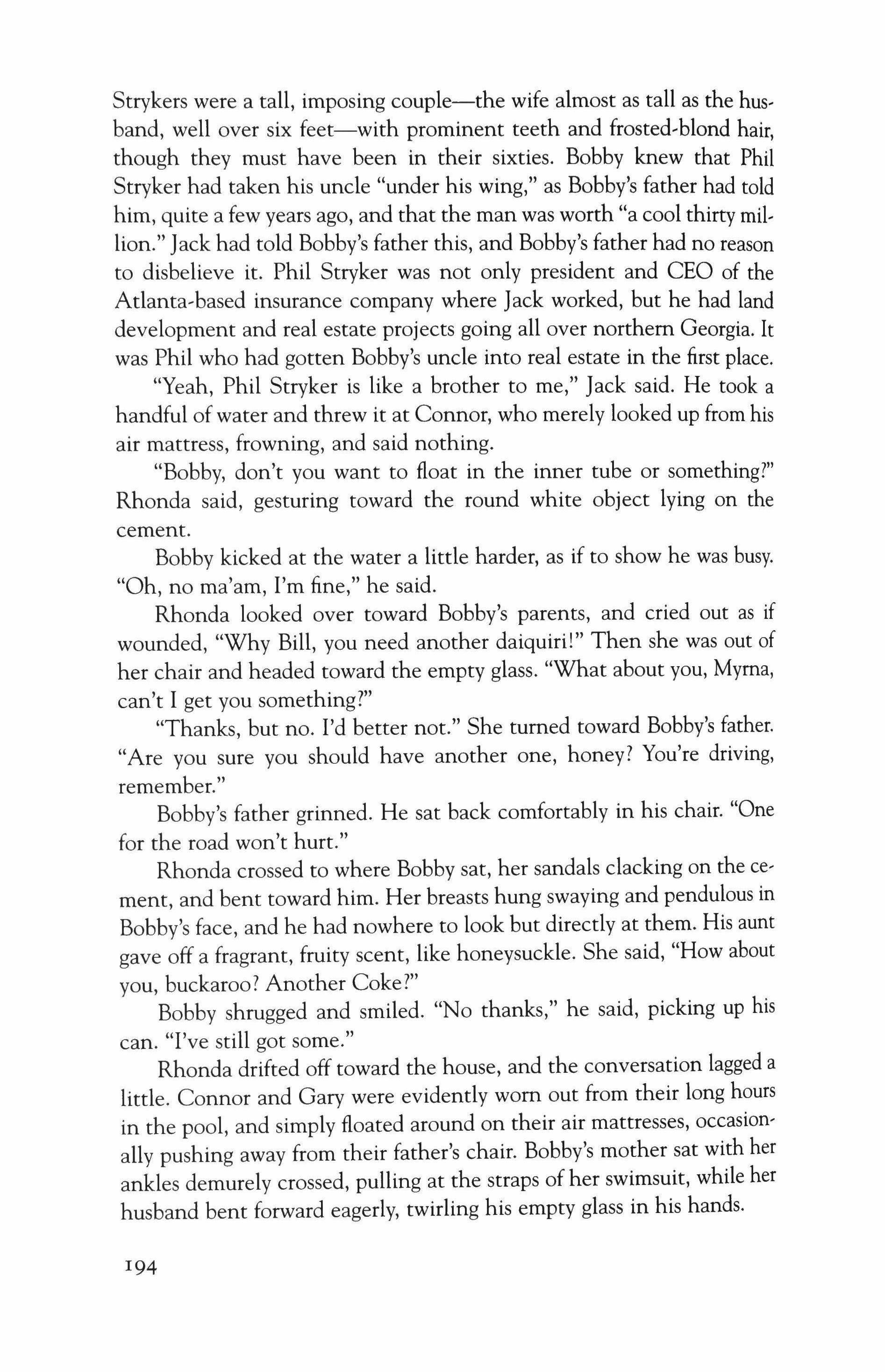
Strykers were a tall, imposing couple-the wife almost as tall as the husband, well over six feet-with prominent teeth and frosted-blond hair, though they must have been in their sixties. Bobby knew that Phil Stryker had taken his uncle "under his wing," as Bobby's father had told him, quite a few years ago, and that the man was worth "a cool thirty million." Jack had told Bobby's father this, and Bobby's father had no reason to disbelieve it. Phil Stryker was not only president and CEO of the Atlanta-based insurance company where Jack worked, but he had land development and real estate projects going all over northern Georgia. It was Phil who had gotten Bobby's uncle into real estate in the first place.
"Yeah, Phil Stryker is like a brother to me," Jack said. He took a handful of water and threw it at Connor, who merely looked up from his air mattress, frowning, and said nothing.
"Bobby, don't you want to float in the inner tube or something?" Rhonda said, gesturing toward the round white object lying on the cement.
Bobby kicked at the water a little harder, as if to show he was busy. "Oh, no ma'am, I'm fine," he said.
Rhonda looked over toward Bobby's parents, and cried out as if wounded, "Why Bill, you need another daiquiri!" Then she was out of her chair and headed toward the empty glass. "What about you, Myrna, can't I get you something?"
"Thanks, but no. I'd better not." She turned toward Bobby's father. "Are you sure you should have another one, honey? You're driving, remember."
Bobby's father grinned. He sat back comfortably in his chair. "One for the road won't hurt."
Rhonda crossed to where Bobby sat, her sandals clacking on the cement, and bent toward him. Her breasts hung swaying and pendulous in Bobby's face, and he had nowhere to look but directly at them. His aunt gave off a fragrant, fruity scent, like honeysuckle. She said, "How about you, buckaroo? Another Coke?"
Bobby shrugged and smiled. "No thanks," he said, picking up his can. "I've still got some."
Rhonda drifted off toward the house, and the conversation lagged a little. Connor and Gary were evidently worn out from their long hours in the pool, and simply floated around on their air mattresses, occasionally pushing away from their father's chair. Bobby's mother sat with her ankles demurely crossed, pulling at the straps of her swimsuit, while her husband bent forward eagerly, twirling his empty glass in his hands.
194

He glanced upwards and said, to no one in particular, "Sure is a beautiful day." Reflexively Bobby glanced up, too, his eyes singed by the blaring sun surrounded by a cloudless whitish-blue sky.
For some reason, Jack laughed. "Sure is, Bill. It surely is."
Then they were quiet for a while. Bobby noticed his mother fidgeting in her chair, and despite the new drink Rhonda would be bringing his father, Bobby hoped his mother might be about to suggest that they should leave. Somehow, the silence around the pool felt ominous to Bobby. But then they heard the glass door sliding open and there was Rhonda, leaning out.
"Hon, guess who just got here!" she called. "The Strykers!"
As though jolted by electricity Bobby's uncle began kicking his legs to the side of the pool, then he pulled himself up onto the concrete. He said, "C'mon, boys. Come say hello to Mr. and Mrs. Stryker."
Somehow Bobby knew that the "boys" did not include him.
Gary and Connor got out of the pool and followed their father back toward the house. Jack called over his shoulder, "Be right back," and they were gone.
So Bobby and his parents were left alone out by the pool. Bobby felt anxious, fearing that the Strykers would be coming out to the pool, too, and a whole new phase of the afternoon would begin, with endless small talk among the adults while Bobby sat there awkwardly not knowing what to do or say.
But this didn't happen. When he thought back on it later, he reasoned that it might be better if this had happened, after all, but it did not.
Instead Bobby and his parents continued sitting out by the pool, alone. The minutes that passed seemed very long ones to Bobby. He could feel the tip ofhis nose and the tops ofhis shoulders burning in the sun. He could imagine his aunt Rhonda in the kitchen, busily preparing a fresh batch of daiquiris for her important new guests, while Jack chatted with them in his loud, gregarious way. Bobby was thankful, at least, that he and his parents hadn't been invited inside to join them.
It was then that Bobby's father said, holding up his glass, "Sure could use that daiquiri." But he sounded doubtful.
Bobby's mother said quickly. "You don't need one."
And his father said, "If I'd known Rhonda and Jack were expecting company
"They weren't expecting anybody," his mother snapped. "The Strykers just happened to stop by, like we did. Uninvited."
I95

Bobby wished his parents would be quiet. Beneath their words he knew that other things were being communicated that his parents didn't want to say, or maybe didn't want to think. Bobby felt an ache of pity for them, and even for himself. The three of them were the shabby, unwanted relatives out by the pool, and Jack and Rhonda had simply forgotten about them-or worse, they hadn't forgotten.
Another tense few minutes passed before Bobby's father muttered, "I suppose we could go inside."
"We certainly will not," his mother said, vehemently. She stood and called over to Bobby, "C'mon, honey, we're leaving."
To Bobby's surprise, his father didn't object. He stood, too, putting his daiquiri glass upside down on the glass-topped table beside his chair.
The three of them headed toward the cabana to change back into their clothes, not even glancing toward the house or the glass sliding door. Bobby entered the cabana first, assuming his parents would wait outside while he changed, but now that they'd decided on a course of action, they were hurrying and all modesty was brushed aside. Before Bobby had time to react, much less object, his parents were out of their swimsuits. They stood with their backs to Bobby in the furthest, dimmest comer of the cabana, both of them completely naked and fumbling with their clothes. He couldn't remember the last time he'd seen his parents naked-he must have been four or five. The moment passed quickly enough but it would stick in Bobby's head for a long time. His parents, naked. Humiliated. In a few quick seconds Bobby wriggled out of his swimsuit and got his clothes on, and within seconds after that Bobby's parents were finished dressing, too. They all tossed their discarded swimsuits back into the drawer and then Bobby's mother touched his shoulder, saying in a hurt, angry voice, "Come on, honey, we're getting out of here."
His father said, "Listen here, Myrna, don't be upset," but his mother said firmly, "I told you we shouldn't come over here." Bobby said nothing, but he felt guilty for feeling so glad that they were leaving.
When they left the cabana, only Bobby and his father glanced toward the sliding glass doors, where there was still no sign of Jack or Rhonda. Fortunately, there was a side gate in the redwood fence, so that they could leave quietly that way and get down to the street and their car without having to encounter anyone. Bobby's father muttered something about "popping inside to say goodbye" but there was no conviction in his voice, and like Bobby he simply followed Bobby's mother out to the car. It would be a long time, surely, before Bobby would see his
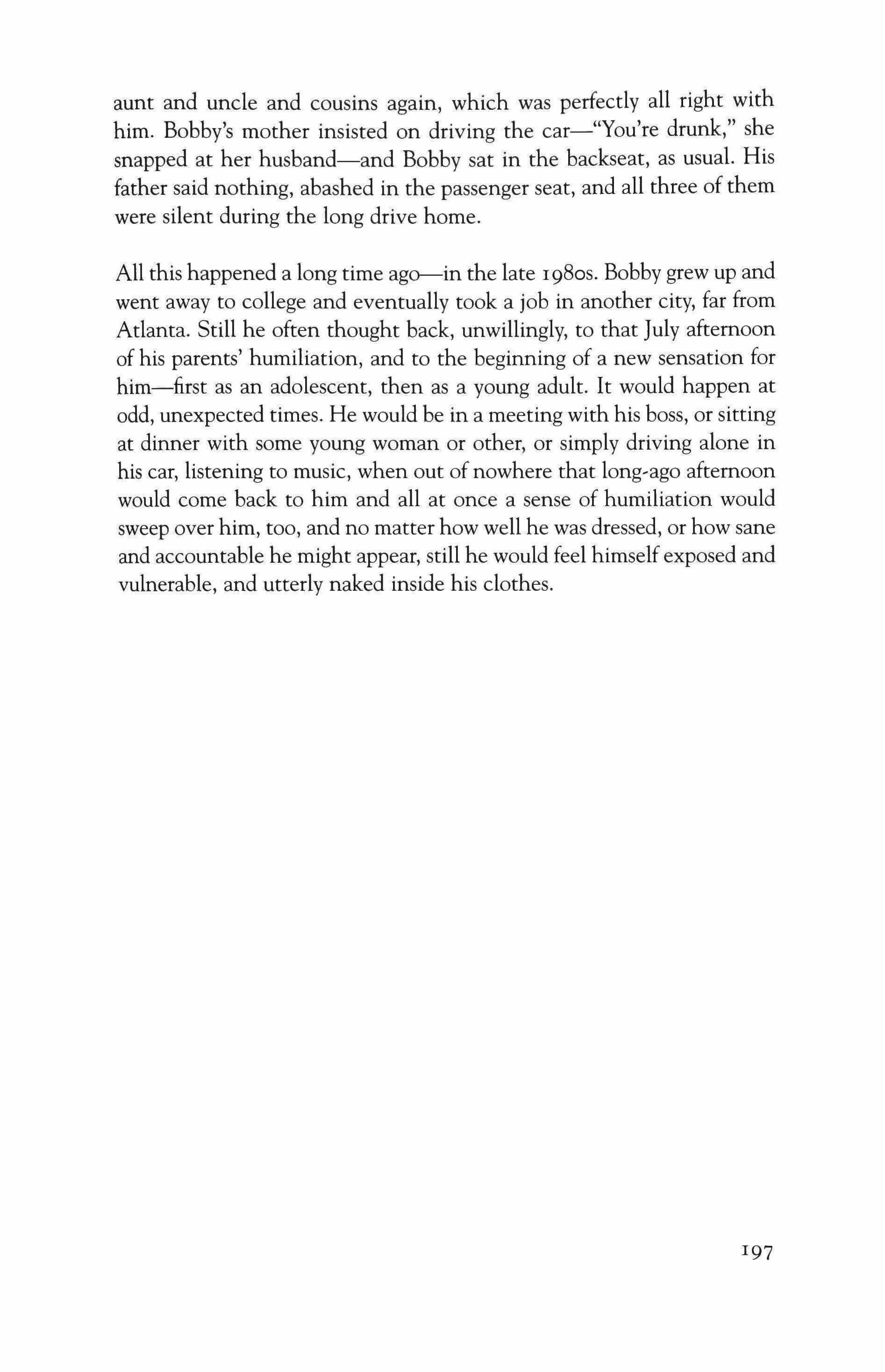
aunt and uncle and cousins again, which was perfectly all right with him. Bobby's mother insisted on driving the car-"You're drunk," she snapped at her husband-and Bobby sat in the backseat, as usual. His father said nothing, abashed in the passenger seat, and all three of them were silent during the long drive home.
All this happened a long time ago-in the late 1 980s. Bobby grew up and went away to college and eventually took a job in another city, far from Atlanta. Still he often thought back, unwillingly, to that July afternoon of his parents' humiliation, and to the beginning of a new sensation for him-first as an adolescent, then as a young adult. It would happen at odd, unexpected times. He would be in a meeting with his boss, or sitting at dinner with some young woman or other, or simply driving alone in his car, listening to music, when out of nowhere that long,ago afternoon would come back to him and all at once a sense of humiliation would sweep over him, too, and no matter how well he was dressed, or how sane and accountable he might appear, still he would feel himself exposed and vulnerable, and utterly naked inside his clothes.
197
A. G. Harmon

A Thing of Beauty
First, you're fired. You're not only fired, but also have lost all benefits, existing and accumulated. These losses are retroactive. You are covered for rwthinghome-health-auto--death. There will be no references, and letters have been sent to potential employers, informing them ofyour gross ineptitude. The IRS was notified of irregularities, and the federal prosecutor is looking into your case. Your children have been taken, your husband has left, and your house has been foreclosed upon. You car is seized; your assets, frozen. You have a dread disease, and without a place to be buried (remember that insurance part?), your corpse will be thrown into a remote ditch. Finally, your soul is bound for hell, last ring, next to Brutus. That's pretty much it. For now. And don't play innocent. You know why this is happening. You know what this is for.
It was not a dream, this threat. Helena never had it when she was asleep. Her nightmares were of a more ordinary stripe: being knocked off a cliff by a shaggy white goat; being stalked through a department store by a bald dwarf with bloody fangs. Instead, this threat belonged to the day-a sourceless but certain retaliation yet to be visited upon her. It had even filled itself in over the years with dreadful particularity; just recently had it included her damnation. And though its torment was in the nature of a sensitive tooth-always present, though not always immediate-it could become most acute whenever she felt on the verge of being discovered, of being exposed by the shadowy powers that ran the universe. No crime was worse, in her view, than the one she committed every day, simply by being.

In truth, some of her fears were past realization. Her children were grown and gone. At sixty-five, her retired, ESPN,bound husband; would not leave her. And the house was paid for. They'd had a mortgage, burning party, with Diet Shasta and a box of petit fours as refreshments. Their retirement was in government securities-assured of low return, but assured nonetheless.
Still, it was several years yet before she could quit her job as a financial advisor at the bank, a job she had no idea how to do.
During the brief, relatively carefree time ofher life, before the threat became so large and particular, Helena had been a teller at a bank in downtown Memphis. An adding machine was all she really needed back then-that, and a stool with a padded back. But during a financial crisis in the seventies, a bus had killed three of the bank's financial advisors on their way back from lunch at a nearby chicken shack. Instead of hiring new ones, the bank had promoted Helena. And since then, it had taken an everlasting parade of tricks to throw folks offher trail. For years they had worked, but she was less and less sure of herself. And if they found out between now and then, she and Baxter would not be able to manage. Ifhe lost cable, they would be forced to have more regular con' versations, which was an excruciating business. And it was a real possibility, now that she could not hear very well.
No matter what the doctor said, she knew people could notice her hearing aids. After all, the things whistled and buzzed like an oven timer. Although she had always worn her gray hair in a bun, gathered at her crown, she'd had to pull it down into a page-boy, to cover her ears, and hence her hearing aids. But the style didn't suit her. Her face was too jowly, and her eyes too dreary brown and wide,set for a look so young. Accustomed to conservative sweaters, blouses, and skirts, she'd tried to adopt a younger style of clothes, to match her hair: cowl necks or mock turtles, big belts with bigger buckles, scarves in animal prints and boots and slacks that zipped up the side. She was too pear-shaped for all of these, she knew, but wore them to match the absurd hairstyle. All had been sacrificed to this scheme, this necessary farce, because she could not seem so old that she could not hear. They might then become suspicious, start to explain her mistakes in terms of her age. And that might warrant an even closer look, at both what she was doing and what she had done. How far back would they go? It couldn't be risked. They might find out, and there was too much to find out.
For one thing, that she could not add-except on her fingers. No matter how many times her father had shuffled the flash cards, she had
199

gotten around memorizing the tables. She would put her hands behind her back, and with a deft skill that required she only fidget her fingertips, scale up to ten, doubling as necessary. Subtraction required feeling her fingers fold towards her palm, one by one, like a line of felled trees. Now, when asked to calculate something away from her desk, it took elaborate tricks to get back to her adding machine. She rounded up a great deal.
For another thing, she didn't really know how to read financial statements or how to amortize. Depreciation was a mystery, no matter how many times she tried to teach herself (You mean a perfectly good car is worth nothing? she would privately object). And when asked to recommend mutual funds, she would send out a set of explanatory graphs rather than explain. These she collected from web sites in massive numbers. The thicker the envelope, the more secure she felt in having inundated her potential unmasker.
Her fraudulence didn't stop at work, either. At home, she was worse. She couldn't even account for her twin daughters' birthday. Her husband had been away in the army when the time came, and she had moved to his base right after their birth. But time passed. The babies had to go to the doctor, and for her life she couldn't remember the day to put on the records. So she had made one up, then forgotten it. On another occasion, she was required to do the same, so she had to guess at the first. In time, she'd written down an invented date and taped it to the inside of the closet door. She knew she could send off for the birth certificate, but by then there had been several birthdays. She felt terrible whenever sweet sixteen or voting age or some other milestone rolled around. It could all be untrue.
But these faults in her nature, and many others, she could have lived with. Some gauntlets were harder to run than others, but she had managed all the way to this near-end of her life. The problem was, they were in addition, on top of something else, something worse. The fact was, she could go in and out. Not just her hearing. Her. She could disappear. The phenomenon was not in her imagination, and she was not insane, though she thought at times it would drive her so. She was not epileptic, either. She'd had that checked when still a girl. Her mother was the only one she'd ever confessed the malady to, and then only after ten years of having first noticed it.
Stricken white by the news, the woman had sat down hard on a kitchen chair. Helena fidgeted in remorse, wanting to take it back. Even when they'd returned from the doctor with news he'd expected would
200

cheer them: "she's fine, nothing extraordinary-just a girl's lightheadedness, I imagine"-neither could bear to talk of it. The disappointment that it was not medically explainable had been nerve-shattering. It had driven her mother on a cleaning frenzy, daily polishing the flatware with silver polish, and hanging the bath mats on the clothesline to beat with a tennis racket. Helena had watched her from the window-stooped frame swinging madly at the mat with both hands, wild gray hair flying about like a lunatic's. Helena had rushed outside, unable to stand any more.
"You mean you find these-fits-pleasurable?" her mother had asked, gasping for air. The racket she clinched hard in a palsied grip.
Helena bowed her head.
"Do you know what I mean by-'pleasurable'?" her mother asked. She was only fifteen, and in those days she was expected not to know. In fact, she wasn't sure it was exactly the same as her mother implied. She had heard ofpassionate ecstasies from older girls who read romance magazines, so she surmised it must be something very good. And this was, indeed, undoubtedly, very good. Except that it lasted longer than she had been told was humanly possible, and it occurred without stimulus or provocation. And, finally, it had a peculiar, and to her way of thinking, exclusive, application in her case: it made her disappear.
"Now, when you say that, Helena," her mother continued, "you mean you can't see anyone or hear anyone?"
Helena bit her lip, shook her head. Why had she told? What had she expected?
"I can understand your part, but what do you mean they can't see you? I mean, I can see you. It hasn't ever happened around me. Has it?" She shivered; Helena rushed to speak.
"I don't know. I guess they can see me. But somehow, nobody ever asks questions while it's happening, and nobody needs anything from me. Nobody knocks me down or calls me on the phone. I think-that's what I don't-" She thrust her hands out, desperate. "Why don't they? Why not? Wouldn't you think they would? At least, once, in ten years? Doesn't it just stand to reason that every once in a while, when it's happening-somebody would need me or ask me, or-"
"But maybe it's a coincidence," her mother offered, wildly, hopefully. "Maybe this only happens when-"
"No, no," Helena said. "It doesn't. It happens anywhere. It has some power that keeps them from me. It happens in the middle of class or while we're at supper. Nobody-notices. And I can't stop it, once it starts."
201

Her mother reached for the clothesline and steadied herself, clutching the flogged bath mat. It took a few moments for the questions to begin again. There was no going back.
"Then, you're saying it comes all at once?"
"No. I have some warning."
It happened at any time of day, though mostly at dusk. It could happen most intensely at dawn, when she was sliding from sleep to consciousness. It happened in every season, alone or in crowds, but it never seemed to happen in a loud place, or in a very busy place. The sensation itself was a combination of growing slowly warmer, while at the same time losing feeling in her feet, then her shins, knees, and on and on until, it was like-
"Like you must have felt-when you conceived me." She had borrowed that verb from health class, unaware it was the wrong one.
Her mother frowned. "Talk like a normal girl talks. Don't you want to be a normal girl?"
She did. But there was no use in that either. She had said as much as she knew to say, told as much as she understood to tell, and nothing had worked to the good.
Her mother had been too old to take the blow. A few more feeble strokes at the bath mat and she quit, dragging it behind her like a lost banner as she went into the house to die. And die she did, two years later, after a long debilitating illness, a mysterious state ofdecline no one could pinpoint. She pitied Helena, and gave her grave, futile looks from the bed, but she never blamed her. It was as though both of them knew that Helena was a scourge to herself, because both of them understood the strange nature of the power she had, and that in this inexplicable mode, how terrible a thing it could be.
Her father-never told, never understanding, consequently stupefied-had raised Helena the rest of the way. But her impression ofherself had never waned. All through business college and into her first days as a teller at the bank, she hid her other failings. A tendency to forget on which side of the road to drive cropped up after a perverse driver's-ed. teacher needled her with trick questions: "Before we pull onto the highway, are you sure we drive on the left?"
With some effort, she managed to convince herself that perhaps everyone had a secret passel of things to hide-and did hide. More reassuring was when Baxter had unwittingly revealed that there were pleasures, and then there were pleasures. The analogy between her private fits and marital bliss had been quite wrong. Nevertheless, the experience was terrible. The vanishings were somehow like pouring water onto the 202
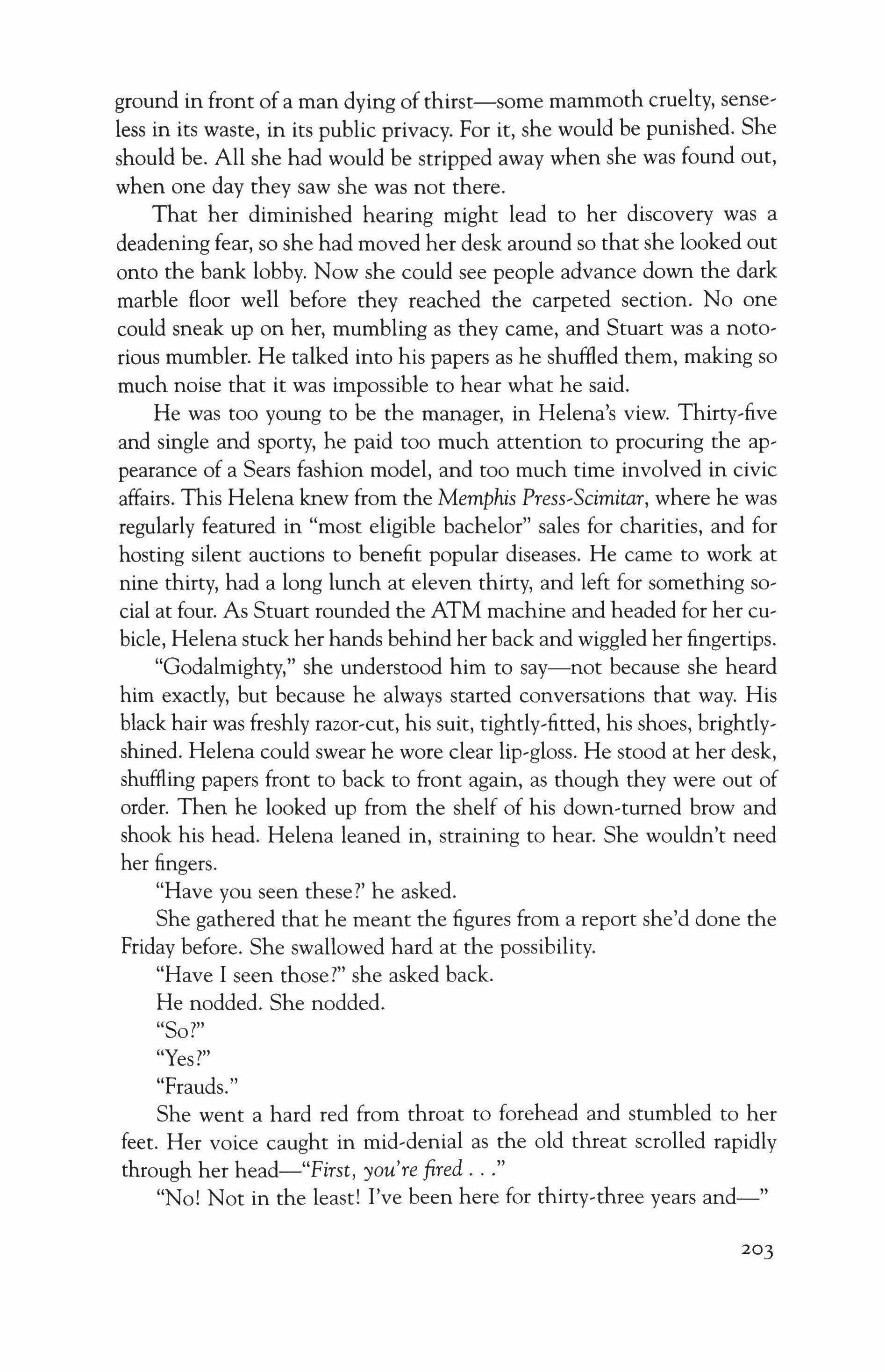
ground in front of a man dying of thirst-some mammoth cruelty, senseless in its waste, in its public privacy. For it, she would be punished. She should be. All she had would be stripped away when she was found out, when one day they saw she was not there.
That her diminished hearing might lead to her discovery was a deadening fear, so she had moved her desk around so that she looked out onto the bank lobby. Now she could see people advance down the dark marble floor well before they reached the carpeted section. No one could sneak up on her, mumbling as they came, and Stuart was a notorious mumbler. He talked into his papers as he shuffled them, making so much noise that it was impossible to hear what he said.
He was too young to be the manager, in Helena's view. Thirty-five and single and sporty, he paid too much attention to procuring the appearance of a Sears fashion model, and too much time involved in civic affairs. This Helena knew from the Memphis Press-Scmurcr, where he was regularly featured in "most eligible bachelor" sales for charities, and for hosting silent auctions to benefit popular diseases. He came to work at nine thirty, had a long lunch at eleven thirty, and left for something so� cial at four. As Stuart rounded the ATM machine and headed for her cubide, Helena stuck her hands behind her back and wiggled her fingertips.
"Godalmighty," she understood him to say-not because she heard him exactly, but because he always started conversations that way. His black hair was freshly razor-cut, his suit, tightly-fitted, his shoes, brightlyshined. Helena could swear he wore clear lip-gloss. He stood at her desk, shuffling papers front to back to front again, as though they were out of order. Then he looked up from the shelf of his down-turned brow and shook his head. Helena leaned in, straining to hear. She wouldn't need her fingers.
"Have you seen these?' he asked.
She gathered that he meant the figures from a report she'd done the Friday before. She swallowed hard at the possibility.
"Have I seen those?" she asked back.
He nodded. She nodded.
"So?"
"Yes?"
"Frauds."
She went a hard red from throat to forehead and stumbled to her feet. Her voice caught in mid-denial as the old threat scrolled rapidly through her head-"First, you're fired
"No! Not in the least! I've been here for thirty-three years and-"
203
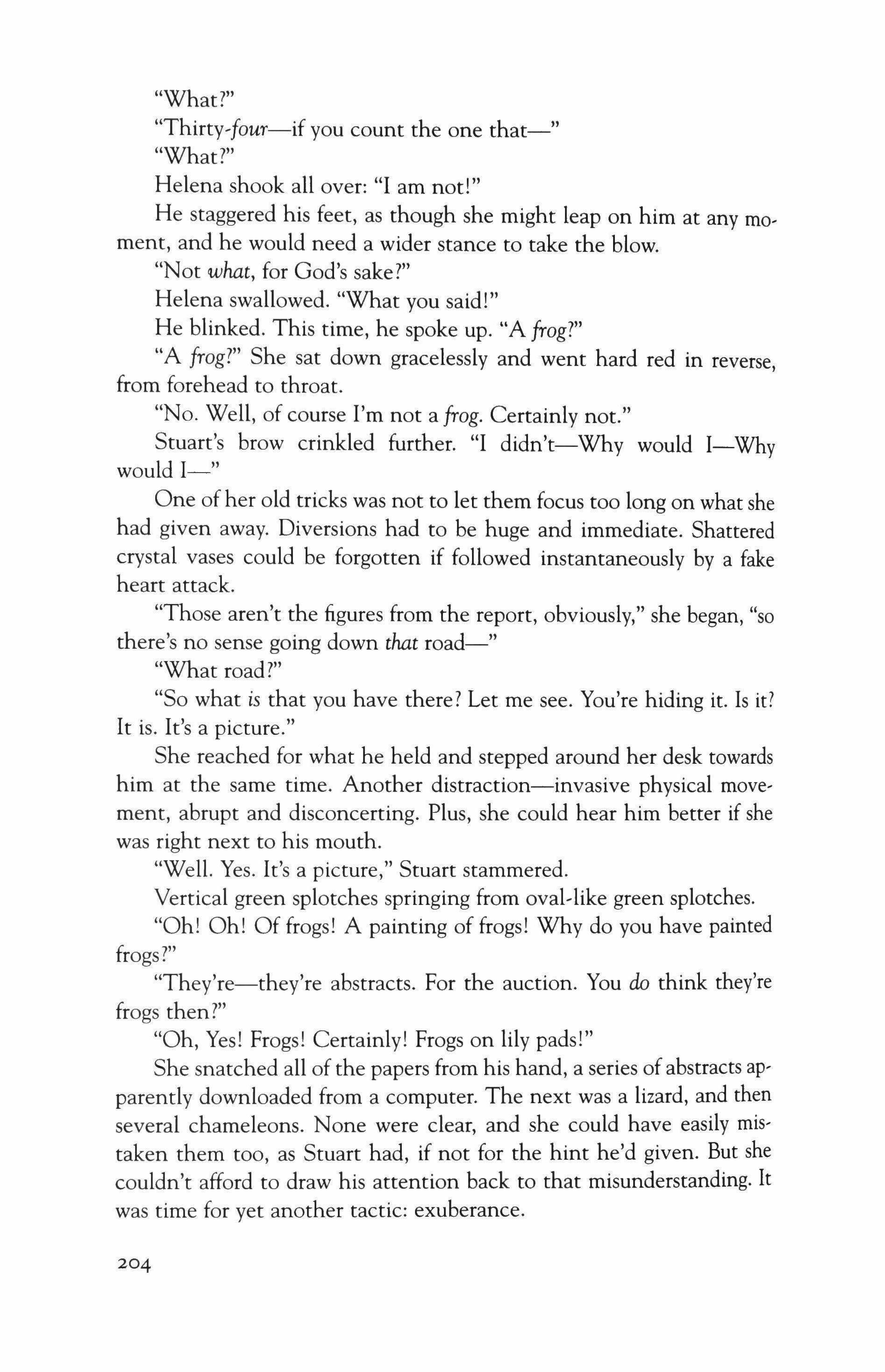
"What?"
"Thirty-jote==if you count the one that-" "What?"
Helena shook all over: "I am not!"
He staggered his feet, as though she might leap on him at any moment, and he would need a wider stance to take the blow.
"Not what, for God's sake?"
Helena swallowed. "What you said!"
He blinked. This time, he spoke up. "A frog?"
"A frog?" She sat down gracelessly and went hard red in reverse, from forehead to throat.
"No. Well, of course I'm not a frog. Certainly not."
Stuart's brow crinkled further. "I didn't-Why would I-Why would 1-"
One of her old tricks was not to let them focus too long on what she had given away. Diversions had to be huge and immediate. Shattered crystal vases could be forgotten if followed instantaneously by a fake heart attack.
"Those aren't the figures from the report, obviously," she began, "so there's no sense going down that road-"
"What road?"
"So what is that you have there? Let me see. You're hiding it. Is it? It is. It's a picture."
She reached for what he held and stepped around her desk towards him at the same time. Another distraction-invasive physical movement, abrupt and disconcerting. Plus, she could hear him better if she was right next to his mouth.
"Well. Yes. It's a picture," Stuart stammered.
Vertical green splotches springing from oval-like green splotches.
"Oh! Oh! Of frogs! A painting of frogs! Why do you have painted frogs?"
"They're-they're abstracts. For the auction. You do think they're frogs then?"
"Oh, Yes! Frogs! Certainly! Frogs on lily pads!"
She snatched all of the papers from his hand, a series of abstracts apparently downloaded from a computer. The next was a lizard, and then several chameleons. None were clear, and she could have easily mistaken them too, as Stuart had, if not for the hint he'd given. But she couldn't afford to draw his attention back to that misunderstanding. It was time for yet another tactic: exuberance.
204
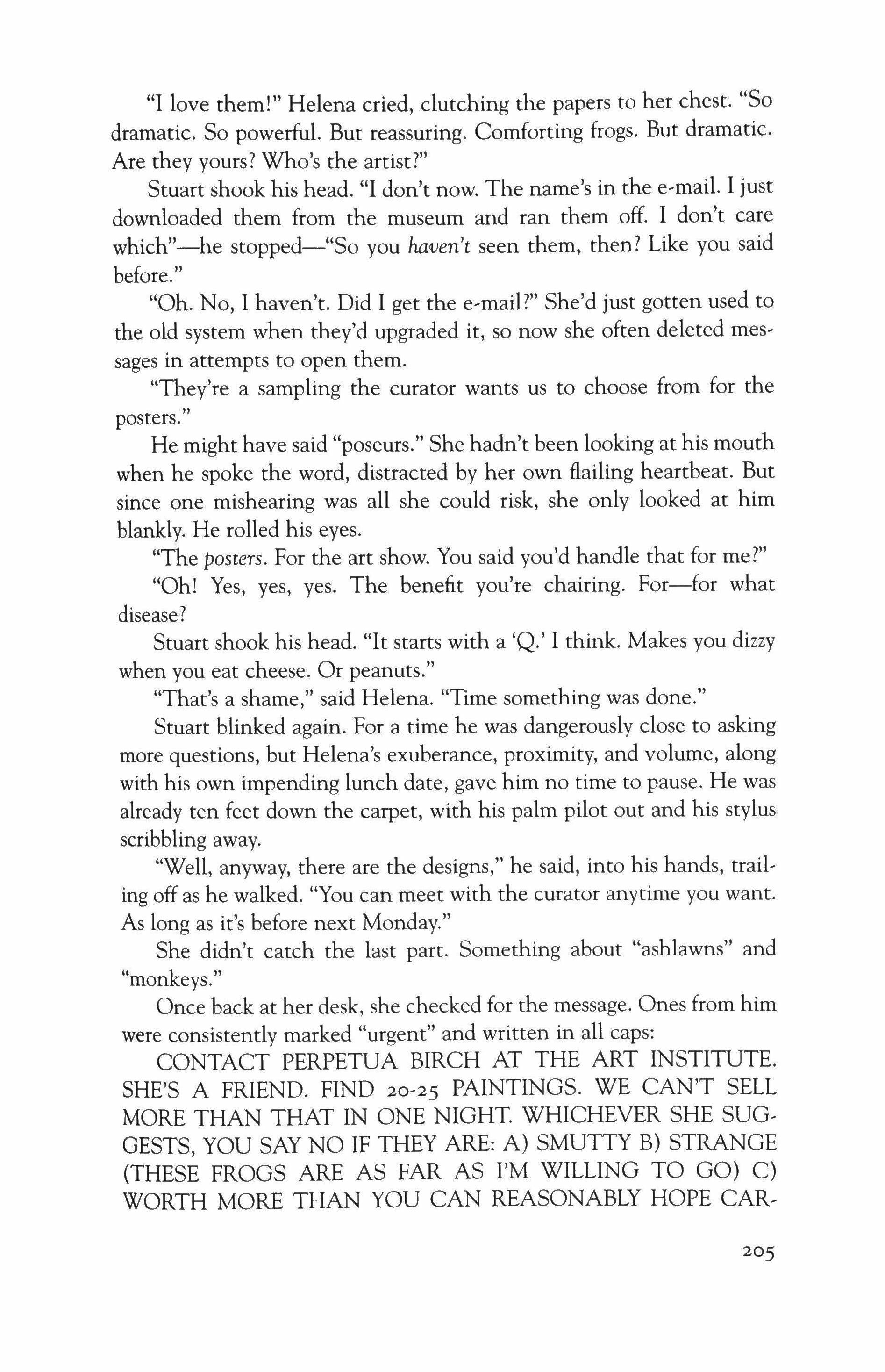
"I love them!" Helena cried, clutching the papers to her chest. "So dramatic. So powerful. But reassuring. Comforting frogs. But dramatic. Are they yours? Who's the artist?"
Stuart shook his head. "I don't now. The name's in the e-mail. I just downloaded them from the museum and ran them off. I don't care which"-he stopped-"So you haven't seen them, then? Like you said before."
"Oh. No, I haven't. Did I get the e-mail?" She'd just gotten used to the old system when they'd upgraded it, so now she often deleted messages in attempts to open them.
"They're a sampling the curator wants us to choose from for the posters."
He might have said "poseurs." She hadn't been looking at his mouth when he spoke the word, distracted by her own flailing heartbeat. But since one mishearing was all she could risk, she only looked at him blankly. He rolled his eyes.
"The posters. For the art show. You said you'd handle that for me?"
"Oh! Yes, yes, yes. The benefit you're chairing. For-for what disease?
Stuart shook his head. "It starts with a 'Q.' I think. Makes you dizzy when you eat cheese. Or peanuts."
"That's a shame," said Helena. "Time something was done."
Stuart blinked again. For a time he was dangerously close to asking more questions, but Helena's exuberance, proximity, and volume, along with his own impending lunch date, gave him no time to pause. He was already ten feet down the carpet, with his palm pilot out and his stylus scribbling away.
"Well, anyway, there are the designs," he said, into his hands, trailing off as he walked. "You can meet with the curator anytime you want. As long as it's before next Monday."
She didn't catch the last part. Something about "ashlawns" and "monkeys."
Once back at her desk, she checked for the message. Ones from him were consistently marked "urgent" and written in all caps: CONTACT PERPETUA BIRCH AT THE ART INSTITUTE. SHE'S A FRIEND. FIND 20-25 PAINTINGS. WE CAN'T SELL MORE THAN THAT IN ONE NIGHT. WHICHEVER SHE SUGGESTS, YOU SAY NO IF THEY ARE: A) SMUTTY B) STRANGE (THESE FROGS ARE AS FAR AS I'M WILLING TO GO) C) WORTH MORE THAN YOU CAN REASONABLY HOPE CAR-
205

DIOLOGISTS AND DIVORCE LAWYERS TO BUY, EVEN FOR CHARITY. GET LIZ AND JEFFREY TO COVER FOR YOU HERE. STUART.
Under other circumstances, she would have resented having to coordinate Stuart's charity duties. But she now knew there was nothing to fear from this responsibility. And she had no hesitation about giving her duties to others, since she hated and feared them so much. Like Stuart, Liz and Jeffrey were both young, and both were on the brink of being promoted over her. They had come as a brace, straight out of the same MBA, and had shot viciously up the ranks through all kinds of maneuverings, mostly having to do with their skills and determination and intelligence. Jeffrey could make Helena breathe hard every time he got out his calculator, all of the functions of which he knew how to toggle. He could even tum the display window an incandescent blue. Liz, his confederate, presented elaborate presentations using her laptop, and was forever pointing to things with a red laser pen, even to dropped pencils and pocket change. So when Helena left her tasks on their weekly "challenge lists," she had no regrets. Besides, they would only do the work faster and better than she, and this gave them the opportunity to show it. By mid-afternoon she was ready to call the art woman, and prepared for the conversation by looking through the pages Stuart had left her.
Frogs.
"What did you say?" The curator's voice was scratchy and course. She had a backwoods accent. Helena had turned the phone volume up full blast to hear. Passersby gave her murderous stares. But without a mouth to watch she was dependent on amplification.
"I said the frogs. He wants to use the frogs on the posters. And the invitations too."
"Oh. That's what you said. Well, all right. Do you mind if I ask why?"
Helena scrolled through Stuart's e-rnailv still on her screen.
"He said the greens are pretty. Good for a spring event, like this is going to be. (He also said THEY'RE THE LEAST STRANGE.).
Silence again. "What's an 'aspiring event'?" she asked.
Helena blinked. "I don't know." She was srnart-alecky, this girl. Figured, being Stuart's friend.
"But you just said they were good for 'aspiring events.'"
"I-no-a spring event. This is going to be held in May, so-"
"Ohhh. Oh. A spring event. Yes. Green did you say? That's right?"
Not rude any longer. Quizzical. Unsure. Helena sat up. She squinted at a place on the carpet and listened to the girl's exuberance.
206

"We'll send you a mock-up." Her voice was faster. "Now the next thing is hammering out some details. I'm afraid it will have to be this weekend, though. So how about Saturday?"
Helena moved the phone away from her lips, placed a few fingers over the mouthpiece.
"Sunday at one."
"Monday at-noon?"
Helena smiled. "No. Sunday at one."
"Oh. Sunday. And at one. Wait. Sunday?"
"Yes. If that's all right?" She pressed her mouth hard against the phone now, and spoke loud at the girl. "My daughters have a birthday on Saturday." She winced. "Most likely. So Sunday will have to be it."
At the end of the conversation she was even more pleased with her new duties. Two weeks away from Stuart, math, Liz, Jeffrey-plus, the curator was stone deaf. Ifonly she disappeared intermittently on her way to hell, thought Helena, they might be good friends.
But her first impression was a bad one. The girl dressed like Liz, all in black and gray, with highlighted, blond-black hair, cut amazingly short. She was dumpy, even squat, and jangled all over with pewter jewelry. She had a broad face and close blue eyes behind severe horn-rims. Her mouth was small, to the point of a pucker. And the minute they made eye contact, Perpetua looked her up and down, glaring with the force of blunt shoves to the shoulder. Helena tried to overcome this initial shock. After all, they had something in common. She moved near and spoke in a loud, full voice.
"I'm-Helena-Brathwaite-from-the-bank. So-nice-to--meet-you."
Perpetua backed off, as though she had walked upon a mad dog.
"Why are you talking like that?" she asked; she all but sneered.
"Well. 1-"
"This is a museum. Voices carry easily here. We have to keep from disturbing the patrons. Now. If you'll come with me, I'll show you the invitations."
Helena grimaced. She had even pulled her hair back, and shown her hearing aids more prominently-just to put this girl at ease. She felt betrayed and decided to mumble. But her malevolence stopped cold when Perpetua asked her to tally up percentages for sales at the last five auctions. Helena pretended not to have brought the figures with her.
"What're those then?" asked Perpetua. She reached over and tugged twice, hard, at the manila folder under Helena's arm.
207

"What roses when?"
The girl shook her head. "No. I said: 'What-are-those-then?' Stuart said Liz had whipped up a spreadsheet. I assume that's what you've brought."
Helena smiled distractedly, feigned forgetfulness.
On the way to wherever Perpetua was taking her, they passed through long, drafty, marble-encased halls that opened onto galleries with lustrous wooden floors, smelling offresh pine wax. Perpetua moved at a brave clip, barking out orders and reminders to whoever was close. Helena trailed along, looking at the faces of big men and women who responded obediently to the girl. And all the while the word "percentages" taunted her. She pulled out her calculator, found the "on" button, and pressed it-in case the thing needed to be warmed up. A solitary, squared-off "0" stared back at her, followed by a mean little "."
Suddenly, Perpetua stopped at a spot in the wall that was padded with cloth, rather than fixed with marble. She pushed at a precise spot, clicking a spring that opened a hidden door. Helena stared at the magic, then at the girl who was motioning her inside.
"You'll need a quiet place to work this up. I have to oversee a hanging, so I'll leave you in here for about ten minutes."
Helena nodded, shuffled in. The door shut behind her like a rock rolled over a cave.
The dimly lit storage room was filled with stacks of boxes and tarpcovered tables. Signs that read "THIS GALLERY CLOSED" and "GIFT STORE THIS WAY -+" stood lined in a battalion at one end. Helena slunk over to one of the boxes and sat.
In no time, she decided to invent a figure rather than persecute herself by attempting percentages. To her way of thinking, "$500.00" was about right. It was ten times what Stuart had sold for in one of those bachelor auctions. So she mashed in a 5 and two as on the calculator and laid it on her lap.
At first, she just felt tired. The strain of the past day or so, the disappointment of not finding a kinswoman with poor auditory canals, and the nasty shock of percentages, had all taken their toll. She leaned against the wall, closed her eyes, and let her stomach go in and out. Her girdle was too tight, so she shifted it about by moving her thumbs beneath the waistband.
It felt good, air touching her flesh, shooting down into places it had been kept from. In fact, it matched the stars that were now twinkling about her toenails, and alongside the bottom ofher feet. Something like
208

knuckles commenced to rub against her arches, softly undulating back and forth. A marmalade warmth oozed into her ankles, an orange glow that crept through her shin bones, then licked into the flats behind her knees, around her fat thighs, up and on, until
"Oh. There you are."
Helena's head shot around. Perpetua was in the door, looking puzzled.
"Where were you? Did I lock the door behind me? I couldn't get in a minute ago."
Helena swallowed, her eyes darting about. "Clock on the floor?"
"'You-were-gone' I said!" Perpetua walked her stout little body over. "You didn't answer before-and I couldn't get-" She stopped and stared at Helena. "What's been going on in here?"
She was horrible. Helena had never experienced anyone like her. She demanded truthfulness as though she were her oldest, closest, most brutal relative-that, or a prison matron.
"Nothing," she stammered, childishly.
"Why're you lying?" snapped Perpetua. "You look flushed-or something."
"I'm-I'm hot."
"You're more than hot." She leaned over and sniffed Helena's breath.
"I have the number!" Helena whined, fumbling for the calculator, holding it up for a distraction. But a line of digital zeroes filled the window from one end to the next. She must have been mashing it the whole time she was out. Helena dropped the calculator, and the threat began to scroll through her head: "First, you're fired. You're not only fired
For a time she cried, irrepressibly, and between heaving sobs managed to lie about why she was crying: her husband's brain condition, a tale pitifully but exuberantly told, with arms waving and hands grabbing at Perpetua's shoulder. But the girl would have none of it, which made Helena cry all the harder.
Perpetua got up, left, and came back with a cup of coffee. But she didn't hand it to Helena in a comforting way. Instead, she sat the cup next to her on the boxes and stood back to study, as though she were drugging a convict for execution. Helena took a shaky sip as Perpetua demanded to know why she was carrying on like this, why she was so pathetically trying to disguise her deafness, why she looked like she'd just stepped out of a brothel, and who had told her to wear her hair like that.
Helena stammered out answers, but they were only partly true. She
209
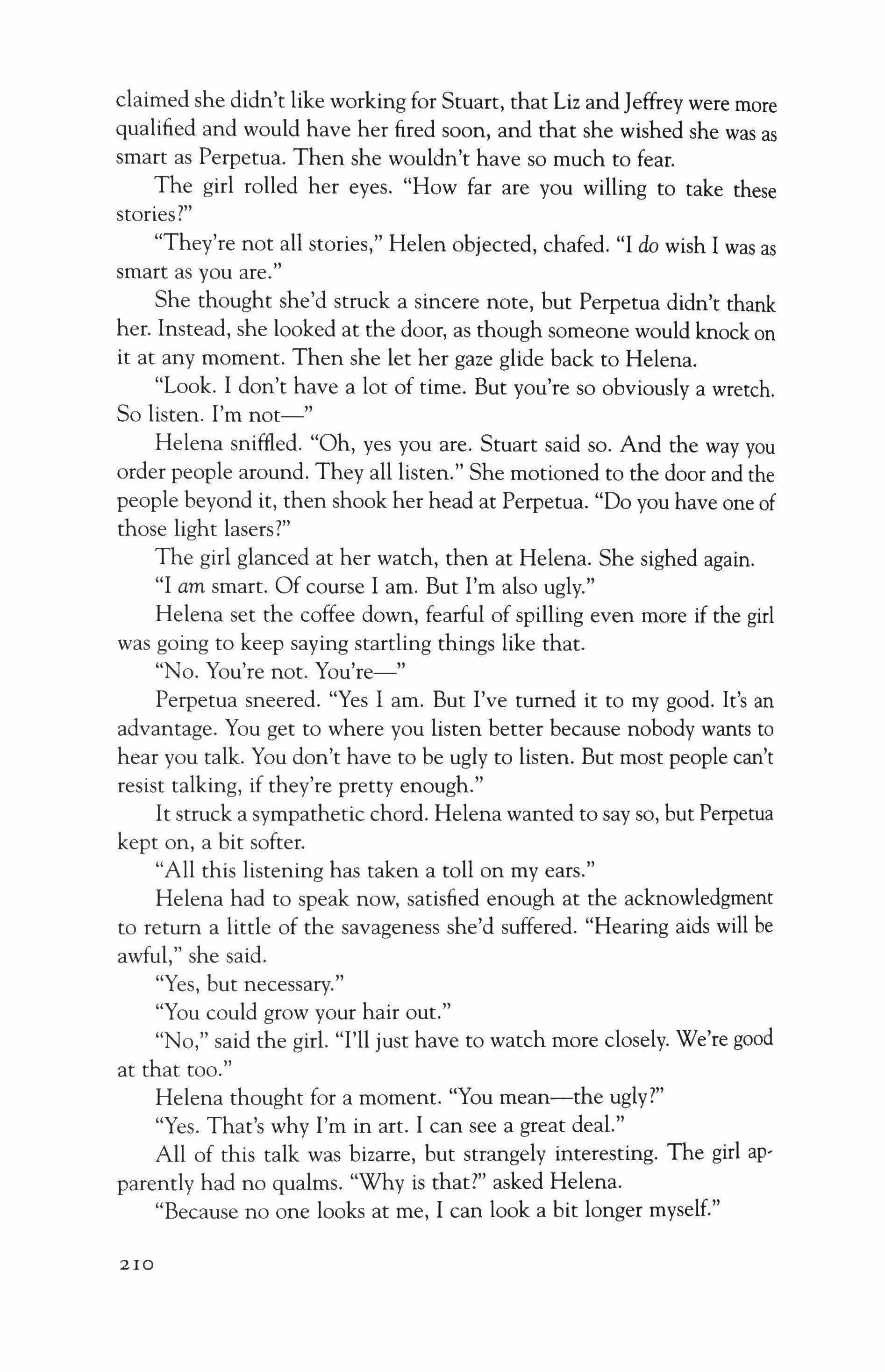
claimed she didn't like working for Stuart, that Liz and Jeffrey were more qualified and would have her fired soon, and that she wished she was as smart as Perpetua. Then she wouldn't have so much to fear.
The girl rolled her eyes. "How far are you willing to take these stories?"
"They're not all stories," Helen objected, chafed. "I do wish I was as smart as you are."
She thought she'd struck a sincere note, but Perpetua didn't thank her. Instead, she looked at the door, as though someone would knock on it at any moment. Then she let her gaze glide back to Helena.
"Look. I don't have a lot of time. But you're so obviously a wretch. So listen. I'm not-"
Helena sniffled. "Oh, yes you are. Stuart said so. And the way you order people around. They all listen." She motioned to the door and the people beyond it, then shook her head at Perpetua. "Do you have one of those light lasers?"
The girl glanced at her watch, then at Helena. She sighed again.
"I am smart. Of course I am. But I'm also ugly."
Helena set the coffee down, fearful of spilling even more if the girl was going to keep saying startling things like that.
"No. You're not. You're-"
Perpetua sneered. "Yes I am. But I've turned it to my good. It's an advantage. You get to where you listen better because nobody wants to hear you talk. You don't have to be ugly to listen. But most people can't resist talking, if they're pretty enough."
It struck a sympathetic chord. Helena wanted to say so, but Perpetua kept on, a bit softer.
"All this listening has taken a toll on my ears."
Helena had to speak now, satisfied enough at the acknowledgment to return a little of the savageness she'd suffered. "Hearing aids will be awful," she said.
"Yes, but necessary."
"You could grow your hair out."
"No," said the girl. "I'll just have to watch more closely. We're good at that too."
Helena thought for a moment. "You mean-the ugly?"
"Yes. That's why I'm in art. I can see a great deal."
All of this talk was bizarre, but strangely interesting. The girl apparently had no qualms. "Why is that?" asked Helena.
"Because no one looks at me, I can look a bit longer myself."
210

This bolstered Helena's confidence. She rolled her shoulders and released her jaw muscles, settling in. But then, just as her relaxation had begun in full, the girl turned on her once more. She insisted on knowing where Helena had been and why she had been so hysterical.
Helena bolted upright. All the sawing back and forth had wrung her out. She couldn't move a step. Her nose was stuffed up, her throat ached, her eyes stung, and her stomach felt bare and fuzzy. On top of that, the girl looked mean enough to slap her if she lied. So for the first time since her mother, fifty years ago, she told. It didn't matter. This girl wouldn't die.
When she was done, Perpetua crossed her arms and scrunched her eyebrows together.
"How long does it last?" she asked.
"Three minutes and thirty-nine seconds," said Helena. "Forty-one, if it's night or raining."
Perpetua fired off questions like she'd been briefed with a white paper. Helena felt obliged to answer, and was surprised to find she could give them all so readily.
"Where do you go then? What's it like?"
"I float. But not physically."
"Not off your feet?"
"No."
"What part of you then?"
"The part behind my eyes."
"Goon."
"My eyes are open, but I can't see anything."
"Is it foggy?" "Maybe"
"You can't say?"
"Yes, then. Foggy, but a bright fog. Not dreary. It's like being in a plane that's about to come out of a cloud."
"I thought you said it wasn't bright or dark?"
"I did, didn't I? And it's not either. But what I mean by not dark, well-I don't mean light has anything to do with it."
"No?"
"No. I mean 'not dark' as in 'not scary'-not frightening."
"But not happy?"
"Yes. Yes, happy but not-" "Light."
"Yes. Not light."
211

"Or windy or still, either?"
Helena lowered her eyes. "You don't believe me."
"I didn't say that. I'm just filling in words when you get stuck. You've obviously never articulated this before."
"And these words are wrong, of course," said Helena. She wasn't reassured of the girl's belief, but she wanted to keep telling. "I never realized how much we use climate to talk about how things feel. Like it's either a trip to Florida or a trip to Alaska."
"Yes. But this isn't either of those things?"
"It isn't even a trip."
"But you do go somewhere?"
"I am somewhere. I'm just not exactly Helena stopped. "I sound like a witch with a Ouija board."
"No," said Perpetua. "They dress better than you do."
Helena glanced down at herself. "I used to dress better than this, before I had to-"
"Mmmhmm. Well, what's the problem? Why do you think it's so bad? So wasteful?"
"If I can't explain even the part about where I am, I sure can't explain that."
Perpetua grunted. "Yes, you can. Is it because you think it's obscene? That much joy?"
Helena shouted out loud, shocked. Precisely. A joy from expectancy, for what would be there when the cloud was come through. "But then it's all for nothing, and that seems-"
"Obscene," Perpetua supplied the term.
It took a moment to ask what she meant, because Helena was too pleased with the fresh diagnosis of her guilt. Perpetua rolled her eyes.
"I suppose it's possible-possible-that you have a great talent. To see. A larger capacity for splendor. Like levitators and nail-bed sitters. Because you're ugly too, you know."
Helena's mouth dropped, her joy gasified. This was too much. "I am not. How can you-"
"It's true."
There was no time for further offense. The museum was closing and Perpetua was in a rush to leave. But before they parted, she drilled Helena on her private history. She was reticent at first, but complied, thinking up answers to questions she had never really considered.
"I have to tell you, I have some doubts," said Perpetua. "But let me study on this for a while. Let me see."
212

Over the weekend, Helena wondered about how the meeting had ended. She didn't know what she had expected to come from her con' fession, certainly not sympathy from someone like that. In fact, Per, petua had insulted her in a preposterous way, so hard-fisted that it took a while for the sting to diffuse. It was still settling in when, as Baxter slept in front of a soccer game between Argentina and Papua New Guinea, the phone rang.
"Tell me more about your parents," demanded Perpetua. "What are they like?"
She could at least say "hello," Helena thought. The brusque treatment irked her, and she decided to return it.
"Dead. I'm sixty-five years old."
"Were like, then. Tell me. What did your father do?"
"He had a tire store. Never missed a day of work-not July Fourth, not Christmas Eve. You could set your watch by him. At night, he'd watch the news, eat chicken-fried steak-"
"Hobbies?" interrupted Perpetua.
"He liked baseball."
"Did he play?"
"No. Of course not. He watched it. He liked to garden-"
"But just tomatoes? Green beans?"
Ruder by the minute. "Yes. What does that mean?"
"All right. That's that. And your mother? Why was she always in bed?"
"Well, she was dying."
"Before that," snapped the girl. "Stop being so literal. Any hobbies?"
"She played tennis once."
"She did? She competed?"
"No. She just played once. Somebody left a racquet at the Baptist church and they went outside against the wall-"
"All right," said Perpetua, vaguely contented. "That's enough. It's what I thought."
Helena lowered her voice; she glanced to see if Baxter was still sleeping. "What?"
"You've lived a pedestrian's life. From what I've gathered, the children you had in a haze of fear, and your husband and you have stumbled around each other your entire marriage, like thirteen-year-olds at a bam dance. Your job has been a curse ever since those qualified chickeneaters died in the bus accident. You've gone nowhere, except to Pensacola in the summer, and six times to Clarksdale, Mississippi to bury family. Your TV reception is poor, and your preference for polkas has
213

kept you dry, musically. I've been through your drab little neighborhood. Finally, you have bad taste all the way around, which must make things even more baffling for your faculties."
Helena clutched the phone receiver, nearly bit the mouthpiece. "I have not! How dare-"
"Come now. Just look at yourself."
"I told you! This is what I wear because of the hearing aids-" "Be honest. It wasn't any better before. You may think it was, but what do you know? Trust me. Your taste is horrendous."
It took several meetings before Helena could abide her. If it weren't for Stuart's constant questioning about the plans, and for the fact that she'd already told the girl too much, she would never have kept going to the museum. She felt like she'd gone to a loan shark and now couldn't shake her off. So as the society ladies-who had always scared Helena, with their small ears and enormous eyes and expensive hair and polished smiles-planned the food and decorations at one end of the table, Perpetua and Helena sat at the other, planning the financial and artistic particulars. Rather, Perpetua planned and Helena nodded. She was increasingly angered at all the insults and even skipped a session, suffering through Liz and Jeffrey's briefing on the gigantic strides they'd made in her absence. Out of desperation, she went back.
"What is it you meant by my 'faculty'?" she blurted out. Perpetua sat at her desk, drinking Coke from a mug and flipping through pages of an art inventory catalog. She looked up.
"I mean 'talent.'"
"It's not a talent," snapped Helena. How could anything that threatened her like this-with loss and death and damnation, be classified as a "talent"?
"It's amazing how little you know," Perpetua said, her gaze descending again. "But I need to do a little more work before I try anything."
Helena bristled at the news. "Who said you were going to 'try' anything?"
"That's what you want, isn't it?"
She was silent. She didn't know.
"Why do you want to fix my 'talent,' then?" Helena asked, truly curious.
Perpetua turned the page. "Because that's one of mine."
After a few more days, the girl called Helena again, this time right before bed.
214

"I've got it all arranged. You have to come early tomorrow, before the gallery opens."
Helena was exhausted and didn't feel like getting up early, but Perpetua said she needed to test her theory. When she arrived, the girl was in a private, roped-off gallery. She was standing in front of a set of draped canvases on easels.
"I've wracked my brains and stared my eyes sore. But this is the best I can come up with. You've never been to a museum, have you?"
Helena scoffed. "Of course. To the agricultural museum, and to the Christmas museum. And that one with all the figurines from the plate company. I've even been here before, you'll be happy to know. I was in the sixth grade."
"But you had no--experience?"
"Not that I recall." Helena looked about. "What's your theory?"
Perpetua grabbed her by the arm and dragged her before the first canvas, ripping off its covering sheet. Revealed was a field of blue bonnets at sun break. Helena smiled, reached out to touch the rich colors. Perpetua grabbed her arm and shuffled her to the next station. She tore the cover off again, leaving Helena before a stately Victorian woman with nearly all ofher ample bosom exposed, and all of that dumping into a large, pressed-glass fruit bowl. Her eyes were black and her hair a vivid red. Helena smiled and commented on her figure. Perpetua clapped onto her wrist and dragged her down further still. The series played out: some cubists, some expressionists, some impressionists, a Photo-Realist, a Fauvist, and a Pointillist. Helena tried to touch each one, or talked ofwhere she would display it in her home--over the fireplace or along the stair landing. But nothing happened.
"No. I didn't think so," said Perpetua. "They're not very good. But I'd hoped."
"Oh they are," smiled Helena. "They'll do fine. As long as they're not too expensive. Like I told you, only some professional people will be at this thing. So--"
"What? Oh. That. No. I was hoping you'd disappear."
Helena turned to look at her, head cocked to the side. "Why would I?"
Perpetua flicked her hand at the paintings. "Because I thought you might like one."
"I do. I do like them."
"Be quiet. You like them the way you like Cheetoes. But that's as far as it gets."
215

Helena did in fact like Cheetoes and turned her face to hide a blush.
"Why'd you think I'd-have an experience-looking at these?"
Perpetua shrugged. "Because you sounded so disappointed when you described it the other day. Expectancies shattered, time after time. I figure you need something to attach this to. A reason for it. Isn't that what bothers you? That there's no reason?"
Helena thought for a moment. She could never answer her questions. Perpetua nodded decisively. "You need a reason. No point in losing yourself into nothing. That's depressing as hell. You need a reason to be transported. This could be it."
Helena couldn't help blushing. "What could?"
"Beauty," answered Perpetua. "If I could only find some."
The girl bent to catch the end of a tarp and flipped it over the pointillist's sunset in Mauritania.
"No," said Helena. "I can't control when it happens. Even if 1-" "That's understandable," said Perpetua. "You'll just have to practice. You have to attach it. Force yourself. Have some self-control. Part ofthis is up to you."
"You sound like my Mother," said Helena, looking away. "She was right then, if she sounded like me. But I'll have to find the real thing. No pictures of it. The real object. Unqualified beauty. You've been so lazy, you'll have to have the full-throttled version to get you realigned. So you'll have to practice in the mean time."
Helena laughed. "I won't know how."
"Well, figure it out."
Bossy beyond belief, she thought, scowling. "What's it to you, anyhow?"
Perpetua scowled back. "Because I want to see it. I told you. I'm good at that." And she straightened her ugly hair and walked away.
For the weeks before the showings, Perpetua brought Helena up to each picture, like a child taken to have her eyes checked. She stood the older woman before the pictures, then moved back to watch. She also explained who the artist was, what he was trying to achieve, why some people thought he had, why some thought he hadn't. Technical terms were thrown about-"sfumato" and "chiaroscuro" and "controposto"-though Perpetua warned, explicitly and repeatedly, that what they were after was more than any of those things alone. Helena listened and watched.
Nothing. Not even at the water lilies, or at the little girl with gardening implements, though she could now say why she liked the girl, but hated the implements. She could even use Italian to say why.
216

"So?" Helena asked, frustrated and satisfied both. Secretly at first, then more and more brazenly, she liked it that Perpetua hadn't figured her out. And she was not as ugly, or as badly dressed as she had said. Perpetua was headed into that same banished pile with Stuart, Liz, Jeffrey, her backdoor neighbor, her insurance salesman, and all the checkers at the grocery store. To make matters worse, the girl had the audacity to take up for herself, and even to accuse Helena.
"It's your fault. I'm not saying we have any Botticellis here, but I'll be damned if I didn't think that little Dutch genre painting would've launched you. It seems to launch everybody. And I had to call in big chips and tell big lies to get it here for a day, just to show you. Your soul is sooooo flabby. You false start like a gas lawn mower over something like the color of a blueberry Ieee, but when I show you that painting-"
Helena fairly quaked with wrath.
"I hated it! In fact, it was the ugliest thing I've ever seen in my entire life! The palette was all wrong, the light came from the wrong side, and the theme was about as ambitious as a picture on a Lite-Brite!"
Perpetua smirked. "You're getting petty, now. Turning on the doctor."
"Ha! The doctor! And just what have you done but talk big? Just "listen" and "look." Well, all I've heard and all I've seen are insults. I was a fool to tell you. Just because you're deaf! I don't even want you to see it, now!"
The girl threw her head back. "Keep on. You just keep it up, here? Besides, if it really does happen, how come it doesn't happen to me?"
Helena was too mad to continue, and left without purse, coat, or umbrella.
It was raining hard outside when she got downstairs. Her car was parked a hundred yards away, and she'd have to go back to get her things. But her fury was glorious. She made a triumphant face at the streaked glass, took her hearing aids out ofher ears, thrust them into one pocket and rifled through the other for cab fare. She didn't have enough and had to bum the rest from the docent. But once she'd hailed a cab, she relished at her storming out. It was for the best, because she didn't trust herself to drive on the right side of the road at the moment.
For days she feasted on her rage like a lioness, prowling about her house and yard. She tore out coupons only after the checker had tallied up her groceries. Twice she told bank customers she had no idea what they were talking about. For meanness, she threw the newspaper back at the paperboy. Baxter became wary and even let her watch the lee Capades when Cuban boxers were on opposite. So when Perpetua had the

nerve to leave a message a few days before the private showing, Helena raced to cut the machine off.
"Now, listen. 1've found it. The real thing. It was sent for babysittingwhile they're preparing the exhibit space in Dallas. Call me as soon as you ge-"
Helena unplugged the machine in mid-voice. It wasn't the message, which she didn't catch half of anyhow (something about "babies" and "hippies" and "dolls"). It was that hick's voice she could no longer abide. The machine's red light flashed madly; the tape coughed and rewound and coughed again. But Helena only wrapped the cord in a hangman's knot around the body of the machine and left it to strangle. She wouldn't listen. She wouldn't call back.
But she wasn't allowed to stew in her satisfaction. With all her heart, she had wanted to leave Perpetua stranded out there, with whatever foolish enterprise she'd conjured up with the baby hippies. Stuart could take over now. In fact, the preview showing of the selected works, during a cocktail party for the society hostesses, would be right up his alley. However, when the evening rolled around, he had gotten a better offer: a fashion shoot in which the models were all young, successful executives. He broke his own record for leaving work early, not seven minutes after he had come in the door from lunch. Jeffrey was busy extrapolating logarithms for the bank president, and Liz was overhauling the inside of a Japanese database. Although only Helena was free, she would have refused if Stuart hadn't said that Perpetua would be with him.
"As a matter of fact, this shoot is her idea," he said, gathering his things, forcing his invitation into Helena's hand.
"Spur of the moment. It's to advertise a charity fashion show next month at the museum-held after hours, of course. So she's tagging along to oversee things. Doesn't really seem in character, but she insists. So you get to go hang out with the doctors' and lawyers' wives."
That night, Baxter couldn't be rooted out of his chair. So Helena forced herself into a black church dress with a white ruff at the collar and wrists, then put on some black shoes with white rhinestone buckles. Nice occasions required two layers of solid red lipstick and a glazing of face powder; she had gotten them free five years ago for trying out a new brand ofshampoo. Then she drove herselfdowntown, late as it was. The cocktails would be over by the time she got there, and the showing might have already started.
So Perpetua wouldn't get the chance to see anything, Helena thought, smugly, as she surrendered the keys to the valet. What was
218

the point, anyhow? Let them take the job and the house. The car was lousy. Baxter could watch cable at a motel. Maybe hell wouldn't be so hot.
But as she entered the museum lobby-its spare white marble, polished and repolished, its plane-sized mobiles stirring gently beneath vent-blown zephyrs, its ebonized smells sharp in the thrilled, expectant air-as she entered, she realized that she had not disappeared in quite some time-not, in fact, since she had begun hating Perpetua. She teemed with wrath, and like an animal with the taste of prey in her mouth, she was pulled down hall after hall by it, towards the place where the showings were to appear.
Along the corridors she passed, eyes sliding from frame to frame, sculpture to fountain to planter, her gait solemn and her shoulders high. The cooling night hugged against the skylights under which she walked, as though pressing itself inside. About and around were guards in blue uniforms, white-gloved waiters, and fifty-year-old woman after fifty-year-old woman, faces lifted to crowns, sheathed in silk and flounced in nettingspeckled shoulders bare, wrists perfumed with lilac, throats chokered and garroted with fierce-colored stones. Helena needed no direction. She glided past them all.
In the center of a mammoth double doorway, weighted with cornice and pediment, stood an elegant, tuxedoed man, his silver hair swept back. He wore a pleasant, shrewd smile on his lips, like a bishop awaiting his flock's enfolding. He was the guide, Helena knew, and in his mouth and mind lay all the secrets of the walls and pedestals. She stopped in front of him and waited, her breathing strange and shallow.
Little by little, one by one, they all joined her-skirts sweeping the floor, tumblers and flutes dangling from emaciated hands, heavy with rings that scratched and clicked against the glasses. At length, the bishop smiled. He opened his mouth to reveal a brilliant red tongue.
"Wmmhsm," he began. Then: "wmmhmsml to za mmfdfdzz mmszm "
Helena's eyes bulged. She moved closer, bumping a bare shoulder, jostling a fluted glass. But it was no use. Even with proximity, even with his gestures of face and hands, it was no use. In her apathy, in her rage, she had left her hearing aids at home, next to Baxter's remote control.
"La my wrzzzz?" he muttered, motioning to the room behind him. A jitter of laughter, smiles and nods of recognition. "Alrzzt. If u wlzfaaamuhme, wlz begnnz
And they all commenced to move, like sails across a bay, joining in
219
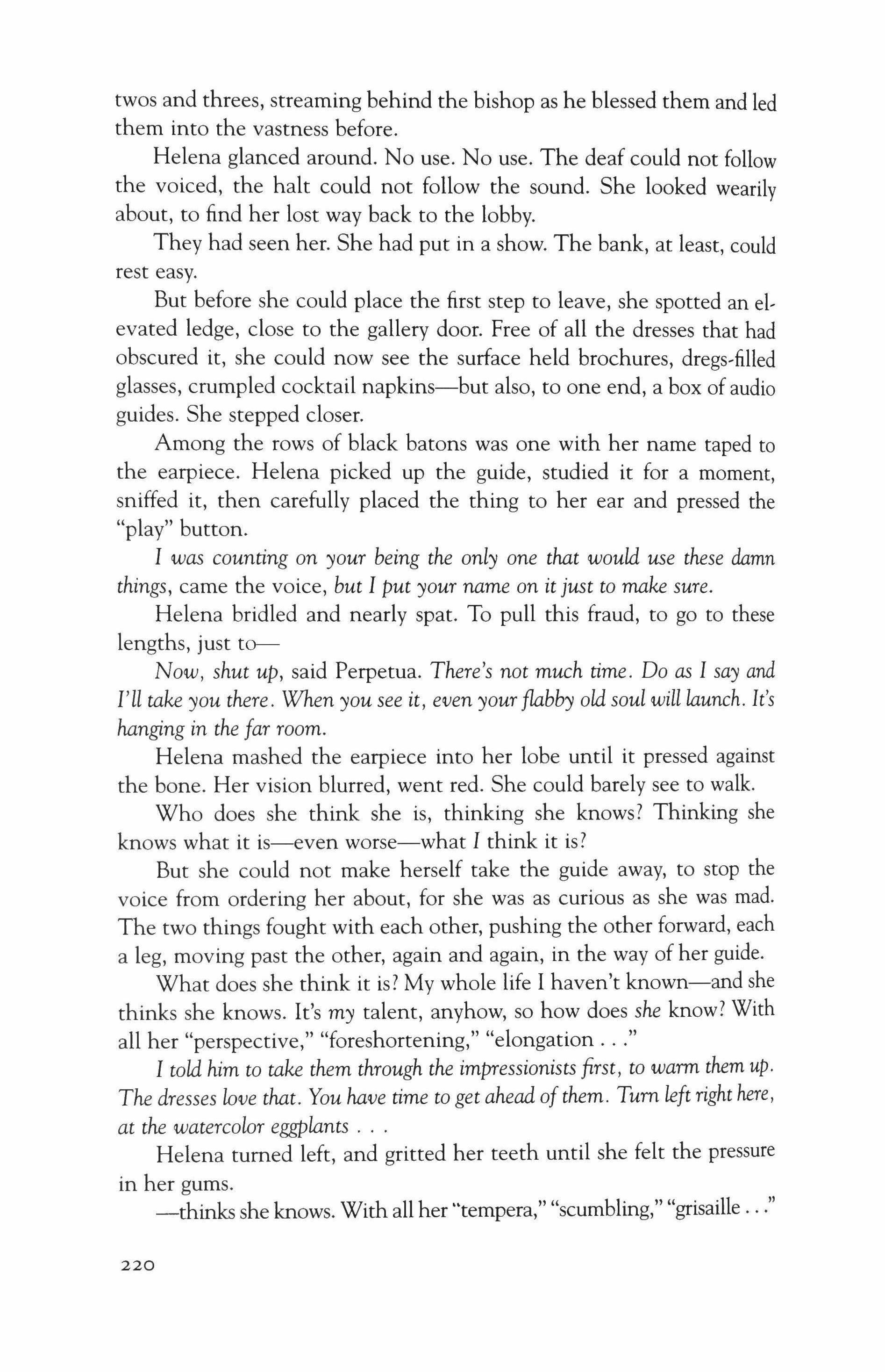
twos and threes, streaming behind the bishop as he blessed them and led them into the vastness before.
Helena glanced around. No use. No use. The deaf could not follow the voiced, the halt could not follow the sound. She looked wearily about, to find her lost way back to the lobby.
They had seen her. She had put in a show. The bank, at least, could rest easy.
But before she could place the first step to leave, she spotted an elevated ledge, close to the gallery door. Free of all the dresses that had obscured it, she could now see the surface held brochures, dregs-filled glasses, crumpled cocktail napkins-but also, to one end, a box of audio guides. She stepped closer.
Among the rows of black batons was one with her name taped to the earpiece. Helena picked up the guide, studied it for a moment, sniffed it, then carefully placed the thing to her ear and pressed the "play" button.
I was counting on your being the only one that would use these damn things, came the voice, but I put your name on it just to make sure.
Helena bridled and nearly spat. To pull this fraud, to go to these lengths, just to+-
Now, shut up, said Perpetua. There's not much time. Do as I say and I'll take you there. When you see it, even your flabby old soul will launch. It's hanging in the far room.
Helena mashed the earpiece into her lobe until it pressed against the bone. Her vision blurred, went red. She could barely see to walk.
Who does she think she is, thinking she knows? Thinking she knows what it is-even worse-what I think it is?
But she could not make herself take the guide away, to stop the voice from ordering her about, for she was as curious as she was mad. The two things fought with each other, pushing the other forward, each a leg, moving past the other, again and again, in the way of her guide.
What does she think it is? My whole life I haven't known-and she thinks she knows. It's my talent, anyhow, so how does she know? With 11 her ." ,,£ h ." " 1 a er perspective, rores orterung, e ongatlon
I told him to take them through the impressionists first, to warm them up. The dresses love that. You have time to get ahead ofthem. Tum left right here, at the watercolor eggplants
Helena turned left, and gritted her teeth until she felt the pressure in her gums.
-thinks she knows. With all her "tempera," "scumbling," "grisaille "
220
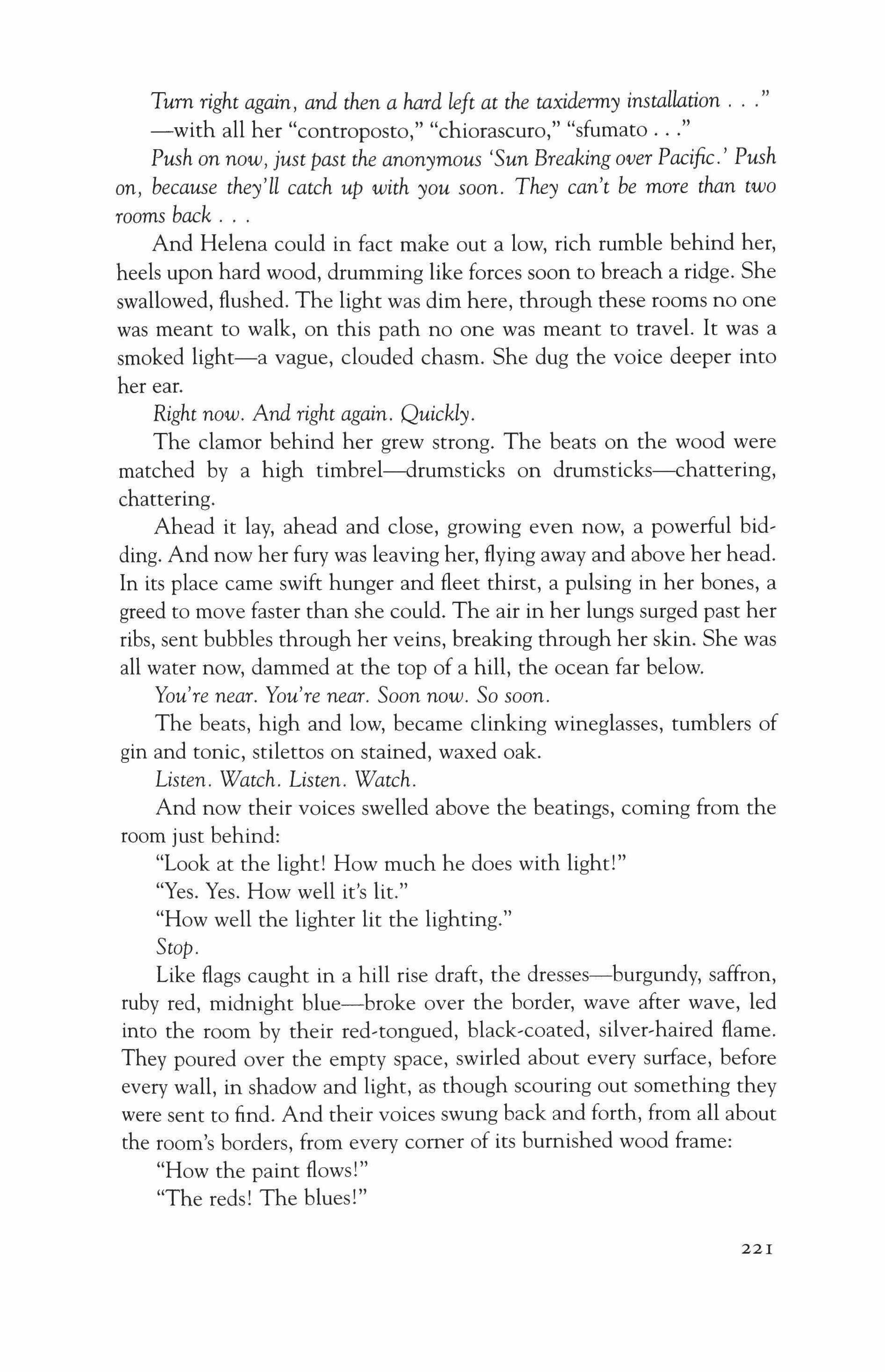
Tum right again, and then a hard left at the taxidermy installation. -with all her "controposto," "chiorascuro," "sfumato
Push on now, just past the anonymous 'Sun Breaking over Pacific.' Push on, because they'll catch up with you soon. They can't be more than two rooms back
And Helena could in fact make out a low, rich rumble behind her, heels upon hard wood, drumming like forces soon to breach a ridge. She swallowed, flushed. The light was dim here, through these rooms no one was meant to walk, on this path no one was meant to travel. It was a smoked light-a vague, clouded chasm. She dug the voice deeper into her ear.
Right now. And right again. Quickly.
The clamor behind her grew strong. The beats on the wood were matched by a high timbrel-drumsticks on drumsticks-chattering, chattering.
Ahead it lay, ahead and close, growing even now, a powerful bidding. And now her fury was leaving her, flying away and above her head. In its place came swift hunger and fleet thirst, a pulsing in her bones, a greed to move faster than she could. The air in her lungs surged past her ribs, sent bubbles through her veins, breaking through her skin. She was all water now, dammed at the top of a hill, the ocean far below.
You're near. You're near. Soon now. So soon.
The beats, high and low, became clinking wineglasses, tumblers of gin and tonic, stilettos on stained, waxed oak.
Listen. Watch. Listen. Watch.
And now their voices swelled above the beatings, coming from the room just behind:
"Look at the light! How much he does with light!"
"Yes. Yes. How well it's lit."
"How well the lighter lit the lighting."
Stop.
Like flags caught in a hill rise draft, the dresses-burgundy, saffron, ruby red, midnight blue-broke over the border, wave after wave, led into the room by their red-tongued, black-coated, silver-haired flame. They poured over the empty space, swirled about every surface, before every wall, in shadow and light, as though scouring out something they were sent to find. And their voices swung back and forth, from all about the room's borders, from every comer of its burnished wood frame:
"How the paint flows!"
"The reds! The blues!"
221

"Radiant." "Luminous."
"Sparkling with inner fire!"
"It speaks to me," said one to another. "Does it speak to you?"
But Helena could not hear them, and they could not see her.
222
Pamela Gullard

A Place for Fi ne Hats
My mother owned a hat shop on Kearny in the heart of San Francisco. The shop survived several lovers and three marriages-whatever the settlement, she always kept the asset of the shop. Despite her history, she continued to expect a lyrical romance that would blot out previous heartbreaks, and she sold this optimism with every hat. She could take an ordinary, forty-year-old customer in baggy flare pants and retro car coat, place on her head an ultra wide-brimmed Patricia Underwood picture hat in plum-colored pressed wool, slide her hand across the front so the brim skimmed the customer's wary eyes, and voila, a woman who might, according to my mother, become a spy, find the chalice, or sleep with Harrison Ford.
When I was younger I thought of my mother's need for the picturesque as quaint, a little touch of beauty in this disjointed, eerie world of bombings, child slavery, starvation. But as I entered my thirties, her cheery search for a heightened reality began to irritate me. She seemed willfully irrelevant, frivolous, almost impossible for me, a serious person, to talk to.
I still visited her, though, whenever my love life went sour. It was Presidents' Day weekend. I ran a small lab at the Edwin A. Miller Crustacean Institute in La Jolla, and my UC San Diego graduate students and I usually worked through this strange holiday of artificiallycompacted birthdays. But I decided to take Thursday off and fly up the coast to see my mother, a surprise visit. My own birthday-I was turning thirty-one-e-was on Friday and I was feeling lonely. Worse than 223

lonely. Scared that a demon in me had determined that I would be alone through my thirties and beyond.
For a year I had been living with Douglas Enns, a professor of wet physics at the university. He, his yellow cat, and I shared his sunny apartment in San Diego's Old Town. Lately he and I had been arguing over small matters-whose turn it was to feed Caution, the cat, what to have for dinner. Whatever Douglas proposed didn't sound good to me. He told me I was becoming humorless, critical. I was.
And sometimes unkind. We'd had our latest fight the night I reneged on going with him to the Chancellor's dinner, a regular event at the Faculty Club to cultivate donors to the university. "I just don't feel like hanging out with a bunch of rich people," I said.
"You said you'd go." He stood at the long window looking out on the tiny terrace off the kitchen.
What I'd originally loved about him was his slow way ofmoving. He ate slowly, thought things through, talked in a measured, slightly formal way (in his formality, he reminded me of my mother, and maybe that was partly what drew me to him). But that evening, the way he placed his hand on the low bookcase beside the window seemed unbearably deliberate. I felt like I was being pulled into his slow-motion world. Agitation roared through me. I was too tense to be generous. "I don't even know why you sign up for these things," I said. "No one else in the science department does. You think you're going to get some gold stars for supporting your beloved school."
He shrugged. He was thin with dark hair falling across his forehead, making him look much younger than his thirty-five years. I'd also loved his slender boyishness, but at that moment, with the glare from the window, he looked merely raw. He turned. "You should keep your promises," he said quietly.
Stung, I went to bed early. Yet I couldn't seem to reform. A feeling of aggravation with him had set in. This seemed to happen to me whenever I spent more than a few months with a man. Suddenly I couldn't bear the way he fiddled with the saltshaker or lingered with a woman friend. Eventually I'd drive him away, and one morning I'd wake up desperately alone, regretful. Did I secretly want to live without love?
Work, usually so satisfying, wasn't going well either. I liked the joking camaraderie of the lab, but late last week I found myself ruthlessly grilling an intern about a missed temperature check of the brackish tanks of shrimp we studied. She started to cry, and suddenly I held back tears. As if I were the cringing beginner. Later that night I watched a
224

gnat swoop too low into one of the tanks and catch its wings. As it struggled against the surface tension of the water, such longing seized me that I had to catch my breath.
Despite my criticisms of my mother, I hoped her good temper would somehow cure me or clarify something. My life needed clarification. Just before I left for San Francisco, Douglas and I talked about whether I should move out. Without saying so, we both knew this trip was a trial separation. What was to become of me?
I had a key to my mother's condominium in North Beach on Filbert, and so I quickly stowed my bag on the red leather couch and went out into the heavy mist. I rarely wore a hat and was bareheaded now. I told myself that with my narrow face, I didn't look good in most hats. My hatless state was one of the unacknowledged frictions between my mother and me.
Yet I was eager to surprise her at her shop. It was February, and the town was almost deserted of real tourists, just bewildered conventioneers with name tags trying to find a quaint cafe for a short lunch before returning to lectures on orthodontia or underwriting. When I was young, my mother couldn't afford to live in San Francisco, so we had a cottage in Fremont across the Bay, and she took the early train to work every day. To me San Francisco was my mother's exotic city, a place where she managed the weight of her business-worrying about such things as the January drop in walk-in customers and how much inventory to keep in the back room. Sometimes when I was a teenager, I'd go with her to her shop on Saturdays. There, she flirted with men and women alike. She was in her early thirties then, but in her flowing pants and silky tunics, she looked much younger. She understood that she was selling allure, and by the time I was fifteen, I knew that she was alluring. The city held for me the tension of my mother's intricate hopes.
Yet I loved its smell of wet concrete and seaweed as I crossed Columbus, the aged glow of neon signs in the pearly gray air, the faint sense of perpetually falling as I descended Grant through Chinatown. My spirits lifted. From this distance, my heart warmed toward Douglas. He often lit a single candle when we went to bed and yet took care to blow it out just before we fell asleep. I wanted to talk to my mother about him.
I passed a dim sum parlor. The smell of sweetened meat and long-roasted root vegetables filled the air. A thought rose through the mist of my mind, then sank. I couldn't retrieve it. Another thought rose-that this
225
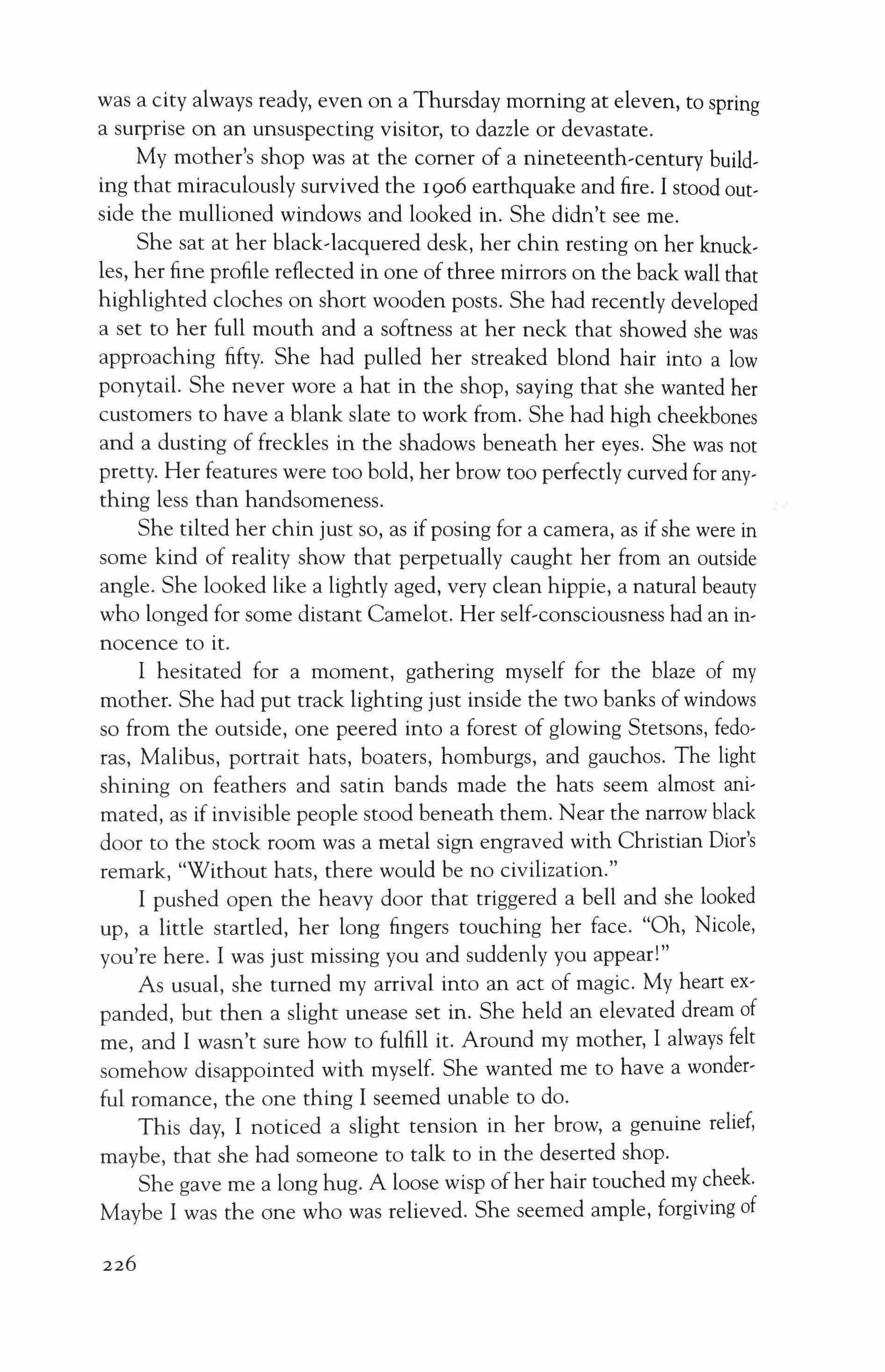
was a city always ready, even on a Thursday morning at eleven, to spring a surprise on an unsuspecting visitor, to dazzle or devastate.
My mother's shop was at the comer of a nineteenth-century building that miraculously survived the 1906 earthquake and fire. I stood outside the mullioned windows and looked in. She didn't see me.
She sat at her black-lacquered desk, her chin resting on her knuckles, her fine profile reflected in one ofthree mirrors on the back wall that highlighted cloches on short wooden posts. She had recently developed a set to her full mouth and a softness at her neck that showed she was approaching fifty. She had pulled her streaked blond hair into a low ponytail. She never wore a hat in the shop, saying that she wanted her customers to have a blank slate to work from. She had high cheekbones and a dusting of freckles in the shadows beneath her eyes. She was not pretty. Her features were too bold, her brow too perfectly curved for anything less than handsomeness.
She tilted her chin just so, as if posing for a camera, as if she were in some kind of reality show that perpetually caught her from an outside angle. She looked like a lightly aged, very clean hippie, a natural beauty who longed for some distant Camelot. Her self-consciousness had an innocence to it.
I hesitated for a moment, gathering myself for the blaze of my mother. She had put track lighting just inside the two banks of windows so from the outside, one peered into a forest of glowing Stetsons, fedoras, Malibus, portrait hats, boaters, homburgs, and gauchos. The light shining on feathers and satin bands made the hats seem almost animated, as if invisible people stood beneath them. Near the narrow black door to the stock room was a metal sign engraved with Christian Dior's remark, "Without hats, there would be no civilization."
I pushed open the heavy door that triggered a bell and she looked up, a little startled, her long fingers touching her face. "Oh, Nicole, you're here. I was just missing you and suddenly you appear!"
As usual, she turned my arrival into an act of magic. My heart expanded, but then a slight unease set in. She held an elevated dream of me, and I wasn't sure how to fulfill it. Around my mother, I always felt somehow disappointed with myself. She wanted me to have a wonderful romance, the one thing I seemed unable to do.
This day, I noticed a slight tension in her brow, a genuine relief, maybe, that she had someone to talk to in the deserted shop.
She gave me a long hug. A loose wisp ofher hair touched my cheek. Maybe I was the one who was relieved. She seemed ample, forgiving of

my disarray, her slightly thick body so different from the sinewy scientists I worked with. They were for the most part likeable women, but they tended to cut short conversations that strayed, and they gave quick hugs, leaning in only with their bony shoulders.
My mother held me away and studied my face.
I had her first husband's sunken cheekbones, thunder thighs, large feet. Sometimes I wondered if I was the right size to be a scientist. My female colleagues stayed up all night finding arcane data and forgetting to eat. I could always eat, like my father, so I've been told-and like my mother, for that matter.
My father was a man who, my mother told me, refused to wear anything but a baseball cap with the bill folded in an exaggerated curve. I'd seen a photo of him taken in 1976, when I was two, the year he made a fortune on a device to stamp identification numbers on printed circuit chips, then ran off to Kauai with the willowy loan officer of a Hawaiian bank. She had come to San Francisco on vacation. My mother called her willowy. I'd never seen her.
My father didn't come to the mainland very often, and when he did, he arrived alone, unannounced, showing up at my mother's doorstep with a puka shell necklace or something else bought from the Lihue airport for me. When I was five, my father died of a heart attack while body surfing, so I hardly remember him. When I turned twenty, my mother gave me a small packet of letters he'd sent me. They were only a few sentences each, written in all caps-"Today I saw three clown fish and a barracuda. It ate out of my hand." In the picture he wore shorts, a gray T�shirt, and a Giants cap. My mother hated baseball caps.
"Guess what," my mother said.
"What?" In her presence, I was always aware of my looks. I sometimes wondered if she saw my father's genes in the shape of my face, my brow. Maybe that was partly why I felt a tiny undercurrent of failure in her presence. I smoothed back my hair at the temples. I too wore a ponytail.
My mother's eyes widened. "I'm in love! I know you think I always pick the wrong man, but this is the one! We're soul mates. You're going to love him. I didn't want to tell you until I was sure, and now I'm sure, and you're here! This is wonderful."
I realized in that instant why I rarely wore hats. I held out a mean little disappointment in my mother for never producing another father for me. In the small box of my heart, I hated her for her inability to hold onto a man worth keeping.
227
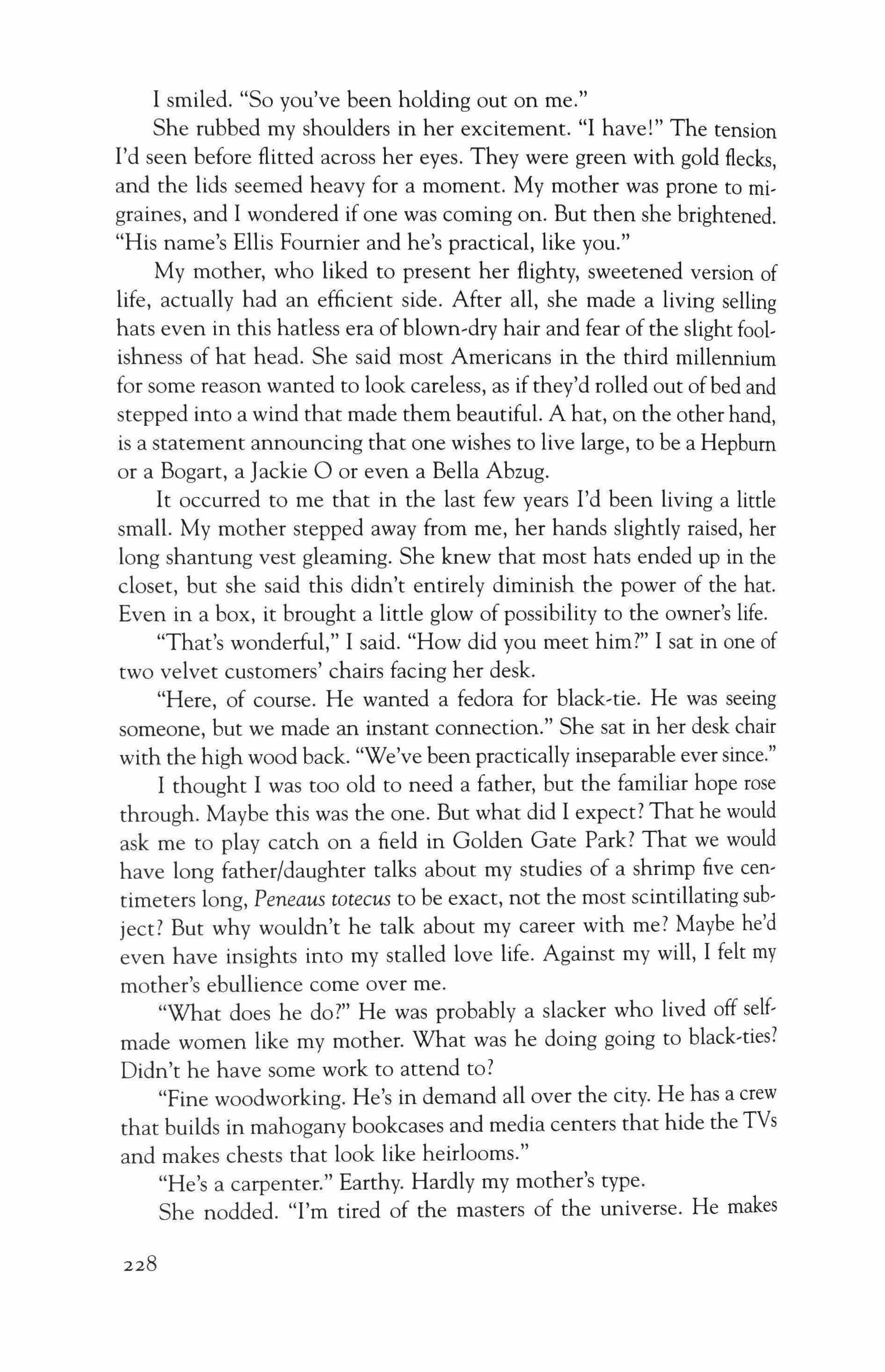
I smiled. "So you've been holding out on me."
She rubbed my shoulders in her excitement. "I have!" The tension I'd seen before flitted across her eyes. They were green with gold flecks, and the lids seemed heavy for a moment. My mother was prone to migraines, and I wondered if one was coming on. But then she brightened. "His name's Ellis Fournier and he's practical, like you."
My mother, who liked to present her flighty, sweetened version of life, actually had an efficient side. After all, she made a living selling hats even in this hatless era of blown-dry hair and fear of the slight foolishness of hat head. She said most Americans in the third millennium for some reason wanted to look careless, as if they'd rolled out ofbed and stepped into a wind that made them beautiful. A hat, on the other hand, is a statement announcing that one wishes to live large, to be a Hepburn or a Bogart, a Jackie 0 or even a Bella Abzug.
It occurred to me that in the last few years I'd been living a little small. My mother stepped away from me, her hands slightly raised, her long shantung vest gleaming. She knew that most hats ended up in the closet, but she said this didn't entirely diminish the power of the hat. Even in a box, it brought a little glow of possibility to the owner's life.
"That's wonderful," I said. "How did you meet him?" I sat in one of two velvet customers' chairs facing her desk.
"Here, of course. He wanted a fedora for black-tie. He was seeing someone, but we made an instant connection." She sat in her desk chair with the high wood back. "We've been practically inseparable ever since."
I thought I was too old to need a father, but the familiar hope rose through. Maybe this was the one. But what did I expect? That he would ask me to play catch on a field in Golden Gate Park? That we would have long father/daughter talks about my studies of a shrimp five centimeters long, Peneaus totecus to be exact, not the most scintillating subject? But why wouldn't he talk about my career with me? Maybe he'd even have insights into my stalled love life. Against my will, I felt my mother's ebullience come over me.
"What does he do?" He was probably a slacker who lived off selfmade women like my mother. What was he doing going to black-ties? Didn't he have some work to attend to?
"Fine woodworking. He's in demand all over the city. He has a crew that builds in mahogany bookcases and media centers that hide the TVs and makes chests that look like heirlooms."
"He's a carpenter." Earthy. Hardly my mother's type. She nodded. "I'm tired of the masters of the universe. He makes

beautiful furniture and then comes home and has a beer and he's happy. He's a little shy."
My mother with someone who was shy? This I had to see. "But he goes to fancy parties," I said.
"He gets invited to all the charity balls that his chichi customers go to. They all love him. Everyone loves him!"
How could I bring up the pettiness of my slow, inexplicable disenchantment with Douglas? I felt mundane and crabby next to my mother's boundless ability to seize the moment.
She put her fingertips to her chin, a slightly theatrical gesture of deep thoughtfulness. "I know," she said. "You've heard this before. You'll just have to see for yourself." She gave a luminous smile. "He's coming for lunch! He'll be here any minute."
I didn't feel prepared to meet my mother's lover. I was too drab, too demanding.
My mother flew into the back room and quickly pulled a plastic bag of fresh spinach from the tiny refrigerator under a worn, marble counter. I stood at the door and watched her wash the leaves.
When I was a teenager, she told me about the breakup with my father. She found the loan officer's panties in the glove compartment of his Stingray. I wondered how my father and his loan officer did much of anything in the narrow seats of a Stingray, but I kept my practical considerations to myself. I could tell that my mother was devastated not just by being rejected, but by being rejected in such a trite, sordid way.
The phone rang. She answered it in front. A few words, a pause as if gathering herself, then she came back to the tiny kitchen area and, without looking at me, said quietly, "He got tied up with clients." She winced. "He can't get away." The edges of her fine lips turned gray. I would never have allowed myself such disappointment.
"All the more for us," I said too quickly. Her plummeting spirits pulled at me. She could pull me under.
She was not going under. She grabbed a bag of walnuts from the little cupboard and her arms lifted with a big breath. "His business is booming! People want the real thing, something crafted from the heart! That's what he gives them." Then from the kitchen that was barely big enough for one person to tum around, she produced our lunch-salads with nuts, Gorgonzola, and thin slices of sweet peaches. She had baguettes with slabs of real butter, and for dessert she poached skinned apples in her microwave and drizzled chocolate on top. We ate at her desk. It was the best meal I'd had since my last visit.
229

After lunch, she called Ellis back and arranged a birthday dinner for me the next evening. OK, his nonappearance was a small slip in plans. Not a tragedy in the making.
I expected Ellis to be a lanky man much younger than my mother, with big hands and bedroom eyes. I got the hands right. He picked us up in his clean GMC truck, and we three squeezed into the cab, Mother in the middle. I glanced around her to him. He was barrel-chested with a wide face and a fringe of gray hair around his bald spot. He wore a tweed sport coat and a tie with tiny figures that curved over his ample stomach. Propped in the cramped luggage space behind the seat was his Tilson. It had a deep dip in the crown and was a pleasing olive-brown color. There was silence as rain sluiced against the windshield. Most of my mother's lovers had been gregarious, take-charge, talkative men. Ellis concentrated on the traffic as if he were making his way through a war zone. Lights gleamed against my mother's black-beaded pillbox hat. Finally, he blurted, "Un ange passe." His pleasantly low voice dropped at the ends of the words, as if he might take back whatever he said if anyone objected.
I grappled with my high school French. "An angel passes?"
He nodded. "Why am I talking in French? I must be trying to impress you."
My mother laughed a little too loudly. She leaned forward, urging Ellis and me to know and like each other.
"What does it mean?" I asked. My spirits rose with his careful honesty.
"That's what they say when there's an awkward pause in the conversation."
Both his broad, hammy hands on the wheel, he pulled around double-parked trucks and braked for taxis that cut in front of him as we made our way through the Financial District. He was a skillful, nonaggressive driver. "So you've been to France?" I asked.
"Me? Oh no. I have a client who listens to tapes in her study while I work." The slight hesitation in his voice seemed to give his listener little places to rest. My mother was smiling. She seemed so happy.
Another pause, slightly less awkward than the first. "I'm putting in a paneled closet in her master bedroom," he said. "I tried to talk her out of it. It's too lavish for the space, but she says she spends as much time there as anywhere else. And wants it nice." He smiled, thought for a couple of beats, and then asked, "So, what's it like to be thirty-one?"
His earnestness, though unnerving, was catching. "Like I'm be23°

hind," I said. "Like I woke up one day and all the things I expected to accomplish were suddenly undone."
"What things?"
Mentioning my love life seemed too intense as an opener, so I told him about my ten-generation study of Peneaus totecus. It masquerades as a shrimp that cleans parasites offfishes' scales and gills, but instead, rotecus takes bites from the fishes' very flesh. I was trying to understand how totecus managed to gauge how many bites to take to live but not so many as to kill the host.
He nodded, not interrupting with the obviously bored declaration, "I didn't realize prawns were so interesting," like my mother's third husband had. With my hip crammed against my mother's, I had the stinging thought that we three could be a family. This was premature, ridiculous, but there it was.
The conversation stopped and started in this way until we got to the Embarcadero near the waterfront, and Ellis eased into a parking place that miraculously appeared on one of the crowded side streets off Mission. My mother had picked the restaurant-the big square, bricked Boulevard. Its sumptuous Belle Epoque style suited her perfectly; this was one place people might wear hats.
We were quickly seated by the large windows facing the street. Ellis got up to make a phone call, and my mother leaned over to me and whispered, "He's not married, not mixed up in some peculiar religion, not even a vegetarian. He may be a little too busy with work, but you think he's great, I can telL" She looked a little pale, strain showing in the tension of her jaw, the way she pressed the wells under her eyes with her fingertips. I'd underestimated her wish for my approval.
"He's a prince," I said. Too good to be true. It occurred to me that my dislike of my mother's lovers had sustained me somehow. I always knew who I was, the logical voice raised against her willingness to suspend disbelief. Each man in her life was the kindest, funniest, most responsible man she ever met, that is, until he strayed back to his ex at weak moments or borrowed money from her that he didn't repay.
Ellis sat down and looked at my mother, then almost wistfully patted her hand on the table. Such a tender gesture. I was becoming a believer.
"I didn't even know this place existed," he said. My mother smiled. "Stick with me, babe, and I'll show you the world." Her bravado had a tinge of uncertainty or something, I couldn't
231

tell what. The green of her long, shimmering sweater cast a feverish tint on her face.
Ellis laughed. He picked up the wine list and studied it as hard as he'd studied the traffic, a shy person's ruse. I was utterly charmed.
Mother looked at me, not him, and said, "I took two Imitrex before I got in the truck, but I'm losing the battle here."
So that was it, a headache. She said that her migraines started with a warning aura at the periphery of her vision, then an ache in her right arm, as if it were just waking up from tingly sleep. If she took her medicine and immediately got into bed in complete darkness, she could sometimes head off the worst of it.
She stood and said she would take a cab home before she started throwing up, and that she would be fine, just fine as long as I didn't let this destroy my birthday. With her coat over her arm, she bestowed a kiss on Ellis's forehead, then mine, and was out the door before he or I could say anything.
We looked at each other. "So," he said.
"Here we are," I smiled. My mother often made dramatic entrances and exits, and I had a momentary thought that this was one ofthose, the headache her unconscious way of intensifying the meeting between Ellis and me. Later, she would breathlessly ask what we talked about and especially what Ellis said about her.
The waiter came and took our order. Ellis ate medallions of beef in Pernot sauce and I had turbot with lime butter. I had often dreamed of eating dinner with a dignified father, the quiet talk, the easy smiles. The fish flaked in my mouth and I had the sense of being deeply nourished.
My mother's second husband had been a developer of shopping centers. He had a booming voice that embarrassed me in restaurants when he practically shouted his opinions about the trade deficit and the national debt. Her third husband was always late. He was a tall trumpet player who played in three different jazz groups and seemed to spend much ofhis spare time thinking of disdainful remarks about the performances of others. One of her lovers told me all about the outrageous alimony he had to pay to two wives, and another explained in detail the ailments he'd had since he was twenty. My mother's exquisite taste in hats seemed matched in some anti-universe by her ruinous taste in men. Until now.
The silence lengthened between Ellis and me. I almost got used to it. We finished the bottle of wine. Ellis chewed thoughtfully, smiled at me, looked past the lights twinkling around the windows to a crowd of bicyclists gathering on the misty street corner. The silence tugged at my
232

heart, trying to pull out a long-forgotten memory or feeling. As we ate, our tableware clinking, nostalgia rose through me, an ache for something I'd never known, like a blind person's yearning for color.
I said, "OK. Let's get down to brass tacks. What are your prospects? How is your business doing? Any addictions? Perversions? Vices? I'm not saying they would be deal breakers, but I'd just like to know what they are." I smiled. "After all, this is my mother." To my horror, I sounded like my mother.
He looked at me with round, blue eyes, the frank gaze, I thought, of a father. "I think," he said, "we need another bottle of pinot." He signaled the waiter and we sat in silence as the steward came and opened the bottle. "I'm thinking," Ellis said as we lifted our glasses, "about moving to Santa Fe next month." He glanced at me and then away.
I felt instantly drunk, as if the wine had suddenly crossed some brain/blood barrier. "What?" I cried. "Are you crazy? My mother can't leave her shop. You know that."
He smoothed his tie. The figures were anchors. "I do know that."
My ears pounded. "You mean-"
"-I don't love your mother."
A frightening number of bicyclists crowded the street. Cars honked at them. "You can't mean that." I realized, in that instant, that the bicyclists were the remnants ofCritical Mass, riders I sympathized with who took over San Francisco once a month at rush hour, stopping car traffic and insisting on their right to the streets. "You're dumping her?" I asked. Few men could resist my lovely mother, at least at first.
He didn't say anything. Then he slugged back half a glass of wine. "I need to get out of the city. I already have four assistants and if I stay here, I'll need to hire two more." Now he talked fast. "I'm already spending half my time managing the staff and doing bill work. It's driving me crazy."
No. No. No. "You're changing the subject." My voice was too loud. "We're talking about you leaving my mother. You think being fat and bald will get you someone better?" I couldn't believe I said that. A lifetime of feminism out the window.
He rubbed the top of his head. "I didn't want to hurt your mother. I've been trying to get myself to tell her all week, but instead I've been avoiding her."
"Oh, I get it. You know I'll tell her. You saw the opportunity to let me hurt her instead. You coward," I spat. "You want me to break my mother's heart."
233

Suddenly the thought I'd been trying to have all day appeared as clearly as the moon that rose like a balloon above the jostling, laughing, sweaty exuberance of Critical Mass. The bicyclists must have been meeting for a late,evening ride. I realized that I needed my mother to find love before I did. I needed her safely stowed in a worthy lover's arms before I could let down my guard, let her go, find my own connection. It was the natural order of things. With a start, I realized that I was more of a romantic than my mother was.
"I need you to love my mother," I said softly.
He smiled, pushed down at the comers of his mouth with thumb and forefinger. "She's scared of being ordinary. I like ordinary. She never gets mad. I don't trust people who are too even-tempered."
"But at first you liked her sense of ceremony," I guessed. "She made you feel like the most extraordinary man in San Francisco. You were walking on air." I felt like I was working out some equation for myself. "And then, when she turned around and loved you, you suddenly weren't so sure."
He pushed at his mouth again, as if smoothing down a goatee. "Maybe," he said.
"Think about it," I cried. "As soon as you knew you could have her, you decided to pick up and leave." I felt hysterical.
He put his hands on the tablecloth. "Your mother tells me you come to San Francisco whenever things heat up in San Diego."
I couldn't deny it.
He said, "We're two peas in a pod. We're the cynics, the spoilers, the rejecters."
"How do you know that about me?"
"Your mother talks about you. She says you've been through a lot of men. She worries about you." I'd never before imagined that my mother had a critical concept of me, the same as I had of her.
Shaken, I said, "I think you're scared. Not that she won't ever touch down to earth, but that she will, and she'll blow your heart apart." I knew it was futile to try to talk him into loving my mother, but I tried anyway.
The creases flared from under his eyes as he squinted a little in thought. "Since you're so good at reading minds, you've probably guessed that my wife died. Shattered me. Age-old story."
I hadn't gotten that far, but of course he had a dead wife. "Was she young?" I asked.
He nodded, holding his mouth steady against seasoned grief. "We
234

were married five years. We lived in San Rafael. I had a studio, this idea that wood was the best medium for sculpture. It darkens at its own pace. As you chisel into it, you never know what you'll find, an immature knot, or just a change in grain. It's like entering someone's body. My pieces were beginning to sell. She took two years to die. Cancer. I took care of her. When I got back to the studio, I had nothing left to give. I could only work for other people, clients." He finished his glass and poured another. "In Santa Fe, I want to try to work on my own again. To face the naked wood, so to speak." He gave a little, slightly self-deprecating laugh.
"You could try again here." I thought of my mother sleeping in her apartment, unaware of her fate.
He smiled.
I thought of Douglas sleeping in his apartment. The hysterical tremor passed through me again. Or maybe he had already packed my things and put them by the door. A vacancy opened up in me. Scared, I patted Ellis's hand, the way he had patted my mother's. I told him all about Douglas, a random, irrational description zooming from his award last year from the National Academy of Arts and Sciences to the pecan pies he baked some Sundays.
Ellis listened. "So," he said, "are you going to get married?"
I gave a start. "Either that or never see each other again," I said.
Ellis seemed to accept those possibilities. Silence descended on us again.
The last of the bicyclists lifted their feet and rode off into the night. I was bereft, exhausted, out of ideas.
My thoughts turned to my dead father. Once, he brought me a cube of resin preserving a specimen of the elegant Lysmata shrimp, its white antennae splayed out in frozen anticipation of detecting a moving object. This was my first shrimp. I still have the cube. Someday I'm going to Bali to see Lysmata in action, cleaning cardinalfish. I've always thought of going alone. But wasn't Bali a place for two? Bali Hai.
"I think," I said, "that we should find me a hat for my birthday." Anything to break this impasse.
"I wanted to love your mother," he said softly.
"What is, is." Hadn't that always been my motto?
Possibly because of the early sweep of bicyclists and traffic jams, the city streets seemed deserted, tall office buildings mostly dark. Didn't anyone work late anymore? At night, even the most colorful shrimp tum dark blue, almost impossible for their predators to see. Then the shrimp are free to scavenge.
235

I had a key to my mother's shop. I snapped on the lights. As usual, I imagined people under the crowd of hats. My father. Ellis's wife. All those who left too soon. Those who didn't have a war to call their own, but were MIAs anyway. Intense sadness overtook me. Maybe what I wanted to retrieve from the past didn't exist-a wholeness, a steadfastness between people that I could count on, a faithfulness in my own heart that I'd never been able to create. I thought of Douglas, his perplexed hurt when I came home late without explanation, even though I could easily have called from the lab. I was careless with him, though I condemned carelessness.
Ellis and I tried at least ten hats on me. He lifted each one from its perch and lowered it on my head. He told me to take out the clip from my hair. I stood in front of the mirrors and together we fluffed out the strands. Unlike my mother, I looked better with my hair around my face; it softened my angular cheekbones. Yet the hats seemed either too big, overwhelming my eyes and making my long face even longer than it was; or too small, perching on my head like little growths. The fashion this year featured hats with very wide brims in heavy materials. I tried on a soft fur by Eugenia Kim and looked like I was being smothered by a large bat. Ellis thought the simple crown of a fedora in straw would suit me, but we agreed that the hat seemed to cut my face in half and emphasize my ears, which are not petite. A Greta Garbo came close to looking good, a dark brown leather hat by Lola came even closer. But in the end, we agreed that I was a lost cause.
It was a joke, but my sadness deepened. Ellis slid off my mother's desk, and we went into the rainy night to see my mother.
I quietly let us in to her darkened place. Tall chairs were black shadows in the dining area. The drawn shades faintly brightened and then went gray with passing car lights. Ellis moved to the kitchen and turned on the single stove light so we could see. Apparently he had tended my mother during a headache before.
She was asleep on her back on the red couch with a velour blanket pulled over her face. She could have been a corpse composed for burial. I thought that someday she might die, without love. The thought was unbearable. For a moment, I stood by her covered feet and couldn't move. Ellis leaned his elbows on the kitchen counter. He seemed willing to let the silence like grief sink around us.
I touched my mother's knee through the blanket. It was muffled bone, its real shape somehow unknowable. She made each moment an event that she never fully entered. She might never change. I needed to

wake her, needed to cast off this sense of doom, of something ending. I carefully lifted the blanket from her face and kissed her soft cheek. She smelled of sleep, like a small child. She opened her eyes. "Oh," she said without flinching at my face so close to hers.
"We're here. I just wanted you to know." I didn't move back.
She was so pale that blue shadows fell from her nose and curled at the comers of her mouth. Her skin looked damp, the creases of her eye, lids slick. Maybe she'd sensed Ellis's rejection but hadn't yet let the thought reach her consciousness.
She pushed up against the leather pillows. "I'm better," she said.
She knew what I wanted to hear.
"I got you a present," she said. Her voice was hoarse, as if she'd been shouting, though I knew that her headaches kept her very quiet. "Don't tum on the light. You can see it over there on the sideboard."
By the dining area, I moved through the shadows to get a smallish hat box. I didn't want a hat. I'd tried hard enough. Ellis lifted his eye, brows at me. I brought the round box back to my mother.
I knelt on the carpet by my mother's head and opened the blue, striped wrapping paper. A baseball cap with no logo, stone'washed gray green. She must have had it made. Such a concrete, no-nonsense, some, how indisputable object. I put it on, pushed down the back.
"Perfect," Ellis said.
"Yes." Without looking, I could tell it was perfect. Casual. Darken, ing the area just above my eyes like a small curtain. I kissed my mother again. I smoothed her cheek the way she'd smoothed mine when I was a child. She let me. "I was afraid," she said, "that it was going to take me thirty,two years to find you the right one."
"You never give up."
"No," she whispered. "I never give up."
We three sat together in the long silence that I'd just learned to tolerate. There would be time enough for me to call Douglas and ask him if we could start over.
237
Robin Ekiss
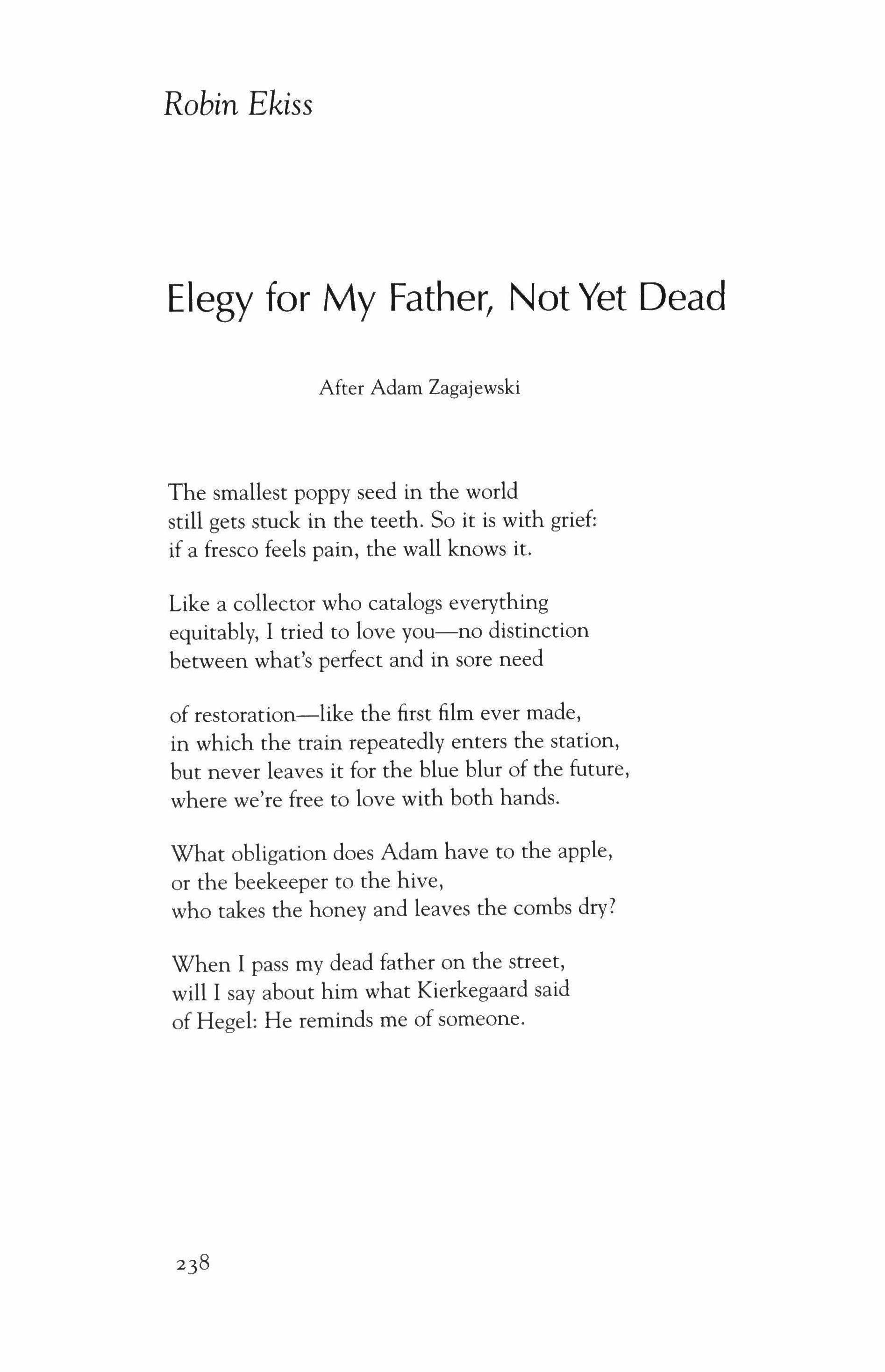
Elegy for My Father, Not Yet Dead
After Adam Zagajewski
The smallest poppy seed in the world still gets stuck in the teeth. So it is with grief: if a fresco feels pain, the wall knows it.
Like a collector who catalogs everything equitably, I tried to love you-no distinction between what's perfect and in sore need of restoration-like the first film ever made, in which the train repeatedly enters the station, but never leaves it for the blue blur of the future, where we're free to love with both hands.
What obligation does Adam have to the apple, or the beekeeper to the hive, who takes the honey and leaves the combs dry?
When I pass my dead father on the street, will I say about him what Kierkegaard said of Hegel: He reminds me of someone.
Croton

Some trees grow better in partial shade. Here is the parking lot where my father forced me to apologize for not speaking all those years to his mother, or else he wouldn't pay for college. Even then, I knew how to cut off my nose to spite my face, like Milo of Croton, olympiad wrestler after whom the town was named, who carried a calf on his back four years to make him stronger. In the woods behind our townhouse, I'd seen a U.EO., full moon through the trees lighting the underside. At the power plant, the night watchman took up his rifle to defend electricity from outer space. The whole neighborhood came out onto the street to watch the slow progression of construction in the complex: that tight fit, barely three-quarters of an inch between the outer walls of each new home. Looking into windows now makes me sad, almost as sad as looking out of them, not possible to believe in something beyond the trees. Croton in the backyard, genus euphorbia-not to be mistaken for other euphoric spurges: variegated light shedding its shadow on a waxed leaf or falling across my father's face, which registered no emotion, like a rabbi holding a mirror up
239

to the face of God. It's a woman's prerogative to be possessed by imagination-l won't apologize for it. I hated him. Some things persist when landscape enters memory: his back turned away from me like the trunk of a bare tree, surviving winter by stabbing upwards into the dark and staying put-as only trees can do.
Ships in Bottles

Somewhere inside is the sea, lapping against the transparent wall of memory. Is it vanity that makes me see the imperfections in glass?
In a basement, under the hood of a lamp, a man huddles over a schooner, rigging a tiny sail with tweezers. Upstairs, his wife soaps a plate and stares out the window at the yard where my mother, as a child, broke the bottled ocean over her knee, acting out the smallest gesture of anger. A window's for looking into, not out of-the pastness of the past isn't trapped in glass, like some vast Lascauxan cave on whose walls survive the outline of a deer, or the wasp waist of a bottle's neck through which a ship can pass unstoppered, its mast folded to fit

through the narrow opening of a day. I'm tired of writing about the living as if they were already dead.
Let bygones be-let me empty the typeface on the table, above which ships launch themselves into open air.
Meena Alexander
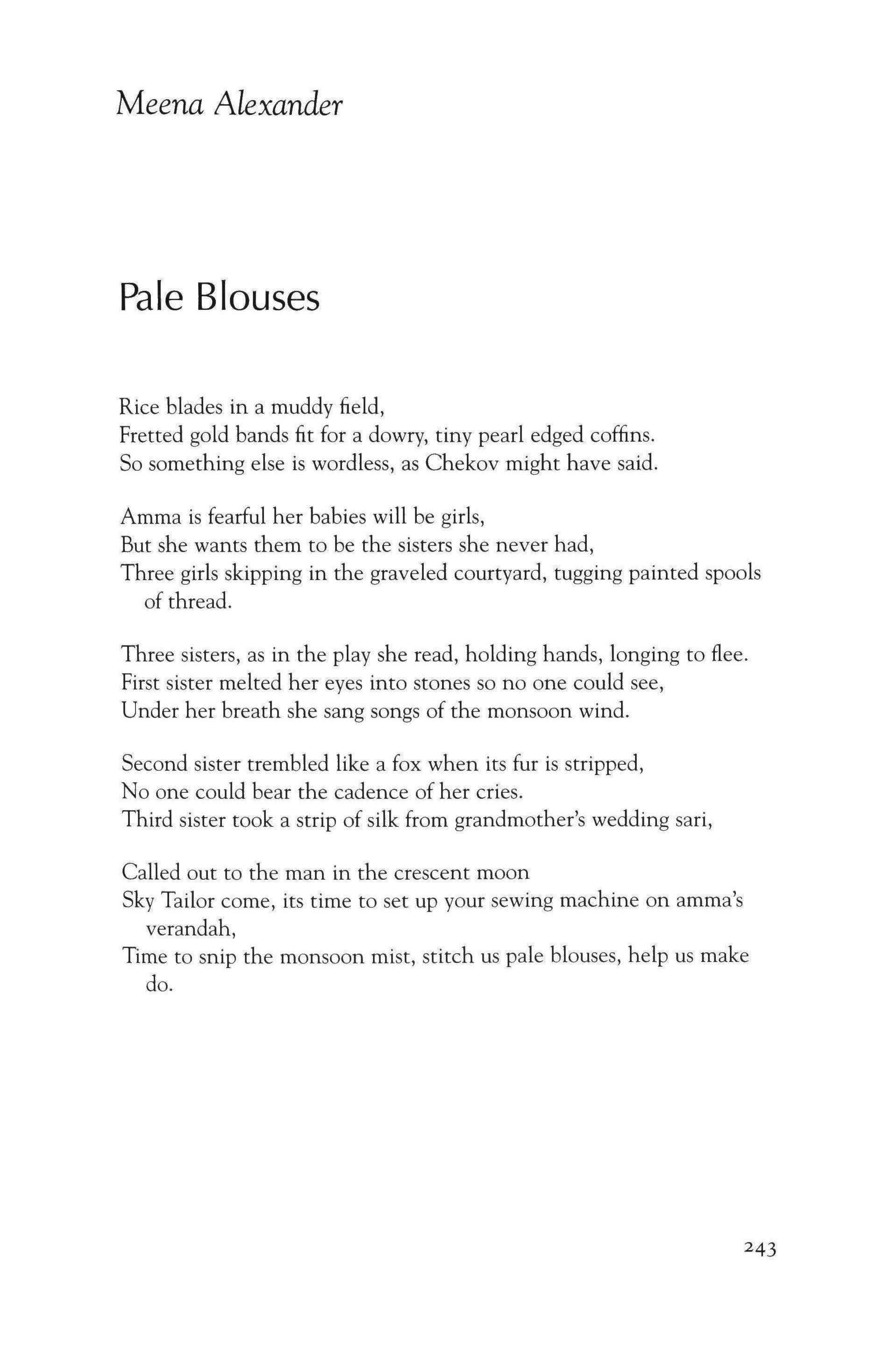
Pale Blouses
Rice blades in a muddy field, Fretted gold bands fit for a dowry, tiny pearl edged coffins. So something else is wordless, as Chekov might have said.
Amma is fearful her babies will be girls, But she wants them to be the sisters she never had, Three girls skipping in the graveled courtyard, tugging painted spools of thread.
Three sisters, as in the play she read, holding hands, longing to flee. First sister melted her eyes into stones so no one could see, Under her breath she sang songs of the monsoon wind.
Second sister trembled like a fox when its fur is stripped, No one could bear the cadence of her cries.
Third sister took a strip of silk from grandmother's wedding sari,
Called out to the man in the crescent moon
Sky Tailor come, its time to set up your sewing machine on amma's verandah,
Time to snip the monsoon mist, stitch us pale blouses, help us make do.
243
Plainsong
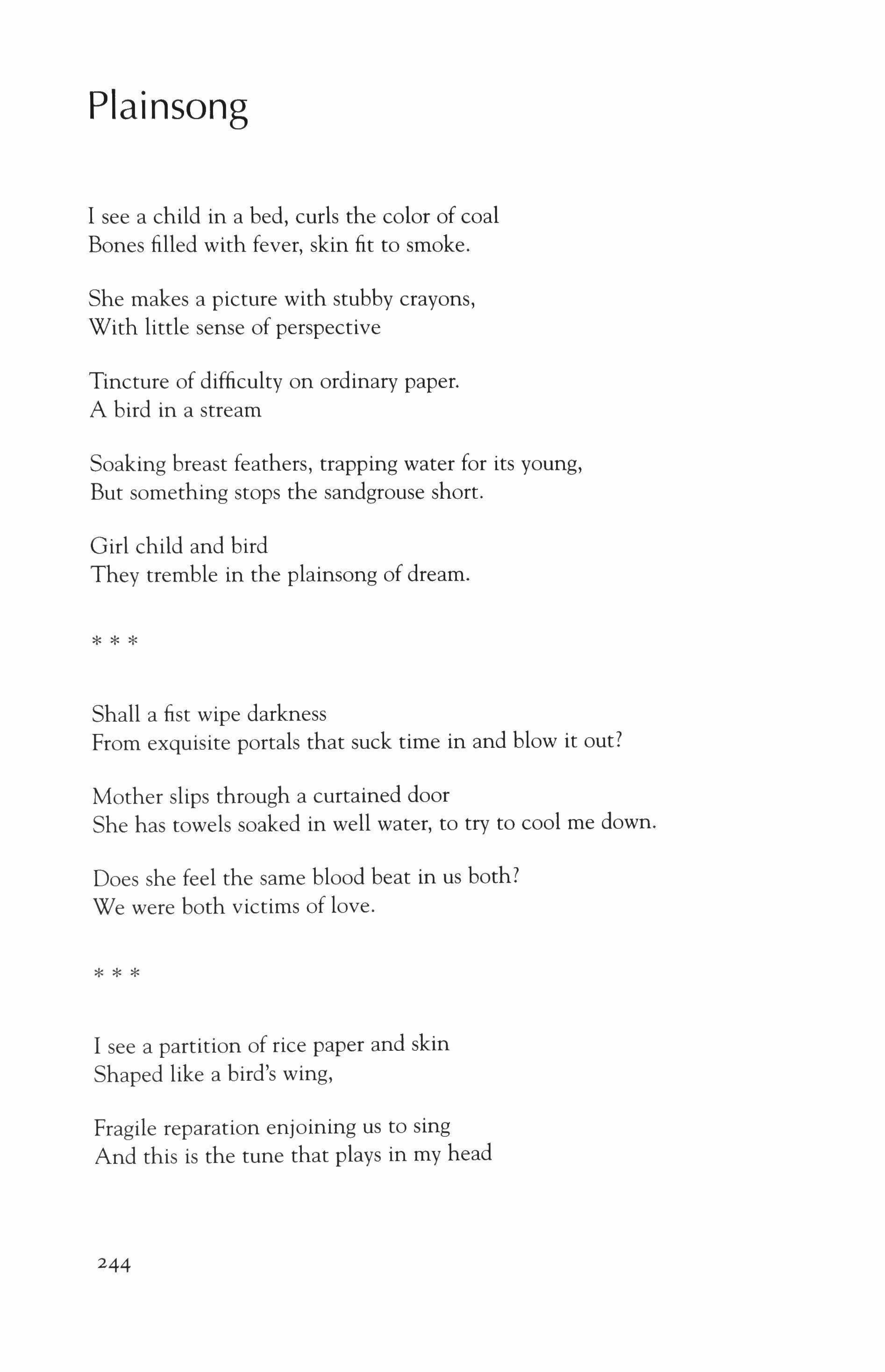
I see a child in a bed, curls the color of coal
Bones filled with fever, skin fit to smoke.
She makes a picture with stubby crayons, With little sense of perspective
Tincture of difficulty on ordinary paper. A bird in a stream
Soaking breast feathers, trapping water for its young, But something stops the sandgrouse short.
Girl child and bird
They tremble in the plainsong of dream. * * *
Shall a fist wipe darkness
From exquisite portals that suck time in and blow it out?
Mother slips through a curtained door
She has towels soaked in well water, to try to cool me down.
Does she feel the same blood beat in us both?
We were both victims of love.
I see a partition of rice paper and skin
Shaped like a bird's wing,
Fragile reparation enjoining us to sing And this is the tune that plays in my head
***
244

As I walk backwards Into a future that was never really mine-
"Something it was That went and transfigured me.
But only the black keys give up their sound. The ivories are still under construction.
245
Mark Irwin
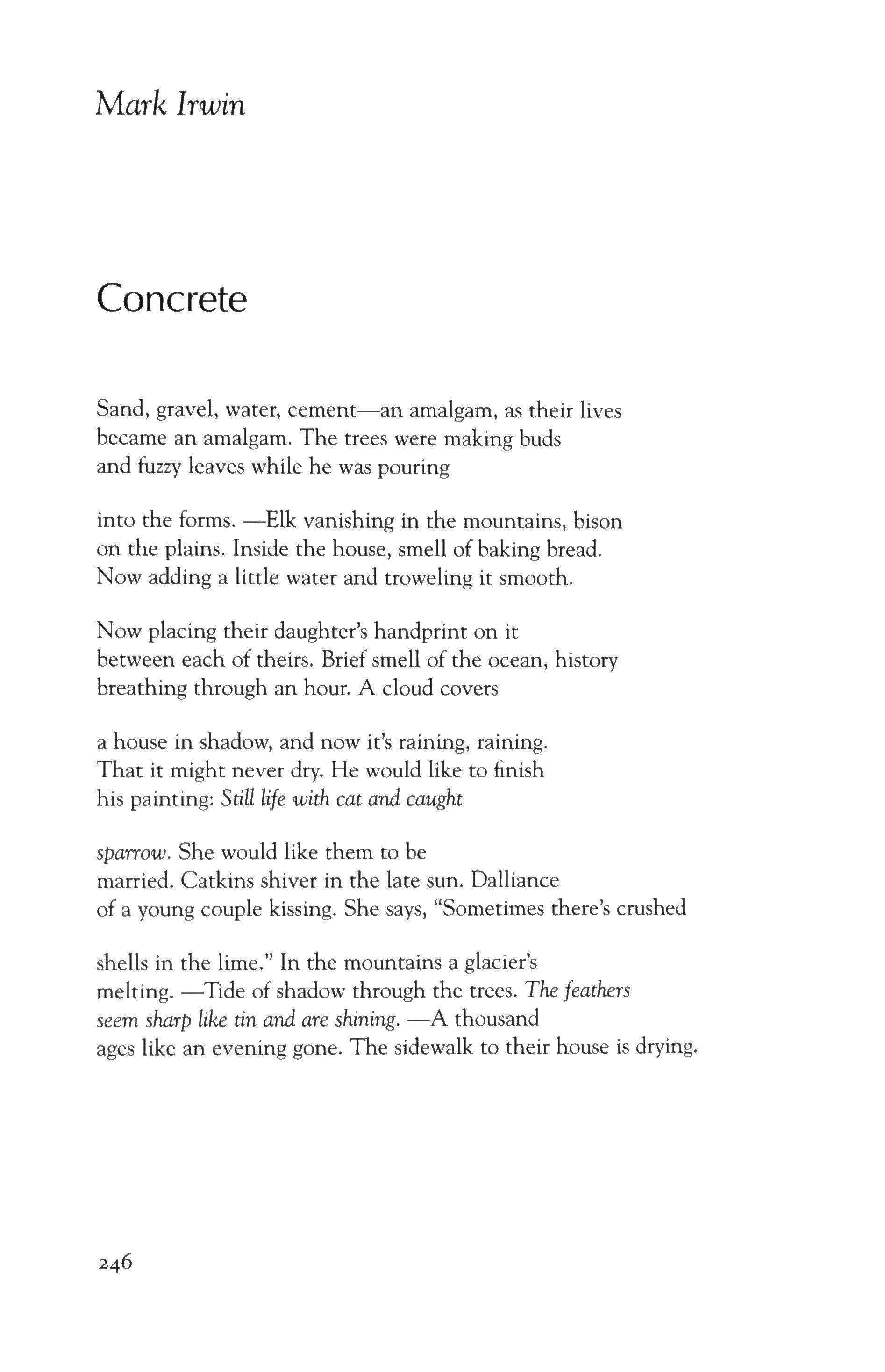
Concrete
Sand, gravel, water, cement-an amalgam, as their lives became an amalgam. The trees were making buds and fuzzy leaves while he was pouring into the forms. -Elk vanishing in the mountains, bison on the plains. Inside the house, smell of baking bread. Now adding a little water and troweling it smooth.
Now placing their daughter's handprint on it between each of theirs. Brief smell of the ocean, history breathing through an hour. A cloud covers a house in shadow, and now it's raining, raining. That it might never dry. He would like to finish his painting: Still life with cat and caught sparrow. She would like them to be married. Catkins shiver in the late sun. Dalliance of a young couple kissing. She says, "Sometimes there's crushed shells in the lime." In the mountains a glacier's melting. -Tide of shadow through the trees. The feathers seem sharp like tin and are shining. -A thousand ages like an evening gone. The sidewalk to their house is drying.
Home

After your death, I stopped on the hill and looked down at our house, but as I approached it did not grow larger. Finally I bent down, picked it up, and put it in my pocket. Now I can never return, but sometimes I'll place that house by my window and watch the tiny, shadowy figures move. If only I could make myself small again, but the years. Sometimes I see clothes, bodiless, spill through that house, a kind of light, then I wake, gripping the sheets.
In one dream I live in a vast country atop a pebble. When people in this country die, they become larger, robbing more and more space from the living, yet they continue to evolve, building smaller houses, raising fewer children, writing smaller and smaller books, until finally everyone thinks for a long time before uttering a word.
247
Yes

Sometimes in the middle of each April when the dandelions stare through our sleep, when the cellophane, tom, glints in the teeth of grass, and the squirrel lobs its orange fire
limb to limb, I am content to gaze into the air engraved with sparrows and rain, into the wonderfully out-of-focus green in all its flux. Then the word yes finds all its creeks and rivers, then our cries are urgent and palpable as gravel thrown into water. Surprised we blink and are taken. Then I remember
that my question, having something to do with light, has come a long way, and now I would like to tell you something else in the language of petals, something about winter and the stones placed upon so many dead.

And the tide came in and the tide went out. And when the sun set over the burnt trees and toppled buildings, there was a gilded loss.
And each of us had a little book, and we began to gnaw on it till the words came or we remained dumb and silent. And each of us had a little stick with which to walk, and we leaned on them and looked over all we had ruined. And each of us had a little bowl and each began to pour its contents into another, and we did this over and over until all the bowIs had been poured and were empty, then we all smiled, holding nothing, and were happy.
Psalm
249
Alix Ohlin

Vigo Park
There's a gun at the beginning of this story, placed here so that you know it's going to go offby the end. That's just the way it is; you've been warned. Call it fate, call it destiny, call it the inevitable consequence of certain destructive but all too common human behaviors. There's no changing the ending, however dramatic and/or ugly and/or contrived and/or sad it might seem to you. Better accept it now.
The gun (it's an ancient Glock brought back from Germany, looted from some soldier during WWII-not that this matters, ultimately) is in the coat pocket of a man on the 24 bus, which is heading to Vigo Park. It's winter, and the way he hunches over, with his hands meeting across his lap, seems natural for someone who is protecting himself from the cold. Underneath his coat, though, he is taking off the glove of one hand and then the other, and then touching the gun-which his father, who was a responsible man, had kept unloaded and locked in a cabinet in his house until he died-with his bare fingers. The ring on his left hand makes a clinking sound against the metal of the gun, but nobody on the bus hears it. Despite all that's happened he hasn't been able to bring himself to take it off. Whenever he starts to slide the ring off his finger he sees his wife in his mind's eye, the way she cried on their wedding day when he put it on. A tear ofhappiness, of pure, liquid emotion. To take it off would be to acknowledge all the ways he has hurt her, and that is more than he can stand to do.
A fat man in a sheepskin jacket sits down next to him at this point, and so he stops touching the gun, which has made him feel kind of mas-
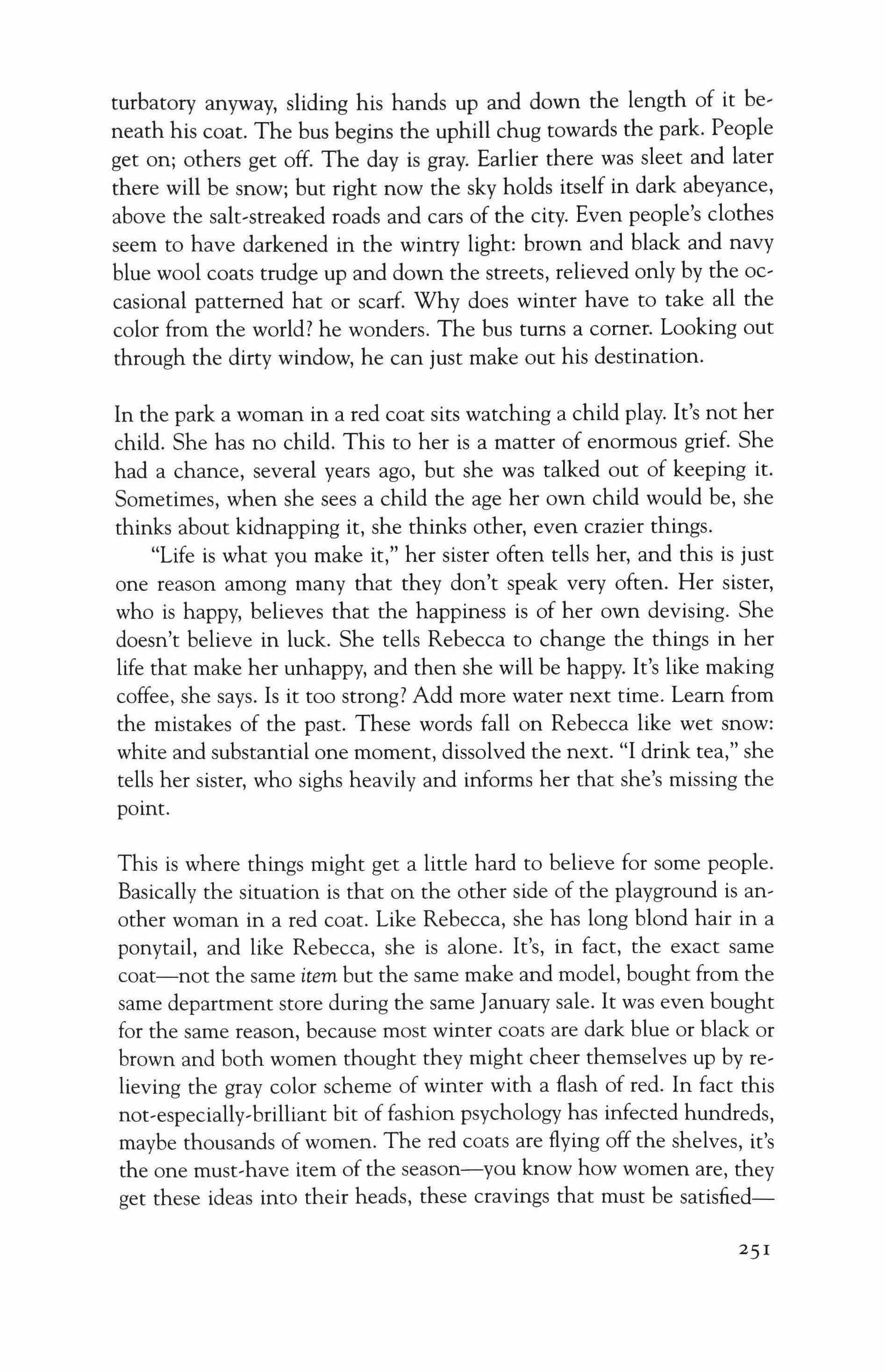
turbatory anyway, sliding his hands up and down the length of it beneath his coat. The bus begins the uphill chug towards the park. People get on; others get off. The day is gray. Earlier there was sleet and later there will be snow; but right now the sky holds itself in dark abeyance, above the salt-streaked roads and cars of the city. Even people's clothes seem to have darkened in the wintry light: brown and black and navy blue wool coats trudge up and down the streets, relieved only by the occasional patterned hat or scarf. Why does winter have to take all the color from the world? he wonders. The bus turns a comer. Looking out through the dirty window, he can just make out his destination.
In the park a woman in a red coat sits watching a child play. It's not her child. She has no child. This to her is a matter of enormous grief. She had a chance, several years ago, but she was talked out of keeping it. Sometimes, when she sees a child the age her own child would be, she thinks about kidnapping it, she thinks other, even crazier things.
"Life is what you make it," her sister often tells her, and this is just one reason among many that they don't speak very often. Her sister, who is happy, believes that the happiness is of her own devising. She doesn't believe in luck. She tells Rebecca to change the things in her life that make her unhappy, and then she will be happy. It's like making coffee, she says. Is it too strong? Add more water next time. Learn from the mistakes of the past. These words fall on Rebecca like wet snow: white and substantial one moment, dissolved the next. "I drink tea," she tells her sister, who sighs heavily and informs her that she's missing the point.
This is where things might get a little hard to believe for some people. Basically the situation is that on the other side of the playground is an; other woman in a red coat. Like Rebecca, she has long blond hair in a ponytail, and like Rebecca, she is alone. It's, in fact, the exact same coat-not the same item but the same make and model, bought from the same department store during the same January sale. It was even bought for the same reason, because most winter coats are dark blue or black or brown and both women thought they might cheer themselves up by relieving the gray color scheme of winter with a flash of red. In fact this not-especially-brilliant bit of fashion psychology has infected hundreds, maybe thousands of women. The red coats are flying off the shelves, it's the one must-have item of the season-you know how women are, they get these ideas into their heads, these cravings that must be satisfied-

and Tori has come to regret her purchase, seeing it on so many other women, has come to feel generic in her thoughts and emotions, which is, frankly, the last thing she needs right about now. Looking across the park at Rebecca she thinks, oh, great, another one. Why do 1 even bother? Which is a question she's asking herself more and more often these days. She glances at the other woman, who seems to be waiting for someone, the same way she is. Automatically in her head she compares the woman's looks to her own-the woman looks a few years, maybe ten years, older, and is thinner, too thin really, a stick-and decides, after some thought, that the coat looks better on her, Tori. Knowing her satisfaction in this victory is shallow doesn't mean she isn't still satisfied. Frank always tells her, after sex, that she is beautiful, in a tone of wonderment and joy she has to believe is genuine. In life you have to believe that some things are real or you just die. You die, even if you stay alive.
In the playground children are chasing each other, swaddled in snowsuits that give them sausage legs and arms. Sometimes she used to daydream about the children she would have with Frank, gave them names and chose clothes for them, but these were daydreams, nothing more. Tommy had wanted to have kids immediately, he never thought about the consequences of these things, he never thought about supporting them or not being able to stay out drinking until five in the morning, he was like a child himself. On the day they got married, in his parents' backyard, he held the ring solemnly for a moment before slipping it on her finger, and she thought then, with a sad, small shock of recognition, that he looked like less like a new husband than a child with a new toy in his hands. He was a child who wanted a child and she had to be the adult for both of them, always fighting with him, always saying it's too soon and let's just wait and there will be time and it was too much for her, she was tired all the time, until she met Frank and saw a different vision of what life could be. There was the death of hope and then there was the beginning of it, and sometimes in her memory she could no longer separate the two.
She says his name out loud, just to say it. Frank. She misses him.
At the sound of her voice-and she thought she'd said it quietlythe other woman in the red coat turns around. There is a nod, a chagrined, hey-you've-the-same-coat smile. They don't see themselves as doppelgangers or anything like that. They're just two women with the same coat, okay? It happens.
Tori wonders what Tommy is doing right now. It's his second week offour in rehab, a time ofpotential maximum hostility, the therapist has
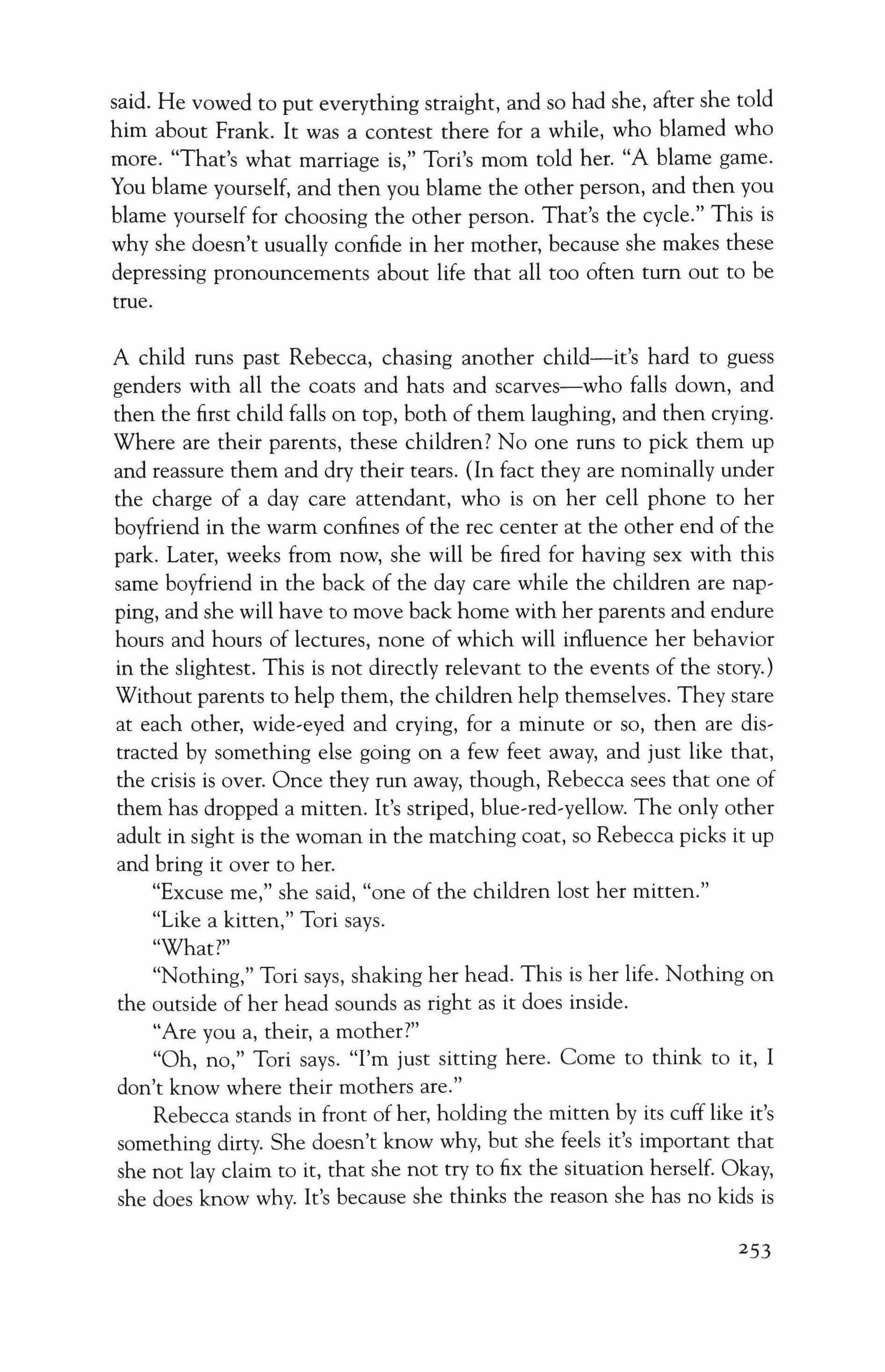
said. He vowed to put everything straight, and so had she, after she told him about Frank. It was a contest there for a while, who blamed who more. "That's what marriage is," Tori's mom told her. "A blame game. You blame yourself, and then you blame the other person, and then you blame yourself for choosing the other person. That's the cycle." This is why she doesn't usually confide in her mother, because she makes these depressing pronouncements about life that all too often tum out to be true.
A child runs past Rebecca, chasing another child-it's hard to guess genders with all the coats and hats and scarves-who falls down, and then the first child falls on top, both of them laughing, and then crying. Where are their parents, these children? No one runs to pick them up and reassure them and dry their tears. (In fact they are nominally under the charge of a day care attendant, who is on her cell phone to her boyfriend in the warm confines of the rec center at the other end of the park. Later, weeks from now, she will be fired for having sex with this same boyfriend in the back of the day care while the children are napping, and she will have to move back home with her parents and endure hours and hours of lectures, none of which will influence her behavior in the slightest. This is not directly relevant to the events of the story.) Without parents to help them, the children help themselves. They stare at each other, wide-eyed and crying, for a minute or so, then are distracted by something else going on a few feet away, and just like that, the crisis is over. Once they run away, though, Rebecca sees that one of them has dropped a mitten. It's striped, blue-red-yellow. The only other adult in sight is the woman in the matching coat, so Rebecca picks it up and bring it over to her.
"Excuse me," she said, "one of the children lost her mitten."
"Like a kitten," Tori says.
"What?"
"Nothing," Tori says, shaking her head. This is her life. Nothing on the outside of her head sounds as right as it does inside.
"Are you a, their, a mother?"
"Oh, no," Tori says. "I'm just sitting here. Come to think to it, I don't know where their mothers are."
Rebecca stands in front of her, holding the mitten by its cuff like it's something dirty. She doesn't know why, but she feels it's important that she not lay claim to it, that she not try to fix the situation herself. Okay, she does know why. It's because she thinks the reason she has no kids is
253
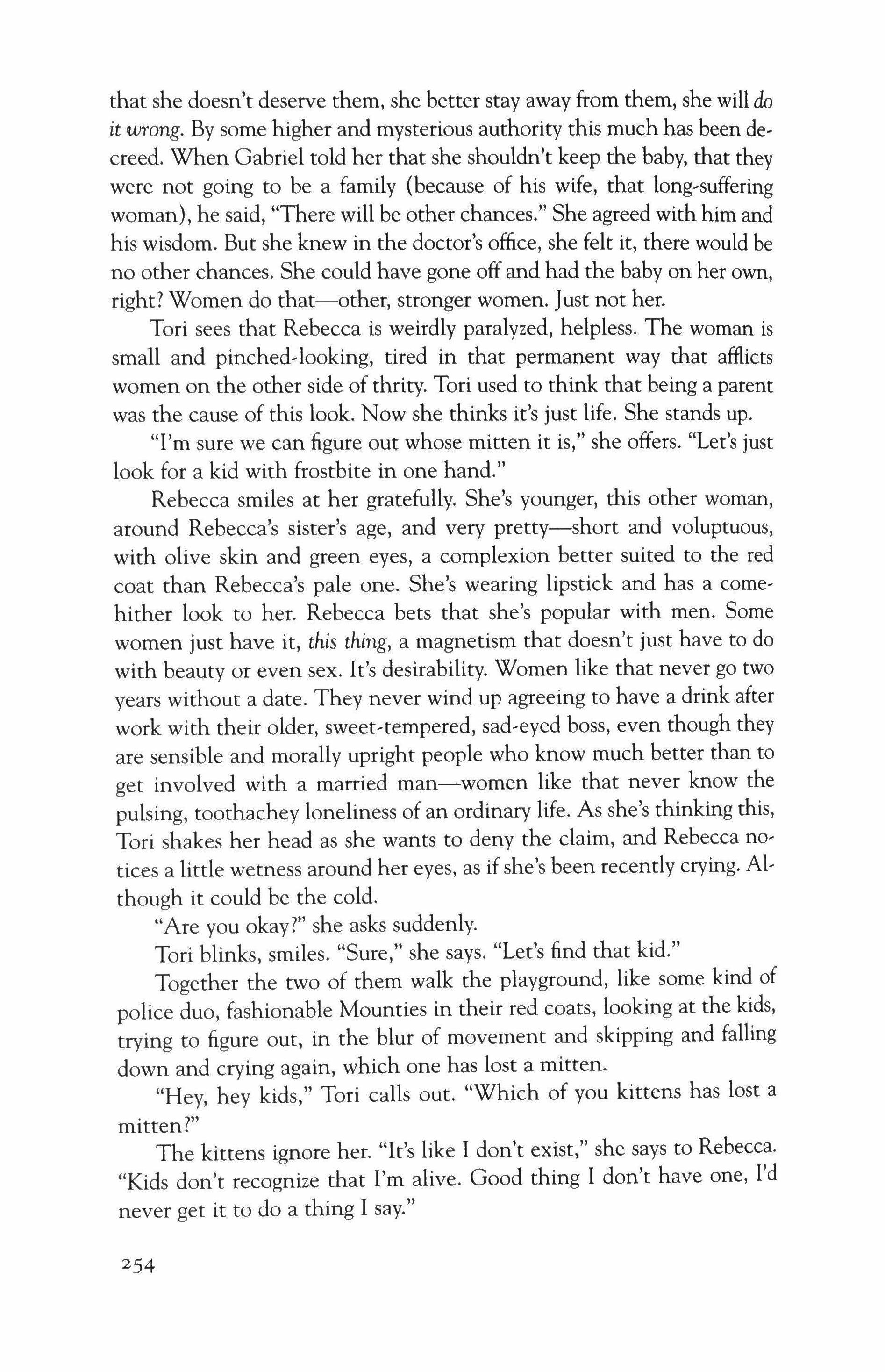
that she doesn't deserve them, she better stay away from them, she will do it <Wrong. By some higher and mysterious authority this much has been decreed. When Gabriel told her that she shouldn't keep the baby, that they were not going to be a family (because of his wife, that long-suffering woman), he said, "There will be other chances." She agreed with him and his wisdom. But she knew in the doctor's office, she felt it, there would be no other chances. She could have gone off and had the baby on her own, right? Women do that-other, stronger women. Just not her.
Tori sees that Rebecca is weirdly paralyzed, helpless. The woman is small and pinched-looking, tired in that permanent way that afflicts women on the other side of thrity. Tori used to think that being a parent was the cause of this look. Now she thinks it's just life. She stands up.
"I'm sure we can figure out whose mitten it is," she offers. "Let's just look for a kid with frostbite in one hand."
Rebecca smiles at her gratefully. She's younger, this other woman, around Rebecca's sister's age, and very pretty-short and voluptuous, with olive skin and green eyes, a complexion better suited to the red coat than Rebecca's pale one. She's wearing lipstick and has a comehither look to her. Rebecca bets that she's popular with men. Some women just have it, this thing, a magnetism that doesn't just have to do with beauty or even sex. It's desirability. Women like that never go two years without a date. They never wind up agreeing to have a drink after work with their older, sweet-tempered, sad-eyed boss, even though they are sensible and morally upright people who know much better than to get involved with a married man-women like that never know the pulsing, toothachey loneliness of an ordinary life. As she's thinking this, Tori shakes her head as she wants to deny the claim, and Rebecca notices a little wetness around her eyes, as if she's been recently crying. Although it could be the cold.
"Are you okay?" she asks suddenly.
Tori blinks, smiles. "Sure," she says. "Let's find that kid."
Together the two of them walk the playground, like some kind of police duo, fashionable Mounties in their red coats, looking at the kids, trying to figure out, in the blur of movement and skipping and falling down and crying again, which one has lost a mitten.
"Hey, hey kids," Tori calls out. "Which of you kittens has lost a mitten?"
The kittens ignore her. "It's like I don't exist," she says to Rebecca. "Kids don't recognize that I'm alive. Good thing I don't have one, I'd never get it to do a thing I say."
254
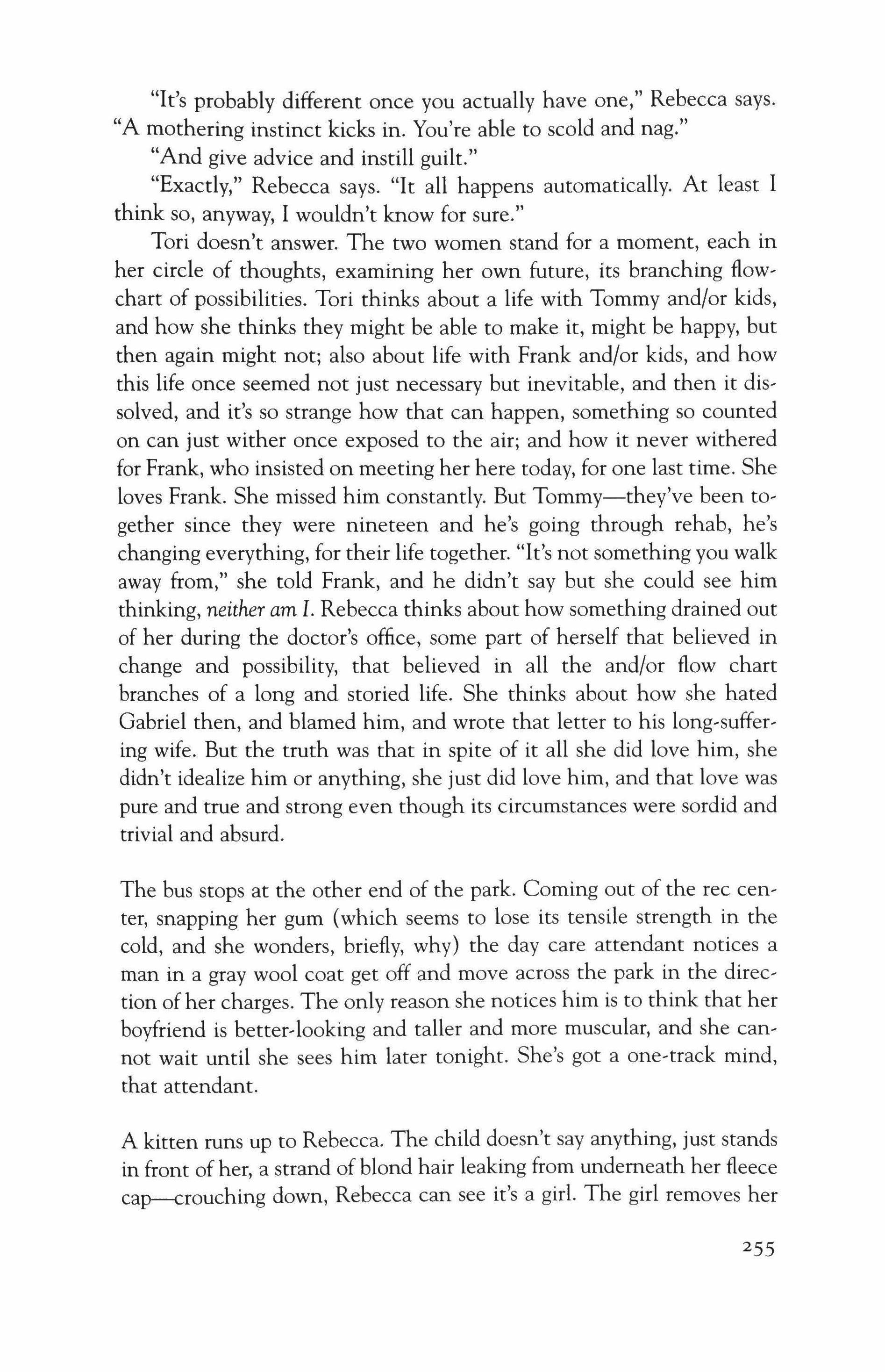
"It's probably different once you actually have one," Rebecca says. "A mothering instinct kicks in. You're able to scold and nag."
"And give advice and instill guilt."
"Exactly," Rebecca says. "It all happens automatically. At least I think so, anyway, I wouldn't know for sure."
Tori doesn't answer. The two women stand for a moment, each in her circle of thoughts, examining her own future, its branching flow, chart of possibilities. Tori thinks about a life with Tommy and/or kids, and how she thinks they might be able to make it, might be happy, but then again might not; also about life with Frank and/or kids, and how this life once seemed not just necessary but inevitable, and then it dis, solved, and it's so strange how that can happen, something so counted on can just wither once exposed to the air; and how it never withered for Frank, who insisted on meeting her here today, for one last time. She loves Frank. She missed him constantly. But Tommy-they've been to' gether since they were nineteen and he's going through rehab, he's changing everything, for their life together. "It's not something you walk away from," she told Frank, and he didn't say but she could see him thinking, neither am 1. Rebecca thinks about how something drained out of her during the doctor's office, some part of herself that believed in change and possibility, that believed in all the and/or flow chart branches of a long and storied life. She thinks about how she hated Gabriel then, and blamed him, and wrote that letter to his long'suffer, ing wife. But the truth was that in spite of it all she did love him, she didn't idealize him or anything, she just did love him, and that love was pure and true and strong even though its circumstances were sordid and trivial and absurd.
The bus stops at the other end of the park. Coming out of the rec center, snapping her gum (which seems to lose its tensile strength in the cold, and she wonders, briefly, why) the day care attendant notices a man in a gray wool coat get off and move across the park in the direction of her charges. The only reason she notices him is to think that her boyfriend is better,looking and taller and more muscular, and she can, not wait until she sees him later tonight. She's got a one-track mind, that attendant.
A kitten runs up to Rebecca. The child doesn't say anything, just stands in front ofher, a strand of blond hair leaking from underneath her fleece cap--crouching down, Rebecca can see it's a girL The girl removes her
255

hand from the pocket ofher snowsuit and shows it to Rebecca, shyly, like an injury of which she is ashamed. Their eyes meet.
"It's okay," Rebecca says mechanically, and the child nods. "Come here."
She fits the mitten over the small, white hand and tugs it down to the wrist. The child is so close that she can smell the sour yet wholesome smell of her skin. The two of them look at each other, the child still holding up her mitten, as if Rebecca isn't done yet. What's left to do? A kiss on the forehead, a "You're dismissed?" What's the protocol? Then she realizes that she has put the mitten on wrong, so that the child's thumb and the mitten's thumb do not match up. So she has to pull the mitten off and start again, the child, all the while, still staring. Rebecca's starting to wonder if there's something wrong with the kid, with the whole lot of them, and that's why they've been abandoned to play by themselves in the park.
Tori, meanwhile, is standing next to her, standing up, in her red coat, her long blond hair snaking down her back. From the back, of course, she looks just like Rebecca. Only one thought exists in her mind: Frank.
The man coming towards all three of them, with the gun warm in his hand, could be Gabriel or Frank or even Tommy, escaped from rehab. But not all of them; only one. As it turns out, it's Gabriel. It's the sad-eyed ones you have to watch out for-another piece of advice that could usefully have been given to Rebecca, but which she would probably have ignored.
You can see where this is going, right? With the red coats, and the blond hair? There's no surprise in this for you.
From a distance of ten yards Gabriel sees only Tori's back, and he is so blinded by his belief that she is Rebecca-the woman who wrote a letter to his long-suffering wife-that he doesn't even notice that other form crouched down next her. If he noticed it at all, he might have thought it was a bundled coat or a child or a sled. His look was that focused, the world outside it that peripheral. The day care attendant puts away her cell phone, wonders who all these adults are in the vicinity of her charges, and sees him pull out a gun and fire. A woman in a red coat falls to the ground, lightly, almost casually, as if in jest.
The attendant starts to run. Children are screaming, others are running away. Rebecca lets go of the mitten and stands up and turns around, in the direction of the noise. She thinks of cars: backfires, accidents. Guns are not a standard element in her thinking. She doesn't
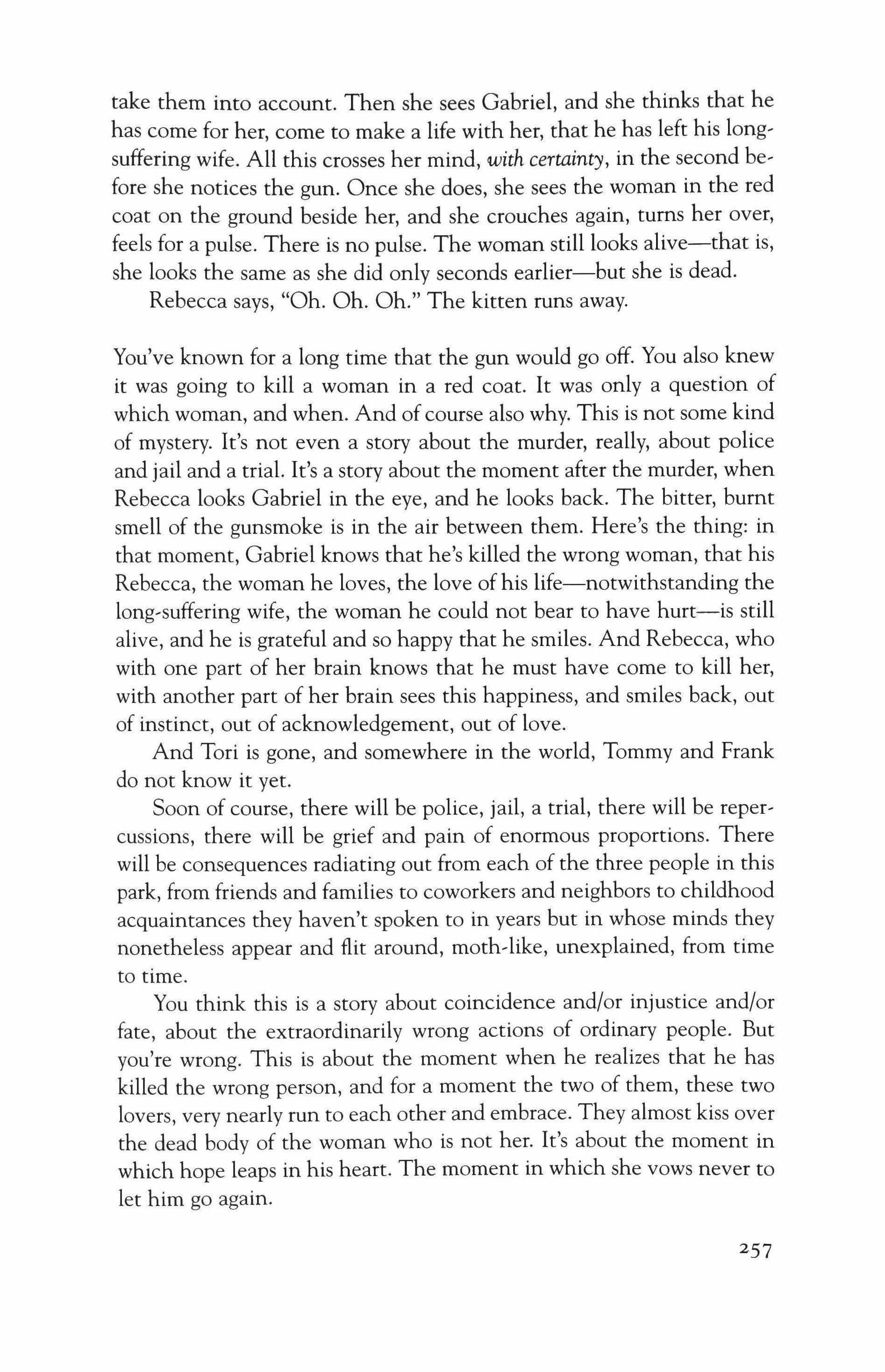
take them into account. Then she sees Gabriel, and she thinks that he has come for her, come to make a life with her, that he has left his longsuffering wife. All this crosses her mind, with certainty, in the second before she notices the gun. Once she does, she sees the woman in the red coat on the ground beside her, and she crouches again, turns her over, feels for a pulse. There is no pulse. The woman still looks alive-that is, she looks the same as she did only seconds earlier-but she is dead.
Rebecca says, "Oh. Oh. Oh." The kitten runs away.
You've known for a long time that the gun would go off. You also knew it was going to kill a woman in a red coat. It was only a question of which woman, and when. And of course also why. This is not some kind of mystery. It's not even a story about the murder, really, about police and jail and a trial. It's a story about the moment after the murder, when Rebecca looks Gabriel in the eye, and he looks back. The bitter, burnt smell of the gunsmoke is in the air between them. Here's the thing: in that moment, Gabriel knows that he's killed the wrong woman, that his Rebecca, the woman he loves, the love of his life-notwithstanding the long-suffering wife, the woman he could not bear to have hurt-is still alive, and he is grateful and so happy that he smiles. And Rebecca, who with one part of her brain knows that he must have come to kill her, with another part of her brain sees this happiness, and smiles back, out of instinct, out of acknowledgement, out of love.
And Tori is gone, and somewhere in the world, Tommy and Frank do not know it yet.
Soon of course, there will be police, jail, a trial, there will be repercussions, there will be grief and pain of enormous proportions. There will be consequences radiating out from each of the three people in this park, from friends and families to coworkers and neighbors to childhood acquaintances they haven't spoken to in years but in whose minds they nonetheless appear and flit around, moth-like, unexplained, from time to time.
You think this is a story about coincidence and/or injustice and/or fate, about the extraordinarily wrong actions of ordinary people. But you're wrong. This is about the moment when he realizes that he has killed the wrong person, and for a moment the two of them, these two lovers, very nearly run to each other and embrace. They almost kiss over the dead body of the woman who is not her. It's about the moment in which hope leaps in his heart. The moment in which she vows never to let him go again.
257
Vincent Precht
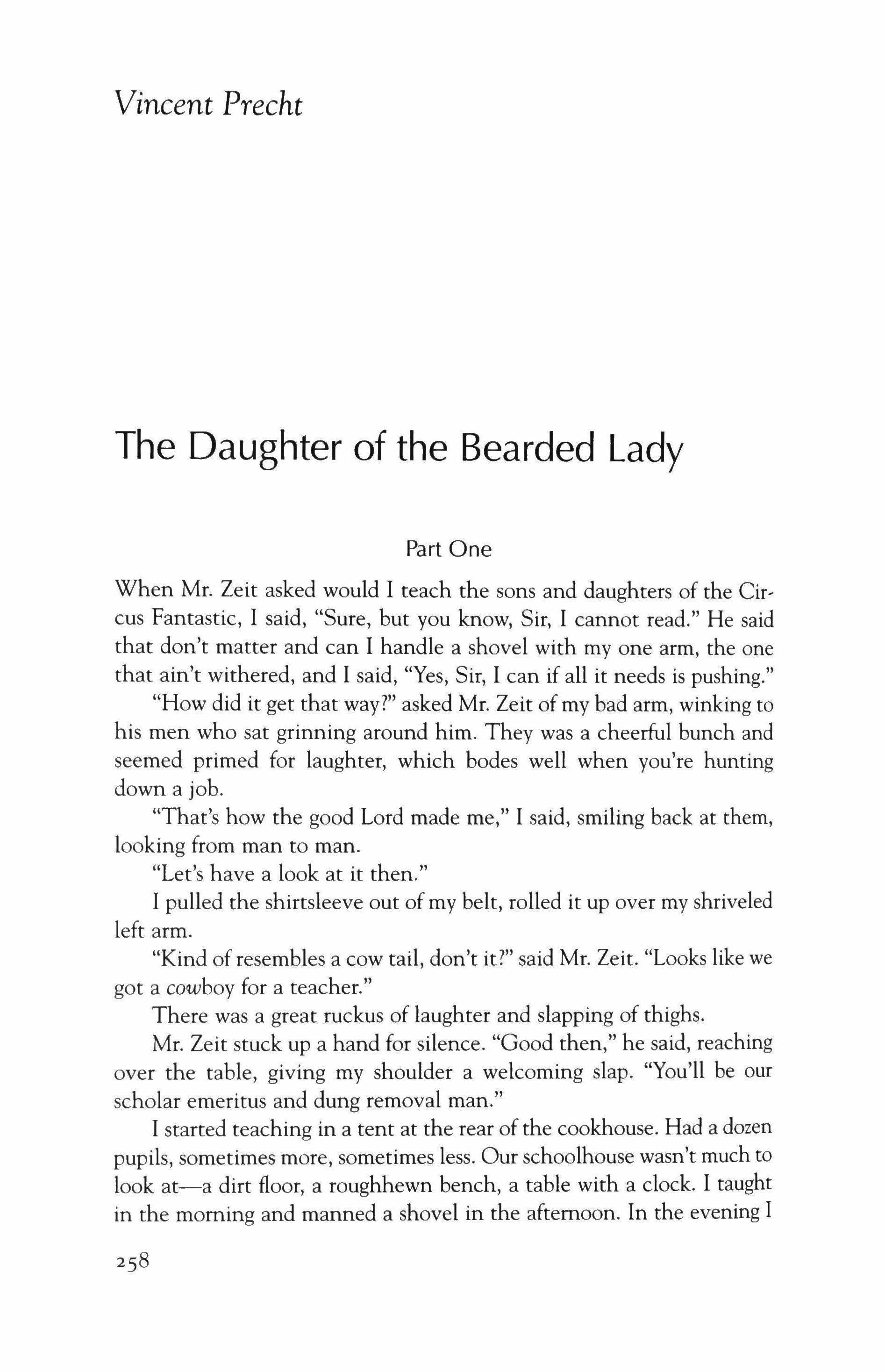
The Daughter of the Bearded Lady
Part One
When Mr. Zeit asked would I teach the sons and daughters of the Circus Fantastic, I said, "Sure, but you know, Sir, I cannot read." He said that don't matter and can I handle a shovel with my one arm, the one that ain't withered, and I said, "Yes, Sir, I can if all it needs is pushing."
"How did it get that way?" asked Mr. Zeit of my bad arm, winking to his men who sat grinning around him. They was a cheerful bunch and seemed primed for laughter, which bodes well when you're hunting down a job.
"That's how the good Lord made me," I said, smiling back at them, looking from man to man.
"Let's have a look at it then."
I pulled the shirtsleeve out of my belt, rolled it up over my shriveled left arm.
"Kind of resembles a cow tail, don't it?" said Mr. Zeit. "Looks like we got a cowboy for a teacher."
There was a great ruckus of laughter and slapping of thighs.
Mr. Zeit stuck up a hand for silence. "Good then," he said, reaching over the table, giving my shoulder a welcoming slap. "You'll be our scholar emeritus and dung removal man."
I started teaching in a tent at the rear of the cookhouse. Had a dozen pupils, sometimes more, sometimes less. Our schoolhouse wasn't much to look at-a dirt floor, a roughhewn bench, a table with a clock. I taught in the morning and manned a shovel in the afternoon. In the evening I

studied my Eclectic Reader. Ax, Hen, Ink, Jug. I learned my letters and my sounds. Arithmetic was my strong suit. I had a facility with figures. There are fewer numbers than letters, ten to your twenty-six. And when you put up your numbers you get changes in value. There ain't no diphthongs-such demons as oy in toy, or ing in Ming-like you get in words. I shared a tent with Dingle, shovel jock and clown. He had a trunk of books by great minds that seemed to make him angry. Your Shake, speare, your Dickens. When he finished a book, he slammed it shut loudly and found me with a scowl. He was a scribbler himself who balled up most ofwhat he writ. Between slamming and balling he sought to improve me.
"How does a widower come to be a teacher?" he asked early in our acquaintance, stretched out on his cot, holding a book to his nose.
"My wife's passing put me to wandering," I explained. "And I've wanted to be a trouper ever since I was a kid."
"And how is it you never came to read?"
"Well, my daddy was a smithy. He saw no need."
Dingle rolled over to regard me. "Didn't he? Well, what exactly did he see a need for?"
"Hard work."
"Pshaw!"
The big top had grown so over the years a clown could no longer speak to the audience, but had to gesture and throw himself about. This angered our Dingle as it would any soul with something to say. He and Mr. Zeit had words about it, which was one story Dingle refused to relate. He was a good clown, though, and a fine mimic. Was convincing as a little old lady or the president of the United States. But mostly he was a grave thinker who suffered neither fools nor statesmen nor math, ematicians like myself.
Our cots lay parallel, his book trunk between. Presently, he reached into it and tossed me a volume, Treasure Island.
"Read," he said.
The lines was long, like a train without end, the words like boxcars with no daylight between them.
"I can't," I replied.
"Peruse the pictures."
"Roll call."
Everyday I took attendance even though we was only twelve.
"Is Richard here?" I sang out.
259

Son of Wanda the Reptile Lady, Richard always slept through school. Many a time I found myself at the door of his mother's tent. "Ma'am, your little boy can't read, which ain't nothing because neither can I, but you are denying him the company of his playmates."
Next came Bobby.
"Is Robert Dugan present?"
He always was, but never replied. The son of the Human Cannonball, he took over his poppa's act after the old man got drunk and shot himself into the bleachers. Bobby called me names: "big man" and "slim fellow." When I told him, "That's no way to speak to your teacher," he spat on the floor.
"Molasses?" I called to a little girl with bent-up spectacles who always liked to keep me nearby.
She was the daughter of our advance man, Gluey, although her moniker had nothing to do with his. They named her Molasses because she was a slow-flowing girl. "What's one plus one?" "Three," she replied.
And then there was Baby Luis.
"Is Mr. Luis present?" I asked and lifted him into my arms.
Baby Luis, a talkative sort, liked to groom my whiskers. His mamma brought him in when he was seven months old. "Ma'am, I ain't set up for babies here." But he was a smart little man, and we got along all right.
There was others that came and went, children whose names I cannot recall. We held class in the morning for I needed to man the shovel later on. In the nighttime I reported to Dingle.
"How are your ABCs?" he queried.
"Slippery," I replied.
"And your pupils?"
"Willing."
"How's young Bobby Dugan?"
"Oh, he's all right."
"That kid's a bad seed."
"That may be so. But he's got some smarts."
It was true. Bobby sat stewing for long stretches, but the answers that grumbled up out ofhim was mostly correct. I stuck up for the boy, but Dingle's mind was set. He swatted me a "pshaw" and returned to his book.
One day, he tossed me Bullfinch's Mythology. He knew I couldn't read none of it and was tickled when I tried.
"Who's that?" I said, holding up the book, pointing at a picture.
"That's Zeus," he explained, and then, "That's Apollo That's Hera," as I turned the leaves.
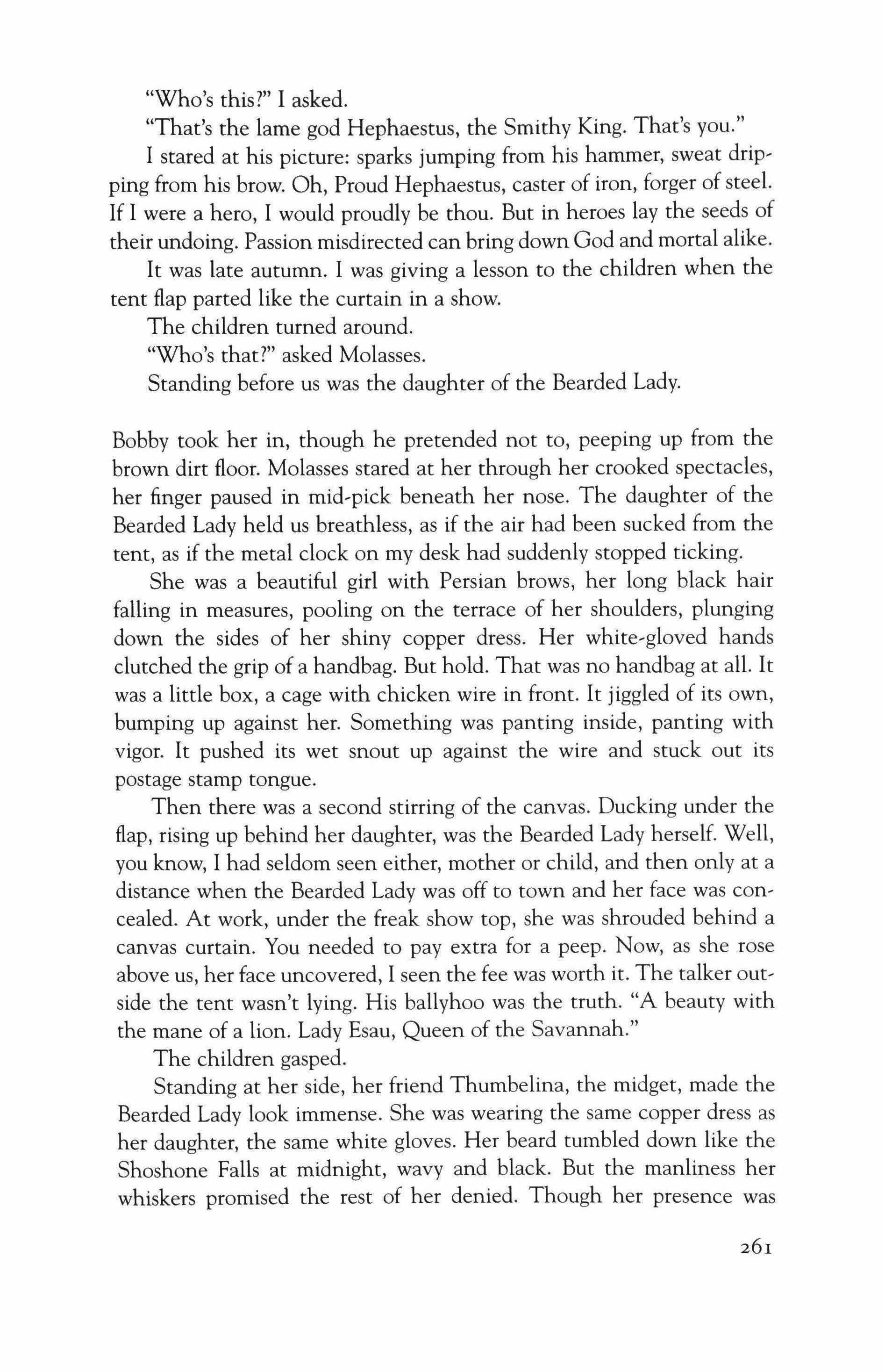
"Who's this?" I asked.
"That's the lame god Hephaestus, the Smithy King. That's you."
I stared at his picture: sparks jumping from his hammer, sweat dripping from his brow. Oh, Proud Hephaestus, caster of iron, forger of steel. If I were a hero, I would proudly be thou. But in heroes lay the seeds of their undoing. Passion misdirected can bring down God and mortal alike. It was late autumn. I was giving a lesson to the children when the tent flap parted like the curtain in a show.
The children turned around.
"Who's that?" asked Molasses.
Standing before us was the daughter of the Bearded Lady.
Bobby took her in, though he pretended not to, peeping up from the brown dirt floor. Molasses stared at her through her crooked spectacles, her finger paused in mid-pick beneath her nose. The daughter of the Bearded Lady held us breathless, as if the air had been sucked from the tent, as if the metal clock on my desk had suddenly stopped ticking.
She was a beautiful girl with Persian brows, her long black hair falling in measures, pooling on the terrace of her shoulders, plunging down the sides of her shiny copper dress. Her white-gloved hands clutched the grip of a handbag. But hold. That was no handbag at all. It was a little box, a cage with chicken wire in front. It jiggled of its own, bumping up against her. Something was panting inside, panting with vigor. It pushed its wet snout up against the wire and stuck out its postage stamp tongue.
Then there was a second stirring of the canvas. Ducking under the flap, rising up behind her daughter, was the Bearded Lady herself. Well, you know, I had seldom seen either, mother or child, and then only at a distance when the Bearded Lady was off to town and her face was concealed. At work, under the freak show top, she was shrouded behind a canvas curtain. You needed to pay extra for a peep. Now, as she rose above us, her face uncovered, I seen the fee was worth it. The talker outside the tent wasn't lying. His ballyhoo was the truth. "A beauty with the mane of a lion. Lady Esau, Queen of the Savannah."
The children gasped.
Standing at her side, her friend Thumbelina, the midget, made the Bearded Lady look immense. She was wearing the same copper dress as her daughter, the same white gloves. Her beard tumbled down like the Shoshone Falls at midnight, wavy and black. But the manliness her whiskers promised the rest of her denied. Though her presence was

daunting, she was woman through and through, her bosom full, her voice clean-shaven.
"You're the teacher?" she asked.
"I am."
She studied me. "For how long?"
I had to calculate. "Two months."
"What do you know?"
I told her I was arithmetically endowed.
The animal scuffled in the box. The girl's white-gloved fingers gripped the handle tighter. My eyes met her inky black ones, their unhappiness chasing me back to the box.
"Is it a rat?" I asked.
"It's a dog," said the Bearded Lady. "A Pekingese."
The children giggled. I told them to hush.
"Why don't we take it out of there," I offered. "We can hitch it up outside."
"No," she said. "It stays in the box."
I ain't one to differ with a lady, especially one with a beard. But that pooch looked solemn, and so did the kid. Not yet thirteen, she tried to hold herself with womanly deportment, but with little success. Childlike, her sadness revealed itself-the way she hung her head, her long lashes quivering as she stared at the ground.
"She needs help with her elocution," the Bearded Lady told me. "She falters."
"I'll do what I can."
"Sit," she said to the little girl.
The daughter of the Bearded Lady walked solemnly to the bench, gathered her skirts and sat with the little box on her lap. The children stared at her. Molasses scratched her head.
At Bisbee, Thursday, August 5, 1904
A Congress of Bewildering Attractions A Supreme Achievement in Clean Amusement
All by Rail!
Manheim's Strictly Moral Circus Fantastic
The way it went, Gluey slapped up bills on barns and outhouses before we made our stand. We was a ten-car outfit, had three carved tableau wagons, one gilded bandwagon, and a steam organ that tooted a
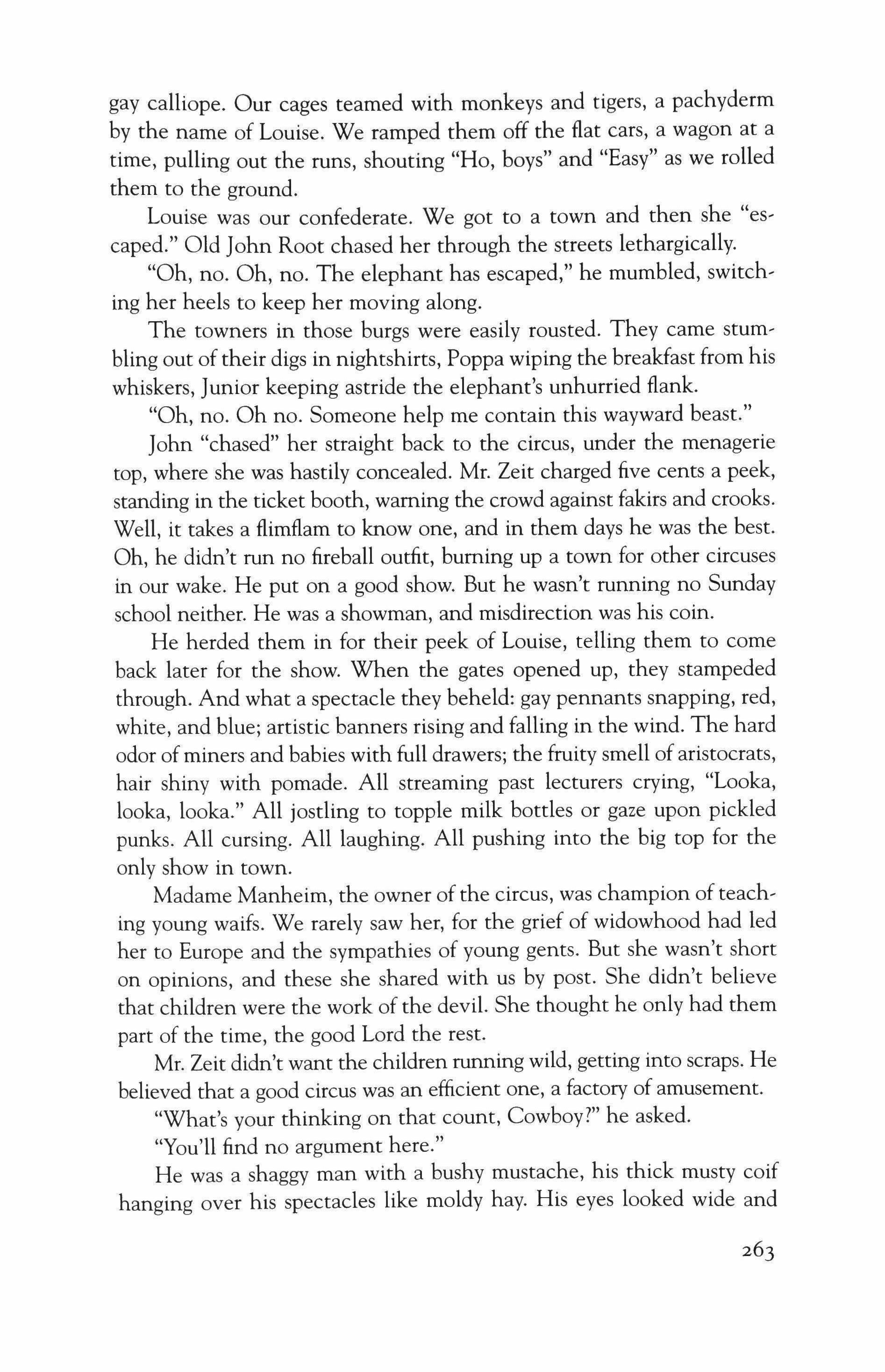
gay calliope. Our cages teamed with monkeys and tigers, a pachyderm by the name of Louise. We ramped them off the flat cars, a wagon at a time, pulling out the runs, shouting "Ho, boys" and "Easy" as we rolled them to the ground.
Louise was our confederate. We got to a town and then she "escaped." Old John Root chased her through the streets lethargically.
"Oh, no. Oh, no. The elephant has escaped," he mumbled, switching her heels to keep her moving along.
The towners in those burgs were easily rousted. They came stumbling out of their digs in nightshirts, Poppa wiping the breakfast from his whiskers, Junior keeping astride the elephant's unhurried flank.
"Oh, no. Oh no. Someone help me contain this wayward beast."
John "chased" her straight back to the circus, under the menagerie top, where she was hastily concealed. Mr. Zeit charged five cents a peek, standing in the ticket booth, warning the crowd against fakirs and crooks. Well, it takes a flimflam to know one, and in them days he was the best. Oh, he didn't run no fireball outfit, burning up a town for other circuses in our wake. He put on a good show. But he wasn't running no Sunday school neither. He was a showman, and misdirection was his coin.
He herded them in for their peek of Louise, telling them to come back later for the show. When the gates opened up, they stampeded through. And what a spectacle they beheld: gay pennants snapping, red, white, and blue; artistic banners rising and falling in the wind. The hard odor of miners and babies with full drawers; the fruity smell of aristocrats, hair shiny with pomade. All streaming past lecturers crying, "Looka, looka, looka." All jostling to topple milk bottles or gaze upon pickled punks. All cursing. All laughing. All pushing into the big top for the only show in town.
Madame Manheim, the owner of the circus, was champion of teaching young waifs. We rarely saw her, for the grief of widowhood had led her to Europe and the sympathies of young gents. But she wasn't short on opinions, and these she shared with us by post. She didn't believe that children were the work of the devil. She thought he only had them part of the time, the good Lord the rest.
Mr. Zeit didn't want the children running wild, getting into scraps. He believed that a good circus was an efficient one, a factory of amusement.
"What's your thinking on that count, Cowboy?" he asked.
"You'll find no argument here."
He was a shaggy man with a bushy mustache, his thick musty coif hanging over his spectacles like moldy hay. His eyes looked wide and

watchful behind their lenses, beady and suspicious when he pulled them off. He had a stealth way of appearing and checking on our welfare. Him and his man Looks Like, the lank fellow that followed him about.
"How are we doing?" was his words one day, suddenly appearing in the tent.
"Fine, Mr. Zeit," I replied.
He carried a riding crop, which he liked to fiddle with in his leathergloved hands. "And the new one?"
"Also good."
He moved up behind the daughter of the Bearded Lady. "Learning her figures?" He lifted her hair with the tip of the riding crop and let it fall.
"She is," I replied.
The girl didn't tum her head. A crescent of her pale cheek was all he got.
Bobby shot him a sneer from the end of the bench.
Mr. Zeit caught it without turning his head. "Looks like Drunk Dugan's boy sat on a nail."
"Looks like," Looks Like replied.
He tucked the crop under his arm, and pulled off his gloves. He touched the girl's hair again, gathering it in his fingers, letting it run through-an act of tenderness, I was sure, but still it made me uneasy.
"What's your name?"
His question surprised me. Mr. Zeit knew everyone. This was his outfit, after all.
"Well?" he asked when again she failed to answer.
"Her name is Sarah," I blurted.
Mr. Zeit gave me a cold look that Bobby seconded. And I was as surprised as anyone when the words jumped out of my mouth. But her name was so lovely: Sarah. I wanted to keep it for myself.
Sarah was a swan. The way she turned the pages of a book, or took up her slate, the way she leaned over to help Molasses, unbending the poor girl's spectacles or showing her where to read. Her every motion flowed to the next one like the blue satin ribbon that looped through her hair. At her feet the Pekingese scuffled and yipped. Lifting the box to her eyes, she hushed that canine roundly. She was just as strict with herself. With a sweep of a stray lock of hair, she mumbled "ninny" when she got something wrong. But even then the swan was unmistakable-in command of her destiny, pushing steadily forward on a great glassy lake.

She was not so hot with facts and figures. When finding differences, she subtracted up, not down. Alone with her after school, I tried to straighten her out. Against the light from the door, her features were outlined in silver. Her black hair looked like it was poured from a pitcher. I kept scooting back my chair as if teaching her over a fence.
"You see, in arithmetic we got what your pedants call 'laws." I explained. "They ain't the kind of laws they haul you in for breaking. But you won't tum into no Midas if you do. Backwards, upside down figuring has its adherents, but they are sparse. If you do it here like I'm doing you might find it less tedious. Getting a thing wrong all the time tends to wear a scholar out."
I spotted Bobby at the tent door, giving me the evil eye.
"Class is dismissed, Bobby. You can go on home."
He spat on the ground and wandered off.
"You are sweet on her," said Dingle, one night, as I was making a set of abacuses for the class.
"I ain't either," I said, stringing beads on a wire.
Thumbelina, the midget, sat at the foot of my cot, holding her sewing box open to me. Childless and alone, she had taken an interest in the children, and asked often if she could help with their lessons.
Dingle's eyes narrowed slyly. "He ought to ask for her hand, oughtn't he, Thumbelina?"
My face flushed with heat. Thumbelina dipped her eyes.
But it was true. My heart pounded whenever the tent flap opened to Sarah's presence. I kept my distance, but her wavy black hair swamped me. Ever altering its course, no cartographer could map it. That hair could disorient Mr. Lewis and Mr. Clark.
I made her presents: gadgets and inventions to aid in her learning. "What's that?" she asked whilst I fabricated another. If she faltered I did not hear it. Her voice was soft and she did not overuse it, but her words were clear, like the ringing of a bell.
"It's called a Mobius strip." I lifted it up: a rectangular band of paper, its twisted ends connected with glue. "It was invented by Mr. Mobius a few years back. Look. It's magic." I drew a line down the center and continued to the starting point. The finished line appeared to be on both sides of the paper, but how could it? Not once had I lifted the pencil from one side of the paper to draw on the other. "That's because there is no other side," I explained. "The Mobius strip has but one side due to the twist."
She took the band of paper from my hands. Her black eyes peeped

up at me and a smile came to her lips. "What is it for?" she asked. She placed it on her head like a crown and quickly removed it, unaccustomed to jesting.
"It ain't for nothing." But then I back-stepped. "It's a gift," I said, my voice aquiver. "For the mind."
Then she did something that left me breathless. Taking it in both hands, she pinched it between her fingers and pulled it apart, laying the strip flat on the table and studying it hard.
Now some other humor flooded my heart, a warm and glowing kind. I was a teacher, she my pupiL My passion was for her intellect, nothing more. After class, she stood apart, guarding her shiny copper dress, while the other children romped in the dirt. I regarded her proudly, as might a father. Was I in love with this child? Hardly. Was Bobby my rival? No, he was not.
I saw him staring at her, as young pups are wont to do. His books slung over his shoulder, he had to leave early lest his daddy come fetch him. He was a performer and had to work.
I hitched up beside him. "I see you've got your books. That's good, Bob. That's good."
He didn't answer so I added, "A man studies hard, there's no limit to where he can go. If not a human cannonball, what would you be? A merchant, a lawyer?"
Just then, a dust devil whipped up amongst the playing children, a wild scrappy funnel that set off a chasing of hats. Sarah held onto hers with one hand, her buffeting dress with the other, the copper silk pressing up against her small figure until the wind released it.
I cleared my throat and started up again. "How about forge work? My daddy was a smithy. It was hard work, but steady."
Bobby pushed his hair up over his pimply brow. "I don't want to be no smithy."
"Then what?"
He stared at Sarah slapping the dust down her dress.
"A soldier," he said and then stalked off, dropping his eyes to the ground as he crossed paths with Sarah's mother, who was just arriving.
The Bearded Lady wore a black scarf wound tightly around her face, hiding the manly beard scrolled up beneath her chin. She was going to town, habited that way, accompanied by Thumbelina. She scolded Sarah sharply as the poor girl slapped her dress. Trying to counsel the child as her mother stalked off, Thumbelina gave me a quick look, as if appealing for help. But Sarah had already broken away, running to catch
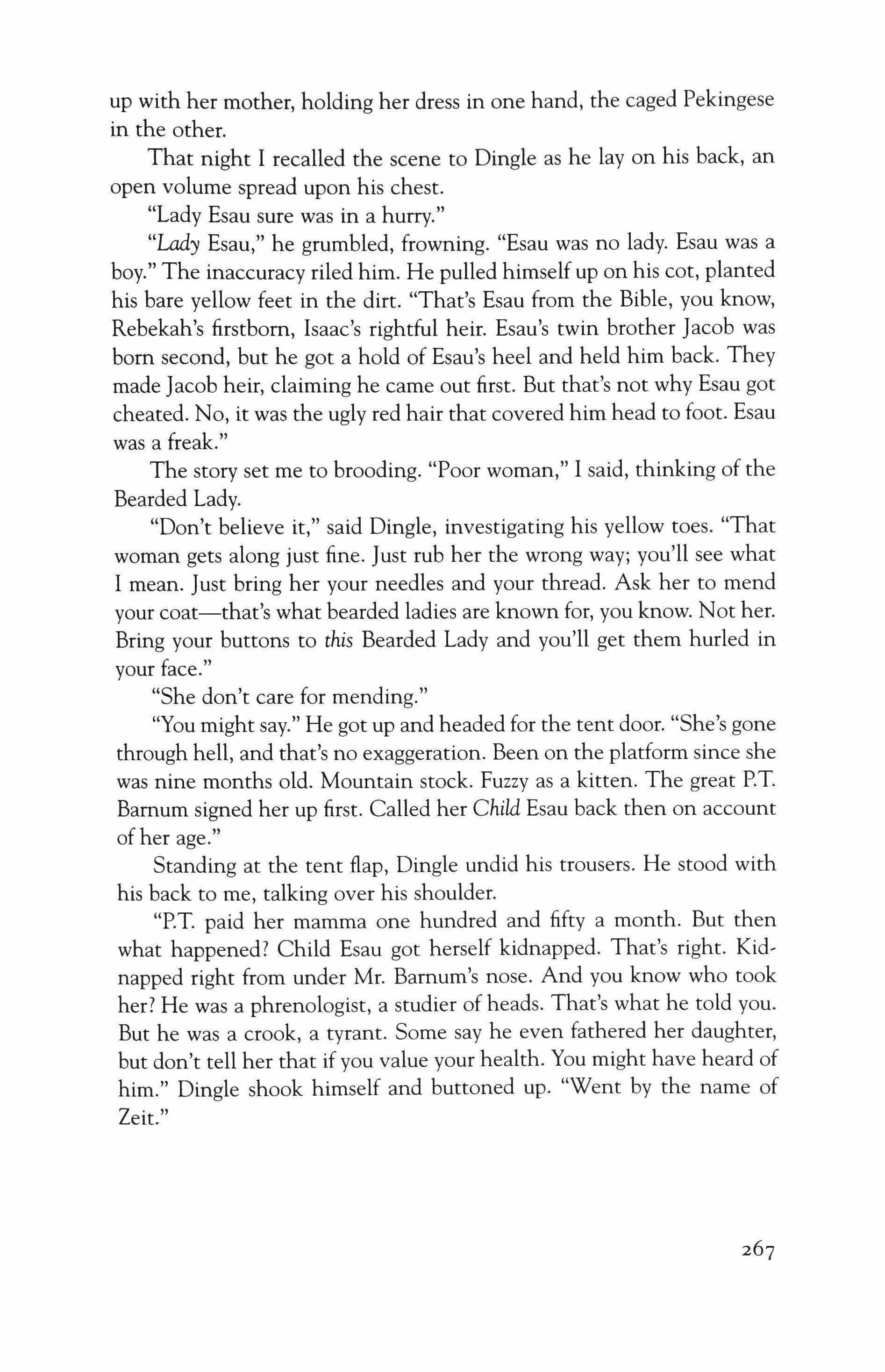
up with her mother, holding her dress in one hand, the caged Pekingese in the other.
That night I recalled the scene to Dingle as he lay on his back, an open volume spread upon his chest.
"Lady Esau sure was in a hurry."
"Lady Esau," he grumbled, frowning. "Esau was no lady. Esau was a boy." The inaccuracy riled him. He pulled himself up on his cot, planted his bare yellow feet in the dirt. "That's Esau from the Bible, you know, Rebekah's firstborn, Isaac's rightful heir. Esau's twin brother Jacob was born second, but he got a hold of Esau's heel and held him back. They made Jacob heir, claiming he came out first. But that's not why Esau got cheated. No, it was the ugly red hair that covered him head to foot. Esau was a freak."
The story set me to brooding. "Poor woman," I said, thinking of the Bearded Lady.
"Don't believe it," said Dingle, investigating his yellow toes. "That woman gets along just fine. Just rub her the wrong way; you'll see what I mean. Just bring her your needles and your thread. Ask her to mend your coat-that's what bearded ladies are known for, you know. Not her. Bring your buttons to this Bearded Lady and you'll get them hurled in your face."
"She don't care for mending."
"You might say." He got up and headed for the tent door. "She's gone through hell, and that's no exaggeration. Been on the platform since she was nine months old. Mountain stock. Fuzzy as a kitten. The great P.T. Barnum signed her up first. Called her Child Esau back then on account of her age."
Standing at the tent flap, Dingle undid his trousers. He stood with his back to me, talking over his shoulder.
"P.T. paid her mamma one hundred and fifty a month. But then what happened? Child Esau got herself kidnapped. That's right. Kidnapped right from under Mr. Barnum's nose. And you know who took her? He was a phrenologist, a studier of heads. That's what he told you. But he was a crook, a tyrant. Some say he even fathered her daughter, but don't tell her that if you value your health. You might have heard of him." Dingle shook himself and buttoned up. "Went by the name of Zeit."

We put up a play for the mothers and fathers. Little George Washington and his famous cherry tree.
Before the show, Madame Manheim surprised us with her presence. She was just back from Europe and the attentions of a Monsieur Lapin. Monsieur sat with her now on a gold damask chaise hauled into the schoolhouse at Mr. Zeit's bidding. A fancy hat from Paris rode upon her head, the stuffed bluebird atop it bobbing as she spoke.
"Mr. Zeit informs me that you're a scholar," she said, beaming up at me.
Mr. Zeit clipped me before I could respond. "He's a mathematician. He studied back east."
"Is that right?" she said, giving her companion a satisfied nod.
I mingled with the parents. They asked me about their scholars. Could they count? Were they learning their ABC's?
"Well, Mr. Gluey, let's just say that your daughter is trying Your son would make greater progress, Miss Wanda, ifhe was more often here."
The Bearded Lady arrived, Thumbelina at her side. She looked like work was tiring her. Her eyes were sunken and she coughed between words. "Do you hear her falter?" she asked of her daughter.
I told her I had not.
She hacked terribly, blotting her whiskers with a handkerchief, waving off my offer of water. "Is she learning her sums?"
I assured her that she was.
We commenced our grand opera, little George, played by Richard, cutting down the cherry tree, fibbing about it to Sarah who played his rna.
"I did not do it, dear mother."
"Well, who did, dear son?"
They was simple words, but the speaker had us rapt. The daughter of the Bearded Lady stole the show.
Then little George's father, played by Bobby, stepped out behind Molasses who portrayed a bush.
But before he could deliver his lines, another actor stumbled in.
"Where is he? Where's my kid?"
It was Mr. Dugan, Bobby's father, and he had a bottle in his hand. His trunk was stiff, legs bowed and uneven. Staggering down the aisle, he swung the bottle wildly, nearly toppling Madame Manheim's chapeau.
He came up under me. "Where is he? Where've you got him?" he demanded, his hot, liquored breath wetting my chin. His shirt came unbuttoned, revealing the iron corset that kept him together.
Part
Two
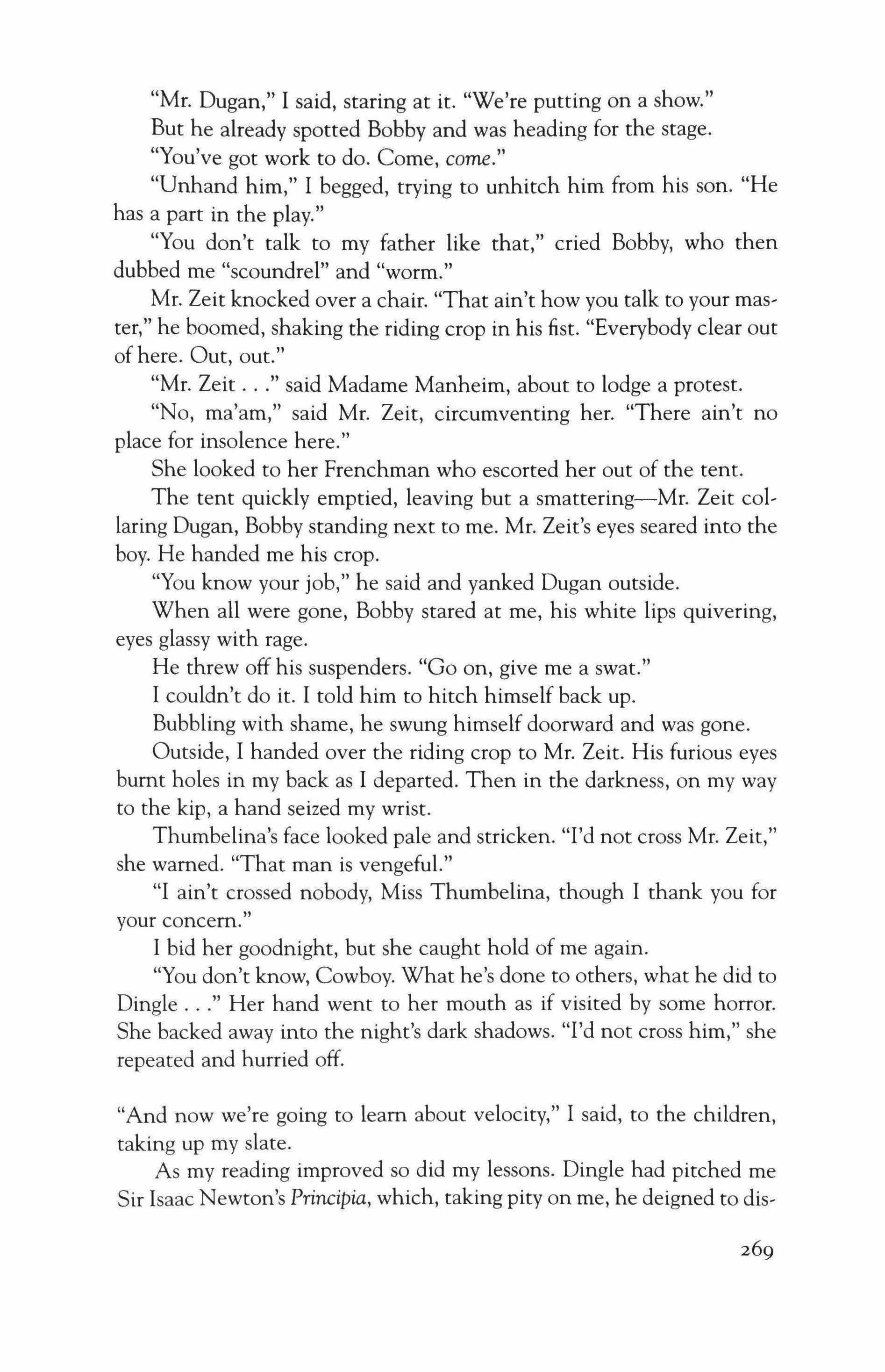
"Mr. Dugan," I said, staring at it. "We're putting on a show."
But he already spotted Bobby and was heading for the stage.
"You've got work to do. Come, come."
"Unhand him," I begged, trying to unhitch him from his son. "He has a part in the play."
"You don't talk to my father like that," cried Bobby, who then dubbed me "scoundrel" and "worm."
Mr. Zeit knocked over a chair. "That ain't how you talk to your master," he boomed, shaking the riding crop in his fist. "Everybody clear out of here. Out, out."
"Mr. Zeit said Madame Manheim, about to lodge a protest.
"No, ma'am," said Mr. Zeit, circumventing her. "There ain't no place for insolence here."
She looked to her Frenchman who escorted her out of the tent.
The tent quickly emptied, leaving but a smattering-Mr. Zeit collaring Dugan, Bobby standing next to me. Mr. Zeit's eyes seared into the boy. He handed me his crop.
"You know your job," he said and yanked Dugan outside.
When all were gone, Bobby stared at me, his white lips quivering, eyes glassy with rage.
He threw off his suspenders. "Go on, give me a swat."
I couldn't do it. I told him to hitch himself back up.
Bubbling with shame, he swung himself doorward and was gone.
Outside, I handed over the riding crop to Mr. Zeit. His furious eyes burnt holes in my back as I departed. Then in the darkness, on my way to the kip, a hand seized my wrist.
Thumbelina's face looked pale and stricken. "I'd not cross Mr. Zeit," she warned. "That man is vengeful."
"I ain't crossed nobody, Miss Thumbelina, though I thank you for your concern."
I bid her goodnight, but she caught hold of me again.
"You don't know, Cowboy. What he's done to others, what he did to Dingle Her hand went to her mouth as if visited by some horror. She backed away into the night's dark shadows. "I'd not cross him," she repeated and hurried off.
"And now we're going to learn about velocity," I said, to the children, taking up my slate.
As my reading improved so did my lessons. Dingle had pitched me Sir Isaac Newton's Principia, which, taking pity on me, he deigned to dis-

till. Now as I chalked a ball shot from a cannon, I tried to explain Sir Isaac's Second Law-your mass, your force, your acceleration.
"But Bobby's the expert on that," I said. "He knows all about cannons."
We were three months past George and his cherry tree, Madame Manheim long gone, her Frenchman in tow. Bobby had taken to standing at the tent door, like he was no longer a pupil but a visitor passing through.
"It ain't no cannon," he informed me. "It's got springs of rubber, like a slingshot has."
"Well, if that's so, wherefore the smoke?" I challenged him.
"Nothing but a cap of gunpowder," he scoffed.
"Would you like to show us how it works?"
With a shrug, he led us outside. We trooped across the grounds, Baby Luis in my arms, followed by Sarah, Molasses, and the others. Pulled outside the big top, the cannon was aimed out over the hills. Sarah ran her fingers along the slanting barrel, unable to touch it once she reached the muzzle.
"How do you say it works?" she asked, turning to Bobby. He took the chalk from my hand and we gathered around the slate. Sarah hung over him and a locket of her black hair escaped. It brushed over the slate and she quickly corralled it.
"How far can you fly?" she asked.
Bobby answered, "Fifty yards or so."
"Up over that mountain?" asked Molasses.
"Nah. But nearly over that tent." He pointed up at the big top, its pennants still in the hot summer sky.
We went on a picnic. The children went bathing in a water hole, ladies first, hidden from us men, then vice versa. Afterwards, I sat on a rock with Sarah, she sitting like a mermaid, legs bent at the knees. She stared at the rock's smooth surface, her wet locks lifting on the sides of her neck, revealing spots of transparency in her white cotton dress. We talked of historical figures, I likening Hephaestus to biblical Esau for the misfortunes that they shared.
"My momma hates that name," she said, frowning.
"Esau? She shouldn't." I explained that Jacob and he were twins. "When they was born Esau came out first. Oh, I know what they say. Jacob grabbed Esau's heel and that made him Isaac's heir. But I don't hold with that. Not at alL" I stared at her down-turned eyes, her long black lashes. "Esau was the chosen."
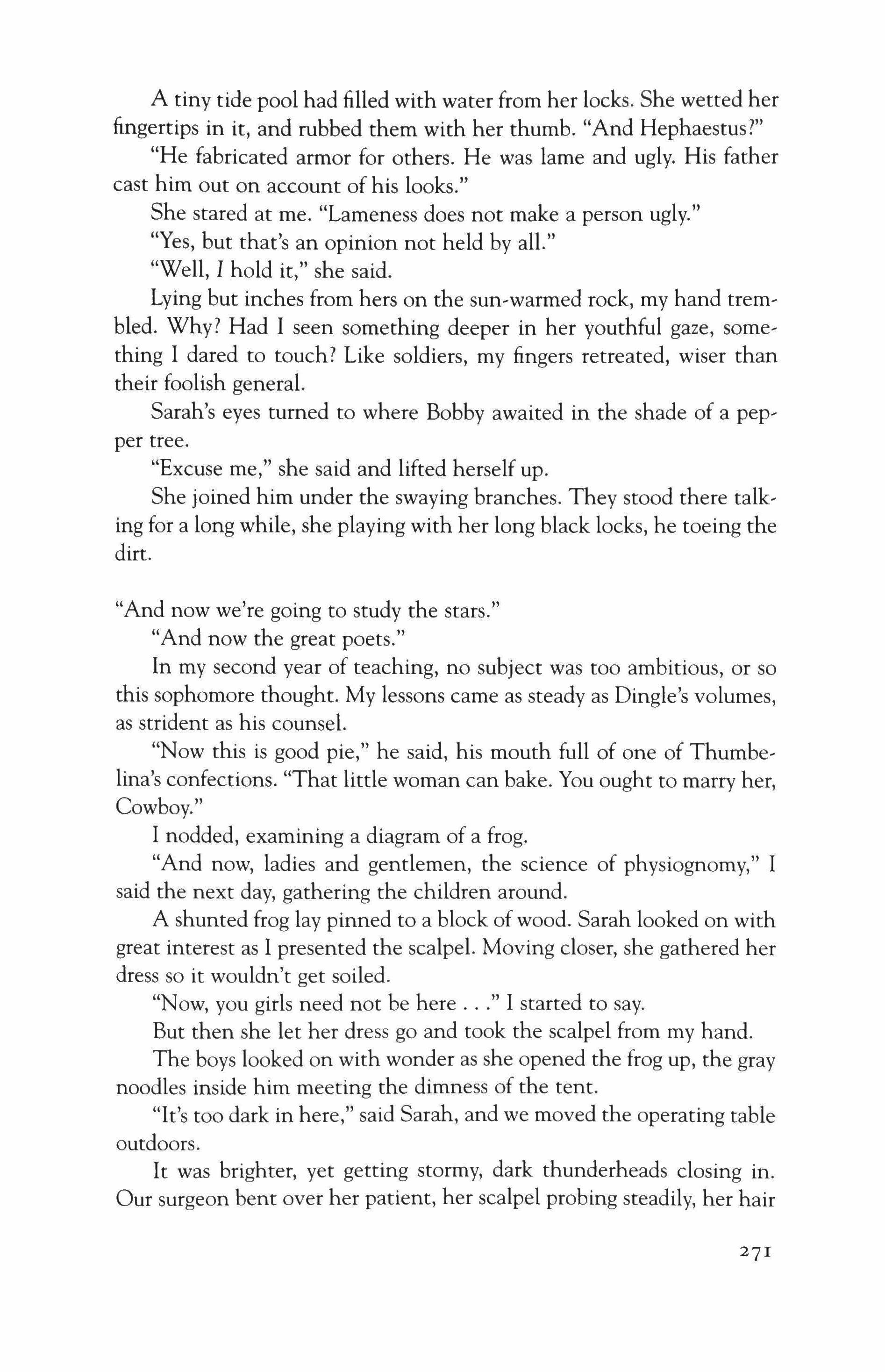
A tiny tide pool had filled with water from her locks. She wetted her fingertips in it, and rubbed them with her thumb. "And Hephaestus?"
"He fabricated armor for others. He was lame and ugly. His father cast him out on account of his looks."
She stared at me. "Lameness does not make a person ugly."
"Yes, but that's an opinion not held by all."
"Well, I hold it," she said.
Lying but inches from hers on the sun-warmed rock, my hand trernbled. Why? Had I seen something deeper in her youthful gaze, something I dared to touch? Like soldiers, my fingers retreated, wiser than their foolish general.
Sarah's eyes turned to where Bobby awaited in the shade of a pepper tree.
"Excuse me," she said and lifted herself up.
She joined him under the swaying branches. They stood there talking for a long while, she playing with her long black locks, he toeing the dirt.
"And now we're going to study the stars."
"And now the great poets."
In my second year of teaching, no subject was too ambitious, or so this sophomore thought. My lessons came as steady as Dingle's volumes, as strident as his counsel.
"Now this is good pie," he said, his mouth full of one of Thumbelina's confections. "That little woman can bake. You ought to marry her, Cowboy."
I nodded, examining a diagram of a frog.
"And now, ladies and gentlemen, the science of physiognomy," I said the next day, gathering the children around.
A shunted frog lay pinned to a block of wood. Sarah looked on with great interest as I presented the scalpel. Moving closer, she gathered her dress so it wouldn't get soiled.
"Now, you girls need not be here I started to say.
But then she let her dress go and took the scalpel from my hand.
The boys looked on with wonder as she opened the frog up, the gray noodles inside him meeting the dimness of the tent.
"It's too dark in here," said Sarah, and we moved the operating table outdoors.
It was brighter, yet getting stormy, dark thunderheads closing in. Our surgeon bent over her patient, her scalpel probing steadily, her hair
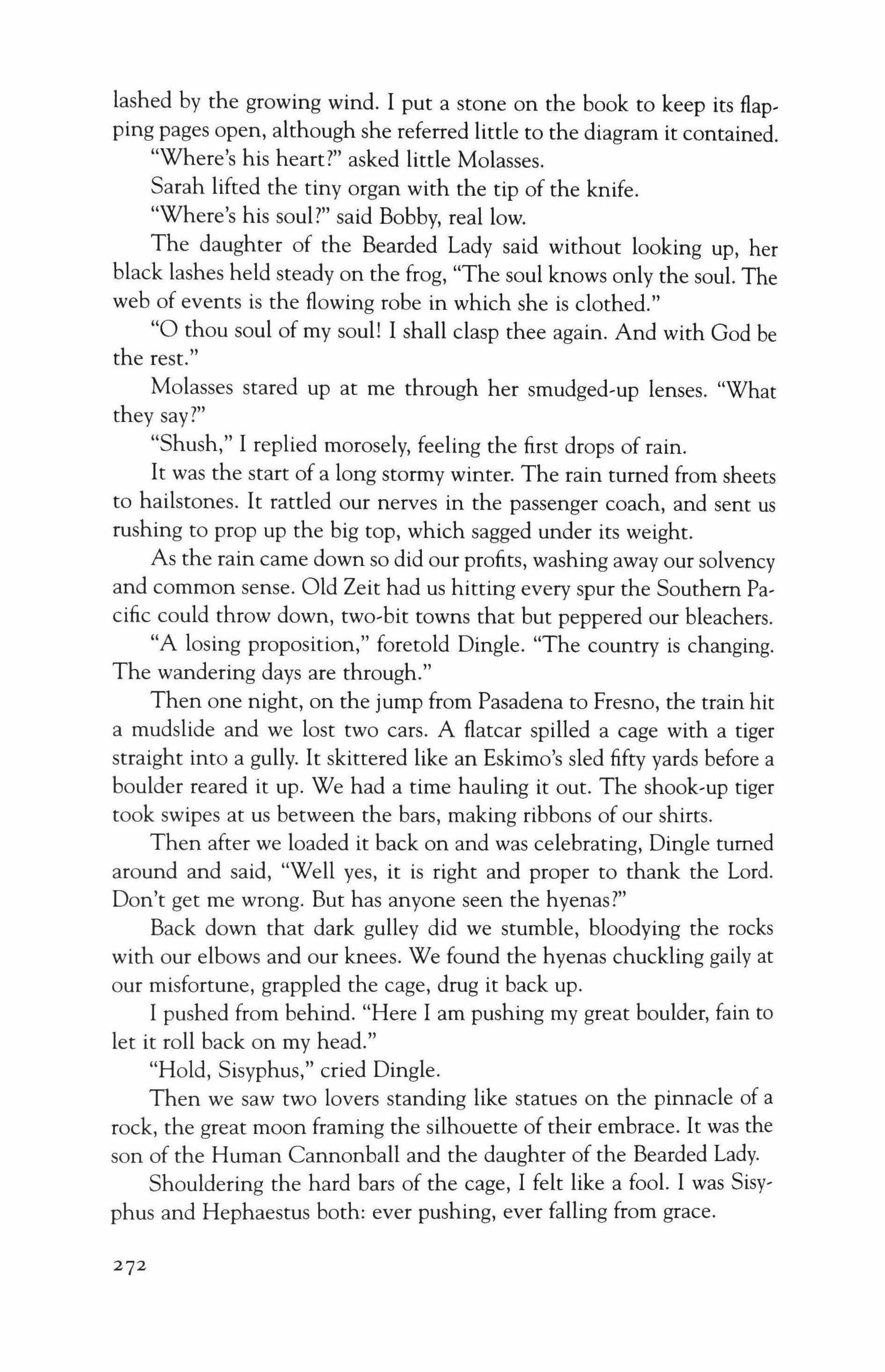
lashed by the growing wind. I put a stone on the book to keep its flapping pages open, although she referred little to the diagram it contained.
"Where's his heart?" asked little Molasses.
Sarah lifted the tiny organ with the tip of the knife.
"Where's his soul?" said Bobby, real low.
The daughter of the Bearded Lady said without looking up, her black lashes held steady on the frog, "The soul knows only the soul. The web of events is the flowing robe in which she is clothed."
"0 thou soul of my soul! I shall clasp thee again. And with God be the rest."
Molasses stared up at me through her smudged-up lenses. "What they say?"
"Shush," I replied morosely, feeling the first drops of rain.
It was the start of a long stormy winter. The rain turned from sheets to hailstones. It rattled our nerves in the passenger coach, and sent us rushing to prop up the big top, which sagged under its weight.
As the rain came down so did our profits, washing away our solvency and common sense. Old Zeit had us hitting every spur the Southern Pacific could throw down, two-bit towns that but peppered our bleachers.
"A losing proposition," foretold Dingle. "The country is changing. The wandering days are through."
Then one night, on the jump from Pasadena to Fresno, the train hit a mudslide and we lost two cars. A flatcar spilled a cage with a tiger straight into a gully. It skittered like an Eskimo's sled fifty yards before a boulder reared it up. We had a time hauling it out. The shook-up tiger took swipes at us between the bars, making ribbons of our shirts.
Then after we loaded it back on and was celebrating, Dingle turned around and said, "Well yes, it is right and proper to thank the Lord. Don't get me wrong. But has anyone seen the hyenas?"
Back down that dark gulley did we stumble, bloodying the rocks with our elbows and our knees. We found the hyenas chuckling gaily at our misfortune, grappled the cage, drug it back up.
I pushed from behind. "Here I am pushing my great boulder, fain to let it roll back on my head."
"Hold, Sisyphus," cried Dingle.
Then we saw two lovers standing like statues on the pinnacle of a rock, the great moon framing the silhouette of their embrace. It was the son of the Human Cannonball and the daughter of the Bearded Lady.
Shouldering the hard bars of the cage, I felt like a fool. I was Sisyphus and Hephaestus both: ever pushing, ever falling from grace.

Dingle looked at me. "Push, Cowboy," he whispered. "Push."
I found Thumbelina slumbering in the passenger coach.
"Will you marry me?"
She was as stunned as the asker.
"Why, yes, Cowboy. I will."
Consumption hit us hard. It took Olly, the Pinhead, and The Great Lucinda, the high wire act. Coughing filled the passenger coach, spittle speckling the closed windows. The hammer of the carpenter resounded late into the night, nailing together coffin after coffin.
Then in the spring of '06, Circus Fantastic suffered its greatest loss of all. Thumbelina, my wife, came to me and took my hand. "Come. It's bad."
She didn't need to explain. Sarah's attendance had been dropping off steadily, her black eyes glazed with growing alarm. Her mother was dying, and in the silence that shrouded this common knowledge Sarah's sorrow seemed to howl.
The Bearded Lady lived in a carved gilded wagon emblazoned with her name. Inside, the walls shone with quilted sateen. Prostrate on her bed, she looked up from a raft of pillows placed there by her daughter as if to soften her fate. Sarah stood on her deathwatch, staring at a doctor who could do nothing to help. The hectic fever was striking twice daily, he informed us. The graveyard cough commenced. The eyes of the Bearded Lady had sunk deep in their sockets. She looked flattened out in her bed like an elastic balloon relieved of its pressure.
"I am sick," she said.
"I see that, Ma'am, and it sorrows me," I replied.
Her eyes turned to Sarah. "Teach her. Keep her from harm."
I told her I would try.
She turned to Thumbelina. "I have friends in St. Louis. They'll take her in when you get there in the fall. And mind the dog. Take care of it well."
"Why?" I asked.
She took my lapel and pulled me down. Her great beard had dulled in sickness but was no less formidable. "It's magic," she whispered. "It took the beard and must always keep it."
"And if it don't?"
Her eyes again fell upon her daughter. She said no more.
Clowns is pretty morose, no matter the occasion. But a clown at a funeral is too sad to bear. I had never seen Dingle shed a tear, but now
273
he shed them freely. We was all just as misty. Acrobats, jugglers, troupers of every stripe. It was a blurry procession standing in line to take the shovel. Stabbing it into the pile, tilting it over the hole, you could hear each sound distinctly: the dirt ringing off the blade, the dull hissing thump of earth upon earth.
Standing apart, staring at us glumly, Mr. Zeit resembled a banker looted of his wealth.
"Just look at him," grumbled Dingle. "Do you think he cares for that little girl?" He meant Sarah, who stood graveside stoically, not a tear in her eye. "Do you think he gives one fig for her grief?"
Zeit looked at his pocket watch and clapped it shut impatiently. Was the funeral a mere annoyance? Had he better things to do with his time? I felt my blood boil, a state which for me is not easily reached.
Sarah stood frozen in her sorrow. Dingle took her one arm, I the other, and we walked her away.
She moved in with Thumbelina and me, sleeping on a cot behind a canvas divider. Following me to class in the mornings in a dutiful haze, she tried to do what she had before: writing neatly on her slate, helping Molasses. But her heart was with her mother, and her mother was in the grave.
Then one morning, she was late in waking up.
"Go on," she called from behind the canvas. "I'll be there soon."
I was in the schoolhouse changing Baby Louis when she appeared two hours later. Wavering at the tent flap, she stared at us with a ghastly expression.
Bobby took the cage from her hands. "The dog," he said. "It's gone."
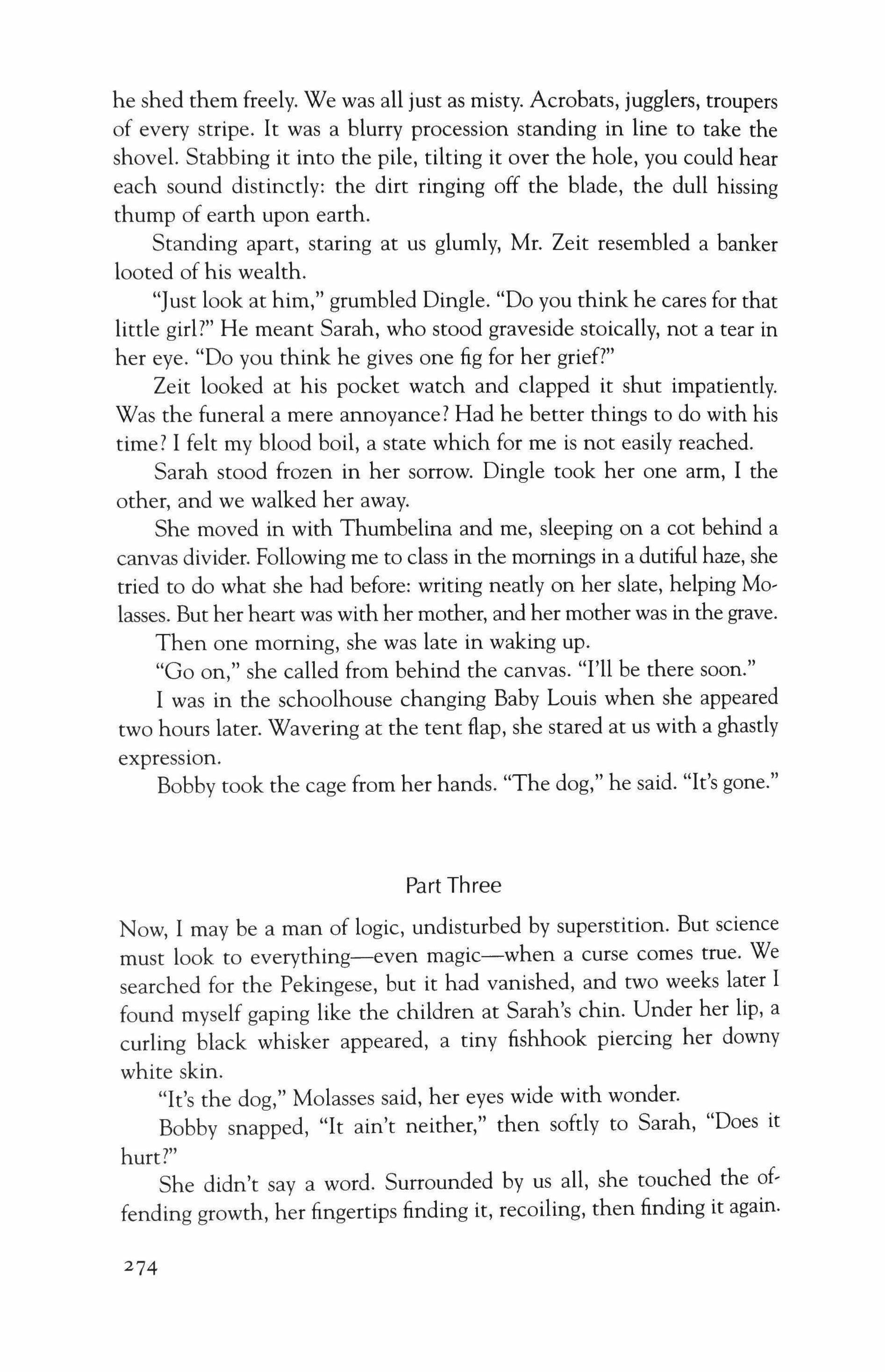
Part Three
Now, I may be a man of logic, undisturbed by superstition. But science must look to everything-even magic-when a curse comes true. We searched for the Pekingese, but it had vanished, and two weeks later I found myself gaping like the children at Sarah's chin. Under her lip, a curling black whisker appeared, a tiny fishhook piercing her downy white skin.
"It's the dog," Molasses said, her eyes wide with wonder.
Bobby snapped, "It ain't neither," then softly to Sarah, "Does it hurt?"
She didn't say a word. Surrounded by us all, she touched the offending growth, her fingertips finding it, recoiling, then finding it again.
274

The whisker seemed to grow before our eyes, and soon was joined by others, a company of bristly black pilgrims colonizing her chin.
At first, she tried shaving. The razor clinked the sides of the washbasin. She came from behind the canvas with nicks on her face. But it was no good-neither she could keep the whiskers at bay, nor Thumbelina who tried to help her. They came in thicker and coarser, and in no time her face was covered with a thick lustrous growth. It was no great flowing beard like her mother's, but darned if it wouldn't be real soon.
One day after class, I found Bobby sobbing by the tent.
"She won't see me," he said abjectly. "I love her."
"I know."
"And you?"
"All men admire beauty. Yet none can possess it but them that it chooses."
"It don't choose those that it ought to."
"Sometimes that's true."
They was cowardly words, but what more could I say? That I thought of her always? That I listened to her breathing behind the canvas at night? No, no words of that sort would pass these lips, no truths. I was no nobler than a boldfaced liar, a lecturer on the midway bamboozling the crowds.
In his tent, Zeit cursed his measly earnings, which were shrinking by the day. As soon as Gluey could cover the bill of another circus, an advance man from some third outfit would do the same to us. We was all buzzards pecking at the same carcass picked clean of its meat.
One day Zeit appeared in the middle of one of my lessons, fixing Sarah with a covetous gaze. Had not a bearded lady made him rich before? Could not another do the same?
"Well, Cowboy, some apples don't fall far from the tree."
I replied, "Yes, but once fallen, an apple can roll away."
"Looks like we have a philosopher amongst us."
"Looks like," chimed Looks Like, his man.
"Come here little girl," said the villain. "Class is over."
"Wait just one minute," said I.
But Looks Like twisted my arm up behind me, and Zeit delivered a punch that dropped me to my knees.
"I'll have no insolence from you neither," he said, dragging Sarah away.
That night, I got a scolding. "You mustn't rile him," said Thumbelina, binding my sore ribs.
275

"Don't talk sense," said Dingle. "He won't understand it." His eyes burned with anger lit long ago, like a flame leaping from the embers of some ancient fire. "Why do you think he hired you, anyway?"
"To teach," I replied.
"Pshaw! That man is no broker of knowledge. Ignorance is his traffic. He wants to keep those children in the dark. Why else would he hire a one-armed illiterate for the job?"
"Dingle," cried Thumbelina.
"If the truth hurts, I can't help it." Then to me: "'Course he didn't bank on passion. They never do. But if I were you, Cowboy, I'd tum it off, like a spigot. If you don't, you'll drown."
"He's right, Cowboy," nodded Thumbelina. "It's best to let it go."
I looked from one to the other. "But what about the girl?"
The next day, for a nickel, I got my reply. "Child Esau" a carelessly painted banner above her said. She sat sadly on a stiff back chair, her mother's throne pawned off long before. In her mother's copper dress, she suffered the insults of thoughtless boys, and worse, the scowling silence of Christian ladies who hurried their husbands along.
I sat in the tent that afternoon, waiting for Thumbelina to return. "I failed her," were the first words from my mouth. "She and her mother both." Thumbelina looked sad, for she knew that I loved that little girl and always would.
"I brought you a flower."
She handed me a rose and started to weep.
It was the spring of '06. We was holed up in Sweetwater, Colorado. The rail was washed out, north and south, and there was no way across the river for the bridge got swept away. It was a dreary town ofdrunken miners that gambled and fought. The main street was a muddy cauldron, stepping-stones thrown out to get across it-broken tables, ledgers, and straw beds.
Sarah sat with us when she could, attending urgently to her studies, but Zeit always came along and dragged her away. Then, one day, he came in with an angry citizen, a ball-fisted gentleman that stank of drink.
"What's this?" I asked, affronted.
They had a rabble behind them, eyeballs and whiskers jostling for a view.
"He don't believe she's a female," said Zeit. "He wants proof." He yanked her to her feet. "Here. Show him."
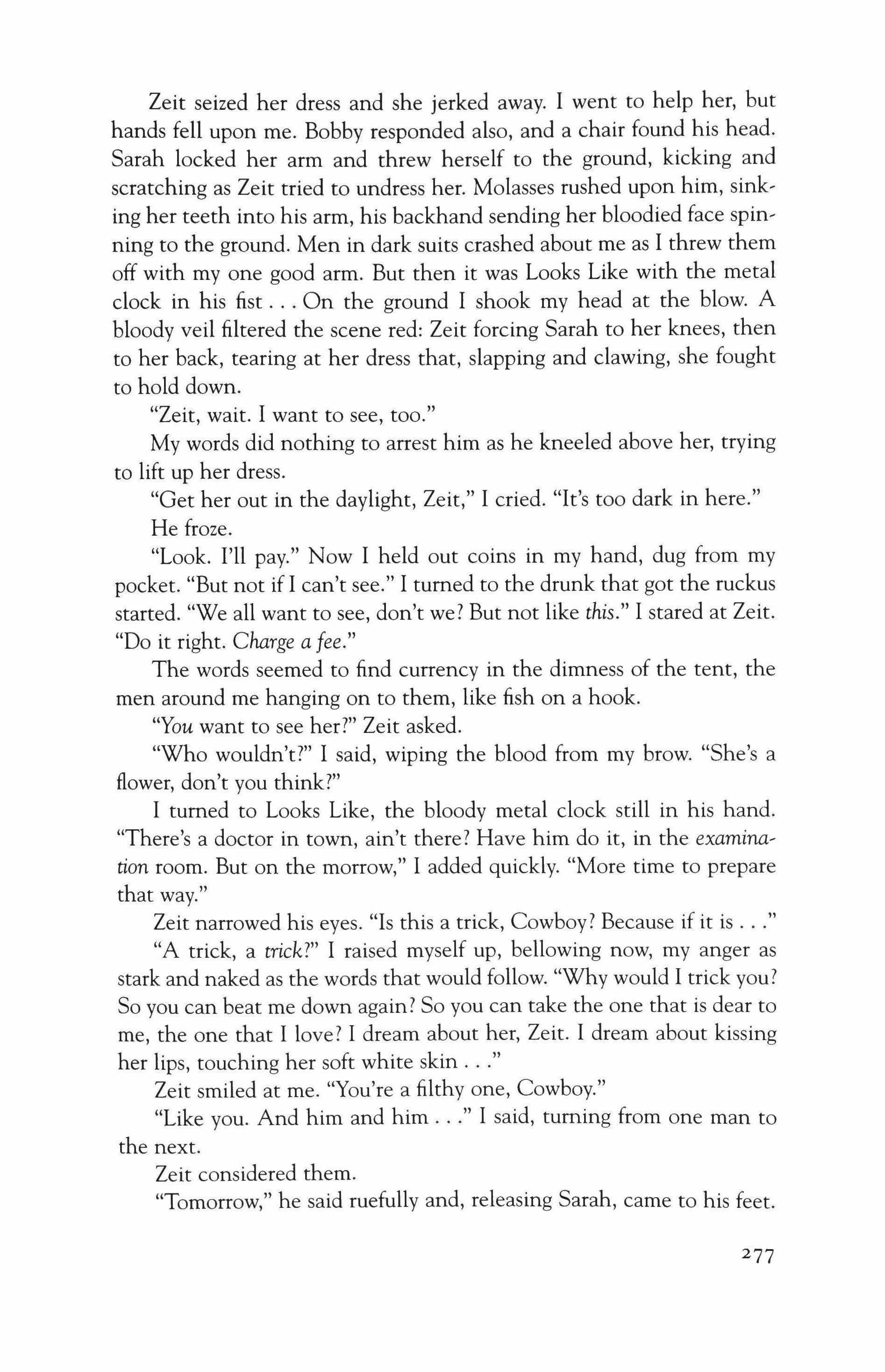
Zeit seized her dress and she jerked away. I went to help her, but hands fell upon me. Bobby responded also, and a chair found his head. Sarah locked her arm and threw herself to the ground, kicking and scratching as Zeit tried to undress her. Molasses rushed upon him, sink, ing her teeth into his arm, his backhand sending her bloodied face spin, ning to the ground. Men in dark suits crashed about me as I threw them off with my one good arm. But then it was Looks Like with the metal clock in his fist On the ground I shook my head at the blow. A bloody veil filtered the scene red: Zeit forcing Sarah to her knees, then to her back, tearing at her dress that, slapping and clawing, she fought to hold down.
"Zeit, wait. I want to see, too."
My words did nothing to arrest him as he kneeled above her, trying to lift up her dress.
"Get her out in the daylight, Zeit," I cried. "It's too dark in here."
He froze.
"Look. I'll pay." Now I held out coins in my hand, dug from my pocket. "But not if I can't see." I turned to the drunk that got the ruckus started. "We all want to see, don't we? But not like this." I stared at Zeit. "Do it right. Charge a fee."
The words seemed to find currency in the dimness of the tent, the men around me hanging on to them, like fish on a hook.
"You want to see her?" Zeit asked.
"Who wouldn't?" I said, wiping the blood from my brow. "She's a flower, don't you think?"
I turned to Looks Like, the bloody metal clock still in his hand. "There's a doctor in town, ain't there? Have him do it, in the exzmunzicion room. But on the morrow," I added quickly. "More time to prepare that way."
Zeit narrowed his eyes. "Is this a trick, Cowboy? Because if it is "A trick, a trick?" I raised myself up, bellowing now, my anger as stark and naked as the words that would follow. "Why would I trick you? So you can beat me down again? So you can take the one that is dear to me, the one that I love? I dream about her, Zeit. I dream about kissing her lips, touching her soft white skin
Zeit smiled at me. "You're a filthy one, Cowboy."
"Like you. And him and him I said, turning from one man to the next.
Zeit considered them.
"Tomorrow," he said ruefully and, releasing Sarah, came to his feet.
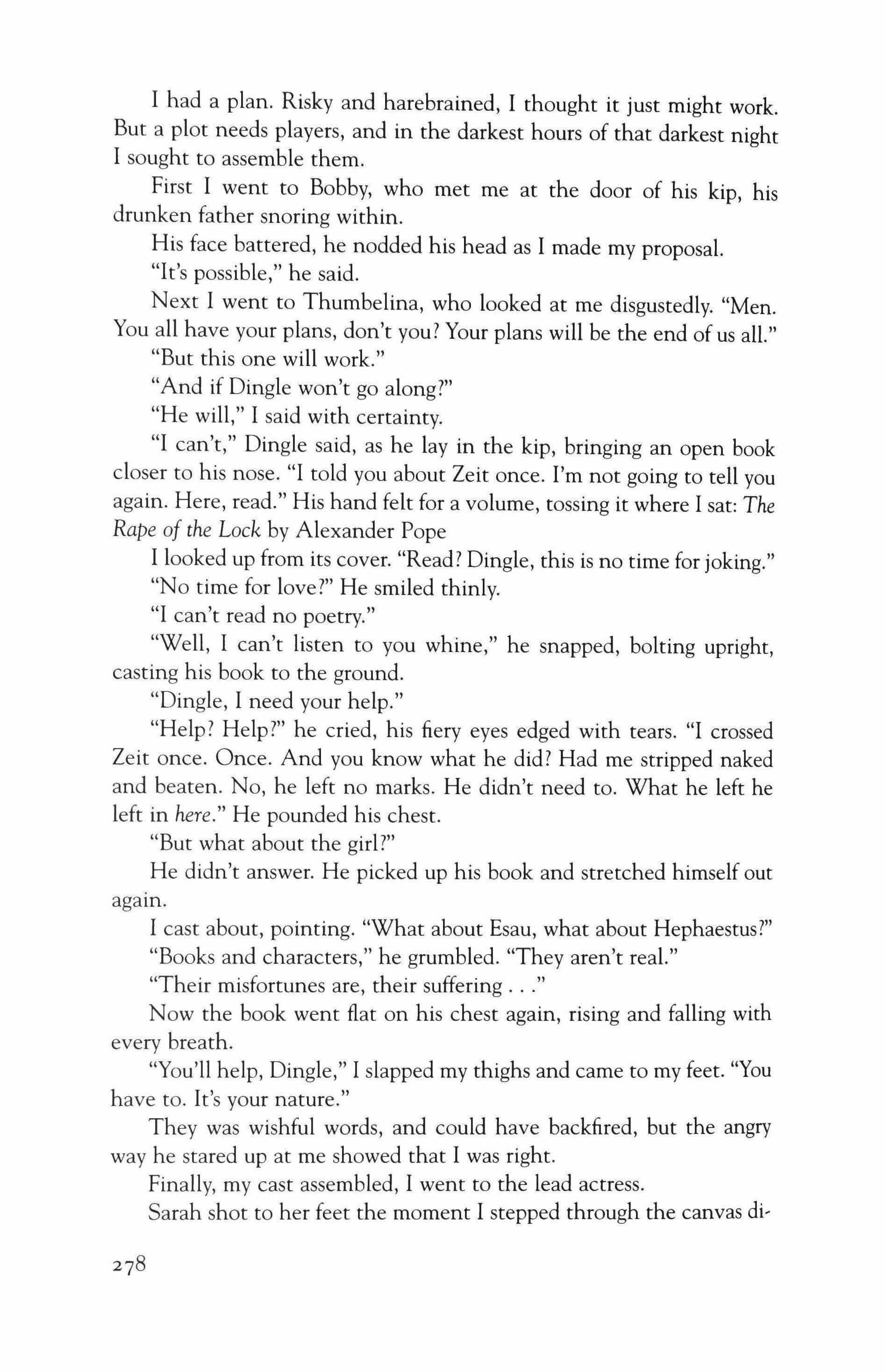
I had a plan. Risky and harebrained, I thought it just might work. But a plot needs players, and in the darkest hours of that darkest night I sought to assemble them.
First I went to Bobby, who met me at the door of his kip, his drunken father snoring within.
His face battered, he nodded his head as I made my proposal.
"It's possible," he said.
Next I went to Thumbelina, who looked at me disgustedly. "Men. You all have your plans, don't you? Your plans will be the end of us all."
"But this one will work."
"And if Dingle won't go along?"
"He will," I said with certainty.
"I can't," Dingle said, as he lay in the kip, bringing an open book closer to his nose. "I told you about Zeit once. I'm not going to tell you again. Here, read." His hand felt for a volume, tossing it where I sat: The Rape of the Lock by Alexander Pope
I looked up from its cover. "Read? Dingle, this is no time for joking."
"No time for love?" He smiled thinly.
"I can't read no poetry."
"Well, I can't listen to you whine," he snapped, bolting upright, casting his book to the ground.
"Dingle, I need your help."
"Help? Help?" he cried, his fiery eyes edged with tears. "I crossed Zeit once. Once. And you know what he did? Had me stripped naked and beaten. No, he left no marks. He didn't need to. What he left he left in here." He pounded his chest.
"But what about the girl?"
He didn't answer. He picked up his book and stretched himself out again.
I cast about, pointing. "What about Esau, what about Hephaestus?"
"Books and characters," he grumbled. "They aren't real."
"Their misfortunes are, their suffering
Now the book went flat on his chest again, rising and falling with every breath.
"You'll help, Dingle," I slapped my thighs and carne to my feet. "You have to. It's your nature."
They was wishful words, and could have backfired, but the angry way he stared up at me showed that I was right.
Finally, my cast assembled, I went to the lead actress.
Sarah shot to her feet the moment I stepped through the canvas di-

vider, crashing into a stool, toppling the washbasin upon it. She picked it up and held it shield,like before her.
"No, no, dear. I'm not going to hurt you."
"Stay away," she cried. "Stay away."
"I have a plan," I told her. "But we have to act now."
My words sounded feeble, even to me. But eventually they calmed the both of us, and lowering the washbasin and sitting, Sarah heard me out.
"It won't hurt," I promised.
"I don't care if it does."
"You're a brave girl."
I assured her again and was about to retreat when suddenly she caught my shriveled arm and turned me about. Her moist eyes glisten, ing, she raised herself to her tiptoes and kissed me wetly on the chin.
"Thank you," she said.
Thumbelina was frowning even in sleep. I lay beside her, wide, awake.
I tried to read: What dire Offence from am'rous Causes springs, What mighty Contests rise from trivial Things I shut the book and laid it flat upon my chest.
Sarah. The after-touch ofher lips tingled down my spine like a telegraph down a wire, spreading to the farthest outposts of my body. "You're a filthy one, Cowboy," I said to myself. No tossing or turning could shake the filth off, no manner of mathematical thinking. A light rain began to patter on the tent roof. Lifting myself out of bed, quietly so as not to dis, turb Thumbelina, I opened her sewing box, found a pair of scissors, parted the canvas, and slithered through.
Standing above Sarah, I trembled. Her bosom rose and fell under the soft rapids of her beard. The glinting scissors shook violently as they lowered toward their prize. And then, with a snip, the deed was done.
The next morning I led my prisoner to the doctor's office. She wore a scarf on her face, top and bottom, like her mother used to do. We walked down the street, my arm around her waist, guiding her over the stepping,stones-old fragments of carpet, a lid from a casket. The doc, tor awaited in his office, his shiny silver tools at the ready on a white enamel tray. Changing behind a screen, the prisoner emerged in a long robe, her face still concealed by the scarf.
It was a large room and the heavy curtains were drawn. Chairs had been set up around a platform as in a surgeon's gallery. Two-score men
279
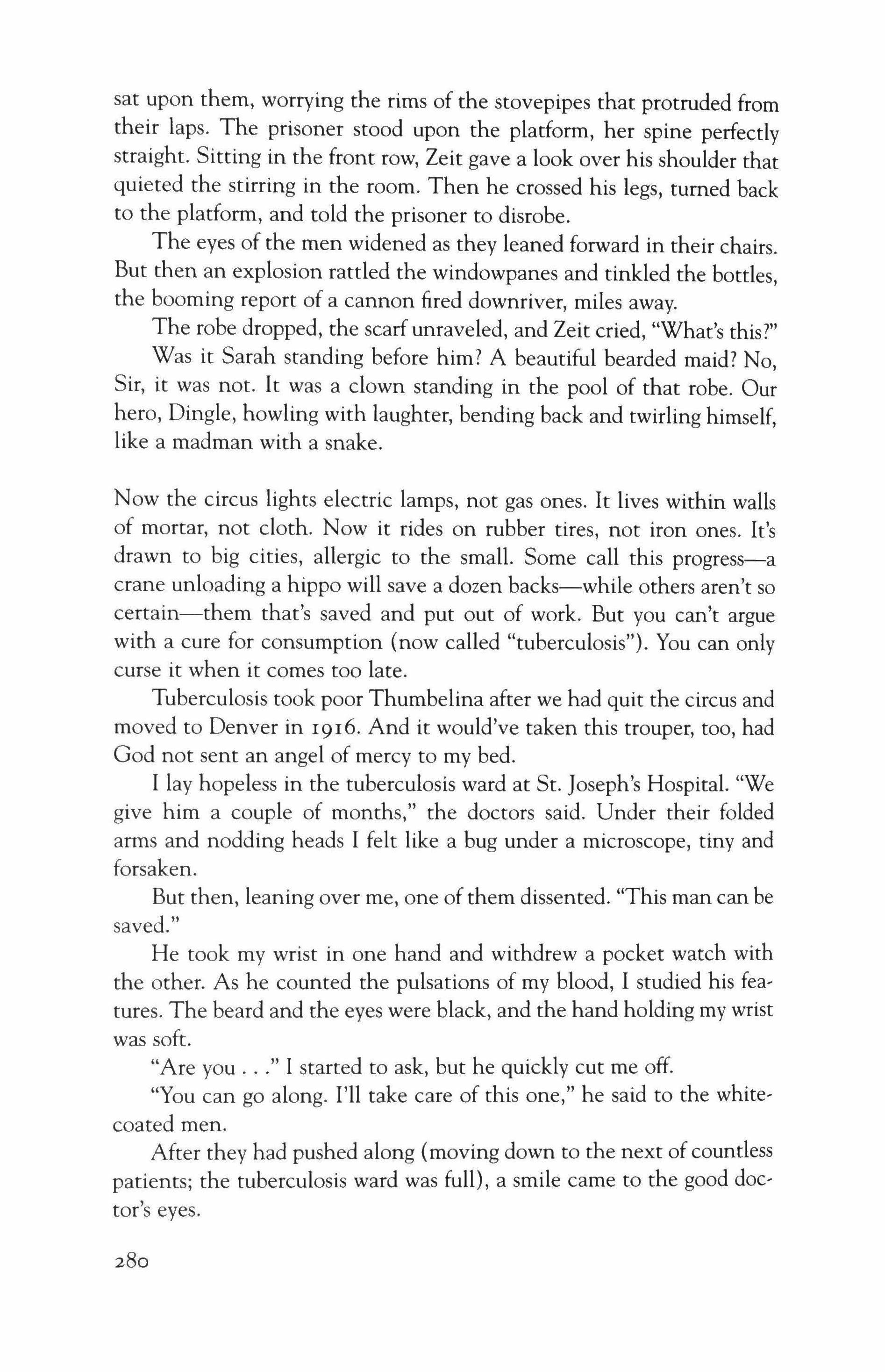
sat upon them, worrying the rims of the stovepipes that protruded from their laps. The prisoner stood upon the platform, her spine perfectly straight. Sitting in the front row, Zeit gave a look over his shoulder that quieted the stirring in the room. Then he crossed his legs, turned back to the platform, and told the prisoner to disrobe.
The eyes of the men widened as they leaned forward in their chairs. But then an explosion rattled the windowpanes and tinkled the bottles, the booming report of a cannon fired downriver, miles away.
The robe dropped, the scarf unraveled, and Zeit cried, "What's this?"
Was it Sarah standing before him? A beautiful bearded maid? No, Sir, it was not. It was a clown standing in the pool of that robe. Our hero, Dingle, howling with laughter, bending back and twirling himself, like a madman with a snake.
Now the circus lights electric lamps, not gas ones. It lives within walls of mortar, not cloth. Now it rides on rubber tires, not iron ones. It's drawn to big cities, allergic to the small. Some call this progress-a crane unloading a hippo will save a dozen backs-while others aren't so certain-them that's saved and put out of work. But you can't argue with a cure for consumption (now called "tuberculosis"). You can only curse it when it comes too late.
Tuberculosis took poor Thumbelina after we had quit the circus and moved to Denver in 1916. And it would've taken this trouper, too, had God not sent an angel of mercy to my bed.
I lay hopeless in the tuberculosis ward at St. Joseph's Hospital. "We give him a couple of months," the doctors said. Under their folded arms and nodding heads I felt like a bug under a microscope, tiny and forsaken.
But then, leaning over me, one of them dissented. "This man can be saved."
He took my wrist in one hand and withdrew a pocket watch with the other. As he counted the pulsations of my blood, I studied his features. The beard and the eyes were black, and the hand holding my wrist was soft.
"Are you I started to ask, but he quickly cut me off.
"You can go along. I'll take care of this one," he said to the whitecoated men.
After they had pushed along (moving down to the next of countless patients; the tuberculosis ward was full), a smile came to the good doctor's eyes.

"Sarah?" I asked.
She nodded.
I lifted myself up, but she pushed me down. "There's no time to waste," she warned, brusquely tucking in the bedding, her voice kept low. "There are cures for consumption. But they need discipline. What you require now is rest and isolation."
I tried to lift up again, but found myself bound like a mummy. "But your story I protested.
Her eyes cut to the gathered doctors two beds down. "Later," she said and demanded that I sleep.
After that day she vanished. She was a specialist, a nurse informed me, the great Dr. Esau from St. Louis, Missouri. "You're lucky you're under his care. He's gotten you a bed at the Kellogg Sanitarium."
It was there, three months later, that Dr. Esau paid me a visit. She listened to my chest and pronounced me fully recovered. Then we went for a stroll in the garden, pausing at the roses as we spoke.
Wearing a crisp white suit and fine straw hat, Sarah made a handsome man. Her beard was coifed but kept long, and she stroked it thoughtfully as I finished my tale.
"And that's how we ended up in Denver. I took over a school for orphans there, and Thumbelina started to teach. But what about you, Doctor? I've talked enough about myself." I pressed her for the details of her adventures. "And right from the beginning. I want to hear it all."
As we walked the crunching of the gravel intermingled with the chirping of birds. Sarah seemed to enter a trance, her eyes focusing on some unknown point before her, as if a hole were opening up there, a portal into the past.
"I awoke to angels. They told me it was time. You were one of them. The other was a clown."
"Dingle."
She nodded. "My double. Thumbelina, that dear woman, spirited me away. And Bobby The name seemed to catch in her throat. u That boy lifted me into the cannon. I slid down the long barrel, legs first, the floor of it stopping me, my body extending skyward, arms out, like a diver suspended in space. The boy's muffled voice told me to bend my knees, but cramped in those dark confines, I could scarcely move. I stared up into a circle of pale morning light. There was a rumbling and the cannon started to roll. The cloudless sky gave no clues of my bearing, which I could only divine through a series of sounds: the wheels on the gravel, silenced by the grass, the layered babble of the river, some of it
28r
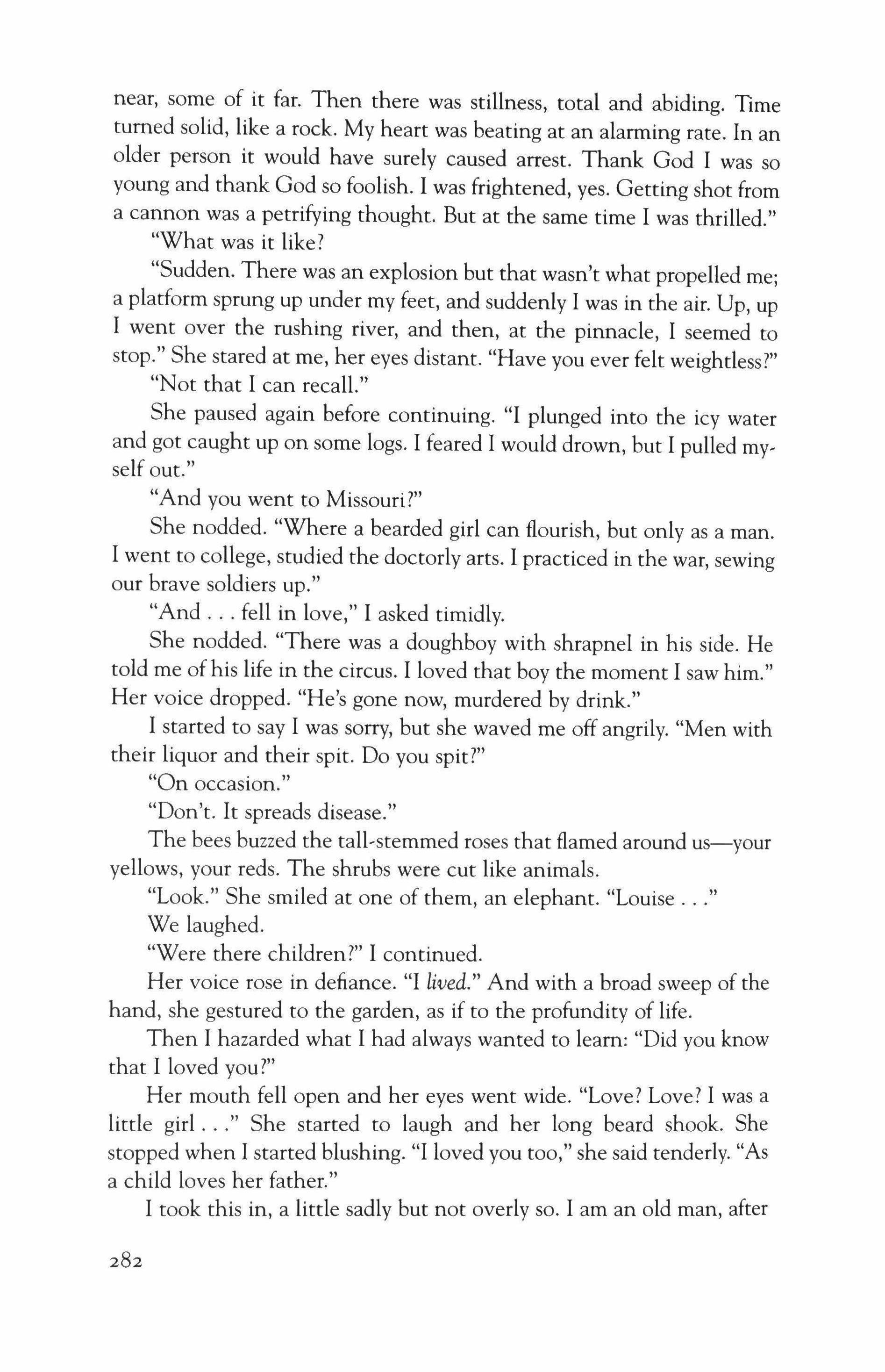
near, some of it far. Then there was stillness, total and abiding. Time turned solid, like a rock. My heart was beating at an alarming rate. In an older person it would have surely caused arrest. Thank God I was so young and thank God so foolish. I was frightened, yes. Getting shot from a cannon was a petrifying thought. But at the same time I was thrilled."
"What was it like?
"Sudden. There was an explosion but that wasn't what propelled me; a platform sprung up under my feet, and suddenly I was in the air. Up, up I went over the rushing river, and then, at the pinnacle, I seemed to stop." She stared at me, her eyes distant. "Have you ever felt weightless?"
"Not that I can recall."
She paused again before continuing. "I plunged into the icy water and got caught up on some logs. I feared I would drown, but I pulled myself out."
"And you went to Missouri?"
She nodded. "Where a bearded girl can flourish, but only as a man. I went to college, studied the doctorly arts. I practiced in the war, sewing our brave soldiers up."
"And fell in love," I asked timidly.
She nodded. "There was a doughboy with shrapnel in his side. He told me of his life in the circus. I loved that boy the moment I saw him." Her voice dropped. "He's gone now, murdered by drink."
I started to say I was sorry, but she waved me off angrily. "Men with their liquor and their spit. Do you spit?"
"On occasion."
"Don't. It spreads disease."
The bees buzzed the tall-stemmed roses that flamed around us-your yellows, your reds. The shrubs were cut like animals.
"Look." She smiled at one of them, an elephant. "Louise We laughed.
"Were there children?" I continued.
Her voice rose in defiance. "I lived." And with a broad sweep of the hand, she gestured to the garden, as if to the profundity of life.
Then I hazarded what I had always wanted to learn: "Did you know that I loved you?"
Her mouth fell open and her eyes went wide. "Love? Love? I was a little girl She started to laugh and her long beard shook. She stopped when I started blushing. "I loved you too," she said tenderly. "As a child loves her father."
I took this in, a little sadly but not overly so. I am an old man, after
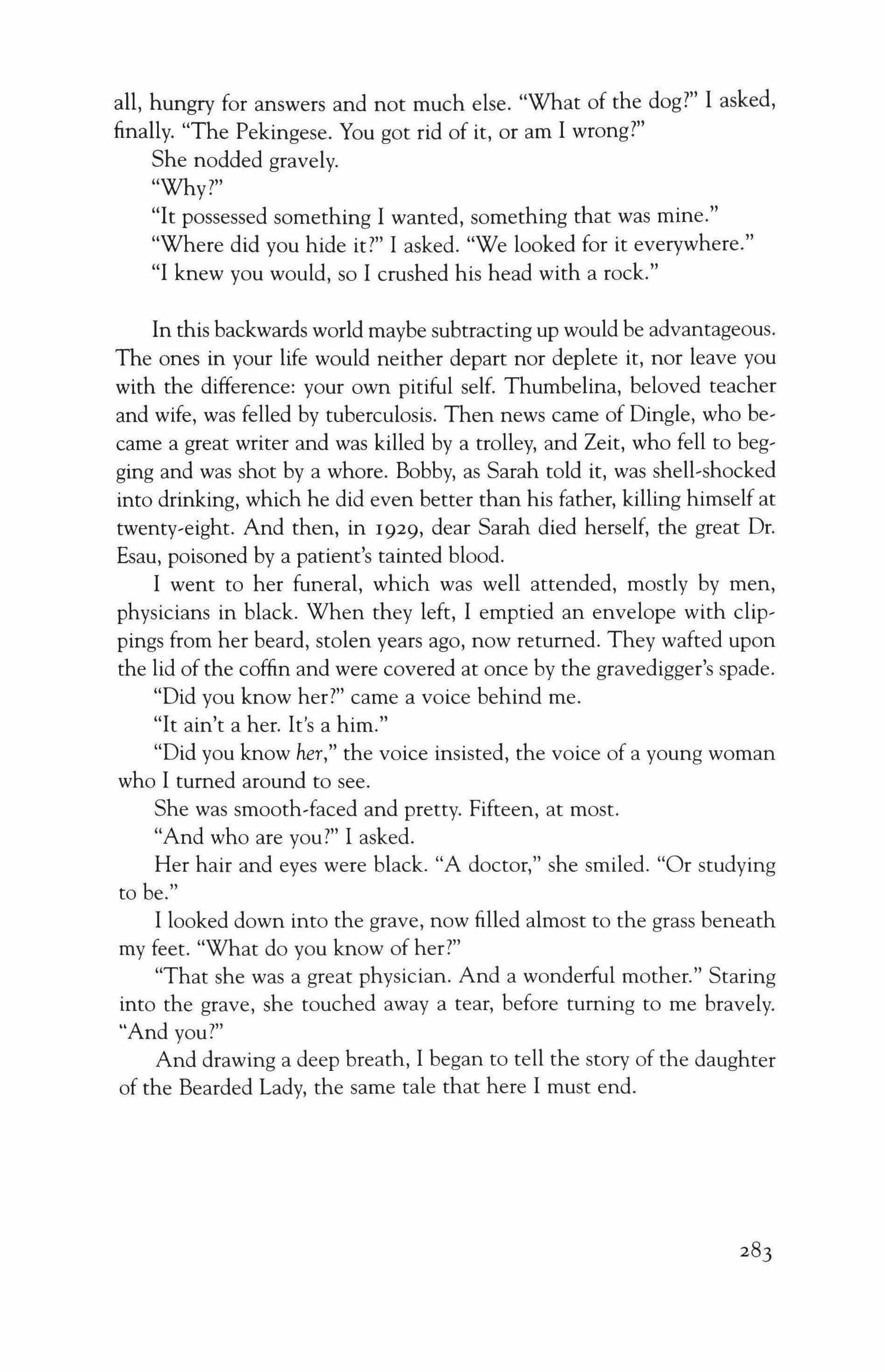
all, hungry for answers and not much else. "What of the dog?" I asked, finally. "The Pekingese. You got rid of it, or am I wrong?"
She nodded gravely.
"Why?"
"It possessed something I wanted, something that was mine." "Where did you hide it?" I asked. "We looked for it everywhere." "I knew you would, so I crushed his head with a rock."
In this backwards world maybe subtracting up would be advantageous. The ones in your life would neither depart nor deplete it, nor leave you with the difference: your own pitiful self. Thumbelina, beloved teacher and wife, was felled by tuberculosis. Then news carne of Dingle, who became a great writer and was killed by a trolley, and Zeit, who fell to begging and was shot by a whore. Bobby, as Sarah told it, was shell-shocked into drinking, which he did even better than his father, killing himself at twenty-eight. And then, in 1929, dear Sarah died herself, the great Dr. Esau, poisoned by a patient's tainted blood.
I went to her funeral, which was well attended, mostly by men, physicians in black. When they left, I emptied an envelope with clippings from her beard, stolen years ago, now returned. They wafted upon the lid of the coffin and were covered at once by the gravedigger's spade.
"Did you know her?" carne a voice behind me.
"It ain't a her. It's a him."
"Did you know her," the voice insisted, the voice of a young woman who I turned around to see.
She was smooth-faced and pretty. Fifteen, at most.
"And who are you?" I asked.
Her hair and eyes were black. "A doctor," she smiled. "Or studying to be."
I looked down into the grave, now filled almost to the grass beneath my feet. "What do you know of her?"
"That she was a great physician. And a wonderful mother." Staring into the grave, she touched away a tear, before turning to me bravely. "And you?"
And drawing a deep breath, I began to tell the story of the daughter of the Bearded Lady, the same tale that here I must end.
Ann Snodgrass

Regatta
You and I could have coursed freely. Did. For awhile.
Before the lake's strangeness netted us.
Stuck, we'd become an almost-sun between two bright spots: what had been, what would be. It was a blessing really-your claim to victory sky-thrust into the wide compact far too high. That seals. It gets no fiercer than this. This is no weather-sensing fist.
On Lake Como

Drifting, I am equally far from both shores, equally far from the peopled.
So distant, the crisp firmament.
So early, the white moon's ghost.
I could see, as Wang Wei had, "dusk inking crystal ripples."
I could feel the joy he took in "mountains beyond the clouds."
October's tonic air leaves me nothing but time to losethis one oar
I will not use.
Reading Li Po In Rome in 2005
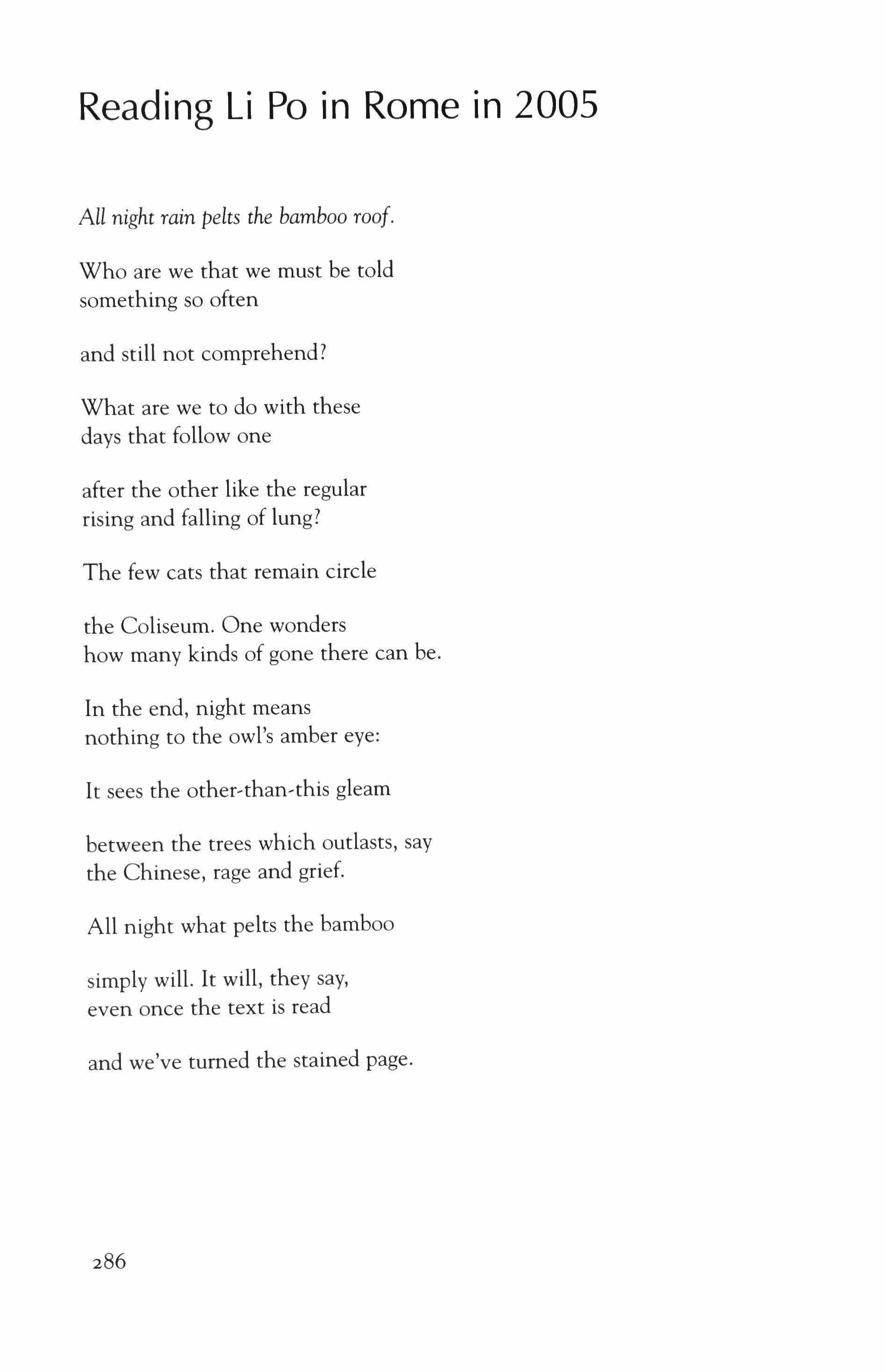
All night rain pelts the bamboo roof.
Who are we that we must be told something so often and still not comprehend?
What are we to do with these days that follow one after the other like the regular rising and falling of lung?
The few cats that remain circle the Coliseum. One wonders how many kinds of gone there can be.
In the end, night means nothing to the owl's amber eye: It sees the other-than-this gleam between the trees which outlasts, say the Chinese, rage and grief.
All night what pelts the bamboo simply will. It will, they say, even once the text is read and we've turned the stained page.
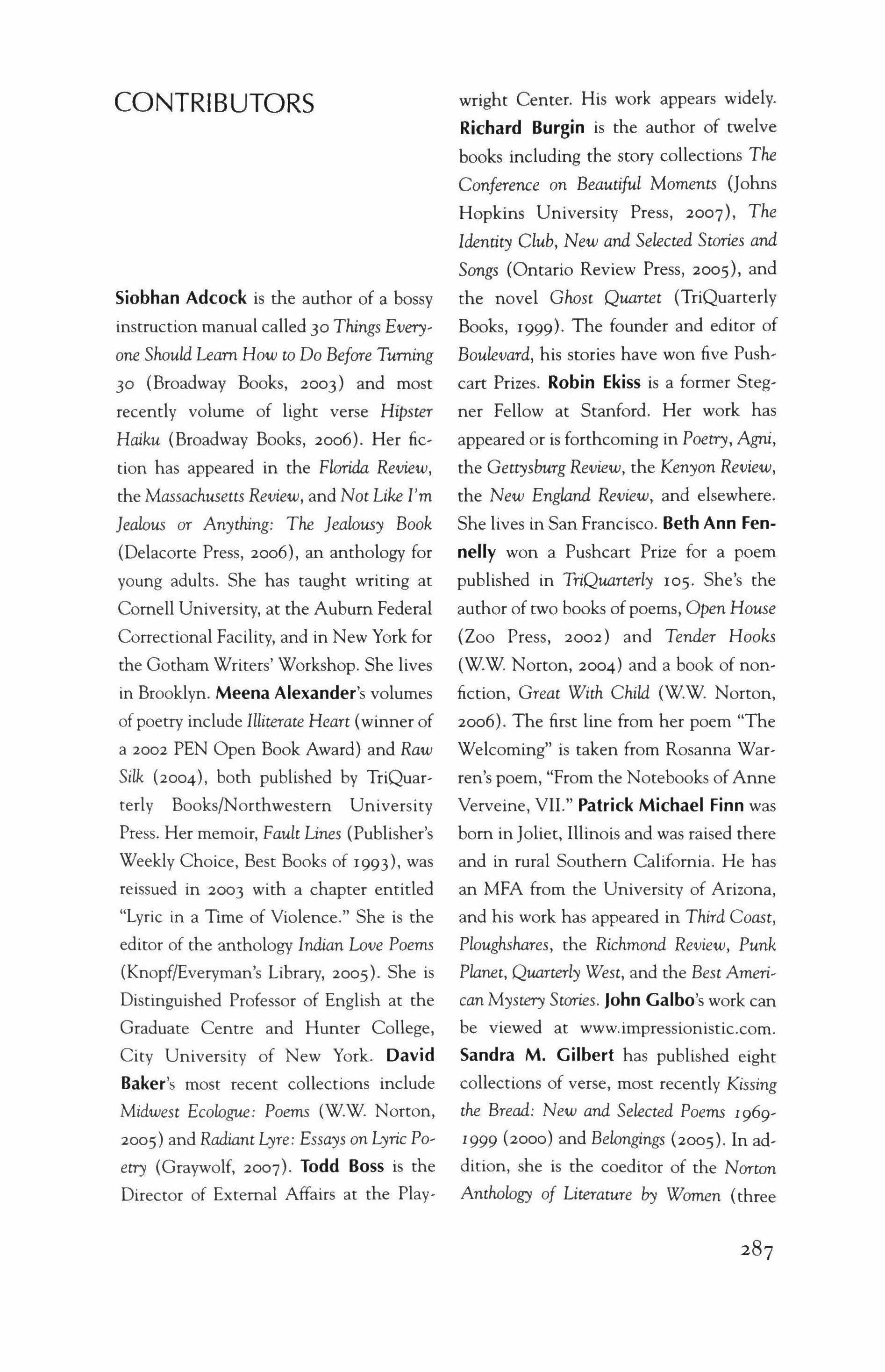
Siobhan Adcock is the author of a bossy instruction manual called 30 Things Everyone Should Learn How to Do Before Turning 30 (Broadway Books, 2003) and most recently volume of light verse Hipster Haiku (Broadway Books, 2006). Her fiction has appeared in the Florida Review, the Massachusetts Review, and Not Like I'm Jealous or Anything: The Jealousy Book (Delacorte Press, 2006), an anthology for young adults. She has taught writing at Cornell University, at the Auburn Federal Correctional Facility, and in New York for the Gotham Writers' Workshop. She lives in Brooklyn. Meena Alexander's volumes of poetry include Illiterate Heart (winner of a 2002 PEN Open Book Award) and Raw Silk (2004), both published by TriQuarterlv Books/Northwestern University Press. Her memoir, Fault Lines (Publisher's Weekly Choice, Best Books of 1993), was reissued in 2003 with a chapter entitled "Lyric in a Time of Violence." She is the editor of the anthology Indian Love Poems (Knopf/Everyman's Library, 2005). She is Distinguished Professor of English at the Graduate Centre and Hunter College, City University of New York. David Baker's most recent collections include Midwest Ecologue: Poems (W.W. Norton, 2005) and Radiant Lyre: Essays on Lyric Poetry (Graywolf, 2007). Todd Boss is the Director of External Affairs at the Play-
wright Center. His work appears widely. Richard Burgin is the author of twelve books including the story collections The Conference on Beautiful Moments (Johns Hopkins University Press, 2007), The Identity Club, New and Selected Stories and Songs (Ontario Review Press, 2005), and the novel Ghost Quartet (TriQuarterly Books, 1999). The founder and editor of Boulevard, his stories have won five Pushcart Prizes. Robin Ekiss is a former Stegner Fellow at Stanford. Her work has appeared or is forthcoming in Poetry, Agni, the Gettysburg Review, the Kenyon Review, the New England Review, and elsewhere. She lives in San Francisco. Beth Ann Fennelly won a Pushcart Prize for a poem published in TriQuarterly 105. She's the author of two books of poems, Open House (Zoo Press, 2002) and Tender Hooks (W.W. Norton, 2004) and a book of nonfiction, Great With Child (W.w. Norton, 2006). The first line from her poem "The Welcoming" is taken from Rosanna Warren's poem, "From the Notebooks ofAnne Verveine, VI!." Patrick Michael Finn was born in Joliet, Illinois and was raised there and in rural Southern California. He has an MFA from the University of Arizona, and his work has appeared in Third Coast, Ploughshares, the Richmond Review, Punk Planet, Quarterly West, and the Best American Mystery Stories. John Galbo's work can be viewed at www.impressionistic.com. Sandra M. Gilbert has published eight collections of verse, most recently Kissing the Bread: New and Selected Poems 19691999 (2000) and Belongings (2005). In addition, she is the coeditor of the Norton Anthology of Literature by Women (three
CONTRIBUTORS
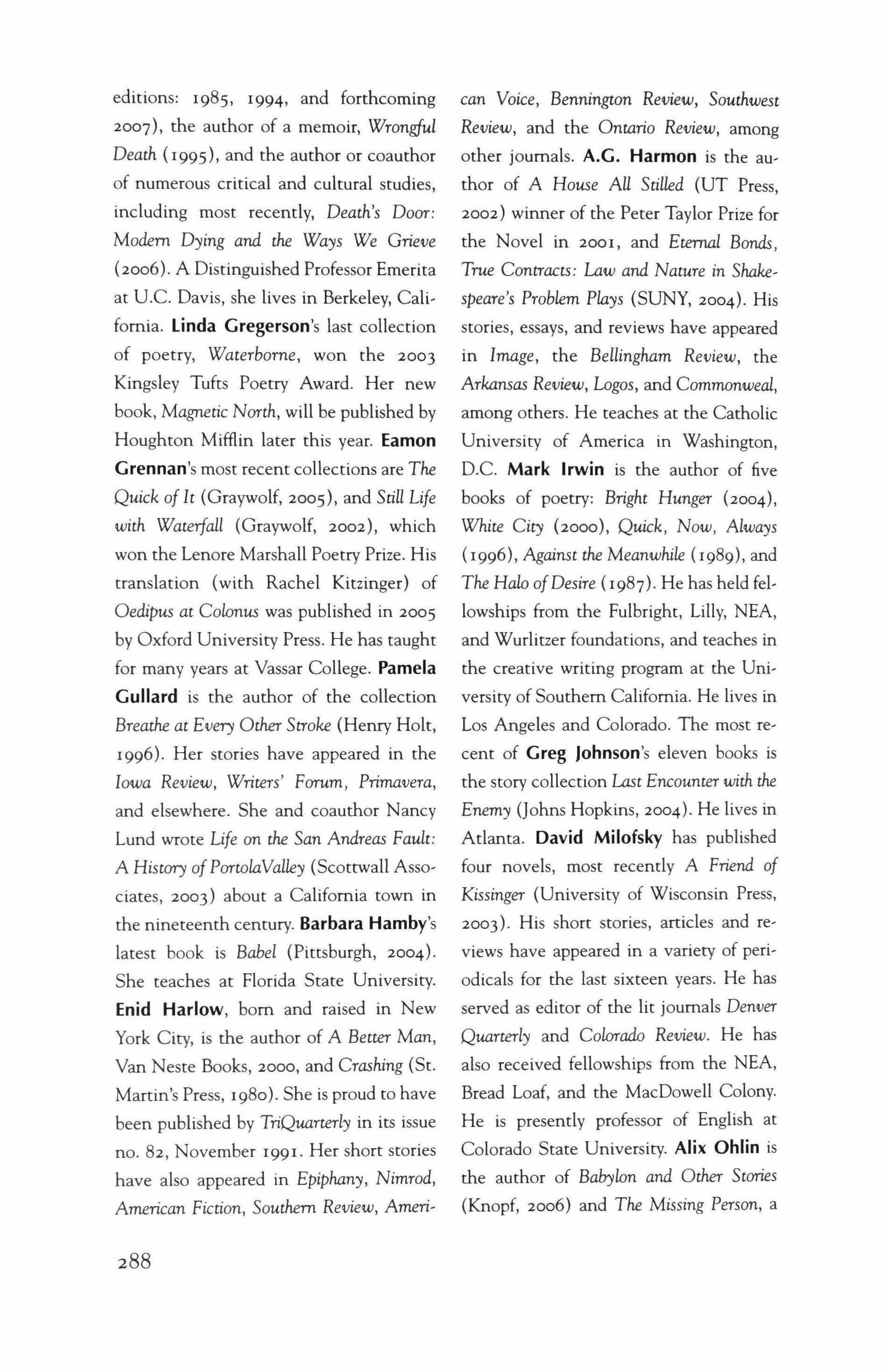
editions: 1985, 1994, and forthcoming 2007), the author of a memoir, Wrongful Death (1995), and the author or coauthor of numerous critical and cultural studies, including most recently, Death's Door: Modem Dying and the Ways We Grieve (2006). A Distinguished Professor Emerita at U.c. Davis, she lives in Berkeley, California. linda Gregerson's last collection of poetry, Waterborne, won the 2003 Kingsley Tufts Poetry Award. Her new book, Magnetic North, will be published by Houghton Mifflin later this year. Eamon Grennan's most recent collections are The Quick of It (Graywolf, 2005), and StiU Life with Waterfall (Graywolf, 2002), which won the Lenore Marshall Poetry Prize. His translation (with Rachel Kitzinger) of Oedipus at Colonus was published in 2005 by Oxford University Press. He has taught for many years at Vassar College. Pamela Gullard is the author of the collection Breathe at Every Other Stroke (Henry Holt, 1996). Her stories have appeared in the Iowa Review, Writers' Forum, Primavera, and elsewhere. She and coauthor Nancy Lund wrote Life on the San Andreas Fault: A History ofPortolaValley (Scottwall Associates, 2003) about a California town in the nineteenth cenrury. Barbara Hamby's latest book is Babel (Pittsburgh, 2004). She teaches at Florida State University. Enid Harlow, born and raised in New York City, is the author of A Better Man, Van Neste Books, 2000, and Crashing (St. Martin's Press, 1980). She is proud to have been published by TriQuarterly in its issue no. 82, November 1991. Her short stories have also appeared in Epiphany, Nimrod, American Fiction, Southern Review, Ameri-
can Voice, Bennington Review, Southwest Review, and the Ontario Review, among other journals. A.G. Harmon is the author of A House AU StiUed (UT Press, 2002) winner of the Peter Taylor Prize for the Novel in 2001, and Eternal Bonds, True Contracts: Law and Nature in Shakespeare's Problem Plays (SUNY, 2004). His stories, essays, and reviews have appeared in Image, the Bellingham Review, the Arkansas Review, Logos, and Commonweal, among others. He teaches at the Catholic University of America in Washington, D.C. Mark Irwin is the author of five books of poetry: Bright Hunger (2004), White City (2000), Quick, Now, Always (1996), Against the Meanwhile (1989), and The Halo ofDesire (1987). He has held fellowships from the Fulbright, Lilly, NEA, and Wurlitzer foundations, and teaches in the creative writing program at the University of Southern California. He lives in Los Angeles and Colorado. The most recent of Greg Johnson's eleven books is the story collection Last Encounter with the Enemy (Johns Hopkins, 2004). He lives in Atlanta. David Milofsky has published four novels, most recently A Friend of Kissinger (University of Wisconsin Press, 2003). His short stories, articles and reviews have appeared in a variety of periodicals for the last sixteen years. He has served as editor of the lit journals Denver Quarterly and Colorado Review. He has also received fellowships from the NEA, Bread Loaf, and the MacDowell Colony. He is presently professor of English at Colorado State University. Alix Ohlin is the author of Babylon and Other Stories (Knopf, 2006) and The Missing Person, a

novel (Knopf, 2005). She teaches at Lafayette College in Easton, PA. Vincent Precht's stories have appeared in the Seattle Review, Western Humanities Review, the Carolina Quarterly, and Indiana Review. A member of Tom Filer's Goat Alley Workshop, he lives in Los Angeles with his wife Saralynne and son Sullivan. Ann Snodgrass poet, essayist, translator. Poems, translations, and criticism have appeared in the New Republic, Grand Street, Paris Review, Partisan Review, Harvard Review, South Atlantic Review, Yale Italian Poetry, and many others. Publications include: a book of poems Portal (Mellon, 2001) and a book of critical essays Knowing Noise: The English Poems of Amelia Rosselli (Peter Lang Publishers, 2001). Recipient of grants from the Academy of American Poets, the Fulbright Foundation and the PEN American Center. Kevin Stein is the author of seven books of poetry and criticism, most recently the collection American Ghost Roses (University of Illinois, 2005). This volume won the Society of Midland Authors 2006 Poetry Award. The poems published here are from his new collection History's Bicep. He has served as Illinois Poet Laureate since 2003. Dabney Stuart's poems here come from his manuscript Tables. His most recent collections are The Man Who Loves Cezanne (Louisiana State University Press, 2003) and Family Preserve (University of Virginia Press, 2005). He lives in Lexington, Virginia. John Tait's short stories have appeared in Prairie Schooner, Crazyhorse Meridian, the Sun, the New Orleans Review and elsewhere. He is an assistant professor of fiction writing at the
University of North Texas and editor of the American Literary Review. D.H. Tracy's poetry and criticism appear widely. He works for the Poetry Foundation. Sidney Wade has published four collections of poems, the most recent of which is Celestial Bodies (LSU Press, 2002). She translates the poems of Pir Sultan Abdal, Yahya Kemal, and Gulseli Inal from the Turkish. She was recently elected President of AWP. She has taught at the University of Florida in the creative writing program since 1993. Joshua Weiner is the author of The World's Room and From the Book of Giants (Chicago). He lives in Washington, D.C. David Woo is the author of a book of poems, The Eclipses (BOA Editions, 2005). Anne Harding Woodworth is the author of three books of poetry, and her work is published widely in anthologies and journals in the U.S. and Canada, as well as online. She has an MFA in poetry from Fairleigh-Dickinson University and lives in Washington, D.C., where she is past chair and current member of the Poetry Board at the Folger Shakespeare Library. G.K. Wuori is the author of over sixty stories published throughout the world in the United States, Japan, India, Germany, Spain, and Brazil. A Pushcart Prize winner and recipient of an Illinois Arts Council Fellowship, his work has appeared in such journals as the Gettysburg Review, the Missouri Review, Five Points, StoryQuarterly, and Shenandoah. His story collection, Nude In Tub (Alogonquin, 1999), was a New Voices Award Nominee by the Quality Paperback Book Club and his novel, An American Outrage (Algonquin, 2000), was Foreword Magazine's

Book of the Year in fiction. He currently Story, Glimmer Train, American Short Ficlives in Sycamore, Illinois, where he tion, Ploughshares, and the Best American writes a monthly column called Cold Iron Short Stories 2006. He has been nominated at www.gkwuori.corn. Paul Yoon was born for Pushcart Prizes and was recently sein New York City and currently lives in lected as an emerging writer by PEN/New Boston. His work has appeared in One England.

Subscriptions
Three issues per year. Individuals: one year $24; two years $44; life $600. Institutions: one year $36; two years $68. Overseas: $5 per year additional. Price of back issues varies. Sample copies $5. Address correspondence and subscriptions to TriQuarterly, Northwestern University, 629 Noyes St., Evanston, IL 60208-4210. Phone (847) 491-7614.
Submissions
The editors invite submissions of fiction, poetry and literary essays, which must be postmarked between October I and March 31; manuscripts postmarked between April 1 and September 30 will not be read. No manuscripts will be returned unless accompanied by a stamped, self-addressed envelope. All manuscripts accepted for publication become the property of TriQuarterly, unless otherwise indicated.
Reprints
Reprints of issues 1 - 1 7 of TriQuarterly are available in full format from Kraus Reprint Company, Route 100, Millwood, NY 10546, and all issues in microfilm from University Microfilms International, 300 North Zeeb Road, Ann Arbor, MI 48106.
Indexing
TriQuarterly is indexed in the Humanities Index (H. W. Wilson Co.), the American Humanities Index (Whitson Publishing Co.), Historical Abstracts, MLA, EBSCO Publishing (Peabody, MA) and Information Access Co. (Foster City, CA).
Distributors
Our national distributors to retail trade are Ingram Periodicals (La Vergne, TN); B. DeBoer (Nutley, N); Ubiquity (Brooklyn, NY); Armadillo (Los Angeles, CA).

Copyright © 2007 by TriQuarterly. No part of this volume may be reproduced in any manner without written permission. The views expressed in this magazine are to be attributed to the writers, not the editors or sponsors. Printed in the United States of America by Sheridan Books. Typeset by TriQuarterly. ISSN 0041-3097.
Publication of TriQuarterly is made possible in part by the donors of gifts and grants to the magazine. For their recent and continuing support, we are very pleased to thank the Illinois Arts Council, the Lannan Foundation, the National Endowment for the Arts, the Sara Lee Foundation, the Wendling Foundation and individual donors.
T.he Idaho Review

from The Idaho Review has appeared in The Best America�� Stories, Prize Stories: The o. Henry Awards, The Pushcart Prize: Best oj the Small Presses, an eu: Stories from: South.
Mitch. Wieland; Editor BOISE STATE UNrvERSlTY 1910
UNIV;ER.SITY DRIV&

If you've missed the Southwest Review in the past few years, you've also missed:
John Ashbery Stanislaw Baranczak John Barth David
Bromwich Rosellen Brown Hortense Calisher Andrei
Codrescu Annie Dillard Millicent Dillon Tom Disch
Rita Dove Margaret Drabble Alice Fulton Angelica
Garnett William Gass Dana Gioia Albert Goldbarth
Debora Greger Eamon Grennan Allan Gurganus
Rachel Hadas Vicki Hearne Shelby Hearon Rolando
Hinojosa Edward Hirsch Alice Hoffman John Hollander. Michael Holroyd Garrett Kaoru Hongo Galway Kinnell
Mary Kinzie Georgina Kleege Ursula Le Guin
David Leavitt David Lehman Wendy Lesser William
Logan Alison Lurie J. D. McClatchy Alice Mattison
Arthur Miller Iris Murdoch Joyce Carol Oates Grace
Paley Molly Peacock Robert Pinsky Reynolds Price
Adrienne Rich Mary [o Salter Jim Shepard Charles
Simic Lee Smith » Elizabeth Spires. Helen Vendler David Wagoner. William Weaver· Edmund White· Charles Wright
Don't miss it, or them, any longer. Subscribe now. SOUTHWEST (.�� REVIEW Southern Methodist University, P.O. Box 750374, Dallas, Texas 75275-0374, (214) 768-1037 www.southwestreview.org

Through the voices of established poets and those just emerging in the art form, you journey along the thoroughfares and back roads of Illinois's diverse poetic landscape.
Bread &- Steel, a literal "record" of Illinois's twenty-first century poetic voices, gathers 24 poets reading from their work.
Contributors include: Stuart Dybek s Susan Hahn. Edward Hirsch Allison Joseph. Brigit Pegeen Kelly. Li-Young Lee. Laurence Lieberman Haki Madhubuti Lisel Mueller. Luis Rodriguez. Michael Van Walleghen
Available now for $15.99 Order online: bradley.edu/poet/breadandsteel
TRAVEL
THE TERRAIN OF ILLINOIS POETRY IN THIS FIRST-EVER, AUDIO CD POETRY ANTHOLOGY.
Past contributors
Steve Almond
Charles Baxter
Mary Clearman Blew
Stephen Dobyns
Denise Duhamel
Stephen Dunn
Terrance Hayes
Jane McCafferty
W.S. Merwin
Sharon Olds
Paul Perry
Sonia Sanchez
Vivian Shipley
Virgil Suarez
Melanie Rae Thon
Robert Vivian
Robert Wrigley
Dean Young

Promoting
the diverse literary voices of new and established writers since 1990
Win
We award cash prizes and publication for prose and poetry in our annual spring contest. Past judges include Mark Doty, Rick Moody, Ellen Bryant Voigt, Ehud Havazelet, Scott Russell Sanders, Rebecca McClanahan, and Tony Hoagland.
Submit
Fugue invites submissions of fiction, creative nonfiction, and poetry. Send SASE for guidelines or visit us on the web at http://www.uidaho. edu/fugue.
Subscribe
Individual
1 year/2 issues $14
2 years/4 issues $25
3 years/6 issues $35
Institutional
1 year/2 issues $22
2 years/4 issues $40
3 years/6 issues $55
Send orders to: Fugue
200 Brink Hall
University of Idaho PO Box 441102 Moscow, ID 83844-1102
Writing Published in Fugue has won the Pushcart Prize Pubhshed by the �IFA Program at the University of Idaho












































































































































































































































































































